| java.lang.Object | |
| ↳ | io.reactivex.Flowable<T> |
 Known Direct Subclasses Known Direct Subclasses
|
 Known Indirect Subclasses Known Indirect Subclasses
AsyncProcessor<T>,
BehaviorProcessor<T>,
PublishProcessor<T>,
ReplayProcessor<T>,
UnicastProcessor<T>
|
Class Overview
The Flowable class that implements the Reactive-Streams Pattern and offers factory methods, intermediate operators and the ability to consume reactive dataflows.
Reactive-Streams operates with Publishers which Flowable extends. Many operators
therefore accept general Publishers directly and allow direct interoperation with other
Reactive-Streams implementations.
The Flowable hosts the default buffer size of 128 elements for operators, accessible via bufferSize(),
that can be overridden globally via the system parameter rx2.buffer-size. Most operators, however, have
overloads that allow setting their internal buffer size explicitly.
The documentation for this class makes use of marble diagrams. The following legend explains these diagrams:

For more information see the ReactiveX documentation.
Summary
| Public Constructors | |||||||||||
|---|---|---|---|---|---|---|---|---|---|---|---|
| Flowable() | |||||||||||
| Public Methods | |||||||||||
|---|---|---|---|---|---|---|---|---|---|---|---|
| final Single<Boolean> |
all(Predicate<? super T> predicate)
Returns a Single that emits a Boolean that indicates whether all of the items emitted by the source
Publisher satisfy a condition.
| ||||||||||
| static <T> Flowable<T> |
amb(Iterable<? extends Publisher<? extends T>> sources)
Mirrors the one Publisher in an Iterable of several Publishers that first either emits an item or sends
a termination notification.
| ||||||||||
| static <T> Flowable<T> |
ambArray(Publisher...<? extends T> sources)
Mirrors the one Publisher in an array of several Publishers that first either emits an item or sends
a termination notification.
| ||||||||||
| final Flowable<T> |
ambWith(Publisher<? extends T> other)
Mirrors the Publisher (current or provided) that first either emits an item or sends a termination
notification.
| ||||||||||
| final Single<Boolean> |
any(Predicate<? super T> predicate)
Returns a Single that emits
true if any item emitted by the source Publisher satisfies a
specified condition, otherwise false. | ||||||||||
| final T |
blockingFirst(T defaultItem)
Returns the first item emitted by this
Flowable, or a default value if it emits no
items. | ||||||||||
| final T |
blockingFirst()
Returns the first item emitted by this
Flowable, or throws
NoSuchElementException if it emits no items. | ||||||||||
| final void |
blockingForEach(Consumer<? super T> onNext)
Invokes a method on each item emitted by this
Flowable and blocks until the Flowable
completes. | ||||||||||
| final Iterable<T> |
blockingIterable(int bufferSize)
Converts this
Flowable into an Iterable. | ||||||||||
| final Iterable<T> |
blockingIterable()
Converts this
Flowable into an Iterable. | ||||||||||
| final T |
blockingLast()
Returns the last item emitted by this
Flowable, or throws
NoSuchElementException if this Flowable emits no items. | ||||||||||
| final T |
blockingLast(T defaultItem)
Returns the last item emitted by this
Flowable, or a default value if it emits no
items. | ||||||||||
| final Iterable<T> |
blockingLatest()
Returns an
Iterable that returns the latest item emitted by this Flowable,
waiting if necessary for one to become available. | ||||||||||
| final Iterable<T> |
blockingMostRecent(T initialItem)
Returns an
Iterable that always returns the item most recently emitted by this
Flowable. | ||||||||||
| final Iterable<T> |
blockingNext()
Returns an
Iterable that blocks until this Flowable emits another item, then
returns that item. | ||||||||||
| final T |
blockingSingle(T defaultItem)
If this
Flowable completes after emitting a single item, return that item; if it emits
more than one item, throw an IllegalArgumentException; if it emits no items, return a default
value. | ||||||||||
| final T |
blockingSingle()
If this
Flowable completes after emitting a single item, return that item, otherwise
throw a NoSuchElementException. | ||||||||||
| final void |
blockingSubscribe(Consumer<? super T> onNext)
Subscribes to the source and calls the given callbacks on the current thread.
| ||||||||||
| final void |
blockingSubscribe(Consumer<? super T> onNext, Consumer<? super Throwable> onError)
Subscribes to the source and calls the given callbacks on the current thread.
| ||||||||||
| final void |
blockingSubscribe()
Runs the source observable to a terminal event, ignoring any values and rethrowing any exception.
| ||||||||||
| final void |
blockingSubscribe(Consumer<? super T> onNext, Consumer<? super Throwable> onError, Action onComplete)
Subscribes to the source and calls the given callbacks on the current thread.
| ||||||||||
| final void |
blockingSubscribe(Subscriber<? super T> subscriber)
Subscribes to the source and calls the Subscriber methods on the current thread.
| ||||||||||
| final <U extends Collection<? super T>> Flowable<U> |
buffer(long timespan, long timeskip, TimeUnit unit, Scheduler scheduler, Callable<U> bufferSupplier)
Returns a Flowable that emits buffers of items it collects from the source Publisher.
| ||||||||||
| final <B> Flowable<List<T>> |
buffer(Callable<? extends Publisher<B>> boundaryIndicatorSupplier)
Returns a Flowable that emits buffers of items it collects from the source Publisher.
| ||||||||||
| final Flowable<List<T>> |
buffer(long timespan, long timeskip, TimeUnit unit, Scheduler scheduler)
Returns a Flowable that emits buffers of items it collects from the source Publisher.
| ||||||||||
| final <U extends Collection<? super T>> Flowable<U> |
buffer(int count, Callable<U> bufferSupplier)
Returns a Flowable that emits buffers of items it collects from the source Publisher.
| ||||||||||
| final <B, U extends Collection<? super T>> Flowable<U> |
buffer(Publisher<B> boundaryIndicator, Callable<U> bufferSupplier)
Returns a Flowable that emits non-overlapping buffered items from the source Publisher each time the
specified boundary Publisher emits an item.
| ||||||||||
| final <B> Flowable<List<T>> |
buffer(Publisher<B> boundaryIndicator, int initialCapacity)
Returns a Flowable that emits non-overlapping buffered items from the source Publisher each time the
specified boundary Publisher emits an item.
| ||||||||||
| final Flowable<List<T>> |
buffer(long timespan, TimeUnit unit, Scheduler scheduler)
Returns a Flowable that emits buffers of items it collects from the source Publisher.
| ||||||||||
| final Flowable<List<T>> |
buffer(int count)
Returns a Flowable that emits buffers of items it collects from the source Publisher.
| ||||||||||
| final Flowable<List<T>> |
buffer(long timespan, long timeskip, TimeUnit unit)
Returns a Flowable that emits buffers of items it collects from the source Publisher.
| ||||||||||
| final <TOpening, TClosing> Flowable<List<T>> |
buffer(Flowable<? extends TOpening> openingIndicator, Function<? super TOpening, ? extends Publisher<? extends TClosing>> closingIndicator)
Returns a Flowable that emits buffers of items it collects from the source Publisher.
| ||||||||||
| final Flowable<List<T>> |
buffer(long timespan, TimeUnit unit, Scheduler scheduler, int count)
Returns a Flowable that emits buffers of items it collects from the source Publisher.
| ||||||||||
| final Flowable<List<T>> |
buffer(long timespan, TimeUnit unit)
Returns a Flowable that emits buffers of items it collects from the source Publisher.
| ||||||||||
| final <U extends Collection<? super T>> Flowable<U> |
buffer(long timespan, TimeUnit unit, Scheduler scheduler, int count, Callable<U> bufferSupplier, boolean restartTimerOnMaxSize)
Returns a Flowable that emits buffers of items it collects from the source Publisher.
| ||||||||||
| final Flowable<List<T>> |
buffer(int count, int skip)
Returns a Flowable that emits buffers of items it collects from the source Publisher.
| ||||||||||
| final <B> Flowable<List<T>> |
buffer(Publisher<B> boundaryIndicator)
Returns a Flowable that emits non-overlapping buffered items from the source Publisher each time the
specified boundary Publisher emits an item.
| ||||||||||
| final <TOpening, TClosing, U extends Collection<? super T>> Flowable<U> |
buffer(Flowable<? extends TOpening> openingIndicator, Function<? super TOpening, ? extends Publisher<? extends TClosing>> closingIndicator, Callable<U> bufferSupplier)
Returns a Flowable that emits buffers of items it collects from the source Publisher.
| ||||||||||
| final <B, U extends Collection<? super T>> Flowable<U> |
buffer(Callable<? extends Publisher<B>> boundaryIndicatorSupplier, Callable<U> bufferSupplier)
Returns a Flowable that emits buffers of items it collects from the source Publisher.
| ||||||||||
| final Flowable<List<T>> |
buffer(long timespan, TimeUnit unit, int count)
Returns a Flowable that emits buffers of items it collects from the source Publisher.
| ||||||||||
| final <U extends Collection<? super T>> Flowable<U> |
buffer(int count, int skip, Callable<U> bufferSupplier)
Returns a Flowable that emits buffers of items it collects from the source Publisher.
| ||||||||||
| static int |
bufferSize()
Returns the default internal buffer size used by most async operators.
| ||||||||||
| final Flowable<T> |
cache()
Returns a Flowable that subscribes to this Publisher lazily, caches all of its events
and replays them, in the same order as received, to all the downstream subscribers.
| ||||||||||
| final Flowable<T> |
cacheWithInitialCapacity(int initialCapacity)
Returns a Flowable that subscribes to this Publisher lazily, caches all of its events
and replays them, in the same order as received, to all the downstream subscribers.
| ||||||||||
| final <U> Flowable<U> |
cast(Class<U> clazz)
Returns a Flowable that emits the items emitted by the source Publisher, converted to the specified
type.
| ||||||||||
| final <U> Single<U> |
collect(Callable<? extends U> initialItemSupplier, BiConsumer<? super U, ? super T> collector)
Collects items emitted by the source Publisher into a single mutable data structure and returns
a Single that emits this structure.
| ||||||||||
| final <U> Single<U> |
collectInto(U initialItem, BiConsumer<? super U, ? super T> collector)
Collects items emitted by the source Publisher into a single mutable data structure and returns
a Single that emits this structure.
| ||||||||||
| static <T1, T2, T3, T4, T5, T6, T7, T8, T9, R> Flowable<R> |
combineLatest(Publisher<? extends T1> source1, Publisher<? extends T2> source2, Publisher<? extends T3> source3, Publisher<? extends T4> source4, Publisher<? extends T5> source5, Publisher<? extends T6> source6, Publisher<? extends T7> source7, Publisher<? extends T8> source8, Publisher<? extends T9> source9, Function9<? super T1, ? super T2, ? super T3, ? super T4, ? super T5, ? super T6, ? super T7, ? super T8, ? super T9, ? extends R> combiner)
Combines nine source Publishers by emitting an item that aggregates the latest values of each of the
source Publishers each time an item is received from any of the source Publishers, where this
aggregation is defined by a specified function.
| ||||||||||
| static <T, R> Flowable<R> |
combineLatest(Publisher[]<? extends T> sources, Function<? super Object[], ? extends R> combiner)
Combines a collection of source Publishers by emitting an item that aggregates the latest values of each of
the source Publishers each time an item is received from any of the source Publishers, where this
aggregation is defined by a specified function.
| ||||||||||
| static <T, R> Flowable<R> |
combineLatest(Iterable<? extends Publisher<? extends T>> sources, Function<? super Object[], ? extends R> combiner)
Combines a collection of source Publishers by emitting an item that aggregates the latest values of each of
the source Publishers each time an item is received from any of the source Publishers, where this
aggregation is defined by a specified function.
| ||||||||||
| static <T1, T2, T3, T4, T5, T6, T7, T8, R> Flowable<R> |
combineLatest(Publisher<? extends T1> source1, Publisher<? extends T2> source2, Publisher<? extends T3> source3, Publisher<? extends T4> source4, Publisher<? extends T5> source5, Publisher<? extends T6> source6, Publisher<? extends T7> source7, Publisher<? extends T8> source8, Function8<? super T1, ? super T2, ? super T3, ? super T4, ? super T5, ? super T6, ? super T7, ? super T8, ? extends R> combiner)
Combines eight source Publishers by emitting an item that aggregates the latest values of each of the
source Publishers each time an item is received from any of the source Publishers, where this
aggregation is defined by a specified function.
| ||||||||||
| static <T1, T2, R> Flowable<R> |
combineLatest(Publisher<? extends T1> source1, Publisher<? extends T2> source2, BiFunction<? super T1, ? super T2, ? extends R> combiner)
Combines two source Publishers by emitting an item that aggregates the latest values of each of the
source Publishers each time an item is received from either of the source Publishers, where this
aggregation is defined by a specified function.
| ||||||||||
| static <T1, T2, T3, R> Flowable<R> |
combineLatest(Publisher<? extends T1> source1, Publisher<? extends T2> source2, Publisher<? extends T3> source3, Function3<? super T1, ? super T2, ? super T3, ? extends R> combiner)
Combines three source Publishers by emitting an item that aggregates the latest values of each of the
source Publishers each time an item is received from any of the source Publishers, where this
aggregation is defined by a specified function.
| ||||||||||
| static <T1, T2, T3, T4, R> Flowable<R> |
combineLatest(Publisher<? extends T1> source1, Publisher<? extends T2> source2, Publisher<? extends T3> source3, Publisher<? extends T4> source4, Function4<? super T1, ? super T2, ? super T3, ? super T4, ? extends R> combiner)
Combines four source Publishers by emitting an item that aggregates the latest values of each of the
source Publishers each time an item is received from any of the source Publishers, where this
aggregation is defined by a specified function.
| ||||||||||
| static <T1, T2, T3, T4, T5, R> Flowable<R> |
combineLatest(Publisher<? extends T1> source1, Publisher<? extends T2> source2, Publisher<? extends T3> source3, Publisher<? extends T4> source4, Publisher<? extends T5> source5, Function5<? super T1, ? super T2, ? super T3, ? super T4, ? super T5, ? extends R> combiner)
Combines five source Publishers by emitting an item that aggregates the latest values of each of the
source Publishers each time an item is received from any of the source Publishers, where this
aggregation is defined by a specified function.
| ||||||||||
| static <T, R> Flowable<R> |
combineLatest(Publisher[]<? extends T> sources, Function<? super Object[], ? extends R> combiner, int bufferSize)
Combines a collection of source Publishers by emitting an item that aggregates the latest values of each of
the source Publishers each time an item is received from any of the source Publishers, where this
aggregation is defined by a specified function.
| ||||||||||
| static <T, R> Flowable<R> |
combineLatest(Function<? super Object[], ? extends R> combiner, Publisher...<? extends T> sources)
Combines a collection of source Publishers by emitting an item that aggregates the latest values of each of
the source Publishers each time an item is received from any of the source Publishers, where this
aggregation is defined by a specified function.
| ||||||||||
| static <T1, T2, T3, T4, T5, T6, T7, R> Flowable<R> |
combineLatest(Publisher<? extends T1> source1, Publisher<? extends T2> source2, Publisher<? extends T3> source3, Publisher<? extends T4> source4, Publisher<? extends T5> source5, Publisher<? extends T6> source6, Publisher<? extends T7> source7, Function7<? super T1, ? super T2, ? super T3, ? super T4, ? super T5, ? super T6, ? super T7, ? extends R> combiner)
Combines seven source Publishers by emitting an item that aggregates the latest values of each of the
source Publishers each time an item is received from any of the source Publishers, where this
aggregation is defined by a specified function.
| ||||||||||
| static <T, R> Flowable<R> |
combineLatest(Iterable<? extends Publisher<? extends T>> sources, Function<? super Object[], ? extends R> combiner, int bufferSize)
Combines a collection of source Publishers by emitting an item that aggregates the latest values of each of
the source Publishers each time an item is received from any of the source Publishers, where this
aggregation is defined by a specified function.
| ||||||||||
| static <T1, T2, T3, T4, T5, T6, R> Flowable<R> |
combineLatest(Publisher<? extends T1> source1, Publisher<? extends T2> source2, Publisher<? extends T3> source3, Publisher<? extends T4> source4, Publisher<? extends T5> source5, Publisher<? extends T6> source6, Function6<? super T1, ? super T2, ? super T3, ? super T4, ? super T5, ? super T6, ? extends R> combiner)
Combines six source Publishers by emitting an item that aggregates the latest values of each of the
source Publishers each time an item is received from any of the source Publishers, where this
aggregation is defined by a specified function.
| ||||||||||
| static <T, R> Flowable<R> |
combineLatestDelayError(Function<? super Object[], ? extends R> combiner, int bufferSize, Publisher...<? extends T> sources)
Combines a collection of source Publishers by emitting an item that aggregates the latest values of each of
the source Publishers each time an item is received from any of the source Publisher, where this
aggregation is defined by a specified function and delays any error from the sources until
all source Publishers terminate.
| ||||||||||
| static <T, R> Flowable<R> |
combineLatestDelayError(Publisher[]<? extends T> sources, Function<? super Object[], ? extends R> combiner)
Combines a collection of source Publishers by emitting an item that aggregates the latest values of each of
the source Publishers each time an item is received from any of the source Publishers, where this
aggregation is defined by a specified function.
| ||||||||||
| static <T, R> Flowable<R> |
combineLatestDelayError(Publisher[]<? extends T> sources, Function<? super Object[], ? extends R> combiner, int bufferSize)
Combines a collection of source Publishers by emitting an item that aggregates the latest values of each of
the source Publishers each time an item is received from any of the source Publishers, where this
aggregation is defined by a specified function and delays any error from the sources until
all source Publishers terminate.
| ||||||||||
| static <T, R> Flowable<R> |
combineLatestDelayError(Iterable<? extends Publisher<? extends T>> sources, Function<? super Object[], ? extends R> combiner)
Combines a collection of source Publishers by emitting an item that aggregates the latest values of each of
the source Publishers each time an item is received from any of the source Publishers, where this
aggregation is defined by a specified function and delays any error from the sources until
all source Publishers terminate.
| ||||||||||
| static <T, R> Flowable<R> |
combineLatestDelayError(Iterable<? extends Publisher<? extends T>> sources, Function<? super Object[], ? extends R> combiner, int bufferSize)
Combines a collection of source Publishers by emitting an item that aggregates the latest values of each of
the source Publishers each time an item is received from any of the source Publishers, where this
aggregation is defined by a specified function and delays any error from the sources until
all source Publishers terminate.
| ||||||||||
| static <T, R> Flowable<R> |
combineLatestDelayError(Function<? super Object[], ? extends R> combiner, Publisher...<? extends T> sources)
Combines a collection of source Publishers by emitting an item that aggregates the latest values of each of
the source Publishers each time an item is received from any of the source Publishers, where this
aggregation is defined by a specified function and delays any error from the sources until
all source Publishers terminate.
| ||||||||||
| final <R> Flowable<R> |
compose(FlowableTransformer<? super T, ? extends R> composer)
Transform a Publisher by applying a particular Transformer function to it.
| ||||||||||
| static <T> Flowable<T> |
concat(Publisher<? extends T> source1, Publisher<? extends T> source2, Publisher<? extends T> source3)
Returns a Flowable that emits the items emitted by three Publishers, one after the other, without
interleaving them.
| ||||||||||
| static <T> Flowable<T> |
concat(Iterable<? extends Publisher<? extends T>> sources)
Concatenates elements of each Publisher provided via an Iterable sequence into a single sequence
of elements without interleaving them.
| ||||||||||
| static <T> Flowable<T> |
concat(Publisher<? extends T> source1, Publisher<? extends T> source2, Publisher<? extends T> source3, Publisher<? extends T> source4)
Returns a Flowable that emits the items emitted by four Publishers, one after the other, without
interleaving them.
| ||||||||||
| static <T> Flowable<T> |
concat(Publisher<? extends Publisher<? extends T>> sources, int prefetch)
Returns a Flowable that emits the items emitted by each of the Publishers emitted by the source
Publisher, one after the other, without interleaving them.
| ||||||||||
| static <T> Flowable<T> |
concat(Publisher<? extends Publisher<? extends T>> sources)
Returns a Flowable that emits the items emitted by each of the Publishers emitted by the source
Publisher, one after the other, without interleaving them.
| ||||||||||
| static <T> Flowable<T> |
concat(Publisher<? extends T> source1, Publisher<? extends T> source2)
Returns a Flowable that emits the items emitted by two Publishers, one after the other, without
interleaving them.
| ||||||||||
| static <T> Flowable<T> |
concatArray(Publisher...<? extends T> sources)
Concatenates a variable number of Publisher sources.
| ||||||||||
| static <T> Flowable<T> |
concatArrayDelayError(Publisher...<? extends T> sources)
Concatenates a variable number of Publisher sources and delays errors from any of them
till all terminate.
| ||||||||||
| static <T> Flowable<T> |
concatArrayEager(int maxConcurrency, int prefetch, Publisher...<? extends T> sources)
Concatenates a sequence of Publishers eagerly into a single stream of values.
| ||||||||||
| static <T> Flowable<T> |
concatArrayEager(Publisher...<? extends T> sources)
Concatenates a sequence of Publishers eagerly into a single stream of values.
| ||||||||||
| static <T> Flowable<T> |
concatDelayError(Publisher<? extends Publisher<? extends T>> sources, int prefetch, boolean tillTheEnd)
Concatenates the Publisher sequence of Publishers into a single sequence by subscribing to each inner Publisher,
one after the other, one at a time and delays any errors till the all inner and the outer Publishers terminate.
| ||||||||||
| static <T> Flowable<T> |
concatDelayError(Iterable<? extends Publisher<? extends T>> sources)
Concatenates the Iterable sequence of Publishers into a single sequence by subscribing to each Publisher,
one after the other, one at a time and delays any errors till the all inner Publishers terminate.
| ||||||||||
| static <T> Flowable<T> |
concatDelayError(Publisher<? extends Publisher<? extends T>> sources)
Concatenates the Publisher sequence of Publishers into a single sequence by subscribing to each inner Publisher,
one after the other, one at a time and delays any errors till the all inner and the outer Publishers terminate.
| ||||||||||
| static <T> Flowable<T> |
concatEager(Iterable<? extends Publisher<? extends T>> sources)
Concatenates a sequence of Publishers eagerly into a single stream of values.
| ||||||||||
| static <T> Flowable<T> |
concatEager(Publisher<? extends Publisher<? extends T>> sources, int maxConcurrency, int prefetch)
Concatenates a Publisher sequence of Publishers eagerly into a single stream of values.
| ||||||||||
| static <T> Flowable<T> |
concatEager(Publisher<? extends Publisher<? extends T>> sources)
Concatenates a Publisher sequence of Publishers eagerly into a single stream of values.
| ||||||||||
| static <T> Flowable<T> |
concatEager(Iterable<? extends Publisher<? extends T>> sources, int maxConcurrency, int prefetch)
Concatenates a sequence of Publishers eagerly into a single stream of values.
| ||||||||||
| final <R> Flowable<R> |
concatMap(Function<? super T, ? extends Publisher<? extends R>> mapper, int prefetch)
Returns a new Flowable that emits items resulting from applying a function that you supply to each item
emitted by the source Publisher, where that function returns a Publisher, and then emitting the items
that result from concatenating those resulting Publishers.
| ||||||||||
| final <R> Flowable<R> |
concatMap(Function<? super T, ? extends Publisher<? extends R>> mapper)
Returns a new Flowable that emits items resulting from applying a function that you supply to each item
emitted by the source Publisher, where that function returns a Publisher, and then emitting the items
that result from concatenating those resulting Publishers.
| ||||||||||
| final <R> Flowable<R> |
concatMapDelayError(Function<? super T, ? extends Publisher<? extends R>> mapper, int prefetch, boolean tillTheEnd)
Maps each of the items into a Publisher, subscribes to them one after the other,
one at a time and emits their values in order
while delaying any error from either this or any of the inner Publishers
till all of them terminate.
| ||||||||||
| final <R> Flowable<R> |
concatMapDelayError(Function<? super T, ? extends Publisher<? extends R>> mapper)
Maps each of the items into a Publisher, subscribes to them one after the other,
one at a time and emits their values in order
while delaying any error from either this or any of the inner Publishers
till all of them terminate.
| ||||||||||
| final <R> Flowable<R> |
concatMapEager(Function<? super T, ? extends Publisher<? extends R>> mapper)
Maps a sequence of values into Publishers and concatenates these Publishers eagerly into a single
Publisher.
| ||||||||||
| final <R> Flowable<R> |
concatMapEager(Function<? super T, ? extends Publisher<? extends R>> mapper, int maxConcurrency, int prefetch)
Maps a sequence of values into Publishers and concatenates these Publishers eagerly into a single
Publisher.
| ||||||||||
| final <R> Flowable<R> |
concatMapEagerDelayError(Function<? super T, ? extends Publisher<? extends R>> mapper, boolean tillTheEnd)
Maps a sequence of values into Publishers and concatenates these Publishers eagerly into a single
Publisher.
| ||||||||||
| final <R> Flowable<R> |
concatMapEagerDelayError(Function<? super T, ? extends Publisher<? extends R>> mapper, int maxConcurrency, int prefetch, boolean tillTheEnd)
Maps a sequence of values into Publishers and concatenates these Publishers eagerly into a single
Publisher.
| ||||||||||
| final <U> Flowable<U> |
concatMapIterable(Function<? super T, ? extends Iterable<? extends U>> mapper)
Returns a Flowable that concatenate each item emitted by the source Publisher with the values in an
Iterable corresponding to that item that is generated by a selector.
| ||||||||||
| final <U> Flowable<U> |
concatMapIterable(Function<? super T, ? extends Iterable<? extends U>> mapper, int prefetch)
Returns a Flowable that concatenate each item emitted by the source Publisher with the values in an
Iterable corresponding to that item that is generated by a selector.
| ||||||||||
| final Flowable<T> |
concatWith(Publisher<? extends T> other)
Returns a Flowable that emits the items emitted from the current Publisher, then the next, one after
the other, without interleaving them.
| ||||||||||
| final Single<Boolean> |
contains(Object item)
Returns a Single that emits a Boolean that indicates whether the source Publisher emitted a
specified item.
| ||||||||||
| final Single<Long> |
count()
Returns a Single that counts the total number of items emitted by the source Publisher and emits
this count as a 64-bit Long.
| ||||||||||
| static <T> Flowable<T> |
create(FlowableOnSubscribe<T> source, BackpressureStrategy mode)
Provides an API (via a cold Flowable) that bridges the reactive world with the callback-style,
generally non-backpressured world.
| ||||||||||
| final Flowable<T> |
debounce(long timeout, TimeUnit unit)
Returns a Flowable that mirrors the source Publisher, except that it drops items emitted by the
source Publisher that are followed by newer items before a timeout value expires.
| ||||||||||
| final Flowable<T> |
debounce(long timeout, TimeUnit unit, Scheduler scheduler)
Returns a Flowable that mirrors the source Publisher, except that it drops items emitted by the
source Publisher that are followed by newer items before a timeout value expires on a specified
Scheduler.
| ||||||||||
| final <U> Flowable<T> |
debounce(Function<? super T, ? extends Publisher<U>> debounceIndicator)
Returns a Flowable that mirrors the source Publisher, except that it drops items emitted by the
source Publisher that are followed by another item within a computed debounce duration.
| ||||||||||
| final Flowable<T> |
defaultIfEmpty(T defaultItem)
Returns a Flowable that emits the items emitted by the source Publisher or a specified default item
if the source Publisher is empty.
| ||||||||||
| static <T> Flowable<T> |
defer(Callable<? extends Publisher<? extends T>> supplier)
Returns a Flowable that calls a Publisher factory to create a Publisher for each new Subscriber
that subscribes.
| ||||||||||
| final Flowable<T> |
delay(long delay, TimeUnit unit, boolean delayError)
Returns a Flowable that emits the items emitted by the source Publisher shifted forward in time by a
specified delay.
| ||||||||||
| final <U, V> Flowable<T> |
delay(Publisher<U> subscriptionIndicator, Function<? super T, ? extends Publisher<V>> itemDelayIndicator)
Returns a Flowable that delays the subscription to and emissions from the source Publisher via another
Publisher on a per-item basis.
| ||||||||||
| final Flowable<T> |
delay(long delay, TimeUnit unit, Scheduler scheduler)
Returns a Flowable that emits the items emitted by the source Publisher shifted forward in time by a
specified delay.
| ||||||||||
| final Flowable<T> |
delay(long delay, TimeUnit unit, Scheduler scheduler, boolean delayError)
Returns a Flowable that emits the items emitted by the source Publisher shifted forward in time by a
specified delay.
| ||||||||||
| final <U> Flowable<T> |
delay(Function<? super T, ? extends Publisher<U>> itemDelayIndicator)
Returns a Flowable that delays the emissions of the source Publisher via another Publisher on a
per-item basis.
| ||||||||||
| final Flowable<T> |
delay(long delay, TimeUnit unit)
Returns a Flowable that emits the items emitted by the source Publisher shifted forward in time by a
specified delay.
| ||||||||||
| final <U> Flowable<T> |
delaySubscription(Publisher<U> subscriptionIndicator)
Returns a Flowable that delays the subscription to this Publisher
until the other Publisher emits an element or completes normally.
| ||||||||||
| final Flowable<T> |
delaySubscription(long delay, TimeUnit unit, Scheduler scheduler)
Returns a Flowable that delays the subscription to the source Publisher by a given amount of time,
both waiting and subscribing on a given Scheduler.
| ||||||||||
| final Flowable<T> |
delaySubscription(long delay, TimeUnit unit)
Returns a Flowable that delays the subscription to the source Publisher by a given amount of time.
| ||||||||||
| final <T2> Flowable<T2> |
dematerialize()
Returns a Flowable that reverses the effect of
materialize by transforming the
Notification objects emitted by the source Publisher into the items or notifications they
represent. | ||||||||||
| final Flowable<T> |
distinct()
Returns a Flowable that emits all items emitted by the source Publisher that are distinct.
| ||||||||||
| final <K> Flowable<T> |
distinct(Function<? super T, K> keySelector)
Returns a Flowable that emits all items emitted by the source Publisher that are distinct according
to a key selector function.
| ||||||||||
| final <K> Flowable<T> |
distinct(Function<? super T, K> keySelector, Callable<? extends Collection<? super K>> collectionSupplier)
Returns a Flowable that emits all items emitted by the source Publisher that are distinct according
to a key selector function.
| ||||||||||
| final Flowable<T> |
distinctUntilChanged(BiPredicate<? super T, ? super T> comparer)
Returns a Flowable that emits all items emitted by the source Publisher that are distinct from their
immediate predecessors when compared with each other via the provided comparator function.
| ||||||||||
| final <K> Flowable<T> |
distinctUntilChanged(Function<? super T, K> keySelector)
Returns a Flowable that emits all items emitted by the source Publisher that are distinct from their
immediate predecessors, according to a key selector function.
| ||||||||||
| final Flowable<T> |
distinctUntilChanged()
Returns a Flowable that emits all items emitted by the source Publisher that are distinct from their
immediate predecessors.
| ||||||||||
| final Flowable<T> |
doAfterNext(Consumer<? super T> onAfterNext)
Calls the specified consumer with the current item after this item has been emitted to the downstream.
| ||||||||||
| final Flowable<T> | doAfterTerminate(Action onAfterTerminate) | ||||||||||
| final Flowable<T> |
doFinally(Action onFinally)
Calls the specified action after this Flowable signals onError or onCompleted or gets cancelled by
the downstream.
| ||||||||||
| final Flowable<T> |
doOnCancel(Action onCancel)
Calls the cancel
Action if the downstream cancels the sequence. | ||||||||||
| final Flowable<T> |
doOnComplete(Action onComplete)
Modifies the source Publisher so that it invokes an action when it calls
onComplete. | ||||||||||
| final Flowable<T> |
doOnEach(Consumer<? super Notification<T>> onNotification)
Modifies the source Publisher so that it invokes an action for each item it emits.
| ||||||||||
| final Flowable<T> |
doOnEach(Subscriber<? super T> subscriber)
Modifies the source Publisher so that it notifies a Subscriber for each item and terminal event it emits.
| ||||||||||
| final Flowable<T> |
doOnError(Consumer<? super Throwable> onError)
Modifies the source Publisher so that it invokes an action if it calls
onError. | ||||||||||
| final Flowable<T> |
doOnLifecycle(Consumer<? super Subscription> onSubscribe, LongConsumer onRequest, Action onCancel)
Calls the appropriate onXXX method (shared between all Subscribers) for the lifecycle events of
the sequence (subscription, cancellation, requesting).
| ||||||||||
| final Flowable<T> |
doOnNext(Consumer<? super T> onNext)
Modifies the source Publisher so that it invokes an action when it calls
onNext. | ||||||||||
| final Flowable<T> |
doOnRequest(LongConsumer onRequest)
Modifies the source
Publisher so that it invokes the given action when it receives a
request for more items. | ||||||||||
| final Flowable<T> |
doOnSubscribe(Consumer<? super Subscription> onSubscribe)
Modifies the source
Publisher so that it invokes the given action when it is subscribed from
its subscribers. | ||||||||||
| final Flowable<T> |
doOnTerminate(Action onTerminate)
Modifies the source Publisher so that it invokes an action when it calls
onComplete or
onError. | ||||||||||
| final Single<T> |
elementAt(long index, T defaultItem)
Returns a Flowable that emits the item found at a specified index in a sequence of emissions from
this Flowable, or a default item if that index is out of range.
| ||||||||||
| final Maybe<T> |
elementAt(long index)
Returns a Maybe that emits the single item at a specified index in a sequence of emissions from
this Flowable or completes if this Flowable sequence has fewer elements than index.
| ||||||||||
| final Single<T> |
elementAtOrError(long index)
Returns a Flowable that emits the item found at a specified index in a sequence of emissions from
this Flowable or signals a
NoSuchElementException if this Flowable has fewer elements than index. | ||||||||||
| static <T> Flowable<T> |
empty()
Returns a Flowable that emits no items to the Subscriber and immediately invokes its
onComplete method. | ||||||||||
| static <T> Flowable<T> |
error(Callable<? extends Throwable> supplier)
Returns a Flowable that invokes a Subscriber's
onError method when the
Subscriber subscribes to it. | ||||||||||
| static <T> Flowable<T> |
error(Throwable throwable)
Returns a Flowable that invokes a Subscriber's
onError method when the
Subscriber subscribes to it. | ||||||||||
| final Flowable<T> |
filter(Predicate<? super T> predicate)
Filters items emitted by a Publisher by only emitting those that satisfy a specified predicate.
| ||||||||||
| final Single<T> |
first(T defaultItem)
Returns a Single that emits only the very first item emitted by this Flowable, or a default
item if this Flowable completes without emitting anything.
| ||||||||||
| final Maybe<T> |
firstElement()
Returns a Maybe that emits only the very first item emitted by this Flowable or
completes if this Flowable is empty.
| ||||||||||
| final Single<T> |
firstOrError()
Returns a Single that emits only the very first item emitted by this Flowable or
signals a
NoSuchElementException if this Flowable is empty. | ||||||||||
| final <R> Flowable<R> |
flatMap(Function<? super T, ? extends Publisher<? extends R>> onNextMapper, Function<Throwable, ? extends Publisher<? extends R>> onErrorMapper, Callable<? extends Publisher<? extends R>> onCompleteSupplier, int maxConcurrency)
Returns a Flowable that applies a function to each item emitted or notification raised by the source
Publisher and then flattens the Publishers returned from these functions and emits the resulting items,
while limiting the maximum number of concurrent subscriptions to these Publishers.
| ||||||||||
| final <U, R> Flowable<R> |
flatMap(Function<? super T, ? extends Publisher<? extends U>> mapper, BiFunction<? super T, ? super U, ? extends R> combiner, boolean delayErrors, int maxConcurrency)
Returns a Flowable that emits the results of a specified function to the pair of values emitted by the
source Publisher and a specified collection Publisher, while limiting the maximum number of concurrent
subscriptions to these Publishers.
| ||||||||||
| final <U, R> Flowable<R> |
flatMap(Function<? super T, ? extends Publisher<? extends U>> mapper, BiFunction<? super T, ? super U, ? extends R> combiner, int maxConcurrency)
Returns a Flowable that emits the results of a specified function to the pair of values emitted by the
source Publisher and a specified collection Publisher, while limiting the maximum number of concurrent
subscriptions to these Publishers.
| ||||||||||
| final <R> Flowable<R> |
flatMap(Function<? super T, ? extends Publisher<? extends R>> mapper, boolean delayErrors, int maxConcurrency)
Returns a Flowable that emits items based on applying a function that you supply to each item emitted
by the source Publisher, where that function returns a Publisher, and then merging those resulting
Publishers and emitting the results of this merger, while limiting the maximum number of concurrent
subscriptions to these Publishers.
| ||||||||||
| final <R> Flowable<R> |
flatMap(Function<? super T, ? extends Publisher<? extends R>> mapper, int maxConcurrency)
Returns a Flowable that emits items based on applying a function that you supply to each item emitted
by the source Publisher, where that function returns a Publisher, and then merging those resulting
Publishers and emitting the results of this merger, while limiting the maximum number of concurrent
subscriptions to these Publishers.
| ||||||||||
| final <U, R> Flowable<R> |
flatMap(Function<? super T, ? extends Publisher<? extends U>> mapper, BiFunction<? super T, ? super U, ? extends R> combiner)
Returns a Flowable that emits the results of a specified function to the pair of values emitted by the
source Publisher and a specified collection Publisher.
| ||||||||||
| final <U, R> Flowable<R> |
flatMap(Function<? super T, ? extends Publisher<? extends U>> mapper, BiFunction<? super T, ? super U, ? extends R> combiner, boolean delayErrors, int maxConcurrency, int bufferSize)
Returns a Flowable that emits the results of a specified function to the pair of values emitted by the
source Publisher and a specified collection Publisher, while limiting the maximum number of concurrent
subscriptions to these Publishers.
| ||||||||||
| final <R> Flowable<R> |
flatMap(Function<? super T, ? extends Publisher<? extends R>> mapper, boolean delayErrors)
Returns a Flowable that emits items based on applying a function that you supply to each item emitted
by the source Publisher, where that function returns a Publisher, and then merging those resulting
Publishers and emitting the results of this merger.
| ||||||||||
| final <U, R> Flowable<R> |
flatMap(Function<? super T, ? extends Publisher<? extends U>> mapper, BiFunction<? super T, ? super U, ? extends R> combiner, boolean delayErrors)
Returns a Flowable that emits the results of a specified function to the pair of values emitted by the
source Publisher and a specified collection Publisher.
| ||||||||||
| final <R> Flowable<R> |
flatMap(Function<? super T, ? extends Publisher<? extends R>> onNextMapper, Function<? super Throwable, ? extends Publisher<? extends R>> onErrorMapper, Callable<? extends Publisher<? extends R>> onCompleteSupplier)
Returns a Flowable that applies a function to each item emitted or notification raised by the source
Publisher and then flattens the Publishers returned from these functions and emits the resulting items.
| ||||||||||
| final <R> Flowable<R> |
flatMap(Function<? super T, ? extends Publisher<? extends R>> mapper)
Returns a Flowable that emits items based on applying a function that you supply to each item emitted
by the source Publisher, where that function returns a Publisher, and then merging those resulting
Publishers and emitting the results of this merger.
| ||||||||||
| final <R> Flowable<R> |
flatMap(Function<? super T, ? extends Publisher<? extends R>> mapper, boolean delayErrors, int maxConcurrency, int bufferSize)
Returns a Flowable that emits items based on applying a function that you supply to each item emitted
by the source Publisher, where that function returns a Publisher, and then merging those resulting
Publishers and emitting the results of this merger, while limiting the maximum number of concurrent
subscriptions to these Publishers.
| ||||||||||
| final Completable |
flatMapCompletable(Function<? super T, ? extends CompletableSource> mapper)
Maps each element of the upstream Flowable into CompletableSources, subscribes to them and
waits until the upstream and all CompletableSources complete.
| ||||||||||
| final Completable |
flatMapCompletable(Function<? super T, ? extends CompletableSource> mapper, boolean delayErrors, int maxConcurrency)
Maps each element of the upstream Flowable into CompletableSources, subscribes to them and
waits until the upstream and all CompletableSources complete, optionally delaying all errors.
| ||||||||||
| final <U> Flowable<U> |
flatMapIterable(Function<? super T, ? extends Iterable<? extends U>> mapper, int bufferSize)
Returns a Flowable that merges each item emitted by the source Publisher with the values in an
Iterable corresponding to that item that is generated by a selector.
| ||||||||||
| final <U, V> Flowable<V> |
flatMapIterable(Function<? super T, ? extends Iterable<? extends U>> mapper, BiFunction<? super T, ? super U, ? extends V> resultSelector)
Returns a Flowable that emits the results of applying a function to the pair of values from the source
Publisher and an Iterable corresponding to that item that is generated by a selector.
| ||||||||||
| final <U> Flowable<U> |
flatMapIterable(Function<? super T, ? extends Iterable<? extends U>> mapper)
Returns a Flowable that merges each item emitted by the source Publisher with the values in an
Iterable corresponding to that item that is generated by a selector.
| ||||||||||
| final <U, V> Flowable<V> |
flatMapIterable(Function<? super T, ? extends Iterable<? extends U>> mapper, BiFunction<? super T, ? super U, ? extends V> resultSelector, int prefetch)
Returns a Flowable that merges each item emitted by the source Publisher with the values in an
Iterable corresponding to that item that is generated by a selector, while limiting the number of concurrent
subscriptions to these Publishers.
| ||||||||||
| final <R> Flowable<R> |
flatMapMaybe(Function<? super T, ? extends MaybeSource<? extends R>> mapper, boolean delayErrors, int maxConcurrency)
Maps each element of the upstream Flowable into MaybeSources, subscribes to them and
waits until the upstream and all MaybeSources complete, optionally delaying all errors.
| ||||||||||
| final <R> Flowable<R> |
flatMapMaybe(Function<? super T, ? extends MaybeSource<? extends R>> mapper)
Maps each element of the upstream Flowable into MaybeSources, subscribes to them and
waits until the upstream and all MaybeSources complete.
| ||||||||||
| final <R> Flowable<R> |
flatMapSingle(Function<? super T, ? extends SingleSource<? extends R>> mapper, boolean delayErrors, int maxConcurrency)
Maps each element of the upstream Flowable into SingleSources, subscribes to them and
waits until the upstream and all SingleSources complete, optionally delaying all errors.
| ||||||||||
| final <R> Flowable<R> |
flatMapSingle(Function<? super T, ? extends SingleSource<? extends R>> mapper)
Maps each element of the upstream Flowable into SingleSources, subscribes to them and
waits until the upstream and all SingleSources complete.
| ||||||||||
| final Disposable |
forEach(Consumer<? super T> onNext)
Subscribes to the Publisher and receives notifications for each element.
| ||||||||||
| final Disposable |
forEachWhile(Predicate<? super T> onNext, Consumer<? super Throwable> onError, Action onComplete)
Subscribes to the Publisher and receives notifications for each element and the terminal events until the
onNext Predicate returns false.
| ||||||||||
| final Disposable |
forEachWhile(Predicate<? super T> onNext, Consumer<? super Throwable> onError)
Subscribes to the Publisher and receives notifications for each element and error events until the
onNext Predicate returns false.
| ||||||||||
| final Disposable |
forEachWhile(Predicate<? super T> onNext)
Subscribes to the Publisher and receives notifications for each element until the
onNext Predicate returns false.
| ||||||||||
| static <T> Flowable<T> |
fromArray(T... items)
Converts an Array into a Publisher that emits the items in the Array.
| ||||||||||
| static <T> Flowable<T> |
fromCallable(Callable<? extends T> supplier)
Returns a Flowable that, when a Subscriber subscribes to it, invokes a function you specify and then
emits the value returned from that function.
| ||||||||||
| static <T> Flowable<T> | fromFuture(Future<? extends T> future, Scheduler scheduler) | ||||||||||
| static <T> Flowable<T> |
fromFuture(Future<? extends T> future, long timeout, TimeUnit unit, Scheduler scheduler)
Converts a
Future into a Publisher, with a timeout on the Future. | ||||||||||
| static <T> Flowable<T> |
fromFuture(Future<? extends T> future, long timeout, TimeUnit unit)
Converts a
Future into a Publisher, with a timeout on the Future. | ||||||||||
| static <T> Flowable<T> |
fromFuture(Future<? extends T> future)
Converts a
Future into a Publisher. | ||||||||||
| static <T> Flowable<T> |
fromIterable(Iterable<? extends T> source)
Converts an
Iterable sequence into a Publisher that emits the items in the sequence. | ||||||||||
| static <T> Flowable<T> |
fromPublisher(Publisher<? extends T> source)
Converts an arbitrary Reactive-Streams Publisher into a Flowable if not already a
Flowable.
| ||||||||||
| static <T, S> Flowable<T> |
generate(Callable<S> initialState, BiFunction<S, Emitter<T>, S> generator, Consumer<? super S> disposeState)
Returns a cold, synchronous, stateful and backpressure-aware generator of values.
| ||||||||||
| static <T, S> Flowable<T> |
generate(Callable<S> initialState, BiFunction<S, Emitter<T>, S> generator)
Returns a cold, synchronous, stateful and backpressure-aware generator of values.
| ||||||||||
| static <T, S> Flowable<T> |
generate(Callable<S> initialState, BiConsumer<S, Emitter<T>> generator)
Returns a cold, synchronous, stateful and backpressure-aware generator of values.
| ||||||||||
| static <T, S> Flowable<T> |
generate(Callable<S> initialState, BiConsumer<S, Emitter<T>> generator, Consumer<? super S> disposeState)
Returns a cold, synchronous, stateful and backpressure-aware generator of values.
| ||||||||||
| static <T> Flowable<T> |
generate(Consumer<Emitter<T>> generator)
Returns a cold, synchronous, stateless and backpressure-aware generator of values.
| ||||||||||
| final <K> Flowable<GroupedFlowable<K, T>> |
groupBy(Function<? super T, ? extends K> keySelector, boolean delayError)
Groups the items emitted by a
Publisher according to a specified criterion, and emits these
grouped items as GroupedFlowables. | ||||||||||
| final <K> Flowable<GroupedFlowable<K, T>> |
groupBy(Function<? super T, ? extends K> keySelector)
Groups the items emitted by a
Publisher according to a specified criterion, and emits these
grouped items as GroupedFlowables. | ||||||||||
| final <K, V> Flowable<GroupedFlowable<K, V>> |
groupBy(Function<? super T, ? extends K> keySelector, Function<? super T, ? extends V> valueSelector)
Groups the items emitted by a
Publisher according to a specified criterion, and emits these
grouped items as GroupedFlowables. | ||||||||||
| final <K, V> Flowable<GroupedFlowable<K, V>> |
groupBy(Function<? super T, ? extends K> keySelector, Function<? super T, ? extends V> valueSelector, boolean delayError)
Groups the items emitted by a
Publisher according to a specified criterion, and emits these
grouped items as GroupedFlowables. | ||||||||||
| final <K, V> Flowable<GroupedFlowable<K, V>> |
groupBy(Function<? super T, ? extends K> keySelector, Function<? super T, ? extends V> valueSelector, boolean delayError, int bufferSize)
Groups the items emitted by a
Publisher according to a specified criterion, and emits these
grouped items as GroupedFlowables. | ||||||||||
| final <TRight, TLeftEnd, TRightEnd, R> Flowable<R> |
groupJoin(Publisher<? extends TRight> other, Function<? super T, ? extends Publisher<TLeftEnd>> leftEnd, Function<? super TRight, ? extends Publisher<TRightEnd>> rightEnd, BiFunction<? super T, ? super Flowable<TRight>, ? extends R> resultSelector)
Returns a Flowable that correlates two Publishers when they overlap in time and groups the results.
| ||||||||||
| final Flowable<T> |
hide()
Hides the identity of this Flowable and its Subscription.
| ||||||||||
| final Completable |
ignoreElements()
Ignores all items emitted by the source Publisher and only calls
onComplete or onError. | ||||||||||
| static Flowable<Long> |
interval(long period, TimeUnit unit, Scheduler scheduler)
Returns a Flowable that emits a sequential number every specified interval of time, on a
specified Scheduler.
| ||||||||||
| static Flowable<Long> |
interval(long period, TimeUnit unit)
Returns a Flowable that emits a sequential number every specified interval of time.
| ||||||||||
| static Flowable<Long> |
interval(long initialDelay, long period, TimeUnit unit, Scheduler scheduler)
Returns a Flowable that emits a
0L after the initialDelay and ever increasing numbers
after each period of time thereafter, on a specified Scheduler. | ||||||||||
| static Flowable<Long> |
interval(long initialDelay, long period, TimeUnit unit)
Returns a Flowable that emits a
0L after the initialDelay and ever increasing numbers
after each period of time thereafter. | ||||||||||
| static Flowable<Long> |
intervalRange(long start, long count, long initialDelay, long period, TimeUnit unit, Scheduler scheduler)
Signals a range of long values, the first after some initial delay and the rest periodically after.
| ||||||||||
| static Flowable<Long> |
intervalRange(long start, long count, long initialDelay, long period, TimeUnit unit)
Signals a range of long values, the first after some initial delay and the rest periodically after.
| ||||||||||
| final Single<Boolean> |
isEmpty()
Returns a Single that emits
true if the source Publisher is empty, otherwise false. | ||||||||||
| final <TRight, TLeftEnd, TRightEnd, R> Flowable<R> |
join(Publisher<? extends TRight> other, Function<? super T, ? extends Publisher<TLeftEnd>> leftEnd, Function<? super TRight, ? extends Publisher<TRightEnd>> rightEnd, BiFunction<? super T, ? super TRight, ? extends R> resultSelector)
Correlates the items emitted by two Publishers based on overlapping durations.
| ||||||||||
| static <T> Flowable<T> |
just(T item1, T item2, T item3, T item4, T item5, T item6)
Converts six items into a Publisher that emits those items.
| ||||||||||
| static <T> Flowable<T> |
just(T item1, T item2)
Converts two items into a Publisher that emits those items.
| ||||||||||
| static <T> Flowable<T> |
just(T item1, T item2, T item3, T item4)
Converts four items into a Publisher that emits those items.
| ||||||||||
| static <T> Flowable<T> |
just(T item)
Returns a Flowable that emits a single item and then completes.
| ||||||||||
| static <T> Flowable<T> |
just(T item1, T item2, T item3, T item4, T item5)
Converts five items into a Publisher that emits those items.
| ||||||||||
| static <T> Flowable<T> |
just(T item1, T item2, T item3, T item4, T item5, T item6, T item7)
Converts seven items into a Publisher that emits those items.
| ||||||||||
| static <T> Flowable<T> |
just(T item1, T item2, T item3, T item4, T item5, T item6, T item7, T item8)
Converts eight items into a Publisher that emits those items.
| ||||||||||
| static <T> Flowable<T> |
just(T item1, T item2, T item3, T item4, T item5, T item6, T item7, T item8, T item9)
Converts nine items into a Publisher that emits those items.
| ||||||||||
| static <T> Flowable<T> |
just(T item1, T item2, T item3, T item4, T item5, T item6, T item7, T item8, T item9, T item10)
Converts ten items into a Publisher that emits those items.
| ||||||||||
| static <T> Flowable<T> |
just(T item1, T item2, T item3)
Converts three items into a Publisher that emits those items.
| ||||||||||
| final Single<T> |
last(T defaultItem)
Returns a Single that emits only the last item emitted by this Flowable, or a default item
if this Flowable completes without emitting any items.
| ||||||||||
| final Maybe<T> |
lastElement()
Returns a Maybe that emits the last item emitted by this Flowable or completes if
this Flowable is empty.
| ||||||||||
| final Single<T> |
lastOrError()
Returns a Single that emits only the last item emitted by this Flowable or signals
a
NoSuchElementException if this Flowable is empty. | ||||||||||
| final <R> Flowable<R> |
lift(FlowableOperator<? extends R, ? super T> lifter)
This method requires advanced knowledge about building operators; please consider
other standard composition methods first;
Lifts a function to the current Publisher and returns a new Publisher that when subscribed to will pass
the values of the current Publisher through the Operator function.
| ||||||||||
| final <R> Flowable<R> |
map(Function<? super T, ? extends R> mapper)
Returns a Flowable that applies a specified function to each item emitted by the source Publisher and
emits the results of these function applications.
| ||||||||||
| final Flowable<Notification<T>> |
materialize()
Returns a Flowable that represents all of the emissions and notifications from the source
Publisher into emissions marked with their original types within
Notification objects. | ||||||||||
| static <T> Flowable<T> |
merge(Publisher<? extends Publisher<? extends T>> sources)
Flattens a Publisher that emits Publishers into a single Publisher that emits the items emitted by
those Publishers, without any transformation.
| ||||||||||
| static <T> Flowable<T> |
merge(Publisher<? extends T> source1, Publisher<? extends T> source2, Publisher<? extends T> source3)
Flattens three Publishers into a single Publisher, without any transformation.
| ||||||||||
| static <T> Flowable<T> |
merge(Publisher<? extends Publisher<? extends T>> sources, int maxConcurrency)
Flattens a Publisher that emits Publishers into a single Publisher that emits the items emitted by
those Publishers, without any transformation, while limiting the maximum number of concurrent
subscriptions to these Publishers.
| ||||||||||
| static <T> Flowable<T> |
merge(Iterable<? extends Publisher<? extends T>> sources, int maxConcurrency)
Flattens an Iterable of Publishers into one Publisher, without any transformation, while limiting the
number of concurrent subscriptions to these Publishers.
| ||||||||||
| static <T> Flowable<T> |
merge(Publisher<? extends T> source1, Publisher<? extends T> source2)
Flattens two Publishers into a single Publisher, without any transformation.
| ||||||||||
| static <T> Flowable<T> |
merge(Iterable<? extends Publisher<? extends T>> sources)
Flattens an Iterable of Publishers into one Publisher, without any transformation.
| ||||||||||
| static <T> Flowable<T> |
merge(Publisher<? extends T> source1, Publisher<? extends T> source2, Publisher<? extends T> source3, Publisher<? extends T> source4)
Flattens four Publishers into a single Publisher, without any transformation.
| ||||||||||
| static <T> Flowable<T> |
merge(Iterable<? extends Publisher<? extends T>> sources, int maxConcurrency, int bufferSize)
Flattens an Iterable of Publishers into one Publisher, without any transformation, while limiting the
number of concurrent subscriptions to these Publishers.
| ||||||||||
| static <T> Flowable<T> |
mergeArray(Publisher...<? extends T> sources)
Flattens an Array of Publishers into one Publisher, without any transformation.
| ||||||||||
| static <T> Flowable<T> |
mergeArray(int maxConcurrency, int bufferSize, Publisher...<? extends T> sources)
Flattens an Iterable of Publishers into one Publisher, without any transformation, while limiting the
number of concurrent subscriptions to these Publishers.
| ||||||||||
| static <T> Flowable<T> |
mergeArrayDelayError(int maxConcurrency, int bufferSize, Publisher...<? extends T> sources)
Flattens an array of Publishers into one Publisher, in a way that allows a Subscriber to receive all
successfully emitted items from each of the source Publishers without being interrupted by an error
notification from one of them, while limiting the number of concurrent subscriptions to these Publishers.
| ||||||||||
| static <T> Flowable<T> |
mergeArrayDelayError(Publisher...<? extends T> sources)
Flattens an array of Publishers into one Flowable, in a way that allows a Subscriber to receive all
successfully emitted items from each of the source Publishers without being interrupted by an error
notification from one of them.
| ||||||||||
| static <T> Flowable<T> |
mergeDelayError(Publisher<? extends T> source1, Publisher<? extends T> source2, Publisher<? extends T> source3)
Flattens three Publishers into one Publisher, in a way that allows a Subscriber to receive all
successfully emitted items from all of the source Publishers without being interrupted by an error
notification from one of them.
| ||||||||||
| static <T> Flowable<T> |
mergeDelayError(Publisher<? extends Publisher<? extends T>> sources, int maxConcurrency)
Flattens a Publisher that emits Publishers into one Publisher, in a way that allows a Subscriber to
receive all successfully emitted items from all of the source Publishers without being interrupted by
an error notification from one of them, while limiting the
number of concurrent subscriptions to these Publishers.
| ||||||||||
| static <T> Flowable<T> |
mergeDelayError(Publisher<? extends Publisher<? extends T>> sources)
Flattens a Publisher that emits Publishers into one Publisher, in a way that allows a Subscriber to
receive all successfully emitted items from all of the source Publishers without being interrupted by
an error notification from one of them.
| ||||||||||
| static <T> Flowable<T> |
mergeDelayError(Iterable<? extends Publisher<? extends T>> sources, int maxConcurrency, int bufferSize)
Flattens an Iterable of Publishers into one Publisher, in a way that allows a Subscriber to receive all
successfully emitted items from each of the source Publishers without being interrupted by an error
notification from one of them, while limiting the number of concurrent subscriptions to these Publishers.
| ||||||||||
| static <T> Flowable<T> |
mergeDelayError(Publisher<? extends T> source1, Publisher<? extends T> source2)
Flattens two Publishers into one Publisher, in a way that allows a Subscriber to receive all
successfully emitted items from each of the source Publishers without being interrupted by an error
notification from one of them.
| ||||||||||
| static <T> Flowable<T> |
mergeDelayError(Iterable<? extends Publisher<? extends T>> sources, int maxConcurrency)
Flattens an Iterable of Publishers into one Publisher, in a way that allows a Subscriber to receive all
successfully emitted items from each of the source Publishers without being interrupted by an error
notification from one of them, while limiting the number of concurrent subscriptions to these Publishers.
| ||||||||||
| static <T> Flowable<T> |
mergeDelayError(Iterable<? extends Publisher<? extends T>> sources)
Flattens an Iterable of Publishers into one Publisher, in a way that allows a Subscriber to receive all
successfully emitted items from each of the source Publishers without being interrupted by an error
notification from one of them.
| ||||||||||
| static <T> Flowable<T> |
mergeDelayError(Publisher<? extends T> source1, Publisher<? extends T> source2, Publisher<? extends T> source3, Publisher<? extends T> source4)
Flattens four Publishers into one Publisher, in a way that allows a Subscriber to receive all
successfully emitted items from all of the source Publishers without being interrupted by an error
notification from one of them.
| ||||||||||
| final Flowable<T> |
mergeWith(Publisher<? extends T> other)
Flattens this and another Publisher into a single Publisher, without any transformation.
| ||||||||||
| static <T> Flowable<T> |
never()
Returns a Flowable that never sends any items or notifications to a Subscriber.
| ||||||||||
| final Flowable<T> |
observeOn(Scheduler scheduler, boolean delayError)
Modifies a Publisher to perform its emissions and notifications on a specified
Scheduler,
asynchronously with a bounded buffer and optionally delays onError notifications. | ||||||||||
| final Flowable<T> |
observeOn(Scheduler scheduler)
Modifies a Publisher to perform its emissions and notifications on a specified
Scheduler,
asynchronously with a bounded buffer of bufferSize() slots. | ||||||||||
| final Flowable<T> |
observeOn(Scheduler scheduler, boolean delayError, int bufferSize)
Modifies a Publisher to perform its emissions and notifications on a specified
Scheduler,
asynchronously with a bounded buffer of configurable size and optionally delays onError notifications. | ||||||||||
| final <U> Flowable<U> |
ofType(Class<U> clazz)
Filters the items emitted by a Publisher, only emitting those of the specified type.
| ||||||||||
| final Flowable<T> |
onBackpressureBuffer(int capacity, boolean delayError, boolean unbounded)
Instructs a Publisher that is emitting items faster than its Subscriber can consume them to buffer up to
a given amount of items until they can be emitted.
| ||||||||||
| final Flowable<T> |
onBackpressureBuffer(int capacity)
Instructs a Publisher that is emitting items faster than its Subscriber can consume them to buffer up to
a given amount of items until they can be emitted.
| ||||||||||
| final Flowable<T> |
onBackpressureBuffer(long capacity, Action onOverflow, BackpressureOverflowStrategy overflowStrategy)
Instructs a Publisher that is emitting items faster than its Subscriber can consume them to buffer up to
a given amount of items until they can be emitted.
| ||||||||||
| final Flowable<T> |
onBackpressureBuffer(boolean delayError)
Instructs a Publisher that is emitting items faster than its Subscriber can consume them to buffer these
items indefinitely until they can be emitted.
| ||||||||||
| final Flowable<T> |
onBackpressureBuffer(int capacity, boolean delayError, boolean unbounded, Action onOverflow)
Instructs a Publisher that is emitting items faster than its Subscriber can consume them to buffer up to
a given amount of items until they can be emitted.
| ||||||||||
| final Flowable<T> |
onBackpressureBuffer(int capacity, Action onOverflow)
Instructs a Publisher that is emitting items faster than its Subscriber can consume them to buffer up to
a given amount of items until they can be emitted.
| ||||||||||
| final Flowable<T> |
onBackpressureBuffer(int capacity, boolean delayError)
Instructs a Publisher that is emitting items faster than its Subscriber can consume them to buffer up to
a given amount of items until they can be emitted.
| ||||||||||
| final Flowable<T> |
onBackpressureBuffer()
Instructs a Publisher that is emitting items faster than its Subscriber can consume them to buffer these
items indefinitely until they can be emitted.
| ||||||||||
| final Flowable<T> |
onBackpressureDrop()
Instructs a Publisher that is emitting items faster than its Subscriber can consume them to discard,
rather than emit, those items that its Subscriber is not prepared to observe.
| ||||||||||
| final Flowable<T> |
onBackpressureDrop(Consumer<? super T> onDrop)
Instructs a Publisher that is emitting items faster than its Subscriber can consume them to discard,
rather than emit, those items that its Subscriber is not prepared to observe.
| ||||||||||
| final Flowable<T> |
onBackpressureLatest()
Instructs a Publisher that is emitting items faster than its Subscriber can consume them to
hold onto the latest value and emit that on request.
| ||||||||||
| final Flowable<T> |
onErrorResumeNext(Publisher<? extends T> next)
Instructs a Publisher to pass control to another Publisher rather than invoking
onError if it encounters an error. | ||||||||||
| final Flowable<T> |
onErrorResumeNext(Function<? super Throwable, ? extends Publisher<? extends T>> resumeFunction)
Instructs a Publisher to pass control to another Publisher rather than invoking
onError if it encounters an error. | ||||||||||
| final Flowable<T> |
onErrorReturn(Function<? super Throwable, ? extends T> valueSupplier)
Instructs a Publisher to emit an item (returned by a specified function) rather than invoking
onError if it encounters an error. | ||||||||||
| final Flowable<T> |
onErrorReturnItem(T item)
Instructs a Publisher to emit an item (returned by a specified function) rather than invoking
onError if it encounters an error. | ||||||||||
| final Flowable<T> | onExceptionResumeNext(Publisher<? extends T> next) | ||||||||||
| final Flowable<T> |
onTerminateDetach()
Nulls out references to the upstream producer and downstream Subscriber if
the sequence is terminated or downstream cancels.
| ||||||||||
| final ParallelFlowable<T> |
parallel()
Parallelizes the flow by creating multiple 'rails' (equal to the number of CPUs)
and dispatches the upstream items to them in a round-robin fashion.
| ||||||||||
| final ParallelFlowable<T> |
parallel(int parallelism, int prefetch)
Parallelizes the flow by creating the specified number of 'rails'
and dispatches the upstream items to them in a round-robin fashion and
uses the defined per-'rail' prefetch amount.
| ||||||||||
| final ParallelFlowable<T> |
parallel(int parallelism)
Parallelizes the flow by creating the specified number of 'rails'
and dispatches the upstream items to them in a round-robin fashion.
| ||||||||||
| final ConnectableFlowable<T> |
publish()
Returns a
ConnectableFlowable, which is a variety of Publisher that waits until its
connect method is called before it begins emitting items to those
Subscribers that have subscribed to it. | ||||||||||
| final <R> Flowable<R> |
publish(Function<? super Flowable<T>, ? extends Publisher<? extends R>> selector, int prefetch)
Returns a Flowable that emits the results of invoking a specified selector on items emitted by a
ConnectableFlowable that shares a single subscription to the underlying sequence. | ||||||||||
| final ConnectableFlowable<T> |
publish(int bufferSize)
Returns a
ConnectableFlowable, which is a variety of Publisher that waits until its
connect method is called before it begins emitting items to those
Subscribers that have subscribed to it. | ||||||||||
| final <R> Flowable<R> |
publish(Function<? super Flowable<T>, ? extends Publisher<R>> selector)
Returns a Flowable that emits the results of invoking a specified selector on items emitted by a
ConnectableFlowable that shares a single subscription to the underlying sequence. | ||||||||||
| static Flowable<Integer> |
range(int start, int count)
Returns a Flowable that emits a sequence of Integers within a specified range.
| ||||||||||
| static Flowable<Long> |
rangeLong(long start, long count)
Returns a Flowable that emits a sequence of Longs within a specified range.
| ||||||||||
| final Flowable<T> |
rebatchRequests(int n)
Requests
n initially from the upstream and then 75% of n subsequently
after 75% of n values have been emitted to the downstream. | ||||||||||
| final Maybe<T> |
reduce(BiFunction<T, T, T> reducer)
Returns a Maybe that applies a specified accumulator function to the first item emitted by a source
Publisher, then feeds the result of that function along with the second item emitted by the source
Publisher into the same function, and so on until all items have been emitted by the source Publisher,
and emits the final result from the final call to your function as its sole item.
| ||||||||||
| final <R> Single<R> |
reduce(R seed, BiFunction<R, ? super T, R> reducer)
Returns a Single that applies a specified accumulator function to the first item emitted by a source
Publisher and a specified seed value, then feeds the result of that function along with the second item
emitted by a Publisher into the same function, and so on until all items have been emitted by the
source Publisher, emitting the final result from the final call to your function as its sole item.
| ||||||||||
| final <R> Single<R> |
reduceWith(Callable<R> seedSupplier, BiFunction<R, ? super T, R> reducer)
Returns a Single that applies a specified accumulator function to the first item emitted by a source
Publisher and a seed value derived from calling a specified seedSupplier, then feeds the result
of that function along with the second item emitted by a Publisher into the same function, and so on until
all items have been emitted by the source Publisher, emitting the final result from the final call to your
function as its sole item.
| ||||||||||
| final Flowable<T> |
repeat()
Returns a Flowable that repeats the sequence of items emitted by the source Publisher indefinitely.
| ||||||||||
| final Flowable<T> |
repeat(long times)
Returns a Flowable that repeats the sequence of items emitted by the source Publisher at most
count times. | ||||||||||
| final Flowable<T> |
repeatUntil(BooleanSupplier stop)
Returns a Flowable that repeats the sequence of items emitted by the source Publisher until
the provided stop function returns true.
| ||||||||||
| final Flowable<T> |
repeatWhen(Function<? super Flowable<Object>, ? extends Publisher<?>> handler)
Returns a Flowable that emits the same values as the source Publisher with the exception of an
onComplete. | ||||||||||
| final <R> Flowable<R> |
replay(Function<? super Flowable<T>, ? extends Publisher<R>> selector, Scheduler scheduler)
Returns a Flowable that emits items that are the results of invoking a specified selector on items
emitted by a
ConnectableFlowable that shares a single subscription to the source Publisher. | ||||||||||
| final <R> Flowable<R> |
replay(Function<? super Flowable<T>, ? extends Publisher<R>> selector, int bufferSize)
Returns a Flowable that emits items that are the results of invoking a specified selector on items
emitted by a
ConnectableFlowable that shares a single subscription to the source Publisher,
replaying bufferSize notifications. | ||||||||||
| final <R> Flowable<R> |
replay(Function<? super Flowable<T>, ? extends Publisher<R>> selector, int bufferSize, Scheduler scheduler)
Returns a Flowable that emits items that are the results of invoking a specified selector on items
emitted by a
ConnectableFlowable that shares a single subscription to the source Publisher,
replaying a maximum of bufferSize items. | ||||||||||
| final ConnectableFlowable<T> |
replay(int bufferSize, long time, TimeUnit unit)
Returns a
ConnectableFlowable that shares a single subscription to the source Publisher and
replays at most bufferSize items that were emitted during a specified time window. | ||||||||||
| final ConnectableFlowable<T> |
replay(int bufferSize, long time, TimeUnit unit, Scheduler scheduler)
Returns a
ConnectableFlowable that shares a single subscription to the source Publisher and
that replays a maximum of bufferSize items that are emitted within a specified time window. | ||||||||||
| final ConnectableFlowable<T> |
replay(int bufferSize)
Returns a
ConnectableFlowable that shares a single subscription to the source Publisher that
replays at most bufferSize items emitted by that Publisher. | ||||||||||
| final ConnectableFlowable<T> |
replay()
Returns a
ConnectableFlowable that shares a single subscription to the underlying Publisher
that will replay all of its items and notifications to any future Subscriber. | ||||||||||
| final <R> Flowable<R> |
replay(Function<? super Flowable<T>, ? extends Publisher<R>> selector)
Returns a Flowable that emits items that are the results of invoking a specified selector on the items
emitted by a
ConnectableFlowable that shares a single subscription to the source Publisher. | ||||||||||
| final <R> Flowable<R> |
replay(Function<? super Flowable<T>, ? extends Publisher<R>> selector, int bufferSize, long time, TimeUnit unit)
Returns a Flowable that emits items that are the results of invoking a specified selector on items
emitted by a
ConnectableFlowable that shares a single subscription to the source Publisher,
replaying no more than bufferSize items that were emitted within a specified time window. | ||||||||||
| final <R> Flowable<R> |
replay(Function<? super Flowable<T>, ? extends Publisher<R>> selector, long time, TimeUnit unit, Scheduler scheduler)
Returns a Flowable that emits items that are the results of invoking a specified selector on items
emitted by a
ConnectableFlowable that shares a single subscription to the source Publisher,
replaying all items that were emitted within a specified time window. | ||||||||||
| final ConnectableFlowable<T> |
replay(long time, TimeUnit unit)
Returns a
ConnectableFlowable that shares a single subscription to the source Publisher and
replays all items emitted by that Publisher within a specified time window. | ||||||||||
| final ConnectableFlowable<T> |
replay(Scheduler scheduler)
Returns a
ConnectableFlowable that shares a single subscription to the source Publisher that
will replay all of its items and notifications to any future Subscriber on the given
Scheduler. | ||||||||||
| final ConnectableFlowable<T> |
replay(int bufferSize, Scheduler scheduler)
Returns a
ConnectableFlowable that shares a single subscription to the source Publisher and
replays at most bufferSize items emitted by that Publisher. | ||||||||||
| final ConnectableFlowable<T> |
replay(long time, TimeUnit unit, Scheduler scheduler)
Returns a
ConnectableFlowable that shares a single subscription to the source Publisher and
replays all items emitted by that Publisher within a specified time window. | ||||||||||
| final <R> Flowable<R> |
replay(Function<? super Flowable<T>, ? extends Publisher<R>> selector, long time, TimeUnit unit)
Returns a Flowable that emits items that are the results of invoking a specified selector on items
emitted by a
ConnectableFlowable that shares a single subscription to the source Publisher,
replaying all items that were emitted within a specified time window. | ||||||||||
| final <R> Flowable<R> |
replay(Function<? super Flowable<T>, ? extends Publisher<R>> selector, int bufferSize, long time, TimeUnit unit, Scheduler scheduler)
Returns a Flowable that emits items that are the results of invoking a specified selector on items
emitted by a
ConnectableFlowable that shares a single subscription to the source Publisher,
replaying no more than bufferSize items that were emitted within a specified time window. | ||||||||||
| final Flowable<T> |
retry()
Returns a Flowable that mirrors the source Publisher, resubscribing to it if it calls
onError
(infinite retry count). | ||||||||||
| final Flowable<T> |
retry(long count)
Returns a Flowable that mirrors the source Publisher, resubscribing to it if it calls
onError
up to a specified number of retries. | ||||||||||
| final Flowable<T> |
retry(long times, Predicate<? super Throwable> predicate)
Retries at most times or until the predicate returns false, whichever happens first.
| ||||||||||
| final Flowable<T> |
retry(BiPredicate<? super Integer, ? super Throwable> predicate)
Returns a Flowable that mirrors the source Publisher, resubscribing to it if it calls
onError
and the predicate returns true for that specific exception and retry count. | ||||||||||
| final Flowable<T> |
retry(Predicate<? super Throwable> predicate)
Retries the current Flowable if the predicate returns true.
| ||||||||||
| final Flowable<T> |
retryUntil(BooleanSupplier stop)
Retries until the given stop function returns true.
| ||||||||||
| final Flowable<T> |
retryWhen(Function<? super Flowable<Throwable>, ? extends Publisher<?>> handler)
Returns a Flowable that emits the same values as the source Publisher with the exception of an
onError. | ||||||||||
| final void |
safeSubscribe(Subscriber<? super T> s)
Subscribes to the current Flowable and wraps the given Subscriber into a SafeSubscriber
(if not already a SafeSubscriber) that
deals with exceptions thrown by a misbehaving Subscriber (that doesn't follow the
Reactive-Streams specification).
| ||||||||||
| final Flowable<T> |
sample(long period, TimeUnit unit, Scheduler scheduler)
Returns a Flowable that emits the most recently emitted item (if any) emitted by the source Publisher
within periodic time intervals, where the intervals are defined on a particular Scheduler.
| ||||||||||
| final Flowable<T> |
sample(long period, TimeUnit unit)
Returns a Flowable that emits the most recently emitted item (if any) emitted by the source Publisher
within periodic time intervals.
| ||||||||||
| final <U> Flowable<T> |
sample(Publisher<U> sampler)
Returns a Flowable that, when the specified
sampler Publisher emits an item or completes,
emits the most recently emitted item (if any) emitted by the source Publisher since the previous
emission from the sampler Publisher. | ||||||||||
| final Flowable<T> |
sample(long period, TimeUnit unit, boolean emitLast)
Returns a Flowable that emits the most recently emitted item (if any) emitted by the source Publisher
within periodic time intervals and optionally emit the very last upstream item when the upstream completes.
| ||||||||||
| final Flowable<T> |
sample(long period, TimeUnit unit, Scheduler scheduler, boolean emitLast)
Returns a Flowable that emits the most recently emitted item (if any) emitted by the source Publisher
within periodic time intervals, where the intervals are defined on a particular Scheduler
and optionally emit the very last upstream item when the upstream completes.
| ||||||||||
| final <U> Flowable<T> |
sample(Publisher<U> sampler, boolean emitLast)
Returns a Flowable that, when the specified
sampler Publisher emits an item or completes,
emits the most recently emitted item (if any) emitted by the source Publisher since the previous
emission from the sampler Publisher
and optionally emit the very last upstream item when the upstream or other Publisher complete. | ||||||||||
| final <R> Flowable<R> |
scan(R initialValue, BiFunction<R, ? super T, R> accumulator)
Returns a Flowable that applies a specified accumulator function to the first item emitted by a source
Publisher and a seed value, then feeds the result of that function along with the second item emitted by
the source Publisher into the same function, and so on until all items have been emitted by the source
Publisher, emitting the result of each of these iterations.
| ||||||||||
| final Flowable<T> |
scan(BiFunction<T, T, T> accumulator)
Returns a Flowable that applies a specified accumulator function to the first item emitted by a source
Publisher, then feeds the result of that function along with the second item emitted by the source
Publisher into the same function, and so on until all items have been emitted by the source Publisher,
emitting the result of each of these iterations.
| ||||||||||
| final <R> Flowable<R> |
scanWith(Callable<R> seedSupplier, BiFunction<R, ? super T, R> accumulator)
Returns a Flowable that applies a specified accumulator function to the first item emitted by a source
Publisher and a seed value, then feeds the result of that function along with the second item emitted by
the source Publisher into the same function, and so on until all items have been emitted by the source
Publisher, emitting the result of each of these iterations.
| ||||||||||
| static <T> Single<Boolean> |
sequenceEqual(Publisher<? extends T> source1, Publisher<? extends T> source2, BiPredicate<? super T, ? super T> isEqual, int bufferSize)
Returns a Single that emits a Boolean value that indicates whether two Publisher sequences are the
same by comparing the items emitted by each Publisher pairwise based on the results of a specified
equality function.
| ||||||||||
| static <T> Single<Boolean> |
sequenceEqual(Publisher<? extends T> source1, Publisher<? extends T> source2, int bufferSize)
Returns a Single that emits a Boolean value that indicates whether two Publisher sequences are the
same by comparing the items emitted by each Publisher pairwise.
| ||||||||||
| static <T> Single<Boolean> |
sequenceEqual(Publisher<? extends T> source1, Publisher<? extends T> source2)
Returns a Single that emits a Boolean value that indicates whether two Publisher sequences are the
same by comparing the items emitted by each Publisher pairwise.
| ||||||||||
| static <T> Single<Boolean> |
sequenceEqual(Publisher<? extends T> source1, Publisher<? extends T> source2, BiPredicate<? super T, ? super T> isEqual)
Returns a Single that emits a Boolean value that indicates whether two Publisher sequences are the
same by comparing the items emitted by each Publisher pairwise based on the results of a specified
equality function.
| ||||||||||
| final Flowable<T> |
serialize()
Forces a Publisher's emissions and notifications to be serialized and for it to obey
the Publisher contract in other ways.
| ||||||||||
| final Flowable<T> |
share()
Returns a new Publisher that multicasts (shares) the original Publisher.
| ||||||||||
| final Single<T> |
single(T defaultItem)
Returns a Single that emits the single item emitted by the source Publisher, if that Publisher
emits only a single item, or a default item if the source Publisher emits no items.
| ||||||||||
| final Maybe<T> |
singleElement()
Returns a Maybe that completes if this Flowable is empty, signals one item if this Flowable
signals exactly one item or signals an
IllegalArgumentException if this Flowable signals
more than one item. | ||||||||||
| final Single<T> |
singleOrError()
Returns a Single that emits the single item emitted by this Flowable, if this Flowable
emits only a single item, otherwise
if this Flowable completes without emitting any items a
NoSuchElementException will be signalled and
if this Flowable emits more than one item, an IllegalArgumentException will be signalled. | ||||||||||
| final Flowable<T> |
skip(long count)
Returns a Flowable that skips the first
count items emitted by the source Publisher and emits
the remainder. | ||||||||||
| final Flowable<T> |
skip(long time, TimeUnit unit, Scheduler scheduler)
Returns a Flowable that skips values emitted by the source Publisher before a specified time window
on a specified
Scheduler elapses. | ||||||||||
| final Flowable<T> |
skip(long time, TimeUnit unit)
Returns a Flowable that skips values emitted by the source Publisher before a specified time window
elapses.
| ||||||||||
| final Flowable<T> |
skipLast(int count)
Returns a Flowable that drops a specified number of items from the end of the sequence emitted by the
source Publisher.
| ||||||||||
| final Flowable<T> |
skipLast(long time, TimeUnit unit)
Returns a Flowable that drops items emitted by the source Publisher during a specified time window
before the source completes.
| ||||||||||
| final Flowable<T> |
skipLast(long time, TimeUnit unit, boolean delayError)
Returns a Flowable that drops items emitted by the source Publisher during a specified time window
before the source completes.
| ||||||||||
| final Flowable<T> |
skipLast(long time, TimeUnit unit, Scheduler scheduler)
Returns a Flowable that drops items emitted by the source Publisher during a specified time window
(defined on a specified scheduler) before the source completes.
| ||||||||||
| final Flowable<T> |
skipLast(long time, TimeUnit unit, Scheduler scheduler, boolean delayError, int bufferSize)
Returns a Flowable that drops items emitted by the source Publisher during a specified time window
(defined on a specified scheduler) before the source completes.
| ||||||||||
| final Flowable<T> |
skipLast(long time, TimeUnit unit, Scheduler scheduler, boolean delayError)
Returns a Flowable that drops items emitted by the source Publisher during a specified time window
(defined on a specified scheduler) before the source completes.
| ||||||||||
| final <U> Flowable<T> |
skipUntil(Publisher<U> other)
Returns a Flowable that skips items emitted by the source Publisher until a second Publisher emits
an item.
| ||||||||||
| final Flowable<T> |
skipWhile(Predicate<? super T> predicate)
Returns a Flowable that skips all items emitted by the source Publisher as long as a specified
condition holds true, but emits all further source items as soon as the condition becomes false.
| ||||||||||
| final Flowable<T> |
sorted()
Returns a Flowable that emits the events emitted by source Publisher, in a
sorted order.
| ||||||||||
| final Flowable<T> |
sorted(Comparator<? super T> sortFunction)
Returns a Flowable that emits the events emitted by source Publisher, in a
sorted order based on a specified comparison function.
| ||||||||||
| final Flowable<T> |
startWith(Publisher<? extends T> other)
Returns a Flowable that emits the items in a specified Publisher before it begins to emit
items emitted by the source Publisher.
| ||||||||||
| final Flowable<T> |
startWith(Iterable<? extends T> items)
Returns a Flowable that emits the items in a specified
Iterable before it begins to emit items
emitted by the source Publisher. | ||||||||||
| final Flowable<T> |
startWith(T value)
Returns a Flowable that emits a specified item before it begins to emit items emitted by the source
Publisher.
| ||||||||||
| final Flowable<T> |
startWithArray(T... items)
Returns a Flowable that emits the specified items before it begins to emit items emitted by the source
Publisher.
| ||||||||||
| final void |
subscribe(FlowableSubscriber<? super T> s)
Establish a connection between this Flowable and the given FlowableSubscriber and
start streaming events based on the demand of the FlowableSubscriber.
| ||||||||||
| final void | subscribe(Subscriber<? super T> s) | ||||||||||
| final Disposable |
subscribe(Consumer<? super T> onNext, Consumer<? super Throwable> onError, Action onComplete)
Subscribes to a Publisher and provides callbacks to handle the items it emits and any error or
completion notification it issues.
| ||||||||||
| final Disposable |
subscribe(Consumer<? super T> onNext, Consumer<? super Throwable> onError, Action onComplete, Consumer<? super Subscription> onSubscribe)
Subscribes to a Publisher and provides callbacks to handle the items it emits and any error or
completion notification it issues.
| ||||||||||
| final Disposable |
subscribe()
Subscribes to a Publisher and ignores
onNext and onComplete emissions. | ||||||||||
| final Disposable |
subscribe(Consumer<? super T> onNext)
Subscribes to a Publisher and provides a callback to handle the items it emits.
| ||||||||||
| final Disposable |
subscribe(Consumer<? super T> onNext, Consumer<? super Throwable> onError)
Subscribes to a Publisher and provides callbacks to handle the items it emits and any error
notification it issues.
| ||||||||||
| final Flowable<T> |
subscribeOn(Scheduler scheduler)
Asynchronously subscribes Subscribers to this Publisher on the specified
Scheduler. | ||||||||||
| final Flowable<T> | subscribeOn(Scheduler scheduler, boolean requestOn) | ||||||||||
| final <E extends Subscriber<? super T>> E |
subscribeWith(E subscriber)
Subscribes a given Subscriber (subclass) to this Flowable and returns the given
Subscriber as is.
| ||||||||||
| final Flowable<T> |
switchIfEmpty(Publisher<? extends T> other)
Returns a Flowable that emits the items emitted by the source Publisher or the items of an alternate
Publisher if the source Publisher is empty.
| ||||||||||
| final <R> Flowable<R> |
switchMap(Function<? super T, ? extends Publisher<? extends R>> mapper, int bufferSize)
Returns a new Publisher by applying a function that you supply to each item emitted by the source
Publisher that returns a Publisher, and then emitting the items emitted by the most recently emitted
of these Publishers.
| ||||||||||
| final <R> Flowable<R> |
switchMap(Function<? super T, ? extends Publisher<? extends R>> mapper)
Returns a new Publisher by applying a function that you supply to each item emitted by the source
Publisher that returns a Publisher, and then emitting the items emitted by the most recently emitted
of these Publishers.
| ||||||||||
| final <R> Flowable<R> |
switchMapDelayError(Function<? super T, ? extends Publisher<? extends R>> mapper)
Returns a new Publisher by applying a function that you supply to each item emitted by the source
Publisher that returns a Publisher, and then emitting the items emitted by the most recently emitted
of these Publishers and delays any error until all Publishers terminate.
| ||||||||||
| final <R> Flowable<R> |
switchMapDelayError(Function<? super T, ? extends Publisher<? extends R>> mapper, int bufferSize)
Returns a new Publisher by applying a function that you supply to each item emitted by the source
Publisher that returns a Publisher, and then emitting the items emitted by the most recently emitted
of these Publishers and delays any error until all Publishers terminate.
| ||||||||||
| static <T> Flowable<T> |
switchOnNext(Publisher<? extends Publisher<? extends T>> sources, int bufferSize)
Converts a Publisher that emits Publishers into a Publisher that emits the items emitted by the
most recently emitted of those Publishers.
| ||||||||||
| static <T> Flowable<T> |
switchOnNext(Publisher<? extends Publisher<? extends T>> sources)
Converts a Publisher that emits Publishers into a Publisher that emits the items emitted by the
most recently emitted of those Publishers.
| ||||||||||
| static <T> Flowable<T> |
switchOnNextDelayError(Publisher<? extends Publisher<? extends T>> sources, int prefetch)
Converts a Publisher that emits Publishers into a Publisher that emits the items emitted by the
most recently emitted of those Publishers and delays any exception until all Publishers terminate.
| ||||||||||
| static <T> Flowable<T> |
switchOnNextDelayError(Publisher<? extends Publisher<? extends T>> sources)
Converts a Publisher that emits Publishers into a Publisher that emits the items emitted by the
most recently emitted of those Publishers and delays any exception until all Publishers terminate.
| ||||||||||
| final Flowable<T> |
take(long time, TimeUnit unit)
Returns a Flowable that emits those items emitted by source Publisher before a specified time runs
out.
| ||||||||||
| final Flowable<T> |
take(long time, TimeUnit unit, Scheduler scheduler)
Returns a Flowable that emits those items emitted by source Publisher before a specified time (on a
specified Scheduler) runs out.
| ||||||||||
| final Flowable<T> |
take(long count)
Returns a Flowable that emits only the first
count items emitted by the source Publisher. | ||||||||||
| final Flowable<T> |
takeLast(long time, TimeUnit unit, boolean delayError)
Returns a Flowable that emits the items from the source Publisher that were emitted in a specified
window of time before the Publisher completed.
| ||||||||||
| final Flowable<T> |
takeLast(long count, long time, TimeUnit unit, Scheduler scheduler, boolean delayError, int bufferSize)
Returns a Flowable that emits at most a specified number of items from the source Publisher that were
emitted in a specified window of time before the Publisher completed, where the timing information is
provided by a given Scheduler.
| ||||||||||
| final Flowable<T> |
takeLast(long time, TimeUnit unit, Scheduler scheduler)
Returns a Flowable that emits the items from the source Publisher that were emitted in a specified
window of time before the Publisher completed, where the timing information is provided by a specified
Scheduler.
| ||||||||||
| final Flowable<T> |
takeLast(long time, TimeUnit unit, Scheduler scheduler, boolean delayError)
Returns a Flowable that emits the items from the source Publisher that were emitted in a specified
window of time before the Publisher completed, where the timing information is provided by a specified
Scheduler.
| ||||||||||
| final Flowable<T> |
takeLast(int count)
Returns a Flowable that emits at most the last
count items emitted by the source Publisher. | ||||||||||
| final Flowable<T> |
takeLast(long time, TimeUnit unit)
Returns a Flowable that emits the items from the source Publisher that were emitted in a specified
window of time before the Publisher completed.
| ||||||||||
| final Flowable<T> |
takeLast(long count, long time, TimeUnit unit)
Returns a Flowable that emits at most a specified number of items from the source Publisher that were
emitted in a specified window of time before the Publisher completed.
| ||||||||||
| final Flowable<T> |
takeLast(long count, long time, TimeUnit unit, Scheduler scheduler)
Returns a Flowable that emits at most a specified number of items from the source Publisher that were
emitted in a specified window of time before the Publisher completed, where the timing information is
provided by a given Scheduler.
| ||||||||||
| final Flowable<T> |
takeLast(long time, TimeUnit unit, Scheduler scheduler, boolean delayError, int bufferSize)
Returns a Flowable that emits the items from the source Publisher that were emitted in a specified
window of time before the Publisher completed, where the timing information is provided by a specified
Scheduler.
| ||||||||||
| final <U> Flowable<T> |
takeUntil(Publisher<U> other)
Returns a Flowable that emits the items emitted by the source Publisher until a second Publisher
emits an item.
| ||||||||||
| final Flowable<T> |
takeUntil(Predicate<? super T> stopPredicate)
Returns a Flowable that emits items emitted by the source Publisher, checks the specified predicate
for each item, and then completes when the condition is satisfied.
| ||||||||||
| final Flowable<T> |
takeWhile(Predicate<? super T> predicate)
Returns a Flowable that emits items emitted by the source Publisher so long as each item satisfied a
specified condition, and then completes as soon as this condition is not satisfied.
| ||||||||||
| final TestSubscriber<T> |
test(long initialRequest)
Creates a TestSubscriber with the given initial request amount and subscribes
it to this Flowable.
| ||||||||||
| final TestSubscriber<T> |
test()
Creates a TestSubscriber that requests Long.MAX_VALUE and subscribes
it to this Flowable.
| ||||||||||
| final TestSubscriber<T> |
test(long initialRequest, boolean cancel)
Creates a TestSubscriber with the given initial request amount,
optionally cancels it before the subscription and subscribes
it to this Flowable.
| ||||||||||
| final Flowable<T> |
throttleFirst(long windowDuration, TimeUnit unit)
Returns a Flowable that emits only the first item emitted by the source Publisher during sequential
time windows of a specified duration.
| ||||||||||
| final Flowable<T> |
throttleFirst(long skipDuration, TimeUnit unit, Scheduler scheduler)
Returns a Flowable that emits only the first item emitted by the source Publisher during sequential
time windows of a specified duration, where the windows are managed by a specified Scheduler.
| ||||||||||
| final Flowable<T> |
throttleLast(long intervalDuration, TimeUnit unit, Scheduler scheduler)
Returns a Flowable that emits only the last item emitted by the source Publisher during sequential
time windows of a specified duration, where the duration is governed by a specified Scheduler.
| ||||||||||
| final Flowable<T> |
throttleLast(long intervalDuration, TimeUnit unit)
Returns a Flowable that emits only the last item emitted by the source Publisher during sequential
time windows of a specified duration.
| ||||||||||
| final Flowable<T> |
throttleWithTimeout(long timeout, TimeUnit unit, Scheduler scheduler)
Returns a Flowable that only emits those items emitted by the source Publisher that are not followed
by another emitted item within a specified time window, where the time window is governed by a specified
Scheduler.
| ||||||||||
| final Flowable<T> |
throttleWithTimeout(long timeout, TimeUnit unit)
Returns a Flowable that only emits those items emitted by the source Publisher that are not followed
by another emitted item within a specified time window.
| ||||||||||
| final Flowable<Timed<T>> |
timeInterval(Scheduler scheduler)
Returns a Flowable that emits records of the time interval between consecutive items emitted by the
source Publisher, where this interval is computed on a specified Scheduler.
| ||||||||||
| final Flowable<Timed<T>> |
timeInterval(TimeUnit unit, Scheduler scheduler)
Returns a Flowable that emits records of the time interval between consecutive items emitted by the
source Publisher, where this interval is computed on a specified Scheduler.
| ||||||||||
| final Flowable<Timed<T>> |
timeInterval()
Returns a Flowable that emits records of the time interval between consecutive items emitted by the
source Publisher.
| ||||||||||
| final Flowable<Timed<T>> |
timeInterval(TimeUnit unit)
Returns a Flowable that emits records of the time interval between consecutive items emitted by the
source Publisher.
| ||||||||||
| final <V> Flowable<T> |
timeout(Function<? super T, ? extends Publisher<V>> itemTimeoutIndicator)
Returns a Flowable that mirrors the source Publisher, but notifies Subscribers of a
TimeoutException if an item emitted by the source Publisher doesn't arrive within a window of
time after the emission of the previous item, where that period of time is measured by a Publisher that
is a function of the previous item. | ||||||||||
| final <U, V> Flowable<T> |
timeout(Publisher<U> firstTimeoutIndicator, Function<? super T, ? extends Publisher<V>> itemTimeoutIndicator)
Returns a Flowable that mirrors the source Publisher, but notifies Subscribers of a
TimeoutException if either the first item emitted by the source Publisher or any subsequent item
doesn't arrive within time windows defined by other Publishers. | ||||||||||
| final Flowable<T> |
timeout(long timeout, TimeUnit timeUnit)
Returns a Flowable that mirrors the source Publisher but applies a timeout policy for each emitted
item.
| ||||||||||
| final <U, V> Flowable<T> |
timeout(Publisher<U> firstTimeoutIndicator, Function<? super T, ? extends Publisher<V>> itemTimeoutIndicator, Publisher<? extends T> other)
Returns a Flowable that mirrors the source Publisher, but switches to a fallback Publisher if either
the first item emitted by the source Publisher or any subsequent item doesn't arrive within time windows
defined by other Publishers.
| ||||||||||
| final <V> Flowable<T> |
timeout(Function<? super T, ? extends Publisher<V>> itemTimeoutIndicator, Flowable<? extends T> other)
Returns a Flowable that mirrors the source Publisher, but that switches to a fallback Publisher if
an item emitted by the source Publisher doesn't arrive within a window of time after the emission of the
previous item, where that period of time is measured by a Publisher that is a function of the previous
item.
| ||||||||||
| final Flowable<T> |
timeout(long timeout, TimeUnit timeUnit, Publisher<? extends T> other)
Returns a Flowable that mirrors the source Publisher but applies a timeout policy for each emitted
item.
| ||||||||||
| final Flowable<T> |
timeout(long timeout, TimeUnit timeUnit, Scheduler scheduler, Publisher<? extends T> other)
Returns a Flowable that mirrors the source Publisher but applies a timeout policy for each emitted
item using a specified Scheduler.
| ||||||||||
| final Flowable<T> |
timeout(long timeout, TimeUnit timeUnit, Scheduler scheduler)
Returns a Flowable that mirrors the source Publisher but applies a timeout policy for each emitted
item, where this policy is governed on a specified Scheduler.
| ||||||||||
| static Flowable<Long> |
timer(long delay, TimeUnit unit)
Returns a Flowable that emits
0L after a specified delay, and then completes. | ||||||||||
| static Flowable<Long> |
timer(long delay, TimeUnit unit, Scheduler scheduler)
Returns a Flowable that emits
0L after a specified delay, on a specified Scheduler, and then
completes. | ||||||||||
| final Flowable<Timed<T>> |
timestamp(TimeUnit unit, Scheduler scheduler)
Returns a Flowable that emits each item emitted by the source Publisher, wrapped in a
Timed object whose timestamps are provided by a specified Scheduler. | ||||||||||
| final Flowable<Timed<T>> |
timestamp()
Returns a Flowable that emits each item emitted by the source Publisher, wrapped in a
Timed object. | ||||||||||
| final Flowable<Timed<T>> |
timestamp(Scheduler scheduler)
Returns a Flowable that emits each item emitted by the source Publisher, wrapped in a
Timed object whose timestamps are provided by a specified Scheduler. | ||||||||||
| final Flowable<Timed<T>> |
timestamp(TimeUnit unit)
Returns a Flowable that emits each item emitted by the source Publisher, wrapped in a
Timed object. | ||||||||||
| final <R> R |
to(Function<? super Flowable<T>, R> converter)
Calls the specified converter function during assembly time and returns its resulting value.
| ||||||||||
| final Future<T> |
toFuture()
Returns a
Future representing the single value emitted by this Flowable. | ||||||||||
| final <U extends Collection<? super T>> Single<U> |
toList(Callable<U> collectionSupplier)
Returns a Single that emits a single item, a list composed of all the items emitted by the
finite source Publisher.
| ||||||||||
| final Single<List<T>> |
toList()
Returns a Single that emits a single item, a list composed of all the items emitted by the
finite upstream source Publisher.
| ||||||||||
| final Single<List<T>> |
toList(int capacityHint)
Returns a Single that emits a single item, a list composed of all the items emitted by the
finite source Publisher.
| ||||||||||
| final <K> Single<Map<K, T>> |
toMap(Function<? super T, ? extends K> keySelector)
Returns a Single that emits a single HashMap containing all items emitted by the source Publisher,
mapped by the keys returned by a specified
keySelector function. | ||||||||||
| final <K, V> Single<Map<K, V>> |
toMap(Function<? super T, ? extends K> keySelector, Function<? super T, ? extends V> valueSelector, Callable<? extends Map<K, V>> mapSupplier)
Returns a Single that emits a single Map, returned by a specified
mapFactory function, that
contains keys and values extracted from the items emitted by the source Publisher. | ||||||||||
| final <K, V> Single<Map<K, V>> |
toMap(Function<? super T, ? extends K> keySelector, Function<? super T, ? extends V> valueSelector)
Returns a Single that emits a single HashMap containing values corresponding to items emitted by the
source Publisher, mapped by the keys returned by a specified
keySelector function. | ||||||||||
| final <K> Single<Map<K, Collection<T>>> |
toMultimap(Function<? super T, ? extends K> keySelector)
Returns a Single that emits a single HashMap that contains an ArrayList of items emitted by the
source Publisher keyed by a specified
keySelector function. | ||||||||||
| final <K, V> Single<Map<K, Collection<V>>> |
toMultimap(Function<? super T, ? extends K> keySelector, Function<? super T, ? extends V> valueSelector, Callable<Map<K, Collection<V>>> mapSupplier)
Returns a Single that emits a single Map, returned by a specified
mapFactory function, that
contains an ArrayList of values, extracted by a specified valueSelector function from items
emitted by the source Publisher and keyed by the keySelector function. | ||||||||||
| final <K, V> Single<Map<K, Collection<V>>> |
toMultimap(Function<? super T, ? extends K> keySelector, Function<? super T, ? extends V> valueSelector)
Returns a Single that emits a single HashMap that contains an ArrayList of values extracted by a
specified
valueSelector function from items emitted by the source Publisher, keyed by a
specified keySelector function. | ||||||||||
| final <K, V> Single<Map<K, Collection<V>>> |
toMultimap(Function<? super T, ? extends K> keySelector, Function<? super T, ? extends V> valueSelector, Callable<? extends Map<K, Collection<V>>> mapSupplier, Function<? super K, ? extends Collection<? super V>> collectionFactory)
Returns a Single that emits a single Map, returned by a specified
mapFactory function, that
contains a custom collection of values, extracted by a specified valueSelector function from
items emitted by the source Publisher, and keyed by the keySelector function. | ||||||||||
| final Observable<T> |
toObservable()
Converts the current Flowable into a non-backpressured
Observable. | ||||||||||
| final Single<List<T>> |
toSortedList(Comparator<? super T> comparator, int capacityHint)
Returns a Single that emits a list that contains the items emitted by the source Publisher, in a
sorted order based on a specified comparison function.
| ||||||||||
| final Single<List<T>> |
toSortedList(Comparator<? super T> comparator)
Returns a Single that emits a list that contains the items emitted by the source Publisher, in a
sorted order based on a specified comparison function.
| ||||||||||
| final Single<List<T>> |
toSortedList()
Returns a Single that emits a list that contains the items emitted by the source Publisher, in a
sorted order.
| ||||||||||
| final Single<List<T>> |
toSortedList(int capacityHint)
Returns a Flowable that emits a list that contains the items emitted by the source Publisher, in a
sorted order.
| ||||||||||
| static <T> Flowable<T> |
unsafeCreate(Publisher<T> onSubscribe)
Create a Flowable by wrapping a Publisher which has to be implemented according
to the Reactive-Streams specification by handling backpressure and
cancellation correctly; no safeguards are provided by the Flowable itself.
| ||||||||||
| final Flowable<T> |
unsubscribeOn(Scheduler scheduler)
Modifies the source Publisher so that subscribers will cancel it on a specified
Scheduler. | ||||||||||
| static <T, D> Flowable<T> |
using(Callable<? extends D> resourceSupplier, Function<? super D, ? extends Publisher<? extends T>> sourceSupplier, Consumer<? super D> resourceDisposer)
Constructs a Publisher that creates a dependent resource object which is disposed of on cancellation.
| ||||||||||
| static <T, D> Flowable<T> |
using(Callable<? extends D> resourceSupplier, Function<? super D, ? extends Publisher<? extends T>> sourceSupplier, Consumer<? super D> resourceDisposer, boolean eager)
Constructs a Publisher that creates a dependent resource object which is disposed of just before
termination if you have set
disposeEagerly to true and cancellation does not occur
before termination. | ||||||||||
| final <U, V> Flowable<Flowable<T>> |
window(Publisher<U> openingIndicator, Function<? super U, ? extends Publisher<V>> closingIndicator)
Returns a Flowable that emits windows of items it collects from the source Publisher.
| ||||||||||
| final Flowable<Flowable<T>> |
window(long timespan, long timeskip, TimeUnit unit, Scheduler scheduler)
Returns a Flowable that emits windows of items it collects from the source Publisher.
| ||||||||||
| final Flowable<Flowable<T>> |
window(long timespan, TimeUnit unit, Scheduler scheduler, long count, boolean restart)
Returns a Flowable that emits windows of items it collects from the source Publisher.
| ||||||||||
| final Flowable<Flowable<T>> |
window(long timespan, TimeUnit unit, Scheduler scheduler, long count, boolean restart, int bufferSize)
Returns a Flowable that emits windows of items it collects from the source Publisher.
| ||||||||||
| final <B> Flowable<Flowable<T>> |
window(Callable<? extends Publisher<B>> boundaryIndicatorSupplier, int bufferSize)
Returns a Flowable that emits windows of items it collects from the source Publisher.
| ||||||||||
| final Flowable<Flowable<T>> |
window(long timespan, TimeUnit unit, Scheduler scheduler)
Returns a Flowable that emits windows of items it collects from the source Publisher.
| ||||||||||
| final Flowable<Flowable<T>> |
window(long timespan, long timeskip, TimeUnit unit, Scheduler scheduler, int bufferSize)
Returns a Flowable that emits windows of items it collects from the source Publisher.
| ||||||||||
| final <U, V> Flowable<Flowable<T>> |
window(Publisher<U> openingIndicator, Function<? super U, ? extends Publisher<V>> closingIndicator, int bufferSize)
Returns a Flowable that emits windows of items it collects from the source Publisher.
| ||||||||||
| final <B> Flowable<Flowable<T>> |
window(Publisher<B> boundaryIndicator, int bufferSize)
Returns a Flowable that emits non-overlapping windows of items it collects from the source Publisher
where the boundary of each window is determined by the items emitted from a specified boundary-governing
Publisher.
| ||||||||||
| final Flowable<Flowable<T>> |
window(long count)
Returns a Flowable that emits windows of items it collects from the source Publisher.
| ||||||||||
| final Flowable<Flowable<T>> |
window(long count, long skip)
Returns a Flowable that emits windows of items it collects from the source Publisher.
| ||||||||||
| final Flowable<Flowable<T>> |
window(long timespan, long timeskip, TimeUnit unit)
Returns a Flowable that emits windows of items it collects from the source Publisher.
| ||||||||||
| final <B> Flowable<Flowable<T>> |
window(Callable<? extends Publisher<B>> boundaryIndicatorSupplier)
Returns a Flowable that emits windows of items it collects from the source Publisher.
| ||||||||||
| final Flowable<Flowable<T>> |
window(long timespan, TimeUnit unit, long count)
Returns a Flowable that emits windows of items it collects from the source Publisher.
| ||||||||||
| final Flowable<Flowable<T>> |
window(long timespan, TimeUnit unit, long count, boolean restart)
Returns a Flowable that emits windows of items it collects from the source Publisher.
| ||||||||||
| final <B> Flowable<Flowable<T>> |
window(Publisher<B> boundaryIndicator)
Returns a Flowable that emits non-overlapping windows of items it collects from the source Publisher
where the boundary of each window is determined by the items emitted from a specified boundary-governing
Publisher.
| ||||||||||
| final Flowable<Flowable<T>> |
window(long timespan, TimeUnit unit, Scheduler scheduler, long count)
Returns a Flowable that emits windows of items it collects from the source Publisher.
| ||||||||||
| final Flowable<Flowable<T>> |
window(long timespan, TimeUnit unit)
Returns a Flowable that emits windows of items it collects from the source Publisher.
| ||||||||||
| final Flowable<Flowable<T>> |
window(long count, long skip, int bufferSize)
Returns a Flowable that emits windows of items it collects from the source Publisher.
| ||||||||||
| final <U, R> Flowable<R> |
withLatestFrom(Publisher<? extends U> other, BiFunction<? super T, ? super U, ? extends R> combiner)
Merges the specified Publisher into this Publisher sequence by using the
resultSelector
function only when the source Publisher (this instance) emits an item. | ||||||||||
| final <T1, T2, T3, R> Flowable<R> |
withLatestFrom(Publisher<T1> source1, Publisher<T2> source2, Publisher<T3> source3, Function4<? super T, ? super T1, ? super T2, ? super T3, R> combiner)
Combines the value emission from this Publisher with the latest emissions from the
other Publishers via a function to produce the output item.
| ||||||||||
| final <R> Flowable<R> |
withLatestFrom(Publisher[]<?> others, Function<? super Object[], R> combiner)
Combines the value emission from this Publisher with the latest emissions from the
other Publishers via a function to produce the output item.
| ||||||||||
| final <T1, T2, R> Flowable<R> |
withLatestFrom(Publisher<T1> source1, Publisher<T2> source2, Function3<? super T, ? super T1, ? super T2, R> combiner)
Combines the value emission from this Publisher with the latest emissions from the
other Publishers via a function to produce the output item.
| ||||||||||
| final <T1, T2, T3, T4, R> Flowable<R> |
withLatestFrom(Publisher<T1> source1, Publisher<T2> source2, Publisher<T3> source3, Publisher<T4> source4, Function5<? super T, ? super T1, ? super T2, ? super T3, ? super T4, R> combiner)
Combines the value emission from this Publisher with the latest emissions from the
other Publishers via a function to produce the output item.
| ||||||||||
| final <R> Flowable<R> |
withLatestFrom(Iterable<? extends Publisher<?>> others, Function<? super Object[], R> combiner)
Combines the value emission from this Publisher with the latest emissions from the
other Publishers via a function to produce the output item.
| ||||||||||
| static <T1, T2, T3, T4, T5, T6, R> Flowable<R> |
zip(Publisher<? extends T1> source1, Publisher<? extends T2> source2, Publisher<? extends T3> source3, Publisher<? extends T4> source4, Publisher<? extends T5> source5, Publisher<? extends T6> source6, Function6<? super T1, ? super T2, ? super T3, ? super T4, ? super T5, ? super T6, ? extends R> zipper)
Returns a Flowable that emits the results of a specified combiner function applied to combinations of
six items emitted, in sequence, by six other Publishers.
| ||||||||||
| static <T1, T2, T3, T4, T5, T6, T7, T8, R> Flowable<R> |
zip(Publisher<? extends T1> source1, Publisher<? extends T2> source2, Publisher<? extends T3> source3, Publisher<? extends T4> source4, Publisher<? extends T5> source5, Publisher<? extends T6> source6, Publisher<? extends T7> source7, Publisher<? extends T8> source8, Function8<? super T1, ? super T2, ? super T3, ? super T4, ? super T5, ? super T6, ? super T7, ? super T8, ? extends R> zipper)
Returns a Flowable that emits the results of a specified combiner function applied to combinations of
eight items emitted, in sequence, by eight other Publishers.
| ||||||||||
| static <T1, T2, T3, T4, T5, T6, T7, T8, T9, R> Flowable<R> |
zip(Publisher<? extends T1> source1, Publisher<? extends T2> source2, Publisher<? extends T3> source3, Publisher<? extends T4> source4, Publisher<? extends T5> source5, Publisher<? extends T6> source6, Publisher<? extends T7> source7, Publisher<? extends T8> source8, Publisher<? extends T9> source9, Function9<? super T1, ? super T2, ? super T3, ? super T4, ? super T5, ? super T6, ? super T7, ? super T8, ? super T9, ? extends R> zipper)
Returns a Flowable that emits the results of a specified combiner function applied to combinations of
nine items emitted, in sequence, by nine other Publishers.
| ||||||||||
| static <T, R> Flowable<R> |
zip(Publisher<? extends Publisher<? extends T>> sources, Function<? super Object[], ? extends R> zipper)
Returns a Flowable that emits the results of a specified combiner function applied to combinations of
n items emitted, in sequence, by the n Publishers emitted by a specified Publisher.
| ||||||||||
| static <T1, T2, T3, T4, T5, R> Flowable<R> |
zip(Publisher<? extends T1> source1, Publisher<? extends T2> source2, Publisher<? extends T3> source3, Publisher<? extends T4> source4, Publisher<? extends T5> source5, Function5<? super T1, ? super T2, ? super T3, ? super T4, ? super T5, ? extends R> zipper)
Returns a Flowable that emits the results of a specified combiner function applied to combinations of
five items emitted, in sequence, by five other Publishers.
| ||||||||||
| static <T1, T2, T3, T4, T5, T6, T7, R> Flowable<R> |
zip(Publisher<? extends T1> source1, Publisher<? extends T2> source2, Publisher<? extends T3> source3, Publisher<? extends T4> source4, Publisher<? extends T5> source5, Publisher<? extends T6> source6, Publisher<? extends T7> source7, Function7<? super T1, ? super T2, ? super T3, ? super T4, ? super T5, ? super T6, ? super T7, ? extends R> zipper)
Returns a Flowable that emits the results of a specified combiner function applied to combinations of
seven items emitted, in sequence, by seven other Publishers.
| ||||||||||
| static <T1, T2, T3, R> Flowable<R> |
zip(Publisher<? extends T1> source1, Publisher<? extends T2> source2, Publisher<? extends T3> source3, Function3<? super T1, ? super T2, ? super T3, ? extends R> zipper)
Returns a Flowable that emits the results of a specified combiner function applied to combinations of
three items emitted, in sequence, by three other Publishers.
| ||||||||||
| static <T1, T2, T3, T4, R> Flowable<R> |
zip(Publisher<? extends T1> source1, Publisher<? extends T2> source2, Publisher<? extends T3> source3, Publisher<? extends T4> source4, Function4<? super T1, ? super T2, ? super T3, ? super T4, ? extends R> zipper)
Returns a Flowable that emits the results of a specified combiner function applied to combinations of
four items emitted, in sequence, by four other Publishers.
| ||||||||||
| static <T1, T2, R> Flowable<R> |
zip(Publisher<? extends T1> source1, Publisher<? extends T2> source2, BiFunction<? super T1, ? super T2, ? extends R> zipper, boolean delayError, int bufferSize)
Returns a Flowable that emits the results of a specified combiner function applied to combinations of
two items emitted, in sequence, by two other Publishers.
| ||||||||||
| static <T1, T2, R> Flowable<R> |
zip(Publisher<? extends T1> source1, Publisher<? extends T2> source2, BiFunction<? super T1, ? super T2, ? extends R> zipper, boolean delayError)
Returns a Flowable that emits the results of a specified combiner function applied to combinations of
two items emitted, in sequence, by two other Publishers.
| ||||||||||
| static <T, R> Flowable<R> |
zip(Iterable<? extends Publisher<? extends T>> sources, Function<? super Object[], ? extends R> zipper)
Returns a Flowable that emits the results of a specified combiner function applied to combinations of
items emitted, in sequence, by an Iterable of other Publishers.
| ||||||||||
| static <T1, T2, R> Flowable<R> |
zip(Publisher<? extends T1> source1, Publisher<? extends T2> source2, BiFunction<? super T1, ? super T2, ? extends R> zipper)
Returns a Flowable that emits the results of a specified combiner function applied to combinations of
two items emitted, in sequence, by two other Publishers.
| ||||||||||
| static <T, R> Flowable<R> |
zipArray(Function<? super Object[], ? extends R> zipper, boolean delayError, int bufferSize, Publisher...<? extends T> sources)
Returns a Flowable that emits the results of a specified combiner function applied to combinations of
items emitted, in sequence, by an array of other Publishers.
| ||||||||||
| static <T, R> Flowable<R> |
zipIterable(Iterable<? extends Publisher<? extends T>> sources, Function<? super Object[], ? extends R> zipper, boolean delayError, int bufferSize)
Returns a Flowable that emits the results of a specified combiner function applied to combinations of
items emitted, in sequence, by an Iterable of other Publishers.
| ||||||||||
| final <U, R> Flowable<R> |
zipWith(Publisher<? extends U> other, BiFunction<? super T, ? super U, ? extends R> zipper, boolean delayError)
Returns a Flowable that emits items that are the result of applying a specified function to pairs of
values, one each from the source Publisher and another specified Publisher.
| ||||||||||
| final <U, R> Flowable<R> |
zipWith(Publisher<? extends U> other, BiFunction<? super T, ? super U, ? extends R> zipper)
Returns a Flowable that emits items that are the result of applying a specified function to pairs of
values, one each from the source Publisher and another specified Publisher.
| ||||||||||
| final <U, R> Flowable<R> |
zipWith(Iterable<U> other, BiFunction<? super T, ? super U, ? extends R> zipper)
Returns a Flowable that emits items that are the result of applying a specified function to pairs of
values, one each from the source Publisher and a specified Iterable sequence.
| ||||||||||
| final <U, R> Flowable<R> |
zipWith(Publisher<? extends U> other, BiFunction<? super T, ? super U, ? extends R> zipper, boolean delayError, int bufferSize)
Returns a Flowable that emits items that are the result of applying a specified function to pairs of
values, one each from the source Publisher and another specified Publisher.
| ||||||||||
| Protected Methods | |||||||||||
|---|---|---|---|---|---|---|---|---|---|---|---|
| abstract void |
subscribeActual(Subscriber<? super T> s)
Operator implementations (both source and intermediate) should implement this method that
performs the necessary business logic.
| ||||||||||
|
[Expand]
Inherited Methods | |||||||||||
|---|---|---|---|---|---|---|---|---|---|---|---|
 From class
java.lang.Object
From class
java.lang.Object
| |||||||||||
 From interface
org.reactivestreams.Publisher
From interface
org.reactivestreams.Publisher
| |||||||||||
Public Constructors
public Flowable ()
Public Methods
public final Single<Boolean> all (Predicate<? super T> predicate)
Returns a Single that emits a Boolean that indicates whether all of the items emitted by the source Publisher satisfy a condition.

- Backpressure:
- The operator honors backpressure from downstream and consumes the source
Publisherin an unbounded manner (i.e., without applying backpressure). - Scheduler:
alldoes not operate by default on a particularScheduler.
Parameters
| predicate | a function that evaluates an item and returns a Boolean |
|---|
Returns
- a Single that emits
trueif all items emitted by the source Publisher satisfy the predicate; otherwise,false
public static Flowable<T> amb (Iterable<? extends Publisher<? extends T>> sources)
Mirrors the one Publisher in an Iterable of several Publishers that first either emits an item or sends a termination notification.

- Backpressure:
- The operator itself doesn't interfere with backpressure which is determined by the winning
Publisher's backpressure behavior. - Scheduler:
ambdoes not operate by default on a particularScheduler.
Parameters
| sources | an Iterable of Publishers sources competing to react first. A subscription to each Publisher will occur in the same order as in this Iterable. |
|---|
Returns
- a Flowable that emits the same sequence as whichever of the source Publishers first emitted an item or sent a termination notification
public static Flowable<T> ambArray (Publisher...<? extends T> sources)
Mirrors the one Publisher in an array of several Publishers that first either emits an item or sends a termination notification.

- Backpressure:
- The operator itself doesn't interfere with backpressure which is determined by the winning
Publisher's backpressure behavior. - Scheduler:
ambArraydoes not operate by default on a particularScheduler.
Parameters
| sources | an array of Publisher sources competing to react first. A subscription to each Publisher will occur in the same order as in this Iterable. |
|---|
Returns
- a Flowable that emits the same sequence as whichever of the source Publishers first emitted an item or sent a termination notification
public final Flowable<T> ambWith (Publisher<? extends T> other)
Mirrors the Publisher (current or provided) that first either emits an item or sends a termination notification.

- Backpressure:
- The operator itself doesn't interfere with backpressure which is determined by the winning
Publisher's backpressure behavior. - Scheduler:
ambWithdoes not operate by default on a particularScheduler.
Parameters
| other | a Publisher competing to react first. A subscription to this provided Publisher will occur after subscribing to the current Publisher. |
|---|
Returns
- a Flowable that emits the same sequence as whichever of the source Publishers first emitted an item or sent a termination notification
public final Single<Boolean> any (Predicate<? super T> predicate)
Returns a Single that emits true if any item emitted by the source Publisher satisfies a
specified condition, otherwise false. Note: this always emits false if the
source Publisher is empty.
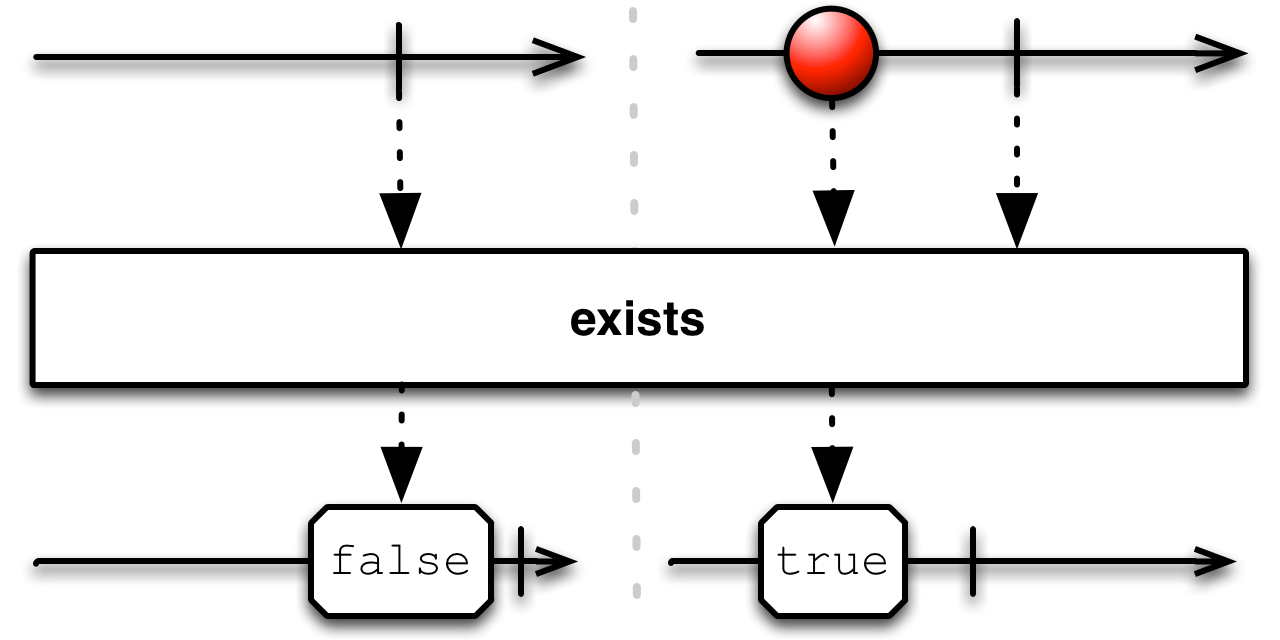
In Rx.Net this is the any Subscriber but we renamed it in RxJava to better match Java naming
idioms.
- Backpressure:
- The operator honors backpressure from downstream and consumes the source
Publisherin an unbounded manner (i.e., no backpressure applied to it). - Scheduler:
anydoes not operate by default on a particularScheduler.
Parameters
| predicate | the condition to test items emitted by the source Publisher |
|---|
Returns
- a Single that emits a Boolean that indicates whether any item emitted by the source
Publisher satisfies the
predicate
public final T blockingFirst (T defaultItem)
Returns the first item emitted by this Flowable, or a default value if it emits no
items.
- Backpressure:
- The operator consumes the source
Flowablein an unbounded manner (i.e., no backpressure applied to it). - Scheduler:
blockingFirstdoes not operate by default on a particularScheduler.
Parameters
| defaultItem | a default value to return if this Flowable emits no items |
|---|
Returns
- the first item emitted by this
Flowable, or the default value if it emits no items
See Also
public final T blockingFirst ()
Returns the first item emitted by this Flowable, or throws
NoSuchElementException if it emits no items.
- Backpressure:
- The operator consumes the source
Flowablein an unbounded manner (i.e., no backpressure applied to it). - Scheduler:
blockingFirstdoes not operate by default on a particularScheduler.
Returns
- the first item emitted by this
Flowable
Throws
| NoSuchElementException | if this Flowable emits no items |
|---|
See Also
public final void blockingForEach (Consumer<? super T> onNext)
Invokes a method on each item emitted by this Flowable and blocks until the Flowable
completes.
Note: This will block even if the underlying Flowable is asynchronous.
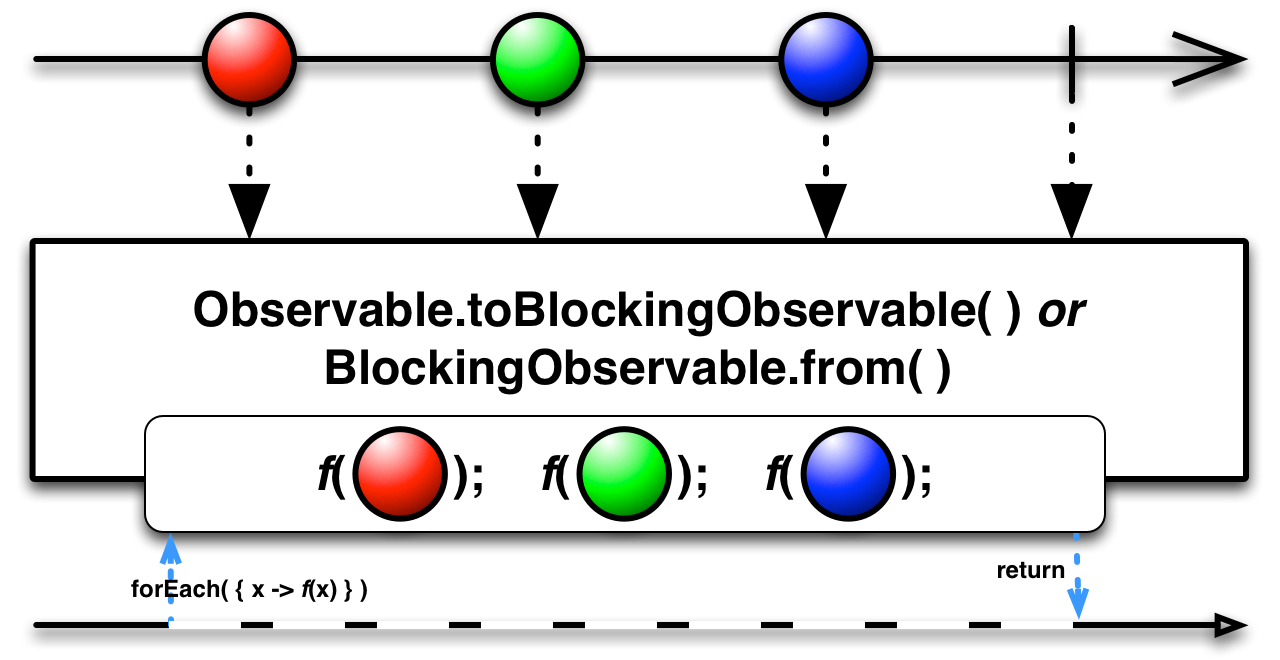
This is similar to subscribe(Subscriber), but it blocks. Because it blocks it does not
need the onComplete() or onError(Throwable) methods. If the
underlying Flowable terminates with an error, rather than calling onError, this method will
throw an exception.
The difference between this method and subscribe(Consumer) is that the onNext action
is executed on the emission thread instead of the current thread.
- Backpressure:
- The operator consumes the source
Flowablein an unbounded manner (i.e., no backpressure applied to it). - Scheduler:
blockingForEachdoes not operate by default on a particularScheduler.
Parameters
| onNext | the Consumer to invoke for each item emitted by the Flowable |
|---|
Throws
| RuntimeException | if an error occurs |
|---|
public final Iterable<T> blockingIterable (int bufferSize)
Converts this Flowable into an Iterable.
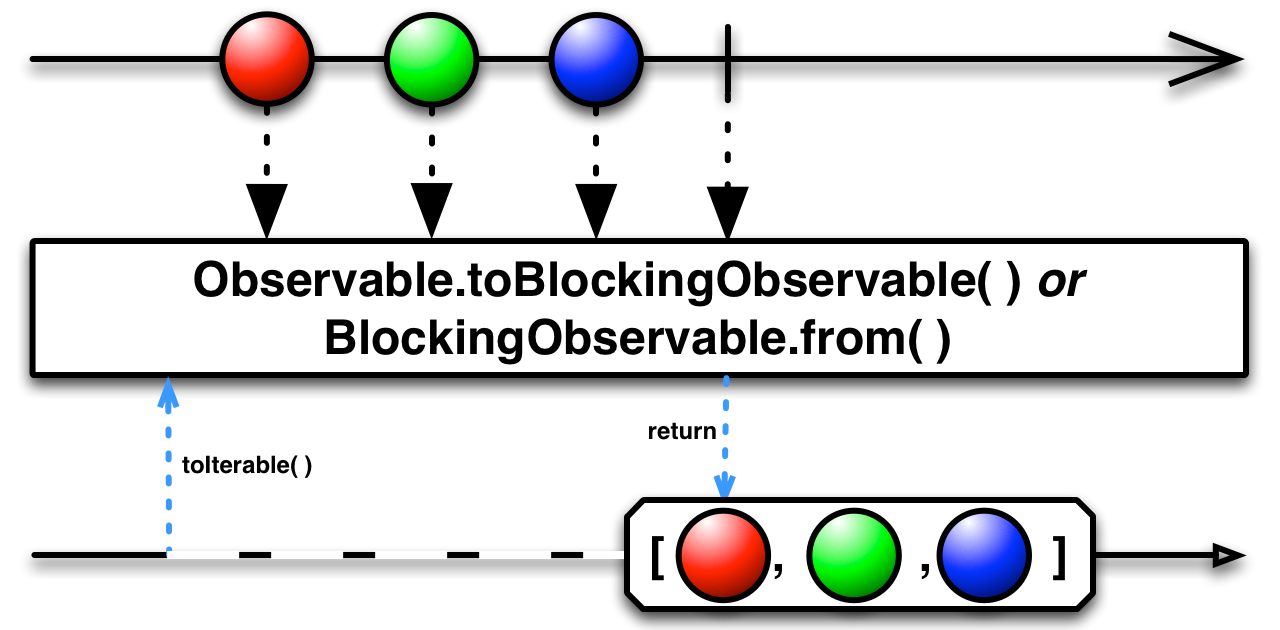
- Backpressure:
- The operator expects the upstream to honor backpressure otherwise the returned
Iterable's iterator will throw a
MissingBackpressureException. - Scheduler:
blockingIterabledoes not operate by default on a particularScheduler.
Parameters
| bufferSize | the number of items to prefetch from the current Flowable |
|---|
Returns
- an
Iterableversion of thisFlowable
See Also
public final Iterable<T> blockingIterable ()
Converts this Flowable into an Iterable.

- Backpressure:
- The operator expects the upstream to honor backpressure otherwise the returned
Iterable's iterator will throw a
MissingBackpressureException. - Scheduler:
blockingIterabledoes not operate by default on a particularScheduler.
Returns
- an
Iterableversion of thisFlowable
See Also
public final T blockingLast ()
Returns the last item emitted by this Flowable, or throws
NoSuchElementException if this Flowable emits no items.
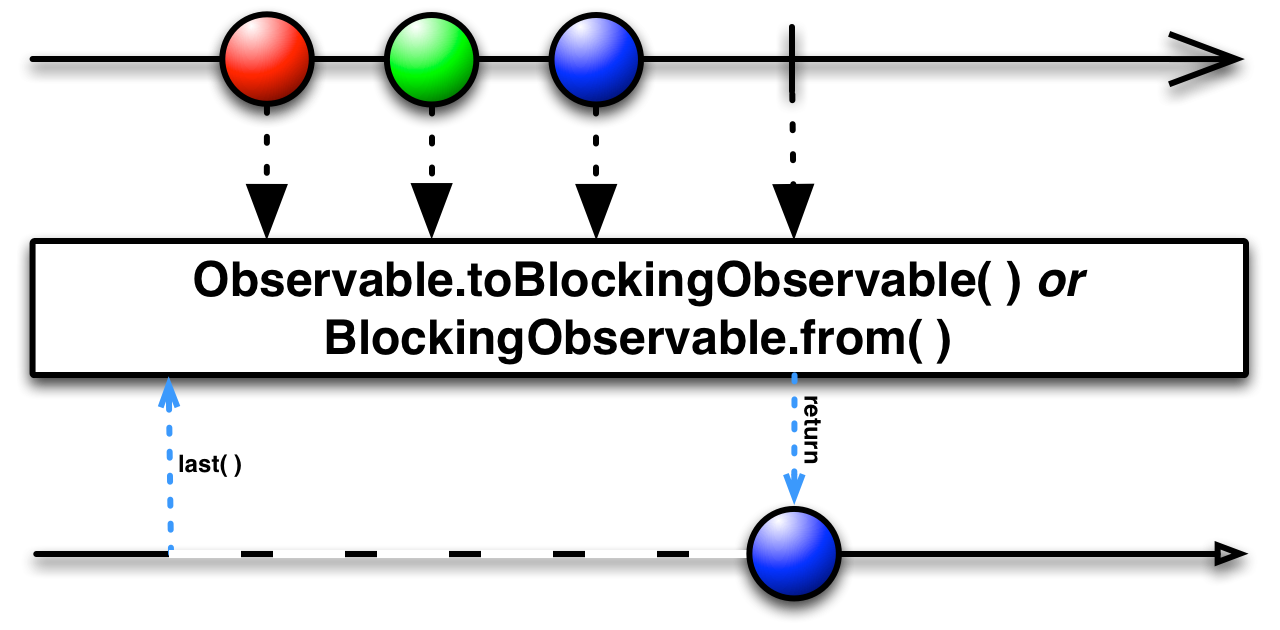
- Backpressure:
- The operator consumes the source
Flowablein an unbounded manner (i.e., no backpressure applied to it). - Scheduler:
blockingLastdoes not operate by default on a particularScheduler.
Returns
- the last item emitted by this
Flowable
Throws
| NoSuchElementException | if this Flowable emits no items |
|---|
See Also
public final T blockingLast (T defaultItem)
Returns the last item emitted by this Flowable, or a default value if it emits no
items.
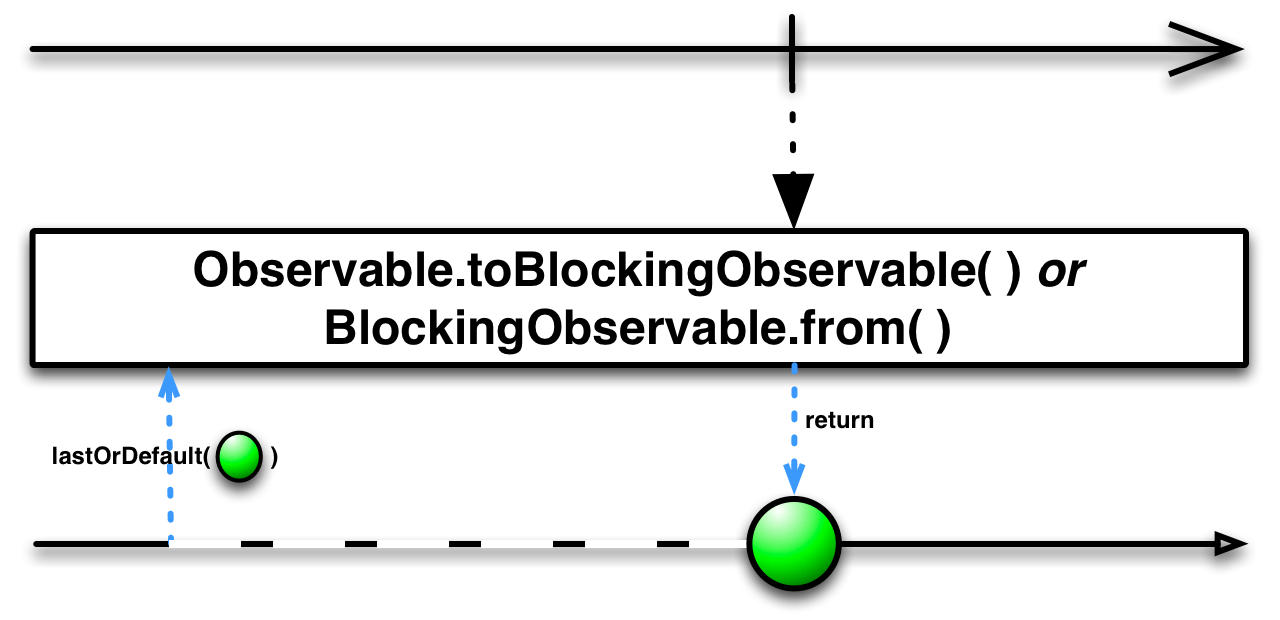
- Backpressure:
- The operator consumes the source
Flowablein an unbounded manner (i.e., no backpressure applied to it). - Scheduler:
blockingLastdoes not operate by default on a particularScheduler.
Parameters
| defaultItem | a default value to return if this Flowable emits no items |
|---|
Returns
- the last item emitted by the
Flowable, or the default value if it emits no items
See Also
public final Iterable<T> blockingLatest ()
Returns an Iterable that returns the latest item emitted by this Flowable,
waiting if necessary for one to become available.
If this Flowable produces items faster than Iterator.next takes them,
onNext events might be skipped, but onError or onComplete events are not.
Note also that an onNext directly followed by onComplete might hide the onNext
event.
- Backpressure:
- The operator consumes the source
Flowablein an unbounded manner (i.e., no backpressure applied to it). - Scheduler:
blockingLatestdoes not operate by default on a particularScheduler.
Returns
- an Iterable that always returns the latest item emitted by this
Flowable
See Also
public final Iterable<T> blockingMostRecent (T initialItem)
Returns an Iterable that always returns the item most recently emitted by this
Flowable.

- Backpressure:
- The operator consumes the source
Flowablein an unbounded manner (i.e., no backpressure applied to it). - Scheduler:
blockingMostRecentdoes not operate by default on a particularScheduler.
Parameters
| initialItem | the initial item that the Iterable sequence will yield if this
Flowable has not yet emitted an item |
|---|
Returns
- an
Iterablethat on each iteration returns the item that thisFlowablehas most recently emitted
See Also
public final Iterable<T> blockingNext ()
Returns an Iterable that blocks until this Flowable emits another item, then
returns that item.

- Backpressure:
- The operator consumes the source
Flowablein an unbounded manner (i.e., no backpressure applied to it). - Scheduler:
blockingNextdoes not operate by default on a particularScheduler.
Returns
- an
Iterablethat blocks upon each iteration until thisFlowableemits a new item, whereupon the Iterable returns that item
See Also
public final T blockingSingle (T defaultItem)
If this Flowable completes after emitting a single item, return that item; if it emits
more than one item, throw an IllegalArgumentException; if it emits no items, return a default
value.
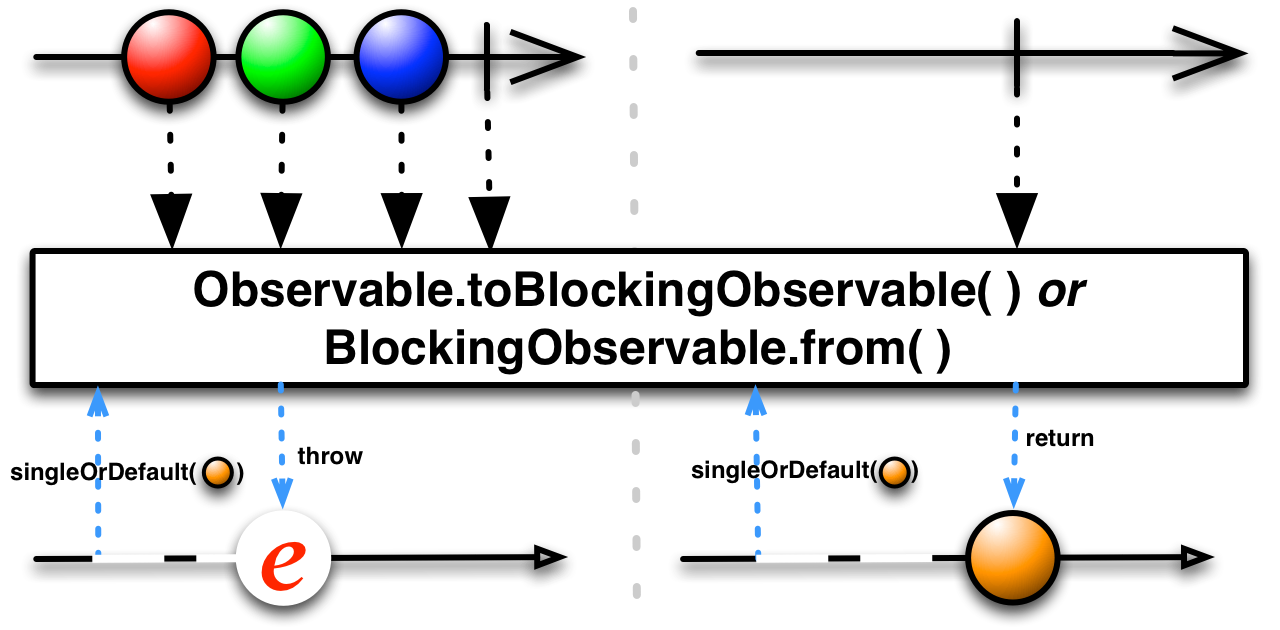
- Backpressure:
- The operator consumes the source
Flowablein an unbounded manner (i.e., no backpressure applied to it). - Scheduler:
blockingSingledoes not operate by default on a particularScheduler.
Parameters
| defaultItem | a default value to return if this Flowable emits no items |
|---|
Returns
- the single item emitted by this
Flowable, or the default value if it emits no items
See Also
public final T blockingSingle ()
If this Flowable completes after emitting a single item, return that item, otherwise
throw a NoSuchElementException.
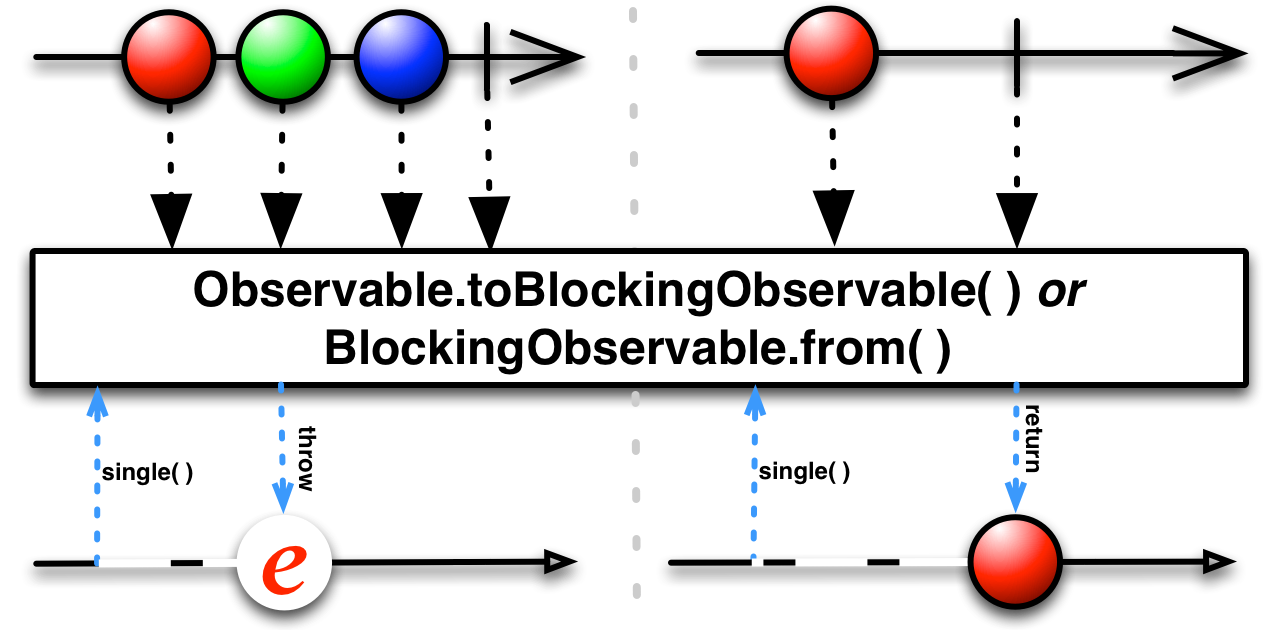
- Backpressure:
- The operator consumes the source
Flowablein an unbounded manner (i.e., no backpressure applied to it). - Scheduler:
blockingSingledoes not operate by default on a particularScheduler.
Returns
- the single item emitted by this
Flowable
See Also
public final void blockingSubscribe (Consumer<? super T> onNext)
Subscribes to the source and calls the given callbacks on the current thread.
If the Flowable emits an error, it is wrapped into an
OnErrorNotImplementedException
and routed to the RxJavaPlugins.onError handler.
- Backpressure:
- The operator consumes the source
Flowablein an unbounded manner (i.e., no backpressure applied to it). - Scheduler:
blockingSubscribedoes not operate by default on a particularScheduler.
Parameters
| onNext | the callback action for each source value |
|---|
public final void blockingSubscribe (Consumer<? super T> onNext, Consumer<? super Throwable> onError)
Subscribes to the source and calls the given callbacks on the current thread.
- Backpressure:
- The operator consumes the source
Flowablein an unbounded manner (i.e., no backpressure applied to it). - Scheduler:
blockingSubscribedoes not operate by default on a particularScheduler.
Parameters
| onNext | the callback action for each source value |
|---|---|
| onError | the callback action for an error event |
public final void blockingSubscribe ()
Runs the source observable to a terminal event, ignoring any values and rethrowing any exception.
- Backpressure:
- The operator consumes the source
Flowablein an unbounded manner (i.e., no backpressure applied to it). - Scheduler:
blockingSubscribedoes not operate by default on a particularScheduler.
public final void blockingSubscribe (Consumer<? super T> onNext, Consumer<? super Throwable> onError, Action onComplete)
Subscribes to the source and calls the given callbacks on the current thread.
- Backpressure:
- The operator consumes the source
Flowablein an unbounded manner (i.e., no backpressure applied to it). - Scheduler:
blockingSubscribedoes not operate by default on a particularScheduler.
Parameters
| onNext | the callback action for each source value |
|---|---|
| onError | the callback action for an error event |
| onComplete | the callback action for the completion event. |
public final void blockingSubscribe (Subscriber<? super T> subscriber)
Subscribes to the source and calls the Subscriber methods on the current thread.
- Backpressure:
- The supplied
Subscriberdetermines how backpressure is applied. - Scheduler:
blockingSubscribedoes not operate by default on a particularScheduler.
Parameters
| subscriber | the subscriber to forward events and calls to in the current thread |
|---|
public final Flowable<U> buffer (long timespan, long timeskip, TimeUnit unit, Scheduler scheduler, Callable<U> bufferSupplier)
Returns a Flowable that emits buffers of items it collects from the source Publisher. The resulting
Publisher starts a new buffer periodically, as determined by the timeskip argument, and on the
specified scheduler. It emits each buffer after a fixed timespan, specified by the
timespan argument. When the source Publisher completes or encounters an error, the resulting
Publisher emits the current buffer and propagates the notification from the source Publisher.
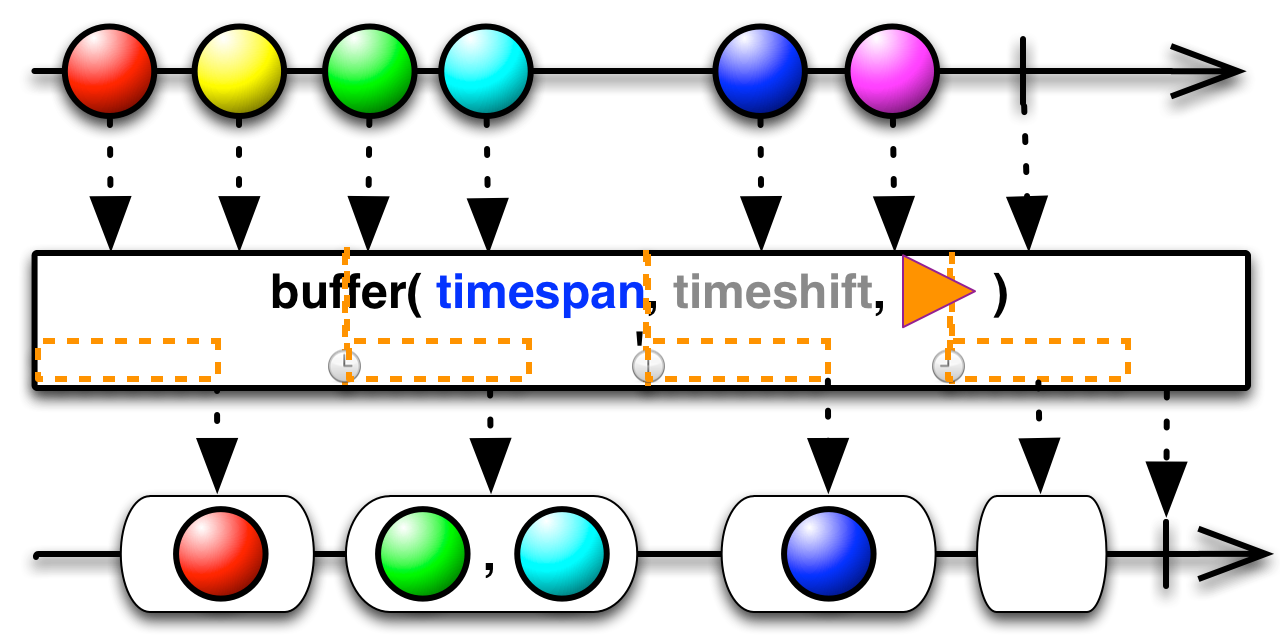
- Backpressure:
- This operator does not support backpressure as it uses time. It requests
Long.MAX_VALUEupstream and does not obey downstream requests. - Scheduler:
- You specify which
Schedulerthis operator will use
Parameters
| timespan | the period of time each buffer collects items before it is emitted |
|---|---|
| timeskip | the period of time after which a new buffer will be created |
| unit | the unit of time that applies to the timespan and timeskip arguments |
| scheduler | the Scheduler to use when determining the end and start of a buffer |
| bufferSupplier | a factory function that returns an instance of the collection subclass to be used and returned as the buffer |
Returns
- a Flowable that emits new buffers of items emitted by the source Publisher periodically after a fixed timespan has elapsed
public final Flowable<List<T>> buffer (Callable<? extends Publisher<B>> boundaryIndicatorSupplier)
Returns a Flowable that emits buffers of items it collects from the source Publisher. The resulting
Publisher emits connected, non-overlapping buffers. It emits the current buffer and replaces it with a
new buffer whenever the Publisher produced by the specified closingIndicator emits an item.
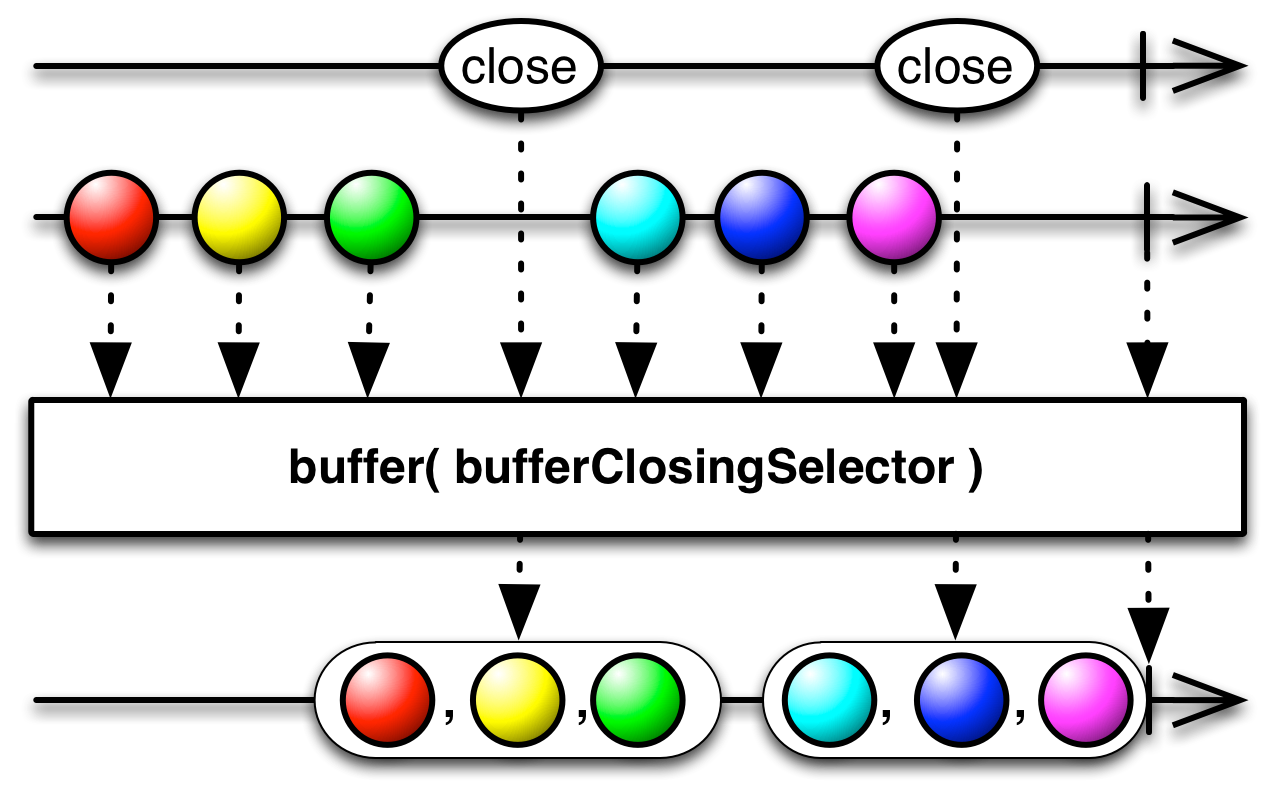
- Backpressure:
- This operator does not support backpressure as it is instead controlled by the given Publishers and
buffers data. It requests
Long.MAX_VALUEupstream and does not obey downstream requests. - Scheduler:
- This version of
bufferdoes not operate by default on a particularScheduler.
Parameters
| boundaryIndicatorSupplier | a Callable that produces a Publisher that governs the boundary between buffers.
Whenever the source Publisher emits an item, buffer emits the current buffer and
begins to fill a new one |
|---|
Returns
- a Flowable that emits a connected, non-overlapping buffer of items from the source Publisher
each time the Publisher created with the
closingIndicatorargument emits an item
public final Flowable<List<T>> buffer (long timespan, long timeskip, TimeUnit unit, Scheduler scheduler)
Returns a Flowable that emits buffers of items it collects from the source Publisher. The resulting
Publisher starts a new buffer periodically, as determined by the timeskip argument, and on the
specified scheduler. It emits each buffer after a fixed timespan, specified by the
timespan argument. When the source Publisher completes or encounters an error, the resulting
Publisher emits the current buffer and propagates the notification from the source Publisher.

- Backpressure:
- This operator does not support backpressure as it uses time. It requests
Long.MAX_VALUEupstream and does not obey downstream requests. - Scheduler:
- You specify which
Schedulerthis operator will use
Parameters
| timespan | the period of time each buffer collects items before it is emitted |
|---|---|
| timeskip | the period of time after which a new buffer will be created |
| unit | the unit of time that applies to the timespan and timeskip arguments |
| scheduler | the Scheduler to use when determining the end and start of a buffer |
Returns
- a Flowable that emits new buffers of items emitted by the source Publisher periodically after a fixed timespan has elapsed
public final Flowable<U> buffer (int count, Callable<U> bufferSupplier)
Returns a Flowable that emits buffers of items it collects from the source Publisher. The resulting
Publisher emits connected, non-overlapping buffers, each containing count items. When the source
Publisher completes or encounters an error, the resulting Publisher emits the current buffer and
propagates the notification from the source Publisher.
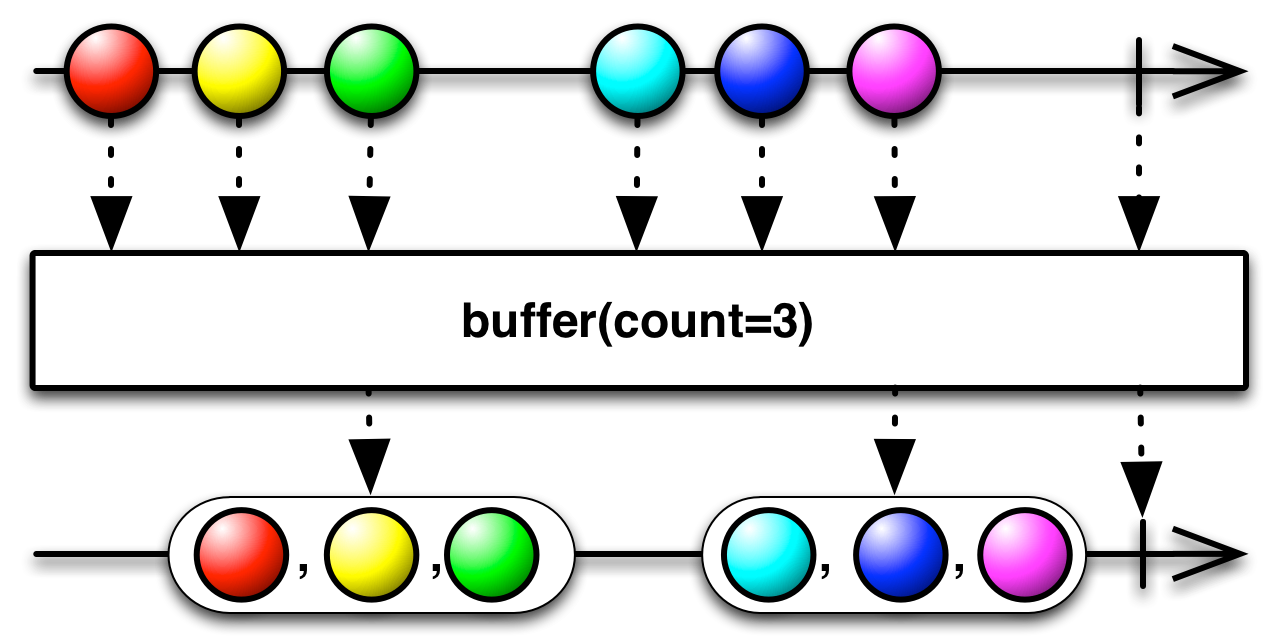
- Backpressure:
- The operator honors backpressure from downstream and expects the source
Publisherto honor it as well, although not enforced; violation may lead toMissingBackpressureExceptionsomewhere downstream. - Scheduler:
- This version of
bufferdoes not operate by default on a particularScheduler.
Parameters
| count | the maximum number of items in each buffer before it should be emitted |
|---|---|
| bufferSupplier | a factory function that returns an instance of the collection subclass to be used and returned as the buffer |
Returns
- a Flowable that emits connected, non-overlapping buffers, each containing at most
countitems from the source Publisher
public final Flowable<U> buffer (Publisher<B> boundaryIndicator, Callable<U> bufferSupplier)
Returns a Flowable that emits non-overlapping buffered items from the source Publisher each time the specified boundary Publisher emits an item.
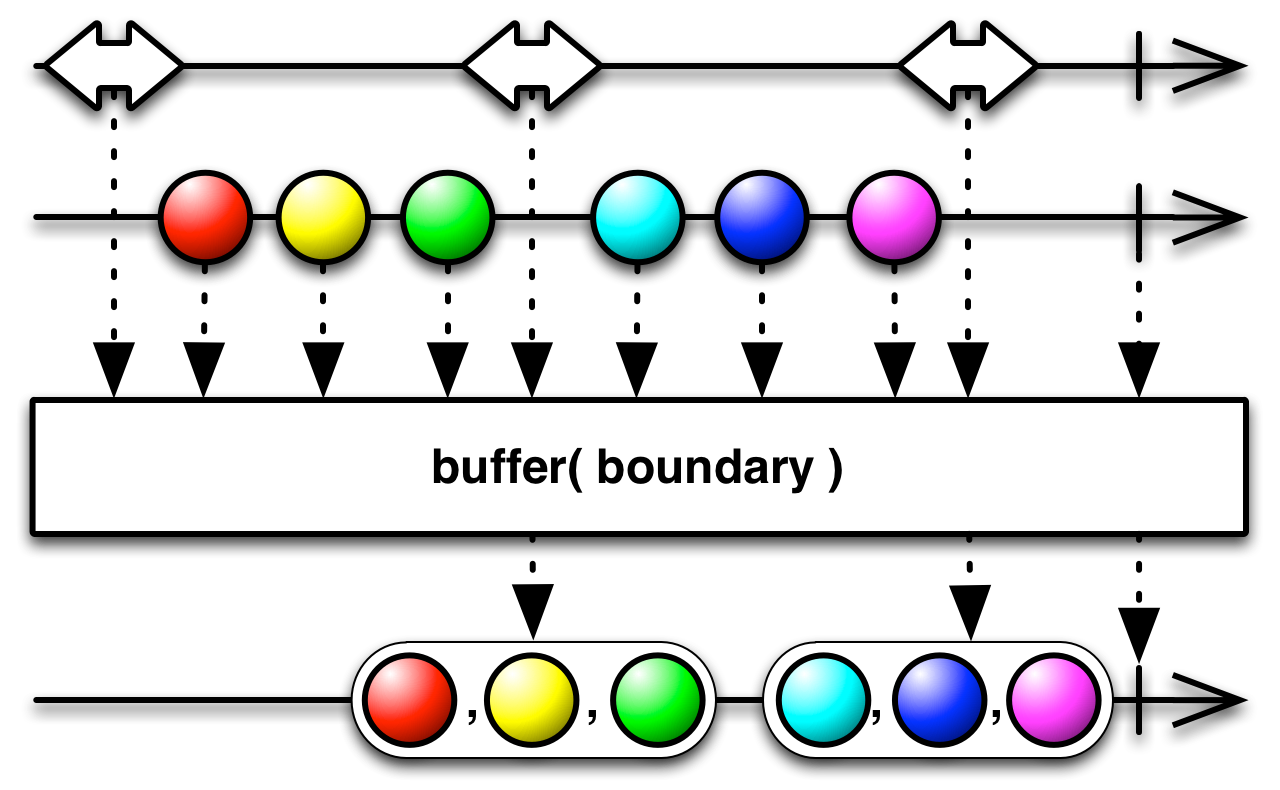
Completion of either the source or the boundary Publisher causes the returned Publisher to emit the latest buffer and complete.
- Backpressure:
- This operator does not support backpressure as it is instead controlled by the
Publisherboundaryand buffers data. It requestsLong.MAX_VALUEupstream and does not obey downstream requests. - Scheduler:
- This version of
bufferdoes not operate by default on a particularScheduler.
Parameters
| boundaryIndicator | the boundary Publisher |
|---|---|
| bufferSupplier | a factory function that returns an instance of the collection subclass to be used and returned as the buffer |
Returns
- a Flowable that emits buffered items from the source Publisher when the boundary Publisher emits an item
public final Flowable<List<T>> buffer (Publisher<B> boundaryIndicator, int initialCapacity)
Returns a Flowable that emits non-overlapping buffered items from the source Publisher each time the specified boundary Publisher emits an item.

Completion of either the source or the boundary Publisher causes the returned Publisher to emit the latest buffer and complete.
- Backpressure:
- This operator does not support backpressure as it is instead controlled by the
Publisherboundaryand buffers data. It requestsLong.MAX_VALUEupstream and does not obey downstream requests. - Scheduler:
- This version of
bufferdoes not operate by default on a particularScheduler.
Parameters
| boundaryIndicator | the boundary Publisher |
|---|---|
| initialCapacity | the initial capacity of each buffer chunk |
Returns
- a Flowable that emits buffered items from the source Publisher when the boundary Publisher emits an item
public final Flowable<List<T>> buffer (long timespan, TimeUnit unit, Scheduler scheduler)
Returns a Flowable that emits buffers of items it collects from the source Publisher. The resulting
Publisher emits connected, non-overlapping buffers, each of a fixed duration specified by the
timespan argument and on the specified scheduler. When the source Publisher completes or
encounters an error, the resulting Publisher emits the current buffer and propagates the notification
from the source Publisher.
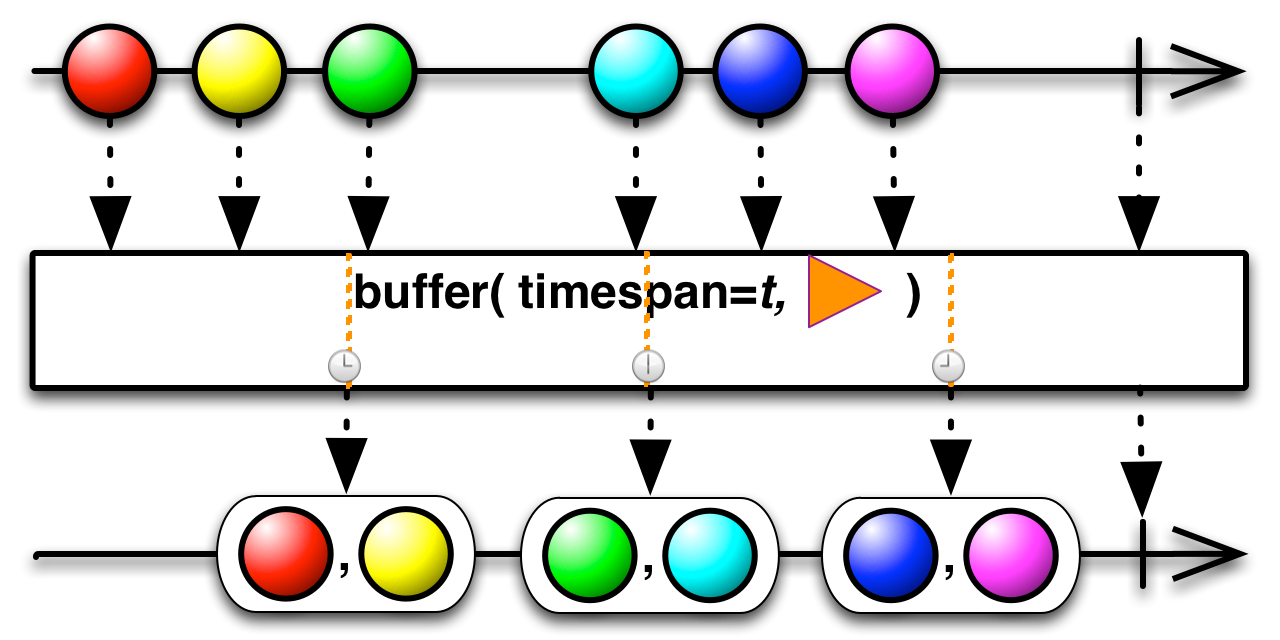
- Backpressure:
- This operator does not support backpressure as it uses time. It requests
Long.MAX_VALUEupstream and does not obey downstream requests. - Scheduler:
- You specify which
Schedulerthis operator will use
Parameters
| timespan | the period of time each buffer collects items before it is emitted and replaced with a new buffer |
|---|---|
| unit | the unit of time which applies to the timespan argument |
| scheduler | the Scheduler to use when determining the end and start of a buffer |
Returns
- a Flowable that emits connected, non-overlapping buffers of items emitted by the source Publisher within a fixed duration
public final Flowable<List<T>> buffer (int count)
Returns a Flowable that emits buffers of items it collects from the source Publisher. The resulting
Publisher emits connected, non-overlapping buffers, each containing count items. When the source
Publisher completes or encounters an error, the resulting Publisher emits the current buffer and
propagates the notification from the source Publisher.

- Backpressure:
- The operator honors backpressure from downstream and expects the source
Publisherto honor it as well, although not enforced; violation may lead toMissingBackpressureExceptionsomewhere downstream. - Scheduler:
- This version of
bufferdoes not operate by default on a particularScheduler.
Parameters
| count | the maximum number of items in each buffer before it should be emitted |
|---|
Returns
- a Flowable that emits connected, non-overlapping buffers, each containing at most
countitems from the source Publisher
public final Flowable<List<T>> buffer (long timespan, long timeskip, TimeUnit unit)
Returns a Flowable that emits buffers of items it collects from the source Publisher. The resulting
Publisher starts a new buffer periodically, as determined by the timeskip argument. It emits
each buffer after a fixed timespan, specified by the timespan argument. When the source
Publisher completes or encounters an error, the resulting Publisher emits the current buffer and
propagates the notification from the source Publisher.
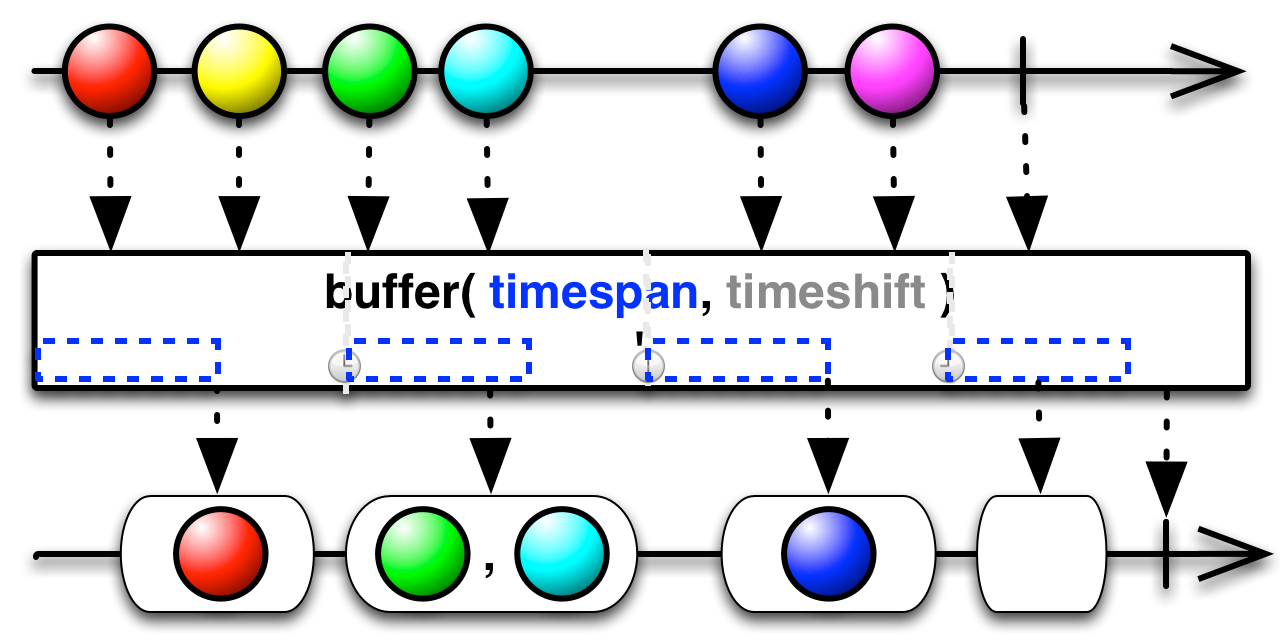
- Backpressure:
- This operator does not support backpressure as it uses time. It requests
Long.MAX_VALUEupstream and does not obey downstream requests. - Scheduler:
- This version of
bufferoperates by default on thecomputationScheduler.
Parameters
| timespan | the period of time each buffer collects items before it is emitted |
|---|---|
| timeskip | the period of time after which a new buffer will be created |
| unit | the unit of time that applies to the timespan and timeskip arguments |
Returns
- a Flowable that emits new buffers of items emitted by the source Publisher periodically after a fixed timespan has elapsed
public final Flowable<List<T>> buffer (Flowable<? extends TOpening> openingIndicator, Function<? super TOpening, ? extends Publisher<? extends TClosing>> closingIndicator)
Returns a Flowable that emits buffers of items it collects from the source Publisher. The resulting
Publisher emits buffers that it creates when the specified openingIndicator Publisher emits an
item, and closes when the Publisher returned from closingIndicator emits an item.
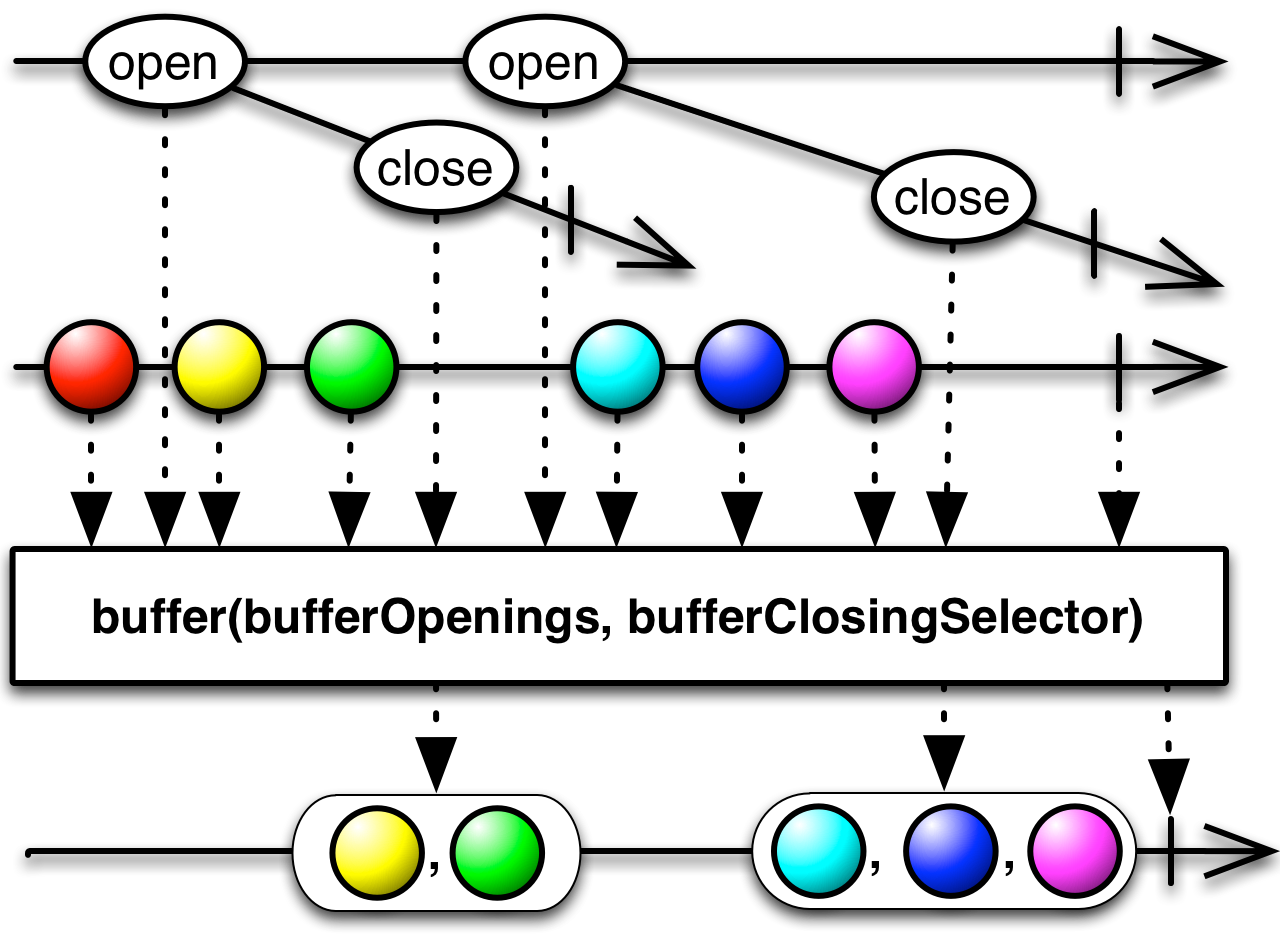
- Backpressure:
- This operator does not support backpressure as it is instead controlled by the given Publishers and
buffers data. It requests
Long.MAX_VALUEupstream and does not obey downstream requests. - Scheduler:
- This version of
bufferdoes not operate by default on a particularScheduler.
Parameters
| openingIndicator | the Publisher that, when it emits an item, causes a new buffer to be created |
|---|---|
| closingIndicator | the Function that is used to produce a Publisher for every buffer created. When this
Publisher emits an item, the associated buffer is emitted. |
Returns
- a Flowable that emits buffers, containing items from the source Publisher, that are created and closed when the specified Publishers emit items
public final Flowable<List<T>> buffer (long timespan, TimeUnit unit, Scheduler scheduler, int count)
Returns a Flowable that emits buffers of items it collects from the source Publisher. The resulting
Publisher emits connected, non-overlapping buffers, each of a fixed duration specified by the
timespan argument as measured on the specified scheduler, or a maximum size specified by
the count argument (whichever is reached first). When the source Publisher completes or
encounters an error, the resulting Publisher emits the current buffer and propagates the notification
from the source Publisher.
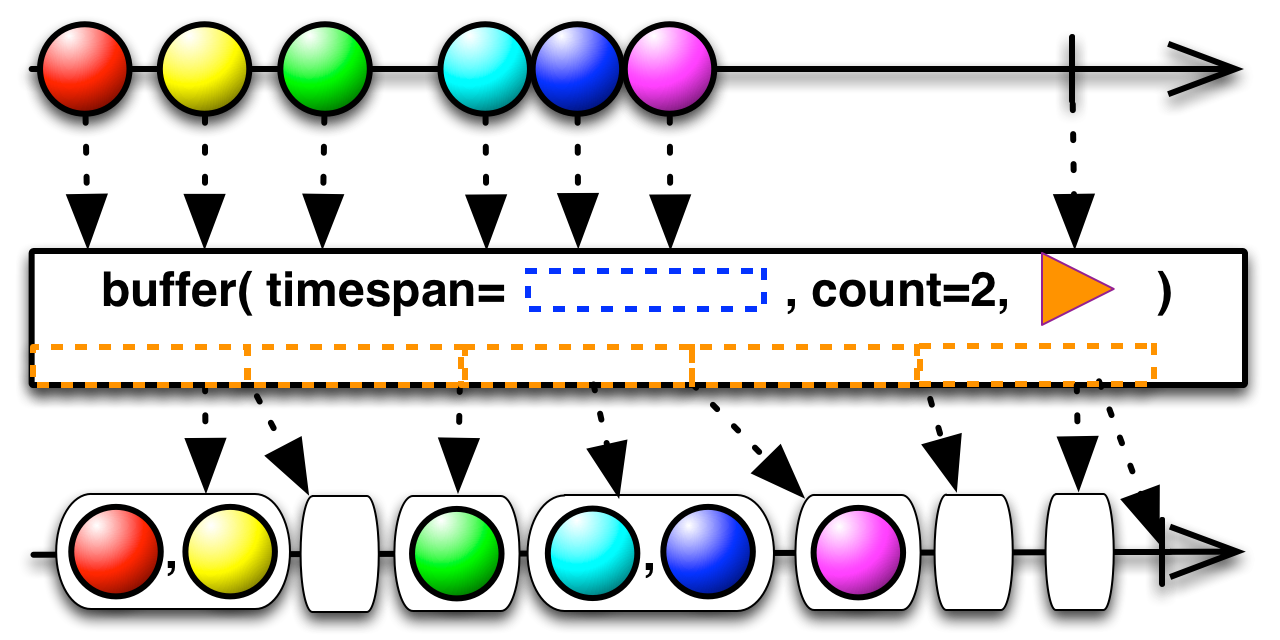
- Backpressure:
- This operator does not support backpressure as it uses time. It requests
Long.MAX_VALUEupstream and does not obey downstream requests. - Scheduler:
- You specify which
Schedulerthis operator will use
Parameters
| timespan | the period of time each buffer collects items before it is emitted and replaced with a new buffer |
|---|---|
| unit | the unit of time which applies to the timespan argument |
| scheduler | the Scheduler to use when determining the end and start of a buffer |
| count | the maximum size of each buffer before it is emitted |
Returns
- a Flowable that emits connected, non-overlapping buffers of items emitted by the source Publisher after a fixed duration or when the buffer reaches maximum capacity (whichever occurs first)
public final Flowable<List<T>> buffer (long timespan, TimeUnit unit)
Returns a Flowable that emits buffers of items it collects from the source Publisher. The resulting
Publisher emits connected, non-overlapping buffers, each of a fixed duration specified by the
timespan argument. When the source Publisher completes or encounters an error, the resulting
Publisher emits the current buffer and propagates the notification from the source Publisher.
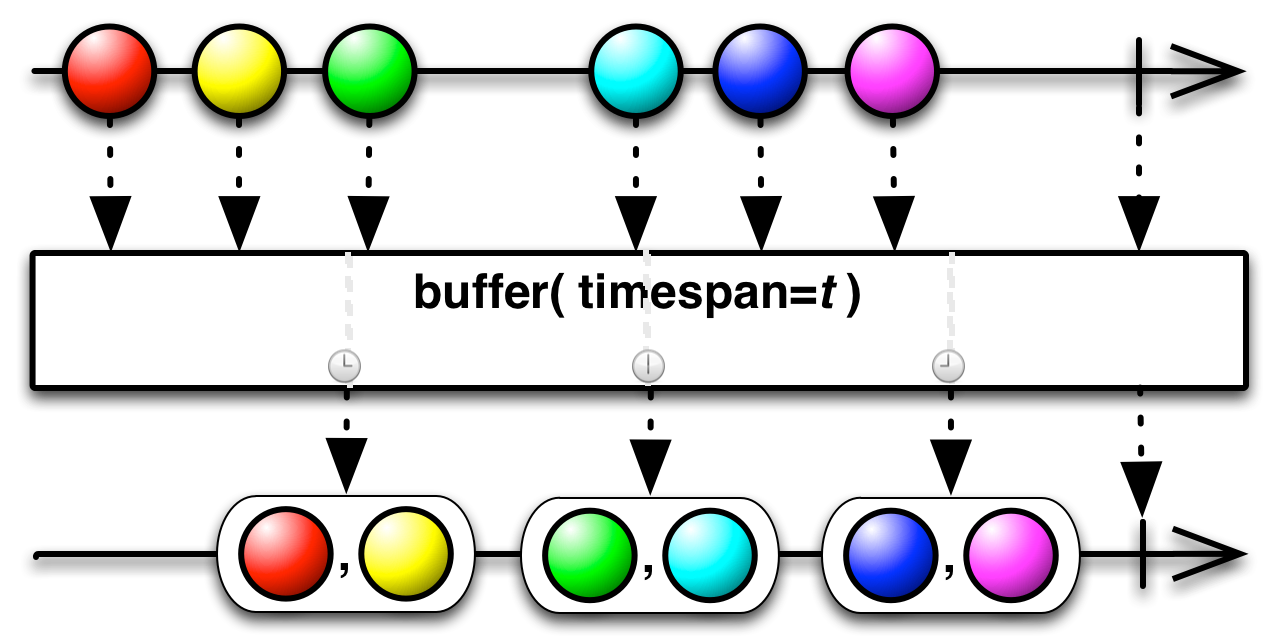
- Backpressure:
- This operator does not support backpressure as it uses time. It requests
Long.MAX_VALUEupstream and does not obey downstream requests. - Scheduler:
- This version of
bufferoperates by default on thecomputationScheduler.
Parameters
| timespan | the period of time each buffer collects items before it is emitted and replaced with a new buffer |
|---|---|
| unit | the unit of time that applies to the timespan argument |
Returns
- a Flowable that emits connected, non-overlapping buffers of items emitted by the source Publisher within a fixed duration
public final Flowable<U> buffer (long timespan, TimeUnit unit, Scheduler scheduler, int count, Callable<U> bufferSupplier, boolean restartTimerOnMaxSize)
Returns a Flowable that emits buffers of items it collects from the source Publisher. The resulting
Publisher emits connected, non-overlapping buffers, each of a fixed duration specified by the
timespan argument as measured on the specified scheduler, or a maximum size specified by
the count argument (whichever is reached first). When the source Publisher completes or
encounters an error, the resulting Publisher emits the current buffer and propagates the notification
from the source Publisher.

- Backpressure:
- This operator does not support backpressure as it uses time. It requests
Long.MAX_VALUEupstream and does not obey downstream requests. - Scheduler:
- You specify which
Schedulerthis operator will use
Parameters
| timespan | the period of time each buffer collects items before it is emitted and replaced with a new buffer |
|---|---|
| unit | the unit of time which applies to the timespan argument |
| scheduler | the Scheduler to use when determining the end and start of a buffer |
| count | the maximum size of each buffer before it is emitted |
| bufferSupplier | a factory function that returns an instance of the collection subclass to be used and returned as the buffer |
| restartTimerOnMaxSize | if true the time window is restarted when the max capacity of the current buffer is reached |
Returns
- a Flowable that emits connected, non-overlapping buffers of items emitted by the source Publisher after a fixed duration or when the buffer reaches maximum capacity (whichever occurs first)
public final Flowable<List<T>> buffer (int count, int skip)
Returns a Flowable that emits buffers of items it collects from the source Publisher. The resulting
Publisher emits buffers every skip items, each containing count items. When the source
Publisher completes or encounters an error, the resulting Publisher emits the current buffer and
propagates the notification from the source Publisher.
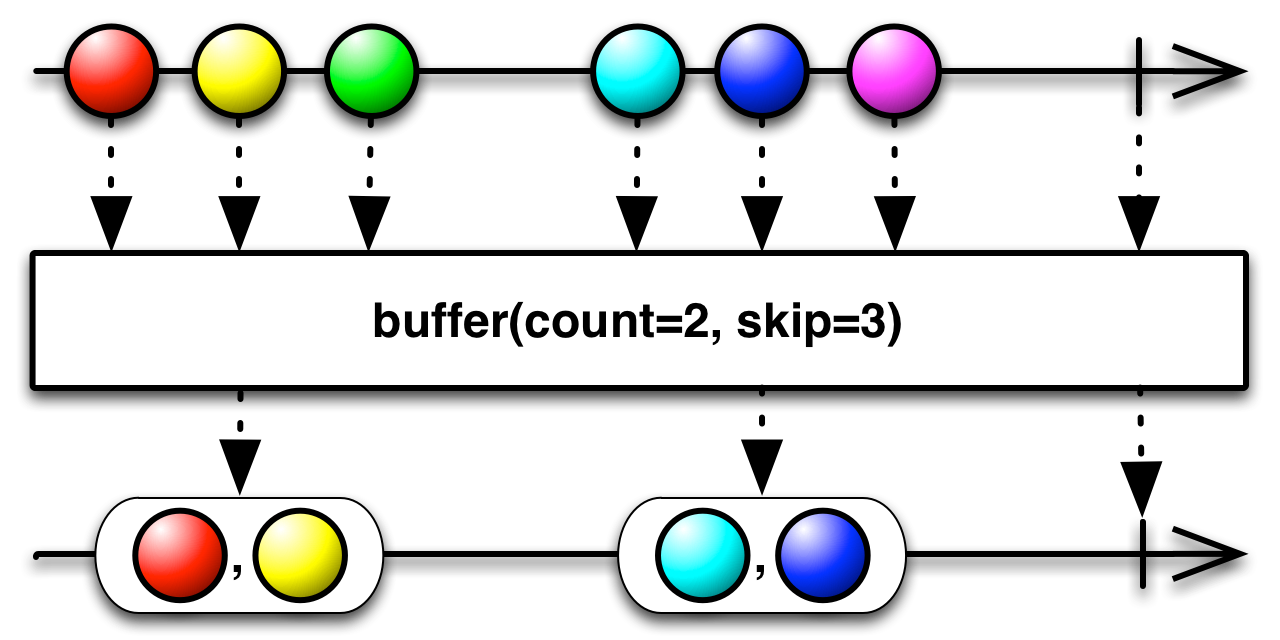
- Backpressure:
- The operator honors backpressure from downstream and expects the source
Publisherto honor it as well, although not enforced; violation may lead toMissingBackpressureExceptionsomewhere downstream. - Scheduler:
- This version of
bufferdoes not operate by default on a particularScheduler.
Parameters
| count | the maximum size of each buffer before it should be emitted |
|---|---|
| skip | how many items emitted by the source Publisher should be skipped before starting a new
buffer. Note that when skip and count are equal, this is the same operation as
buffer(int). |
Returns
- a Flowable that emits buffers for every
skipitem from the source Publisher and containing at mostcountitems
public final Flowable<List<T>> buffer (Publisher<B> boundaryIndicator)
Returns a Flowable that emits non-overlapping buffered items from the source Publisher each time the specified boundary Publisher emits an item.

Completion of either the source or the boundary Publisher causes the returned Publisher to emit the latest buffer and complete.
- Backpressure:
- This operator does not support backpressure as it is instead controlled by the
Publisherboundaryand buffers data. It requestsLong.MAX_VALUEupstream and does not obey downstream requests. - Scheduler:
- This version of
bufferdoes not operate by default on a particularScheduler.
Parameters
| boundaryIndicator | the boundary Publisher |
|---|
Returns
- a Flowable that emits buffered items from the source Publisher when the boundary Publisher emits an item
public final Flowable<U> buffer (Flowable<? extends TOpening> openingIndicator, Function<? super TOpening, ? extends Publisher<? extends TClosing>> closingIndicator, Callable<U> bufferSupplier)
Returns a Flowable that emits buffers of items it collects from the source Publisher. The resulting
Publisher emits buffers that it creates when the specified openingIndicator Publisher emits an
item, and closes when the Publisher returned from closingIndicator emits an item.

- Backpressure:
- This operator does not support backpressure as it is instead controlled by the given Publishers and
buffers data. It requests
Long.MAX_VALUEupstream and does not obey downstream requests. - Scheduler:
- This version of
bufferdoes not operate by default on a particularScheduler.
Parameters
| openingIndicator | the Publisher that, when it emits an item, causes a new buffer to be created |
|---|---|
| closingIndicator | the Function that is used to produce a Publisher for every buffer created. When this
Publisher emits an item, the associated buffer is emitted. |
| bufferSupplier | a factory function that returns an instance of the collection subclass to be used and returned as the buffer |
Returns
- a Flowable that emits buffers, containing items from the source Publisher, that are created and closed when the specified Publishers emit items
public final Flowable<U> buffer (Callable<? extends Publisher<B>> boundaryIndicatorSupplier, Callable<U> bufferSupplier)
Returns a Flowable that emits buffers of items it collects from the source Publisher. The resulting
Publisher emits connected, non-overlapping buffers. It emits the current buffer and replaces it with a
new buffer whenever the Publisher produced by the specified closingIndicator emits an item.

- Backpressure:
- This operator does not support backpressure as it is instead controlled by the given Publishers and
buffers data. It requests
Long.MAX_VALUEupstream and does not obey downstream requests. - Scheduler:
- This version of
bufferdoes not operate by default on a particularScheduler.
Parameters
| boundaryIndicatorSupplier | a Callable that produces a Publisher that governs the boundary between buffers.
Whenever the source Publisher emits an item, buffer emits the current buffer and
begins to fill a new one |
|---|---|
| bufferSupplier | a factory function that returns an instance of the collection subclass to be used and returned as the buffer |
Returns
- a Flowable that emits a connected, non-overlapping buffer of items from the source Publisher
each time the Publisher created with the
closingIndicatorargument emits an item
public final Flowable<List<T>> buffer (long timespan, TimeUnit unit, int count)
Returns a Flowable that emits buffers of items it collects from the source Publisher. The resulting
Publisher emits connected, non-overlapping buffers, each of a fixed duration specified by the
timespan argument or a maximum size specified by the count argument (whichever is reached
first). When the source Publisher completes or encounters an error, the resulting Publisher emits the
current buffer and propagates the notification from the source Publisher.
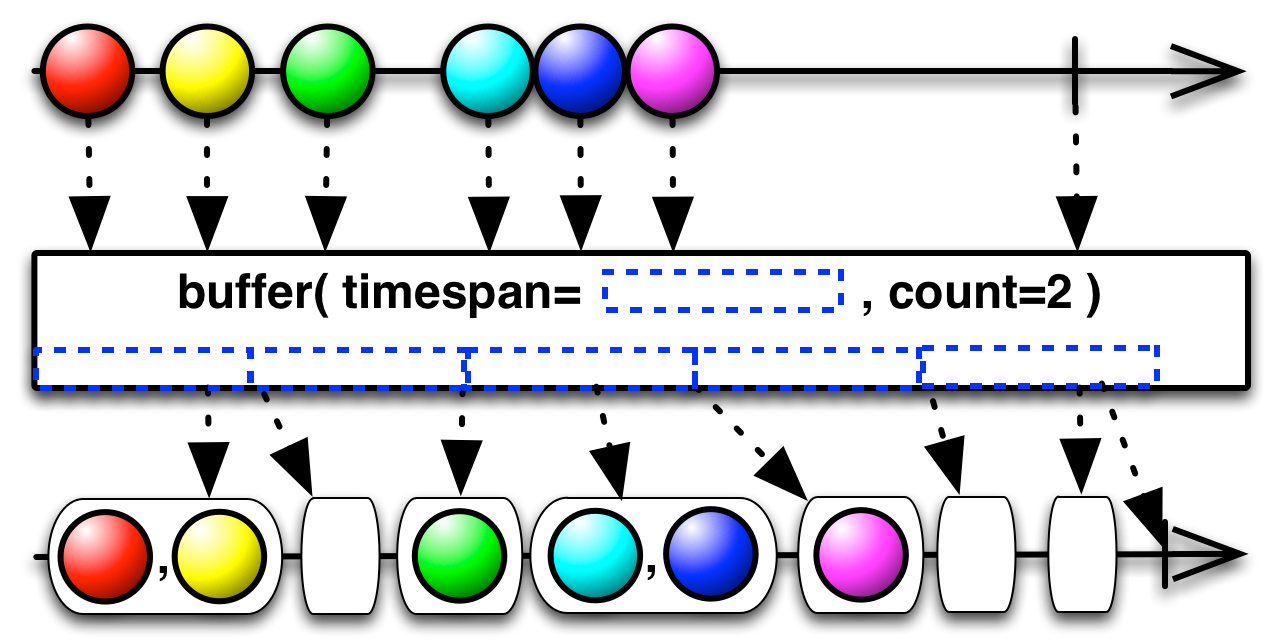
- Backpressure:
- This operator does not support backpressure as it uses time. It requests
Long.MAX_VALUEupstream and does not obey downstream requests. - Scheduler:
- This version of
bufferoperates by default on thecomputationScheduler.
Parameters
| timespan | the period of time each buffer collects items before it is emitted and replaced with a new buffer |
|---|---|
| unit | the unit of time which applies to the timespan argument |
| count | the maximum size of each buffer before it is emitted |
Returns
- a Flowable that emits connected, non-overlapping buffers of items emitted by the source Publisher, after a fixed duration or when the buffer reaches maximum capacity (whichever occurs first)
public final Flowable<U> buffer (int count, int skip, Callable<U> bufferSupplier)
Returns a Flowable that emits buffers of items it collects from the source Publisher. The resulting
Publisher emits buffers every skip items, each containing count items. When the source
Publisher completes or encounters an error, the resulting Publisher emits the current buffer and
propagates the notification from the source Publisher.

- Backpressure:
- The operator honors backpressure from downstream and expects the source
Publisherto honor it as well, although not enforced; violation may lead toMissingBackpressureExceptionsomewhere downstream. - Scheduler:
- This version of
bufferdoes not operate by default on a particularScheduler.
Parameters
| count | the maximum size of each buffer before it should be emitted |
|---|---|
| skip | how many items emitted by the source Publisher should be skipped before starting a new
buffer. Note that when skip and count are equal, this is the same operation as
buffer(int). |
| bufferSupplier | a factory function that returns an instance of the collection subclass to be used and returned as the buffer |
Returns
- a Flowable that emits buffers for every
skipitem from the source Publisher and containing at mostcountitems
public static int bufferSize ()
Returns the default internal buffer size used by most async operators.
The value can be overridden via system parameter rx2.buffer-size
before the Flowable class is loaded.
Returns
- the default internal buffer size.
public final Flowable<T> cache ()
Returns a Flowable that subscribes to this Publisher lazily, caches all of its events and replays them, in the same order as received, to all the downstream subscribers.

This is useful when you want a Publisher to cache responses and you can't control the subscribe/cancel behavior of all the Subscribers.
The operator subscribes only when the first downstream subscriber subscribes and maintains
a single subscription towards this Publisher. In contrast, the operator family of replay()
that return a ConnectableFlowable require an explicit call to connect().
Note: You sacrifice the ability to cancel the origin when you use the cache
Subscriber so be careful not to use this Subscriber on Publishers that emit an infinite or very large number
of items that will use up memory.
A possible workaround is to apply `takeUntil` with a predicate or
another source before (and perhaps after) the application of cache().
AtomicBoolean shouldStop = new AtomicBoolean();
source.takeUntil(v -> shouldStop.get())
.cache()
.takeUntil(v -> shouldStop.get())
.subscribe(...);
onTerminateDetach() applied along with the previous
workaround:
AtomicBoolean shouldStop = new AtomicBoolean();
source.takeUntil(v -> shouldStop.get())
.onTerminateDetach()
.cache()
.takeUntil(v -> shouldStop.get())
.onTerminateDetach()
.subscribe(...);
- Backpressure:
- The operator consumes this Publisher in an unbounded fashion but respects the backpressure of each downstream Subscriber individually.
- Scheduler:
cachedoes not operate by default on a particularScheduler.
Returns
- a Flowable that, when first subscribed to, caches all of its items and notifications for the benefit of subsequent subscribers
public final Flowable<T> cacheWithInitialCapacity (int initialCapacity)
Returns a Flowable that subscribes to this Publisher lazily, caches all of its events and replays them, in the same order as received, to all the downstream subscribers.

This is useful when you want a Publisher to cache responses and you can't control the subscribe/cancel behavior of all the Subscribers.
The operator subscribes only when the first downstream subscriber subscribes and maintains
a single subscription towards this Publisher. In contrast, the operator family of replay()
that return a ConnectableFlowable require an explicit call to connect().
Note: You sacrifice the ability to cancel the origin when you use the cache
Subscriber so be careful not to use this Subscriber on Publishers that emit an infinite or very large number
of items that will use up memory.
A possible workaround is to apply `takeUntil` with a predicate or
another source before (and perhaps after) the application of cache().
AtomicBoolean shouldStop = new AtomicBoolean();
source.takeUntil(v -> shouldStop.get())
.cache()
.takeUntil(v -> shouldStop.get())
.subscribe(...);
onTerminateDetach() applied along with the previous
workaround:
AtomicBoolean shouldStop = new AtomicBoolean();
source.takeUntil(v -> shouldStop.get())
.onTerminateDetach()
.cache()
.takeUntil(v -> shouldStop.get())
.onTerminateDetach()
.subscribe(...);
- Backpressure:
- The operator consumes this Publisher in an unbounded fashion but respects the backpressure of each downstream Subscriber individually.
- Scheduler:
cacheWithInitialCapacitydoes not operate by default on a particularScheduler.
Note: The capacity hint is not an upper bound on cache size. For that, consider
replay(int) in combination with autoConnect() or similar.
Parameters
| initialCapacity | hint for number of items to cache (for optimizing underlying data structure) |
|---|
Returns
- a Flowable that, when first subscribed to, caches all of its items and notifications for the benefit of subsequent subscribers
public final Flowable<U> cast (Class<U> clazz)
Returns a Flowable that emits the items emitted by the source Publisher, converted to the specified type.

- Backpressure:
- The operator doesn't interfere with backpressure which is determined by the source
Publisher's backpressure behavior. - Scheduler:
castdoes not operate by default on a particularScheduler.
Parameters
| clazz | the target class type that cast will cast the items emitted by the source Publisher
into before emitting them from the resulting Publisher |
|---|
Returns
- a Flowable that emits each item from the source Publisher after converting it to the specified type
public final Single<U> collect (Callable<? extends U> initialItemSupplier, BiConsumer<? super U, ? super T> collector)
Collects items emitted by the source Publisher into a single mutable data structure and returns a Single that emits this structure.
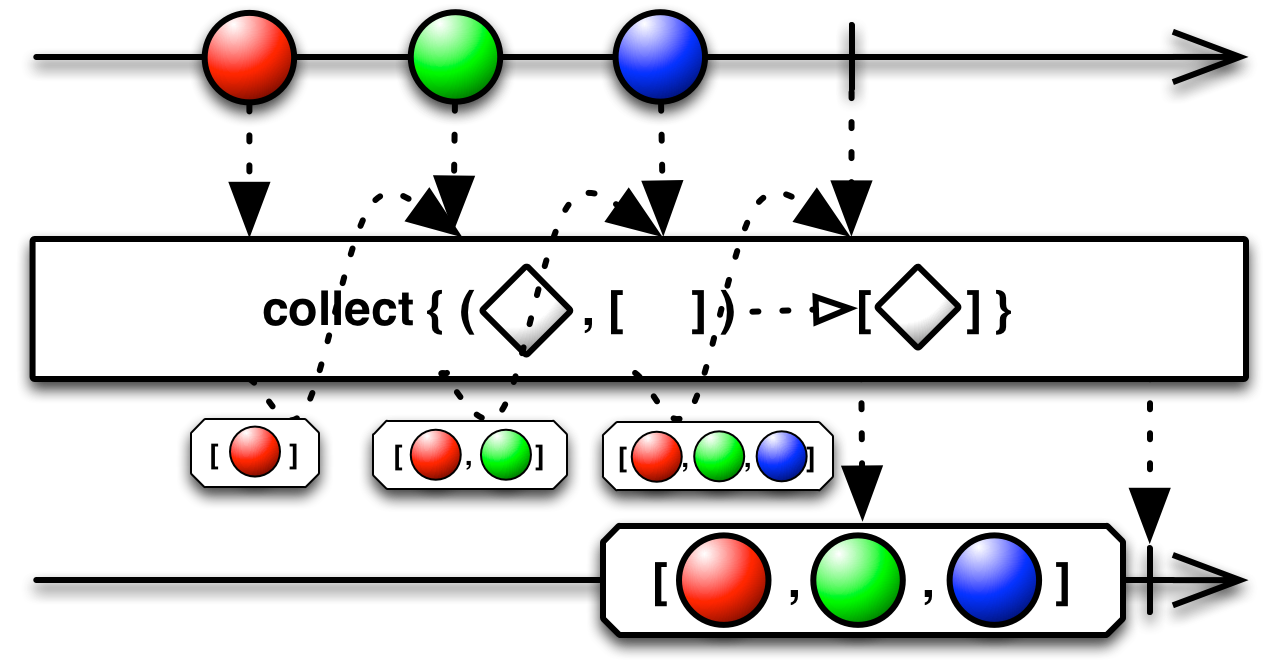
This is a simplified version of reduce that does not need to return the state on each pass.
- Backpressure:
- This operator does not support backpressure because by intent it will receive all values and reduce
them to a single
onNext. - Scheduler:
collectdoes not operate by default on a particularScheduler.
Parameters
| initialItemSupplier | the mutable data structure that will collect the items |
|---|---|
| collector | a function that accepts the state and an emitted item, and modifies state
accordingly |
Returns
- a Single that emits the result of collecting the values emitted by the source Publisher into a single mutable data structure
public final Single<U> collectInto (U initialItem, BiConsumer<? super U, ? super T> collector)
Collects items emitted by the source Publisher into a single mutable data structure and returns a Single that emits this structure.

This is a simplified version of reduce that does not need to return the state on each pass.
- Backpressure:
- This operator does not support backpressure because by intent it will receive all values and reduce
them to a single
onNext. - Scheduler:
collectIntodoes not operate by default on a particularScheduler.
Parameters
| initialItem | the mutable data structure that will collect the items |
|---|---|
| collector | a function that accepts the state and an emitted item, and modifies state
accordingly |
Returns
- a Single that emits the result of collecting the values emitted by the source Publisher into a single mutable data structure
public static Flowable<R> combineLatest (Publisher<? extends T1> source1, Publisher<? extends T2> source2, Publisher<? extends T3> source3, Publisher<? extends T4> source4, Publisher<? extends T5> source5, Publisher<? extends T6> source6, Publisher<? extends T7> source7, Publisher<? extends T8> source8, Publisher<? extends T9> source9, Function9<? super T1, ? super T2, ? super T3, ? super T4, ? super T5, ? super T6, ? super T7, ? super T8, ? super T9, ? extends R> combiner)
Combines nine source Publishers by emitting an item that aggregates the latest values of each of the source Publishers each time an item is received from any of the source Publishers, where this aggregation is defined by a specified function.
If any of the sources never produces an item but only terminates (normally or with an error), the resulting sequence terminates immediately (normally or with all the errors accumulated till that point). If that input source is also synchronous, other sources after it will not be subscribed to.
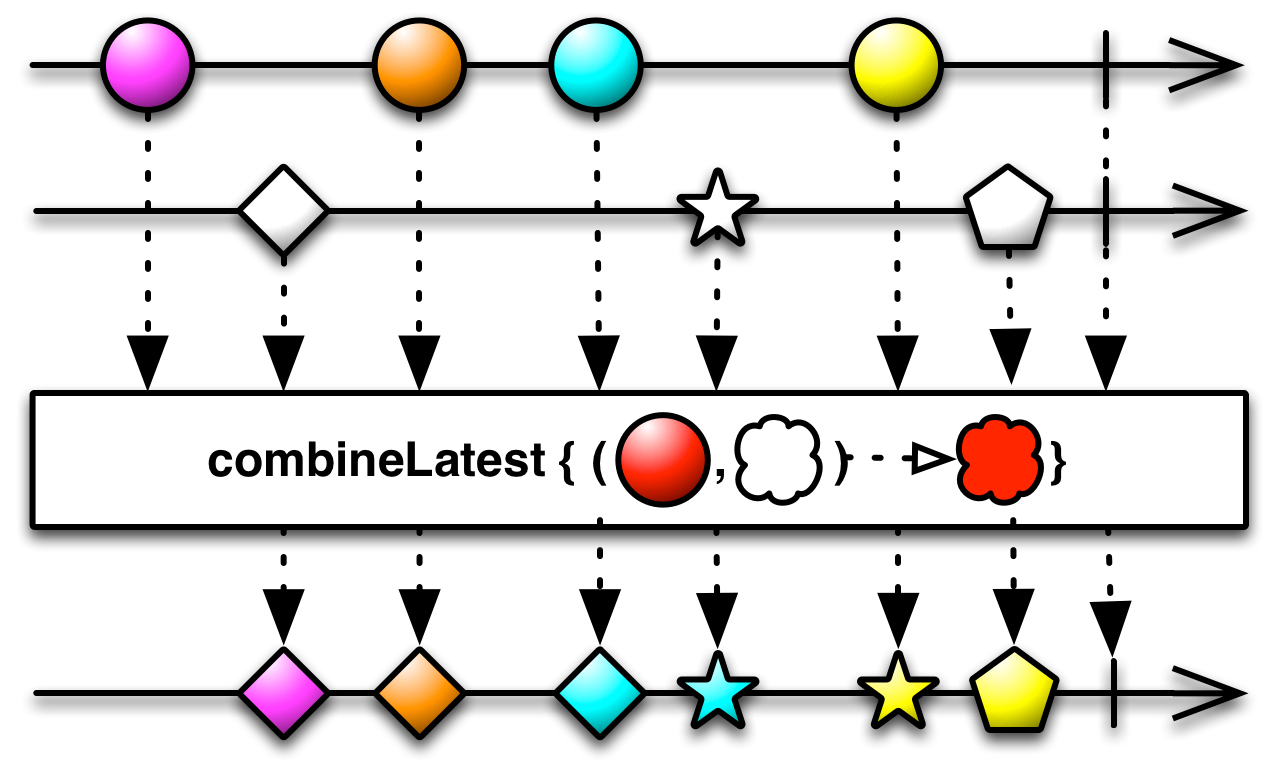
- Backpressure:
- The returned
Publisherhonors backpressure from downstream. The sourcePublishers are requested in a bounded manner, however, their backpressure is not enforced (the operator won't signalMissingBackpressureException) and may lead toOutOfMemoryErrordue to internal buffer bloat. - Scheduler:
combineLatestdoes not operate by default on a particularScheduler.
Parameters
| source1 | the first source Publisher |
|---|---|
| source2 | the second source Publisher |
| source3 | the third source Publisher |
| source4 | the fourth source Publisher |
| source5 | the fifth source Publisher |
| source6 | the sixth source Publisher |
| source7 | the seventh source Publisher |
| source8 | the eighth source Publisher |
| source9 | the ninth source Publisher |
| combiner | the aggregation function used to combine the items emitted by the source Publishers |
Returns
- a Flowable that emits items that are the result of combining the items emitted by the source Publishers by means of the given aggregation function
public static Flowable<R> combineLatest (Publisher[]<? extends T> sources, Function<? super Object[], ? extends R> combiner)
Combines a collection of source Publishers by emitting an item that aggregates the latest values of each of the source Publishers each time an item is received from any of the source Publishers, where this aggregation is defined by a specified function.
Note on method signature: since Java doesn't allow creating a generic array with new T[], the
implementation of this operator has to create an Object[] instead. Unfortunately, a
Function<Integer[], R> passed to the method would trigger a ClassCastException.
If any of the sources never produces an item but only terminates (normally or with an error), the resulting sequence terminates immediately (normally or with all the errors accumulated till that point). If that input source is also synchronous, other sources after it will not be subscribed to.
If the provided array of source Publishers is empty, the resulting sequence completes immediately without emitting any items and without any calls to the combiner function.
- Backpressure:
- The returned
Publisherhonors backpressure from downstream. The sourcePublishers are requested in a bounded manner, however, their backpressure is not enforced (the operator won't signalMissingBackpressureException) and may lead toOutOfMemoryErrordue to internal buffer bloat. - Scheduler:
combineLatestdoes not operate by default on a particularScheduler.
Parameters
| sources | the collection of source Publishers |
|---|---|
| combiner | the aggregation function used to combine the items emitted by the source Publishers |
Returns
- a Flowable that emits items that are the result of combining the items emitted by the source Publishers by means of the given aggregation function
public static Flowable<R> combineLatest (Iterable<? extends Publisher<? extends T>> sources, Function<? super Object[], ? extends R> combiner)
Combines a collection of source Publishers by emitting an item that aggregates the latest values of each of the source Publishers each time an item is received from any of the source Publishers, where this aggregation is defined by a specified function.
Note on method signature: since Java doesn't allow creating a generic array with new T[], the
implementation of this operator has to create an Object[] instead. Unfortunately, a
Function<Integer[], R> passed to the method would trigger a ClassCastException.
If any of the sources never produces an item but only terminates (normally or with an error), the resulting sequence terminates immediately (normally or with all the errors accumulated till that point). If that input source is also synchronous, other sources after it will not be subscribed to.
If the provided iterable of source Publishers is empty, the resulting sequence completes immediately without emitting any items and without any calls to the combiner function.
- Backpressure:
- The returned
Publisherhonors backpressure from downstream. The sourcePublishers are requested in a bounded manner, however, their backpressure is not enforced (the operator won't signalMissingBackpressureException) and may lead toOutOfMemoryErrordue to internal buffer bloat. - Scheduler:
combineLatestdoes not operate by default on a particularScheduler.
Parameters
| sources | the collection of source Publishers |
|---|---|
| combiner | the aggregation function used to combine the items emitted by the source Publishers |
Returns
- a Flowable that emits items that are the result of combining the items emitted by the source Publishers by means of the given aggregation function
public static Flowable<R> combineLatest (Publisher<? extends T1> source1, Publisher<? extends T2> source2, Publisher<? extends T3> source3, Publisher<? extends T4> source4, Publisher<? extends T5> source5, Publisher<? extends T6> source6, Publisher<? extends T7> source7, Publisher<? extends T8> source8, Function8<? super T1, ? super T2, ? super T3, ? super T4, ? super T5, ? super T6, ? super T7, ? super T8, ? extends R> combiner)
Combines eight source Publishers by emitting an item that aggregates the latest values of each of the source Publishers each time an item is received from any of the source Publishers, where this aggregation is defined by a specified function.
If any of the sources never produces an item but only terminates (normally or with an error), the resulting sequence terminates immediately (normally or with all the errors accumulated till that point). If that input source is also synchronous, other sources after it will not be subscribed to.

- Backpressure:
- The returned
Publisherhonors backpressure from downstream. The sourcePublishers are requested in a bounded manner, however, their backpressure is not enforced (the operator won't signalMissingBackpressureException) and may lead toOutOfMemoryErrordue to internal buffer bloat. - Scheduler:
combineLatestdoes not operate by default on a particularScheduler.
Parameters
| source1 | the first source Publisher |
|---|---|
| source2 | the second source Publisher |
| source3 | the third source Publisher |
| source4 | the fourth source Publisher |
| source5 | the fifth source Publisher |
| source6 | the sixth source Publisher |
| source7 | the seventh source Publisher |
| source8 | the eighth source Publisher |
| combiner | the aggregation function used to combine the items emitted by the source Publishers |
Returns
- a Flowable that emits items that are the result of combining the items emitted by the source Publishers by means of the given aggregation function
public static Flowable<R> combineLatest (Publisher<? extends T1> source1, Publisher<? extends T2> source2, BiFunction<? super T1, ? super T2, ? extends R> combiner)
Combines two source Publishers by emitting an item that aggregates the latest values of each of the source Publishers each time an item is received from either of the source Publishers, where this aggregation is defined by a specified function.
If any of the sources never produces an item but only terminates (normally or with an error), the resulting sequence terminates immediately (normally or with all the errors accumulated till that point). If that input source is also synchronous, other sources after it will not be subscribed to.

- Backpressure:
- The returned
Publisherhonors backpressure from downstream. The sourcePublishers are requested in a bounded manner, however, their backpressure is not enforced (the operator won't signalMissingBackpressureException) and may lead toOutOfMemoryErrordue to internal buffer bloat. - Scheduler:
combineLatestdoes not operate by default on a particularScheduler.
Parameters
| source1 | the first source Publisher |
|---|---|
| source2 | the second source Publisher |
| combiner | the aggregation function used to combine the items emitted by the source Publishers |
Returns
- a Flowable that emits items that are the result of combining the items emitted by the source Publishers by means of the given aggregation function
public static Flowable<R> combineLatest (Publisher<? extends T1> source1, Publisher<? extends T2> source2, Publisher<? extends T3> source3, Function3<? super T1, ? super T2, ? super T3, ? extends R> combiner)
Combines three source Publishers by emitting an item that aggregates the latest values of each of the source Publishers each time an item is received from any of the source Publishers, where this aggregation is defined by a specified function.
If any of the sources never produces an item but only terminates (normally or with an error), the resulting sequence terminates immediately (normally or with all the errors accumulated till that point). If that input source is also synchronous, other sources after it will not be subscribed to.

- Backpressure:
- The returned
Publisherhonors backpressure from downstream. The sourcePublishers are requested in a bounded manner, however, their backpressure is not enforced (the operator won't signalMissingBackpressureException) and may lead toOutOfMemoryErrordue to internal buffer bloat. - Scheduler:
combineLatestdoes not operate by default on a particularScheduler.
Parameters
| source1 | the first source Publisher |
|---|---|
| source2 | the second source Publisher |
| source3 | the third source Publisher |
| combiner | the aggregation function used to combine the items emitted by the source Publishers |
Returns
- a Flowable that emits items that are the result of combining the items emitted by the source Publishers by means of the given aggregation function
public static Flowable<R> combineLatest (Publisher<? extends T1> source1, Publisher<? extends T2> source2, Publisher<? extends T3> source3, Publisher<? extends T4> source4, Function4<? super T1, ? super T2, ? super T3, ? super T4, ? extends R> combiner)
Combines four source Publishers by emitting an item that aggregates the latest values of each of the source Publishers each time an item is received from any of the source Publishers, where this aggregation is defined by a specified function.
If any of the sources never produces an item but only terminates (normally or with an error), the resulting sequence terminates immediately (normally or with all the errors accumulated till that point). If that input source is also synchronous, other sources after it will not be subscribed to.

- Backpressure:
- The returned
Publisherhonors backpressure from downstream. The sourcePublishers are requested in a bounded manner, however, their backpressure is not enforced (the operator won't signalMissingBackpressureException) and may lead toOutOfMemoryErrordue to internal buffer bloat. - Scheduler:
combineLatestdoes not operate by default on a particularScheduler.
Parameters
| source1 | the first source Publisher |
|---|---|
| source2 | the second source Publisher |
| source3 | the third source Publisher |
| source4 | the fourth source Publisher |
| combiner | the aggregation function used to combine the items emitted by the source Publishers |
Returns
- a Flowable that emits items that are the result of combining the items emitted by the source Publishers by means of the given aggregation function
public static Flowable<R> combineLatest (Publisher<? extends T1> source1, Publisher<? extends T2> source2, Publisher<? extends T3> source3, Publisher<? extends T4> source4, Publisher<? extends T5> source5, Function5<? super T1, ? super T2, ? super T3, ? super T4, ? super T5, ? extends R> combiner)
Combines five source Publishers by emitting an item that aggregates the latest values of each of the source Publishers each time an item is received from any of the source Publishers, where this aggregation is defined by a specified function.
If any of the sources never produces an item but only terminates (normally or with an error), the resulting sequence terminates immediately (normally or with all the errors accumulated till that point). If that input source is also synchronous, other sources after it will not be subscribed to.

- Backpressure:
- The returned
Publisherhonors backpressure from downstream. The sourcePublishers are requested in a bounded manner, however, their backpressure is not enforced (the operator won't signalMissingBackpressureException) and may lead toOutOfMemoryErrordue to internal buffer bloat. - Scheduler:
combineLatestdoes not operate by default on a particularScheduler.
Parameters
| source1 | the first source Publisher |
|---|---|
| source2 | the second source Publisher |
| source3 | the third source Publisher |
| source4 | the fourth source Publisher |
| source5 | the fifth source Publisher |
| combiner | the aggregation function used to combine the items emitted by the source Publishers |
Returns
- a Flowable that emits items that are the result of combining the items emitted by the source Publishers by means of the given aggregation function
public static Flowable<R> combineLatest (Publisher[]<? extends T> sources, Function<? super Object[], ? extends R> combiner, int bufferSize)
Combines a collection of source Publishers by emitting an item that aggregates the latest values of each of the source Publishers each time an item is received from any of the source Publishers, where this aggregation is defined by a specified function.
Note on method signature: since Java doesn't allow creating a generic array with new T[], the
implementation of this operator has to create an Object[] instead. Unfortunately, a
Function<Integer[], R> passed to the method would trigger a ClassCastException.
If any of the sources never produces an item but only terminates (normally or with an error), the resulting sequence terminates immediately (normally or with all the errors accumulated till that point). If that input source is also synchronous, other sources after it will not be subscribed to.
If the provided array of source Publishers is empty, the resulting sequence completes immediately without emitting any items and without any calls to the combiner function.
- Backpressure:
- The returned
Publisherhonors backpressure from downstream. The sourcePublishers are requested in a bounded manner, however, their backpressure is not enforced (the operator won't signalMissingBackpressureException) and may lead toOutOfMemoryErrordue to internal buffer bloat. - Scheduler:
combineLatestdoes not operate by default on a particularScheduler.
Parameters
| sources | the collection of source Publishers |
|---|---|
| combiner | the aggregation function used to combine the items emitted by the source Publishers |
| bufferSize | the internal buffer size and prefetch amount applied to every source Flowable |
Returns
- a Flowable that emits items that are the result of combining the items emitted by the source Publishers by means of the given aggregation function
public static Flowable<R> combineLatest (Function<? super Object[], ? extends R> combiner, Publisher...<? extends T> sources)
Combines a collection of source Publishers by emitting an item that aggregates the latest values of each of the source Publishers each time an item is received from any of the source Publishers, where this aggregation is defined by a specified function.
Note on method signature: since Java doesn't allow creating a generic array with new T[], the
implementation of this operator has to create an Object[] instead. Unfortunately, a
Function<Integer[], R> passed to the method would trigger a ClassCastException.
If any of the sources never produces an item but only terminates (normally or with an error), the resulting sequence terminates immediately (normally or with all the errors accumulated till that point). If that input source is also synchronous, other sources after it will not be subscribed to.
If there are no source Publishers provided, the resulting sequence completes immediately without emitting any items and without any calls to the combiner function.
- Backpressure:
- The returned
Publisherhonors backpressure from downstream. The sourcePublishers are requested in a bounded manner, however, their backpressure is not enforced (the operator won't signalMissingBackpressureException) and may lead toOutOfMemoryErrordue to internal buffer bloat. - Scheduler:
combineLatestdoes not operate by default on a particularScheduler.
Parameters
| combiner | the aggregation function used to combine the items emitted by the source Publishers |
|---|---|
| sources | the collection of source Publishers |
Returns
- a Flowable that emits items that are the result of combining the items emitted by the source Publishers by means of the given aggregation function
public static Flowable<R> combineLatest (Publisher<? extends T1> source1, Publisher<? extends T2> source2, Publisher<? extends T3> source3, Publisher<? extends T4> source4, Publisher<? extends T5> source5, Publisher<? extends T6> source6, Publisher<? extends T7> source7, Function7<? super T1, ? super T2, ? super T3, ? super T4, ? super T5, ? super T6, ? super T7, ? extends R> combiner)
Combines seven source Publishers by emitting an item that aggregates the latest values of each of the source Publishers each time an item is received from any of the source Publishers, where this aggregation is defined by a specified function.
If any of the sources never produces an item but only terminates (normally or with an error), the resulting sequence terminates immediately (normally or with all the errors accumulated till that point). If that input source is also synchronous, other sources after it will not be subscribed to.

- Backpressure:
- The returned
Publisherhonors backpressure from downstream. The sourcePublishers are requested in a bounded manner, however, their backpressure is not enforced (the operator won't signalMissingBackpressureException) and may lead toOutOfMemoryErrordue to internal buffer bloat. - Scheduler:
combineLatestdoes not operate by default on a particularScheduler.
Parameters
| source1 | the first source Publisher |
|---|---|
| source2 | the second source Publisher |
| source3 | the third source Publisher |
| source4 | the fourth source Publisher |
| source5 | the fifth source Publisher |
| source6 | the sixth source Publisher |
| source7 | the seventh source Publisher |
| combiner | the aggregation function used to combine the items emitted by the source Publishers |
Returns
- a Flowable that emits items that are the result of combining the items emitted by the source Publishers by means of the given aggregation function
public static Flowable<R> combineLatest (Iterable<? extends Publisher<? extends T>> sources, Function<? super Object[], ? extends R> combiner, int bufferSize)
Combines a collection of source Publishers by emitting an item that aggregates the latest values of each of the source Publishers each time an item is received from any of the source Publishers, where this aggregation is defined by a specified function.
Note on method signature: since Java doesn't allow creating a generic array with new T[], the
implementation of this operator has to create an Object[] instead. Unfortunately, a
Function<Integer[], R> passed to the method would trigger a ClassCastException.
If any of the sources never produces an item but only terminates (normally or with an error), the resulting sequence terminates immediately (normally or with all the errors accumulated till that point). If that input source is also synchronous, other sources after it will not be subscribed to.
If the provided iterable of source Publishers is empty, the resulting sequence completes immediately without emitting any items and without any calls to the combiner function.
- Backpressure:
- The returned
Publisherhonors backpressure from downstream. The sourcePublishers are requested in a bounded manner, however, their backpressure is not enforced (the operator won't signalMissingBackpressureException) and may lead toOutOfMemoryErrordue to internal buffer bloat. - Scheduler:
combineLatestdoes not operate by default on a particularScheduler.
Parameters
| sources | the collection of source Publishers |
|---|---|
| combiner | the aggregation function used to combine the items emitted by the source Publishers |
| bufferSize | the internal buffer size and prefetch amount applied to every source Flowable |
Returns
- a Flowable that emits items that are the result of combining the items emitted by the source Publishers by means of the given aggregation function
public static Flowable<R> combineLatest (Publisher<? extends T1> source1, Publisher<? extends T2> source2, Publisher<? extends T3> source3, Publisher<? extends T4> source4, Publisher<? extends T5> source5, Publisher<? extends T6> source6, Function6<? super T1, ? super T2, ? super T3, ? super T4, ? super T5, ? super T6, ? extends R> combiner)
Combines six source Publishers by emitting an item that aggregates the latest values of each of the source Publishers each time an item is received from any of the source Publishers, where this aggregation is defined by a specified function.
If any of the sources never produces an item but only terminates (normally or with an error), the resulting sequence terminates immediately (normally or with all the errors accumulated till that point). If that input source is also synchronous, other sources after it will not be subscribed to.

- Backpressure:
- The returned
Publisherhonors backpressure from downstream. The sourcePublishers are requested in a bounded manner, however, their backpressure is not enforced (the operator won't signalMissingBackpressureException) and may lead toOutOfMemoryErrordue to internal buffer bloat. - Scheduler:
combineLatestdoes not operate by default on a particularScheduler.
Parameters
| source1 | the first source Publisher |
|---|---|
| source2 | the second source Publisher |
| source3 | the third source Publisher |
| source4 | the fourth source Publisher |
| source5 | the fifth source Publisher |
| source6 | the sixth source Publisher |
| combiner | the aggregation function used to combine the items emitted by the source Publishers |
Returns
- a Flowable that emits items that are the result of combining the items emitted by the source Publishers by means of the given aggregation function
public static Flowable<R> combineLatestDelayError (Function<? super Object[], ? extends R> combiner, int bufferSize, Publisher...<? extends T> sources)
Combines a collection of source Publishers by emitting an item that aggregates the latest values of each of the source Publishers each time an item is received from any of the source Publisher, where this aggregation is defined by a specified function and delays any error from the sources until all source Publishers terminate.
Note on method signature: since Java doesn't allow creating a generic array with new T[], the
implementation of this operator has to create an Object[] instead. Unfortunately, a
Function<Integer[], R> passed to the method would trigger a ClassCastException.
If any of the sources never produces an item but only terminates (normally or with an error), the resulting sequence terminates immediately (normally or with all the errors accumulated till that point). If that input source is also synchronous, other sources after it will not be subscribed to.
If there are no source Publishers provided, the resulting sequence completes immediately without emitting any items and without any calls to the combiner function.
- Backpressure:
- The returned
Publisherhonors backpressure from downstream. The sourcePublishers are requested in a bounded manner, however, their backpressure is not enforced (the operator won't signalMissingBackpressureException) and may lead toOutOfMemoryErrordue to internal buffer bloat. - Scheduler:
combineLatestDelayErrordoes not operate by default on a particularScheduler.
Parameters
| combiner | the aggregation function used to combine the items emitted by the source Publishers |
|---|---|
| bufferSize | the internal buffer size and prefetch amount applied to every source Publisher |
| sources | the collection of source Publishers |
Returns
- a Flowable that emits items that are the result of combining the items emitted by the source Publishers by means of the given aggregation function
public static Flowable<R> combineLatestDelayError (Publisher[]<? extends T> sources, Function<? super Object[], ? extends R> combiner)
Combines a collection of source Publishers by emitting an item that aggregates the latest values of each of the source Publishers each time an item is received from any of the source Publishers, where this aggregation is defined by a specified function.
Note on method signature: since Java doesn't allow creating a generic array with new T[], the
implementation of this operator has to create an Object[] instead. Unfortunately, a
Function<Integer[], R> passed to the method would trigger a ClassCastException.
If any of the sources never produces an item but only terminates (normally or with an error), the resulting sequence terminates immediately (normally or with all the errors accumulated till that point). If that input source is also synchronous, other sources after it will not be subscribed to.
If the provided array of source Publishers is empty, the resulting sequence completes immediately without emitting any items and without any calls to the combiner function.
- Backpressure:
- The returned
Publisherhonors backpressure from downstream. The sourcePublishers are requested in a bounded manner, however, their backpressure is not enforced (the operator won't signalMissingBackpressureException) and may lead toOutOfMemoryErrordue to internal buffer bloat. - Scheduler:
combineLatestDelayErrordoes not operate by default on a particularScheduler.
Parameters
| sources | the collection of source Publishers |
|---|---|
| combiner | the aggregation function used to combine the items emitted by the source Publishers |
Returns
- a Flowable that emits items that are the result of combining the items emitted by the source Publishers by means of the given aggregation function
public static Flowable<R> combineLatestDelayError (Publisher[]<? extends T> sources, Function<? super Object[], ? extends R> combiner, int bufferSize)
Combines a collection of source Publishers by emitting an item that aggregates the latest values of each of the source Publishers each time an item is received from any of the source Publishers, where this aggregation is defined by a specified function and delays any error from the sources until all source Publishers terminate.
Note on method signature: since Java doesn't allow creating a generic array with new T[], the
implementation of this operator has to create an Object[] instead. Unfortunately, a
Function<Integer[], R> passed to the method would trigger a ClassCastException.
If any of the sources never produces an item but only terminates (normally or with an error), the resulting sequence terminates immediately (normally or with all the errors accumulated till that point). If that input source is also synchronous, other sources after it will not be subscribed to.
If the provided array of source Publishers is empty, the resulting sequence completes immediately without emitting any items and without any calls to the combiner function.
- Backpressure:
- The returned
Publisherhonors backpressure from downstream. The sourcePublishers are requested in a bounded manner, however, their backpressure is not enforced (the operator won't signalMissingBackpressureException) and may lead toOutOfMemoryErrordue to internal buffer bloat. - Scheduler:
combineLatestDelayErrordoes not operate by default on a particularScheduler.
Parameters
| sources | the collection of source Publishers |
|---|---|
| combiner | the aggregation function used to combine the items emitted by the source Publishers |
| bufferSize | the internal buffer size and prefetch amount applied to every source Flowable |
Returns
- a Flowable that emits items that are the result of combining the items emitted by the source Publishers by means of the given aggregation function
public static Flowable<R> combineLatestDelayError (Iterable<? extends Publisher<? extends T>> sources, Function<? super Object[], ? extends R> combiner)
Combines a collection of source Publishers by emitting an item that aggregates the latest values of each of the source Publishers each time an item is received from any of the source Publishers, where this aggregation is defined by a specified function and delays any error from the sources until all source Publishers terminate.
Note on method signature: since Java doesn't allow creating a generic array with new T[], the
implementation of this operator has to create an Object[] instead. Unfortunately, a
Function<Integer[], R> passed to the method would trigger a ClassCastException.
If any of the sources never produces an item but only terminates (normally or with an error), the resulting sequence terminates immediately (normally or with all the errors accumulated till that point). If that input source is also synchronous, other sources after it will not be subscribed to.
If the provided iterable of source Publishers is empty, the resulting sequence completes immediately without emitting any items and without any calls to the combiner function.
- Backpressure:
- The returned
Publisherhonors backpressure from downstream. The sourcePublishers are requested in a bounded manner, however, their backpressure is not enforced (the operator won't signalMissingBackpressureException) and may lead toOutOfMemoryErrordue to internal buffer bloat. - Scheduler:
combineLatestDelayErrordoes not operate by default on a particularScheduler.
Parameters
| sources | the collection of source Publishers |
|---|---|
| combiner | the aggregation function used to combine the items emitted by the source Publishers |
Returns
- a Flowable that emits items that are the result of combining the items emitted by the source Publishers by means of the given aggregation function
public static Flowable<R> combineLatestDelayError (Iterable<? extends Publisher<? extends T>> sources, Function<? super Object[], ? extends R> combiner, int bufferSize)
Combines a collection of source Publishers by emitting an item that aggregates the latest values of each of the source Publishers each time an item is received from any of the source Publishers, where this aggregation is defined by a specified function and delays any error from the sources until all source Publishers terminate.
Note on method signature: since Java doesn't allow creating a generic array with new T[], the
implementation of this operator has to create an Object[] instead. Unfortunately, a
Function<Integer[], R> passed to the method would trigger a ClassCastException.
If any of the sources never produces an item but only terminates (normally or with an error), the resulting sequence terminates immediately (normally or with all the errors accumulated till that point). If that input source is also synchronous, other sources after it will not be subscribed to.
If the provided iterable of source Publishers is empty, the resulting sequence completes immediately without emitting any items and without any calls to the combiner function.
- Backpressure:
- The returned
Publisherhonors backpressure from downstream. The sourcePublishers are requested in a bounded manner, however, their backpressure is not enforced (the operator won't signalMissingBackpressureException) and may lead toOutOfMemoryErrordue to internal buffer bloat. - Scheduler:
combineLatestDelayErrordoes not operate by default on a particularScheduler.
Parameters
| sources | the collection of source Publishers |
|---|---|
| combiner | the aggregation function used to combine the items emitted by the source Publishers |
| bufferSize | the internal buffer size and prefetch amount applied to every source Flowable |
Returns
- a Flowable that emits items that are the result of combining the items emitted by the source Publishers by means of the given aggregation function
public static Flowable<R> combineLatestDelayError (Function<? super Object[], ? extends R> combiner, Publisher...<? extends T> sources)
Combines a collection of source Publishers by emitting an item that aggregates the latest values of each of the source Publishers each time an item is received from any of the source Publishers, where this aggregation is defined by a specified function and delays any error from the sources until all source Publishers terminate.
Note on method signature: since Java doesn't allow creating a generic array with new T[], the
implementation of this operator has to create an Object[] instead. Unfortunately, a
Function<Integer[], R> passed to the method would trigger a ClassCastException.
If any of the sources never produces an item but only terminates (normally or with an error), the resulting sequence terminates immediately (normally or with all the errors accumulated till that point). If that input source is also synchronous, other sources after it will not be subscribed to.
If there are no source Publishers provided, the resulting sequence completes immediately without emitting any items and without any calls to the combiner function.
- Backpressure:
- The returned
Publisherhonors backpressure from downstream. The sourcePublishers are requested in a bounded manner, however, their backpressure is not enforced (the operator won't signalMissingBackpressureException) and may lead toOutOfMemoryErrordue to internal buffer bloat. - Scheduler:
combineLatestDelayErrordoes not operate by default on a particularScheduler.
Parameters
| combiner | the aggregation function used to combine the items emitted by the source Publishers |
|---|---|
| sources | the collection of source Publishers |
Returns
- a Flowable that emits items that are the result of combining the items emitted by the source Publishers by means of the given aggregation function
public final Flowable<R> compose (FlowableTransformer<? super T, ? extends R> composer)
Transform a Publisher by applying a particular Transformer function to it.
This method operates on the Publisher itself whereas lift(FlowableOperator) operates on the Publisher's
Subscribers or Subscribers.
If the operator you are creating is designed to act on the individual items emitted by a source
Publisher, use lift(FlowableOperator). If your operator is designed to transform the source Publisher as a whole
(for instance, by applying a particular set of existing RxJava operators to it) use compose.
- Backpressure:
- The operator itself doesn't interfere with the backpressure behavior which only depends
on what kind of
Publisherthe transformer returns. - Scheduler:
composedoes not operate by default on a particularScheduler.
Parameters
| composer | implements the function that transforms the source Publisher |
|---|
Returns
- the source Publisher, transformed by the transformer function
public static Flowable<T> concat (Publisher<? extends T> source1, Publisher<? extends T> source2, Publisher<? extends T> source3)
Returns a Flowable that emits the items emitted by three Publishers, one after the other, without interleaving them.
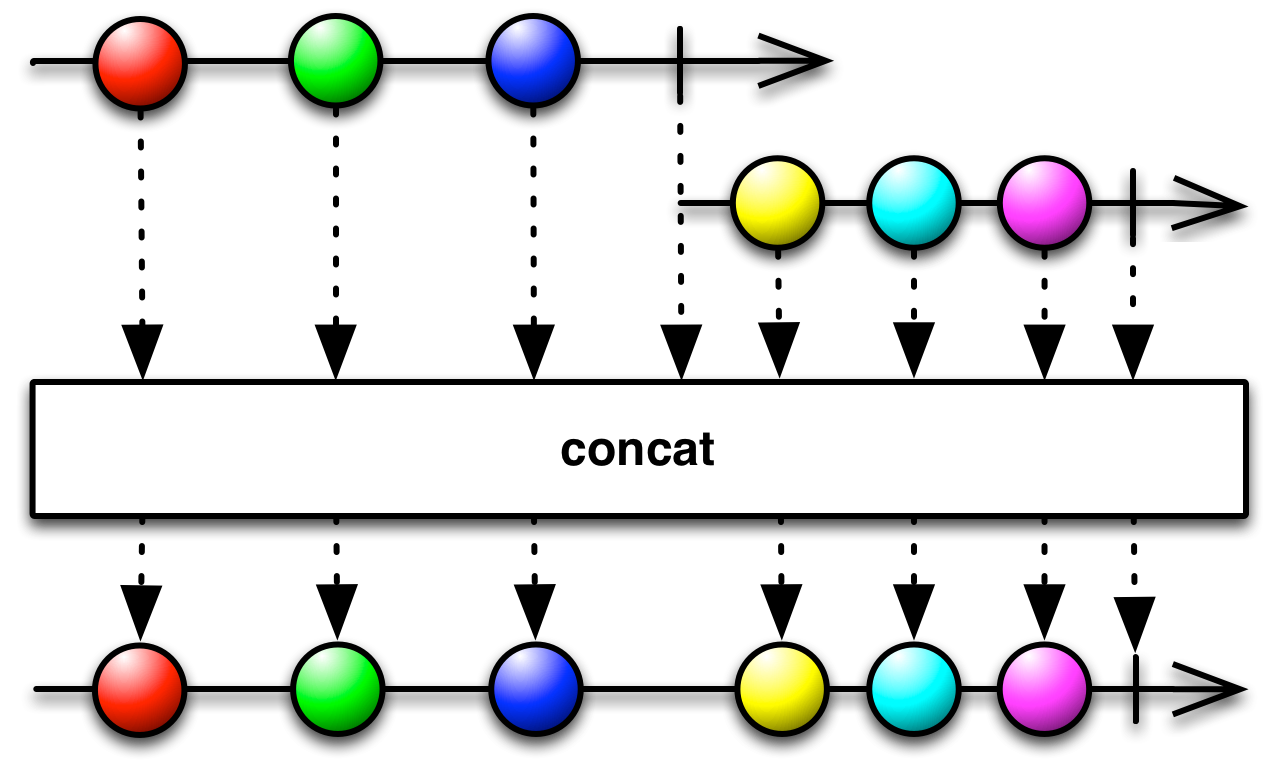
- Backpressure:
- The operator honors backpressure from downstream. The
Publishersources are expected to honor backpressure as well. If any of the sourcePublishers violate this, it may throw anIllegalStateExceptionwhen the sourcePublishercompletes. - Scheduler:
concatdoes not operate by default on a particularScheduler.
Parameters
| source1 | a Publisher to be concatenated |
|---|---|
| source2 | a Publisher to be concatenated |
| source3 | a Publisher to be concatenated |
Returns
- a Flowable that emits items emitted by the three source Publishers, one after the other, without interleaving them
public static Flowable<T> concat (Iterable<? extends Publisher<? extends T>> sources)
Concatenates elements of each Publisher provided via an Iterable sequence into a single sequence of elements without interleaving them.

- Backpressure:
- The operator honors backpressure from downstream. The
Publishersources are expected to honor backpressure as well. If any of the sourcePublishers violate this, it may throw anIllegalStateExceptionwhen the sourcePublishercompletes. - Scheduler:
concatdoes not operate by default on a particularScheduler.
Parameters
| sources | the Iterable sequence of Publishers |
|---|
Returns
- the new Flowable instance
public static Flowable<T> concat (Publisher<? extends T> source1, Publisher<? extends T> source2, Publisher<? extends T> source3, Publisher<? extends T> source4)
Returns a Flowable that emits the items emitted by four Publishers, one after the other, without interleaving them.

- Backpressure:
- The operator honors backpressure from downstream. The
Publishersources are expected to honor backpressure as well. If any of the sourcePublishers violate this, it may throw anIllegalStateExceptionwhen the sourcePublishercompletes. - Scheduler:
concatdoes not operate by default on a particularScheduler.
Parameters
| source1 | a Publisher to be concatenated |
|---|---|
| source2 | a Publisher to be concatenated |
| source3 | a Publisher to be concatenated |
| source4 | a Publisher to be concatenated |
Returns
- a Flowable that emits items emitted by the four source Publishers, one after the other, without interleaving them
public static Flowable<T> concat (Publisher<? extends Publisher<? extends T>> sources, int prefetch)
Returns a Flowable that emits the items emitted by each of the Publishers emitted by the source Publisher, one after the other, without interleaving them.

- Backpressure:
- The operator honors backpressure from downstream. Both the outer and inner
Publishersources are expected to honor backpressure as well. If the outer violates this, aMissingBackpressureExceptionis signalled. If any of the innerPublishers violates this, it may throw anIllegalStateExceptionwhen an innerPublishercompletes. - Scheduler:
concatdoes not operate by default on a particularScheduler.
Parameters
| sources | a Publisher that emits Publishers |
|---|---|
| prefetch | the number of Publishers to prefetch from the sources sequence. |
Returns
- a Flowable that emits items all of the items emitted by the Publishers emitted by
Publishers, one after the other, without interleaving them
public static Flowable<T> concat (Publisher<? extends Publisher<? extends T>> sources)
Returns a Flowable that emits the items emitted by each of the Publishers emitted by the source Publisher, one after the other, without interleaving them.

- Backpressure:
- The operator honors backpressure from downstream. Both the outer and inner
Publishersources are expected to honor backpressure as well. If the outer violates this, aMissingBackpressureExceptionis signalled. If any of the innerPublishers violates this, it may throw anIllegalStateExceptionwhen an innerPublishercompletes. - Scheduler:
concatdoes not operate by default on a particularScheduler.
Parameters
| sources | a Publisher that emits Publishers |
|---|
Returns
- a Flowable that emits items all of the items emitted by the Publishers emitted by
Publishers, one after the other, without interleaving them
public static Flowable<T> concat (Publisher<? extends T> source1, Publisher<? extends T> source2)
Returns a Flowable that emits the items emitted by two Publishers, one after the other, without interleaving them.

- Backpressure:
- The operator honors backpressure from downstream. The
Publishersources are expected to honor backpressure as well. If any of the sourcePublishers violate this, it may throw anIllegalStateExceptionwhen the sourcePublishercompletes. - Scheduler:
concatdoes not operate by default on a particularScheduler.
Parameters
| source1 | a Publisher to be concatenated |
|---|---|
| source2 | a Publisher to be concatenated |
Returns
- a Flowable that emits items emitted by the two source Publishers, one after the other, without interleaving them
public static Flowable<T> concatArray (Publisher...<? extends T> sources)
Concatenates a variable number of Publisher sources.
Note: named this way because of overload conflict with concat(Publisher<Publisher>).

- Backpressure:
- The operator honors backpressure from downstream. The
Publishersources are expected to honor backpressure as well. If any of the sourcePublishers violate this, it may throw anIllegalStateExceptionwhen the sourcePublishercompletes. - Scheduler:
concatArraydoes not operate by default on a particularScheduler.
Parameters
| sources | the array of sources |
|---|
Returns
- the new Publisher instance
Throws
| NullPointerException | if sources is null |
|---|
public static Flowable<T> concatArrayDelayError (Publisher...<? extends T> sources)
Concatenates a variable number of Publisher sources and delays errors from any of them till all terminate.

- Backpressure:
- The operator honors backpressure from downstream. The
Publishersources are expected to honor backpressure as well. If any of the sourcePublishers violate this, it may throw anIllegalStateExceptionwhen the sourcePublishercompletes. - Scheduler:
concatArrayDelayErrordoes not operate by default on a particularScheduler.
Parameters
| sources | the array of sources |
|---|
Returns
- the new Flowable instance
Throws
| NullPointerException | if sources is null |
|---|
public static Flowable<T> concatArrayEager (int maxConcurrency, int prefetch, Publisher...<? extends T> sources)
Concatenates a sequence of Publishers eagerly into a single stream of values.
Eager concatenation means that once a subscriber subscribes, this operator subscribes to all of the source Publishers. The operator buffers the values emitted by these Publishers and then drains them in order, each one after the previous one completes.
- Backpressure:
- The operator honors backpressure from downstream. The
Publishersources are expected to honor backpressure as well. If any of the sourcePublishers violate this, the operator will signal aMissingBackpressureException. - Scheduler:
- This method does not operate by default on a particular
Scheduler.
Parameters
| maxConcurrency | the maximum number of concurrent subscriptions at a time, Integer.MAX_VALUE is interpreted as indication to subscribe to all sources at once |
|---|---|
| prefetch | the number of elements to prefetch from each Publisher source |
| sources | a sequence of Publishers that need to be eagerly concatenated |
Returns
- the new Publisher instance with the specified concatenation behavior
public static Flowable<T> concatArrayEager (Publisher...<? extends T> sources)
Concatenates a sequence of Publishers eagerly into a single stream of values.
Eager concatenation means that once a subscriber subscribes, this operator subscribes to all of the source Publishers. The operator buffers the values emitted by these Publishers and then drains them in order, each one after the previous one completes.
- Backpressure:
- The operator honors backpressure from downstream. The
Publishersources are expected to honor backpressure as well. If any of the sourcePublishers violate this, the operator will signal aMissingBackpressureException. - Scheduler:
- This method does not operate by default on a particular
Scheduler.
Parameters
| sources | a sequence of Publishers that need to be eagerly concatenated |
|---|
Returns
- the new Publisher instance with the specified concatenation behavior
public static Flowable<T> concatDelayError (Publisher<? extends Publisher<? extends T>> sources, int prefetch, boolean tillTheEnd)
Concatenates the Publisher sequence of Publishers into a single sequence by subscribing to each inner Publisher, one after the other, one at a time and delays any errors till the all inner and the outer Publishers terminate.
- Backpressure:
concatDelayErrorfully supports backpressure.- Scheduler:
concatDelayErrordoes not operate by default on a particularScheduler.
Parameters
| sources | the Publisher sequence of Publishers |
|---|---|
| prefetch | the number of elements to prefetch from the outer Publisher |
| tillTheEnd | if true exceptions from the outer and all inner Publishers are delayed to the end if false, exception from the outer Publisher is delayed till the current Publisher terminates |
Returns
- the new Publisher with the concatenating behavior
public static Flowable<T> concatDelayError (Iterable<? extends Publisher<? extends T>> sources)
Concatenates the Iterable sequence of Publishers into a single sequence by subscribing to each Publisher, one after the other, one at a time and delays any errors till the all inner Publishers terminate.
- Backpressure:
- The operator honors backpressure from downstream. Both the outer and inner
Publishersources are expected to honor backpressure as well. If the outer violates this, aMissingBackpressureExceptionis signalled. If any of the innerPublishers violates this, it may throw anIllegalStateExceptionwhen an innerPublishercompletes. - Scheduler:
concatDelayErrordoes not operate by default on a particularScheduler.
Parameters
| sources | the Iterable sequence of Publishers |
|---|
Returns
- the new Publisher with the concatenating behavior
public static Flowable<T> concatDelayError (Publisher<? extends Publisher<? extends T>> sources)
Concatenates the Publisher sequence of Publishers into a single sequence by subscribing to each inner Publisher, one after the other, one at a time and delays any errors till the all inner and the outer Publishers terminate.
- Backpressure:
concatDelayErrorfully supports backpressure.- Scheduler:
concatDelayErrordoes not operate by default on a particularScheduler.
Parameters
| sources | the Publisher sequence of Publishers |
|---|
Returns
- the new Publisher with the concatenating behavior
public static Flowable<T> concatEager (Iterable<? extends Publisher<? extends T>> sources)
Concatenates a sequence of Publishers eagerly into a single stream of values.
Eager concatenation means that once a subscriber subscribes, this operator subscribes to all of the source Publishers. The operator buffers the values emitted by these Publishers and then drains them in order, each one after the previous one completes.
- Backpressure:
- Backpressure is honored towards the downstream and the inner Publishers are
expected to support backpressure. Violating this assumption, the operator will
signal
MissingBackpressureException. - Scheduler:
- This method does not operate by default on a particular
Scheduler.
Parameters
| sources | a sequence of Publishers that need to be eagerly concatenated |
|---|
Returns
- the new Publisher instance with the specified concatenation behavior
public static Flowable<T> concatEager (Publisher<? extends Publisher<? extends T>> sources, int maxConcurrency, int prefetch)
Concatenates a Publisher sequence of Publishers eagerly into a single stream of values.
Eager concatenation means that once a subscriber subscribes, this operator subscribes to all of the emitted source Publishers as they are observed. The operator buffers the values emitted by these Publishers and then drains them in order, each one after the previous one completes.
- Backpressure:
- Backpressure is honored towards the downstream and both the outer and inner Publishers are
expected to support backpressure. Violating this assumption, the operator will
signal
MissingBackpressureException. - Scheduler:
- This method does not operate by default on a particular
Scheduler.
Parameters
| sources | a sequence of Publishers that need to be eagerly concatenated |
|---|---|
| maxConcurrency | the maximum number of concurrently running inner Publishers; Integer.MAX_VALUE is interpreted as all inner Publishers can be active at the same time |
| prefetch | the number of elements to prefetch from each inner Publisher source |
Returns
- the new Publisher instance with the specified concatenation behavior
public static Flowable<T> concatEager (Publisher<? extends Publisher<? extends T>> sources)
Concatenates a Publisher sequence of Publishers eagerly into a single stream of values.
Eager concatenation means that once a subscriber subscribes, this operator subscribes to all of the emitted source Publishers as they are observed. The operator buffers the values emitted by these Publishers and then drains them in order, each one after the previous one completes.
- Backpressure:
- Backpressure is honored towards the downstream and both the outer and inner Publishers are
expected to support backpressure. Violating this assumption, the operator will
signal
MissingBackpressureException. - Scheduler:
- This method does not operate by default on a particular
Scheduler.
Parameters
| sources | a sequence of Publishers that need to be eagerly concatenated |
|---|
Returns
- the new Publisher instance with the specified concatenation behavior
public static Flowable<T> concatEager (Iterable<? extends Publisher<? extends T>> sources, int maxConcurrency, int prefetch)
Concatenates a sequence of Publishers eagerly into a single stream of values.
Eager concatenation means that once a subscriber subscribes, this operator subscribes to all of the source Publishers. The operator buffers the values emitted by these Publishers and then drains them in order, each one after the previous one completes.
- Backpressure:
- Backpressure is honored towards the downstream and both the outer and inner Publishers are
expected to support backpressure. Violating this assumption, the operator will
signal
MissingBackpressureException. - Scheduler:
- This method does not operate by default on a particular
Scheduler.
Parameters
| sources | a sequence of Publishers that need to be eagerly concatenated |
|---|---|
| maxConcurrency | the maximum number of concurrently running inner Publishers; Integer.MAX_VALUE is interpreted as all inner Publishers can be active at the same time |
| prefetch | the number of elements to prefetch from each inner Publisher source |
Returns
- the new Publisher instance with the specified concatenation behavior
public final Flowable<R> concatMap (Function<? super T, ? extends Publisher<? extends R>> mapper, int prefetch)
Returns a new Flowable that emits items resulting from applying a function that you supply to each item emitted by the source Publisher, where that function returns a Publisher, and then emitting the items that result from concatenating those resulting Publishers.
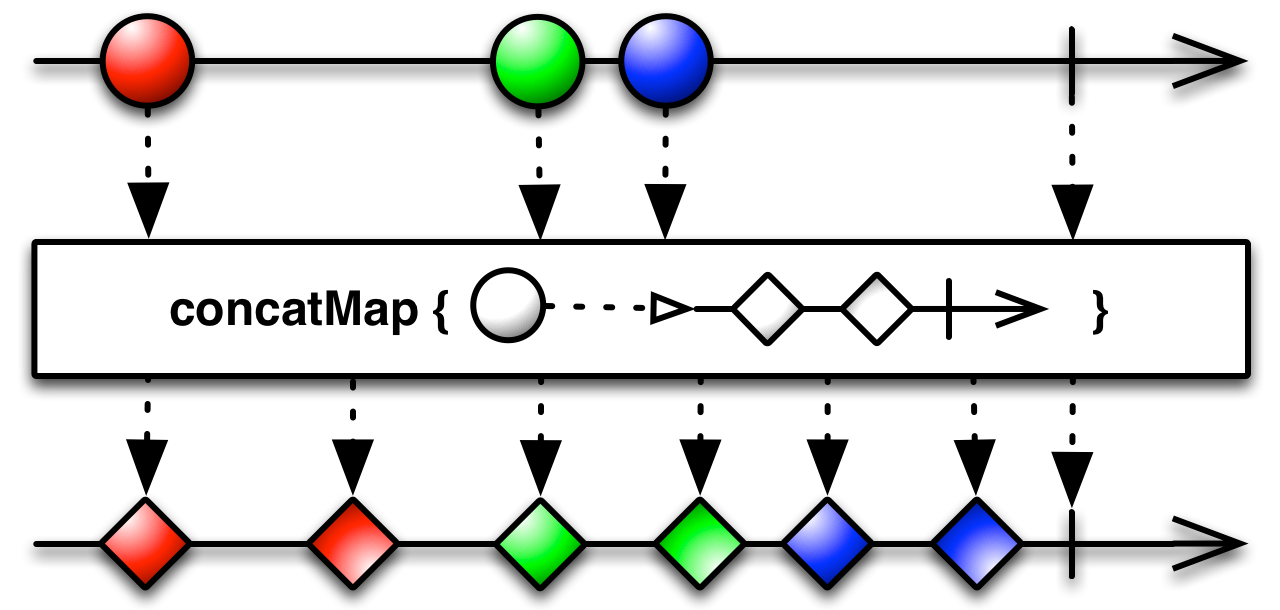
- Backpressure:
- The operator honors backpressure from downstream. Both this and the inner
Publishers are expected to honor backpressure as well. If the sourcePublisherviolates the rule, the operator will signal aMissingBackpressureException. If any of the innerPublishers doesn't honor backpressure, that may throw anIllegalStateExceptionwhen thatPublishercompletes. - Scheduler:
concatMapdoes not operate by default on a particularScheduler.
Parameters
| mapper | a function that, when applied to an item emitted by the source Publisher, returns an Publisher |
|---|---|
| prefetch | the number of elements to prefetch from the current Flowable |
Returns
- a Flowable that emits the result of applying the transformation function to each item emitted by the source Publisher and concatenating the Publishers obtained from this transformation
public final Flowable<R> concatMap (Function<? super T, ? extends Publisher<? extends R>> mapper)
Returns a new Flowable that emits items resulting from applying a function that you supply to each item emitted by the source Publisher, where that function returns a Publisher, and then emitting the items that result from concatenating those resulting Publishers.

- Backpressure:
- The operator honors backpressure from downstream. Both this and the inner
Publishers are expected to honor backpressure as well. If the sourcePublisherviolates the rule, the operator will signal aMissingBackpressureException. If any of the innerPublishers doesn't honor backpressure, that may throw anIllegalStateExceptionwhen thatPublishercompletes. - Scheduler:
concatMapdoes not operate by default on a particularScheduler.
Parameters
| mapper | a function that, when applied to an item emitted by the source Publisher, returns an Publisher |
|---|
Returns
- a Flowable that emits the result of applying the transformation function to each item emitted by the source Publisher and concatenating the Publishers obtained from this transformation
public final Flowable<R> concatMapDelayError (Function<? super T, ? extends Publisher<? extends R>> mapper, int prefetch, boolean tillTheEnd)
Maps each of the items into a Publisher, subscribes to them one after the other, one at a time and emits their values in order while delaying any error from either this or any of the inner Publishers till all of them terminate.
- Backpressure:
- The operator honors backpressure from downstream. Both this and the inner
Publishers are expected to honor backpressure as well. If the sourcePublisherviolates the rule, the operator will signal aMissingBackpressureException. If any of the innerPublishers doesn't honor backpressure, that may throw anIllegalStateExceptionwhen thatPublishercompletes. - Scheduler:
concatMapDelayErrordoes not operate by default on a particularScheduler.
Parameters
| mapper | the function that maps the items of this Publisher into the inner Publishers. |
|---|---|
| prefetch | the number of elements to prefetch from the current Flowable |
| tillTheEnd | if true, all errors from the outer and inner Publisher sources are delayed until the end, if false, an error from the main source is signalled when the current Publisher source terminates |
Returns
- the new Publisher instance with the concatenation behavior
public final Flowable<R> concatMapDelayError (Function<? super T, ? extends Publisher<? extends R>> mapper)
Maps each of the items into a Publisher, subscribes to them one after the other, one at a time and emits their values in order while delaying any error from either this or any of the inner Publishers till all of them terminate.
- Backpressure:
- The operator honors backpressure from downstream. Both this and the inner
Publishers are expected to honor backpressure as well. If the sourcePublisherviolates the rule, the operator will signal aMissingBackpressureException. If any of the innerPublishers doesn't honor backpressure, that may throw anIllegalStateExceptionwhen thatPublishercompletes. - Scheduler:
concatMapDelayErrordoes not operate by default on a particularScheduler.
Parameters
| mapper | the function that maps the items of this Publisher into the inner Publishers. |
|---|
Returns
- the new Publisher instance with the concatenation behavior
public final Flowable<R> concatMapEager (Function<? super T, ? extends Publisher<? extends R>> mapper)
Maps a sequence of values into Publishers and concatenates these Publishers eagerly into a single Publisher.
Eager concatenation means that once a subscriber subscribes, this operator subscribes to all of the source Publishers. The operator buffers the values emitted by these Publishers and then drains them in order, each one after the previous one completes.
- Backpressure:
- Backpressure is honored towards the downstream, however, due to the eagerness requirement, sources are subscribed to in unbounded mode and their values are queued up in an unbounded buffer.
- Scheduler:
- This method does not operate by default on a particular
Scheduler.
Parameters
| mapper | the function that maps a sequence of values into a sequence of Publishers that will be eagerly concatenated |
|---|
Returns
- the new Publisher instance with the specified concatenation behavior
public final Flowable<R> concatMapEager (Function<? super T, ? extends Publisher<? extends R>> mapper, int maxConcurrency, int prefetch)
Maps a sequence of values into Publishers and concatenates these Publishers eagerly into a single Publisher.
Eager concatenation means that once a subscriber subscribes, this operator subscribes to all of the source Publishers. The operator buffers the values emitted by these Publishers and then drains them in order, each one after the previous one completes.
- Backpressure:
- Backpressure is honored towards the downstream, however, due to the eagerness requirement, sources are subscribed to in unbounded mode and their values are queued up in an unbounded buffer.
- Scheduler:
- This method does not operate by default on a particular
Scheduler.
Parameters
| mapper | the function that maps a sequence of values into a sequence of Publishers that will be eagerly concatenated |
|---|---|
| maxConcurrency | the maximum number of concurrent subscribed Publishers |
| prefetch | hints about the number of expected values from each inner Publisher, must be positive |
Returns
- the new Publisher instance with the specified concatenation behavior
public final Flowable<R> concatMapEagerDelayError (Function<? super T, ? extends Publisher<? extends R>> mapper, boolean tillTheEnd)
Maps a sequence of values into Publishers and concatenates these Publishers eagerly into a single Publisher.
Eager concatenation means that once a subscriber subscribes, this operator subscribes to all of the source Publishers. The operator buffers the values emitted by these Publishers and then drains them in order, each one after the previous one completes.
- Backpressure:
- Backpressure is honored towards the downstream, however, due to the eagerness requirement, sources are subscribed to in unbounded mode and their values are queued up in an unbounded buffer.
- Scheduler:
- This method does not operate by default on a particular
Scheduler.
Parameters
| mapper | the function that maps a sequence of values into a sequence of Publishers that will be eagerly concatenated |
|---|---|
| tillTheEnd | if true, all errors from the outer and inner Publisher sources are delayed until the end, if false, an error from the main source is signalled when the current Publisher source terminates |
Returns
- the new Publisher instance with the specified concatenation behavior
public final Flowable<R> concatMapEagerDelayError (Function<? super T, ? extends Publisher<? extends R>> mapper, int maxConcurrency, int prefetch, boolean tillTheEnd)
Maps a sequence of values into Publishers and concatenates these Publishers eagerly into a single Publisher.
Eager concatenation means that once a subscriber subscribes, this operator subscribes to all of the source Publishers. The operator buffers the values emitted by these Publishers and then drains them in order, each one after the previous one completes.
- Backpressure:
- Backpressure is honored towards the downstream, however, due to the eagerness requirement, sources are subscribed to in unbounded mode and their values are queued up in an unbounded buffer.
- Scheduler:
- This method does not operate by default on a particular
Scheduler.
Parameters
| mapper | the function that maps a sequence of values into a sequence of Publishers that will be eagerly concatenated |
|---|---|
| maxConcurrency | the maximum number of concurrent subscribed Publishers |
| prefetch | the number of elements to prefetch from each source Publisher |
| tillTheEnd | if true, exceptions from the current Flowable and all the inner Publishers are delayed until all of them terminate, if false, exception from the current Flowable is delayed until the currently running Publisher terminates |
Returns
- the new Publisher instance with the specified concatenation behavior
public final Flowable<U> concatMapIterable (Function<? super T, ? extends Iterable<? extends U>> mapper)
Returns a Flowable that concatenate each item emitted by the source Publisher with the values in an Iterable corresponding to that item that is generated by a selector.
- Backpressure:
- The operator honors backpressure from downstream. The source
Publishers is expected to honor backpressure as well. If the sourcePublisherviolates the rule, the operator will signal aMissingBackpressureException. - Scheduler:
concatMapIterabledoes not operate by default on a particularScheduler.
Parameters
| mapper | a function that returns an Iterable sequence of values for when given an item emitted by the source Publisher |
|---|
Returns
- a Flowable that emits the results of concatenating the items emitted by the source Publisher with
the values in the Iterables corresponding to those items, as generated by
collectionSelector
public final Flowable<U> concatMapIterable (Function<? super T, ? extends Iterable<? extends U>> mapper, int prefetch)
Returns a Flowable that concatenate each item emitted by the source Publisher with the values in an Iterable corresponding to that item that is generated by a selector.
- Backpressure:
- The operator honors backpressure from downstream. The source
Publishers is expected to honor backpressure as well. If the sourcePublisherviolates the rule, the operator will signal aMissingBackpressureException. - Scheduler:
concatMapIterabledoes not operate by default on a particularScheduler.
Parameters
| mapper | a function that returns an Iterable sequence of values for when given an item emitted by the source Publisher |
|---|---|
| prefetch | the number of elements to prefetch from the current Flowable |
Returns
- a Flowable that emits the results of concatenating the items emitted by the source Publisher with
the values in the Iterables corresponding to those items, as generated by
collectionSelector
public final Flowable<T> concatWith (Publisher<? extends T> other)
Returns a Flowable that emits the items emitted from the current Publisher, then the next, one after the other, without interleaving them.

- Backpressure:
- The operator honors backpressure from downstream. Both this and the
otherPublishers are expected to honor backpressure as well. If any of then violates this rule, it may throw anIllegalStateExceptionwhen the sourcePublishercompletes. - Scheduler:
concatWithdoes not operate by default on a particularScheduler.
Parameters
| other | a Publisher to be concatenated after the current |
|---|
Returns
- a Flowable that emits items emitted by the two source Publishers, one after the other, without interleaving them
public final Single<Boolean> contains (Object item)
Returns a Single that emits a Boolean that indicates whether the source Publisher emitted a specified item.
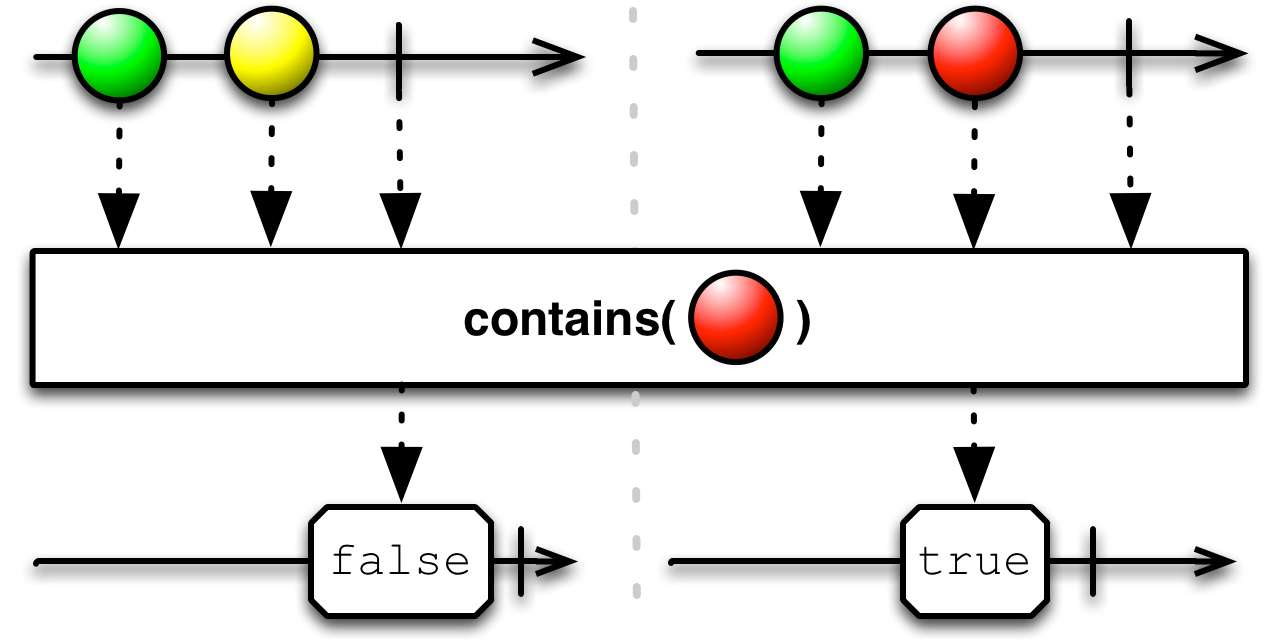
- Backpressure:
- The operator honors backpressure from downstream and consumes the source
Publisherin an unbounded manner (i.e., without applying backpressure). - Scheduler:
containsdoes not operate by default on a particularScheduler.
Parameters
| item | the item to search for in the emissions from the source Publisher |
|---|
Returns
- a Flowable that emits
trueif the specified item is emitted by the source Publisher, orfalseif the source Publisher completes without emitting that item
public final Single<Long> count ()
Returns a Single that counts the total number of items emitted by the source Publisher and emits this count as a 64-bit Long.
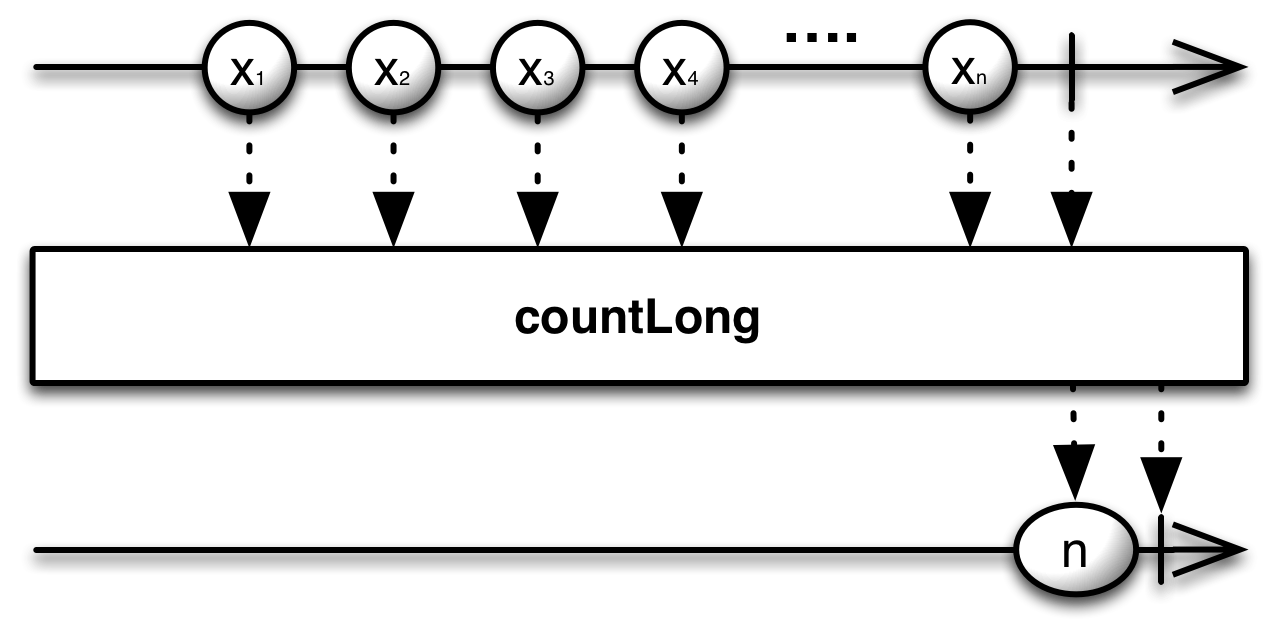
- Backpressure:
- The operator honors backpressure from downstream and consumes the source
Publisherin an unbounded manner (i.e., without applying backpressure). - Scheduler:
countdoes not operate by default on a particularScheduler.
Returns
- a Single that emits a single item: the number of items emitted by the source Publisher as a 64-bit Long item
public static Flowable<T> create (FlowableOnSubscribe<T> source, BackpressureStrategy mode)
Provides an API (via a cold Flowable) that bridges the reactive world with the callback-style, generally non-backpressured world.
Example:
Flowable.<Event>create(emitter -> {
Callback listener = new Callback() {
@Override
public void onEvent(Event e) {
emitter.onNext(e);
if (e.isLast()) {
emitter.onComplete();
}
}
@Override
public void onFailure(Exception e) {
emitter.onError(e);
}
};
AutoCloseable c = api.someMethod(listener);
emitter.setCancellable(c::close);
}, BackpressureStrategy.BUFFER);
You should call the FlowableEmitter onNext, onError and onComplete methods in a serialized fashion. The rest of its methods are thread-safe.
- Backpressure:
- The backpressure behavior is determined by the
modeparameter. - Scheduler:
createdoes not operate by default on a particularScheduler.
Parameters
| source | the emitter that is called when a Subscriber subscribes to the returned Flowable |
|---|---|
| mode | the backpressure mode to apply if the downstream Subscriber doesn't request (fast) enough |
Returns
- the new Flowable instance
public final Flowable<T> debounce (long timeout, TimeUnit unit)
Returns a Flowable that mirrors the source Publisher, except that it drops items emitted by the source Publisher that are followed by newer items before a timeout value expires. The timer resets on each emission.
Note: If items keep being emitted by the source Publisher faster than the timeout then no items will be emitted by the resulting Publisher.
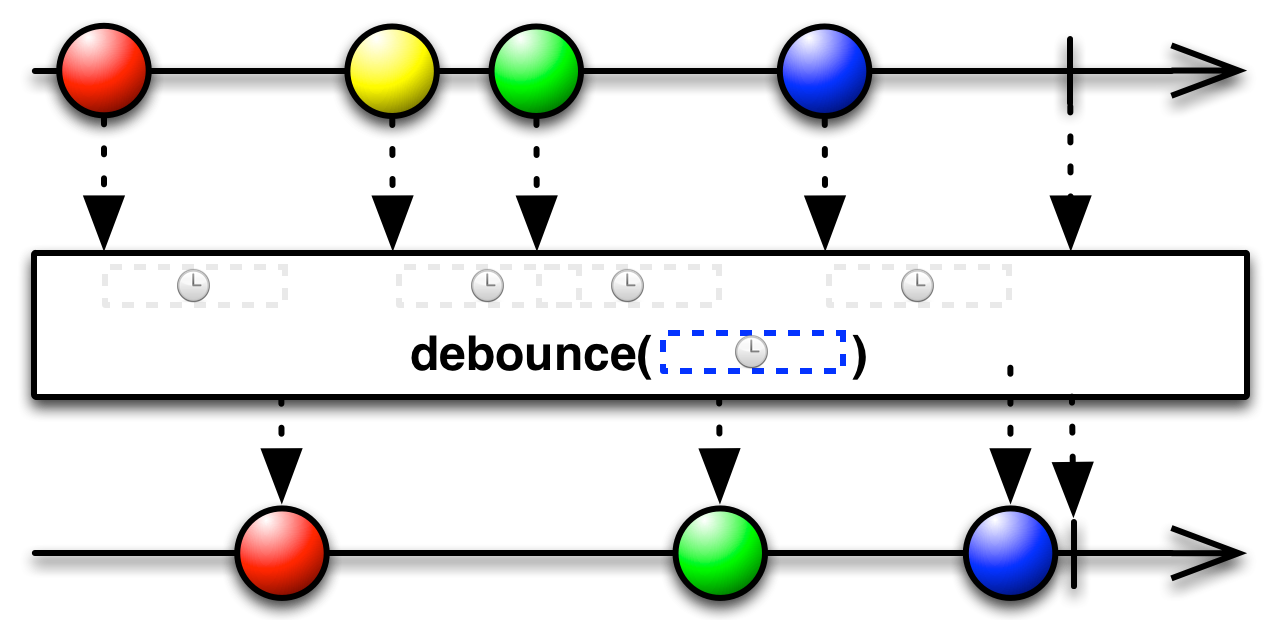
Information on debounce vs throttle:
- Debounce and Throttle: visual explanation
- Debouncing: javascript methods
- Javascript - don't spam your server: debounce and throttle
- Backpressure:
- This operator does not support backpressure as it uses time to control data flow.
- Scheduler:
- This version of
debounceoperates by default on thecomputationScheduler.
Parameters
| timeout | the time each item has to be "the most recent" of those emitted by the source Publisher to ensure that it's not dropped |
|---|---|
| unit | the TimeUnit for the timeout |
Returns
- a Flowable that filters out items from the source Publisher that are too quickly followed by newer items
public final Flowable<T> debounce (long timeout, TimeUnit unit, Scheduler scheduler)
Returns a Flowable that mirrors the source Publisher, except that it drops items emitted by the source Publisher that are followed by newer items before a timeout value expires on a specified Scheduler. The timer resets on each emission.
Note: If items keep being emitted by the source Publisher faster than the timeout then no items will be emitted by the resulting Publisher.
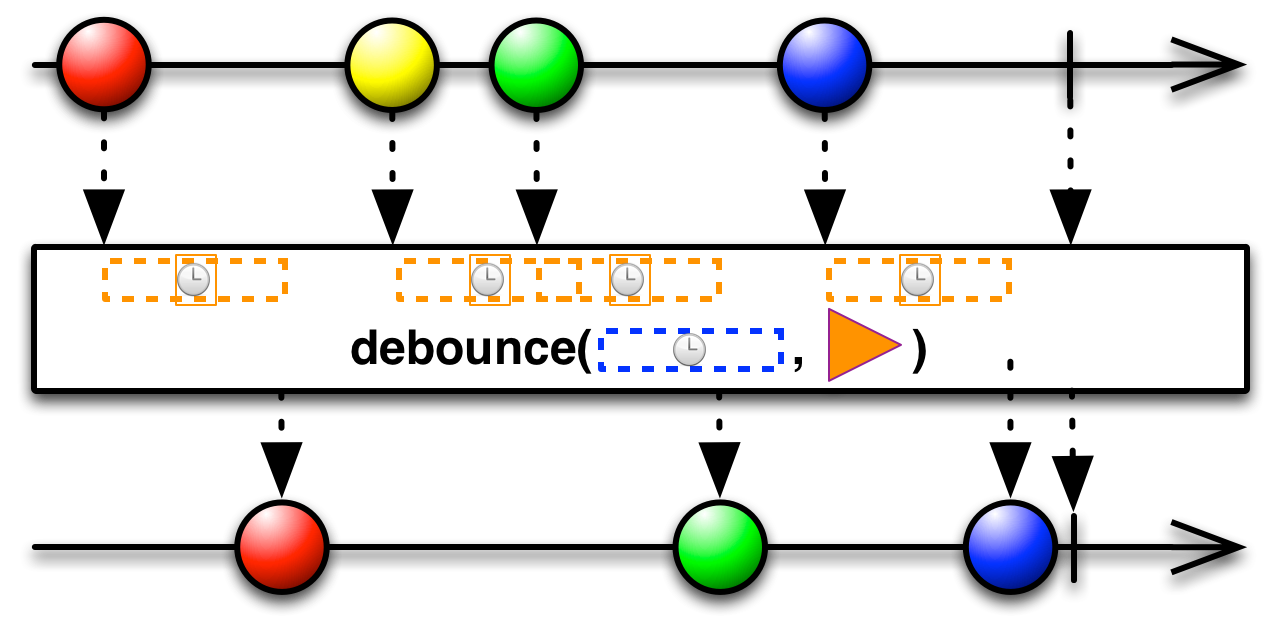
Information on debounce vs throttle:
- Debounce and Throttle: visual explanation
- Debouncing: javascript methods
- Javascript - don't spam your server: debounce and throttle
- Backpressure:
- This operator does not support backpressure as it uses time to control data flow.
- Scheduler:
- You specify which
Schedulerthis operator will use
Parameters
| timeout | the time each item has to be "the most recent" of those emitted by the source Publisher to ensure that it's not dropped |
|---|---|
| unit | the unit of time for the specified timeout |
| scheduler | the Scheduler to use internally to manage the timers that handle the timeout for each
item |
Returns
- a Flowable that filters out items from the source Publisher that are too quickly followed by newer items
public final Flowable<T> debounce (Function<? super T, ? extends Publisher<U>> debounceIndicator)
Returns a Flowable that mirrors the source Publisher, except that it drops items emitted by the source Publisher that are followed by another item within a computed debounce duration.
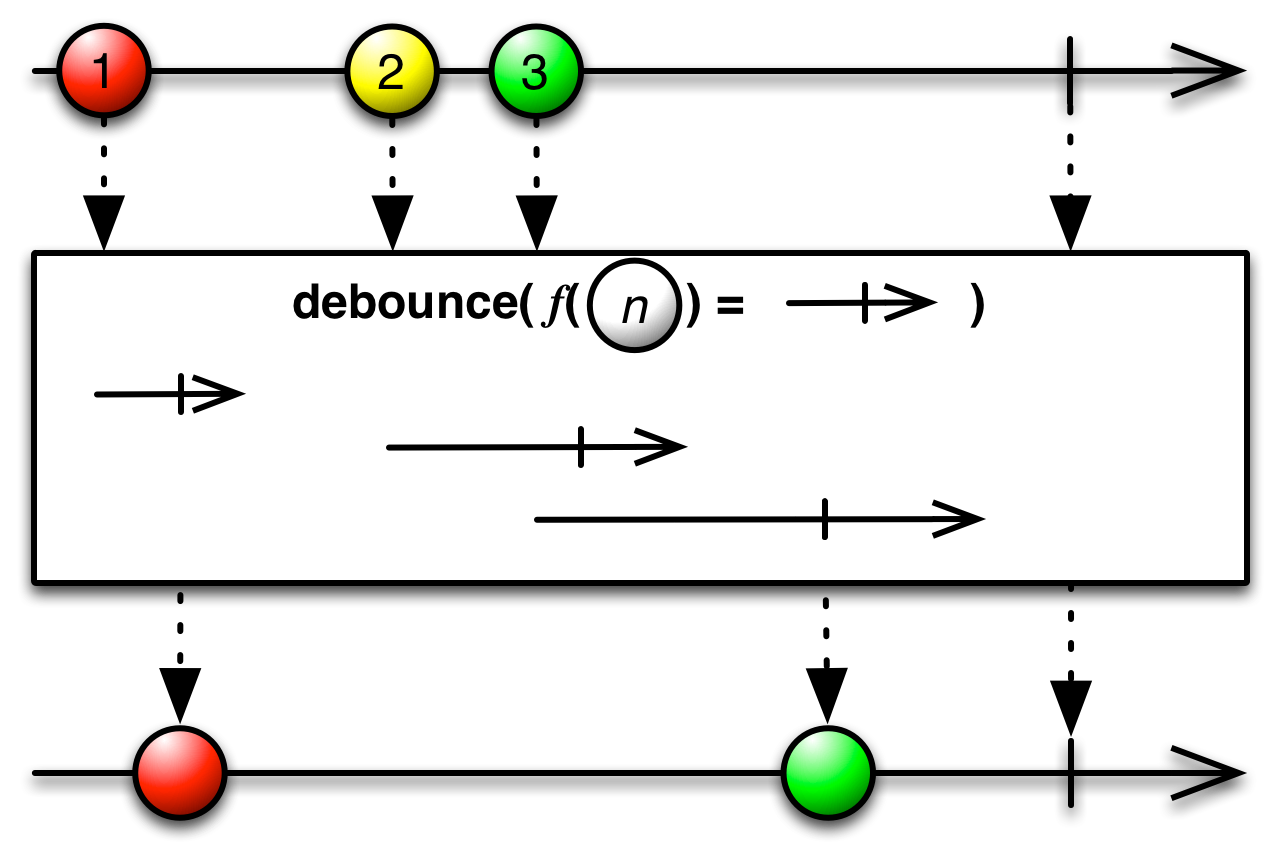
- Backpressure:
- This operator does not support backpressure as it uses the
debounceSelectorto mark boundaries. - Scheduler:
- This version of
debouncedoes not operate by default on a particularScheduler.
Parameters
| debounceIndicator | function to retrieve a sequence that indicates the throttle duration for each item |
|---|
Returns
- a Flowable that omits items emitted by the source Publisher that are followed by another item within a computed debounce duration
public final Flowable<T> defaultIfEmpty (T defaultItem)
Returns a Flowable that emits the items emitted by the source Publisher or a specified default item if the source Publisher is empty.
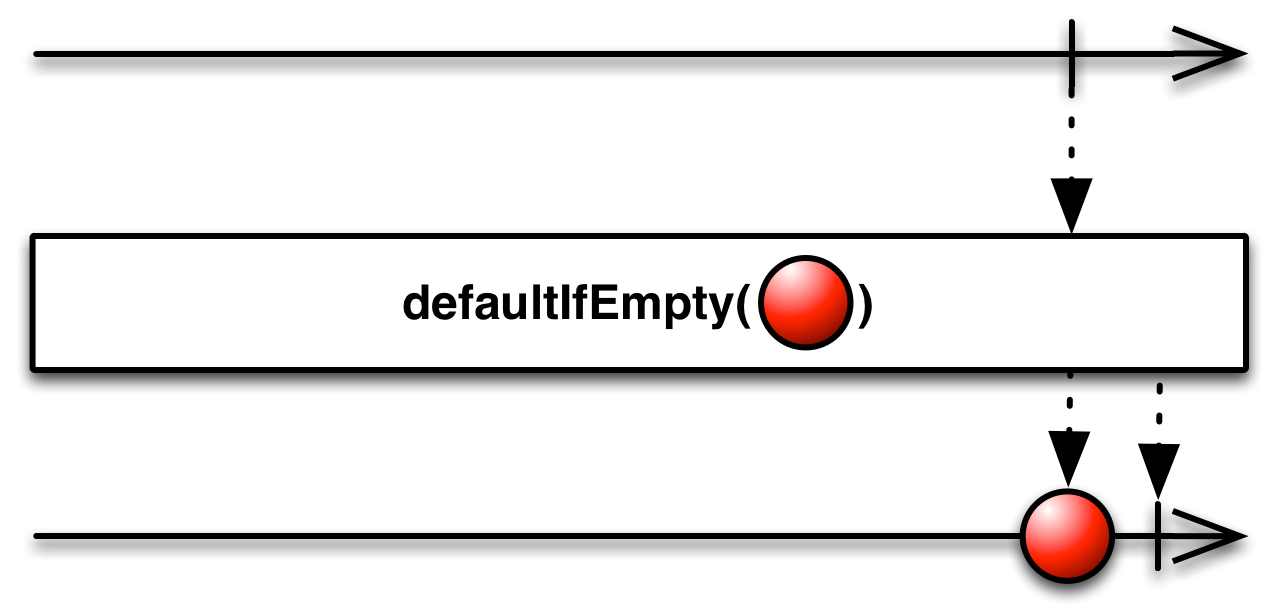
- Backpressure:
- If the source
Publisheris empty, this operator is guaranteed to honor backpressure from downstream. If the sourcePublisheris non-empty, it is expected to honor backpressure as well; if the rule is violated, aMissingBackpressureExceptionmay get signalled somewhere downstream. - Scheduler:
defaultIfEmptydoes not operate by default on a particularScheduler.
Parameters
| defaultItem | the item to emit if the source Publisher emits no items |
|---|
Returns
- a Flowable that emits either the specified default item if the source Publisher emits no items, or the items emitted by the source Publisher
public static Flowable<T> defer (Callable<? extends Publisher<? extends T>> supplier)
Returns a Flowable that calls a Publisher factory to create a Publisher for each new Subscriber that subscribes. That is, for each subscriber, the actual Publisher that subscriber observes is determined by the factory function.
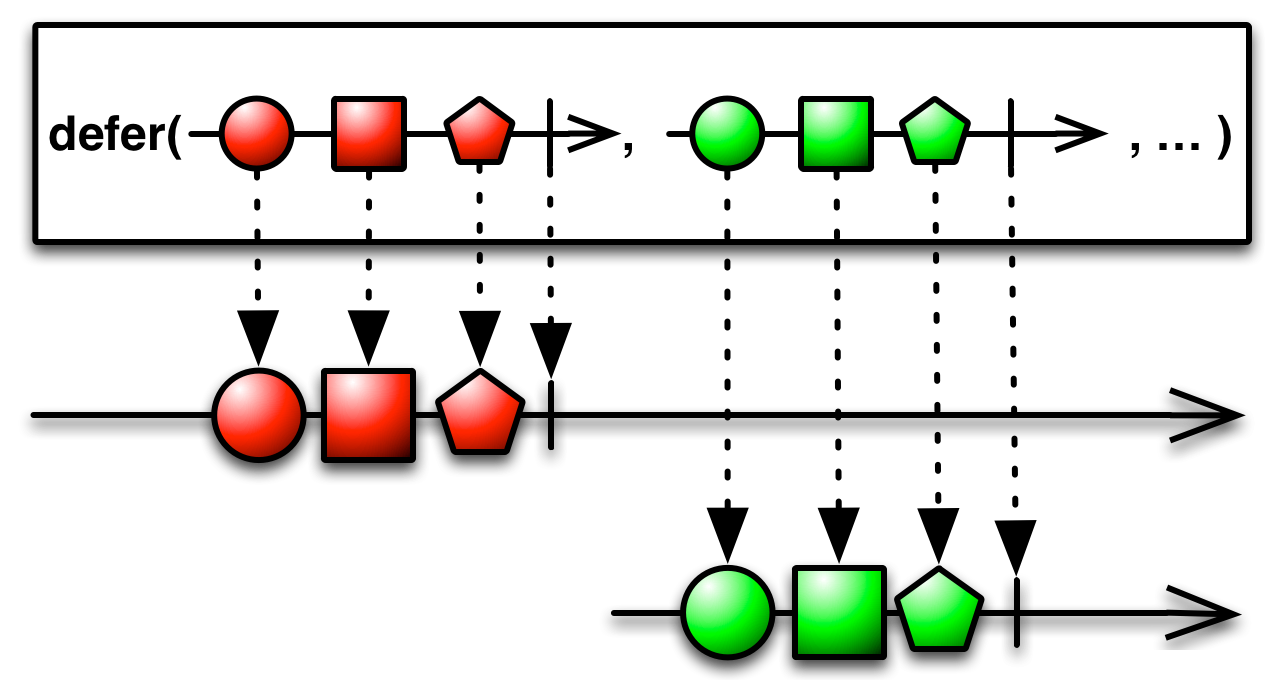
The defer Subscriber allows you to defer or delay emitting items from a Publisher until such time as an Subscriber subscribes to the Publisher. This allows a Subscriber to easily obtain updates or a refreshed version of the sequence.
- Backpressure:
- The operator itself doesn't interfere with backpressure which is determined by the
Publisherreturned by thesupplier. - Scheduler:
deferdoes not operate by default on a particularScheduler.
Parameters
| supplier | the Publisher factory function to invoke for each Subscriber that subscribes to the resulting Publisher |
|---|
Returns
- a Flowable whose Subscribers' subscriptions trigger an invocation of the given Publisher factory function
public final Flowable<T> delay (long delay, TimeUnit unit, boolean delayError)
Returns a Flowable that emits the items emitted by the source Publisher shifted forward in time by a specified delay. Error notifications from the source Publisher are not delayed.
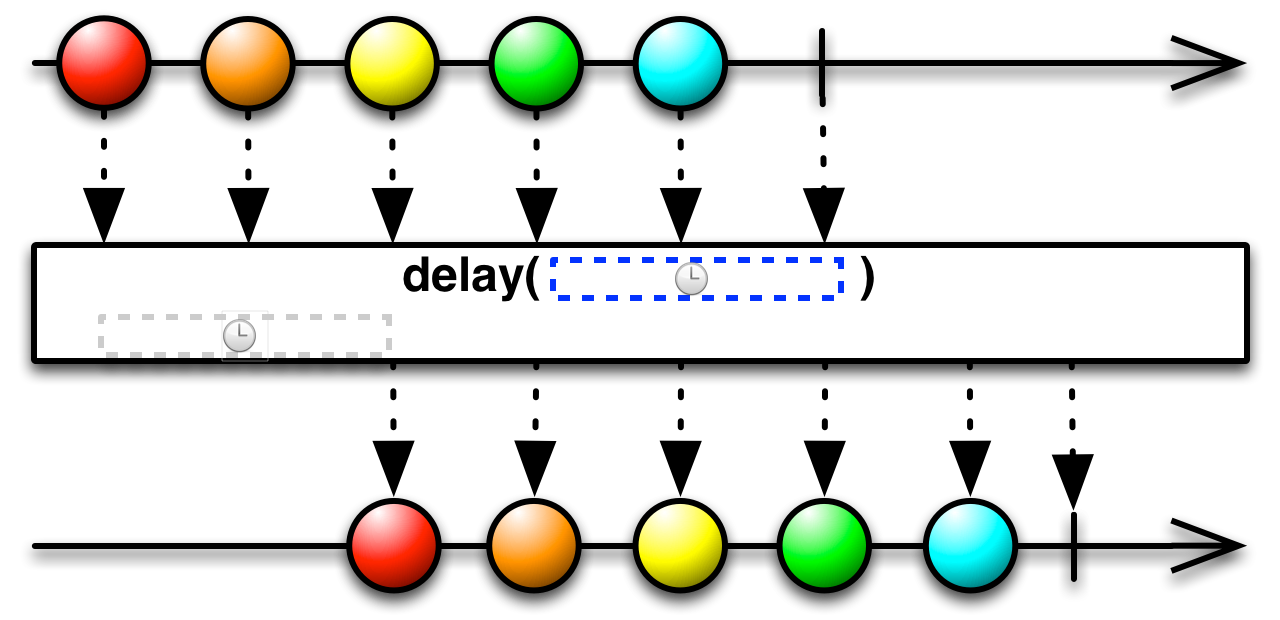
- Backpressure:
- The operator doesn't interfere with the backpressure behavior which is determined by the source
Publisher. - Scheduler:
- This version of
delayoperates by default on thecomputationScheduler.
Parameters
| delay | the delay to shift the source by |
|---|---|
| unit | the TimeUnit in which period is defined |
| delayError | if true, the upstream exception is signalled with the given delay, after all preceding normal elements, if false, the upstream exception is signalled immediately |
Returns
- the source Publisher shifted in time by the specified delay
public final Flowable<T> delay (Publisher<U> subscriptionIndicator, Function<? super T, ? extends Publisher<V>> itemDelayIndicator)
Returns a Flowable that delays the subscription to and emissions from the source Publisher via another Publisher on a per-item basis.

Note: the resulting Publisher will immediately propagate any onError notification
from the source Publisher.
- Backpressure:
- The operator doesn't interfere with the backpressure behavior which is determined by the source
Publisher. All of the otherPublishers supplied by the functions are consumed in an unbounded manner (i.e., no backpressure applied to them). - Scheduler:
- This version of
delaydoes not operate by default on a particularScheduler.
Parameters
| subscriptionIndicator | a function that returns a Publisher that triggers the subscription to the source Publisher once it emits any item |
|---|---|
| itemDelayIndicator | a function that returns a Publisher for each item emitted by the source Publisher, which is
then used to delay the emission of that item by the resulting Publisher until the Publisher
returned from itemDelay emits an item |
Returns
- a Flowable that delays the subscription and emissions of the source Publisher via another Publisher on a per-item basis
public final Flowable<T> delay (long delay, TimeUnit unit, Scheduler scheduler)
Returns a Flowable that emits the items emitted by the source Publisher shifted forward in time by a specified delay. Error notifications from the source Publisher are not delayed.
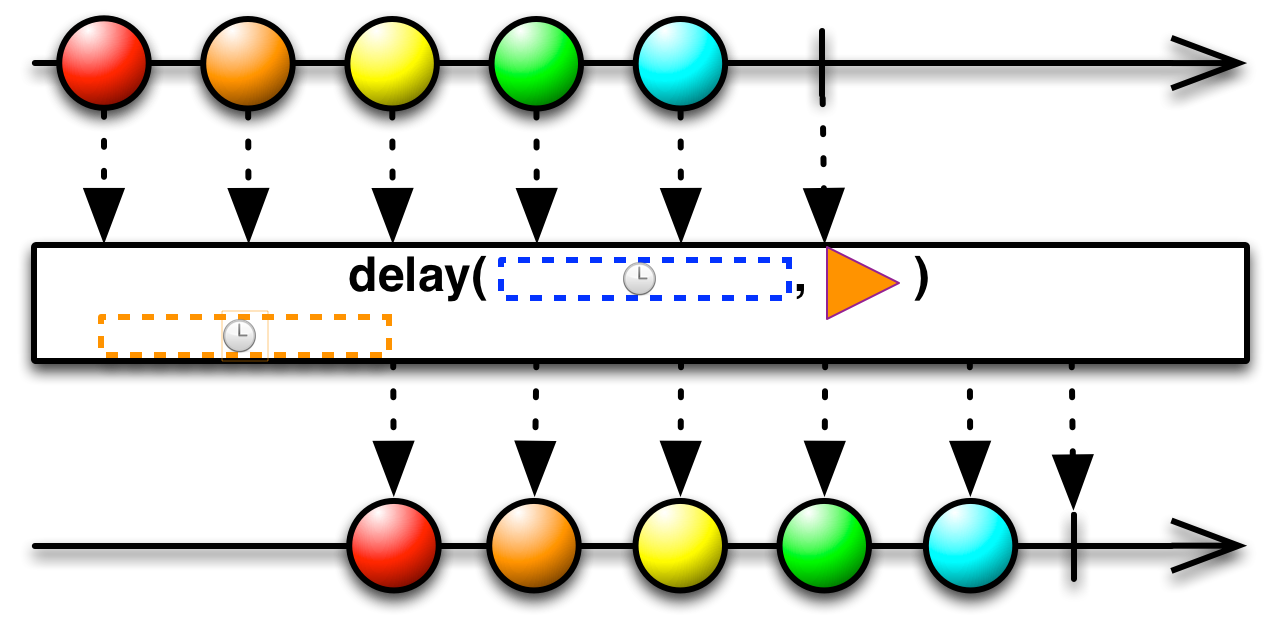
- Backpressure:
- The operator doesn't interfere with the backpressure behavior which is determined by the source
Publisher. - Scheduler:
- You specify which
Schedulerthis operator will use
Parameters
| delay | the delay to shift the source by |
|---|---|
| unit | the time unit of delay |
| scheduler | the Scheduler to use for delaying |
Returns
- the source Publisher shifted in time by the specified delay
public final Flowable<T> delay (long delay, TimeUnit unit, Scheduler scheduler, boolean delayError)
Returns a Flowable that emits the items emitted by the source Publisher shifted forward in time by a specified delay. Error notifications from the source Publisher are not delayed.

- Backpressure:
- The operator doesn't interfere with the backpressure behavior which is determined by the source
Publisher. - Scheduler:
- You specify which
Schedulerthis operator will use
Parameters
| delay | the delay to shift the source by |
|---|---|
| unit | the time unit of delay |
| scheduler | the Scheduler to use for delaying |
| delayError | if true, the upstream exception is signalled with the given delay, after all preceding normal elements, if false, the upstream exception is signalled immediately |
Returns
- the source Publisher shifted in time by the specified delay
public final Flowable<T> delay (Function<? super T, ? extends Publisher<U>> itemDelayIndicator)
Returns a Flowable that delays the emissions of the source Publisher via another Publisher on a per-item basis.
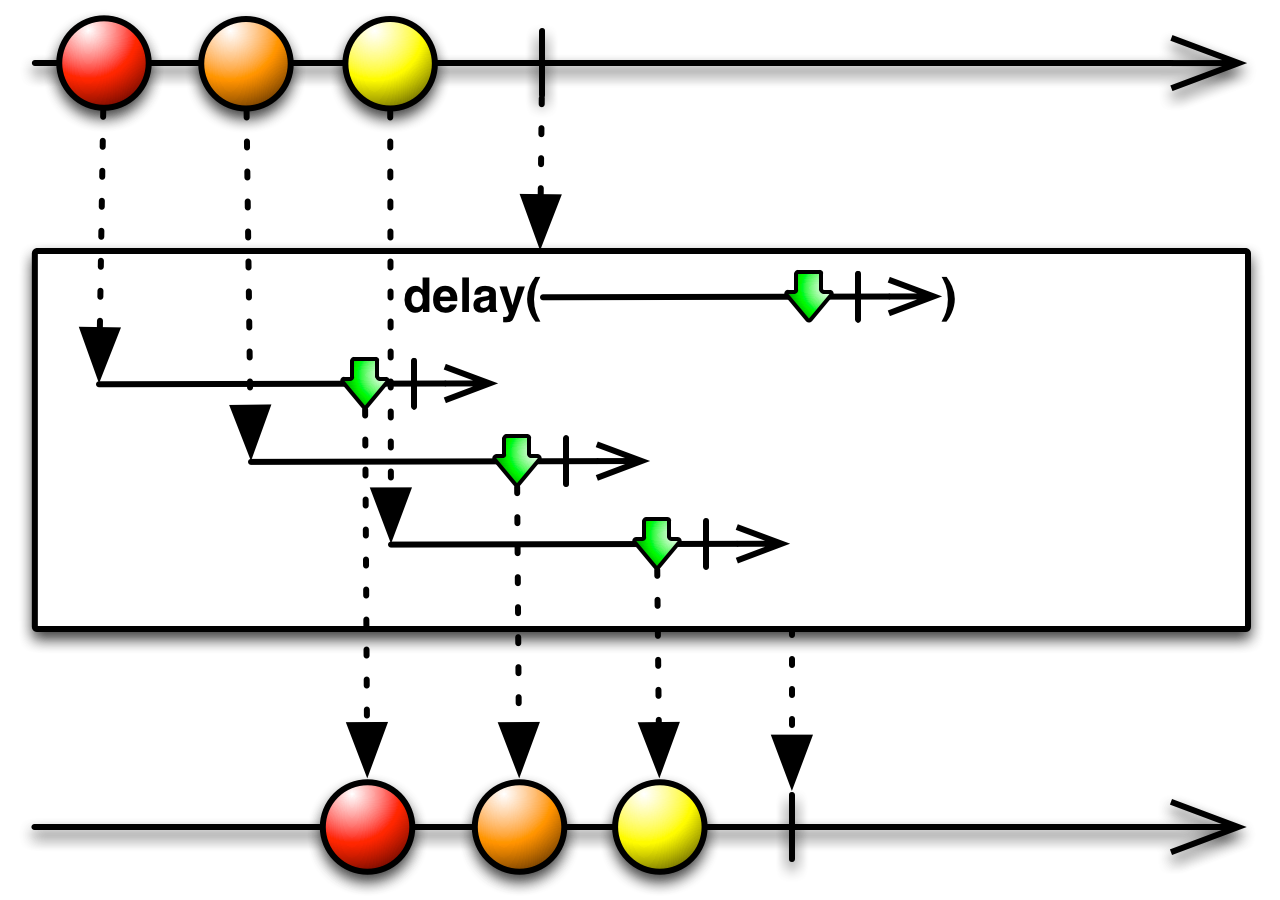
Note: the resulting Publisher will immediately propagate any onError notification
from the source Publisher.
- Backpressure:
- The operator doesn't interfere with the backpressure behavior which is determined by the source
Publisher. All of the otherPublishers supplied by the function are consumed in an unbounded manner (i.e., no backpressure applied to them). - Scheduler:
- This version of
delaydoes not operate by default on a particularScheduler.
Parameters
| itemDelayIndicator | a function that returns a Publisher for each item emitted by the source Publisher, which is
then used to delay the emission of that item by the resulting Publisher until the Publisher
returned from itemDelay emits an item |
|---|
Returns
- a Flowable that delays the emissions of the source Publisher via another Publisher on a per-item basis
public final Flowable<T> delay (long delay, TimeUnit unit)
Returns a Flowable that emits the items emitted by the source Publisher shifted forward in time by a specified delay. Error notifications from the source Publisher are not delayed.

- Backpressure:
- The operator doesn't interfere with the backpressure behavior which is determined by the source
Publisher. - Scheduler:
- This version of
delayoperates by default on thecomputationScheduler.
Parameters
| delay | the delay to shift the source by |
|---|---|
| unit | the TimeUnit in which period is defined |
Returns
- the source Publisher shifted in time by the specified delay
public final Flowable<T> delaySubscription (Publisher<U> subscriptionIndicator)
Returns a Flowable that delays the subscription to this Publisher until the other Publisher emits an element or completes normally.
- Backpressure:
- The operator forwards the backpressure requests to this Publisher once the subscription happens and requests Long.MAX_VALUE from the other Publisher
- Scheduler:
- This method does not operate by default on a particular
Scheduler.
Parameters
| subscriptionIndicator | the other Publisher that should trigger the subscription to this Publisher. |
|---|
Returns
- a Flowable that delays the subscription to this Publisher until the other Publisher emits an element or completes normally.
public final Flowable<T> delaySubscription (long delay, TimeUnit unit, Scheduler scheduler)
Returns a Flowable that delays the subscription to the source Publisher by a given amount of time, both waiting and subscribing on a given Scheduler.
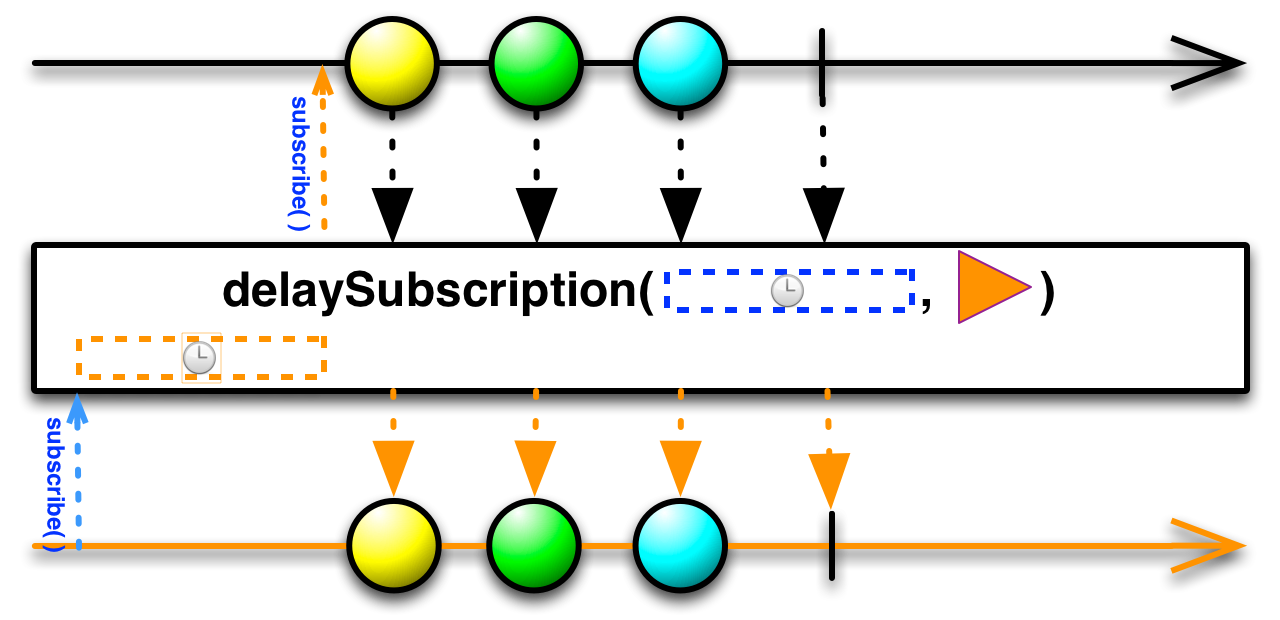
- Backpressure:
- The operator doesn't interfere with the backpressure behavior which is determined by the source
Publisher. - Scheduler:
- You specify which
Schedulerthis operator will use
Parameters
| delay | the time to delay the subscription |
|---|---|
| unit | the time unit of delay |
| scheduler | the Scheduler on which the waiting and subscription will happen |
Returns
- a Flowable that delays the subscription to the source Publisher by a given amount, waiting and subscribing on the given Scheduler
public final Flowable<T> delaySubscription (long delay, TimeUnit unit)
Returns a Flowable that delays the subscription to the source Publisher by a given amount of time.
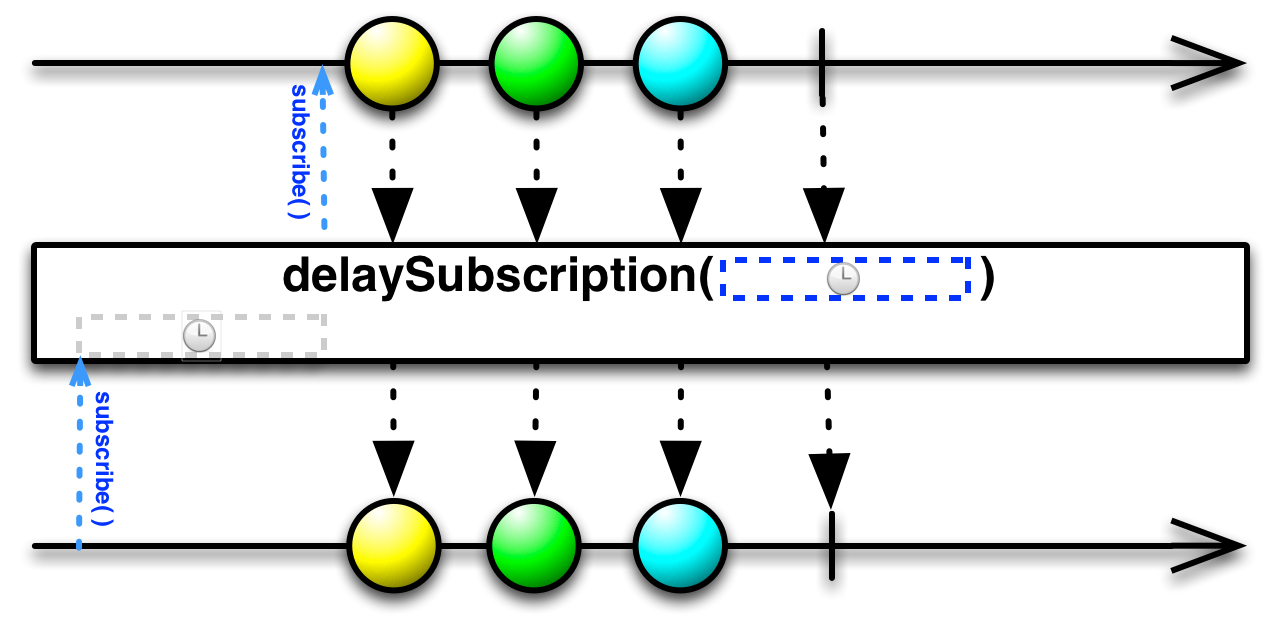
- Backpressure:
- The operator doesn't interfere with the backpressure behavior which is determined by the source
Publisher. - Scheduler:
- This version of
delaySubscriptionoperates by default on thecomputationScheduler.
Parameters
| delay | the time to delay the subscription |
|---|---|
| unit | the time unit of delay |
Returns
- a Flowable that delays the subscription to the source Publisher by the given amount
public final Flowable<T2> dematerialize ()
Returns a Flowable that reverses the effect of materialize by transforming the
Notification objects emitted by the source Publisher into the items or notifications they
represent.
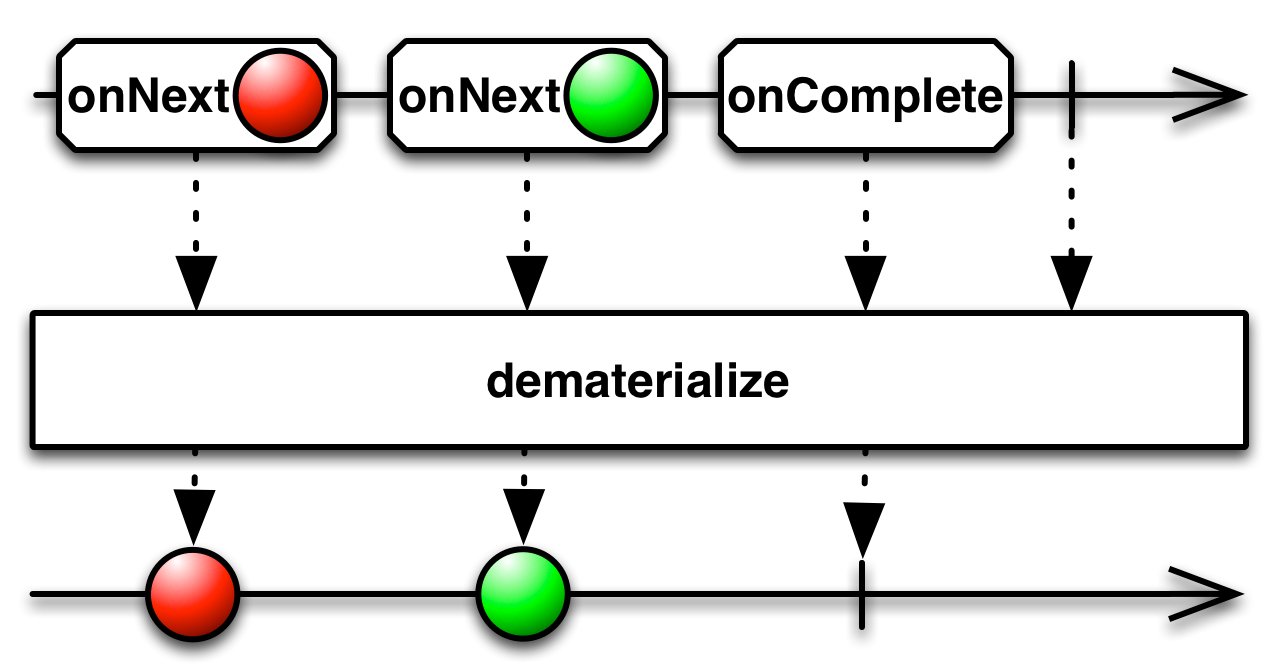
- Backpressure:
- The operator doesn't interfere with backpressure which is determined by the source
Publisher's backpressure behavior. - Scheduler:
dematerializedoes not operate by default on a particularScheduler.
Returns
- a Flowable that emits the items and notifications embedded in the
Notificationobjects emitted by the source Publisher
public final Flowable<T> distinct ()
Returns a Flowable that emits all items emitted by the source Publisher that are distinct.
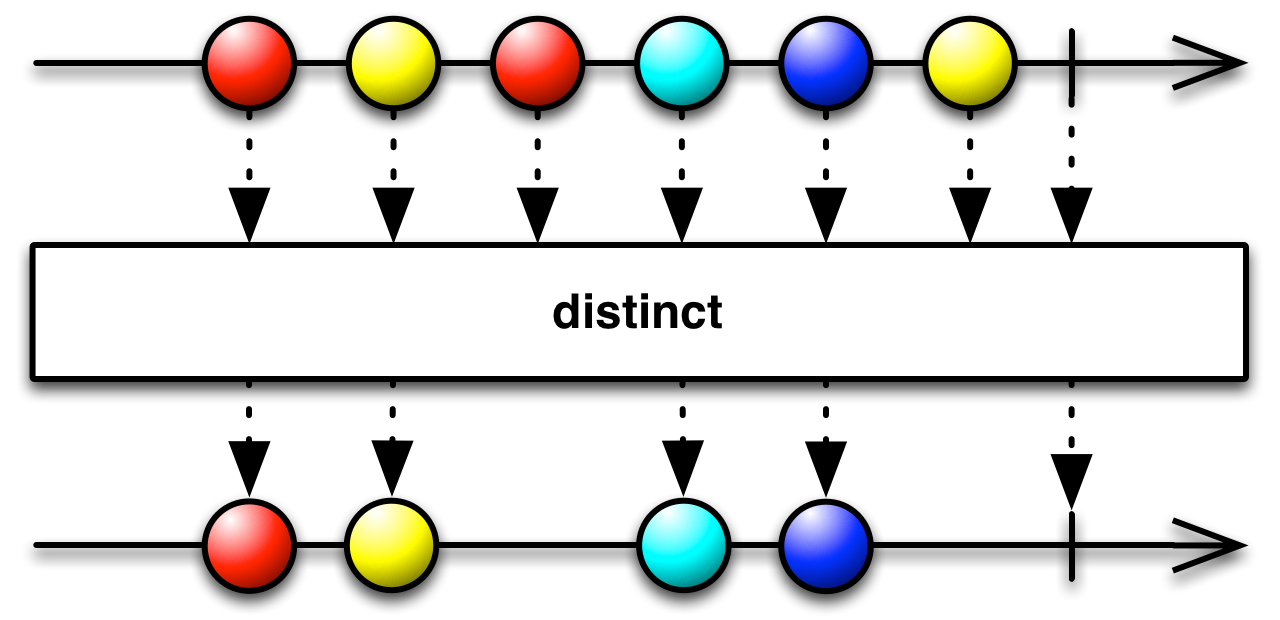
- Backpressure:
- The operator doesn't interfere with backpressure which is determined by the source
Publisher's backpressure behavior. - Scheduler:
distinctdoes not operate by default on a particularScheduler.
Returns
- a Flowable that emits only those items emitted by the source Publisher that are distinct from each other
public final Flowable<T> distinct (Function<? super T, K> keySelector)
Returns a Flowable that emits all items emitted by the source Publisher that are distinct according to a key selector function.
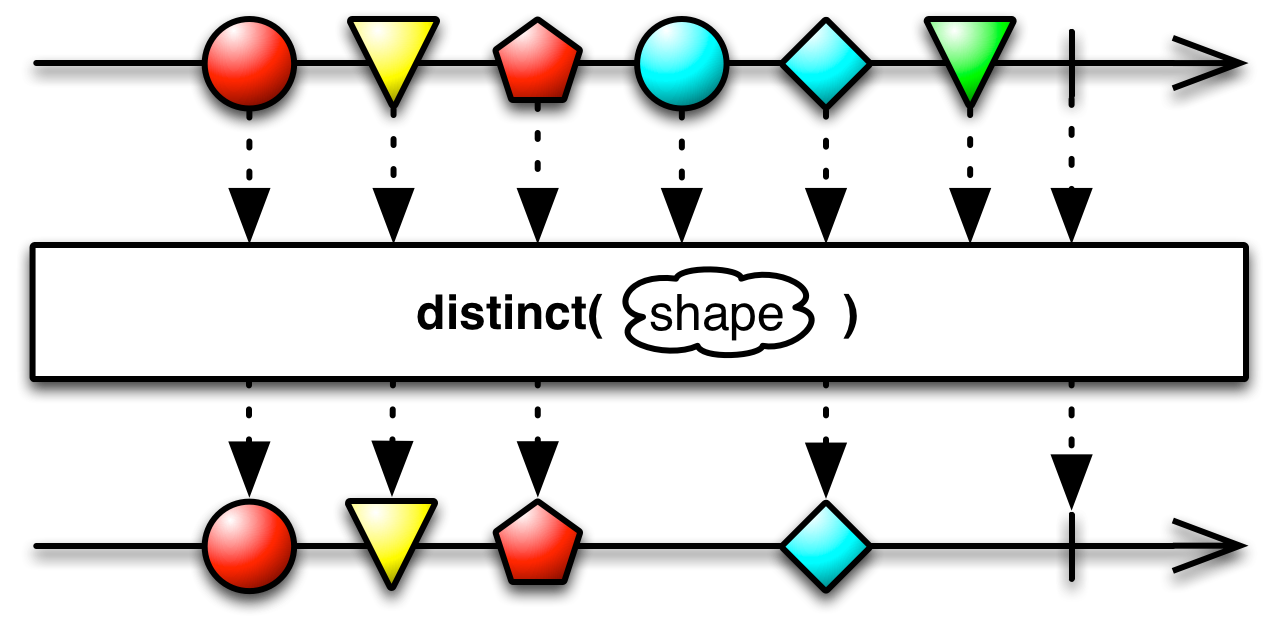
- Backpressure:
- The operator doesn't interfere with backpressure which is determined by the source
Publisher's backpressure behavior. - Scheduler:
distinctdoes not operate by default on a particularScheduler.
Parameters
| keySelector | a function that projects an emitted item to a key value that is used to decide whether an item is distinct from another one or not |
|---|
Returns
- a Flowable that emits those items emitted by the source Publisher that have distinct keys
public final Flowable<T> distinct (Function<? super T, K> keySelector, Callable<? extends Collection<? super K>> collectionSupplier)
Returns a Flowable that emits all items emitted by the source Publisher that are distinct according to a key selector function.

- Backpressure:
- The operator doesn't interfere with backpressure which is determined by the source
Publisher's backpressure behavior. - Scheduler:
distinctdoes not operate by default on a particularScheduler.
Parameters
| keySelector | a function that projects an emitted item to a key value that is used to decide whether an item is distinct from another one or not |
|---|---|
| collectionSupplier | function called for each individual Subscriber to return a Collection subtype for holding the extracted keys and whose add() method's return indicates uniqueness. |
Returns
- a Flowable that emits those items emitted by the source Publisher that have distinct keys
public final Flowable<T> distinctUntilChanged (BiPredicate<? super T, ? super T> comparer)
Returns a Flowable that emits all items emitted by the source Publisher that are distinct from their immediate predecessors when compared with each other via the provided comparator function.
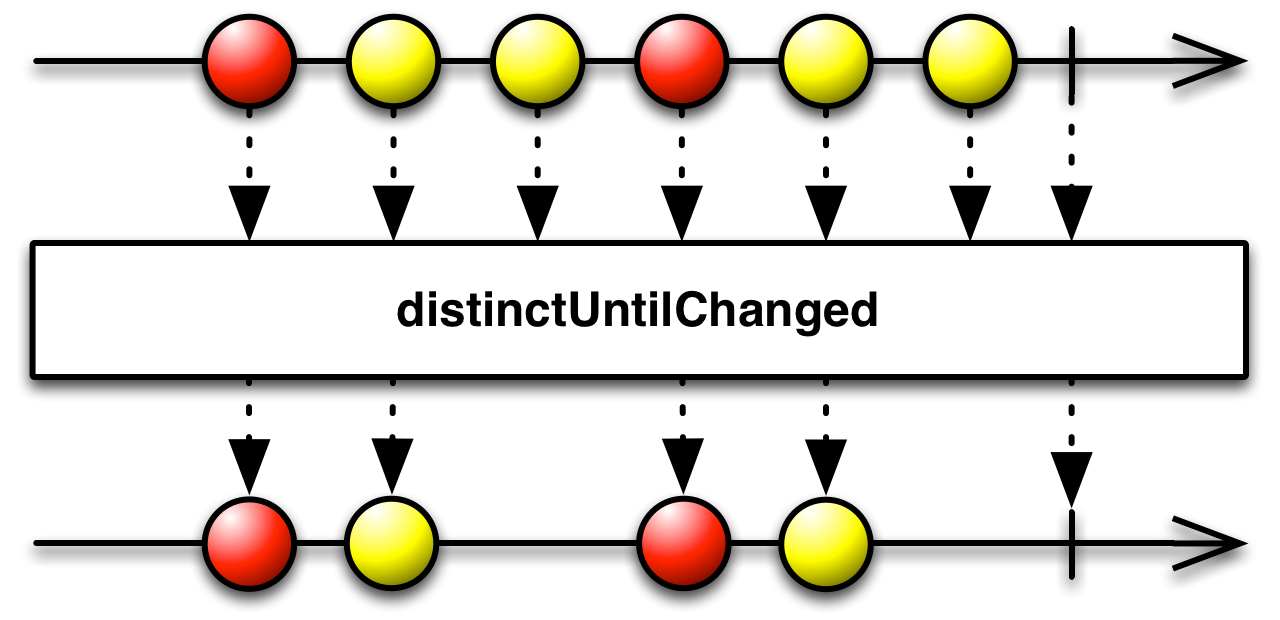
- Backpressure:
- The operator doesn't interfere with backpressure which is determined by the source
Publisher's backpressure behavior. - Scheduler:
distinctUntilChangeddoes not operate by default on a particularScheduler.
Parameters
| comparer | the function that receives the previous item and the current item and is expected to return true if the two are equal, thus skipping the current value. |
|---|
Returns
- a Flowable that emits those items from the source Publisher that are distinct from their immediate predecessors
public final Flowable<T> distinctUntilChanged (Function<? super T, K> keySelector)
Returns a Flowable that emits all items emitted by the source Publisher that are distinct from their immediate predecessors, according to a key selector function.
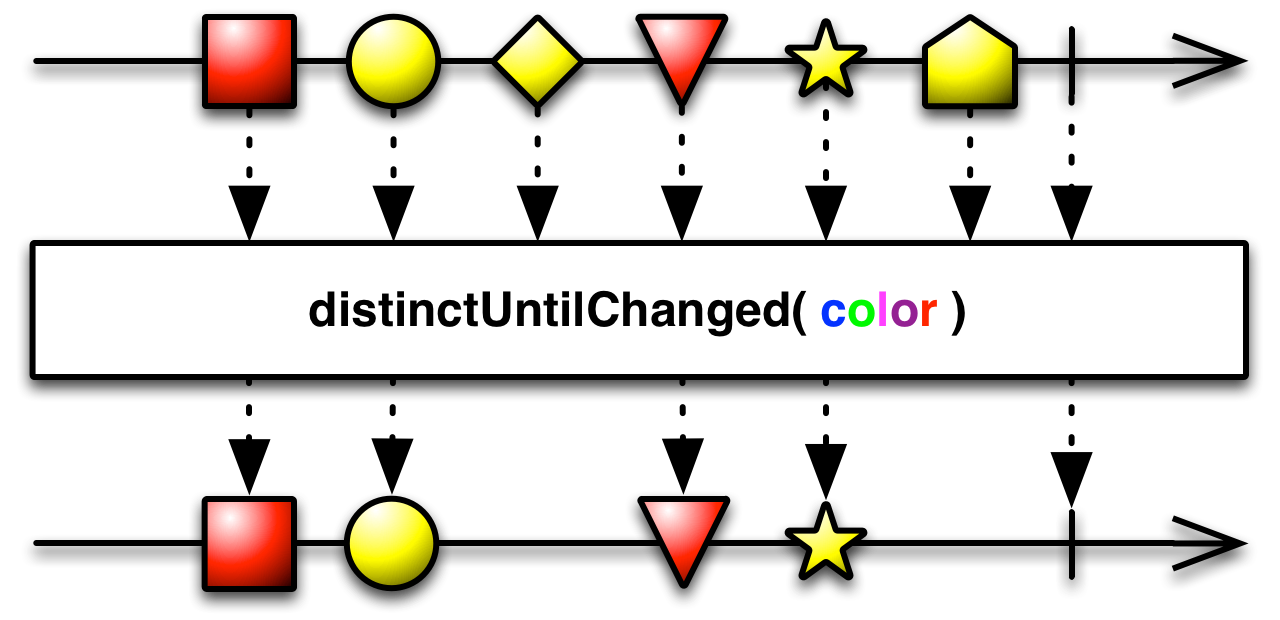
- Backpressure:
- The operator doesn't interfere with backpressure which is determined by the source
Publisher's backpressure behavior. - Scheduler:
distinctUntilChangeddoes not operate by default on a particularScheduler.
Parameters
| keySelector | a function that projects an emitted item to a key value that is used to decide whether an item is distinct from another one or not |
|---|
Returns
- a Flowable that emits those items from the source Publisher whose keys are distinct from those of their immediate predecessors
public final Flowable<T> distinctUntilChanged ()
Returns a Flowable that emits all items emitted by the source Publisher that are distinct from their immediate predecessors.

- Backpressure:
- The operator doesn't interfere with backpressure which is determined by the source
Publisher's backpressure behavior. - Scheduler:
distinctUntilChangeddoes not operate by default on a particularScheduler.
Returns
- a Flowable that emits those items from the source Publisher that are distinct from their immediate predecessors
public final Flowable<T> doAfterNext (Consumer<? super T> onAfterNext)
Calls the specified consumer with the current item after this item has been emitted to the downstream.
Note that the onAfterNext action is shared between subscriptions and as such
should be thread-safe.
- Backpressure:
- The operator doesn't interfere with backpressure which is determined by the source
Publisher's backpressure behavior. - Scheduler:
doAfterNextdoes not operate by default on a particularScheduler.- Operator-fusion:
- This operator supports normal and conditional Subscribers as well as boundary-limited synchronous or asynchronous queue-fusion.
History: 2.0.1 - experimental
Parameters
| onAfterNext | the Consumer that will be called after emitting an item from upstream to the downstream |
|---|
Returns
- the new Flowable instance
public final Flowable<T> doAfterTerminate (Action onAfterTerminate)
Registers an Action to be called when this Publisher invokes either
onComplete or onError.
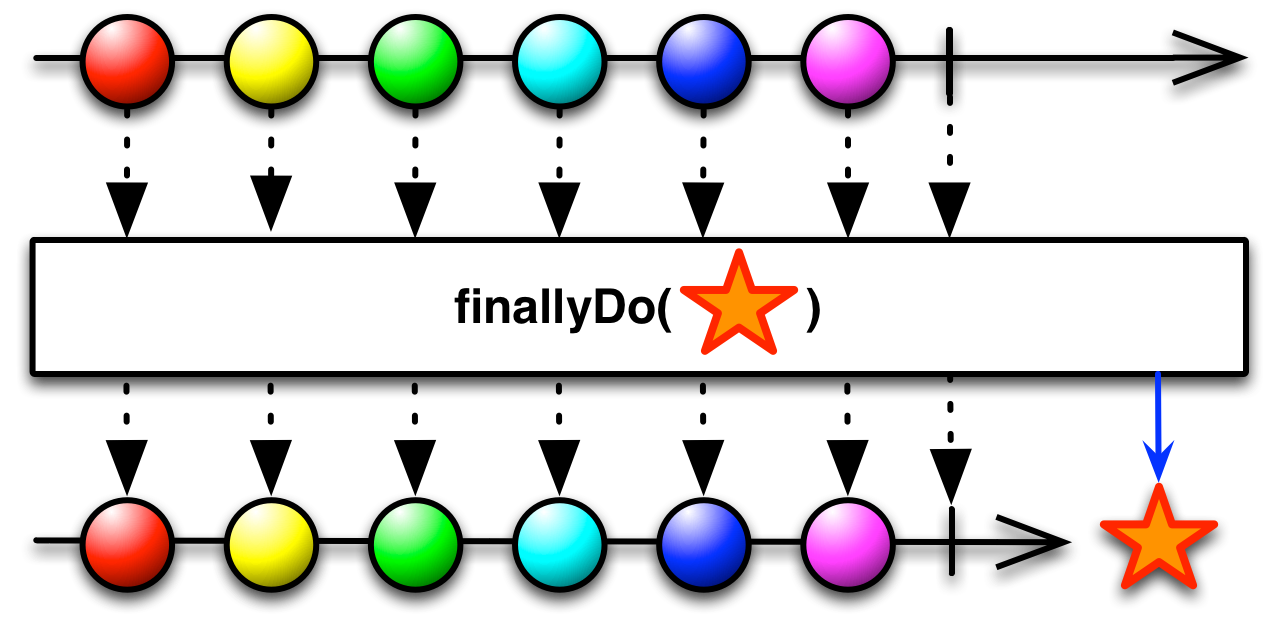
- Backpressure:
- The operator doesn't interfere with backpressure which is determined by the source
Publisher's backpressure behavior. - Scheduler:
doAfterTerminatedoes not operate by default on a particularScheduler.
Parameters
| onAfterTerminate | an Action to be invoked when the source Publisher finishes |
|---|
Returns
- a Flowable that emits the same items as the source Publisher, then invokes the
Action
public final Flowable<T> doFinally (Action onFinally)
Calls the specified action after this Flowable signals onError or onCompleted or gets cancelled by the downstream.
In case of a race between a terminal event and a cancellation, the provided onFinally action
is executed once per subscription.
Note that the onFinally action is shared between subscriptions and as such
should be thread-safe.
- Backpressure:
- The operator doesn't interfere with backpressure which is determined by the source
Publisher's backpressure behavior. - Scheduler:
doFinallydoes not operate by default on a particularScheduler.- Operator-fusion:
- This operator supports normal and conditional Subscribers as well as boundary-limited synchronous or asynchronous queue-fusion.
History: 2.0.1 - experimental
Parameters
| onFinally | the action called when this Flowable terminates or gets cancelled |
|---|
Returns
- the new Flowable instance
public final Flowable<T> doOnCancel (Action onCancel)
Calls the cancel Action if the downstream cancels the sequence.
The action is shared between subscriptions and thus may be called concurrently from multiple threads; the action must be thread safe.
If the action throws a runtime exception, that exception is rethrown by the onCancel() call,
sometimes as a CompositeException if there were multiple exceptions along the way.
Note that terminal events trigger the action unless the Publisher is subscribed to via unsafeSubscribe().
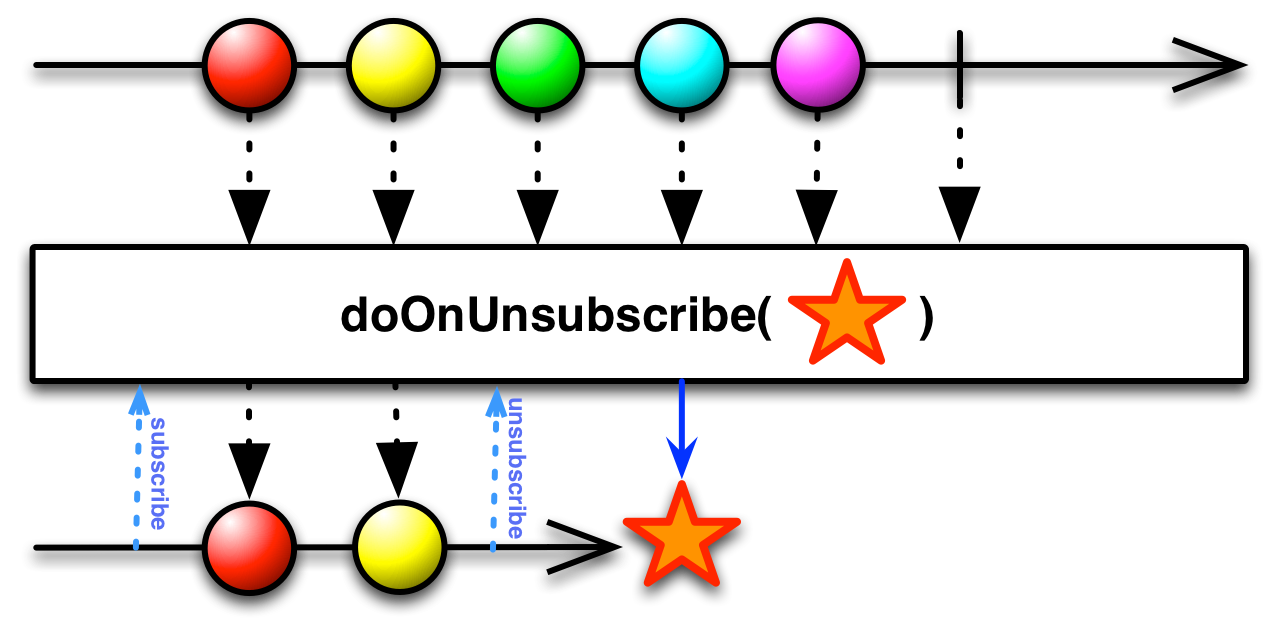
- Backpressure:
doOnCanceldoes not interact with backpressure requests or value delivery; backpressure behavior is preserved between its upstream and its downstream.- Scheduler:
doOnCanceldoes not operate by default on a particularScheduler.
Parameters
| onCancel | the action that gets called when the source Publisher's Subscription is cancelled |
|---|
Returns
- the source
Publishermodified so as to call this Action when appropriate
public final Flowable<T> doOnComplete (Action onComplete)
Modifies the source Publisher so that it invokes an action when it calls onComplete.
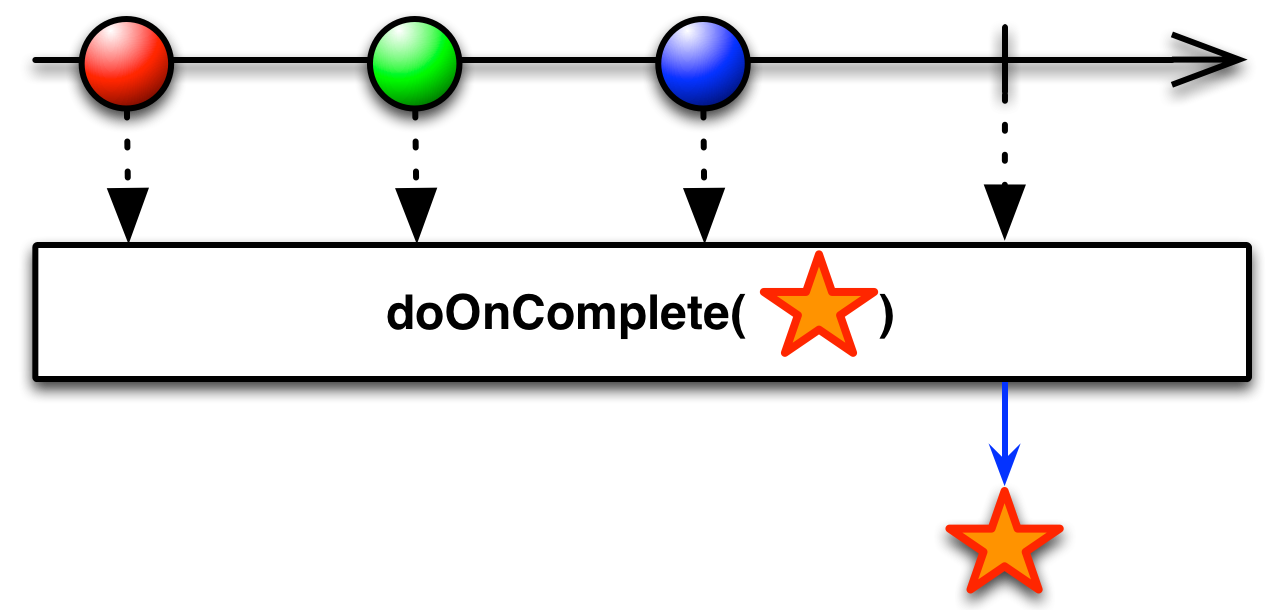
- Backpressure:
- The operator doesn't interfere with backpressure which is determined by the source
Publisher's backpressure behavior. - Scheduler:
doOnCompletedoes not operate by default on a particularScheduler.
Parameters
| onComplete | the action to invoke when the source Publisher calls onComplete |
|---|
Returns
- the source Publisher with the side-effecting behavior applied
public final Flowable<T> doOnEach (Consumer<? super Notification<T>> onNotification)
Modifies the source Publisher so that it invokes an action for each item it emits.
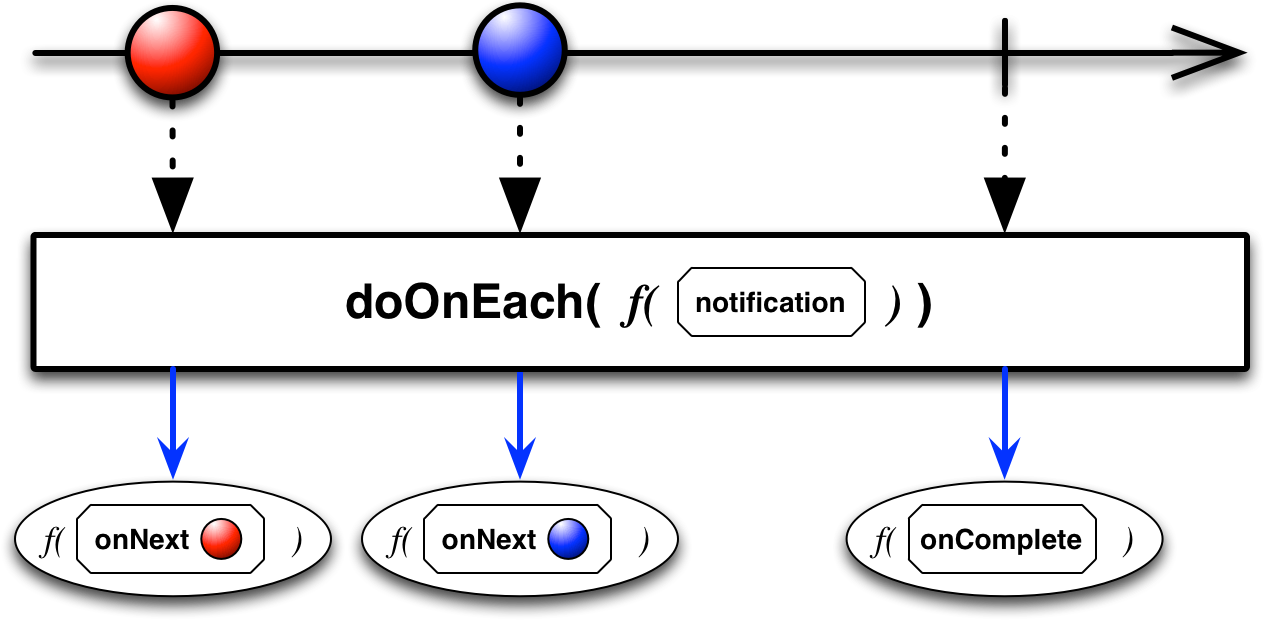
- Backpressure:
- The operator doesn't interfere with backpressure which is determined by the source
Publisher's backpressure behavior. - Scheduler:
doOnEachdoes not operate by default on a particularScheduler.
Parameters
| onNotification | the action to invoke for each item emitted by the source Publisher |
|---|
Returns
- the source Publisher with the side-effecting behavior applied
public final Flowable<T> doOnEach (Subscriber<? super T> subscriber)
Modifies the source Publisher so that it notifies a Subscriber for each item and terminal event it emits.
In case the onError of the supplied Subscriber throws, the downstream will receive a composite
exception containing the original exception and the exception thrown by onError. If either the
onNext or the onComplete method of the supplied Subscriber throws, the downstream will be
terminated and will receive this thrown exception.
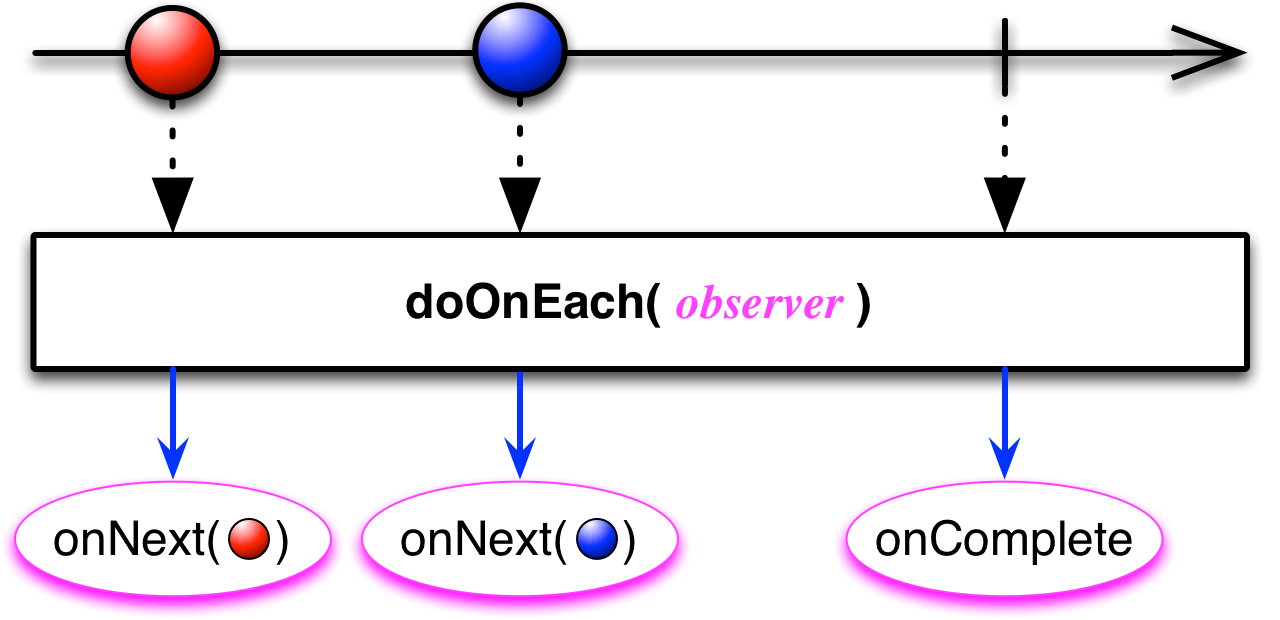
- Backpressure:
- The operator doesn't interfere with backpressure which is determined by the source
Publisher's backpressure behavior. - Scheduler:
doOnEachdoes not operate by default on a particularScheduler.
Parameters
| subscriber | the Subscriber to be notified about onNext, onError and onComplete events on its respective methods before the actual downstream Subscriber gets notified. |
|---|
Returns
- the source Publisher with the side-effecting behavior applied
public final Flowable<T> doOnError (Consumer<? super Throwable> onError)
Modifies the source Publisher so that it invokes an action if it calls onError.
In case the onError action throws, the downstream will receive a composite exception containing
the original exception and the exception thrown by onError.
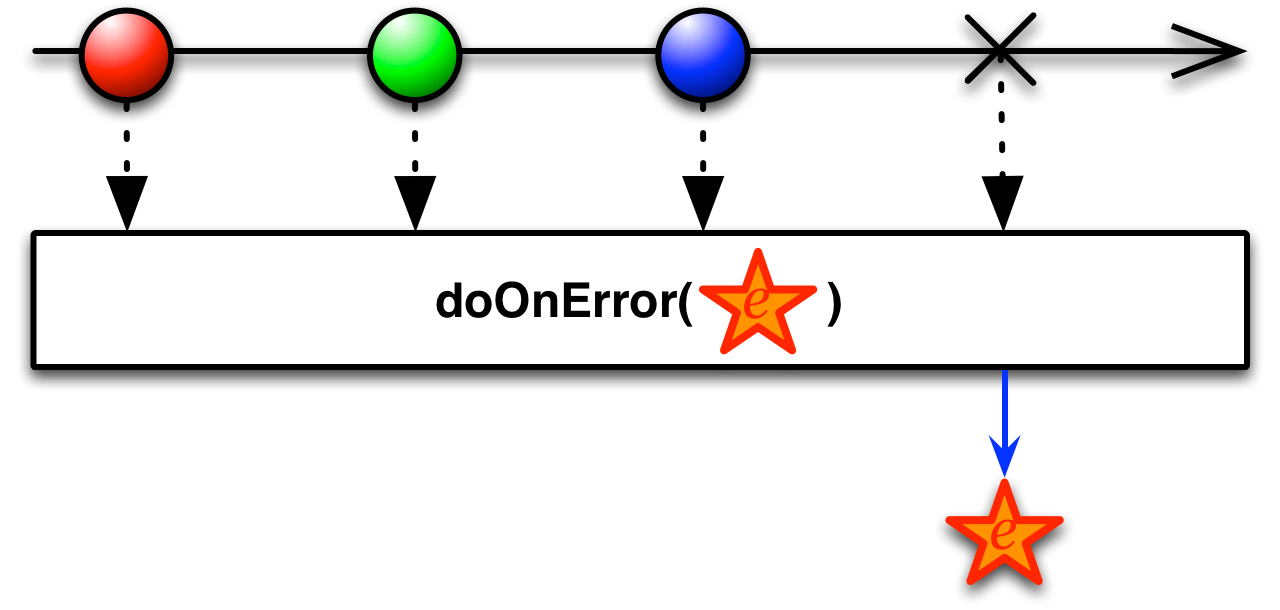
- Backpressure:
- The operator doesn't interfere with backpressure which is determined by the source
Publisher's backpressure behavior. - Scheduler:
doOnErrordoes not operate by default on a particularScheduler.
Parameters
| onError | the action to invoke if the source Publisher calls onError |
|---|
Returns
- the source Publisher with the side-effecting behavior applied
public final Flowable<T> doOnLifecycle (Consumer<? super Subscription> onSubscribe, LongConsumer onRequest, Action onCancel)
Calls the appropriate onXXX method (shared between all Subscribers) for the lifecycle events of the sequence (subscription, cancellation, requesting).
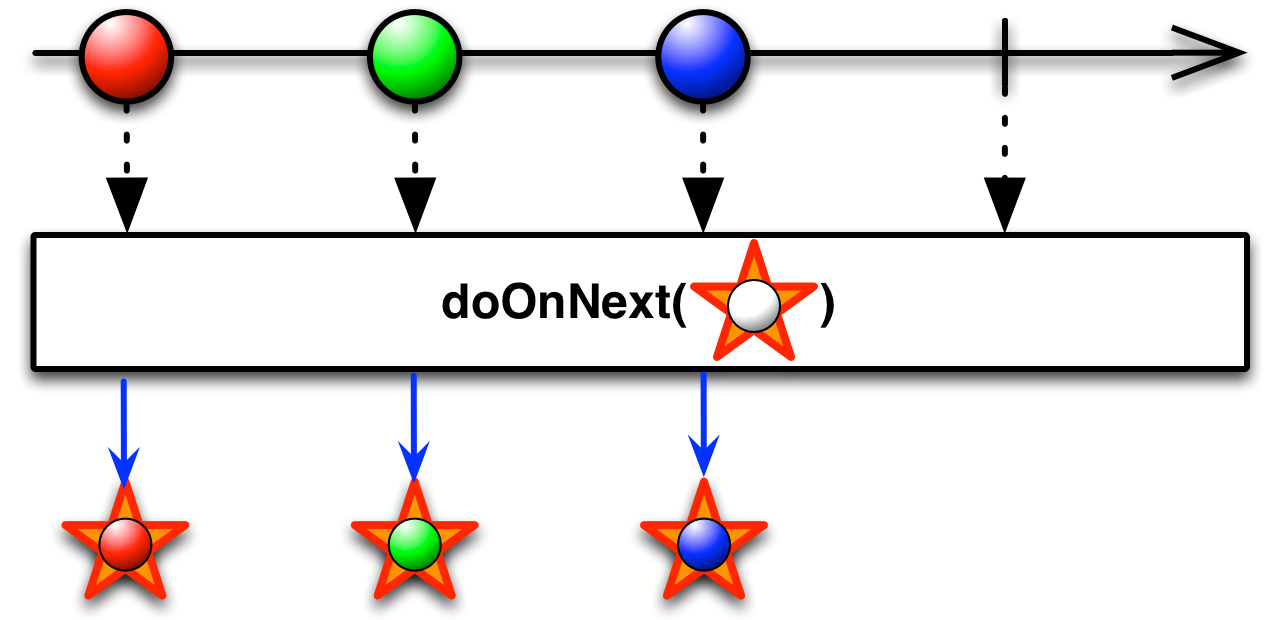
- Backpressure:
- The operator doesn't interfere with backpressure which is determined by the source
Publisher's backpressure behavior. - Scheduler:
doOnLifecycledoes not operate by default on a particularScheduler.
Parameters
| onSubscribe | a Consumer called with the Subscription sent via Subscriber.onSubscribe() |
|---|---|
| onRequest | a LongConsumer called with the request amount sent via Subscription.request() |
| onCancel | called when the downstream cancels the Subscription via cancel() |
Returns
- the source Publisher with the side-effecting behavior applied
public final Flowable<T> doOnNext (Consumer<? super T> onNext)
Modifies the source Publisher so that it invokes an action when it calls onNext.

- Backpressure:
- The operator doesn't interfere with backpressure which is determined by the source
Publisher's backpressure behavior. - Scheduler:
doOnNextdoes not operate by default on a particularScheduler.
Parameters
| onNext | the action to invoke when the source Publisher calls onNext |
|---|
Returns
- the source Publisher with the side-effecting behavior applied
public final Flowable<T> doOnRequest (LongConsumer onRequest)
Modifies the source Publisher so that it invokes the given action when it receives a
request for more items.
Note: This operator is for tracing the internal behavior of back-pressure request patterns and generally intended for debugging use.
- Backpressure:
- The operator doesn't interfere with backpressure which is determined by the source
Publisher's backpressure behavior. - Scheduler:
doOnRequestdoes not operate by default on a particularScheduler.
Parameters
| onRequest | the action that gets called when a Subscriber requests items from this
Publisher |
|---|
Returns
- the source
Publishermodified so as to call this Action when appropriate
public final Flowable<T> doOnSubscribe (Consumer<? super Subscription> onSubscribe)
Modifies the source Publisher so that it invokes the given action when it is subscribed from
its subscribers. Each subscription will result in an invocation of the given action except when the
source Publisher is reference counted, in which case the source Publisher will invoke
the given action for the first subscription.
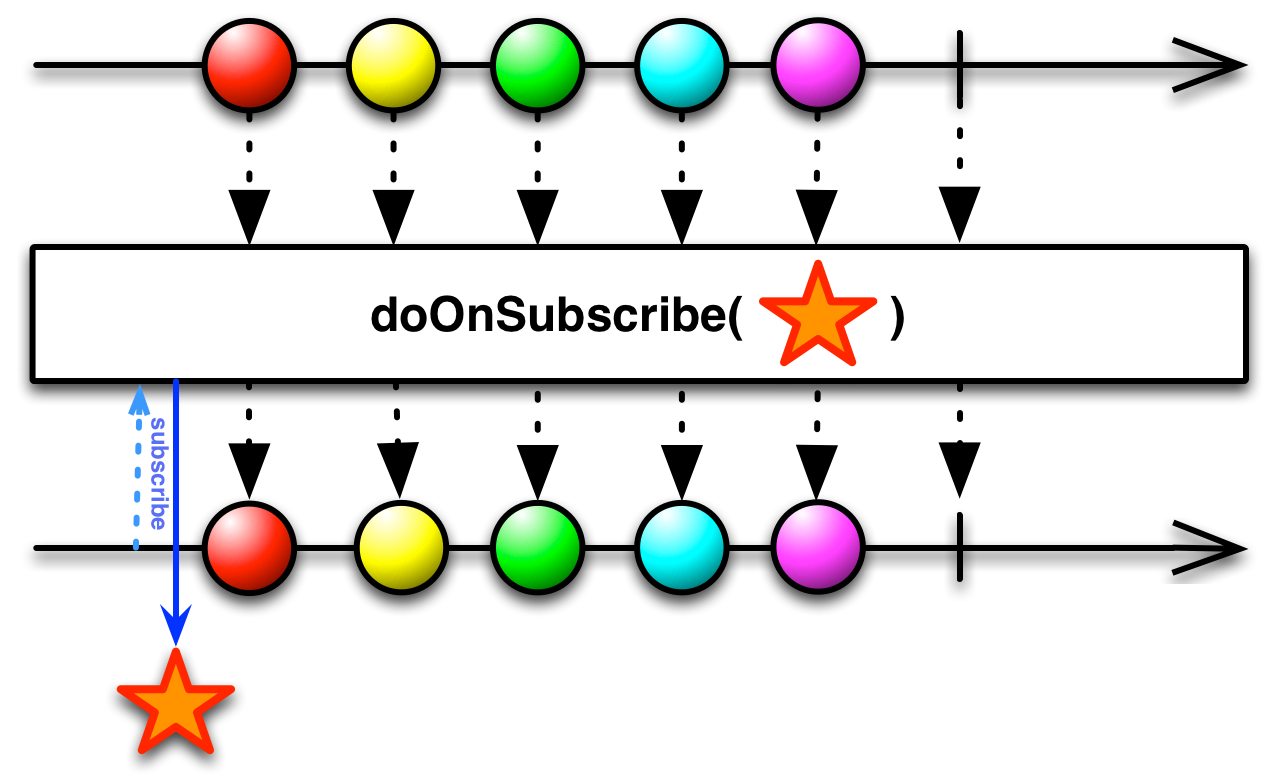
- Backpressure:
- The operator doesn't interfere with backpressure which is determined by the source
Publisher's backpressure behavior. - Scheduler:
doOnSubscribedoes not operate by default on a particularScheduler.
Parameters
| onSubscribe | the Consumer that gets called when a Subscriber subscribes to the current Flowable |
|---|
Returns
- the source
Publishermodified so as to call this Consumer when appropriate
public final Flowable<T> doOnTerminate (Action onTerminate)
Modifies the source Publisher so that it invokes an action when it calls onComplete or
onError.
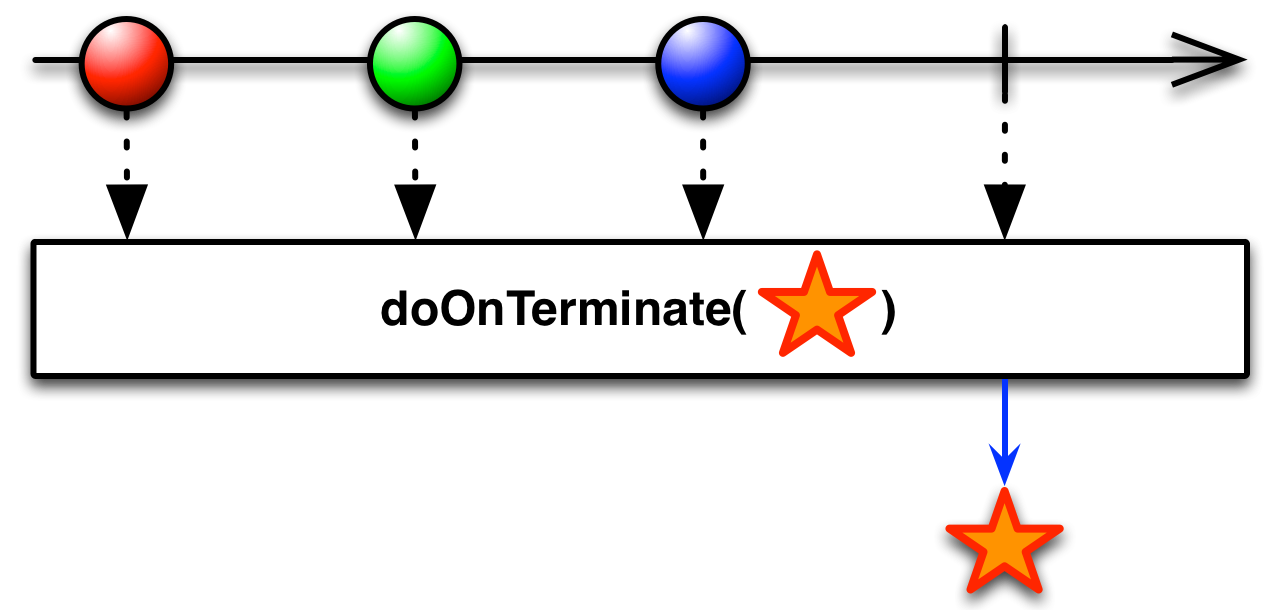
This differs from doAfterTerminate in that this happens before the onComplete or
onError notification.
- Backpressure:
- The operator doesn't interfere with backpressure which is determined by the source
Publisher's backpressure behavior. - Scheduler:
doOnTerminatedoes not operate by default on a particularScheduler.
Parameters
| onTerminate | the action to invoke when the source Publisher calls onComplete or onError |
|---|
Returns
- the source Publisher with the side-effecting behavior applied
public final Single<T> elementAt (long index, T defaultItem)
Returns a Flowable that emits the item found at a specified index in a sequence of emissions from this Flowable, or a default item if that index is out of range.
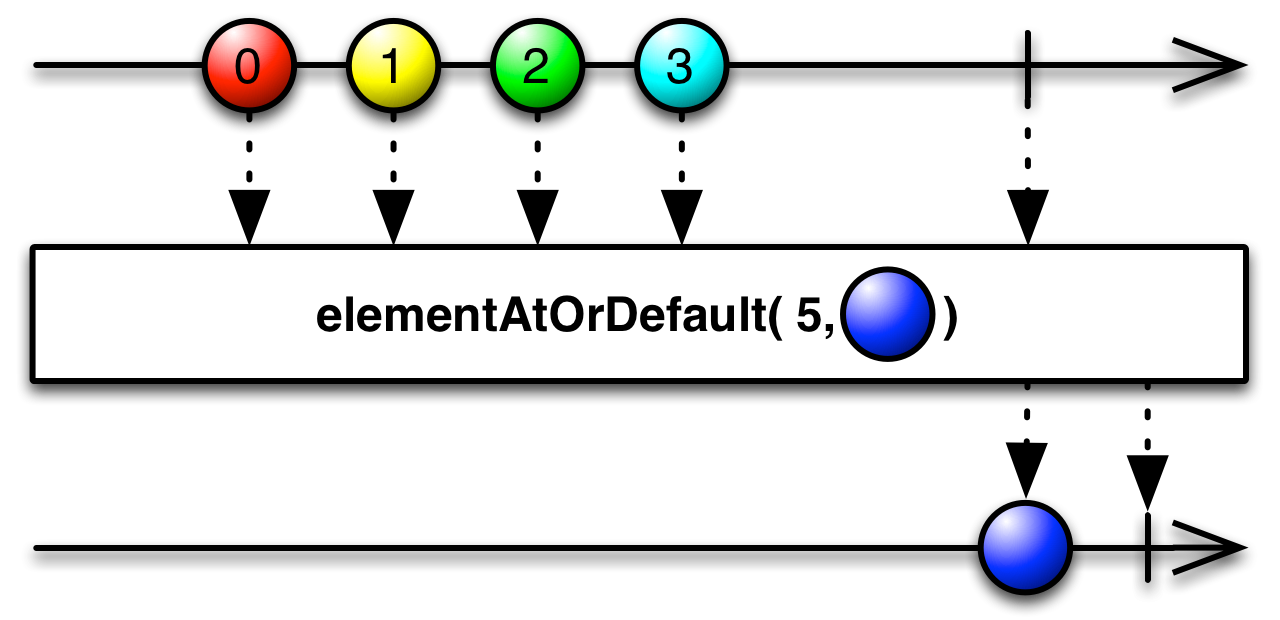
- Backpressure:
- The operator honors backpressure from downstream and consumes the source
Publisherin an unbounded manner (i.e., no backpressure applied to it). - Scheduler:
elementAtdoes not operate by default on a particularScheduler.
Parameters
| index | the zero-based index of the item to retrieve |
|---|---|
| defaultItem | the default item |
Returns
- a Flowable that emits the item at the specified position in the sequence emitted by the source Publisher, or the default item if that index is outside the bounds of the source sequence
Throws
| IndexOutOfBoundsException | if index is less than 0 |
|---|
public final Maybe<T> elementAt (long index)
Returns a Maybe that emits the single item at a specified index in a sequence of emissions from this Flowable or completes if this Flowable sequence has fewer elements than index.
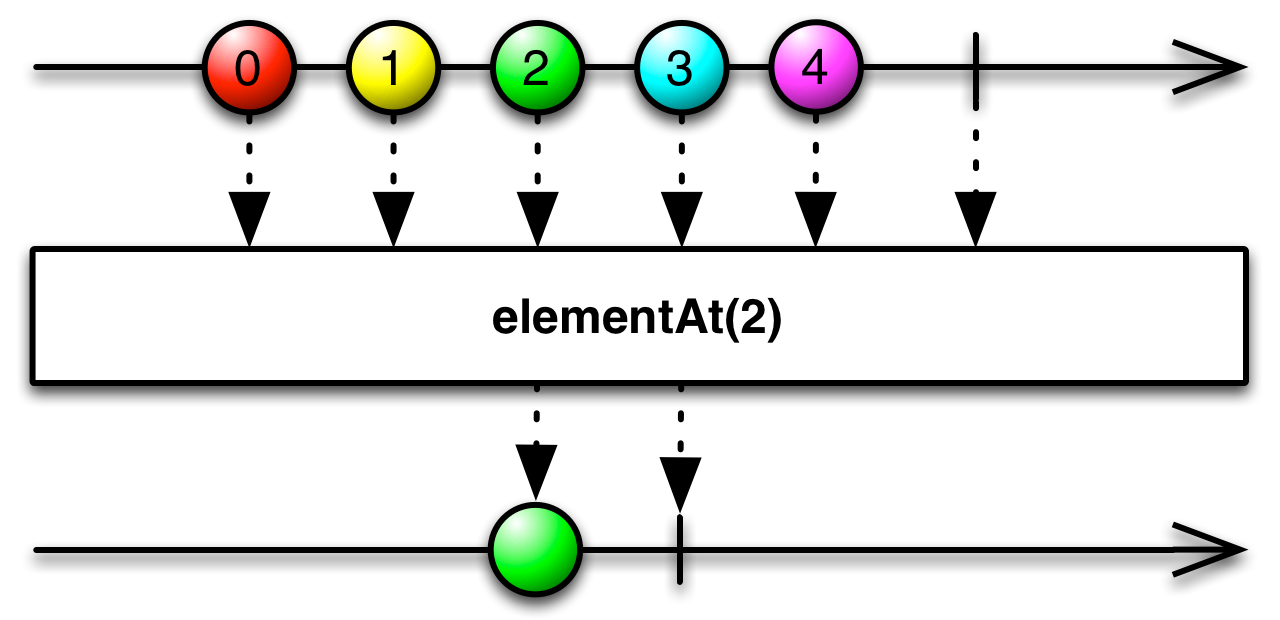
- Backpressure:
- The operator honors backpressure from downstream and consumes the source
Publisherin an unbounded manner (i.e., no backpressure applied to it). - Scheduler:
elementAtdoes not operate by default on a particularScheduler.
Parameters
| index | the zero-based index of the item to retrieve |
|---|
Returns
- a Maybe that emits a single item: the item at the specified position in the sequence of those emitted by the source Publisher
public final Single<T> elementAtOrError (long index)
Returns a Flowable that emits the item found at a specified index in a sequence of emissions from
this Flowable or signals a NoSuchElementException if this Flowable has fewer elements than index.

- Backpressure:
- The operator honors backpressure from downstream and consumes the source
Publisherin an unbounded manner (i.e., no backpressure applied to it). - Scheduler:
elementAtOrErrordoes not operate by default on a particularScheduler.
Parameters
| index | the zero-based index of the item to retrieve |
|---|
Returns
- a Flowable that emits the item at the specified position in the sequence emitted by the source Publisher, or the default item if that index is outside the bounds of the source sequence
Throws
| IndexOutOfBoundsException | if index is less than 0 |
|---|
public static Flowable<T> empty ()
Returns a Flowable that emits no items to the Subscriber and immediately invokes its
onComplete method.

- Backpressure:
- This source doesn't produce any elements and effectively ignores downstream backpressure.
- Scheduler:
emptydoes not operate by default on a particularScheduler.
Returns
- a Flowable that emits no items to the Subscriber but immediately invokes the
Subscriber's
onCompletemethod
public static Flowable<T> error (Callable<? extends Throwable> supplier)
Returns a Flowable that invokes a Subscriber's onError method when the
Subscriber subscribes to it.

- Backpressure:
- This source doesn't produce any elements and effectively ignores downstream backpressure.
- Scheduler:
errordoes not operate by default on a particularScheduler.
Parameters
| supplier | a Callable factory to return a Throwable for each individual Subscriber |
|---|
Returns
- a Flowable that invokes the Subscriber's
onErrormethod when the Subscriber subscribes to it
public static Flowable<T> error (Throwable throwable)
Returns a Flowable that invokes a Subscriber's onError method when the
Subscriber subscribes to it.

- Backpressure:
- This source doesn't produce any elements and effectively ignores downstream backpressure.
- Scheduler:
errordoes not operate by default on a particularScheduler.
Parameters
| throwable | the particular Throwable to pass to onError |
|---|
Returns
- a Flowable that invokes the Subscriber's
onErrormethod when the Subscriber subscribes to it
public final Flowable<T> filter (Predicate<? super T> predicate)
Filters items emitted by a Publisher by only emitting those that satisfy a specified predicate.

- Backpressure:
- The operator doesn't interfere with backpressure which is determined by the source
Publisher's backpressure behavior. - Scheduler:
filterdoes not operate by default on a particularScheduler.
Parameters
| predicate | a function that evaluates each item emitted by the source Publisher, returning true
if it passes the filter |
|---|
Returns
- a Flowable that emits only those items emitted by the source Publisher that the filter
evaluates as
true
public final Single<T> first (T defaultItem)
Returns a Single that emits only the very first item emitted by this Flowable, or a default item if this Flowable completes without emitting anything.
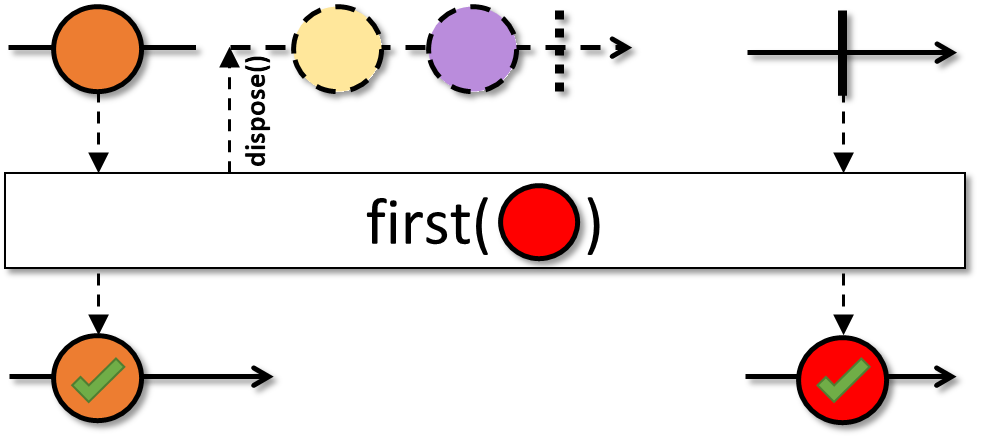
- Backpressure:
- The operator honors backpressure from downstream and consumes the source
Publisherin an unbounded manner (i.e., without applying backpressure). - Scheduler:
firstdoes not operate by default on a particularScheduler.
Parameters
| defaultItem | the default item to emit if the source Publisher doesn't emit anything |
|---|
Returns
- a Single that emits only the very first item from the source, or a default item if the source Publisher completes without emitting any items
public final Maybe<T> firstElement ()
Returns a Maybe that emits only the very first item emitted by this Flowable or completes if this Flowable is empty.
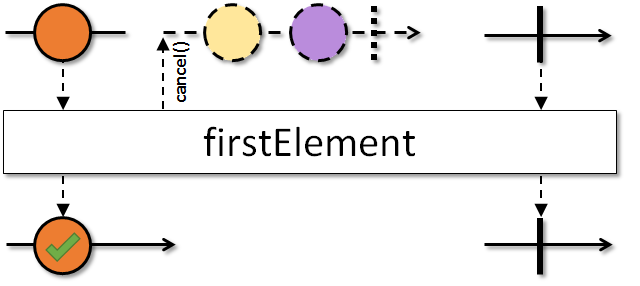
- Backpressure:
- The operator honors backpressure from downstream and consumes the source
Publisherin an unbounded manner (i.e., without applying backpressure). - Scheduler:
firstElementdoes not operate by default on a particularScheduler.
Returns
- the new Maybe instance
public final Single<T> firstOrError ()
Returns a Single that emits only the very first item emitted by this Flowable or
signals a NoSuchElementException if this Flowable is empty.
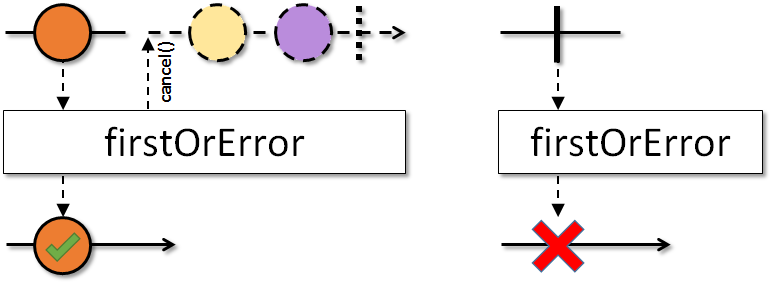
- Backpressure:
- The operator honors backpressure from downstream and consumes the source
Publisherin an unbounded manner (i.e., without applying backpressure). - Scheduler:
firstOrErrordoes not operate by default on a particularScheduler.
Returns
- the new Single instance
public final Flowable<R> flatMap (Function<? super T, ? extends Publisher<? extends R>> onNextMapper, Function<Throwable, ? extends Publisher<? extends R>> onErrorMapper, Callable<? extends Publisher<? extends R>> onCompleteSupplier, int maxConcurrency)
Returns a Flowable that applies a function to each item emitted or notification raised by the source Publisher and then flattens the Publishers returned from these functions and emits the resulting items, while limiting the maximum number of concurrent subscriptions to these Publishers.
- Backpressure:
- The operator honors backpressure from downstream. The upstream Flowable is consumed
in a bounded manner (up to
maxConcurrencyoutstanding request amount for items). The innerPublishers are expected to honor backpressure; if violated, the operator may signalMissingBackpressureException. - Scheduler:
flatMapdoes not operate by default on a particularScheduler.
Parameters
| onNextMapper | a function that returns a Publisher to merge for each item emitted by the source Publisher |
|---|---|
| onErrorMapper | a function that returns a Publisher to merge for an onError notification from the source Publisher |
| onCompleteSupplier | a function that returns a Publisher to merge for an onComplete notification from the source Publisher |
| maxConcurrency | the maximum number of Publishers that may be subscribed to concurrently |
Returns
- a Flowable that emits the results of merging the Publishers returned from applying the specified functions to the emissions and notifications of the source Publisher
public final Flowable<R> flatMap (Function<? super T, ? extends Publisher<? extends U>> mapper, BiFunction<? super T, ? super U, ? extends R> combiner, boolean delayErrors, int maxConcurrency)
Returns a Flowable that emits the results of a specified function to the pair of values emitted by the source Publisher and a specified collection Publisher, while limiting the maximum number of concurrent subscriptions to these Publishers.
- Backpressure:
- The operator honors backpressure from downstream. The upstream Flowable is consumed
in a bounded manner (up to
maxConcurrencyoutstanding request amount for items). The innerPublishers are expected to honor backpressure; if violated, the operator may signalMissingBackpressureException. - Scheduler:
flatMapdoes not operate by default on a particularScheduler.
Parameters
| mapper | a function that returns a Publisher for each item emitted by the source Publisher |
|---|---|
| combiner | a function that combines one item emitted by each of the source and collection Publishers and returns an item to be emitted by the resulting Publisher |
| delayErrors | if true, exceptions from the current Flowable and all inner Publishers are delayed until all of them terminate if false, the first one signalling an exception will terminate the whole sequence immediately |
| maxConcurrency | the maximum number of Publishers that may be subscribed to concurrently |
Returns
- a Flowable that emits the results of applying a function to a pair of values emitted by the source Publisher and the collection Publisher
public final Flowable<R> flatMap (Function<? super T, ? extends Publisher<? extends U>> mapper, BiFunction<? super T, ? super U, ? extends R> combiner, int maxConcurrency)
Returns a Flowable that emits the results of a specified function to the pair of values emitted by the source Publisher and a specified collection Publisher, while limiting the maximum number of concurrent subscriptions to these Publishers.
- Backpressure:
- The operator honors backpressure from downstream. The upstream Flowable is consumed
in a bounded manner (up to
bufferSize()outstanding request amount for items). The innerPublishers are expected to honor backpressure; if violated, the operator may signalMissingBackpressureException. - Scheduler:
flatMapdoes not operate by default on a particularScheduler.
Parameters
| mapper | a function that returns a Publisher for each item emitted by the source Publisher |
|---|---|
| combiner | a function that combines one item emitted by each of the source and collection Publishers and returns an item to be emitted by the resulting Publisher |
| maxConcurrency | the maximum number of Publishers that may be subscribed to concurrently |
Returns
- a Flowable that emits the results of applying a function to a pair of values emitted by the source Publisher and the collection Publisher
public final Flowable<R> flatMap (Function<? super T, ? extends Publisher<? extends R>> mapper, boolean delayErrors, int maxConcurrency)
Returns a Flowable that emits items based on applying a function that you supply to each item emitted by the source Publisher, where that function returns a Publisher, and then merging those resulting Publishers and emitting the results of this merger, while limiting the maximum number of concurrent subscriptions to these Publishers.
- Backpressure:
- The operator honors backpressure from downstream. The upstream Flowable is consumed
in a bounded manner (up to
maxConcurrencyoutstanding request amount for items). The innerPublishers are expected to honor backpressure; if violated, the operator may signalMissingBackpressureException. - Scheduler:
flatMapdoes not operate by default on a particularScheduler.
Parameters
| mapper | a function that, when applied to an item emitted by the source Publisher, returns an Publisher |
|---|---|
| delayErrors | if true, exceptions from the current Flowable and all inner Publishers are delayed until all of them terminate if false, the first one signalling an exception will terminate the whole sequence immediately |
| maxConcurrency | the maximum number of Publishers that may be subscribed to concurrently |
Returns
- a Flowable that emits the result of applying the transformation function to each item emitted by the source Publisher and merging the results of the Publishers obtained from this transformation
public final Flowable<R> flatMap (Function<? super T, ? extends Publisher<? extends R>> mapper, int maxConcurrency)
Returns a Flowable that emits items based on applying a function that you supply to each item emitted by the source Publisher, where that function returns a Publisher, and then merging those resulting Publishers and emitting the results of this merger, while limiting the maximum number of concurrent subscriptions to these Publishers.
- Backpressure:
- The operator honors backpressure from downstream. The upstream Flowable is consumed
in a bounded manner (up to
maxConcurrencyoutstanding request amount for items). The innerPublishers are expected to honor backpressure; if violated, the operator may signalMissingBackpressureException. - Scheduler:
flatMapdoes not operate by default on a particularScheduler.
Parameters
| mapper | a function that, when applied to an item emitted by the source Publisher, returns an Publisher |
|---|---|
| maxConcurrency | the maximum number of Publishers that may be subscribed to concurrently |
Returns
- a Flowable that emits the result of applying the transformation function to each item emitted by the source Publisher and merging the results of the Publishers obtained from this transformation
public final Flowable<R> flatMap (Function<? super T, ? extends Publisher<? extends U>> mapper, BiFunction<? super T, ? super U, ? extends R> combiner)
Returns a Flowable that emits the results of a specified function to the pair of values emitted by the source Publisher and a specified collection Publisher.
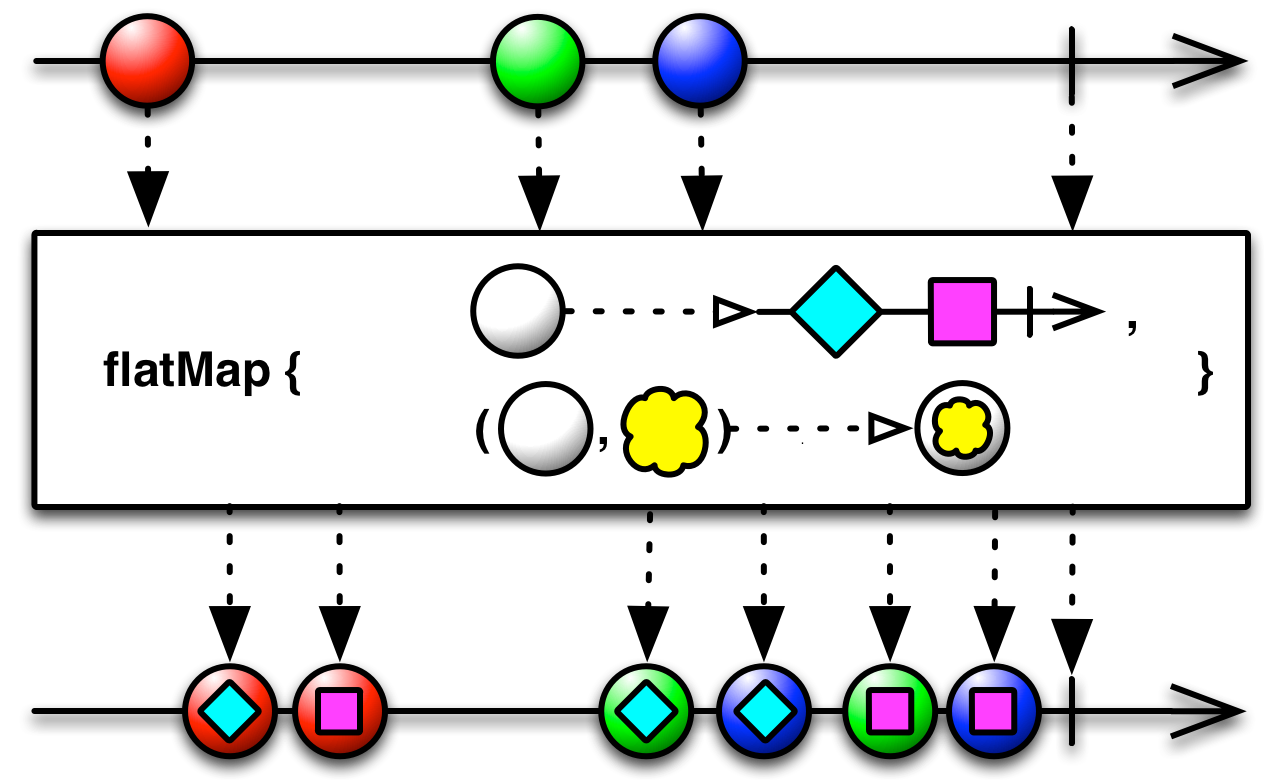
- Backpressure:
- The operator honors backpressure from downstream. The upstream Flowable is consumed
in a bounded manner (up to
maxConcurrencyoutstanding request amount for items). The innerPublishers are expected to honor backpressure; if violated, the operator may signalMissingBackpressureException. - Scheduler:
flatMapdoes not operate by default on a particularScheduler.
Parameters
| mapper | a function that returns a Publisher for each item emitted by the source Publisher |
|---|---|
| combiner | a function that combines one item emitted by each of the source and collection Publishers and returns an item to be emitted by the resulting Publisher |
Returns
- a Flowable that emits the results of applying a function to a pair of values emitted by the source Publisher and the collection Publisher
public final Flowable<R> flatMap (Function<? super T, ? extends Publisher<? extends U>> mapper, BiFunction<? super T, ? super U, ? extends R> combiner, boolean delayErrors, int maxConcurrency, int bufferSize)
Returns a Flowable that emits the results of a specified function to the pair of values emitted by the source Publisher and a specified collection Publisher, while limiting the maximum number of concurrent subscriptions to these Publishers.
- Backpressure:
- The operator honors backpressure from downstream. The upstream Flowable is consumed
in a bounded manner (up to
maxConcurrencyoutstanding request amount for items). The innerPublishers are expected to honor backpressure; if violated, the operator may signalMissingBackpressureException. - Scheduler:
flatMapdoes not operate by default on a particularScheduler.
Parameters
| mapper | a function that returns a Publisher for each item emitted by the source Publisher |
|---|---|
| combiner | a function that combines one item emitted by each of the source and collection Publishers and returns an item to be emitted by the resulting Publisher |
| delayErrors | if true, exceptions from the current Flowable and all inner Publishers are delayed until all of them terminate if false, the first one signalling an exception will terminate the whole sequence immediately |
| maxConcurrency | the maximum number of Publishers that may be subscribed to concurrently |
| bufferSize | the number of elements to prefetch from the inner Publishers. |
Returns
- a Flowable that emits the results of applying a function to a pair of values emitted by the source Publisher and the collection Publisher
public final Flowable<R> flatMap (Function<? super T, ? extends Publisher<? extends R>> mapper, boolean delayErrors)
Returns a Flowable that emits items based on applying a function that you supply to each item emitted by the source Publisher, where that function returns a Publisher, and then merging those resulting Publishers and emitting the results of this merger.

- Backpressure:
- The operator honors backpressure from downstream. The upstream Flowable is consumed
in a bounded manner (up to
bufferSize()outstanding request amount for items). The innerPublishers are expected to honor backpressure; if violated, the operator may signalMissingBackpressureException. - Scheduler:
flatMapdoes not operate by default on a particularScheduler.
Parameters
| mapper | a function that, when applied to an item emitted by the source Publisher, returns an Publisher |
|---|---|
| delayErrors | if true, exceptions from the current Flowable and all inner Publishers are delayed until all of them terminate if false, the first one signalling an exception will terminate the whole sequence immediately |
Returns
- a Flowable that emits the result of applying the transformation function to each item emitted by the source Publisher and merging the results of the Publishers obtained from this transformation
public final Flowable<R> flatMap (Function<? super T, ? extends Publisher<? extends U>> mapper, BiFunction<? super T, ? super U, ? extends R> combiner, boolean delayErrors)
Returns a Flowable that emits the results of a specified function to the pair of values emitted by the source Publisher and a specified collection Publisher.

- Backpressure:
- The operator honors backpressure from downstream. The upstream Flowable is consumed
in a bounded manner (up to
bufferSize()outstanding request amount for items). The innerPublishers are expected to honor backpressure; if violated, the operator may signalMissingBackpressureException. - Scheduler:
flatMapdoes not operate by default on a particularScheduler.
Parameters
| mapper | a function that returns a Publisher for each item emitted by the source Publisher |
|---|---|
| combiner | a function that combines one item emitted by each of the source and collection Publishers and returns an item to be emitted by the resulting Publisher |
| delayErrors | if true, exceptions from the current Flowable and all inner Publishers are delayed until all of them terminate if false, the first one signalling an exception will terminate the whole sequence immediately |
Returns
- a Flowable that emits the results of applying a function to a pair of values emitted by the source Publisher and the collection Publisher
public final Flowable<R> flatMap (Function<? super T, ? extends Publisher<? extends R>> onNextMapper, Function<? super Throwable, ? extends Publisher<? extends R>> onErrorMapper, Callable<? extends Publisher<? extends R>> onCompleteSupplier)
Returns a Flowable that applies a function to each item emitted or notification raised by the source Publisher and then flattens the Publishers returned from these functions and emits the resulting items.
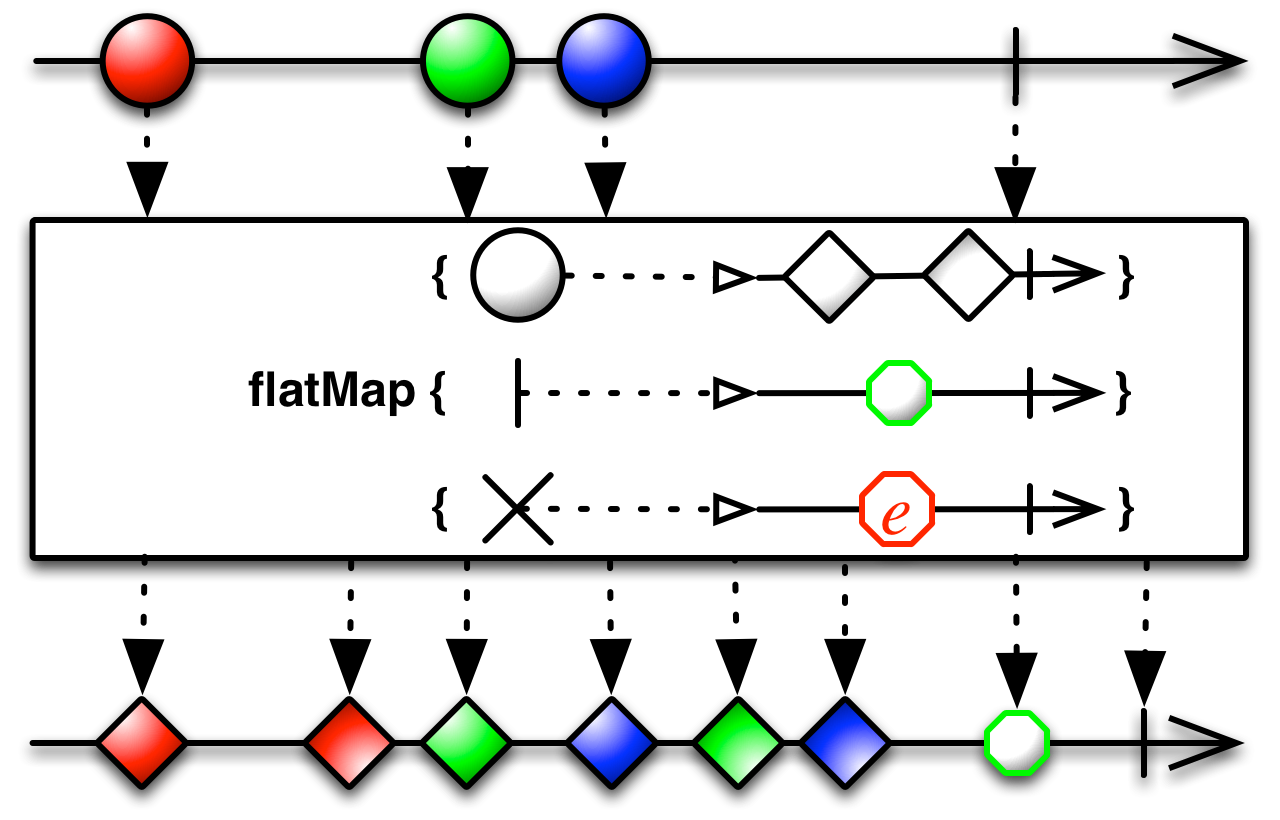
- Backpressure:
- The operator honors backpressure from downstream. The upstream Flowable is consumed
in a bounded manner (up to
bufferSize()outstanding request amount for items). The innerPublishers are expected to honor backpressure; if violated, the operator may signalMissingBackpressureException. - Scheduler:
flatMapdoes not operate by default on a particularScheduler.
Parameters
| onNextMapper | a function that returns a Publisher to merge for each item emitted by the source Publisher |
|---|---|
| onErrorMapper | a function that returns a Publisher to merge for an onError notification from the source Publisher |
| onCompleteSupplier | a function that returns a Publisher to merge for an onComplete notification from the source Publisher |
Returns
- a Flowable that emits the results of merging the Publishers returned from applying the specified functions to the emissions and notifications of the source Publisher
public final Flowable<R> flatMap (Function<? super T, ? extends Publisher<? extends R>> mapper)
Returns a Flowable that emits items based on applying a function that you supply to each item emitted by the source Publisher, where that function returns a Publisher, and then merging those resulting Publishers and emitting the results of this merger.

- Backpressure:
- The operator honors backpressure from downstream. The upstream Flowable is consumed
in a bounded manner (up to
bufferSize()outstanding request amount for items). The innerPublishers are expected to honor backpressure; if violated, the operator may signalMissingBackpressureException. - Scheduler:
flatMapdoes not operate by default on a particularScheduler.
Parameters
| mapper | a function that, when applied to an item emitted by the source Publisher, returns an Publisher |
|---|
Returns
- a Flowable that emits the result of applying the transformation function to each item emitted by the source Publisher and merging the results of the Publishers obtained from this transformation
public final Flowable<R> flatMap (Function<? super T, ? extends Publisher<? extends R>> mapper, boolean delayErrors, int maxConcurrency, int bufferSize)
Returns a Flowable that emits items based on applying a function that you supply to each item emitted by the source Publisher, where that function returns a Publisher, and then merging those resulting Publishers and emitting the results of this merger, while limiting the maximum number of concurrent subscriptions to these Publishers.
- Backpressure:
- The operator honors backpressure from downstream. The upstream Flowable is consumed
in a bounded manner (up to
maxConcurrencyoutstanding request amount for items). The innerPublishers are expected to honor backpressure; if violated, the operator may signalMissingBackpressureException. - Scheduler:
flatMapdoes not operate by default on a particularScheduler.
Parameters
| mapper | a function that, when applied to an item emitted by the source Publisher, returns an Publisher |
|---|---|
| delayErrors | if true, exceptions from the current Flowable and all inner Publishers are delayed until all of them terminate if false, the first one signalling an exception will terminate the whole sequence immediately |
| maxConcurrency | the maximum number of Publishers that may be subscribed to concurrently |
| bufferSize | the number of elements to prefetch from each inner Publisher |
Returns
- a Flowable that emits the result of applying the transformation function to each item emitted by the source Publisher and merging the results of the Publishers obtained from this transformation
public final Completable flatMapCompletable (Function<? super T, ? extends CompletableSource> mapper)
Maps each element of the upstream Flowable into CompletableSources, subscribes to them and waits until the upstream and all CompletableSources complete.
- Backpressure:
- The operator consumes the upstream in an unbounded manner.
- Scheduler:
flatMapCompletabledoes not operate by default on a particularScheduler.
Parameters
| mapper | the function that received each source value and transforms them into CompletableSources. |
|---|
Returns
- the new Completable instance
public final Completable flatMapCompletable (Function<? super T, ? extends CompletableSource> mapper, boolean delayErrors, int maxConcurrency)
Maps each element of the upstream Flowable into CompletableSources, subscribes to them and waits until the upstream and all CompletableSources complete, optionally delaying all errors.
- Backpressure:
- If
maxConcurrency == Integer.MAX_VALUEthe operator consumes the upstream in an unbounded manner. Otherwise the operator expects the upstream to honor backpressure. If the upstream doesn't support backpressure the operator behaves as ifmaxConcurrency == Integer.MAX_VALUEwas used. - Scheduler:
flatMapCompletabledoes not operate by default on a particularScheduler.
Parameters
| mapper | the function that received each source value and transforms them into CompletableSources. |
|---|---|
| delayErrors | if true errors from the upstream and inner CompletableSources are delayed until each of them terminates. |
| maxConcurrency | the maximum number of active subscriptions to the CompletableSources. |
Returns
- the new Completable instance
public final Flowable<U> flatMapIterable (Function<? super T, ? extends Iterable<? extends U>> mapper, int bufferSize)
Returns a Flowable that merges each item emitted by the source Publisher with the values in an Iterable corresponding to that item that is generated by a selector.
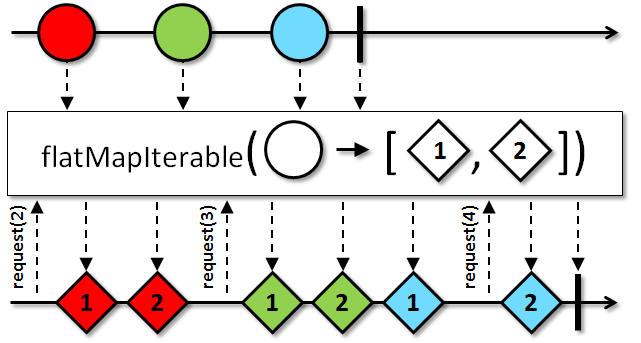
- Backpressure:
- The operator honors backpressure from downstream. The source
Publishers is expected to honor backpressure as well. If the sourcePublisherviolates the rule, the operator will signal aMissingBackpressureException. - Scheduler:
flatMapIterabledoes not operate by default on a particularScheduler.
Parameters
| mapper | a function that returns an Iterable sequence of values for when given an item emitted by the source Publisher |
|---|---|
| bufferSize | the number of elements to prefetch from the current Flowable |
Returns
- a Flowable that emits the results of merging the items emitted by the source Publisher with
the values in the Iterables corresponding to those items, as generated by
collectionSelector
public final Flowable<V> flatMapIterable (Function<? super T, ? extends Iterable<? extends U>> mapper, BiFunction<? super T, ? super U, ? extends V> resultSelector)
Returns a Flowable that emits the results of applying a function to the pair of values from the source Publisher and an Iterable corresponding to that item that is generated by a selector.
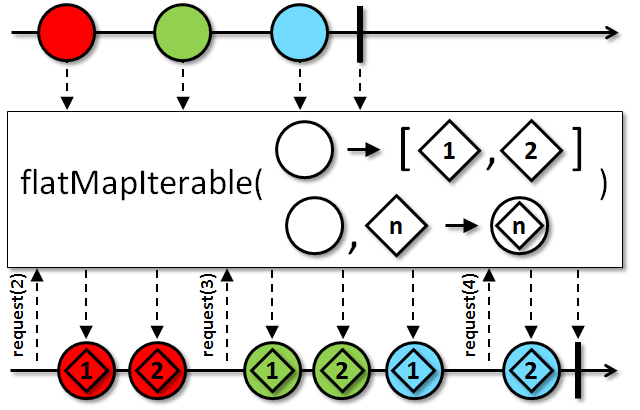
- Backpressure:
- The operator honors backpressure from downstream and the source
Publishers is consumed in an unbounded manner (i.e., no backpressure is applied to it). - Scheduler:
flatMapIterabledoes not operate by default on a particularScheduler.
Parameters
| mapper | a function that returns an Iterable sequence of values for each item emitted by the source Publisher |
|---|---|
| resultSelector | a function that returns an item based on the item emitted by the source Publisher and the
Iterable returned for that item by the collectionSelector |
Returns
- a Flowable that emits the items returned by
resultSelectorfor each item in the source Publisher
public final Flowable<U> flatMapIterable (Function<? super T, ? extends Iterable<? extends U>> mapper)
Returns a Flowable that merges each item emitted by the source Publisher with the values in an Iterable corresponding to that item that is generated by a selector.

- Backpressure:
- The operator honors backpressure from downstream. The source
Publishers is expected to honor backpressure as well. If the sourcePublisherviolates the rule, the operator will signal aMissingBackpressureException. - Scheduler:
flatMapIterabledoes not operate by default on a particularScheduler.
Parameters
| mapper | a function that returns an Iterable sequence of values for when given an item emitted by the source Publisher |
|---|
Returns
- a Flowable that emits the results of merging the items emitted by the source Publisher with
the values in the Iterables corresponding to those items, as generated by
collectionSelector
public final Flowable<V> flatMapIterable (Function<? super T, ? extends Iterable<? extends U>> mapper, BiFunction<? super T, ? super U, ? extends V> resultSelector, int prefetch)
Returns a Flowable that merges each item emitted by the source Publisher with the values in an Iterable corresponding to that item that is generated by a selector, while limiting the number of concurrent subscriptions to these Publishers.

- Backpressure:
- The operator honors backpressure from downstream. The source
Publishers is expected to honor backpressure as well. If the sourcePublisherviolates the rule, the operator will signal aMissingBackpressureException. - Scheduler:
flatMapIterabledoes not operate by default on a particularScheduler.
Parameters
| mapper | a function that returns an Iterable sequence of values for when given an item emitted by the source Publisher |
|---|---|
| resultSelector | a function that returns an item based on the item emitted by the source Publisher and the
Iterable returned for that item by the collectionSelector |
| prefetch | the number of elements to prefetch from the current Flowable |
Returns
- a Flowable that emits the results of merging the items emitted by the source Publisher with
the values in the Iterables corresponding to those items, as generated by
collectionSelector
public final Flowable<R> flatMapMaybe (Function<? super T, ? extends MaybeSource<? extends R>> mapper, boolean delayErrors, int maxConcurrency)
Maps each element of the upstream Flowable into MaybeSources, subscribes to them and waits until the upstream and all MaybeSources complete, optionally delaying all errors.
- Backpressure:
- If
maxConcurrency == Integer.MAX_VALUEthe operator consumes the upstream in an unbounded manner. Otherwise the operator expects the upstream to honor backpressure. If the upstream doesn't support backpressure the operator behaves as ifmaxConcurrency == Integer.MAX_VALUEwas used. - Scheduler:
flatMapMaybedoes not operate by default on a particularScheduler.
Parameters
| mapper | the function that received each source value and transforms them into MaybeSources. |
|---|---|
| delayErrors | if true errors from the upstream and inner MaybeSources are delayed until each of them terminates. |
| maxConcurrency | the maximum number of active subscriptions to the MaybeSources. |
Returns
- the new Flowable instance
public final Flowable<R> flatMapMaybe (Function<? super T, ? extends MaybeSource<? extends R>> mapper)
Maps each element of the upstream Flowable into MaybeSources, subscribes to them and waits until the upstream and all MaybeSources complete.
- Backpressure:
- The operator consumes the upstream in an unbounded manner.
- Scheduler:
flatMapMaybedoes not operate by default on a particularScheduler.
Parameters
| mapper | the function that received each source value and transforms them into MaybeSources. |
|---|
Returns
- the new Flowable instance
public final Flowable<R> flatMapSingle (Function<? super T, ? extends SingleSource<? extends R>> mapper, boolean delayErrors, int maxConcurrency)
Maps each element of the upstream Flowable into SingleSources, subscribes to them and waits until the upstream and all SingleSources complete, optionally delaying all errors.
- Backpressure:
- If
maxConcurrency == Integer.MAX_VALUEthe operator consumes the upstream in an unbounded manner. Otherwise the operator expects the upstream to honor backpressure. If the upstream doesn't support backpressure the operator behaves as ifmaxConcurrency == Integer.MAX_VALUEwas used. - Scheduler:
flatMapSingledoes not operate by default on a particularScheduler.
Parameters
| mapper | the function that received each source value and transforms them into SingleSources. |
|---|---|
| delayErrors | if true errors from the upstream and inner SingleSources are delayed until each of them terminates. |
| maxConcurrency | the maximum number of active subscriptions to the SingleSources. |
Returns
- the new Flowable instance
public final Flowable<R> flatMapSingle (Function<? super T, ? extends SingleSource<? extends R>> mapper)
Maps each element of the upstream Flowable into SingleSources, subscribes to them and waits until the upstream and all SingleSources complete.
- Backpressure:
- The operator consumes the upstream in an unbounded manner.
- Scheduler:
flatMapSingledoes not operate by default on a particularScheduler.
Parameters
| mapper | the function that received each source value and transforms them into SingleSources. |
|---|
Returns
- the new Flowable instance
public final Disposable forEach (Consumer<? super T> onNext)
Subscribes to the Publisher and receives notifications for each element.
Alias to subscribe(Consumer)
- Backpressure:
- The operator consumes the source
Publisherin an unbounded manner (i.e., no backpressure is applied to it). - Scheduler:
forEachdoes not operate by default on a particularScheduler.
Parameters
| onNext | Consumer to execute for each item. |
|---|
Returns
- a Disposable that allows cancelling an asynchronous sequence
Throws
| NullPointerException | if onNext is null |
|---|
public final Disposable forEachWhile (Predicate<? super T> onNext, Consumer<? super Throwable> onError, Action onComplete)
Subscribes to the Publisher and receives notifications for each element and the terminal events until the onNext Predicate returns false.
- Backpressure:
- The operator consumes the source
Publisherin an unbounded manner (i.e., no backpressure is applied to it). - Scheduler:
forEachWhiledoes not operate by default on a particularScheduler.
Parameters
| onNext | Predicate to execute for each item. |
|---|---|
| onError | Consumer to execute when an error is emitted. |
| onComplete | Action to execute when completion is signalled. |
Returns
- a
Disposablethat allows cancelling an asynchronous sequence
Throws
| NullPointerException | if onNext is null, or
if onError is null, or
if onComplete is null |
|---|
public final Disposable forEachWhile (Predicate<? super T> onNext, Consumer<? super Throwable> onError)
Subscribes to the Publisher and receives notifications for each element and error events until the onNext Predicate returns false.
- Backpressure:
- The operator consumes the source
Publisherin an unbounded manner (i.e., no backpressure is applied to it). - Scheduler:
forEachWhiledoes not operate by default on a particularScheduler.
Parameters
| onNext | Predicate to execute for each item. |
|---|---|
| onError | Consumer to execute when an error is emitted. |
Returns
- a
Disposablethat allows cancelling an asynchronous sequence
Throws
| NullPointerException | if onNext is null, or
if onError is null |
|---|
public final Disposable forEachWhile (Predicate<? super T> onNext)
Subscribes to the Publisher and receives notifications for each element until the onNext Predicate returns false.
If the Flowable emits an error, it is wrapped into an
OnErrorNotImplementedException
and routed to the RxJavaPlugins.onError handler.
- Backpressure:
- The operator consumes the source
Publisherin an unbounded manner (i.e., no backpressure is applied to it). - Scheduler:
forEachWhiledoes not operate by default on a particularScheduler.
Parameters
| onNext | Predicate to execute for each item. |
|---|
Returns
- a
Disposablethat allows cancelling an asynchronous sequence
Throws
| NullPointerException | if onNext is null |
|---|
public static Flowable<T> fromArray (T... items)
Converts an Array into a Publisher that emits the items in the Array.
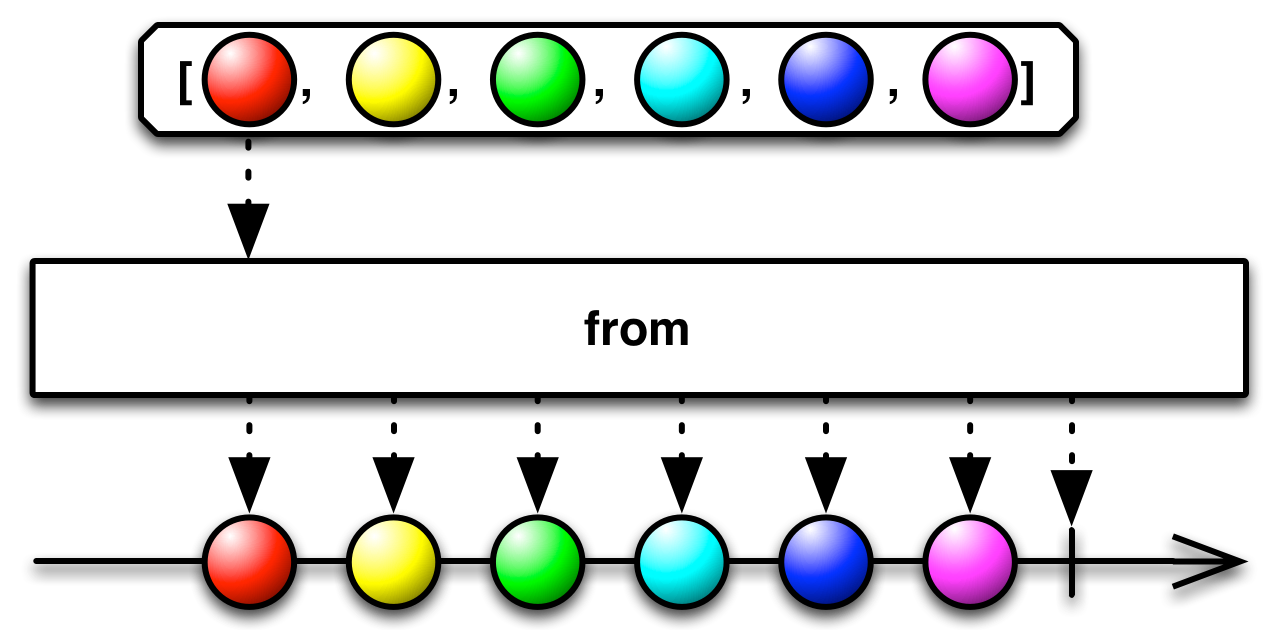
- Backpressure:
- The operator honors backpressure from downstream and iterates the given
arrayon demand (i.e., when requested). - Scheduler:
fromArraydoes not operate by default on a particularScheduler.
Parameters
| items | the array of elements |
|---|
Returns
- a Flowable that emits each item in the source Array
public static Flowable<T> fromCallable (Callable<? extends T> supplier)
Returns a Flowable that, when a Subscriber subscribes to it, invokes a function you specify and then emits the value returned from that function.
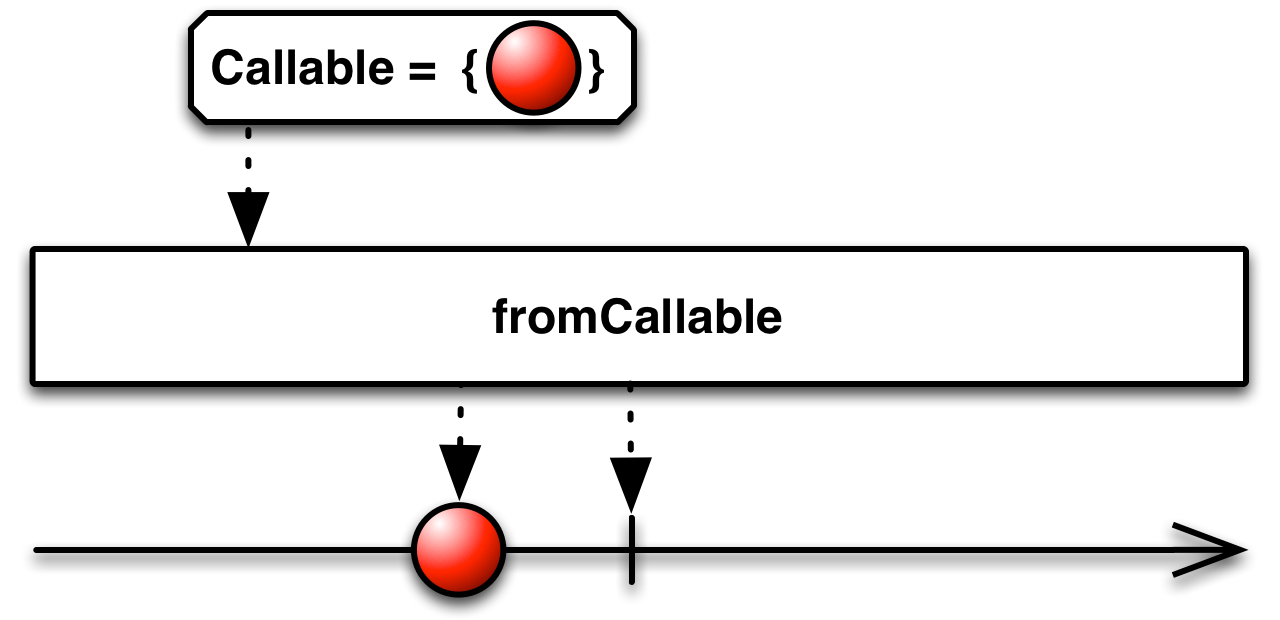
This allows you to defer the execution of the function you specify until a Subscriber subscribes to the Publisher. That is to say, it makes the function "lazy."
- Backpressure:
- The operator honors backpressure from downstream.
- Scheduler:
fromCallabledoes not operate by default on a particularScheduler.
Parameters
| supplier | a function, the execution of which should be deferred; fromCallable will invoke this
function only when a Subscriber subscribes to the Publisher that fromCallable returns |
|---|
Returns
- a Flowable whose Subscribers' subscriptions trigger an invocation of the given function
See Also
public static Flowable<T> fromFuture (Future<? extends T> future, Scheduler scheduler)
Converts a Future, operating on a specified Scheduler, into a Publisher.
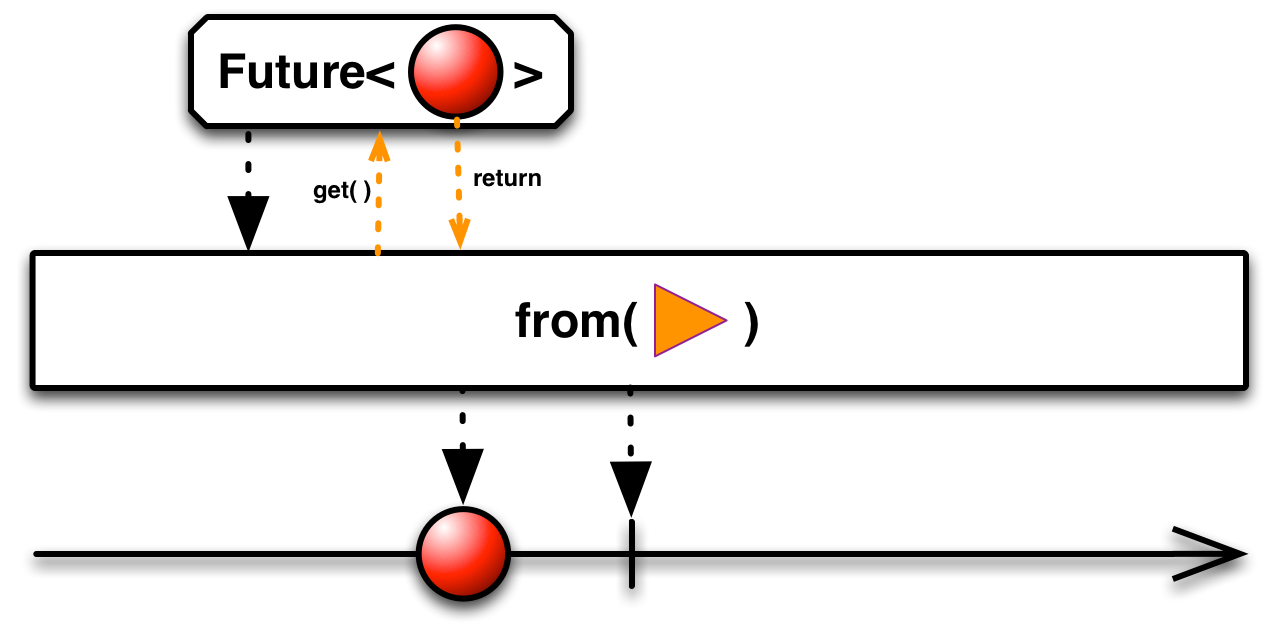
You can convert any object that supports the Future interface into a Publisher that emits the
return value of the get() method of that object, by passing the object into the from
method.
Unlike 1.x, cancelling the Flowable won't cancel the future. If necessary, one can use composition to achieve the
cancellation effect: futurePublisher.doOnCancel(() -> future.cancel(true));.
- Backpressure:
- The operator honors backpressure from downstream.
- Scheduler:
- You specify which
Schedulerthis operator will use
Parameters
| future | the source Future |
|---|---|
| scheduler | the Scheduler to wait for the Future on. Use a Scheduler such as
io() that can block and wait on the Future |
Returns
- a Flowable that emits the item from the source
Future
public static Flowable<T> fromFuture (Future<? extends T> future, long timeout, TimeUnit unit, Scheduler scheduler)
Converts a Future into a Publisher, with a timeout on the Future.
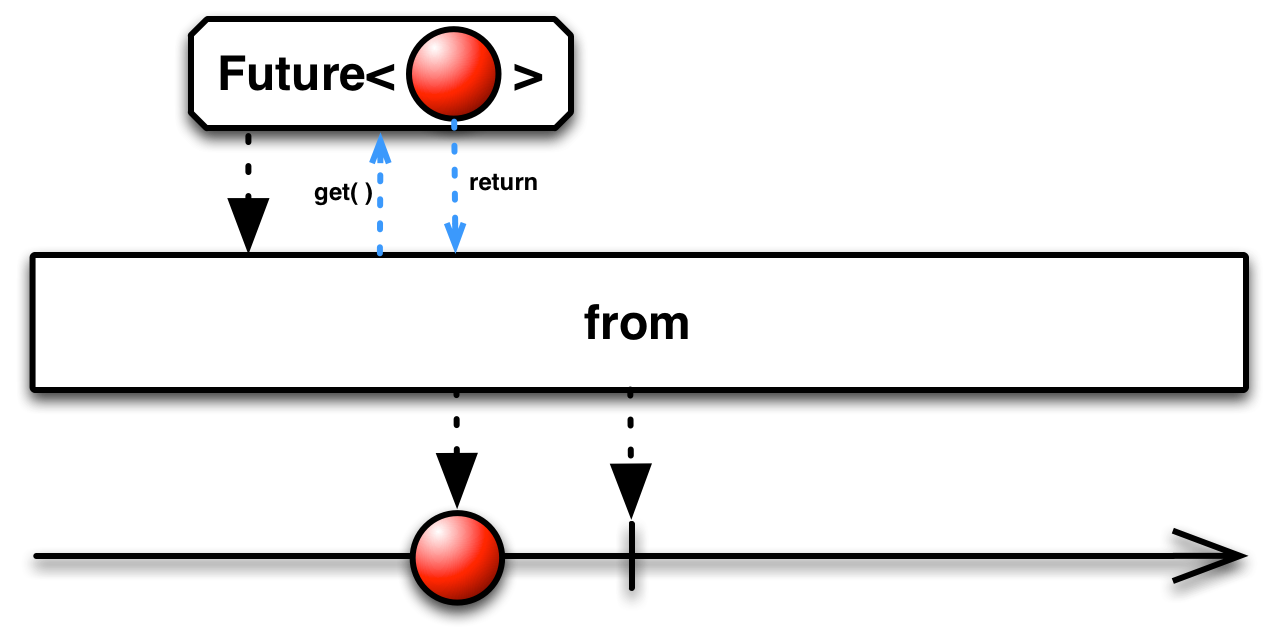
You can convert any object that supports the Future interface into a Publisher that emits the
return value of the get() method of that object, by passing the object into the from
method.
Unlike 1.x, cancelling the Flowable won't cancel the future. If necessary, one can use composition to achieve the
cancellation effect: futurePublisher.doOnCancel(() -> future.cancel(true));.
Important note: This Publisher is blocking; you cannot cancel it.
- Backpressure:
- The operator honors backpressure from downstream.
- Scheduler:
fromFuturedoes not operate by default on a particularScheduler.
Parameters
| future | the source Future |
|---|---|
| timeout | the maximum time to wait before calling get |
| unit | the TimeUnit of the timeout argument |
| scheduler | the Scheduler to wait for the Future on. Use a Scheduler such as
io() that can block and wait on the Future |
Returns
- a Flowable that emits the item from the source
Future
public static Flowable<T> fromFuture (Future<? extends T> future, long timeout, TimeUnit unit)
Converts a Future into a Publisher, with a timeout on the Future.

You can convert any object that supports the Future interface into a Publisher that emits the
return value of the get() method of that object, by passing the object into the fromFuture
method.
Unlike 1.x, cancelling the Flowable won't cancel the future. If necessary, one can use composition to achieve the
cancellation effect: futurePublisher.doOnCancel(() -> future.cancel(true));.
Important note: This Publisher is blocking on the thread it gets subscribed on; you cannot cancel it.
- Backpressure:
- The operator honors backpressure from downstream.
- Scheduler:
fromFuturedoes not operate by default on a particularScheduler.
Parameters
| future | the source Future |
|---|---|
| timeout | the maximum time to wait before calling get |
| unit | the TimeUnit of the timeout argument |
Returns
- a Flowable that emits the item from the source
Future
public static Flowable<T> fromFuture (Future<? extends T> future)
Converts a Future into a Publisher.

You can convert any object that supports the Future interface into a Publisher that emits the
return value of the get() method of that object, by passing the object into the from
method.
Important note: This Publisher is blocking on the thread it gets subscribed on; you cannot cancel it.
Unlike 1.x, cancelling the Flowable won't cancel the future. If necessary, one can use composition to achieve the
cancellation effect: futurePublisher.doOnCancel(() -> future.cancel(true));.
- Backpressure:
- The operator honors backpressure from downstream.
- Scheduler:
fromFuturedoes not operate by default on a particularScheduler.
Parameters
| future | the source Future |
|---|
Returns
- a Flowable that emits the item from the source
Future
public static Flowable<T> fromIterable (Iterable<? extends T> source)
Converts an Iterable sequence into a Publisher that emits the items in the sequence.

- Backpressure:
- The operator honors backpressure from downstream and iterates the given
iterableon demand (i.e., when requested). - Scheduler:
fromIterabledoes not operate by default on a particularScheduler.
Parameters
| source | the source Iterable sequence |
|---|
Returns
- a Flowable that emits each item in the source
Iterablesequence
public static Flowable<T> fromPublisher (Publisher<? extends T> source)
Converts an arbitrary Reactive-Streams Publisher into a Flowable if not already a Flowable.
- Backpressure:
- The operator is a pass-through for backpressure and its behavior is determined by the backpressure behavior of the wrapped publisher.
- Scheduler:
fromPublisherdoes not operate by default on a particularScheduler.
Parameters
| source | the Publisher to convert |
|---|
Returns
- the new Flowable instance
Throws
| NullPointerException | if publisher is null |
|---|
public static Flowable<T> generate (Callable<S> initialState, BiFunction<S, Emitter<T>, S> generator, Consumer<? super S> disposeState)
Returns a cold, synchronous, stateful and backpressure-aware generator of values.
- Backpressure:
- The operator honors downstream backpressure.
- Scheduler:
generatedoes not operate by default on a particularScheduler.
Parameters
| initialState | the Callable to generate the initial state for each Subscriber |
|---|---|
| generator | the Function called with the current state whenever a particular downstream Subscriber has
requested a value. The callback then should call onNext, onError or
onComplete to signal a value or a terminal event and should return a (new) state for
the next invocation. Signalling multiple onNext
in a call will make the operator signal IllegalStateException. |
| disposeState | the Consumer that is called with the current state when the generator terminates the sequence or it gets cancelled |
Returns
- the new Flowable instance
public static Flowable<T> generate (Callable<S> initialState, BiFunction<S, Emitter<T>, S> generator)
Returns a cold, synchronous, stateful and backpressure-aware generator of values.
- Backpressure:
- The operator honors downstream backpressure.
- Scheduler:
generatedoes not operate by default on a particularScheduler.
Parameters
| initialState | the Callable to generate the initial state for each Subscriber |
|---|---|
| generator | the Function called with the current state whenever a particular downstream Subscriber has
requested a value. The callback then should call onNext, onError or
onComplete to signal a value or a terminal event and should return a (new) state for
the next invocation. Signalling multiple onNext
in a call will make the operator signal IllegalStateException. |
Returns
- the new Flowable instance
public static Flowable<T> generate (Callable<S> initialState, BiConsumer<S, Emitter<T>> generator)
Returns a cold, synchronous, stateful and backpressure-aware generator of values.
- Backpressure:
- The operator honors downstream backpressure.
- Scheduler:
generatedoes not operate by default on a particularScheduler.
Parameters
| initialState | the Callable to generate the initial state for each Subscriber |
|---|---|
| generator | the Consumer called with the current state whenever a particular downstream Subscriber has
requested a value. The callback then should call onNext, onError or
onComplete to signal a value or a terminal event. Signalling multiple onNext
in a call will make the operator signal IllegalStateException. |
Returns
- the new Flowable instance
public static Flowable<T> generate (Callable<S> initialState, BiConsumer<S, Emitter<T>> generator, Consumer<? super S> disposeState)
Returns a cold, synchronous, stateful and backpressure-aware generator of values.
- Backpressure:
- The operator honors downstream backpressure.
- Scheduler:
generatedoes not operate by default on a particularScheduler.
Parameters
| initialState | the Callable to generate the initial state for each Subscriber |
|---|---|
| generator | the Consumer called with the current state whenever a particular downstream Subscriber has
requested a value. The callback then should call onNext, onError or
onComplete to signal a value or a terminal event. Signalling multiple onNext
in a call will make the operator signal IllegalStateException. |
| disposeState | the Consumer that is called with the current state when the generator terminates the sequence or it gets cancelled |
Returns
- the new Flowable instance
public static Flowable<T> generate (Consumer<Emitter<T>> generator)
Returns a cold, synchronous, stateless and backpressure-aware generator of values.
- Backpressure:
- The operator honors downstream backpressure.
- Scheduler:
generatedoes not operate by default on a particularScheduler.
Parameters
| generator | the Consumer called whenever a particular downstream Subscriber has
requested a value. The callback then should call onNext, onError or
onComplete to signal a value or a terminal event. Signalling multiple onNext
in a call will make the operator signal IllegalStateException. |
|---|
Returns
- the new Flowable instance
public final Flowable<GroupedFlowable<K, T>> groupBy (Function<? super T, ? extends K> keySelector, boolean delayError)
Groups the items emitted by a Publisher according to a specified criterion, and emits these
grouped items as GroupedFlowables. The emitted GroupedPublisher allows only a single
Subscriber during its lifetime and if this Subscriber cancels before the
source terminates, the next emission by the source having the same key will trigger a new
GroupedPublisher emission.
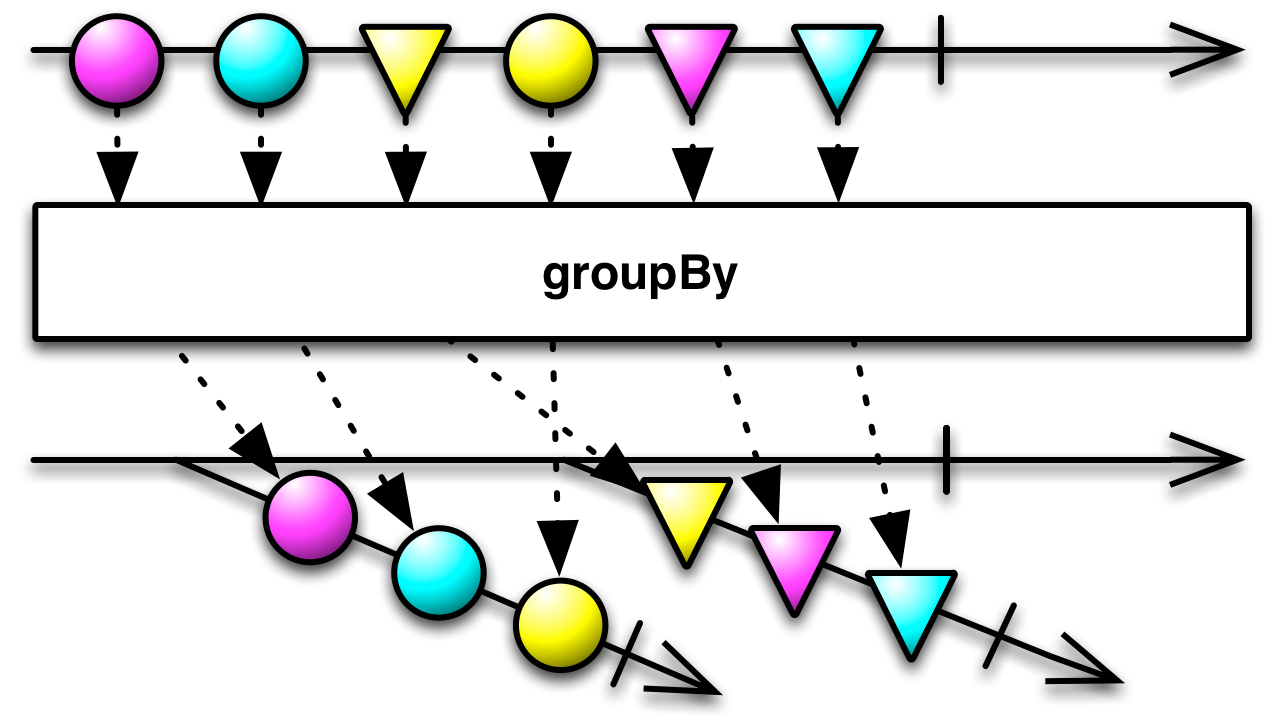
Note: A GroupedFlowable will cache the items it is to emit until such time as it
is subscribed to. For this reason, in order to avoid memory leaks, you should not simply ignore those
GroupedPublishers that do not concern you. Instead, you can signal to them that they may
discard their buffers by applying an operator like ignoreElements() to them.
- Backpressure:
- Both the returned and its inner
Publishers honor backpressure and the sourcePublisheris consumed in a bounded mode (i.e., requested a fixed amount upfront and replenished based on downstream consumption). Note that both the returned and its innerPublishers use unbounded internal buffers and if the sourcePublisherdoesn't honor backpressure, that may lead toOutOfMemoryError. - Scheduler:
groupBydoes not operate by default on a particularScheduler.
Parameters
| keySelector | a function that extracts the key for each item |
|---|---|
| delayError | if true, the exception from the current Flowable is delayed in each group until that specific group emitted the normal values; if false, the exception bypasses values in the groups and is reported immediately. |
Returns
- a
Publisherthat emitsGroupedFlowables, each of which corresponds to a unique key value and each of which emits those items from the source Publisher that share that key value
public final Flowable<GroupedFlowable<K, T>> groupBy (Function<? super T, ? extends K> keySelector)
Groups the items emitted by a Publisher according to a specified criterion, and emits these
grouped items as GroupedFlowables. The emitted GroupedPublisher allows only a single
Subscriber during its lifetime and if this Subscriber cancels before the
source terminates, the next emission by the source having the same key will trigger a new
GroupedPublisher emission.

Note: A GroupedFlowable will cache the items it is to emit until such time as it
is subscribed to. For this reason, in order to avoid memory leaks, you should not simply ignore those
GroupedPublishers that do not concern you. Instead, you can signal to them that they may
discard their buffers by applying an operator like ignoreElements() to them.
- Backpressure:
- Both the returned and its inner
Publishers honor backpressure and the sourcePublisheris consumed in a bounded mode (i.e., requested a fixed amount upfront and replenished based on downstream consumption). Note that both the returned and its innerPublishers use unbounded internal buffers and if the sourcePublisherdoesn't honor backpressure, that may lead toOutOfMemoryError. - Scheduler:
groupBydoes not operate by default on a particularScheduler.
Parameters
| keySelector | a function that extracts the key for each item |
|---|
Returns
- a
Publisherthat emitsGroupedFlowables, each of which corresponds to a unique key value and each of which emits those items from the source Publisher that share that key value
public final Flowable<GroupedFlowable<K, V>> groupBy (Function<? super T, ? extends K> keySelector, Function<? super T, ? extends V> valueSelector)
Groups the items emitted by a Publisher according to a specified criterion, and emits these
grouped items as GroupedFlowables. The emitted GroupedPublisher allows only a single
Subscriber during its lifetime and if this Subscriber cancels before the
source terminates, the next emission by the source having the same key will trigger a new
GroupedPublisher emission.

Note: A GroupedFlowable will cache the items it is to emit until such time as it
is subscribed to. For this reason, in order to avoid memory leaks, you should not simply ignore those
GroupedPublishers that do not concern you. Instead, you can signal to them that they may
discard their buffers by applying an operator like ignoreElements() to them.
- Backpressure:
- Both the returned and its inner
Publishers honor backpressure and the sourcePublisheris consumed in a bounded mode (i.e., requested a fixed amount upfront and replenished based on downstream consumption). Note that both the returned and its innerPublishers use unbounded internal buffers and if the sourcePublisherdoesn't honor backpressure, that may lead toOutOfMemoryError. - Scheduler:
groupBydoes not operate by default on a particularScheduler.
Parameters
| keySelector | a function that extracts the key for each item |
|---|---|
| valueSelector | a function that extracts the return element for each item |
Returns
- a
Publisherthat emitsGroupedFlowables, each of which corresponds to a unique key value and each of which emits those items from the source Publisher that share that key value
public final Flowable<GroupedFlowable<K, V>> groupBy (Function<? super T, ? extends K> keySelector, Function<? super T, ? extends V> valueSelector, boolean delayError)
Groups the items emitted by a Publisher according to a specified criterion, and emits these
grouped items as GroupedFlowables. The emitted GroupedPublisher allows only a single
Subscriber during its lifetime and if this Subscriber cancels before the
source terminates, the next emission by the source having the same key will trigger a new
GroupedPublisher emission.

Note: A GroupedFlowable will cache the items it is to emit until such time as it
is subscribed to. For this reason, in order to avoid memory leaks, you should not simply ignore those
GroupedPublishers that do not concern you. Instead, you can signal to them that they may
discard their buffers by applying an operator like ignoreElements() to them.
- Backpressure:
- Both the returned and its inner
Publishers honor backpressure and the sourcePublisheris consumed in a bounded mode (i.e., requested a fixed amount upfront and replenished based on downstream consumption). Note that both the returned and its innerPublishers use unbounded internal buffers and if the sourcePublisherdoesn't honor backpressure, that may lead toOutOfMemoryError. - Scheduler:
groupBydoes not operate by default on a particularScheduler.
Parameters
| keySelector | a function that extracts the key for each item |
|---|---|
| valueSelector | a function that extracts the return element for each item |
| delayError | if true, the exception from the current Flowable is delayed in each group until that specific group emitted the normal values; if false, the exception bypasses values in the groups and is reported immediately. |
Returns
- a
Publisherthat emitsGroupedFlowables, each of which corresponds to a unique key value and each of which emits those items from the source Publisher that share that key value
public final Flowable<GroupedFlowable<K, V>> groupBy (Function<? super T, ? extends K> keySelector, Function<? super T, ? extends V> valueSelector, boolean delayError, int bufferSize)
Groups the items emitted by a Publisher according to a specified criterion, and emits these
grouped items as GroupedFlowables. The emitted GroupedPublisher allows only a single
Subscriber during its lifetime and if this Subscriber cancels before the
source terminates, the next emission by the source having the same key will trigger a new
GroupedPublisher emission.

Note: A GroupedFlowable will cache the items it is to emit until such time as it
is subscribed to. For this reason, in order to avoid memory leaks, you should not simply ignore those
GroupedPublishers that do not concern you. Instead, you can signal to them that they may
discard their buffers by applying an operator like ignoreElements() to them.
- Backpressure:
- Both the returned and its inner
Publishers honor backpressure and the sourcePublisheris consumed in a bounded mode (i.e., requested a fixed amount upfront and replenished based on downstream consumption). Note that both the returned and its innerPublishers use unbounded internal buffers and if the sourcePublisherdoesn't honor backpressure, that may lead toOutOfMemoryError. - Scheduler:
groupBydoes not operate by default on a particularScheduler.
Parameters
| keySelector | a function that extracts the key for each item |
|---|---|
| valueSelector | a function that extracts the return element for each item |
| delayError | if true, the exception from the current Flowable is delayed in each group until that specific group emitted the normal values; if false, the exception bypasses values in the groups and is reported immediately. |
| bufferSize | the hint for how many GroupedFlowables and element in each GroupedFlowable should be buffered |
Returns
- a
Publisherthat emitsGroupedFlowables, each of which corresponds to a unique key value and each of which emits those items from the source Publisher that share that key value
public final Flowable<R> groupJoin (Publisher<? extends TRight> other, Function<? super T, ? extends Publisher<TLeftEnd>> leftEnd, Function<? super TRight, ? extends Publisher<TRightEnd>> rightEnd, BiFunction<? super T, ? super Flowable<TRight>, ? extends R> resultSelector)
Returns a Flowable that correlates two Publishers when they overlap in time and groups the results.
There are no guarantees in what order the items get combined when multiple items from one or both source Publishers overlap.
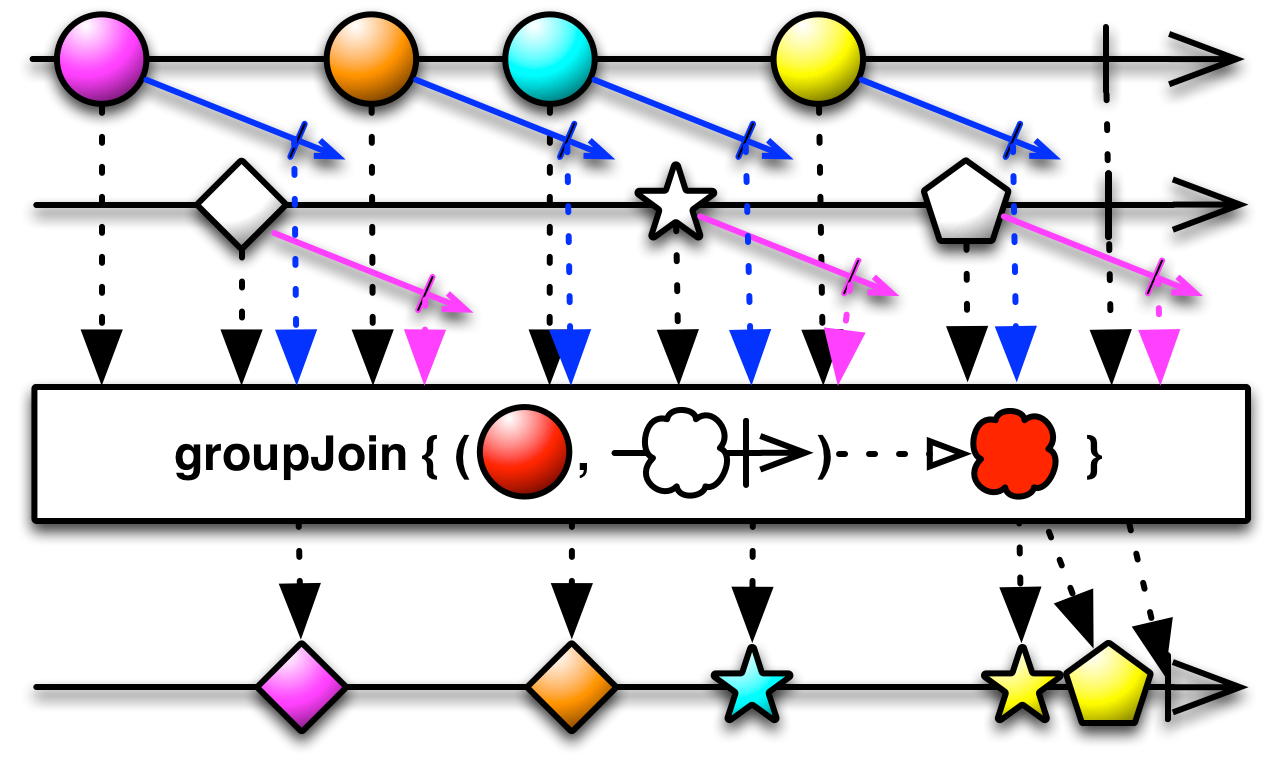
- Backpressure:
- The operator doesn't support backpressure and consumes all participating
Publishers in an unbounded mode (i.e., not applying any backpressure to them). - Scheduler:
groupJoindoes not operate by default on a particularScheduler.
Parameters
| other | the other Publisher to correlate items from the source Publisher with |
|---|---|
| leftEnd | a function that returns a Publisher whose emissions indicate the duration of the values of the source Publisher |
| rightEnd | a function that returns a Publisher whose emissions indicate the duration of the values of
the right Publisher |
| resultSelector | a function that takes an item emitted by each Publisher and returns the value to be emitted by the resulting Publisher |
Returns
- a Flowable that emits items based on combining those items emitted by the source Publishers whose durations overlap
public final Flowable<T> hide ()
Hides the identity of this Flowable and its Subscription.
Allows hiding extra features such as Processor's Subscriber methods or preventing certain identity-based optimizations (fusion).
- Backpressure:
- The operator is a pass-through for backpressure, the behavior is determined by the upstream's backpressure behavior.
- Scheduler:
hidedoes not operate by default on a particularScheduler.
Returns
- the new Flowable instance
public final Completable ignoreElements ()
Ignores all items emitted by the source Publisher and only calls onComplete or onError.
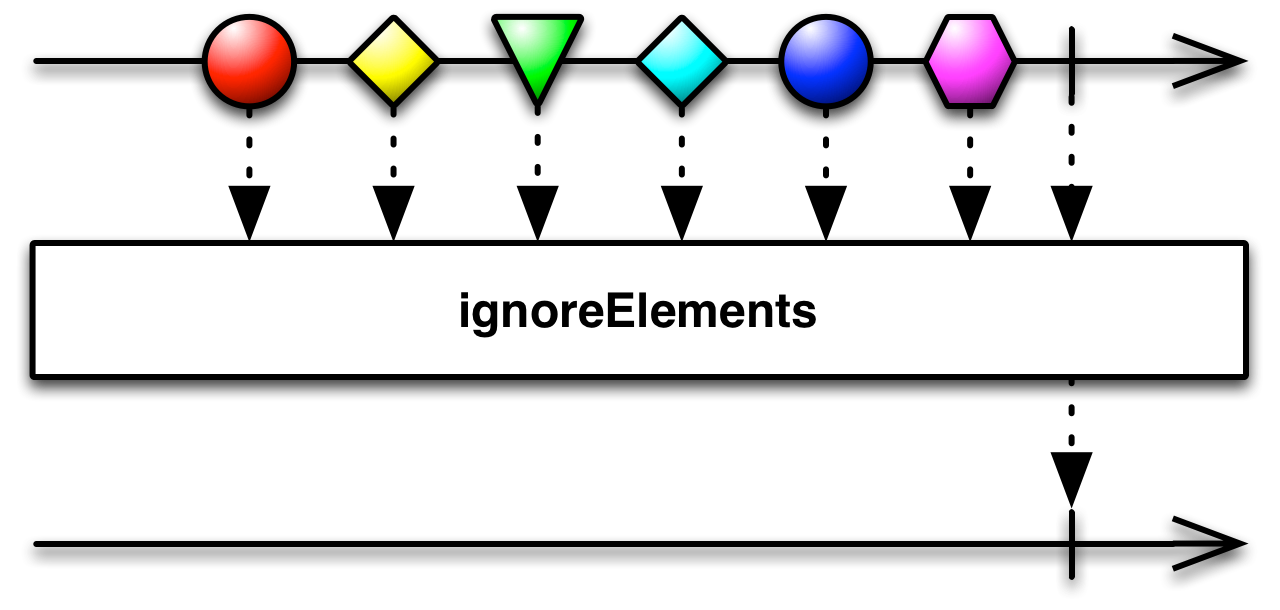
- Backpressure:
- This operator ignores backpressure as it doesn't emit any elements and consumes the source
Publisherin an unbounded manner (i.e., no backpressure is applied to it). - Scheduler:
ignoreElementsdoes not operate by default on a particularScheduler.
Returns
- a Completable that only calls
onCompleteoronError, based on which one is called by the source Publisher
public static Flowable<Long> interval (long period, TimeUnit unit, Scheduler scheduler)
Returns a Flowable that emits a sequential number every specified interval of time, on a specified Scheduler.

- Backpressure:
- The operator generates values based on time and ignores downstream backpressure which
may lead to
MissingBackpressureExceptionat some point in the chain. Consumers should consider applying one of theonBackpressureXXXoperators as well. - Scheduler:
- You specify which
Schedulerthis operator will use
Parameters
| period | the period size in time units (see below) |
|---|---|
| unit | time units to use for the interval size |
| scheduler | the Scheduler to use for scheduling the items |
Returns
- a Flowable that emits a sequential number each time interval
public static Flowable<Long> interval (long period, TimeUnit unit)
Returns a Flowable that emits a sequential number every specified interval of time.

- Backpressure:
- The operator signals a
MissingBackpressureExceptionif the downstream is not ready to receive the next value. - Scheduler:
intervaloperates by default on thecomputationScheduler.
Parameters
| period | the period size in time units (see below) |
|---|---|
| unit | time units to use for the interval size |
Returns
- a Flowable that emits a sequential number each time interval
public static Flowable<Long> interval (long initialDelay, long period, TimeUnit unit, Scheduler scheduler)
Returns a Flowable that emits a 0L after the initialDelay and ever increasing numbers
after each period of time thereafter, on a specified Scheduler.

- Backpressure:
- The operator generates values based on time and ignores downstream backpressure which
may lead to
MissingBackpressureExceptionat some point in the chain. Consumers should consider applying one of theonBackpressureXXXoperators as well. - Scheduler:
- You specify which
Schedulerthis operator will use
Parameters
| initialDelay | the initial delay time to wait before emitting the first value of 0L |
|---|---|
| period | the period of time between emissions of the subsequent numbers |
| unit | the time unit for both initialDelay and period |
| scheduler | the Scheduler on which the waiting happens and items are emitted |
Returns
- a Flowable that emits a 0L after the
initialDelayand ever increasing numbers after eachperiodof time thereafter, while running on the given Scheduler
public static Flowable<Long> interval (long initialDelay, long period, TimeUnit unit)
Returns a Flowable that emits a 0L after the initialDelay and ever increasing numbers
after each period of time thereafter.

- Backpressure:
- The operator generates values based on time and ignores downstream backpressure which
may lead to
MissingBackpressureExceptionat some point in the chain. Consumers should consider applying one of theonBackpressureXXXoperators as well. - Scheduler:
intervaloperates by default on thecomputationScheduler.
Parameters
| initialDelay | the initial delay time to wait before emitting the first value of 0L |
|---|---|
| period | the period of time between emissions of the subsequent numbers |
| unit | the time unit for both initialDelay and period |
Returns
- a Flowable that emits a 0L after the
initialDelayand ever increasing numbers after eachperiodof time thereafter
public static Flowable<Long> intervalRange (long start, long count, long initialDelay, long period, TimeUnit unit, Scheduler scheduler)
Signals a range of long values, the first after some initial delay and the rest periodically after.
The sequence completes immediately after the last value (start + count - 1) has been reached.
- Backpressure:
- The operator signals a
MissingBackpressureExceptionif the downstream can't keep up. - Scheduler:
- you provide the
Scheduler.
Parameters
| start | that start value of the range |
|---|---|
| count | the number of values to emit in total, if zero, the operator emits an onComplete after the initial delay. |
| initialDelay | the initial delay before signalling the first value (the start) |
| period | the period between subsequent values |
| unit | the unit of measure of the initialDelay and period amounts |
| scheduler | the target scheduler where the values and terminal signals will be emitted |
Returns
- the new Flowable instance
public static Flowable<Long> intervalRange (long start, long count, long initialDelay, long period, TimeUnit unit)
Signals a range of long values, the first after some initial delay and the rest periodically after.
The sequence completes immediately after the last value (start + count - 1) has been reached.
- Backpressure:
- The operator signals a
MissingBackpressureExceptionif the downstream can't keep up. - Scheduler:
intervalRangeby default operates on thecomputationScheduler.
Parameters
| start | that start value of the range |
|---|---|
| count | the number of values to emit in total, if zero, the operator emits an onComplete after the initial delay. |
| initialDelay | the initial delay before signalling the first value (the start) |
| period | the period between subsequent values |
| unit | the unit of measure of the initialDelay and period amounts |
Returns
- the new Flowable instance
public final Single<Boolean> isEmpty ()
Returns a Single that emits true if the source Publisher is empty, otherwise false.
In Rx.Net this is negated as the any Subscriber but we renamed this in RxJava to better match Java
naming idioms.
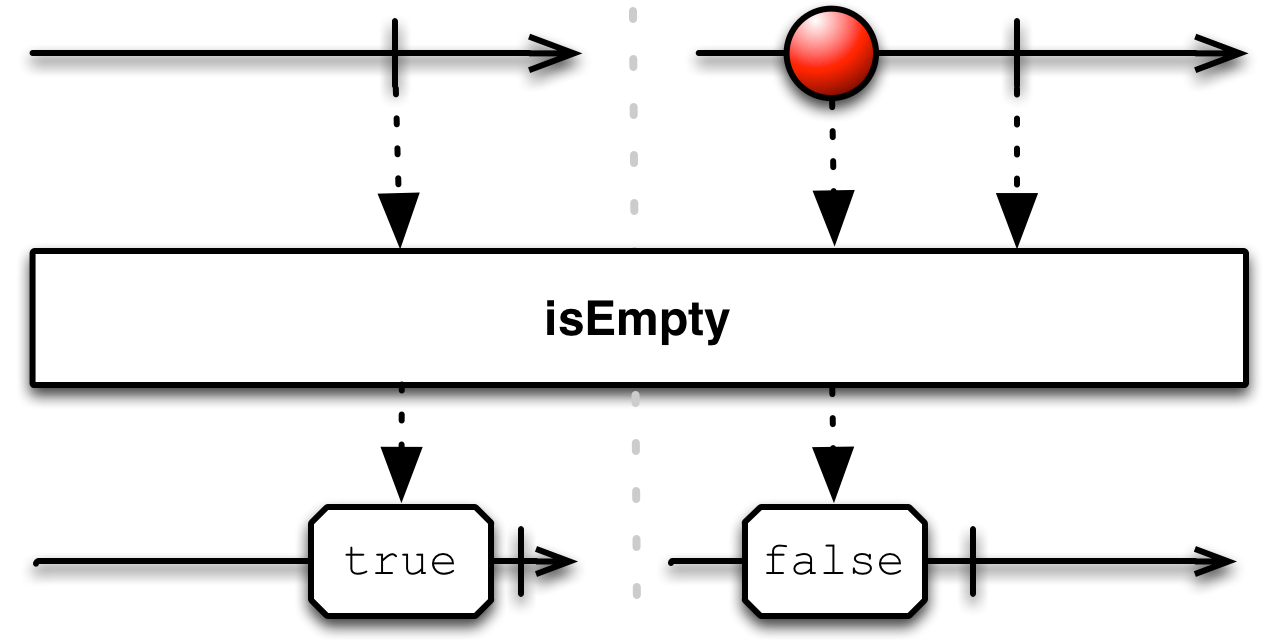
- Backpressure:
- The operator honors backpressure from downstream and consumes the source
Publisherin an unbounded manner (i.e., without applying backpressure). - Scheduler:
isEmptydoes not operate by default on a particularScheduler.
Returns
- a Flowable that emits a Boolean
public final Flowable<R> join (Publisher<? extends TRight> other, Function<? super T, ? extends Publisher<TLeftEnd>> leftEnd, Function<? super TRight, ? extends Publisher<TRightEnd>> rightEnd, BiFunction<? super T, ? super TRight, ? extends R> resultSelector)
Correlates the items emitted by two Publishers based on overlapping durations.
There are no guarantees in what order the items get combined when multiple items from one or both source Publishers overlap.
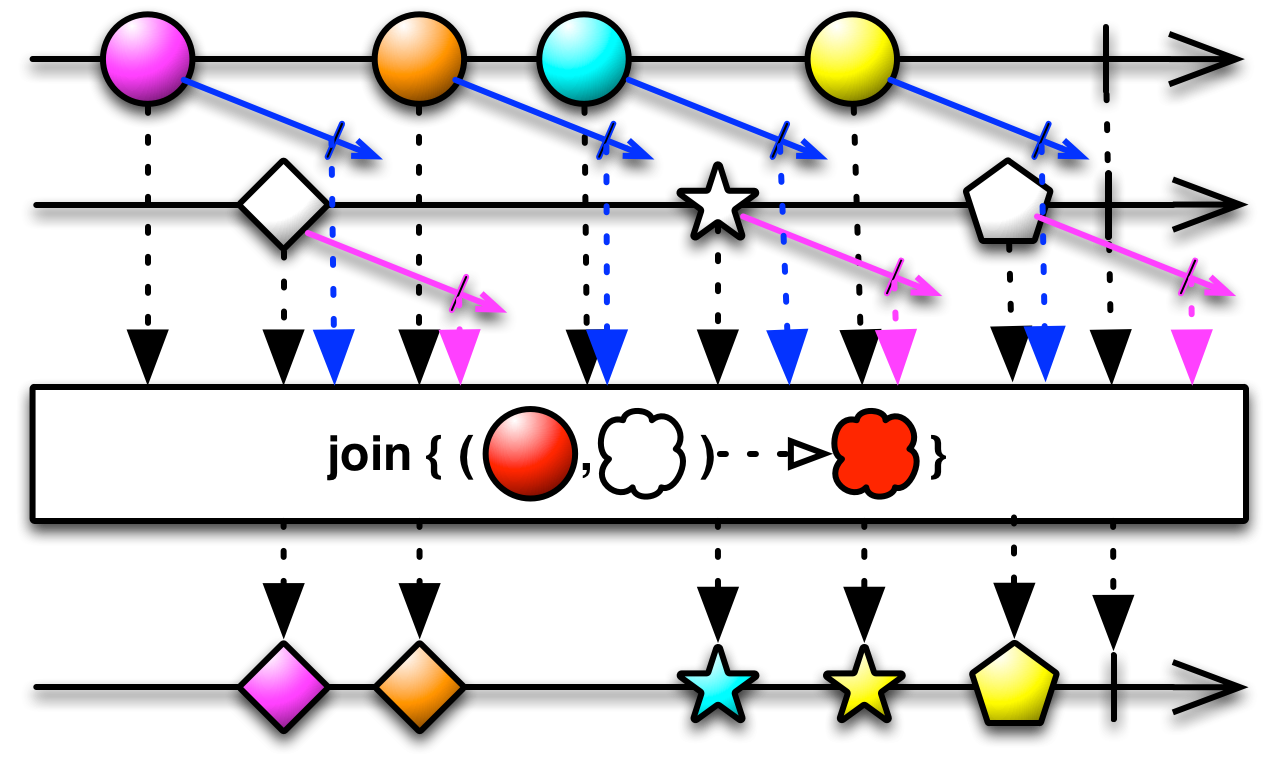
- Backpressure:
- The operator doesn't support backpressure and consumes all participating
Publishers in an unbounded mode (i.e., not applying any backpressure to them). - Scheduler:
joindoes not operate by default on a particularScheduler.
Parameters
| other | the second Publisher to join items from |
|---|---|
| leftEnd | a function to select a duration for each item emitted by the source Publisher, used to determine overlap |
| rightEnd | a function to select a duration for each item emitted by the right Publisher, used to
determine overlap |
| resultSelector | a function that computes an item to be emitted by the resulting Publisher for any two overlapping items emitted by the two Publishers |
Returns
- a Flowable that emits items correlating to items emitted by the source Publishers that have overlapping durations
public static Flowable<T> just (T item1, T item2, T item3, T item4, T item5, T item6)
Converts six items into a Publisher that emits those items.
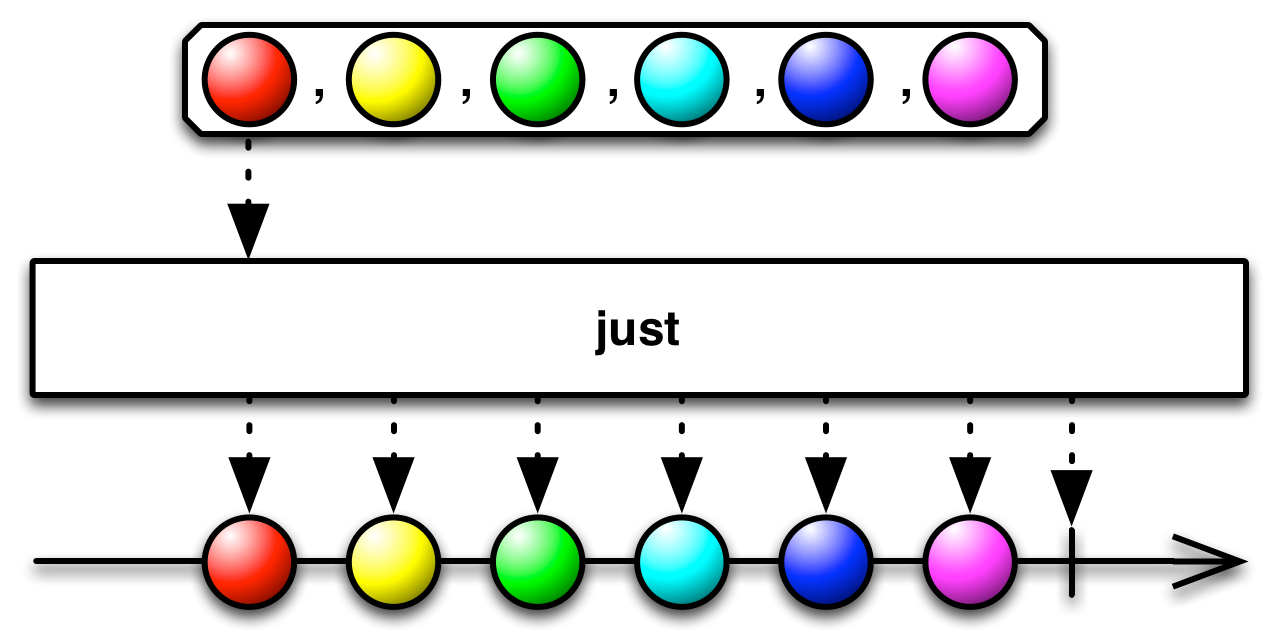
- Backpressure:
- The operator honors backpressure from downstream and signals each value on-demand (i.e., when requested).
- Scheduler:
justdoes not operate by default on a particularScheduler.
Parameters
| item1 | first item |
|---|---|
| item2 | second item |
| item3 | third item |
| item4 | fourth item |
| item5 | fifth item |
| item6 | sixth item |
Returns
- a Flowable that emits each item
public static Flowable<T> just (T item1, T item2)
Converts two items into a Publisher that emits those items.

- Backpressure:
- The operator honors backpressure from downstream and signals each value on-demand (i.e., when requested).
- Scheduler:
justdoes not operate by default on a particularScheduler.
Parameters
| item1 | first item |
|---|---|
| item2 | second item |
Returns
- a Flowable that emits each item
public static Flowable<T> just (T item1, T item2, T item3, T item4)
Converts four items into a Publisher that emits those items.

- Backpressure:
- The operator honors backpressure from downstream and signals each value on-demand (i.e., when requested).
- Scheduler:
justdoes not operate by default on a particularScheduler.
Parameters
| item1 | first item |
|---|---|
| item2 | second item |
| item3 | third item |
| item4 | fourth item |
Returns
- a Flowable that emits each item
public static Flowable<T> just (T item)
Returns a Flowable that emits a single item and then completes.
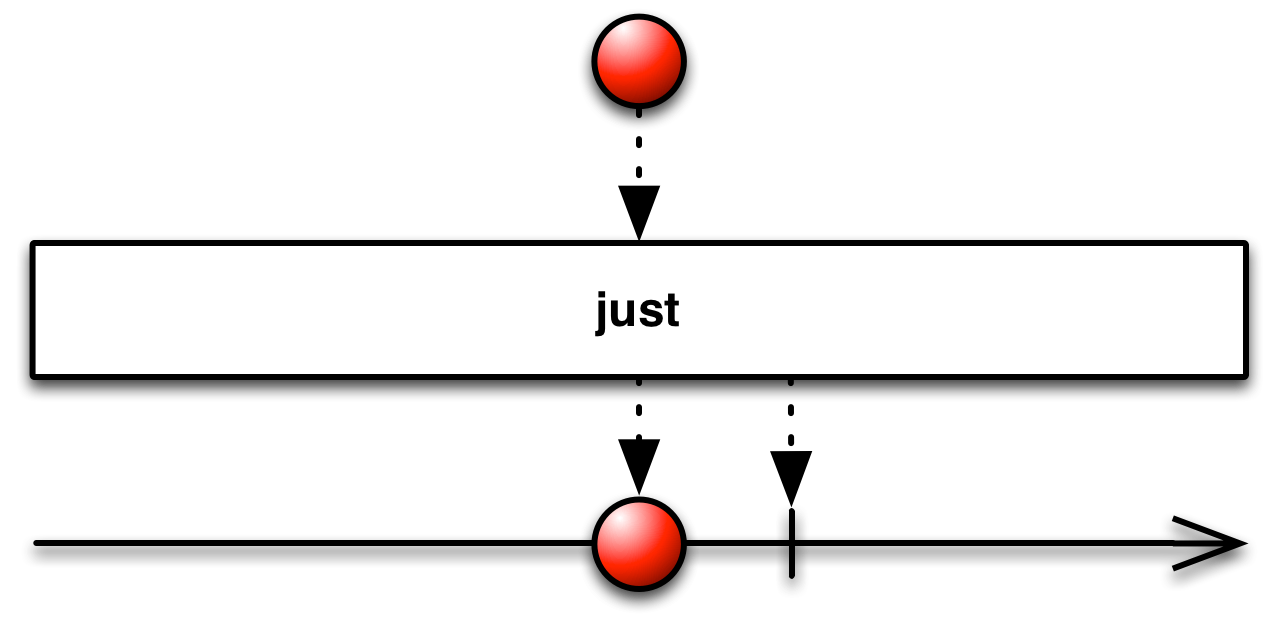
To convert any object into a Publisher that emits that object, pass that object into the just
method.
This is similar to the fromArray(java.lang.Object[]) method, except that from will convert
an Iterable object into a Publisher that emits each of the items in the Iterable, one at a
time, while the just method converts an Iterable into a Publisher that emits the entire
Iterable as a single item.
- Backpressure:
- The operator honors backpressure from downstream.
- Scheduler:
justdoes not operate by default on a particularScheduler.
Parameters
| item | the item to emit |
|---|
Returns
- a Flowable that emits
valueas a single item and then completes
public static Flowable<T> just (T item1, T item2, T item3, T item4, T item5)
Converts five items into a Publisher that emits those items.

- Backpressure:
- The operator honors backpressure from downstream and signals each value on-demand (i.e., when requested).
- Scheduler:
justdoes not operate by default on a particularScheduler.
Parameters
| item1 | first item |
|---|---|
| item2 | second item |
| item3 | third item |
| item4 | fourth item |
| item5 | fifth item |
Returns
- a Flowable that emits each item
public static Flowable<T> just (T item1, T item2, T item3, T item4, T item5, T item6, T item7)
Converts seven items into a Publisher that emits those items.

- Backpressure:
- The operator honors backpressure from downstream and signals each value on-demand (i.e., when requested).
- Scheduler:
justdoes not operate by default on a particularScheduler.
Parameters
| item1 | first item |
|---|---|
| item2 | second item |
| item3 | third item |
| item4 | fourth item |
| item5 | fifth item |
| item6 | sixth item |
| item7 | seventh item |
Returns
- a Flowable that emits each item
public static Flowable<T> just (T item1, T item2, T item3, T item4, T item5, T item6, T item7, T item8)
Converts eight items into a Publisher that emits those items.

- Backpressure:
- The operator honors backpressure from downstream and signals each value on-demand (i.e., when requested).
- Scheduler:
justdoes not operate by default on a particularScheduler.
Parameters
| item1 | first item |
|---|---|
| item2 | second item |
| item3 | third item |
| item4 | fourth item |
| item5 | fifth item |
| item6 | sixth item |
| item7 | seventh item |
| item8 | eighth item |
Returns
- a Flowable that emits each item
public static Flowable<T> just (T item1, T item2, T item3, T item4, T item5, T item6, T item7, T item8, T item9)
Converts nine items into a Publisher that emits those items.

- Backpressure:
- The operator honors backpressure from downstream and signals each value on-demand (i.e., when requested).
- Scheduler:
justdoes not operate by default on a particularScheduler.
Parameters
| item1 | first item |
|---|---|
| item2 | second item |
| item3 | third item |
| item4 | fourth item |
| item5 | fifth item |
| item6 | sixth item |
| item7 | seventh item |
| item8 | eighth item |
| item9 | ninth item |
Returns
- a Flowable that emits each item
public static Flowable<T> just (T item1, T item2, T item3, T item4, T item5, T item6, T item7, T item8, T item9, T item10)
Converts ten items into a Publisher that emits those items.

- Backpressure:
- The operator honors backpressure from downstream and signals each value on-demand (i.e., when requested).
- Scheduler:
justdoes not operate by default on a particularScheduler.
Parameters
| item1 | first item |
|---|---|
| item2 | second item |
| item3 | third item |
| item4 | fourth item |
| item5 | fifth item |
| item6 | sixth item |
| item7 | seventh item |
| item8 | eighth item |
| item9 | ninth item |
| item10 | tenth item |
Returns
- a Flowable that emits each item
public static Flowable<T> just (T item1, T item2, T item3)
Converts three items into a Publisher that emits those items.

- Backpressure:
- The operator honors backpressure from downstream and signals each value on-demand (i.e., when requested).
- Scheduler:
justdoes not operate by default on a particularScheduler.
Parameters
| item1 | first item |
|---|---|
| item2 | second item |
| item3 | third item |
Returns
- a Flowable that emits each item
public final Single<T> last (T defaultItem)
Returns a Single that emits only the last item emitted by this Flowable, or a default item if this Flowable completes without emitting any items.
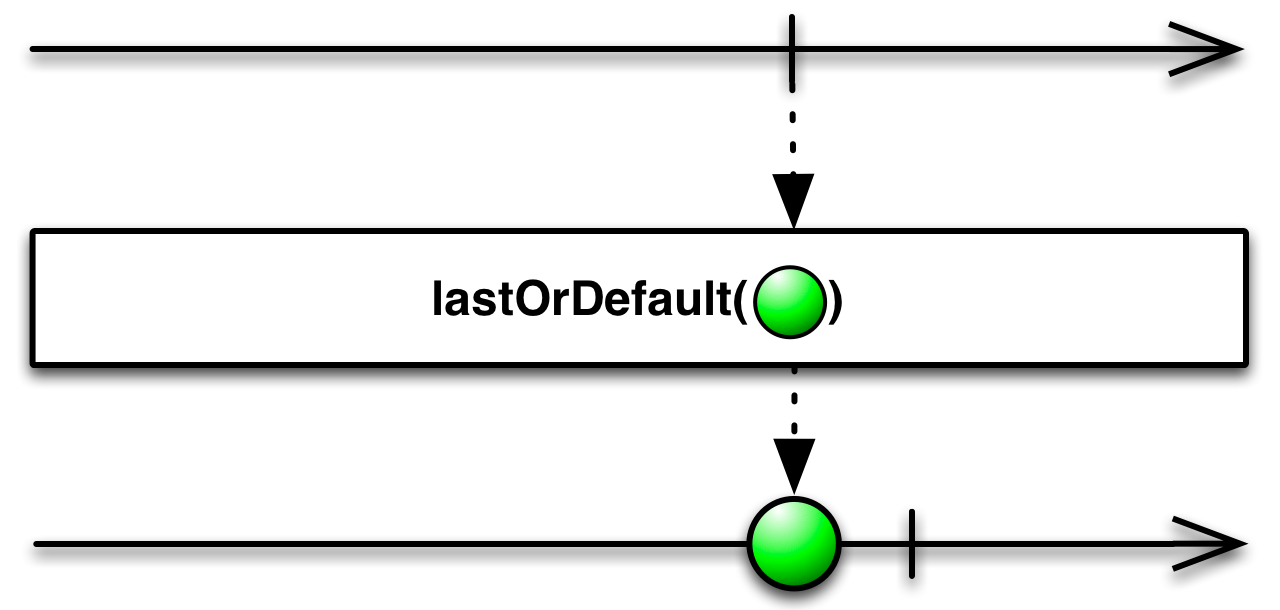
- Backpressure:
- The operator honors backpressure from downstream and consumes the source
Publisherin an unbounded manner (i.e., without applying backpressure). - Scheduler:
lastdoes not operate by default on a particularScheduler.
Parameters
| defaultItem | the default item to emit if the source Publisher is empty |
|---|
Returns
- the new Single instance
public final Maybe<T> lastElement ()
Returns a Maybe that emits the last item emitted by this Flowable or completes if this Flowable is empty.

- Backpressure:
- The operator honors backpressure from downstream and consumes the source
Publisherin an unbounded manner (i.e., without applying backpressure). - Scheduler:
lastElementdoes not operate by default on a particularScheduler.
Returns
- a new Maybe instance
public final Single<T> lastOrError ()
Returns a Single that emits only the last item emitted by this Flowable or signals
a NoSuchElementException if this Flowable is empty.
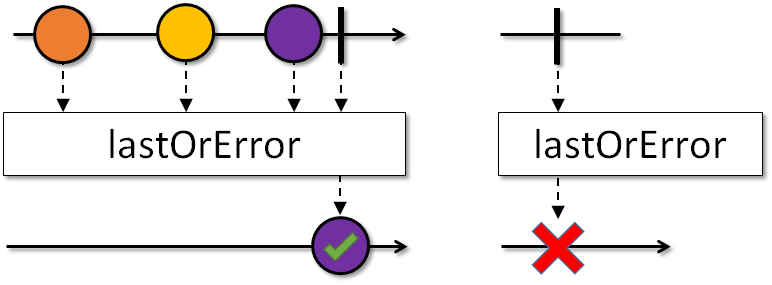
- Backpressure:
- The operator honors backpressure from downstream and consumes the source
Publisherin an unbounded manner (i.e., without applying backpressure). - Scheduler:
lastOrErrordoes not operate by default on a particularScheduler.
Returns
- the new Single instance
public final Flowable<R> lift (FlowableOperator<? extends R, ? super T> lifter)
This method requires advanced knowledge about building operators; please consider other standard composition methods first; Lifts a function to the current Publisher and returns a new Publisher that when subscribed to will pass the values of the current Publisher through the Operator function.
In other words, this allows chaining Subscribers together on a Publisher for acting on the values within the Publisher.
Publisher.map(...).filter(...).take(5).lift(new OperatorA()).lift(new OperatorB(...)).subscribe()
If the operator you are creating is designed to act on the individual items emitted by a source
Publisher, use lift. If your operator is designed to transform the source Publisher as a whole
(for instance, by applying a particular set of existing RxJava operators to it) use compose(FlowableTransformer).
- Backpressure:
- The
Operatorinstance provided is responsible to be backpressure-aware or document the fact that the consumer of the returnedPublisherhas to apply one of theonBackpressureXXXoperators. - Scheduler:
liftdoes not operate by default on a particularScheduler.
Parameters
| lifter | the Operator that implements the Publisher-operating function to be applied to the source Publisher |
|---|
Returns
- a Flowable that is the result of applying the lifted Operator to the source Publisher
public final Flowable<R> map (Function<? super T, ? extends R> mapper)
Returns a Flowable that applies a specified function to each item emitted by the source Publisher and emits the results of these function applications.

- Backpressure:
- The operator doesn't interfere with backpressure which is determined by the source
Publisher's backpressure behavior. - Scheduler:
mapdoes not operate by default on a particularScheduler.
Parameters
| mapper | a function to apply to each item emitted by the Publisher |
|---|
Returns
- a Flowable that emits the items from the source Publisher, transformed by the specified function
public final Flowable<Notification<T>> materialize ()
Returns a Flowable that represents all of the emissions and notifications from the source
Publisher into emissions marked with their original types within Notification objects.
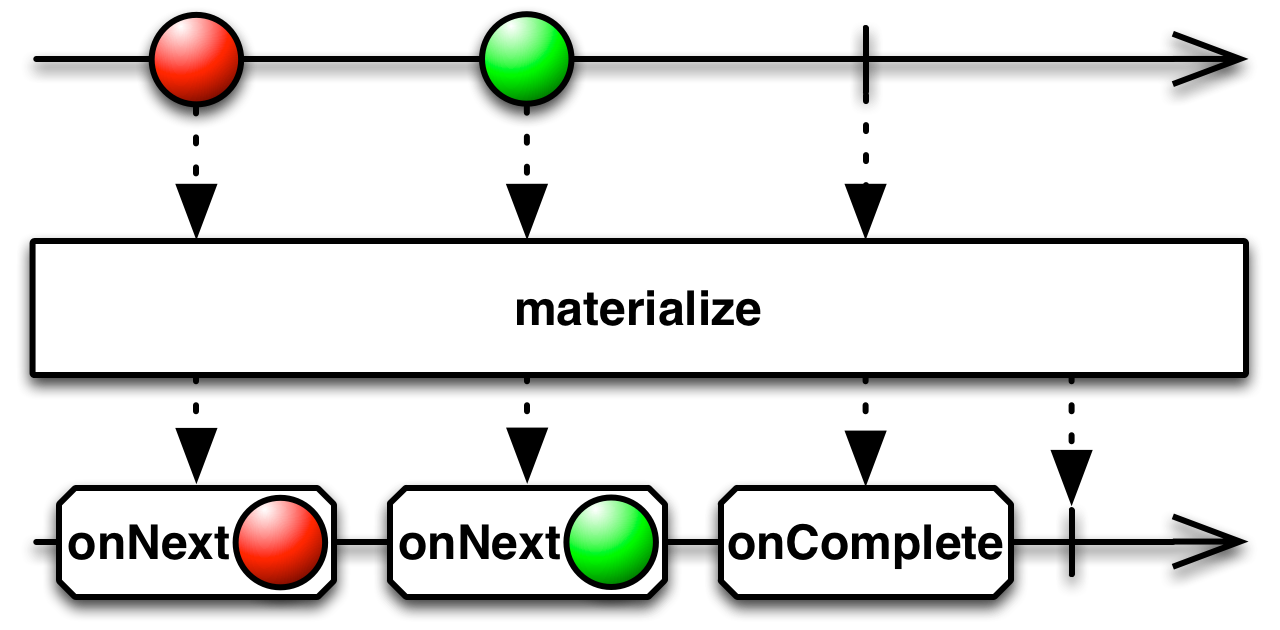
- Backpressure:
- The operator honors backpressure from downstream and expects it from the source
Publisher. If this expectation is violated, the operator may throw anIllegalStateException. - Scheduler:
materializedoes not operate by default on a particularScheduler.
Returns
- a Flowable that emits items that are the result of materializing the items and notifications of the source Publisher
public static Flowable<T> merge (Publisher<? extends Publisher<? extends T>> sources)
Flattens a Publisher that emits Publishers into a single Publisher that emits the items emitted by those Publishers, without any transformation.
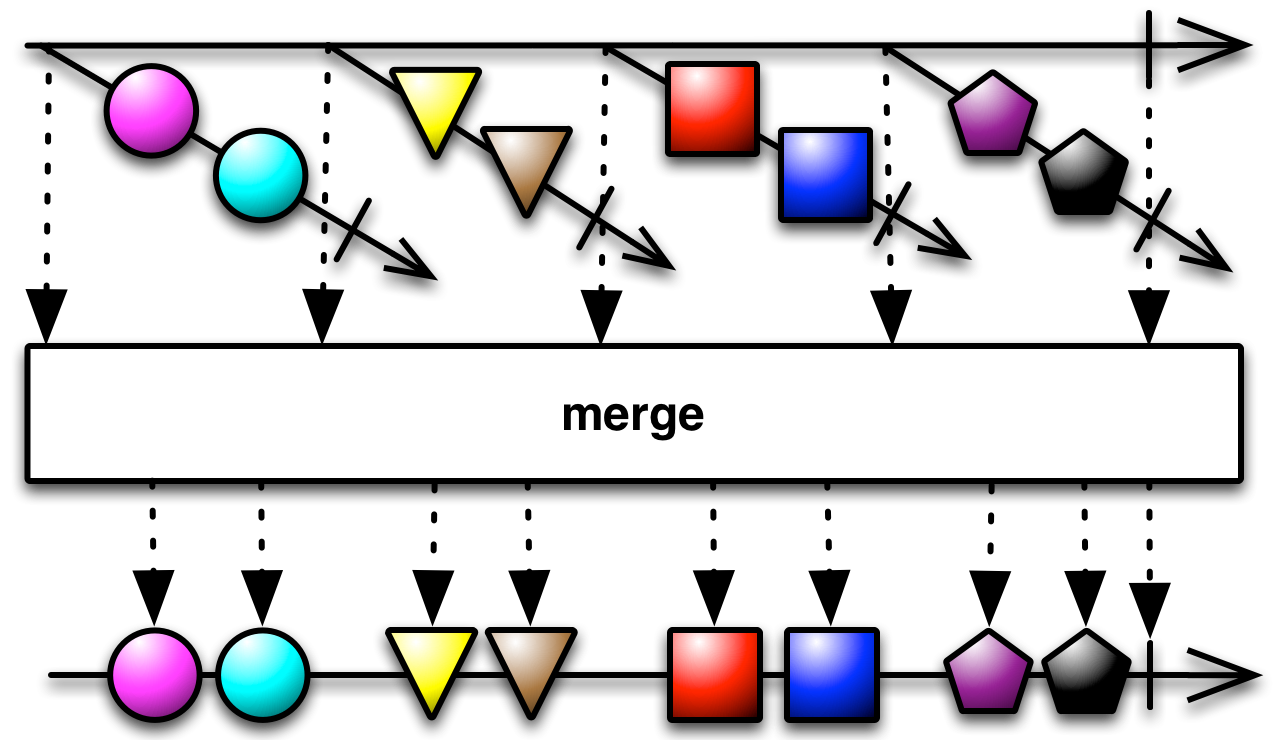
You can combine the items emitted by multiple Publishers so that they appear as a single Publisher, by
using the merge method.
- Backpressure:
- The operator honors backpressure from downstream. The outer
Publisheris consumed in unbounded mode (i.e., no backpressure is applied to it). The innerPublishers are expected to honor backpressure; if violated, the operator may signalMissingBackpressureException. - Scheduler:
mergedoes not operate by default on a particularScheduler.
Parameters
| sources | a Publisher that emits Publishers |
|---|
Returns
- a Flowable that emits items that are the result of flattening the Publishers emitted by the
sourcePublisher
public static Flowable<T> merge (Publisher<? extends T> source1, Publisher<? extends T> source2, Publisher<? extends T> source3)
Flattens three Publishers into a single Publisher, without any transformation.
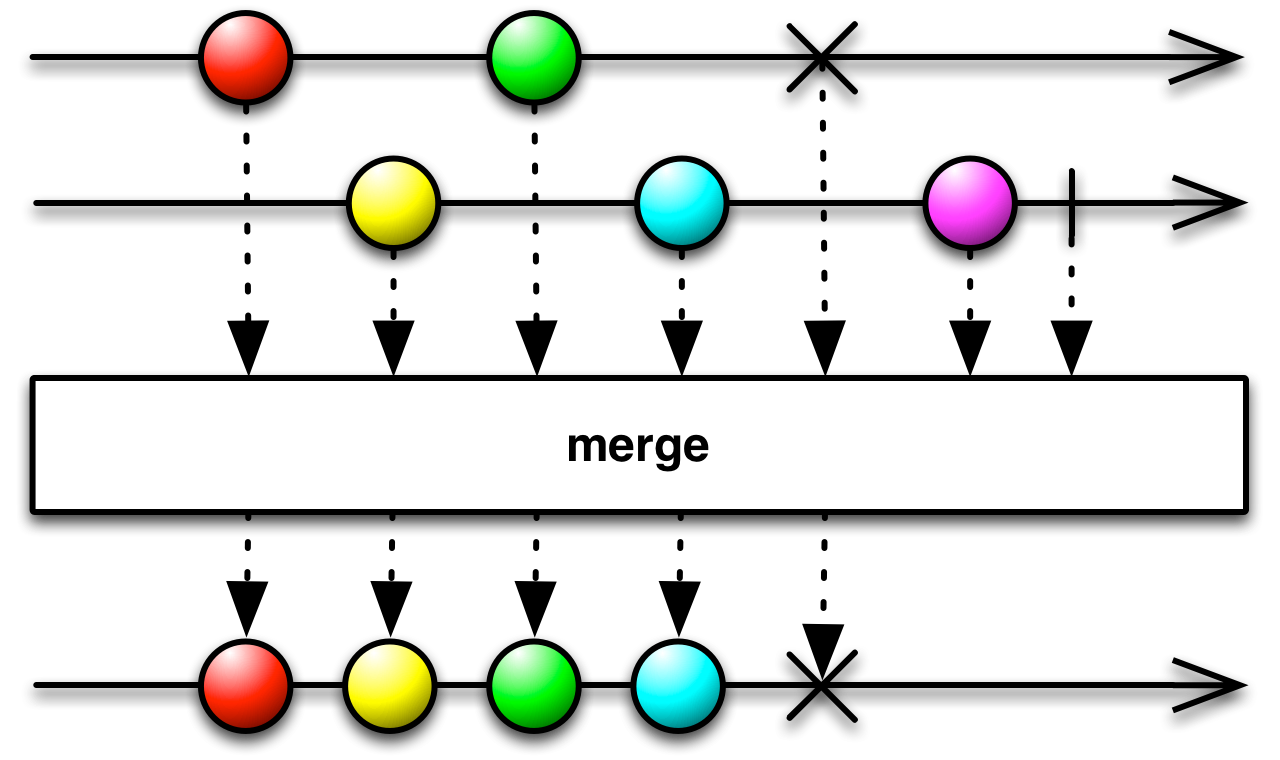
You can combine items emitted by multiple Publishers so that they appear as a single Publisher, by
using the merge method.
- Backpressure:
- The operator honors backpressure from downstream. The source
Publishers are expected to honor backpressure; if violated, the operator may signalMissingBackpressureException. - Scheduler:
mergedoes not operate by default on a particularScheduler.
Parameters
| source1 | a Publisher to be merged |
|---|---|
| source2 | a Publisher to be merged |
| source3 | a Publisher to be merged |
Returns
- a Flowable that emits all of the items emitted by the source Publishers
public static Flowable<T> merge (Publisher<? extends Publisher<? extends T>> sources, int maxConcurrency)
Flattens a Publisher that emits Publishers into a single Publisher that emits the items emitted by those Publishers, without any transformation, while limiting the maximum number of concurrent subscriptions to these Publishers.

You can combine the items emitted by multiple Publishers so that they appear as a single Publisher, by
using the merge method.
- Backpressure:
- The operator honors backpressure from downstream. Both the outer and inner
Publishers are expected to honor backpressure; if violated, the operator may signalMissingBackpressureException. - Scheduler:
mergedoes not operate by default on a particularScheduler.
Parameters
| sources | a Publisher that emits Publishers |
|---|---|
| maxConcurrency | the maximum number of Publishers that may be subscribed to concurrently |
Returns
- a Flowable that emits items that are the result of flattening the Publishers emitted by the
sourcePublisher
Throws
| IllegalArgumentException | if maxConcurrency is less than or equal to 0 |
|---|
public static Flowable<T> merge (Iterable<? extends Publisher<? extends T>> sources, int maxConcurrency)
Flattens an Iterable of Publishers into one Publisher, without any transformation, while limiting the number of concurrent subscriptions to these Publishers.

You can combine the items emitted by multiple Publishers so that they appear as a single Publisher, by
using the merge method.
- Backpressure:
- The operator honors backpressure from downstream. The source
Publishers are expected to honor backpressure; if violated, the operator may signalMissingBackpressureException. - Scheduler:
mergedoes not operate by default on a particularScheduler.
Parameters
| sources | the Iterable of Publishers |
|---|---|
| maxConcurrency | the maximum number of Publishers that may be subscribed to concurrently |
Returns
- a Flowable that emits items that are the result of flattening the items emitted by the Publishers in the Iterable
Throws
| IllegalArgumentException | if maxConcurrency is less than or equal to 0 |
|---|
public static Flowable<T> merge (Publisher<? extends T> source1, Publisher<? extends T> source2)
Flattens two Publishers into a single Publisher, without any transformation.

You can combine items emitted by multiple Publishers so that they appear as a single Publisher, by
using the merge method.
- Backpressure:
- The operator honors backpressure from downstream. The source
Publishers are expected to honor backpressure; if violated, the operator may signalMissingBackpressureException. - Scheduler:
mergedoes not operate by default on a particularScheduler.
Parameters
| source1 | a Publisher to be merged |
|---|---|
| source2 | a Publisher to be merged |
Returns
- a Flowable that emits all of the items emitted by the source Publishers
public static Flowable<T> merge (Iterable<? extends Publisher<? extends T>> sources)
Flattens an Iterable of Publishers into one Publisher, without any transformation.

You can combine the items emitted by multiple Publishers so that they appear as a single Publisher, by
using the merge method.
- Backpressure:
- The operator honors backpressure from downstream. The source
Publishers are expected to honor backpressure; if violated, the operator may signalMissingBackpressureException. - Scheduler:
mergedoes not operate by default on a particularScheduler.
Parameters
| sources | the Iterable of Publishers |
|---|
Returns
- a Flowable that emits items that are the result of flattening the items emitted by the Publishers in the Iterable
public static Flowable<T> merge (Publisher<? extends T> source1, Publisher<? extends T> source2, Publisher<? extends T> source3, Publisher<? extends T> source4)
Flattens four Publishers into a single Publisher, without any transformation.

You can combine items emitted by multiple Publishers so that they appear as a single Publisher, by
using the merge method.
- Backpressure:
- The operator honors backpressure from downstream. The source
Publishers are expected to honor backpressure; if violated, the operator may signalMissingBackpressureException. - Scheduler:
mergedoes not operate by default on a particularScheduler.
Parameters
| source1 | a Publisher to be merged |
|---|---|
| source2 | a Publisher to be merged |
| source3 | a Publisher to be merged |
| source4 | a Publisher to be merged |
Returns
- a Flowable that emits all of the items emitted by the source Publishers
public static Flowable<T> merge (Iterable<? extends Publisher<? extends T>> sources, int maxConcurrency, int bufferSize)
Flattens an Iterable of Publishers into one Publisher, without any transformation, while limiting the number of concurrent subscriptions to these Publishers.

You can combine the items emitted by multiple Publishers so that they appear as a single Publisher, by
using the merge method.
- Backpressure:
- The operator honors backpressure from downstream. The source
Publishers are expected to honor backpressure; if violated, the operator may signalMissingBackpressureException. - Scheduler:
mergedoes not operate by default on a particularScheduler.
Parameters
| sources | the Iterable of Publishers |
|---|---|
| maxConcurrency | the maximum number of Publishers that may be subscribed to concurrently |
| bufferSize | the number of items to prefetch from each inner Publisher |
Returns
- a Flowable that emits items that are the result of flattening the items emitted by the Publishers in the Iterable
Throws
| IllegalArgumentException | if maxConcurrency is less than or equal to 0 |
|---|
public static Flowable<T> mergeArray (Publisher...<? extends T> sources)
Flattens an Array of Publishers into one Publisher, without any transformation.
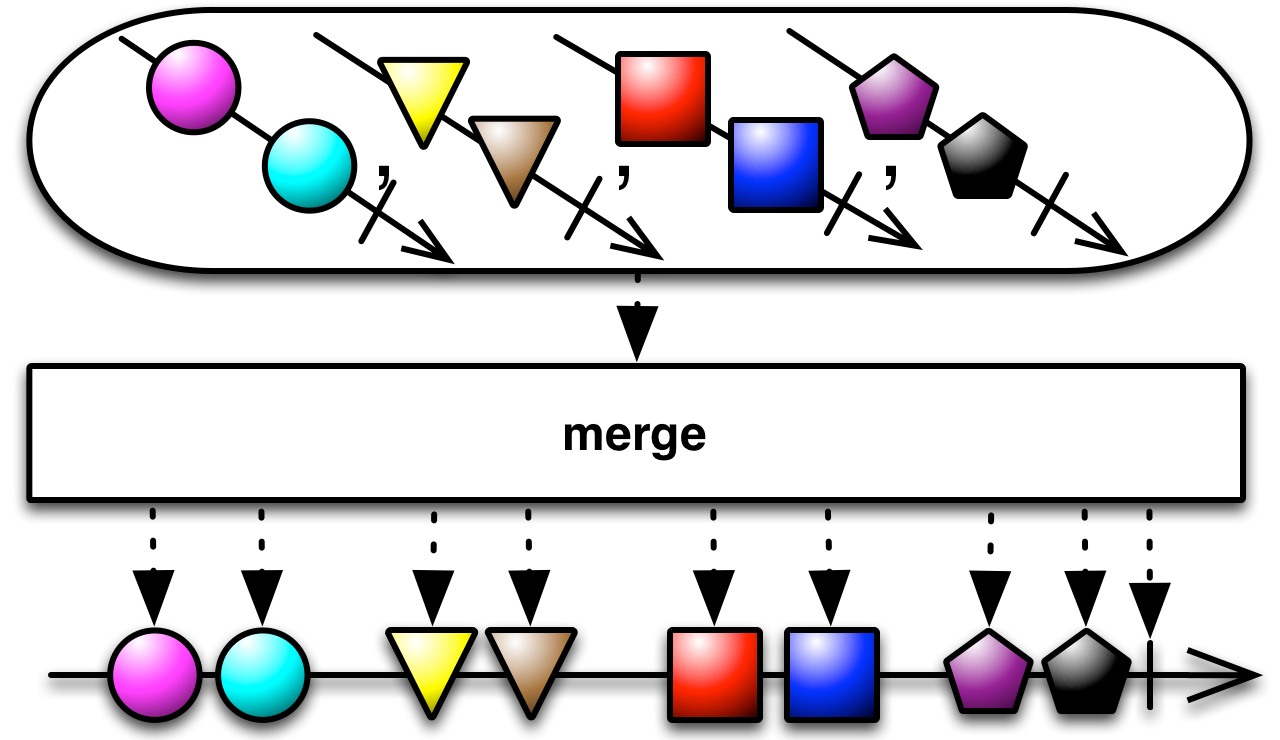
You can combine items emitted by multiple Publishers so that they appear as a single Publisher, by
using the merge method.
- Backpressure:
- The operator honors backpressure from downstream. The source
Publishers are expected to honor backpressure; if violated, the operator may signalMissingBackpressureException. - Scheduler:
mergeArraydoes not operate by default on a particularScheduler.
Parameters
| sources | the array of Publishers |
|---|
Returns
- a Flowable that emits all of the items emitted by the Publishers in the Array
public static Flowable<T> mergeArray (int maxConcurrency, int bufferSize, Publisher...<? extends T> sources)
Flattens an Iterable of Publishers into one Publisher, without any transformation, while limiting the number of concurrent subscriptions to these Publishers.

You can combine the items emitted by multiple Publishers so that they appear as a single Publisher, by
using the merge method.
- Backpressure:
- The operator honors backpressure from downstream. The source
Publishers are expected to honor backpressure; if violated, the operator may signalMissingBackpressureException. - Scheduler:
mergeArraydoes not operate by default on a particularScheduler.
Parameters
| maxConcurrency | the maximum number of Publishers that may be subscribed to concurrently |
|---|---|
| bufferSize | the number of items to prefetch from each inner Publisher |
| sources | the array of Publishers |
Returns
- a Flowable that emits items that are the result of flattening the items emitted by the Publishers in the Iterable
Throws
| IllegalArgumentException | if maxConcurrency is less than or equal to 0 |
|---|
public static Flowable<T> mergeArrayDelayError (int maxConcurrency, int bufferSize, Publisher...<? extends T> sources)
Flattens an array of Publishers into one Publisher, in a way that allows a Subscriber to receive all successfully emitted items from each of the source Publishers without being interrupted by an error notification from one of them, while limiting the number of concurrent subscriptions to these Publishers.
This behaves like merge(Publisher) except that if any of the merged Publishers notify of an
error via onError, mergeDelayError will refrain from propagating that
error notification until all of the merged Publishers have finished emitting items.
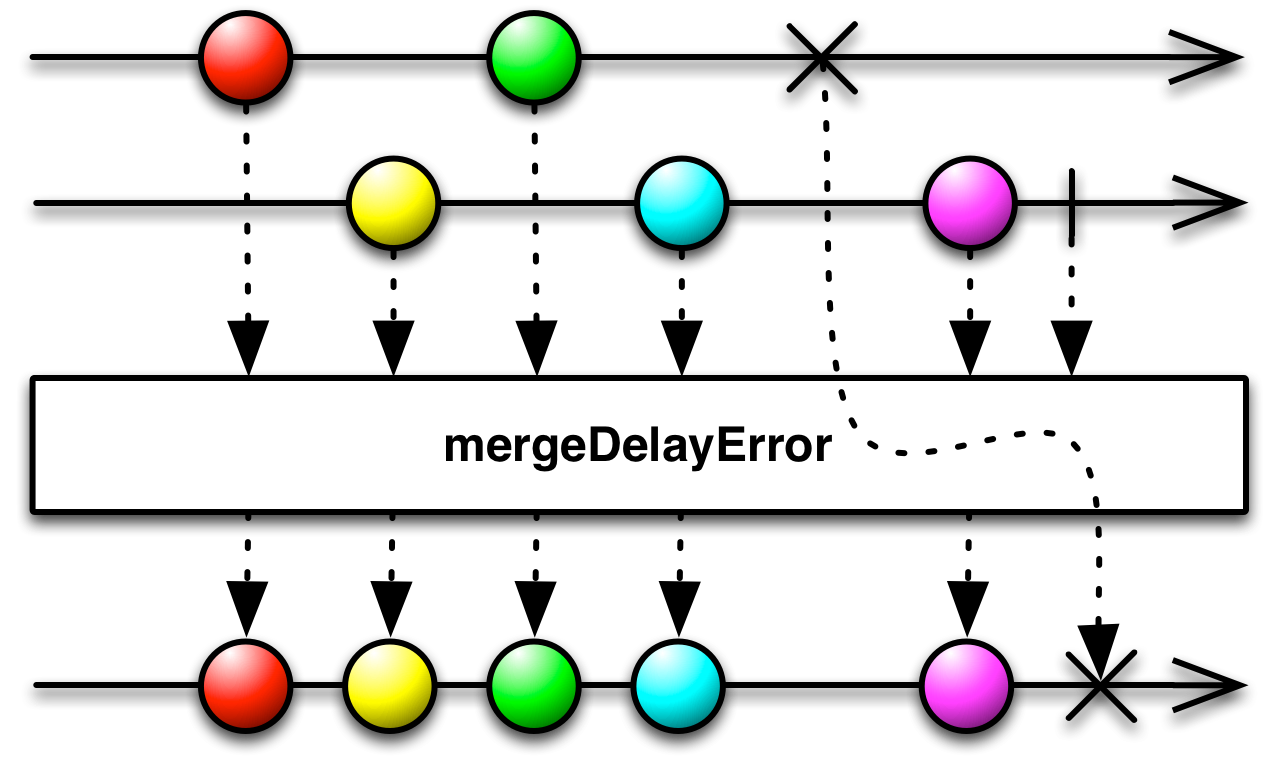
Even if multiple merged Publishers send onError notifications, mergeDelayError will only
invoke the onError method of its Subscribers once.
- Backpressure:
- The operator honors backpressure from downstream. All source
Publishers are expected to honor backpressure; if violated, the operator may signalMissingBackpressureException. - Scheduler:
mergeArrayDelayErrordoes not operate by default on a particularScheduler.
Parameters
| maxConcurrency | the maximum number of Publishers that may be subscribed to concurrently |
|---|---|
| bufferSize | the number of items to prefetch from each inner Publisher |
| sources | the array of Publishers |
Returns
- a Flowable that emits items that are the result of flattening the items emitted by the Publishers in the Iterable
public static Flowable<T> mergeArrayDelayError (Publisher...<? extends T> sources)
Flattens an array of Publishers into one Flowable, in a way that allows a Subscriber to receive all successfully emitted items from each of the source Publishers without being interrupted by an error notification from one of them.
This behaves like merge(Publisher) except that if any of the merged Publishers notify of an
error via onError, mergeDelayError will refrain from propagating that
error notification until all of the merged Publishers have finished emitting items.

Even if multiple merged Publishers send onError notifications, mergeDelayError will only
invoke the onError method of its Subscribers once.
- Backpressure:
- The operator honors backpressure from downstream. Both the outer and inner
Publishers are expected to honor backpressure; if violated, the operator may signalMissingBackpressureException. - Scheduler:
mergeArrayDelayErrordoes not operate by default on a particularScheduler.
Parameters
| sources | the Iterable of Publishers |
|---|
Returns
- a Flowable that emits items that are the result of flattening the items emitted by the Publishers in the Iterable
public static Flowable<T> mergeDelayError (Publisher<? extends T> source1, Publisher<? extends T> source2, Publisher<? extends T> source3)
Flattens three Publishers into one Publisher, in a way that allows a Subscriber to receive all successfully emitted items from all of the source Publishers without being interrupted by an error notification from one of them.
This behaves like merge(Publisher, Publisher, Publisher) except that if any of the merged
Publishers notify of an error via onError, mergeDelayError will refrain
from propagating that error notification until all of the merged Publishers have finished emitting
items.

Even if multiple merged Publishers send onError notifications, mergeDelayError will only
invoke the onError method of its Subscribers once.
- Backpressure:
- The operator honors backpressure from downstream. The source
Publishers are expected to honor backpressure; if violated, the operator may signalMissingBackpressureException. - Scheduler:
mergeDelayErrordoes not operate by default on a particularScheduler.
Parameters
| source1 | a Publisher to be merged |
|---|---|
| source2 | a Publisher to be merged |
| source3 | a Publisher to be merged |
Returns
- a Flowable that emits all of the items that are emitted by the source Publishers
public static Flowable<T> mergeDelayError (Publisher<? extends Publisher<? extends T>> sources, int maxConcurrency)
Flattens a Publisher that emits Publishers into one Publisher, in a way that allows a Subscriber to receive all successfully emitted items from all of the source Publishers without being interrupted by an error notification from one of them, while limiting the number of concurrent subscriptions to these Publishers.
This behaves like merge(Publisher) except that if any of the merged Publishers notify of an
error via onError, mergeDelayError will refrain from propagating that
error notification until all of the merged Publishers have finished emitting items.

Even if multiple merged Publishers send onError notifications, mergeDelayError will only
invoke the onError method of its Subscribers once.
- Backpressure:
- The operator honors backpressure from downstream. Both the outer and inner
Publishers are expected to honor backpressure; if violated, the operator may signalMissingBackpressureException. - Scheduler:
mergeDelayErrordoes not operate by default on a particularScheduler.
Parameters
| sources | a Publisher that emits Publishers |
|---|---|
| maxConcurrency | the maximum number of Publishers that may be subscribed to concurrently |
Returns
- a Flowable that emits all of the items emitted by the Publishers emitted by the
sourcePublisher
public static Flowable<T> mergeDelayError (Publisher<? extends Publisher<? extends T>> sources)
Flattens a Publisher that emits Publishers into one Publisher, in a way that allows a Subscriber to receive all successfully emitted items from all of the source Publishers without being interrupted by an error notification from one of them.
This behaves like merge(Publisher) except that if any of the merged Publishers notify of an
error via onError, mergeDelayError will refrain from propagating that
error notification until all of the merged Publishers have finished emitting items.

Even if multiple merged Publishers send onError notifications, mergeDelayError will only
invoke the onError method of its Subscribers once.
- Backpressure:
- The operator honors backpressure from downstream. The outer
Publisheris consumed in unbounded mode (i.e., no backpressure is applied to it). The innerPublishers are expected to honor backpressure; if violated, the operator may signalMissingBackpressureException. - Scheduler:
mergeDelayErrordoes not operate by default on a particularScheduler.
Parameters
| sources | a Publisher that emits Publishers |
|---|
Returns
- a Flowable that emits all of the items emitted by the Publishers emitted by the
sourcePublisher
public static Flowable<T> mergeDelayError (Iterable<? extends Publisher<? extends T>> sources, int maxConcurrency, int bufferSize)
Flattens an Iterable of Publishers into one Publisher, in a way that allows a Subscriber to receive all successfully emitted items from each of the source Publishers without being interrupted by an error notification from one of them, while limiting the number of concurrent subscriptions to these Publishers.
This behaves like merge(Publisher) except that if any of the merged Publishers notify of an
error via onError, mergeDelayError will refrain from propagating that
error notification until all of the merged Publishers have finished emitting items.

Even if multiple merged Publishers send onError notifications, mergeDelayError will only
invoke the onError method of its Subscribers once.
- Backpressure:
- The operator honors backpressure from downstream. All inner
Publishers are expected to honor backpressure; if violated, the operator may signalMissingBackpressureException. - Scheduler:
mergeDelayErrordoes not operate by default on a particularScheduler.
Parameters
| sources | the Iterable of Publishers |
|---|---|
| maxConcurrency | the maximum number of Publishers that may be subscribed to concurrently |
| bufferSize | the number of items to prefetch from each inner Publisher |
Returns
- a Flowable that emits items that are the result of flattening the items emitted by the Publishers in the Iterable
public static Flowable<T> mergeDelayError (Publisher<? extends T> source1, Publisher<? extends T> source2)
Flattens two Publishers into one Publisher, in a way that allows a Subscriber to receive all successfully emitted items from each of the source Publishers without being interrupted by an error notification from one of them.
This behaves like merge(Publisher, Publisher) except that if any of the merged Publishers
notify of an error via onError, mergeDelayError will refrain from
propagating that error notification until all of the merged Publishers have finished emitting items.

Even if both merged Publishers send onError notifications, mergeDelayError will only
invoke the onError method of its Subscribers once.
- Backpressure:
- The operator honors backpressure from downstream. The source
Publishers are expected to honor backpressure; if violated, the operator may signalMissingBackpressureException. - Scheduler:
mergeDelayErrordoes not operate by default on a particularScheduler.
Parameters
| source1 | a Publisher to be merged |
|---|---|
| source2 | a Publisher to be merged |
Returns
- a Flowable that emits all of the items that are emitted by the two source Publishers
public static Flowable<T> mergeDelayError (Iterable<? extends Publisher<? extends T>> sources, int maxConcurrency)
Flattens an Iterable of Publishers into one Publisher, in a way that allows a Subscriber to receive all successfully emitted items from each of the source Publishers without being interrupted by an error notification from one of them, while limiting the number of concurrent subscriptions to these Publishers.
This behaves like merge(Publisher) except that if any of the merged Publishers notify of an
error via onError, mergeDelayError will refrain from propagating that
error notification until all of the merged Publishers have finished emitting items.

Even if multiple merged Publishers send onError notifications, mergeDelayError will only
invoke the onError method of its Subscribers once.
- Backpressure:
- The operator honors backpressure from downstream. All inner
Publishers are expected to honor backpressure; if violated, the operator may signalMissingBackpressureException. - Scheduler:
mergeDelayErrordoes not operate by default on a particularScheduler.
Parameters
| sources | the Iterable of Publishers |
|---|---|
| maxConcurrency | the maximum number of Publishers that may be subscribed to concurrently |
Returns
- a Flowable that emits items that are the result of flattening the items emitted by the Publishers in the Iterable
public static Flowable<T> mergeDelayError (Iterable<? extends Publisher<? extends T>> sources)
Flattens an Iterable of Publishers into one Publisher, in a way that allows a Subscriber to receive all successfully emitted items from each of the source Publishers without being interrupted by an error notification from one of them.
This behaves like merge(Publisher) except that if any of the merged Publishers notify of an
error via onError, mergeDelayError will refrain from propagating that
error notification until all of the merged Publishers have finished emitting items.

Even if multiple merged Publishers send onError notifications, mergeDelayError will only
invoke the onError method of its Subscribers once.
- Backpressure:
- The operator honors backpressure from downstream. All inner
Publishers are expected to honor backpressure; if violated, the operator may signalMissingBackpressureException. - Scheduler:
mergeDelayErrordoes not operate by default on a particularScheduler.
Parameters
| sources | the Iterable of Publishers |
|---|
Returns
- a Flowable that emits items that are the result of flattening the items emitted by the Publishers in the Iterable
public static Flowable<T> mergeDelayError (Publisher<? extends T> source1, Publisher<? extends T> source2, Publisher<? extends T> source3, Publisher<? extends T> source4)
Flattens four Publishers into one Publisher, in a way that allows a Subscriber to receive all successfully emitted items from all of the source Publishers without being interrupted by an error notification from one of them.
This behaves like merge(Publisher, Publisher, Publisher, Publisher) except that if any of
the merged Publishers notify of an error via onError, mergeDelayError
will refrain from propagating that error notification until all of the merged Publishers have finished
emitting items.

Even if multiple merged Publishers send onError notifications, mergeDelayError will only
invoke the onError method of its Subscribers once.
- Backpressure:
- The operator honors backpressure from downstream. The source
Publishers are expected to honor backpressure; if violated, the operator may signalMissingBackpressureException. - Scheduler:
mergeDelayErrordoes not operate by default on a particularScheduler.
Parameters
| source1 | a Publisher to be merged |
|---|---|
| source2 | a Publisher to be merged |
| source3 | a Publisher to be merged |
| source4 | a Publisher to be merged |
Returns
- a Flowable that emits all of the items that are emitted by the source Publishers
public final Flowable<T> mergeWith (Publisher<? extends T> other)
Flattens this and another Publisher into a single Publisher, without any transformation.

You can combine items emitted by multiple Publishers so that they appear as a single Publisher, by
using the mergeWith method.
- Backpressure:
- The operator honors backpressure from downstream. This and the other
Publishers are expected to honor backpressure; if violated, the operator may signalMissingBackpressureException. - Scheduler:
mergeWithdoes not operate by default on a particularScheduler.
Parameters
| other | a Publisher to be merged |
|---|
Returns
- a Flowable that emits all of the items emitted by the source Publishers
public static Flowable<T> never ()
Returns a Flowable that never sends any items or notifications to a Subscriber.

This Publisher is useful primarily for testing purposes.
- Backpressure:
- This source doesn't produce any elements and effectively ignores downstream backpressure.
- Scheduler:
neverdoes not operate by default on a particularScheduler.
Returns
- a Flowable that never emits any items or sends any notifications to a Subscriber
public final Flowable<T> observeOn (Scheduler scheduler, boolean delayError)
Modifies a Publisher to perform its emissions and notifications on a specified Scheduler,
asynchronously with a bounded buffer and optionally delays onError notifications.
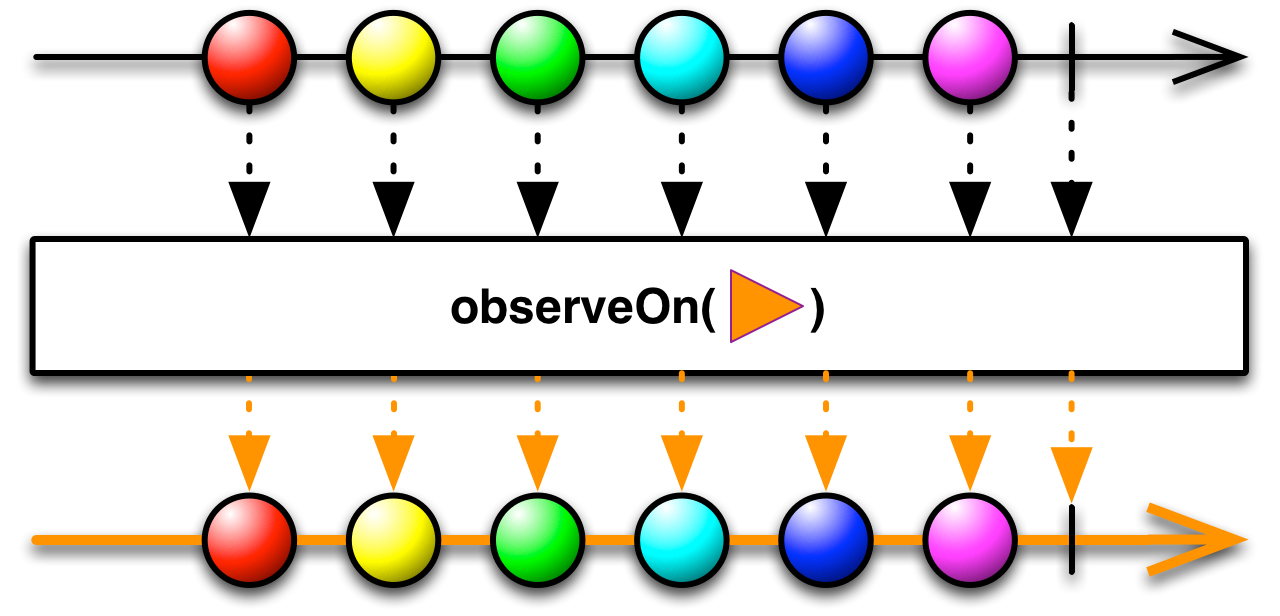
- Backpressure:
- This operator honors backpressure from downstream and expects it from the source
Publisher. Violating this expectation will lead toMissingBackpressureException. This is the most common operator where the exception pops up; look for sources up the chain that don't support backpressure, such asinterval,timer, {code PublishSubject} orBehaviorSubjectand apply any of theonBackpressureXXXoperators before applyingobserveOnitself. - Scheduler:
- You specify which
Schedulerthis operator will use
Parameters
| scheduler | the Scheduler to notify Subscribers on |
|---|---|
| delayError | indicates if the onError notification may not cut ahead of onNext notification on the other side of the scheduling boundary. If true a sequence ending in onError will be replayed in the same order as was received from upstream |
Returns
- the source Publisher modified so that its Subscribers are notified on the specified
Scheduler
public final Flowable<T> observeOn (Scheduler scheduler)
Modifies a Publisher to perform its emissions and notifications on a specified Scheduler,
asynchronously with a bounded buffer of bufferSize() slots.
Note that onError notifications will cut ahead of onNext notifications on the emission thread if Scheduler is truly
asynchronous. If strict event ordering is required, consider using the observeOn(Scheduler, boolean) overload.

- Backpressure:
- This operator honors backpressure from downstream and expects it from the source
Publisher. Violating this expectation will lead toMissingBackpressureException. This is the most common operator where the exception pops up; look for sources up the chain that don't support backpressure, such asinterval,timer, {code PublishSubject} orBehaviorSubjectand apply any of theonBackpressureXXXoperators before applyingobserveOnitself. - Scheduler:
- You specify which
Schedulerthis operator will use
Parameters
| scheduler | the Scheduler to notify Subscribers on |
|---|
Returns
- the source Publisher modified so that its Subscribers are notified on the specified
Scheduler
public final Flowable<T> observeOn (Scheduler scheduler, boolean delayError, int bufferSize)
Modifies a Publisher to perform its emissions and notifications on a specified Scheduler,
asynchronously with a bounded buffer of configurable size and optionally delays onError notifications.

- Backpressure:
- This operator honors backpressure from downstream and expects it from the source
Publisher. Violating this expectation will lead toMissingBackpressureException. This is the most common operator where the exception pops up; look for sources up the chain that don't support backpressure, such asinterval,timer, {code PublishSubject} orBehaviorSubjectand apply any of theonBackpressureXXXoperators before applyingobserveOnitself. - Scheduler:
- You specify which
Schedulerthis operator will use
Parameters
| scheduler | the Scheduler to notify Subscribers on |
|---|---|
| delayError | indicates if the onError notification may not cut ahead of onNext notification on the other side of the scheduling boundary. If true a sequence ending in onError will be replayed in the same order as was received from upstream |
| bufferSize | the size of the buffer. |
Returns
- the source Publisher modified so that its Subscribers are notified on the specified
Scheduler
public final Flowable<U> ofType (Class<U> clazz)
Filters the items emitted by a Publisher, only emitting those of the specified type.
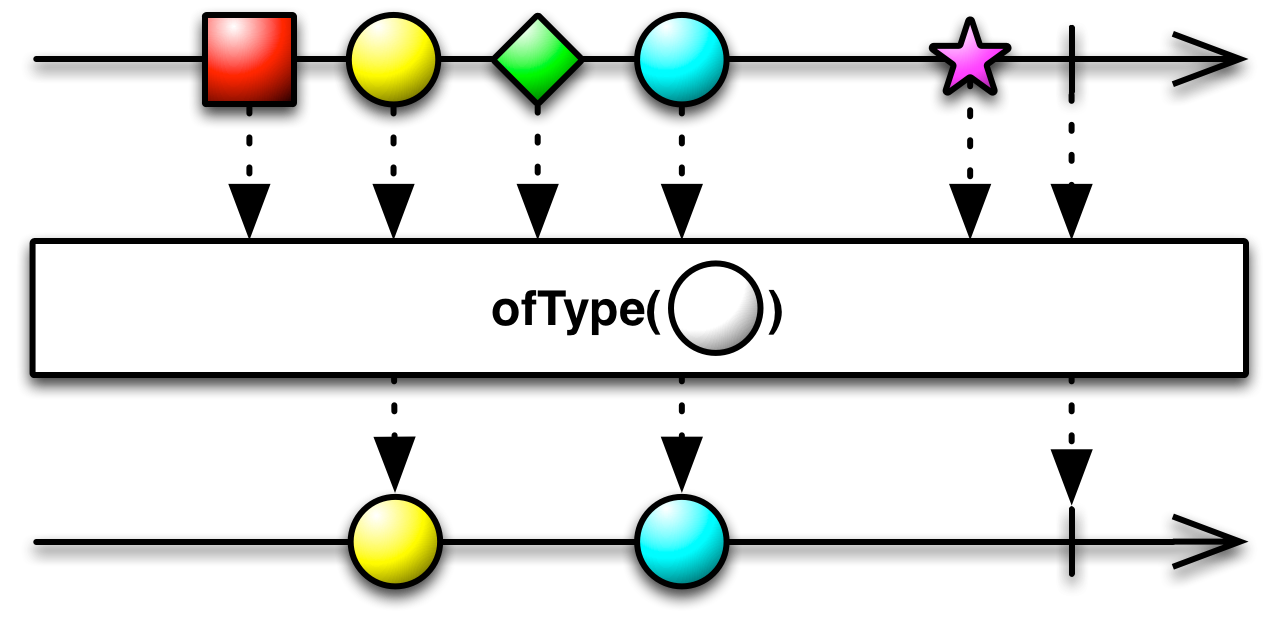
- Backpressure:
- The operator doesn't interfere with backpressure which is determined by the source
Publisher's backpressure behavior. - Scheduler:
ofTypedoes not operate by default on a particularScheduler.
Parameters
| clazz | the class type to filter the items emitted by the source Publisher |
|---|
Returns
- a Flowable that emits items from the source Publisher of type
clazz
public final Flowable<T> onBackpressureBuffer (int capacity, boolean delayError, boolean unbounded)
Instructs a Publisher that is emitting items faster than its Subscriber can consume them to buffer up to
a given amount of items until they can be emitted. The resulting Publisher will onError emitting
a BufferOverflowException as soon as the buffer's capacity is exceeded, dropping all undelivered
items, and cancelling the source.
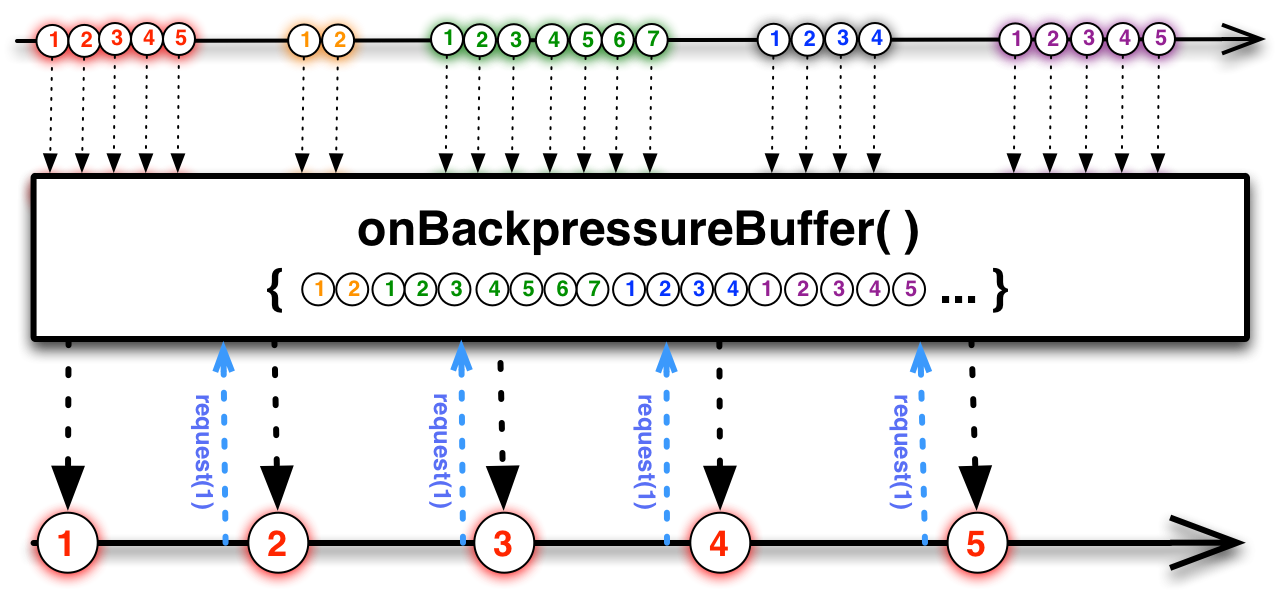
- Backpressure:
- The operator honors backpressure from downstream and consumes the source
Publisherin an unbounded manner (i.e., not applying backpressure to it). - Scheduler:
onBackpressureBufferdoes not operate by default on a particularScheduler.
Parameters
| capacity | number of slots available in the buffer. |
|---|---|
| delayError | if true, an exception from the current Flowable is delayed until all buffered elements have been consumed by the downstream; if false, an exception is immediately signalled to the downstream, skipping any buffered element |
| unbounded | if true, the capacity value is interpreted as the internal "island" size of the unbounded buffer |
Returns
- the source
Publishermodified to buffer items up to the given capacity.
public final Flowable<T> onBackpressureBuffer (int capacity)
Instructs a Publisher that is emitting items faster than its Subscriber can consume them to buffer up to
a given amount of items until they can be emitted. The resulting Publisher will onError emitting
a BufferOverflowException as soon as the buffer's capacity is exceeded, dropping all undelivered
items, and cancelling the source.

- Backpressure:
- The operator honors backpressure from downstream and consumes the source
Publisherin an unbounded manner (i.e., not applying backpressure to it). - Scheduler:
onBackpressureBufferdoes not operate by default on a particularScheduler.
Parameters
| capacity | number of slots available in the buffer. |
|---|
Returns
- the source
Publishermodified to buffer items up to the given capacity.
public final Flowable<T> onBackpressureBuffer (long capacity, Action onOverflow, BackpressureOverflowStrategy overflowStrategy)
Instructs a Publisher that is emitting items faster than its Subscriber can consume them to buffer up to
a given amount of items until they can be emitted. The resulting Publisher will behave as determined
by overflowStrategy if the buffer capacity is exceeded.
BackpressureOverflow.Strategy.ON_OVERFLOW_ERROR(default) willonErrordropping all undelivered items, cancelling the source, and notifying the producer withonOverflow.BackpressureOverflow.Strategy.ON_OVERFLOW_DROP_LATESTwill drop any new items emitted by the producer while the buffer is full, without generating anyonError. Each drop will however invokeonOverflowto signal the overflow to the producer. j
BackpressureOverflow.Strategy.ON_OVERFLOW_DROP_OLDESTwill drop the oldest items in the buffer in order to make room for newly emitted ones. Overflow will not generate anonError, but each drop will invokeonOverflowto signal the overflow to the producer.

- Backpressure:
- The operator honors backpressure from downstream and consumes the source
Publisherin an unbounded manner (i.e., not applying backpressure to it). - Scheduler:
onBackpressureBufferdoes not operate by default on a particularScheduler.
Parameters
| capacity | number of slots available in the buffer. |
|---|---|
| onOverflow | action to execute if an item needs to be buffered, but there are no available slots. Null is allowed. |
| overflowStrategy | how should the Publisher react to buffer overflows. Null is not allowed. |
Returns
- the source
Flowablemodified to buffer items up to the given capacity
public final Flowable<T> onBackpressureBuffer (boolean delayError)
Instructs a Publisher that is emitting items faster than its Subscriber can consume them to buffer these items indefinitely until they can be emitted.

- Backpressure:
- The operator honors backpressure from downstream and consumes the source
Publisherin an unbounded manner (i.e., not applying backpressure to it). - Scheduler:
onBackpressureBufferdoes not operate by default on a particularScheduler.
Parameters
| delayError | if true, an exception from the current Flowable is delayed until all buffered elements have been consumed by the downstream; if false, an exception is immediately signalled to the downstream, skipping any buffered element |
|---|
Returns
- the source Publisher modified to buffer items to the extent system resources allow
public final Flowable<T> onBackpressureBuffer (int capacity, boolean delayError, boolean unbounded, Action onOverflow)
Instructs a Publisher that is emitting items faster than its Subscriber can consume them to buffer up to
a given amount of items until they can be emitted. The resulting Publisher will onError emitting
a BufferOverflowException as soon as the buffer's capacity is exceeded, dropping all undelivered
items, cancelling the source, and notifying the producer with onOverflow.

- Backpressure:
- The operator honors backpressure from downstream and consumes the source
Publisherin an unbounded manner (i.e., not applying backpressure to it). - Scheduler:
onBackpressureBufferdoes not operate by default on a particularScheduler.
Parameters
| capacity | number of slots available in the buffer. |
|---|---|
| delayError | if true, an exception from the current Flowable is delayed until all buffered elements have been consumed by the downstream; if false, an exception is immediately signalled to the downstream, skipping any buffered element |
| unbounded | if true, the capacity value is interpreted as the internal "island" size of the unbounded buffer |
| onOverflow | action to execute if an item needs to be buffered, but there are no available slots. Null is allowed. |
Returns
- the source
Publishermodified to buffer items up to the given capacity
public final Flowable<T> onBackpressureBuffer (int capacity, Action onOverflow)
Instructs a Publisher that is emitting items faster than its Subscriber can consume them to buffer up to
a given amount of items until they can be emitted. The resulting Publisher will onError emitting
a BufferOverflowException as soon as the buffer's capacity is exceeded, dropping all undelivered
items, cancelling the source, and notifying the producer with onOverflow.

- Backpressure:
- The operator honors backpressure from downstream and consumes the source
Publisherin an unbounded manner (i.e., not applying backpressure to it). - Scheduler:
onBackpressureBufferdoes not operate by default on a particularScheduler.
Parameters
| capacity | number of slots available in the buffer. |
|---|---|
| onOverflow | action to execute if an item needs to be buffered, but there are no available slots. Null is allowed. |
Returns
- the source
Publishermodified to buffer items up to the given capacity
public final Flowable<T> onBackpressureBuffer (int capacity, boolean delayError)
Instructs a Publisher that is emitting items faster than its Subscriber can consume them to buffer up to
a given amount of items until they can be emitted. The resulting Publisher will onError emitting
a BufferOverflowException as soon as the buffer's capacity is exceeded, dropping all undelivered
items, and cancelling the source.

- Backpressure:
- The operator honors backpressure from downstream and consumes the source
Publisherin an unbounded manner (i.e., not applying backpressure to it). - Scheduler:
onBackpressureBufferdoes not operate by default on a particularScheduler.
Parameters
| capacity | number of slots available in the buffer. |
|---|---|
| delayError | if true, an exception from the current Flowable is delayed until all buffered elements have been consumed by the downstream; if false, an exception is immediately signalled to the downstream, skipping any buffered element |
Returns
- the source
Publishermodified to buffer items up to the given capacity.
public final Flowable<T> onBackpressureBuffer ()
Instructs a Publisher that is emitting items faster than its Subscriber can consume them to buffer these items indefinitely until they can be emitted.

- Backpressure:
- The operator honors backpressure from downstream and consumes the source
Publisherin an unbounded manner (i.e., not applying backpressure to it). - Scheduler:
onBackpressureBufferdoes not operate by default on a particularScheduler.
Returns
- the source Publisher modified to buffer items to the extent system resources allow
public final Flowable<T> onBackpressureDrop ()
Instructs a Publisher that is emitting items faster than its Subscriber can consume them to discard, rather than emit, those items that its Subscriber is not prepared to observe.
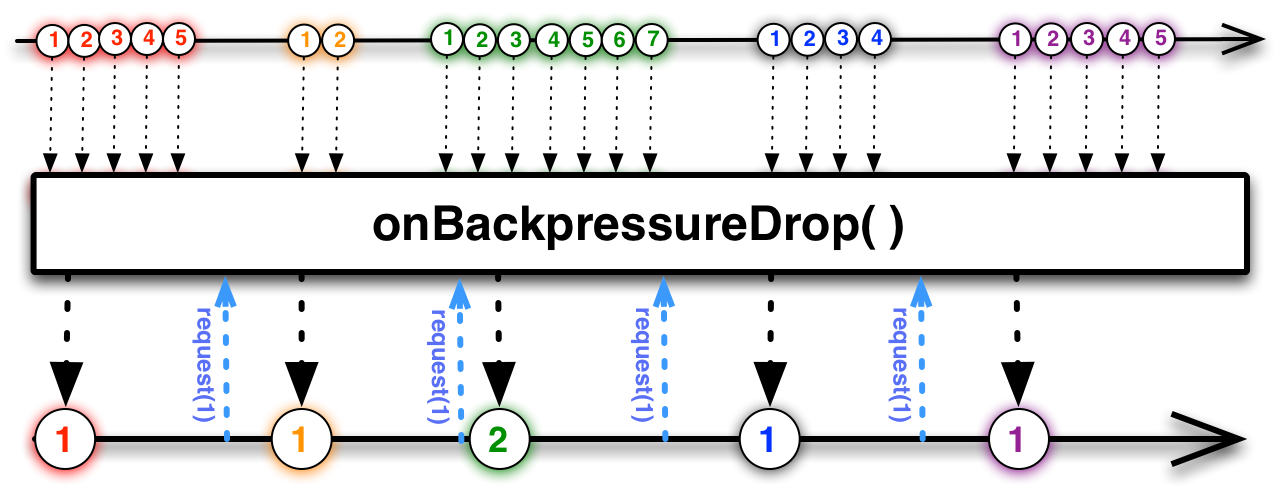
If the downstream request count hits 0 then the Publisher will refrain from calling onNext until
the Subscriber invokes request(n) again to increase the request count.
- Backpressure:
- The operator honors backpressure from downstream and consumes the source
Publisherin an unbounded manner (i.e., not applying backpressure to it). - Scheduler:
onBackpressureDropdoes not operate by default on a particularScheduler.
Returns
- the source Publisher modified to drop
onNextnotifications on overflow
public final Flowable<T> onBackpressureDrop (Consumer<? super T> onDrop)
Instructs a Publisher that is emitting items faster than its Subscriber can consume them to discard, rather than emit, those items that its Subscriber is not prepared to observe.

If the downstream request count hits 0 then the Publisher will refrain from calling onNext until
the Subscriber invokes request(n) again to increase the request count.
- Backpressure:
- The operator honors backpressure from downstream and consumes the source
Publisherin an unbounded manner (i.e., not applying backpressure to it). - Scheduler:
onBackpressureDropdoes not operate by default on a particularScheduler.
Parameters
| onDrop | the action to invoke for each item dropped. onDrop action should be fast and should never block. |
|---|
Returns
- the source Publisher modified to drop
onNextnotifications on overflow
public final Flowable<T> onBackpressureLatest ()
Instructs a Publisher that is emitting items faster than its Subscriber can consume them to hold onto the latest value and emit that on request.
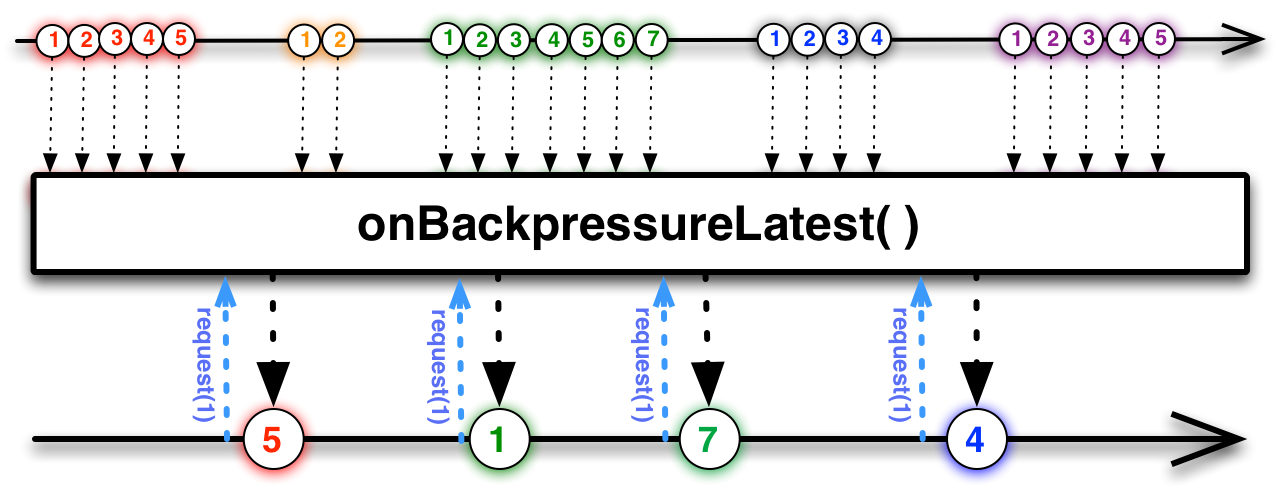
Its behavior is logically equivalent to blockingLatest() with the exception that
the downstream is not blocking while requesting more values.
Note that if the upstream Publisher does support backpressure, this operator ignores that capability and doesn't propagate any backpressure requests from downstream.
Note that due to the nature of how backpressure requests are propagated through subscribeOn/observeOn, requesting more than 1 from downstream doesn't guarantee a continuous delivery of onNext events.
- Backpressure:
- The operator honors backpressure from downstream and consumes the source
Publisherin an unbounded manner (i.e., not applying backpressure to it). - Scheduler:
onBackpressureLatestdoes not operate by default on a particularScheduler.
Returns
- the source Publisher modified so that it emits the most recently-received item upon request
public final Flowable<T> onErrorResumeNext (Publisher<? extends T> next)
Instructs a Publisher to pass control to another Publisher rather than invoking
onError if it encounters an error.
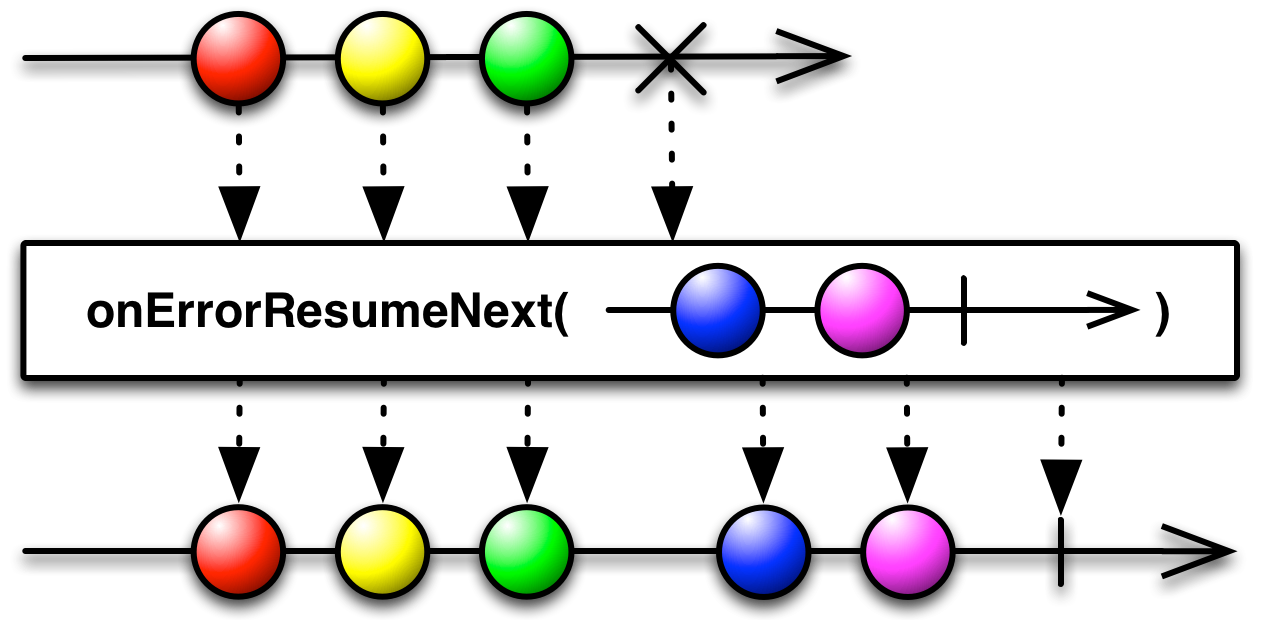
By default, when a Publisher encounters an error that prevents it from emitting the expected item to
its Subscriber, the Publisher invokes its Subscriber's onError method, and then quits
without invoking any more of its Subscriber's methods. The onErrorResumeNext method changes this
behavior. If you pass another Publisher (resumeSequence) to a Publisher's
onErrorResumeNext method, if the original Publisher encounters an error, instead of invoking its
Subscriber's onError method, it will instead relinquish control to resumeSequence which
will invoke the Subscriber's onNext method if it is able to do so. In such a case,
because no Publisher necessarily invokes onError, the Subscriber may never know that an error
happened.
You can use this to prevent errors from propagating or to supply fallback data should errors be encountered.
- Backpressure:
- The operator honors backpressure from downstream. This and the resuming
Publishers are expected to honor backpressure as well. If any of them violate this expectation, the operator may throw anIllegalStateExceptionwhen the sourcePublishercompletes orMissingBackpressureExceptionis signalled somewhere downstream. - Scheduler:
onErrorResumeNextdoes not operate by default on a particularScheduler.
Parameters
| next | the next Publisher source that will take over if the source Publisher encounters an error |
|---|
Returns
- the original Publisher, with appropriately modified behavior
public final Flowable<T> onErrorResumeNext (Function<? super Throwable, ? extends Publisher<? extends T>> resumeFunction)
Instructs a Publisher to pass control to another Publisher rather than invoking
onError if it encounters an error.

By default, when a Publisher encounters an error that prevents it from emitting the expected item to
its Subscriber, the Publisher invokes its Subscriber's onError method, and then quits
without invoking any more of its Subscriber's methods. The onErrorResumeNext method changes this
behavior. If you pass a function that returns a Publisher (resumeFunction) to
onErrorResumeNext, if the original Publisher encounters an error, instead of invoking its
Subscriber's onError method, it will instead relinquish control to the Publisher returned from
resumeFunction, which will invoke the Subscriber's onNext method if it is
able to do so. In such a case, because no Publisher necessarily invokes onError, the Subscriber
may never know that an error happened.
You can use this to prevent errors from propagating or to supply fallback data should errors be encountered.
- Backpressure:
- The operator honors backpressure from downstream. This and the resuming
Publishers are expected to honor backpressure as well. If any of them violate this expectation, the operator may throw anIllegalStateExceptionwhen the sourcePublishercompletes or aMissingBackpressureExceptionis signalled somewhere downstream. - Scheduler:
onErrorResumeNextdoes not operate by default on a particularScheduler.
Parameters
| resumeFunction | a function that returns a Publisher that will take over if the source Publisher encounters an error |
|---|
Returns
- the original Publisher, with appropriately modified behavior
public final Flowable<T> onErrorReturn (Function<? super Throwable, ? extends T> valueSupplier)
Instructs a Publisher to emit an item (returned by a specified function) rather than invoking
onError if it encounters an error.
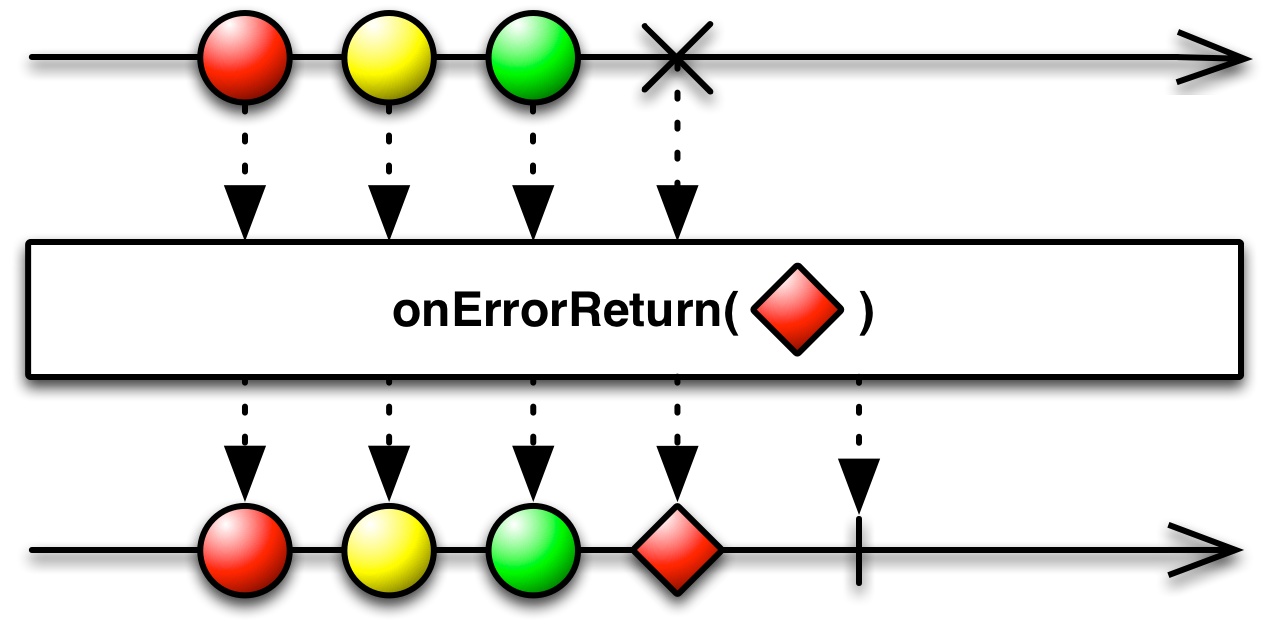
By default, when a Publisher encounters an error that prevents it from emitting the expected item to
its Subscriber, the Publisher invokes its Subscriber's onError method, and then quits
without invoking any more of its Subscriber's methods. The onErrorReturn method changes this
behavior. If you pass a function (resumeFunction) to a Publisher's onErrorReturn
method, if the original Publisher encounters an error, instead of invoking its Subscriber's
onError method, it will instead emit the return value of resumeFunction.
You can use this to prevent errors from propagating or to supply fallback data should errors be encountered.
- Backpressure:
- The operator honors backpressure from downstream. The source
Publishers is expected to honor backpressure as well. If it this expectation is violated, the operator may throwIllegalStateExceptionwhen the sourcePublishercompletes orMissingBackpressureExceptionis signalled somewhere downstream. - Scheduler:
onErrorReturndoes not operate by default on a particularScheduler.
Parameters
| valueSupplier | a function that returns a single value that will be emitted along with a regular onComplete in case the current Flowable signals an onError event |
|---|
Returns
- the original Publisher with appropriately modified behavior
public final Flowable<T> onErrorReturnItem (T item)
Instructs a Publisher to emit an item (returned by a specified function) rather than invoking
onError if it encounters an error.

By default, when a Publisher encounters an error that prevents it from emitting the expected item to
its Subscriber, the Publisher invokes its Subscriber's onError method, and then quits
without invoking any more of its Subscriber's methods. The onErrorReturn method changes this
behavior. If you pass a function (resumeFunction) to a Publisher's onErrorReturn
method, if the original Publisher encounters an error, instead of invoking its Subscriber's
onError method, it will instead emit the return value of resumeFunction.
You can use this to prevent errors from propagating or to supply fallback data should errors be encountered.
- Backpressure:
- The operator honors backpressure from downstream. The source
Publishers is expected to honor backpressure as well. If it this expectation is violated, the operator may throwIllegalStateExceptionwhen the sourcePublishercompletes orMissingBackpressureExceptionis signalled somewhere downstream. - Scheduler:
onErrorReturnItemdoes not operate by default on a particularScheduler.
Parameters
| item | the value that is emitted along with a regular onComplete in case the current Flowable signals an exception |
|---|
Returns
- the original Publisher with appropriately modified behavior
public final Flowable<T> onExceptionResumeNext (Publisher<? extends T> next)
Instructs a Publisher to pass control to another Publisher rather than invoking
onError if it encounters an Exception.
This differs from onErrorResumeNext(Function>) in that this one does not handle Throwable
or java.lang.Error but lets those continue through.
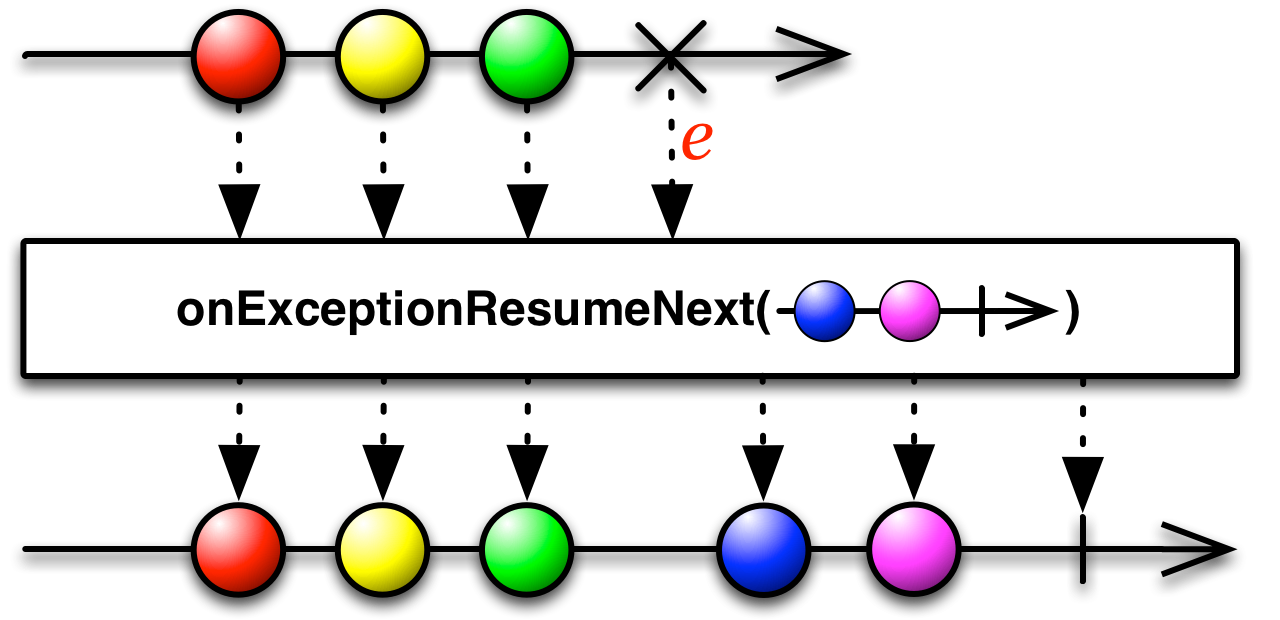
By default, when a Publisher encounters an exception that prevents it from emitting the expected item
to its Subscriber, the Publisher invokes its Subscriber's onError method, and then quits
without invoking any more of its Subscriber's methods. The onExceptionResumeNext method changes
this behavior. If you pass another Publisher (resumeSequence) to a Publisher's
onExceptionResumeNext method, if the original Publisher encounters an exception, instead of
invoking its Subscriber's onError method, it will instead relinquish control to
resumeSequence which will invoke the Subscriber's onNext method if it is
able to do so. In such a case, because no Publisher necessarily invokes onError, the Subscriber
may never know that an exception happened.
You can use this to prevent exceptions from propagating or to supply fallback data should exceptions be encountered.
- Backpressure:
- The operator honors backpressure from downstream. This and the resuming
Publishers are expected to honor backpressure as well. If any of them violate this expectation, the operator may throw anIllegalStateExceptionwhen the sourcePublishercompletes orMissingBackpressureExceptionis signalled somewhere downstream. - Scheduler:
onExceptionResumeNextdoes not operate by default on a particularScheduler.
Parameters
| next | the next Publisher that will take over if the source Publisher encounters an exception |
|---|
Returns
- the original Publisher, with appropriately modified behavior
public final Flowable<T> onTerminateDetach ()
Nulls out references to the upstream producer and downstream Subscriber if the sequence is terminated or downstream cancels.
- Backpressure:
- The operator doesn't interfere with backpressure which is determined by the source
Publisher's backpressure behavior. - Scheduler:
onTerminateDetachdoes not operate by default on a particularScheduler.
Returns
- a Flowable which out references to the upstream producer and downstream Subscriber if the sequence is terminated or downstream cancels
public final ParallelFlowable<T> parallel ()
Parallelizes the flow by creating multiple 'rails' (equal to the number of CPUs) and dispatches the upstream items to them in a round-robin fashion.
Note that the rails don't execute in parallel on their own and one needs to
apply runOn(Scheduler) to specify the Scheduler where
each rail will execute.
To merge the parallel 'rails' back into a single sequence, use sequential().
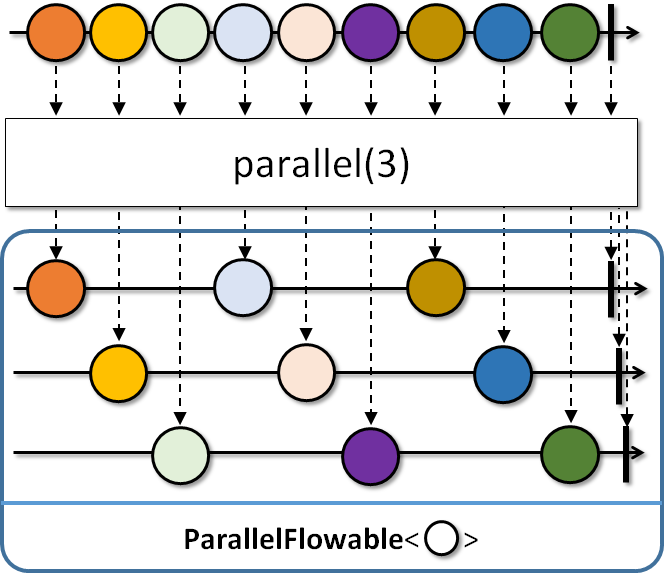
- Backpressure:
- The operator requires the upstream to honor backpressure and each 'rail' honors backpressure as well.
- Scheduler:
paralleldoes not operate by default on a particularScheduler.
History: 2.0.5 - experimental
Returns
- the new ParallelFlowable instance
public final ParallelFlowable<T> parallel (int parallelism, int prefetch)
Parallelizes the flow by creating the specified number of 'rails' and dispatches the upstream items to them in a round-robin fashion and uses the defined per-'rail' prefetch amount.
Note that the rails don't execute in parallel on their own and one needs to
apply runOn(Scheduler) to specify the Scheduler where
each rail will execute.
To merge the parallel 'rails' back into a single sequence, use sequential().

- Backpressure:
- The operator requires the upstream to honor backpressure and each 'rail' honors backpressure as well.
- Scheduler:
paralleldoes not operate by default on a particularScheduler.
History: 2.0.5 - experimental
Parameters
| parallelism | the number of 'rails' to use |
|---|---|
| prefetch | the number of items each 'rail' should prefetch |
Returns
- the new ParallelFlowable instance
public final ParallelFlowable<T> parallel (int parallelism)
Parallelizes the flow by creating the specified number of 'rails' and dispatches the upstream items to them in a round-robin fashion.
Note that the rails don't execute in parallel on their own and one needs to
apply runOn(Scheduler) to specify the Scheduler where
each rail will execute.
To merge the parallel 'rails' back into a single sequence, use sequential().

- Backpressure:
- The operator requires the upstream to honor backpressure and each 'rail' honors backpressure as well.
- Scheduler:
paralleldoes not operate by default on a particularScheduler.
History: 2.0.5 - experimental
Parameters
| parallelism | the number of 'rails' to use |
|---|
Returns
- the new ParallelFlowable instance
public final ConnectableFlowable<T> publish ()
Returns a ConnectableFlowable, which is a variety of Publisher that waits until its
connect method is called before it begins emitting items to those
Subscribers that have subscribed to it.
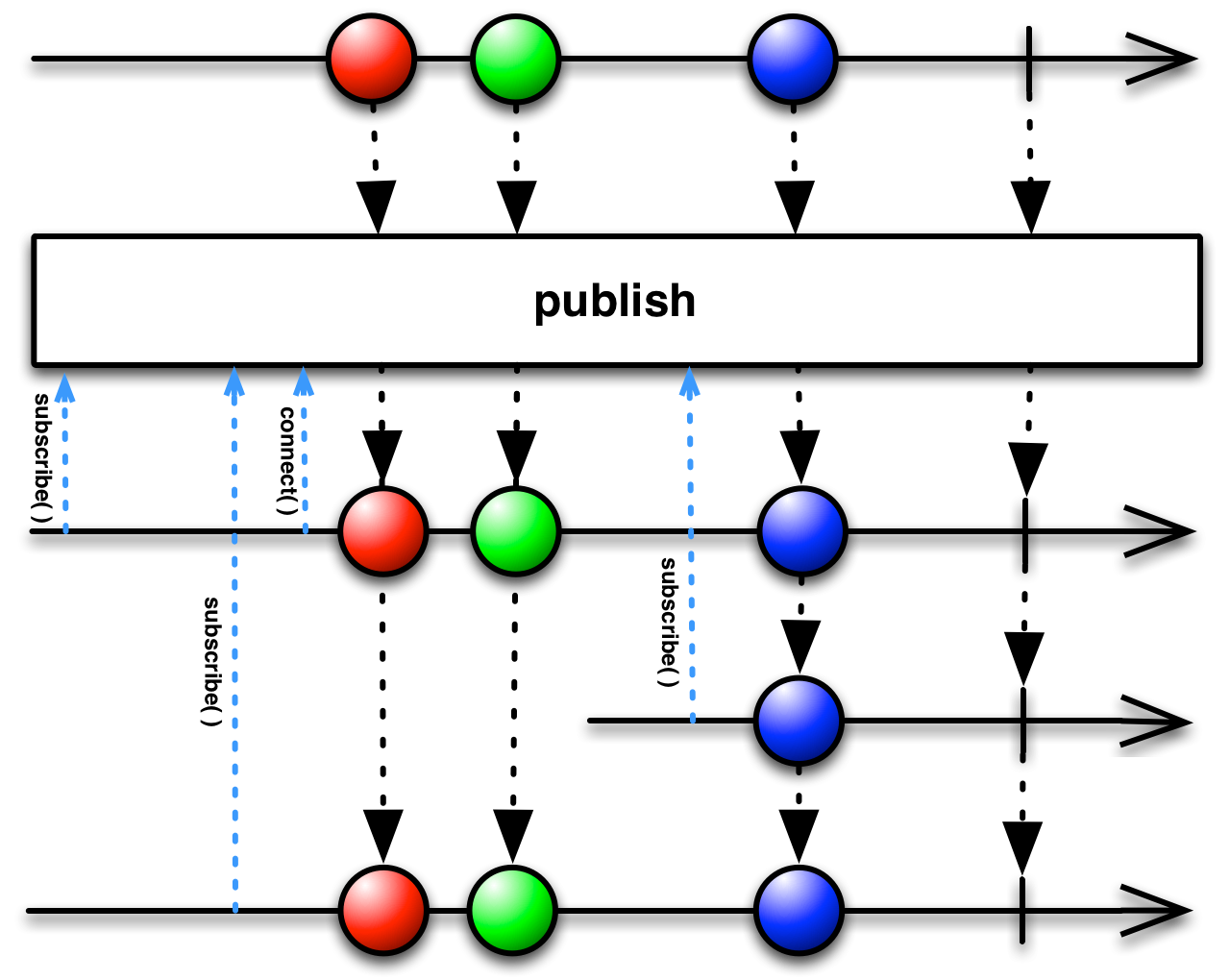
- Backpressure:
- The returned
ConnectableFlowablehonors backpressure for each of itsSubscribers and expects the sourcePublisherto honor backpressure as well. If this expectation is violated, the operator will signal aMissingBackpressureExceptionto itsSubscribers and disconnect. - Scheduler:
publishdoes not operate by default on a particularScheduler.
Returns
- a
ConnectableFlowablethat upon connection causes the source Publisher to emit items to its Subscribers
public final Flowable<R> publish (Function<? super Flowable<T>, ? extends Publisher<? extends R>> selector, int prefetch)
Returns a Flowable that emits the results of invoking a specified selector on items emitted by a
ConnectableFlowable that shares a single subscription to the underlying sequence.
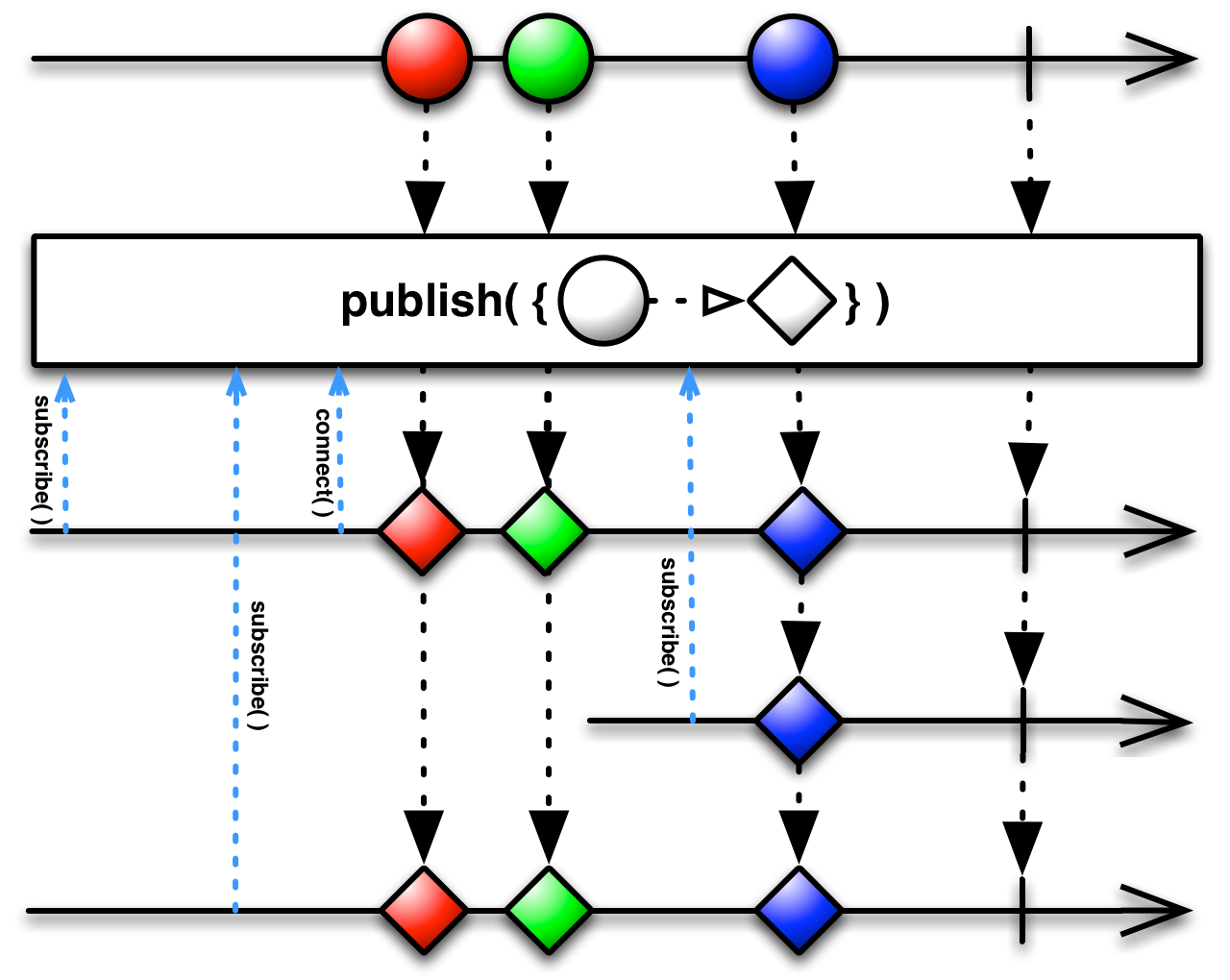
- Backpressure:
- The operator expects the source
Publisherto honor backpressure and if this expectation is violated, the operator will signal aMissingBackpressureExceptionthrough thePublisherprovided to the function. Since thePublisherreturned by theselectormay be independent from the providedPublisherto the function, the output's backpressure behavior is determined by this returnedPublisher. - Scheduler:
publishdoes not operate by default on a particularScheduler.
Parameters
| selector | a function that can use the multicasted source sequence as many times as needed, without causing multiple subscriptions to the source sequence. Subscribers to the given source will receive all notifications of the source from the time of the subscription forward. |
|---|---|
| prefetch | the number of elements to prefetch from the current Flowable |
Returns
- a Flowable that emits the results of invoking the selector on the items emitted by a
ConnectableFlowablethat shares a single subscription to the underlying sequence
public final ConnectableFlowable<T> publish (int bufferSize)
Returns a ConnectableFlowable, which is a variety of Publisher that waits until its
connect method is called before it begins emitting items to those
Subscribers that have subscribed to it.

- Backpressure:
- The returned
ConnectableFlowablehonors backpressure for each of itsSubscribers and expects the sourcePublisherto honor backpressure as well. If this expectation is violated, the operator will signal aMissingBackpressureExceptionto itsSubscribers and disconnect. - Scheduler:
publishdoes not operate by default on a particularScheduler.
Parameters
| bufferSize | the number of elements to prefetch from the current Flowable |
|---|
Returns
- a
ConnectableFlowablethat upon connection causes the source Publisher to emit items to its Subscribers
public final Flowable<R> publish (Function<? super Flowable<T>, ? extends Publisher<R>> selector)
Returns a Flowable that emits the results of invoking a specified selector on items emitted by a
ConnectableFlowable that shares a single subscription to the underlying sequence.

- Backpressure:
- The operator expects the source
Publisherto honor backpressure and if this expectation is violated, the operator will signal aMissingBackpressureExceptionthrough thePublisherprovided to the function. Since thePublisherreturned by theselectormay be independent from the providedPublisherto the function, the output's backpressure behavior is determined by this returnedPublisher. - Scheduler:
publishdoes not operate by default on a particularScheduler.
Parameters
| selector | a function that can use the multicasted source sequence as many times as needed, without causing multiple subscriptions to the source sequence. Subscribers to the given source will receive all notifications of the source from the time of the subscription forward. |
|---|
Returns
- a Flowable that emits the results of invoking the selector on the items emitted by a
ConnectableFlowablethat shares a single subscription to the underlying sequence
public static Flowable<Integer> range (int start, int count)
Returns a Flowable that emits a sequence of Integers within a specified range.

- Backpressure:
- The operator honors backpressure from downstream and signals values on-demand (i.e., when requested).
- Scheduler:
rangedoes not operate by default on a particularScheduler.
Parameters
| start | the value of the first Integer in the sequence |
|---|---|
| count | the number of sequential Integers to generate |
Returns
- a Flowable that emits a range of sequential Integers
Throws
| IllegalArgumentException | if count is less than zero, or if start + count − 1 exceeds
Integer.MAX_VALUE |
|---|
public static Flowable<Long> rangeLong (long start, long count)
Returns a Flowable that emits a sequence of Longs within a specified range.

- Backpressure:
- The operator honors backpressure from downstream and signals values on-demand (i.e., when requested).
- Scheduler:
rangeLongdoes not operate by default on a particularScheduler.
Parameters
| start | the value of the first Long in the sequence |
|---|---|
| count | the number of sequential Longs to generate |
Returns
- a Flowable that emits a range of sequential Longs
Throws
| IllegalArgumentException | if count is less than zero, or if start + count − 1 exceeds
Long.MAX_VALUE |
|---|
public final Flowable<T> rebatchRequests (int n)
Requests n initially from the upstream and then 75% of n subsequently
after 75% of n values have been emitted to the downstream.
This operator allows preventing the downstream to trigger unbounded mode via request(Long.MAX_VALUE)
or compensate for the per-item overhead of small and frequent requests.
- Backpressure:
- The operator expects backpressure from upstream and honors backpressure from downstream.
- Scheduler:
rebatchRequestsdoes not operate by default on a particularScheduler.
Parameters
| n | the initial request amount, further request will happen after 75% of this value |
|---|
Returns
- the Publisher that rebatches request amounts from downstream
public final Maybe<T> reduce (BiFunction<T, T, T> reducer)
Returns a Maybe that applies a specified accumulator function to the first item emitted by a source Publisher, then feeds the result of that function along with the second item emitted by the source Publisher into the same function, and so on until all items have been emitted by the source Publisher, and emits the final result from the final call to your function as its sole item.
If the source is empty, a NoSuchElementException is signalled.
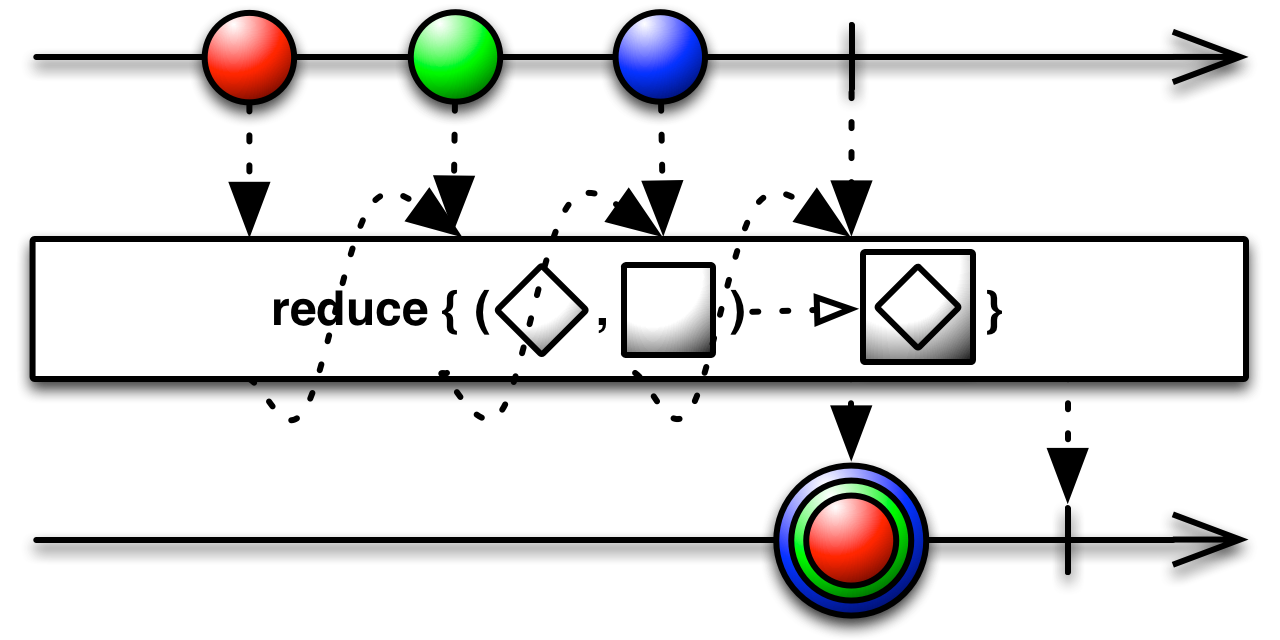
This technique, which is called "reduce" here, is sometimes called "aggregate," "fold," "accumulate,"
"compress," or "inject" in other programming contexts. Groovy, for instance, has an inject method
that does a similar operation on lists.
- Backpressure:
- The operator honors backpressure of its downstream consumer and consumes the upstream source in unbounded mode.
- Scheduler:
reducedoes not operate by default on a particularScheduler.
Parameters
| reducer | an accumulator function to be invoked on each item emitted by the source Publisher, whose result will be used in the next accumulator call |
|---|
Returns
- a Maybe that emits a single item that is the result of accumulating the items emitted by the source Flowable
public final Single<R> reduce (R seed, BiFunction<R, ? super T, R> reducer)
Returns a Single that applies a specified accumulator function to the first item emitted by a source Publisher and a specified seed value, then feeds the result of that function along with the second item emitted by a Publisher into the same function, and so on until all items have been emitted by the source Publisher, emitting the final result from the final call to your function as its sole item.
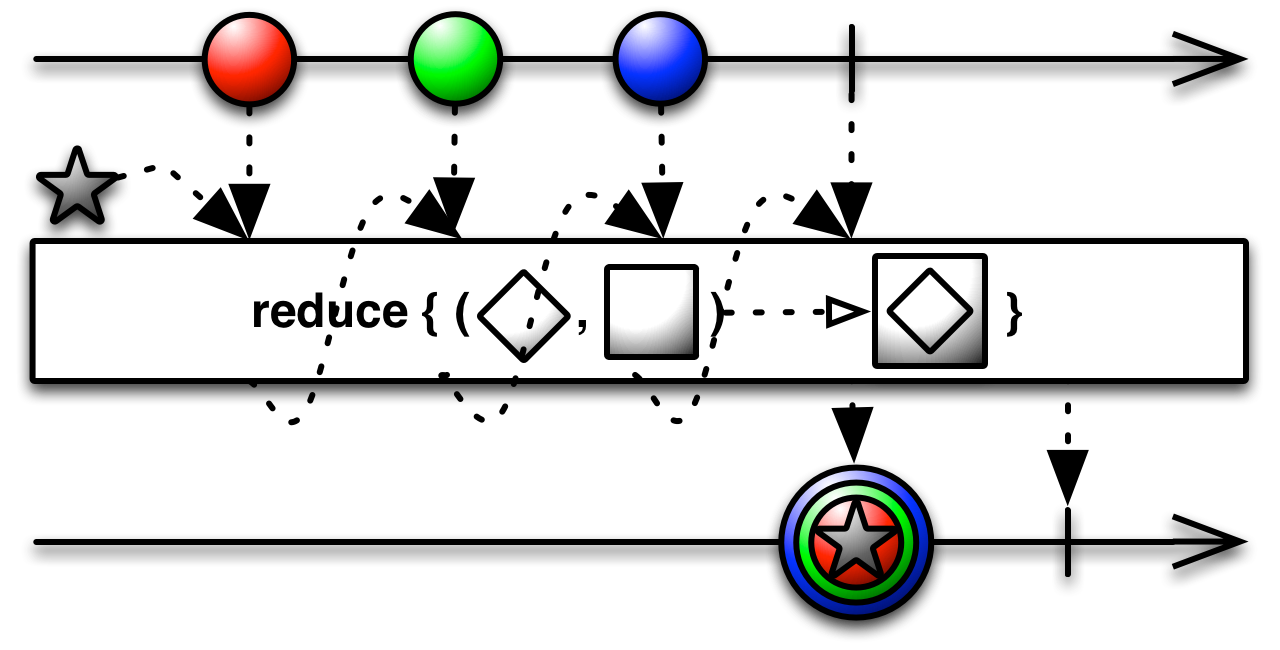
This technique, which is called "reduce" here, is sometimes called "aggregate," "fold," "accumulate,"
"compress," or "inject" in other programming contexts. Groovy, for instance, has an inject method
that does a similar operation on lists.
Note that the seed is shared among all subscribers to the resulting Publisher
and may cause problems if it is mutable. To make sure each subscriber gets its own value, defer
the application of this operator via defer(Callable):
Publisher<T> source = ...
Single.defer(() -> source.reduce(new ArrayList<>(), (list, item) -> list.add(item)));
// alternatively, by using compose to stay fluent
source.compose(o ->
Flowable.defer(() -> o.reduce(new ArrayList<>(), (list, item) -> list.add(item)).toFlowable())
).firstOrError();
// or, by using reduceWith instead of reduce
source.reduceWith(() -> new ArrayList<>(), (list, item) -> list.add(item)));
- Backpressure:
- The operator honors backpressure of its downstream consumer and consumes the upstream source in unbounded mode.
- Scheduler:
reducedoes not operate by default on a particularScheduler.
Parameters
| seed | the initial (seed) accumulator value |
|---|---|
| reducer | an accumulator function to be invoked on each item emitted by the source Publisher, the result of which will be used in the next accumulator call |
Returns
- a Single that emits a single item that is the result of accumulating the output from the items emitted by the source Publisher
public final Single<R> reduceWith (Callable<R> seedSupplier, BiFunction<R, ? super T, R> reducer)
Returns a Single that applies a specified accumulator function to the first item emitted by a source Publisher and a seed value derived from calling a specified seedSupplier, then feeds the result of that function along with the second item emitted by a Publisher into the same function, and so on until all items have been emitted by the source Publisher, emitting the final result from the final call to your function as its sole item.

This technique, which is called "reduce" here, is sometimes called "aggregate," "fold," "accumulate,"
"compress," or "inject" in other programming contexts. Groovy, for instance, has an inject method
that does a similar operation on lists.
- Backpressure:
- The operator honors backpressure of its downstream consumer and consumes the upstream source in unbounded mode.
- Scheduler:
reduceWithdoes not operate by default on a particularScheduler.
Parameters
| seedSupplier | the Callable that provides the initial (seed) accumulator value for each individual Subscriber |
|---|---|
| reducer | an accumulator function to be invoked on each item emitted by the source Publisher, the result of which will be used in the next accumulator call |
Returns
- a Single that emits a single item that is the result of accumulating the output from the items emitted by the source Publisher
public final Flowable<T> repeat ()
Returns a Flowable that repeats the sequence of items emitted by the source Publisher indefinitely.
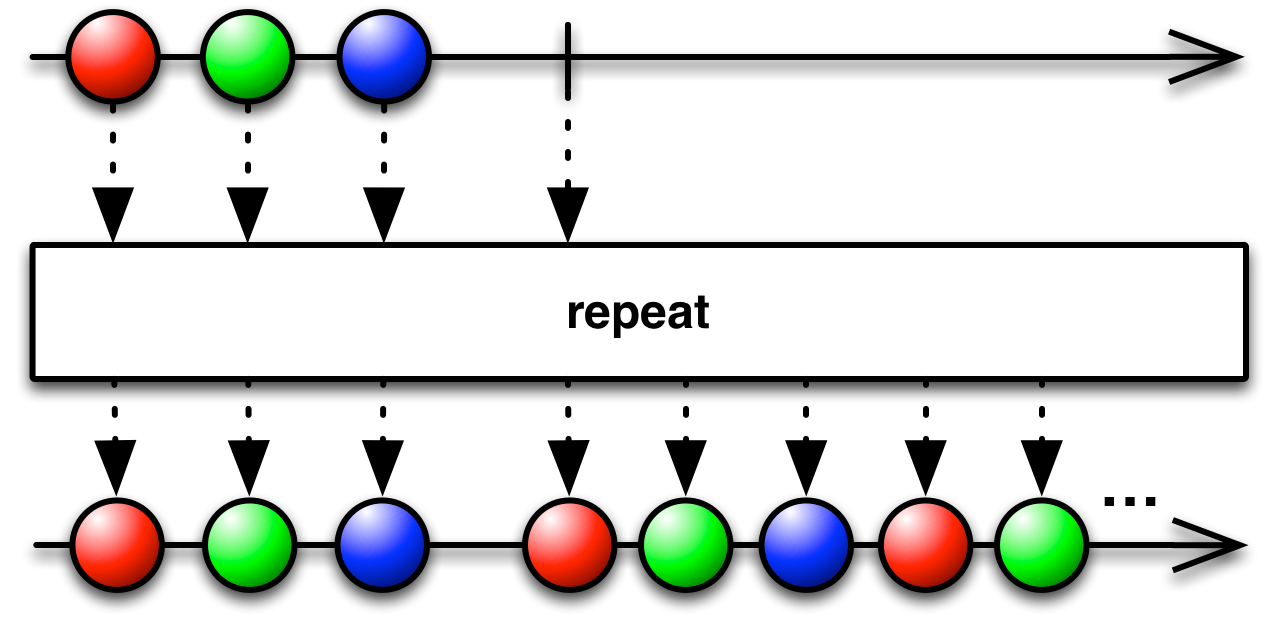
- Backpressure:
- The operator honors downstream backpressure and expects the source
Publisherto honor backpressure as well. If this expectation is violated, the operator may throw anIllegalStateException. - Scheduler:
repeatdoes not operate by default on a particularScheduler.
Returns
- a Flowable that emits the items emitted by the source Publisher repeatedly and in sequence
public final Flowable<T> repeat (long times)
Returns a Flowable that repeats the sequence of items emitted by the source Publisher at most
count times.

- Backpressure:
- The operator honors downstream backpressure and expects the source
Publisherto honor backpressure as well. If this expectation is violated, the operator may throw anIllegalStateException. - Scheduler:
repeatdoes not operate by default on a particularScheduler.
Parameters
| times | the number of times the source Publisher items are repeated, a count of 0 will yield an empty sequence |
|---|
Returns
- a Flowable that repeats the sequence of items emitted by the source Publisher at most
counttimes
Throws
| IllegalArgumentException | if count is less than zero |
|---|
public final Flowable<T> repeatUntil (BooleanSupplier stop)
Returns a Flowable that repeats the sequence of items emitted by the source Publisher until the provided stop function returns true.

- Backpressure:
- The operator honors downstream backpressure and expects the source
Publisherto honor backpressure as well. If this expectation is violated, the operator may throw anIllegalStateException. - Scheduler:
repeatUntildoes not operate by default on a particularScheduler.
Parameters
| stop | a boolean supplier that is called when the current Flowable completes and unless it returns false, the current Flowable is resubscribed |
|---|
Returns
- the new Flowable instance
Throws
| NullPointerException | if stop is null |
|---|
public final Flowable<T> repeatWhen (Function<? super Flowable<Object>, ? extends Publisher<?>> handler)
Returns a Flowable that emits the same values as the source Publisher with the exception of an
onComplete. An onComplete notification from the source will result in the emission of
a void item to the Publisher provided as an argument to the notificationHandler
function. If that Publisher calls onComplete or onError then repeatWhen will
call onComplete or onError on the child subscription. Otherwise, this Publisher will
resubscribe to the source Publisher.
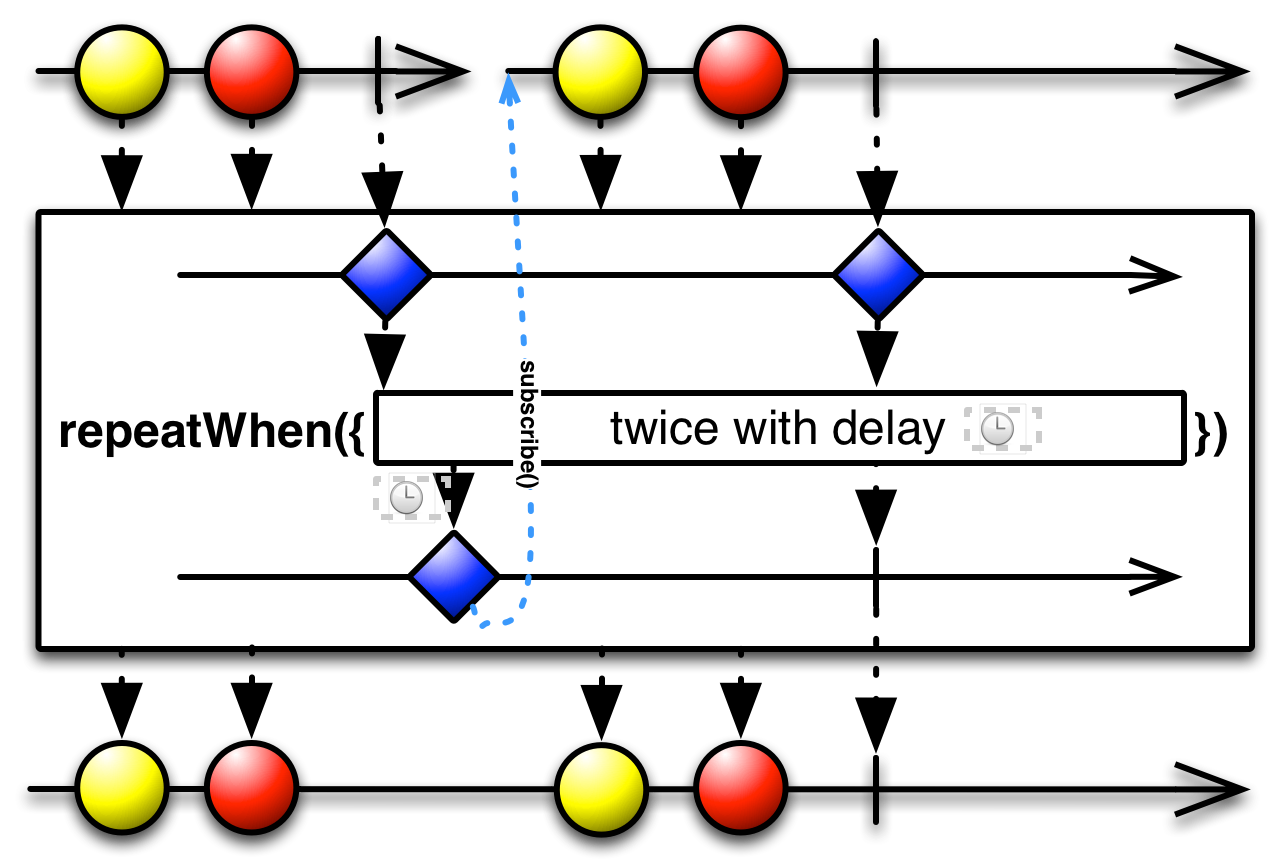
- Backpressure:
- The operator honors downstream backpressure and expects the source
Publisherto honor backpressure as well. If this expectation is violated, the operator may throw anIllegalStateException. - Scheduler:
repeatWhendoes not operate by default on a particularScheduler.
Parameters
| handler | receives a Publisher of notifications with which a user can complete or error, aborting the repeat. |
|---|
Returns
- the source Publisher modified with repeat logic
public final Flowable<R> replay (Function<? super Flowable<T>, ? extends Publisher<R>> selector, Scheduler scheduler)
Returns a Flowable that emits items that are the results of invoking a specified selector on items
emitted by a ConnectableFlowable that shares a single subscription to the source Publisher.
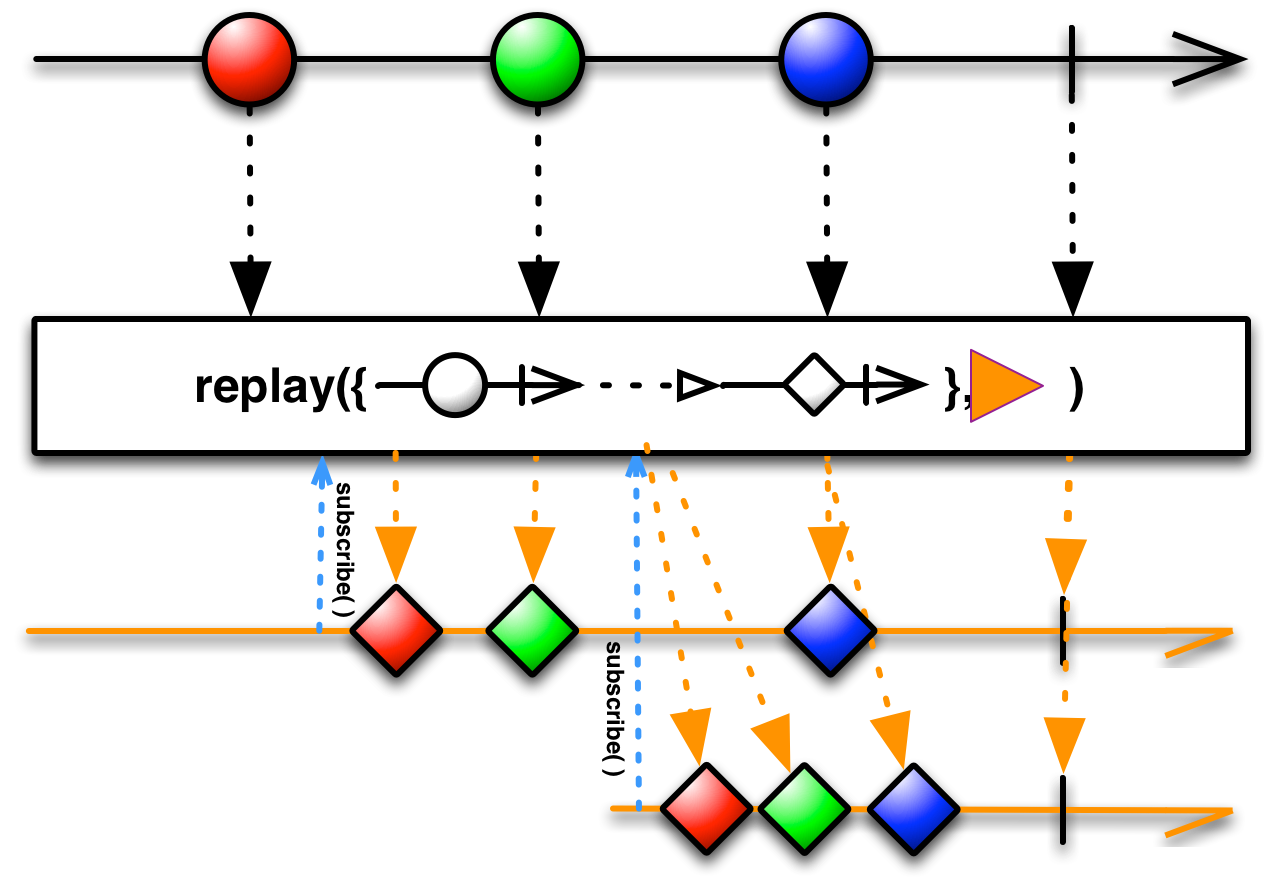
- Backpressure:
- This operator supports backpressure. Note that the upstream requests are determined by the child Subscriber which requests the largest amount: i.e., two child Subscribers with requests of 10 and 100 will request 100 elements from the underlying Publisher sequence.
- Scheduler:
- You specify which
Schedulerthis operator will use
Parameters
| selector | a selector function, which can use the multicasted sequence as many times as needed, without causing multiple subscriptions to the Publisher |
|---|---|
| scheduler | the Scheduler where the replay is observed |
Returns
- a Flowable that emits items that are the results of invoking the selector on items emitted by
a
ConnectableFlowablethat shares a single subscription to the source Publisher, replaying all items
public final Flowable<R> replay (Function<? super Flowable<T>, ? extends Publisher<R>> selector, int bufferSize)
Returns a Flowable that emits items that are the results of invoking a specified selector on items
emitted by a ConnectableFlowable that shares a single subscription to the source Publisher,
replaying bufferSize notifications.
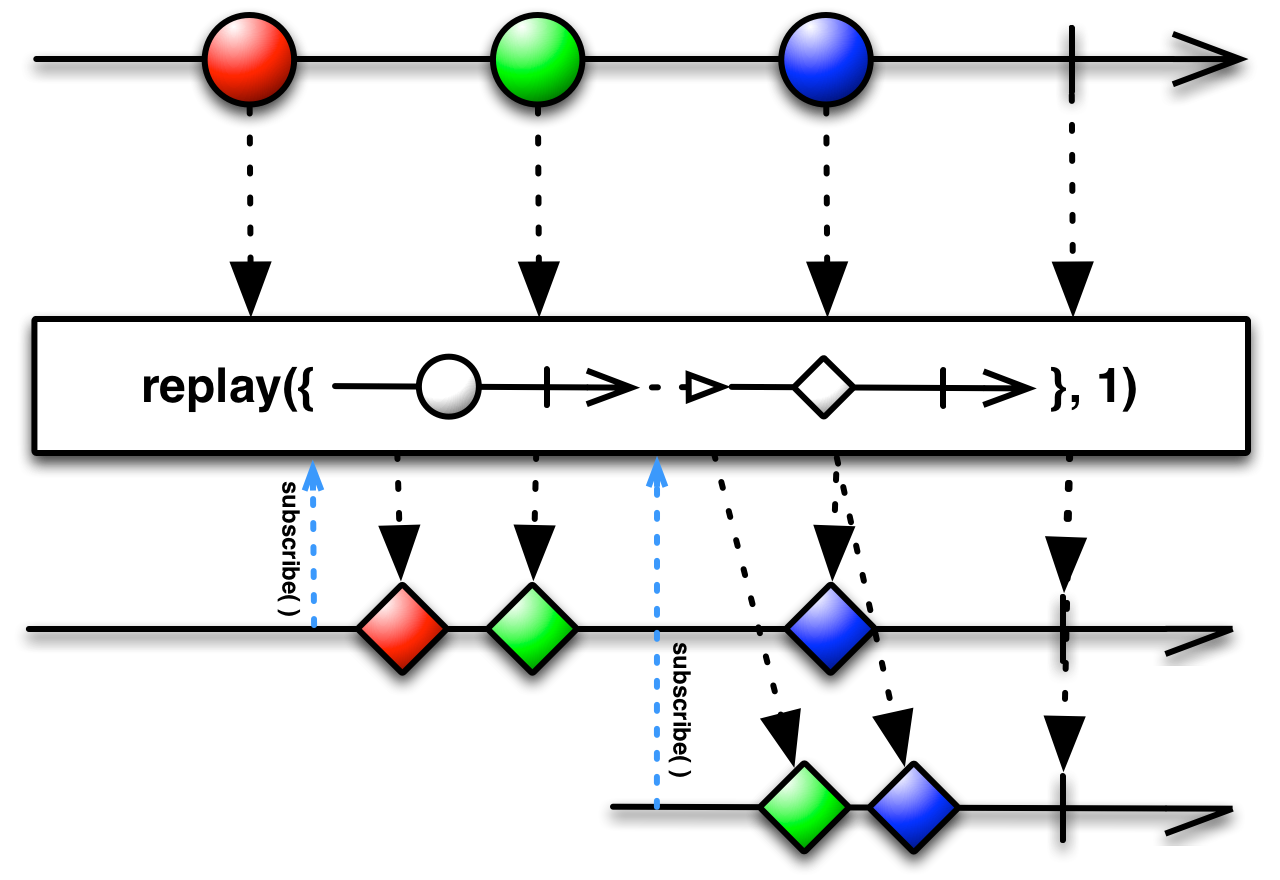
- Backpressure:
- This operator supports backpressure. Note that the upstream requests are determined by the child Subscriber which requests the largest amount: i.e., two child Subscribers with requests of 10 and 100 will request 100 elements from the underlying Publisher sequence.
- Scheduler:
- This version of
replaydoes not operate by default on a particularScheduler.
Parameters
| selector | the selector function, which can use the multicasted sequence as many times as needed, without causing multiple subscriptions to the Publisher |
|---|---|
| bufferSize | the buffer size that limits the number of items the connectable Publisher can replay |
Returns
- a Flowable that emits items that are the results of invoking the selector on items emitted by
a
ConnectableFlowablethat shares a single subscription to the source Publisher replaying no more thanbufferSizeitems
public final Flowable<R> replay (Function<? super Flowable<T>, ? extends Publisher<R>> selector, int bufferSize, Scheduler scheduler)
Returns a Flowable that emits items that are the results of invoking a specified selector on items
emitted by a ConnectableFlowable that shares a single subscription to the source Publisher,
replaying a maximum of bufferSize items.
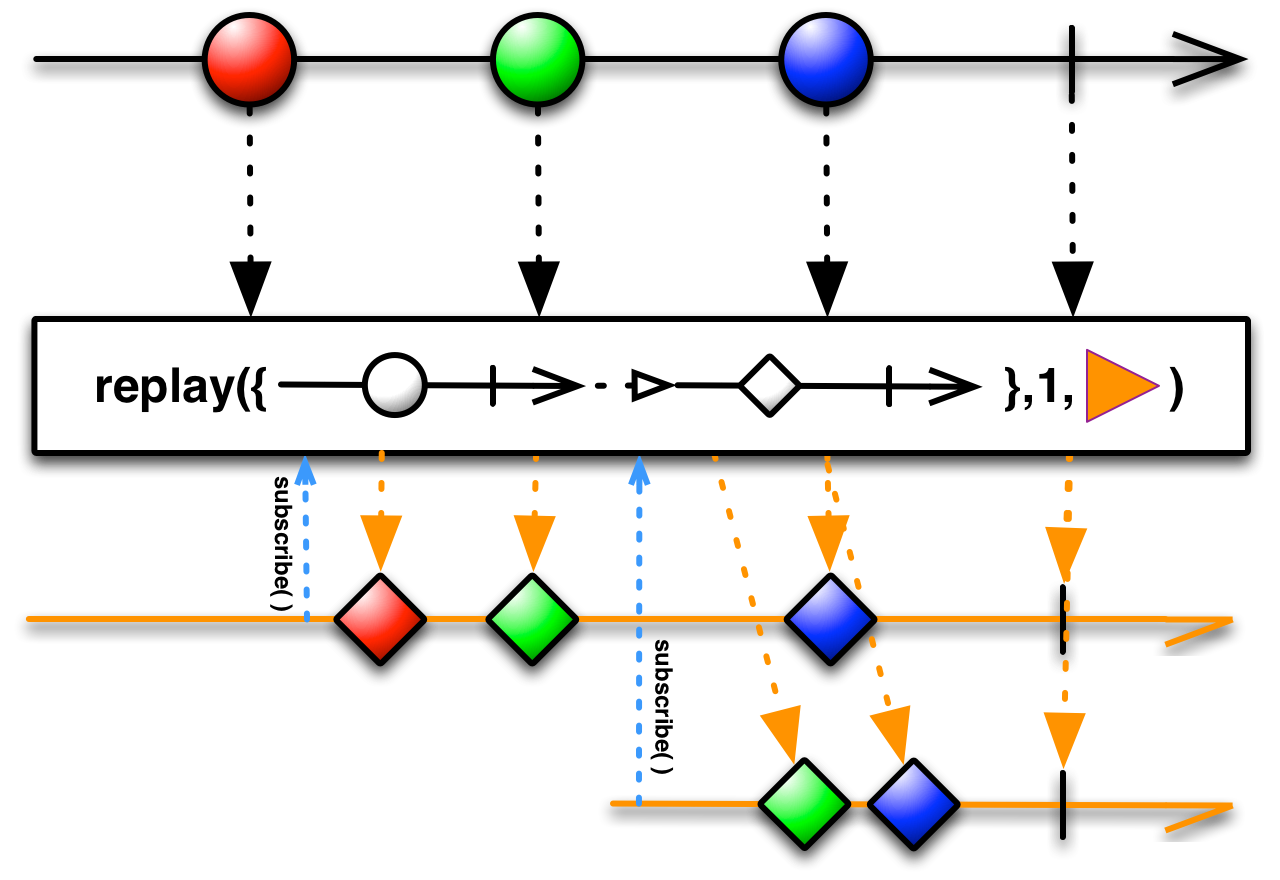
- Backpressure:
- This operator supports backpressure. Note that the upstream requests are determined by the child Subscriber which requests the largest amount: i.e., two child Subscribers with requests of 10 and 100 will request 100 elements from the underlying Publisher sequence.
- Scheduler:
- You specify which
Schedulerthis operator will use
Parameters
| selector | a selector function, which can use the multicasted sequence as many times as needed, without causing multiple subscriptions to the Publisher |
|---|---|
| bufferSize | the buffer size that limits the number of items the connectable Publisher can replay |
| scheduler | the Scheduler on which the replay is observed |
Returns
- a Flowable that emits items that are the results of invoking the selector on items emitted by
a
ConnectableFlowablethat shares a single subscription to the source Publisher, replaying no more thanbufferSizenotifications
public final ConnectableFlowable<T> replay (int bufferSize, long time, TimeUnit unit)
Returns a ConnectableFlowable that shares a single subscription to the source Publisher and
replays at most bufferSize items that were emitted during a specified time window. A Connectable
Publisher resembles an ordinary Publisher, except that it does not begin emitting items when it is
subscribed to, but only when its connect method is called.
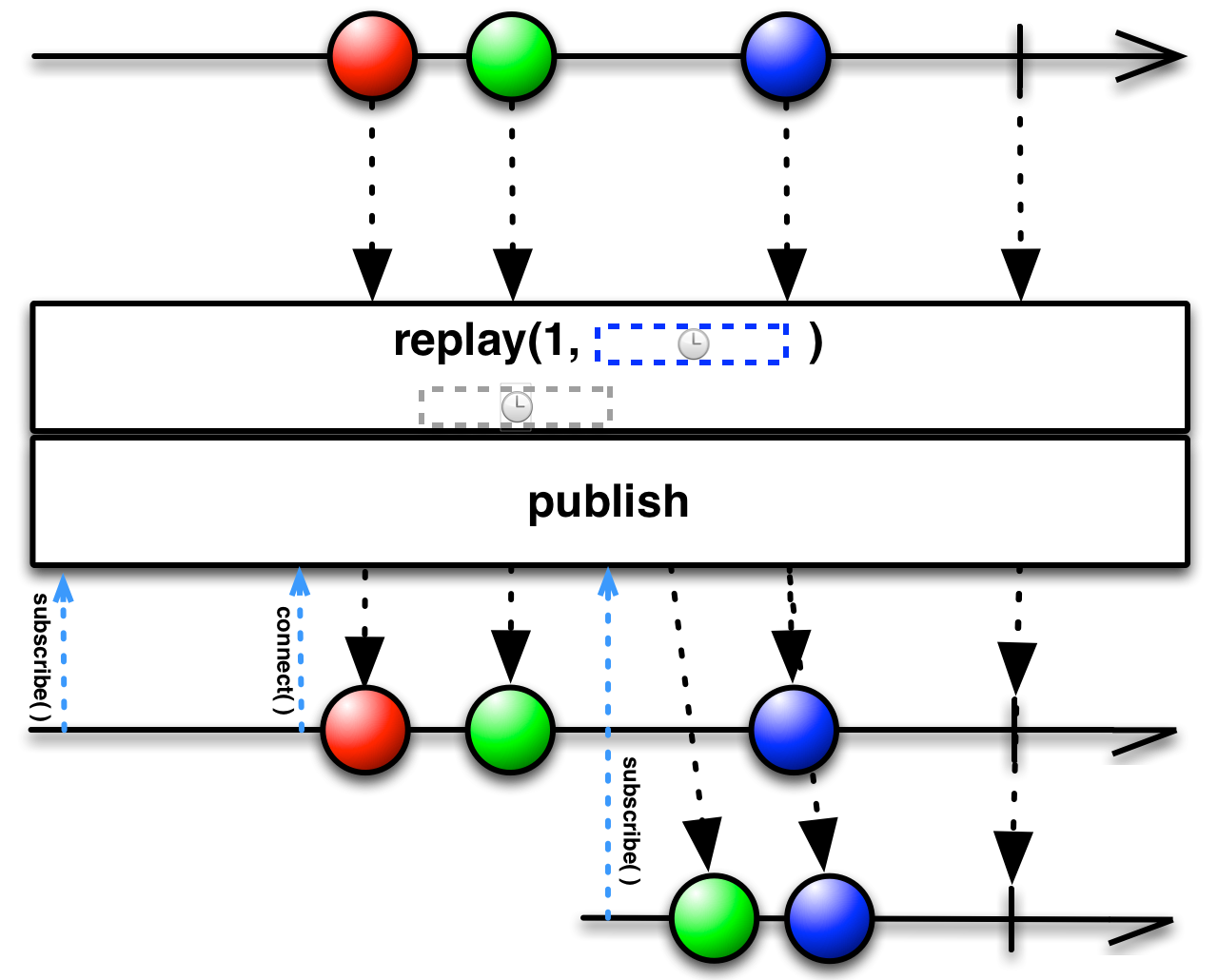
- Backpressure:
- This operator supports backpressure. Note that the upstream requests are determined by the child Subscriber which requests the largest amount: i.e., two child Subscribers with requests of 10 and 100 will request 100 elements from the underlying Publisher sequence.
- Scheduler:
- This version of
replayoperates by default on thecomputationScheduler.
Parameters
| bufferSize | the buffer size that limits the number of items that can be replayed |
|---|---|
| time | the duration of the window in which the replayed items must have been emitted |
| unit | the time unit of time |
Returns
- a
ConnectableFlowablethat shares a single subscription to the source Publisher and replays at mostbufferSizeitems that were emitted during the window defined bytime
public final ConnectableFlowable<T> replay (int bufferSize, long time, TimeUnit unit, Scheduler scheduler)
Returns a ConnectableFlowable that shares a single subscription to the source Publisher and
that replays a maximum of bufferSize items that are emitted within a specified time window. A
Connectable Publisher resembles an ordinary Publisher, except that it does not begin emitting items
when it is subscribed to, but only when its connect method is called.
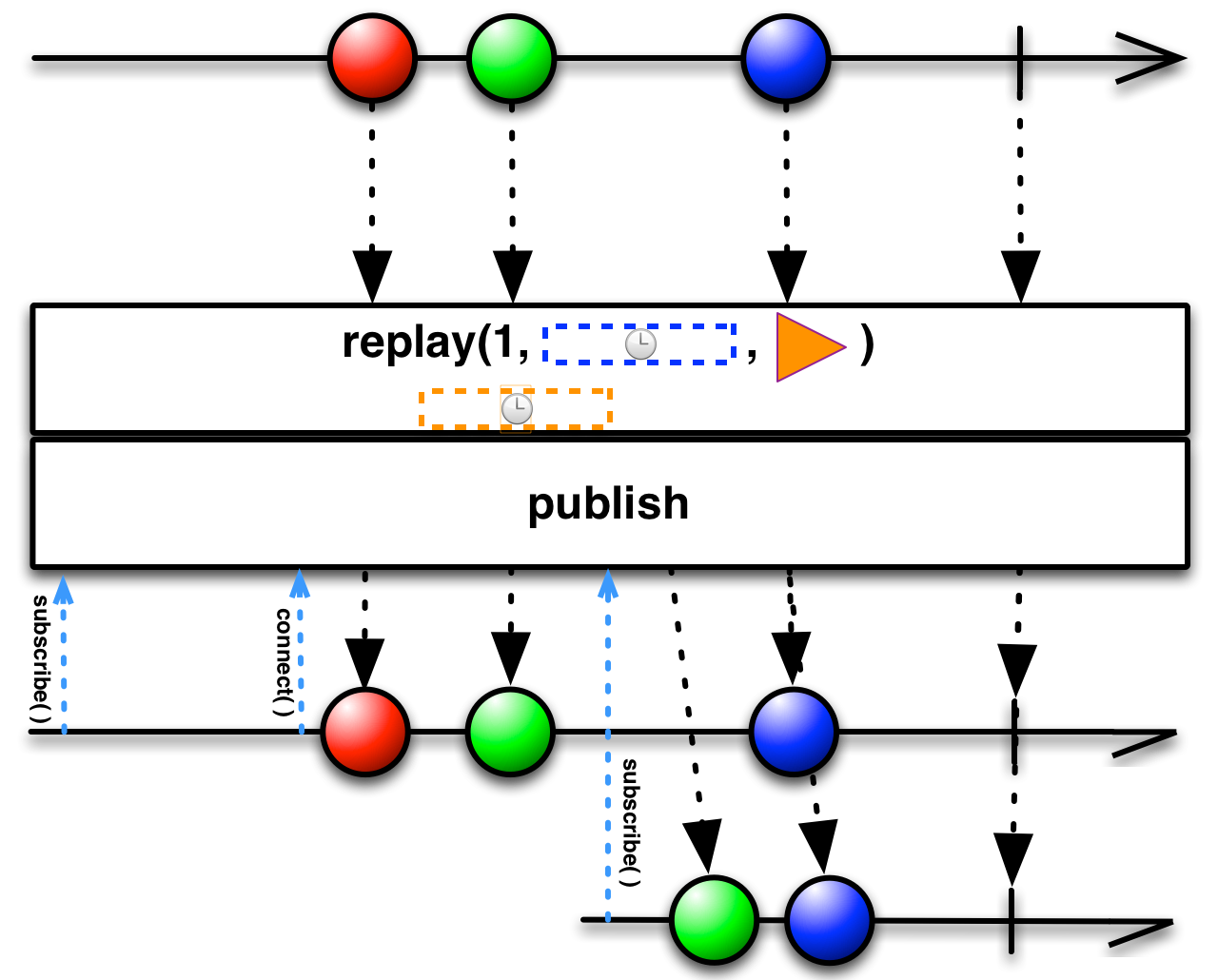
- Backpressure:
- This operator supports backpressure. Note that the upstream requests are determined by the child Subscriber which requests the largest amount: i.e., two child Subscribers with requests of 10 and 100 will request 100 elements from the underlying Publisher sequence.
- Scheduler:
- You specify which
Schedulerthis operator will use
Parameters
| bufferSize | the buffer size that limits the number of items that can be replayed |
|---|---|
| time | the duration of the window in which the replayed items must have been emitted |
| unit | the time unit of time |
| scheduler | the scheduler that is used as a time source for the window |
Returns
- a
ConnectableFlowablethat shares a single subscription to the source Publisher and replays at mostbufferSizeitems that were emitted during the window defined bytime
Throws
| IllegalArgumentException | if bufferSize is less than zero |
|---|
public final ConnectableFlowable<T> replay (int bufferSize)
Returns a ConnectableFlowable that shares a single subscription to the source Publisher that
replays at most bufferSize items emitted by that Publisher. A Connectable Publisher resembles
an ordinary Publisher, except that it does not begin emitting items when it is subscribed to, but only
when its connect method is called.
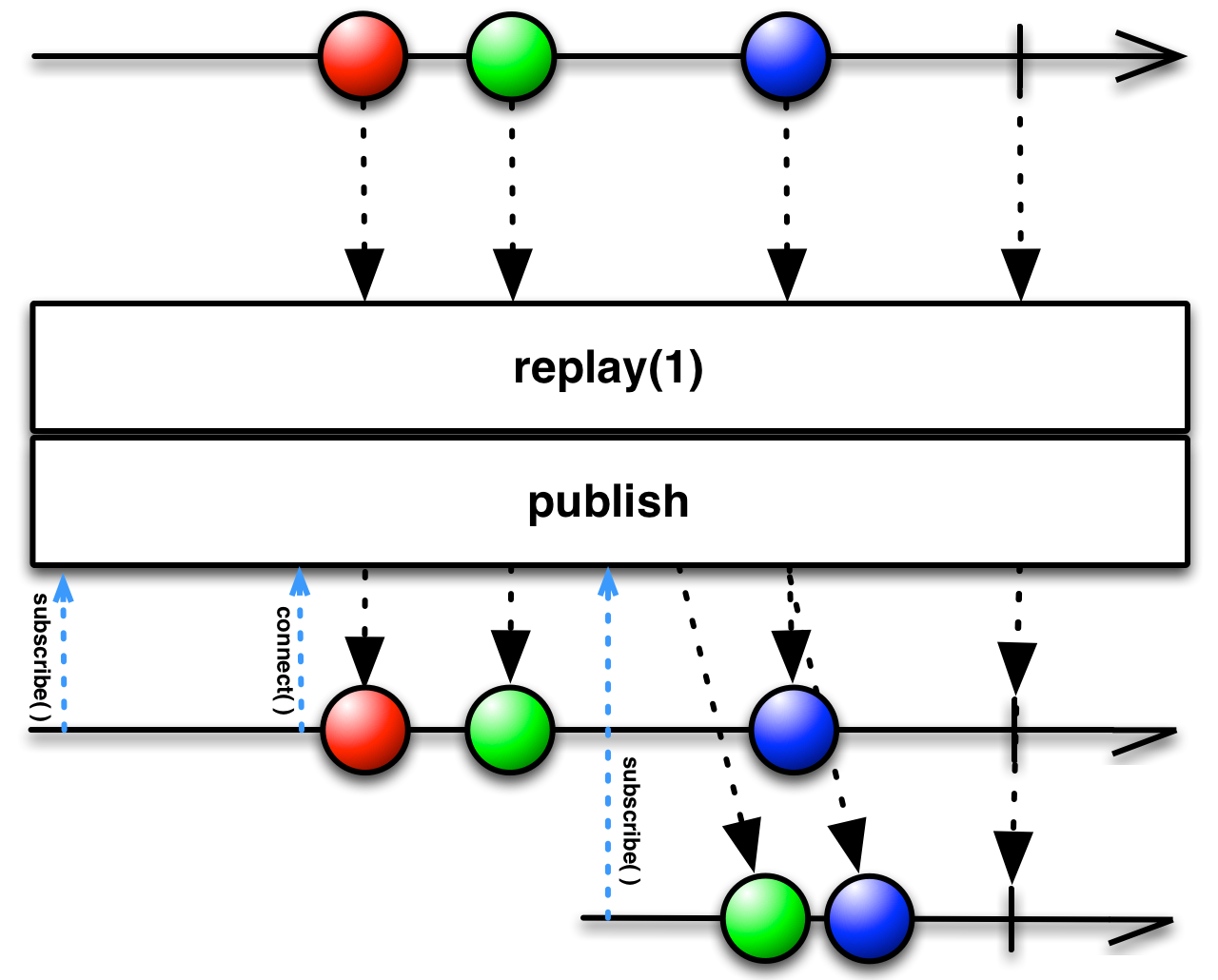
- Backpressure:
- This operator supports backpressure. Note that the upstream requests are determined by the child Subscriber which requests the largest amount: i.e., two child Subscribers with requests of 10 and 100 will request 100 elements from the underlying Publisher sequence.
- Scheduler:
- This version of
replaydoes not operate by default on a particularScheduler.
Parameters
| bufferSize | the buffer size that limits the number of items that can be replayed |
|---|
Returns
- a
ConnectableFlowablethat shares a single subscription to the source Publisher and replays at mostbufferSizeitems emitted by that Publisher
public final ConnectableFlowable<T> replay ()
Returns a ConnectableFlowable that shares a single subscription to the underlying Publisher
that will replay all of its items and notifications to any future Subscriber. A Connectable
Publisher resembles an ordinary Publisher, except that it does not begin emitting items when it is
subscribed to, but only when its connect method is called.
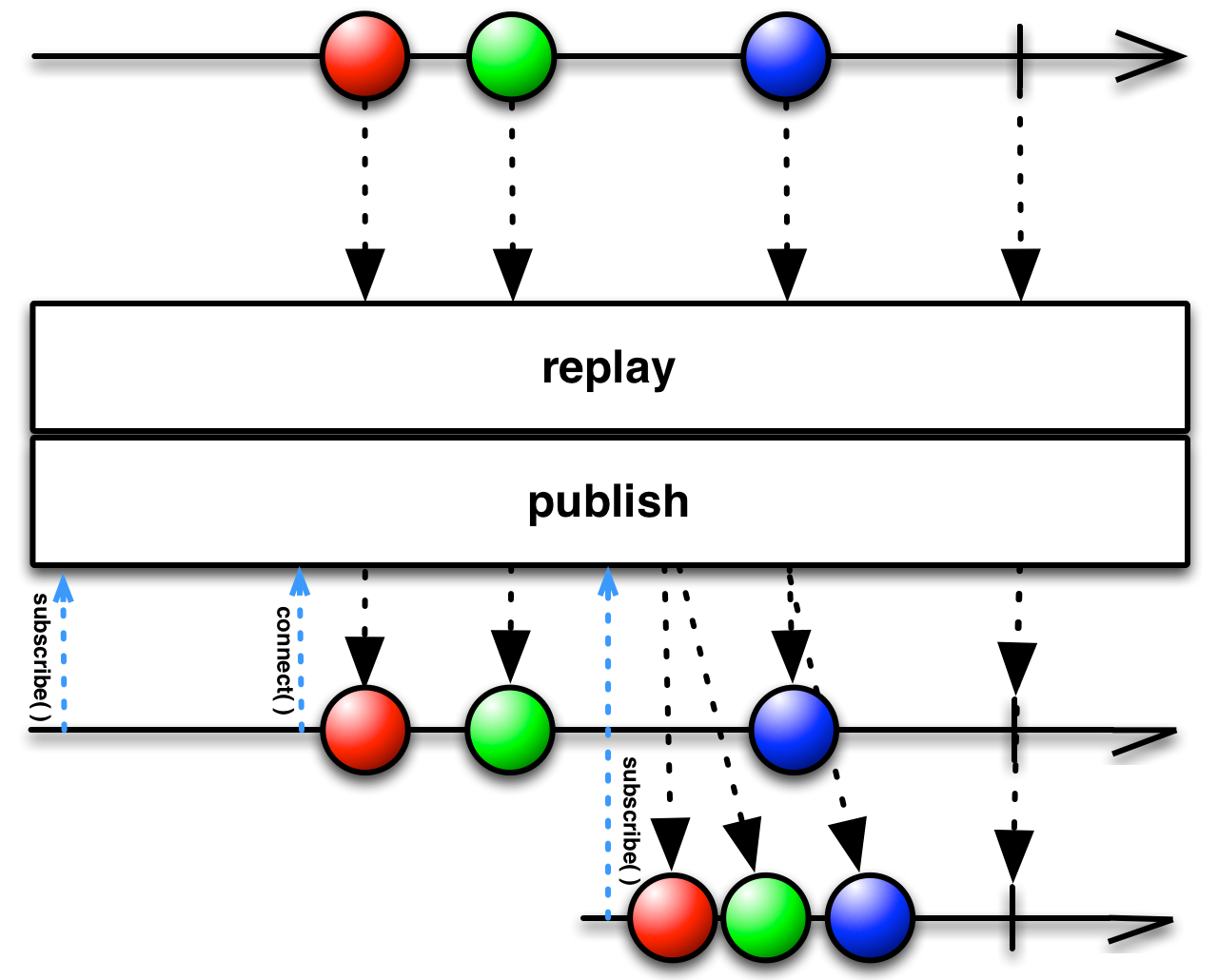
- Backpressure:
- This operator supports backpressure. Note that the upstream requests are determined by the child Subscriber which requests the largest amount: i.e., two child Subscribers with requests of 10 and 100 will request 100 elements from the underlying Publisher sequence.
- Scheduler:
- This version of
replaydoes not operate by default on a particularScheduler.
Returns
- a
ConnectableFlowablethat upon connection causes the source Publisher to emit its items to its Subscribers
public final Flowable<R> replay (Function<? super Flowable<T>, ? extends Publisher<R>> selector)
Returns a Flowable that emits items that are the results of invoking a specified selector on the items
emitted by a ConnectableFlowable that shares a single subscription to the source Publisher.
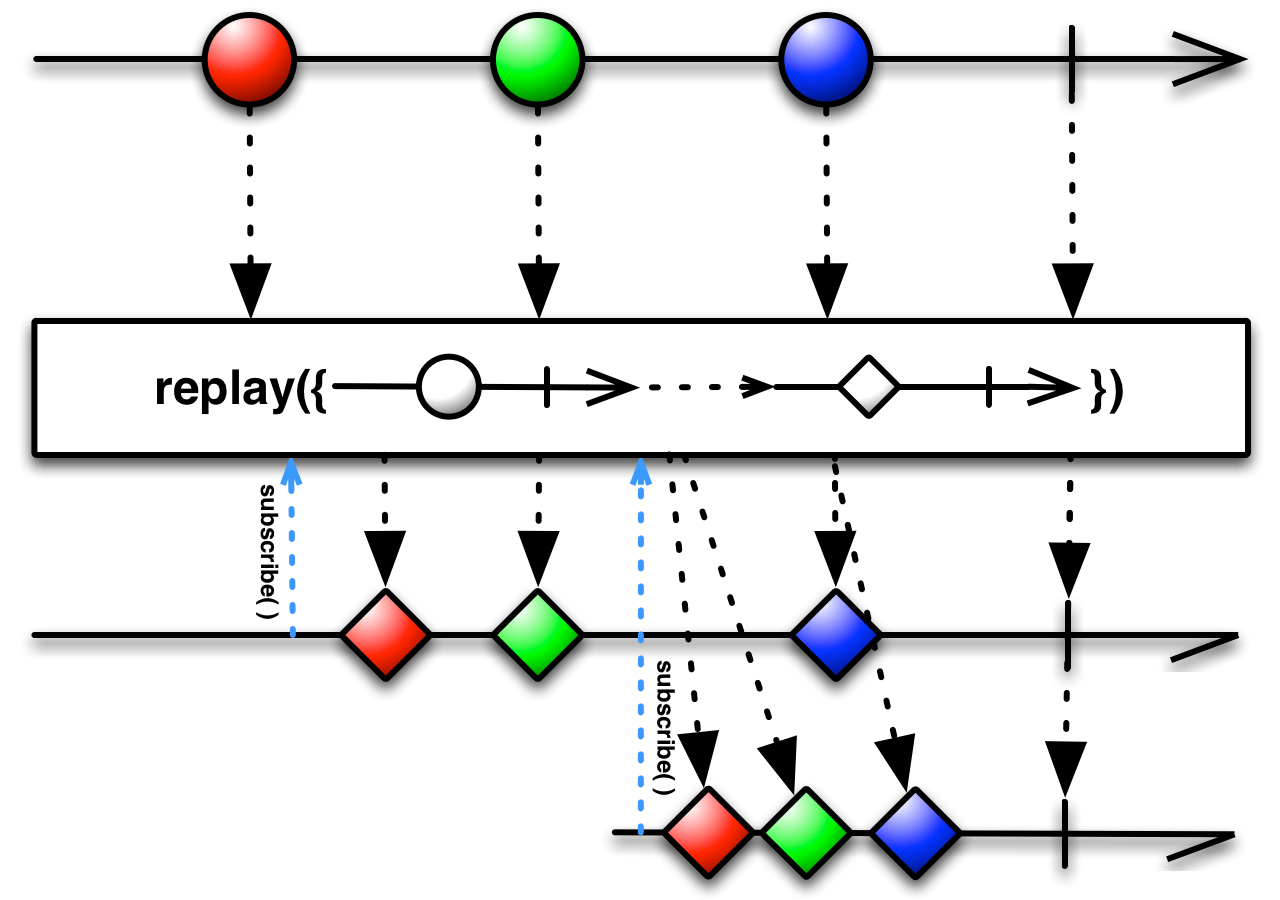
- Backpressure:
- This operator supports backpressure. Note that the upstream requests are determined by the child Subscriber which requests the largest amount: i.e., two child Subscribers with requests of 10 and 100 will request 100 elements from the underlying Publisher sequence.
- Scheduler:
- This version of
replaydoes not operate by default on a particularScheduler.
Parameters
| selector | the selector function, which can use the multicasted sequence as many times as needed, without causing multiple subscriptions to the Publisher |
|---|
Returns
- a Flowable that emits items that are the results of invoking the selector on a
ConnectableFlowablethat shares a single subscription to the source Publisher
public final Flowable<R> replay (Function<? super Flowable<T>, ? extends Publisher<R>> selector, int bufferSize, long time, TimeUnit unit)
Returns a Flowable that emits items that are the results of invoking a specified selector on items
emitted by a ConnectableFlowable that shares a single subscription to the source Publisher,
replaying no more than bufferSize items that were emitted within a specified time window.
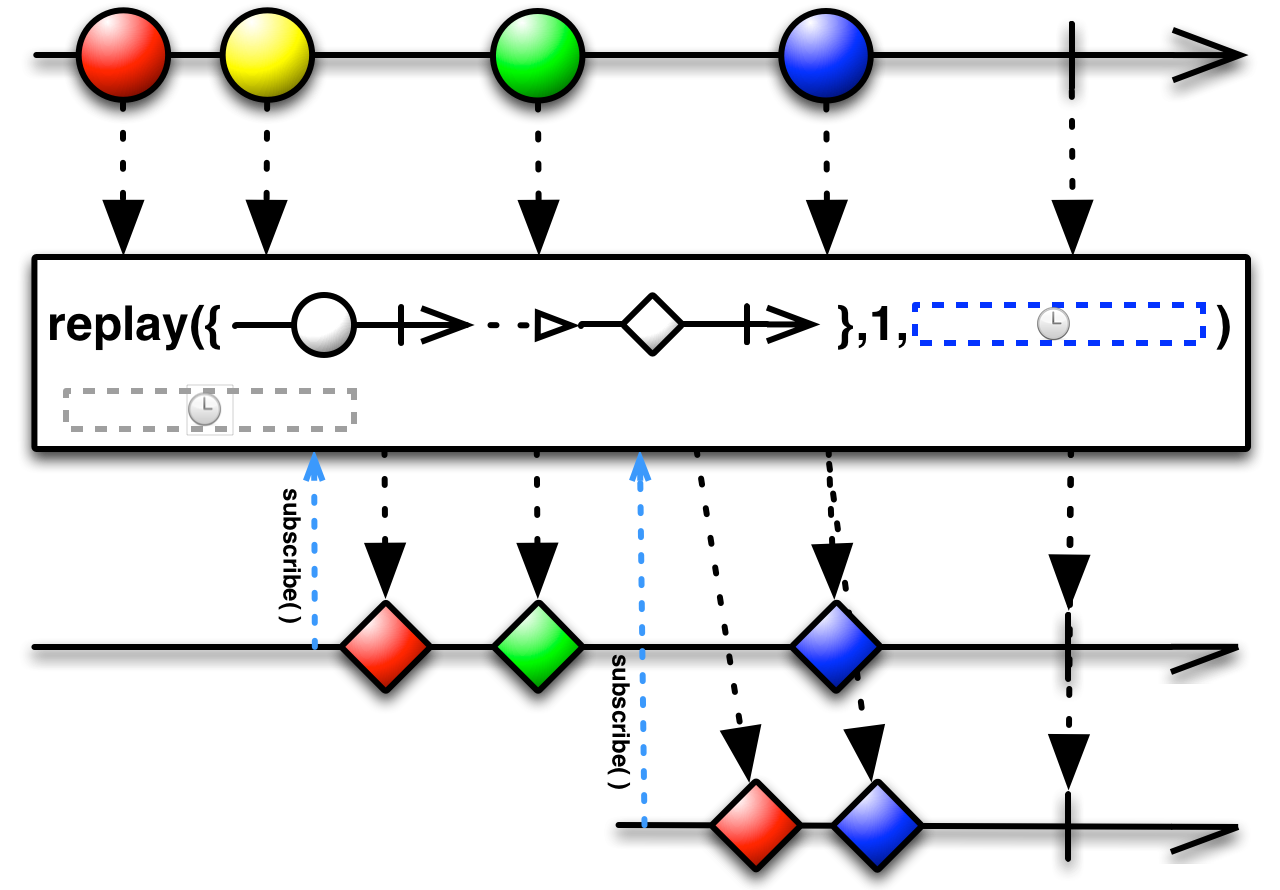
- Backpressure:
- This operator supports backpressure. Note that the upstream requests are determined by the child Subscriber which requests the largest amount: i.e., two child Subscribers with requests of 10 and 100 will request 100 elements from the underlying Publisher sequence.
- Scheduler:
- This version of
replayoperates by default on thecomputationScheduler.
Parameters
| selector | a selector function, which can use the multicasted sequence as many times as needed, without causing multiple subscriptions to the Publisher |
|---|---|
| bufferSize | the buffer size that limits the number of items the connectable Publisher can replay |
| time | the duration of the window in which the replayed items must have been emitted |
| unit | the time unit of time |
Returns
- a Flowable that emits items that are the results of invoking the selector on items emitted by
a
ConnectableFlowablethat shares a single subscription to the source Publisher, and replays no more thanbufferSizeitems that were emitted within the window defined bytime
public final Flowable<R> replay (Function<? super Flowable<T>, ? extends Publisher<R>> selector, long time, TimeUnit unit, Scheduler scheduler)
Returns a Flowable that emits items that are the results of invoking a specified selector on items
emitted by a ConnectableFlowable that shares a single subscription to the source Publisher,
replaying all items that were emitted within a specified time window.
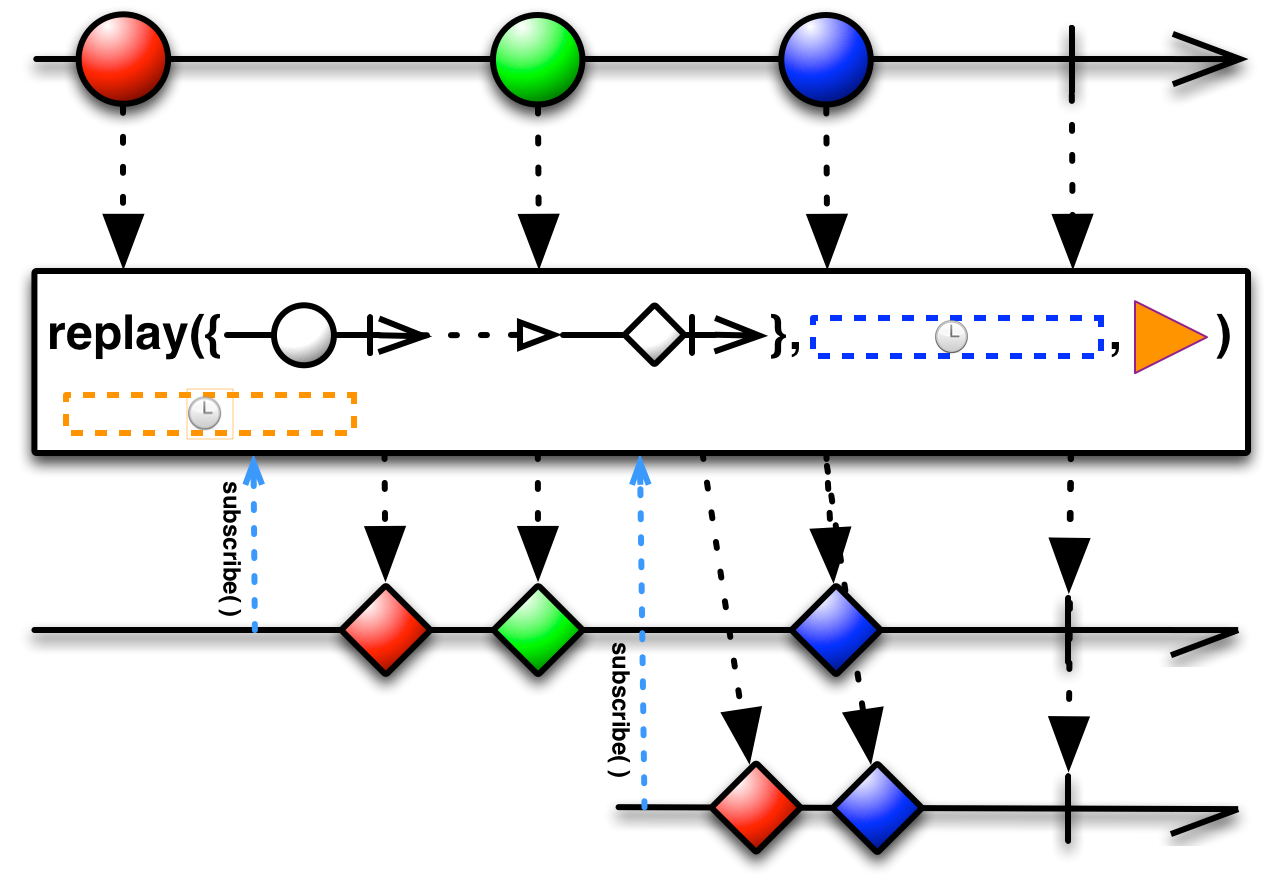
- Backpressure:
- This operator supports backpressure. Note that the upstream requests are determined by the child Subscriber which requests the largest amount: i.e., two child Subscribers with requests of 10 and 100 will request 100 elements from the underlying Publisher sequence.
- Scheduler:
- You specify which
Schedulerthis operator will use
Parameters
| selector | a selector function, which can use the multicasted sequence as many times as needed, without causing multiple subscriptions to the Publisher |
|---|---|
| time | the duration of the window in which the replayed items must have been emitted |
| unit | the time unit of time |
| scheduler | the scheduler that is the time source for the window |
Returns
- a Flowable that emits items that are the results of invoking the selector on items emitted by
a
ConnectableFlowablethat shares a single subscription to the source Publisher, replaying all items that were emitted within the window defined bytime
public final ConnectableFlowable<T> replay (long time, TimeUnit unit)
Returns a ConnectableFlowable that shares a single subscription to the source Publisher and
replays all items emitted by that Publisher within a specified time window. A Connectable Publisher
resembles an ordinary Publisher, except that it does not begin emitting items when it is subscribed to,
but only when its connect method is called.
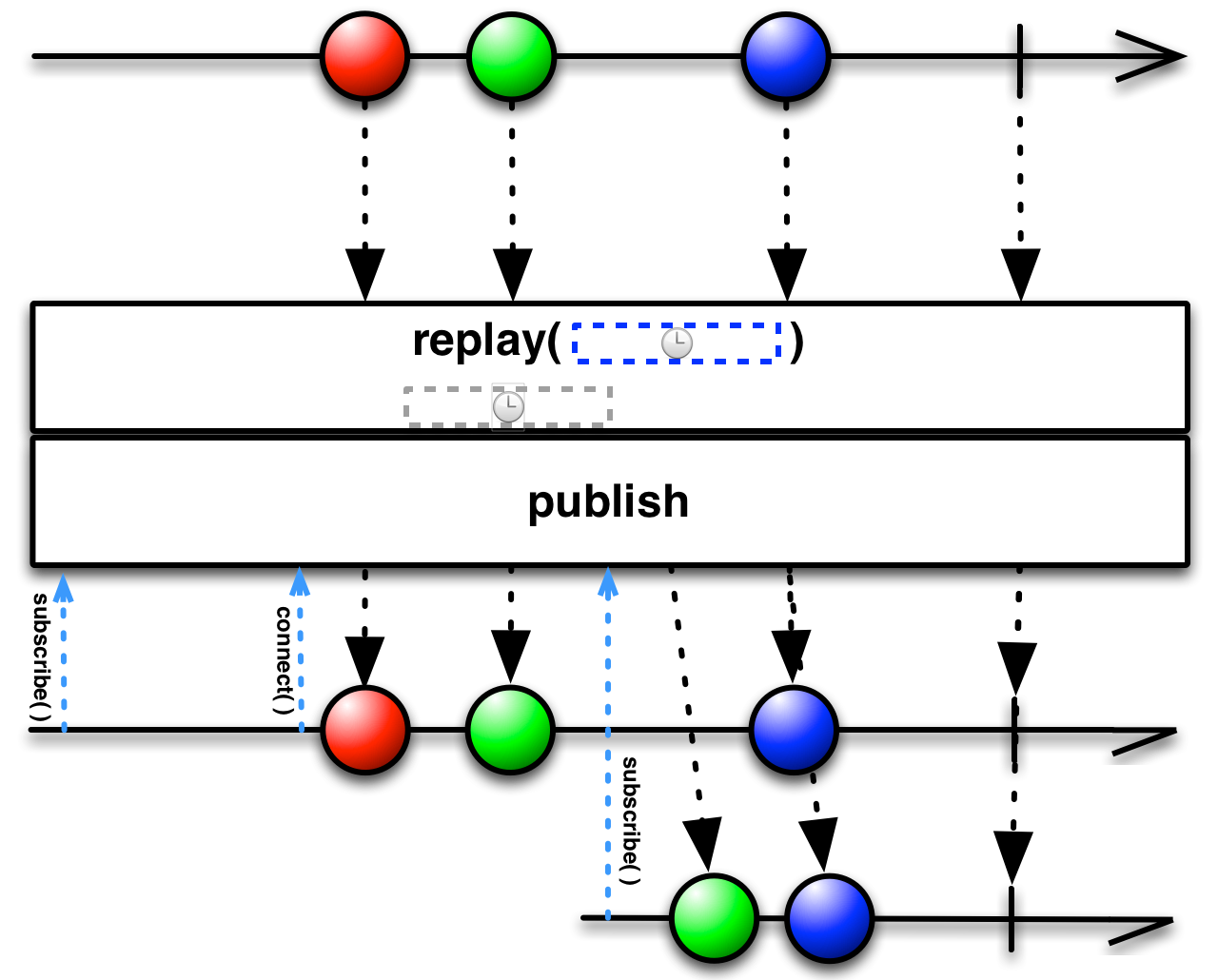
- Backpressure:
- This operator supports backpressure. Note that the upstream requests are determined by the child Subscriber which requests the largest amount: i.e., two child Subscribers with requests of 10 and 100 will request 100 elements from the underlying Publisher sequence.
- Scheduler:
- This version of
replayoperates by default on thecomputationScheduler.
Parameters
| time | the duration of the window in which the replayed items must have been emitted |
|---|---|
| unit | the time unit of time |
Returns
- a
ConnectableFlowablethat shares a single subscription to the source Publisher and replays the items that were emitted during the window defined bytime
public final ConnectableFlowable<T> replay (Scheduler scheduler)
Returns a ConnectableFlowable that shares a single subscription to the source Publisher that
will replay all of its items and notifications to any future Subscriber on the given
Scheduler. A Connectable Publisher resembles an ordinary Publisher, except that it does not
begin emitting items when it is subscribed to, but only when its connect method is called.
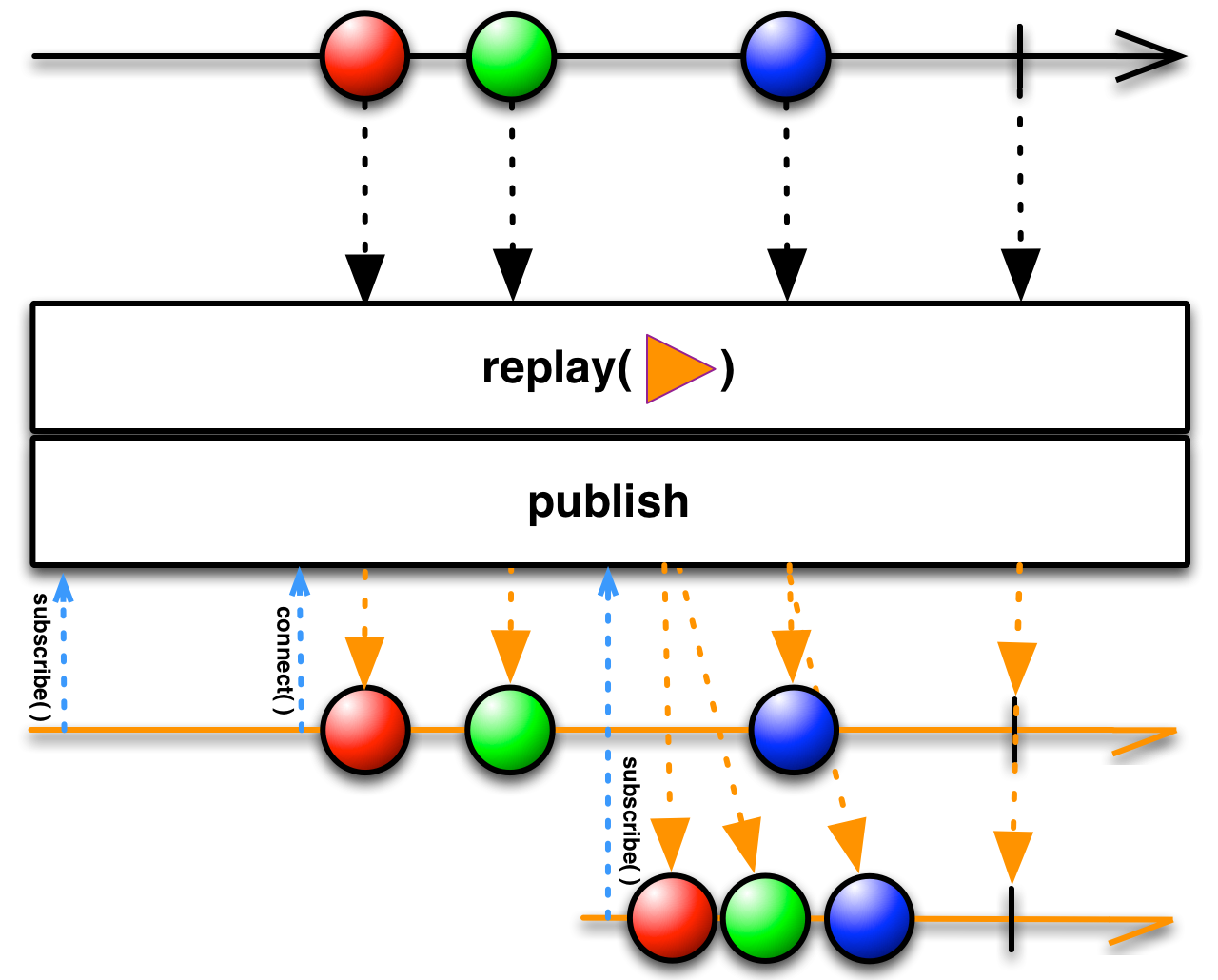
- Backpressure:
- This operator supports backpressure. Note that the upstream requests are determined by the child Subscriber which requests the largest amount: i.e., two child Subscribers with requests of 10 and 100 will request 100 elements from the underlying Publisher sequence.
- Scheduler:
- You specify which
Schedulerthis operator will use
Parameters
| scheduler | the Scheduler on which the Subscribers will observe the emitted items |
|---|
Returns
- a
ConnectableFlowablethat shares a single subscription to the source Publisher that will replay all of its items and notifications to any future Subscriber on the givenScheduler
public final ConnectableFlowable<T> replay (int bufferSize, Scheduler scheduler)
Returns a ConnectableFlowable that shares a single subscription to the source Publisher and
replays at most bufferSize items emitted by that Publisher. A Connectable Publisher resembles
an ordinary Publisher, except that it does not begin emitting items when it is subscribed to, but only
when its connect method is called.
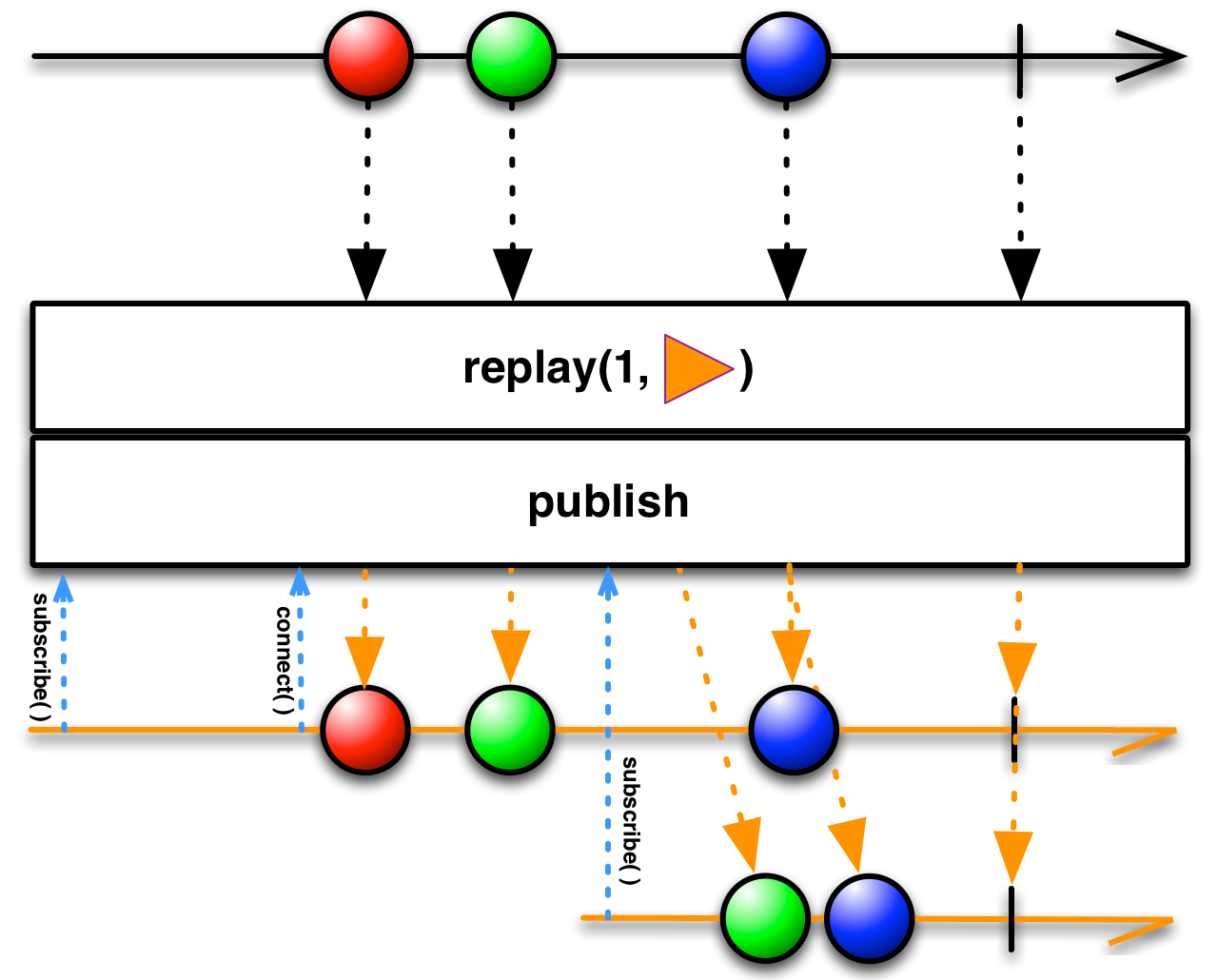
- Backpressure:
- This operator supports backpressure. Note that the upstream requests are determined by the child Subscriber which requests the largest amount: i.e., two child Subscribers with requests of 10 and 100 will request 100 elements from the underlying Publisher sequence.
- Scheduler:
- You specify which
Schedulerthis operator will use
Parameters
| bufferSize | the buffer size that limits the number of items that can be replayed |
|---|---|
| scheduler | the scheduler on which the Subscribers will observe the emitted items |
Returns
- a
ConnectableFlowablethat shares a single subscription to the source Publisher and replays at mostbufferSizeitems that were emitted by the Publisher
public final ConnectableFlowable<T> replay (long time, TimeUnit unit, Scheduler scheduler)
Returns a ConnectableFlowable that shares a single subscription to the source Publisher and
replays all items emitted by that Publisher within a specified time window. A Connectable Publisher
resembles an ordinary Publisher, except that it does not begin emitting items when it is subscribed to,
but only when its connect method is called.
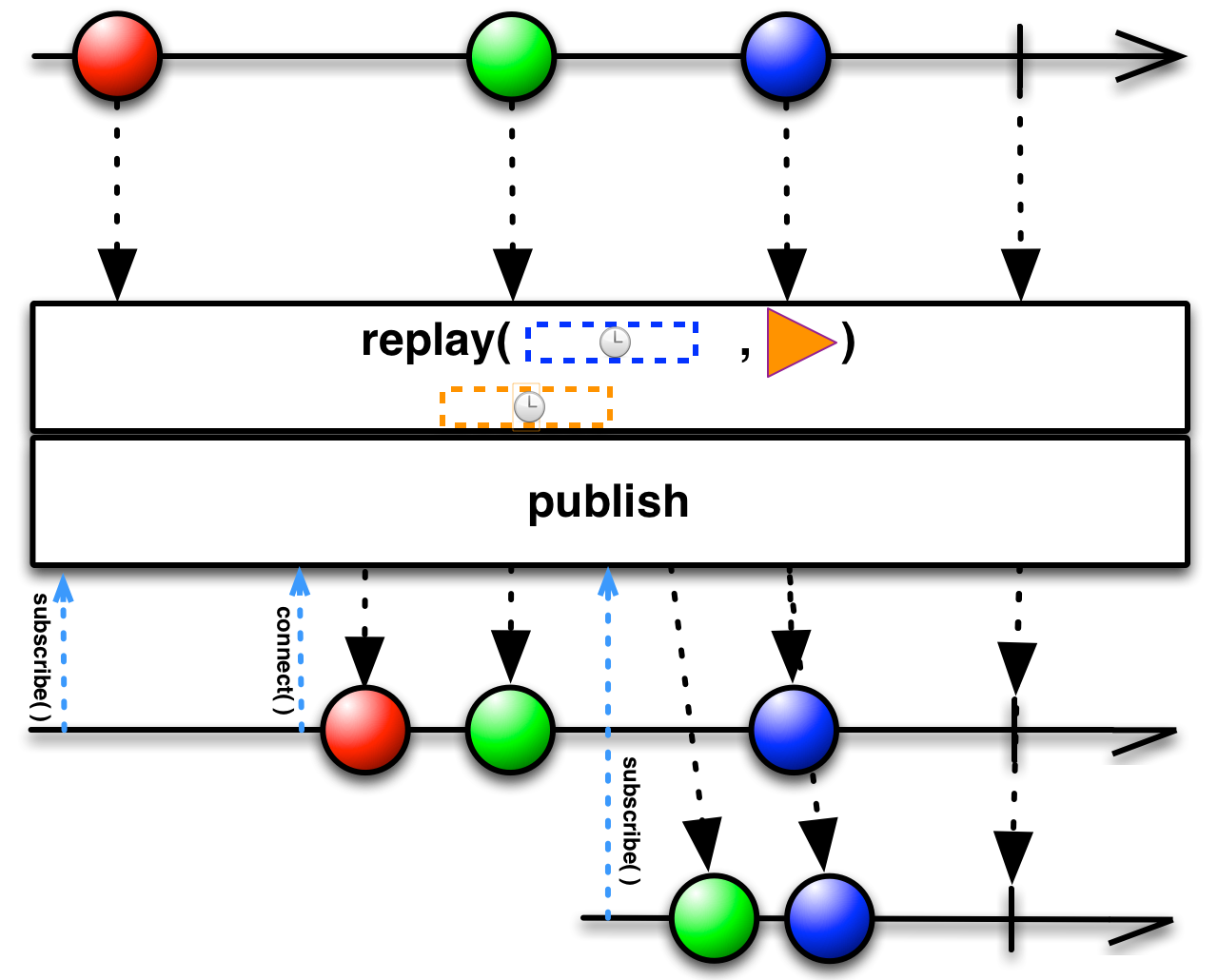
- Backpressure:
- This operator supports backpressure. Note that the upstream requests are determined by the child Subscriber which requests the largest amount: i.e., two child Subscribers with requests of 10 and 100 will request 100 elements from the underlying Publisher sequence.
- Scheduler:
- You specify which
Schedulerthis operator will use
Parameters
| time | the duration of the window in which the replayed items must have been emitted |
|---|---|
| unit | the time unit of time |
| scheduler | the Scheduler that is the time source for the window |
Returns
- a
ConnectableFlowablethat shares a single subscription to the source Publisher and replays the items that were emitted during the window defined bytime
public final Flowable<R> replay (Function<? super Flowable<T>, ? extends Publisher<R>> selector, long time, TimeUnit unit)
Returns a Flowable that emits items that are the results of invoking a specified selector on items
emitted by a ConnectableFlowable that shares a single subscription to the source Publisher,
replaying all items that were emitted within a specified time window.
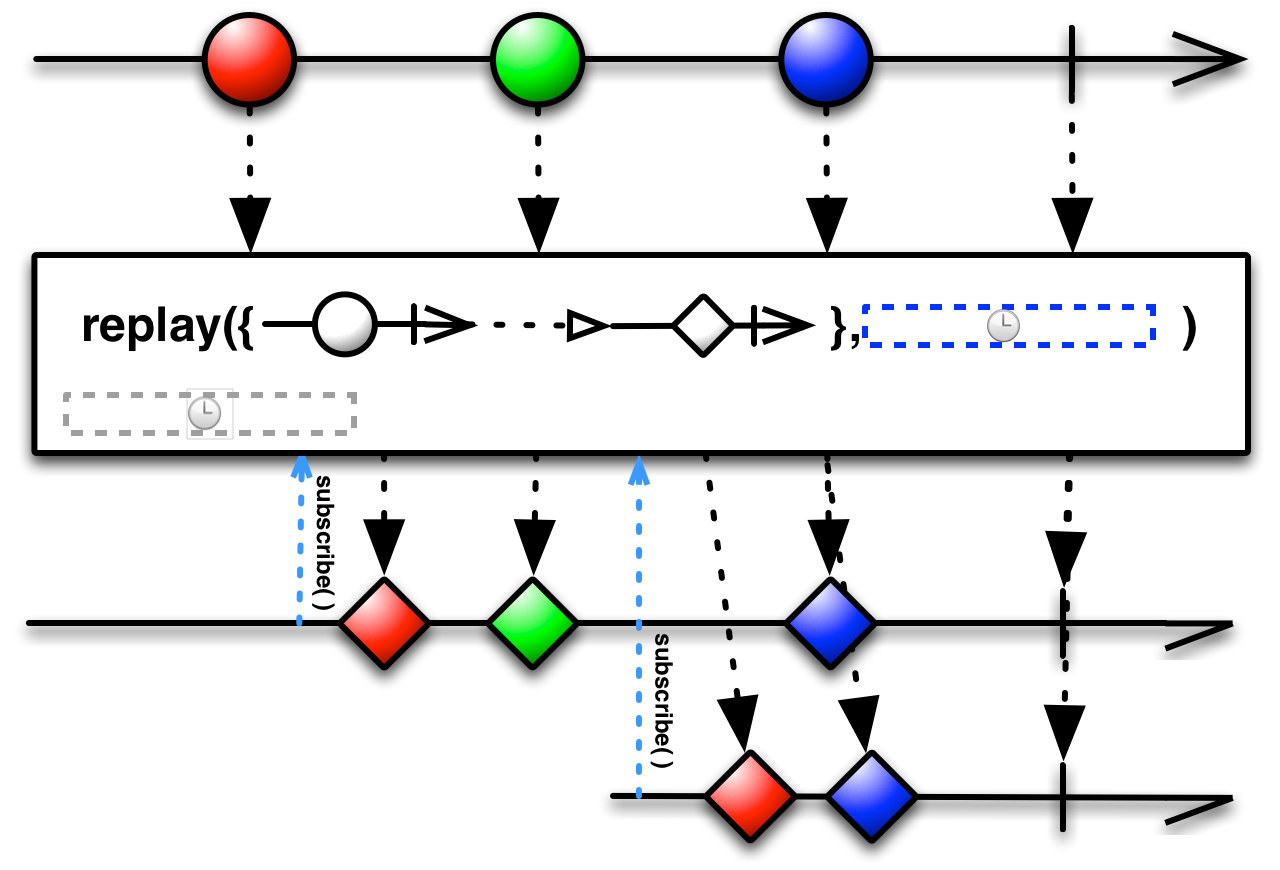
- Backpressure:
- This operator supports backpressure. Note that the upstream requests are determined by the child Subscriber which requests the largest amount: i.e., two child Subscribers with requests of 10 and 100 will request 100 elements from the underlying Publisher sequence.
- Scheduler:
- This version of
replayoperates by default on thecomputationScheduler.
Parameters
| selector | a selector function, which can use the multicasted sequence as many times as needed, without causing multiple subscriptions to the Publisher |
|---|---|
| time | the duration of the window in which the replayed items must have been emitted |
| unit | the time unit of time |
Returns
- a Flowable that emits items that are the results of invoking the selector on items emitted by
a
ConnectableFlowablethat shares a single subscription to the source Publisher, replaying all items that were emitted within the window defined bytime
public final Flowable<R> replay (Function<? super Flowable<T>, ? extends Publisher<R>> selector, int bufferSize, long time, TimeUnit unit, Scheduler scheduler)
Returns a Flowable that emits items that are the results of invoking a specified selector on items
emitted by a ConnectableFlowable that shares a single subscription to the source Publisher,
replaying no more than bufferSize items that were emitted within a specified time window.
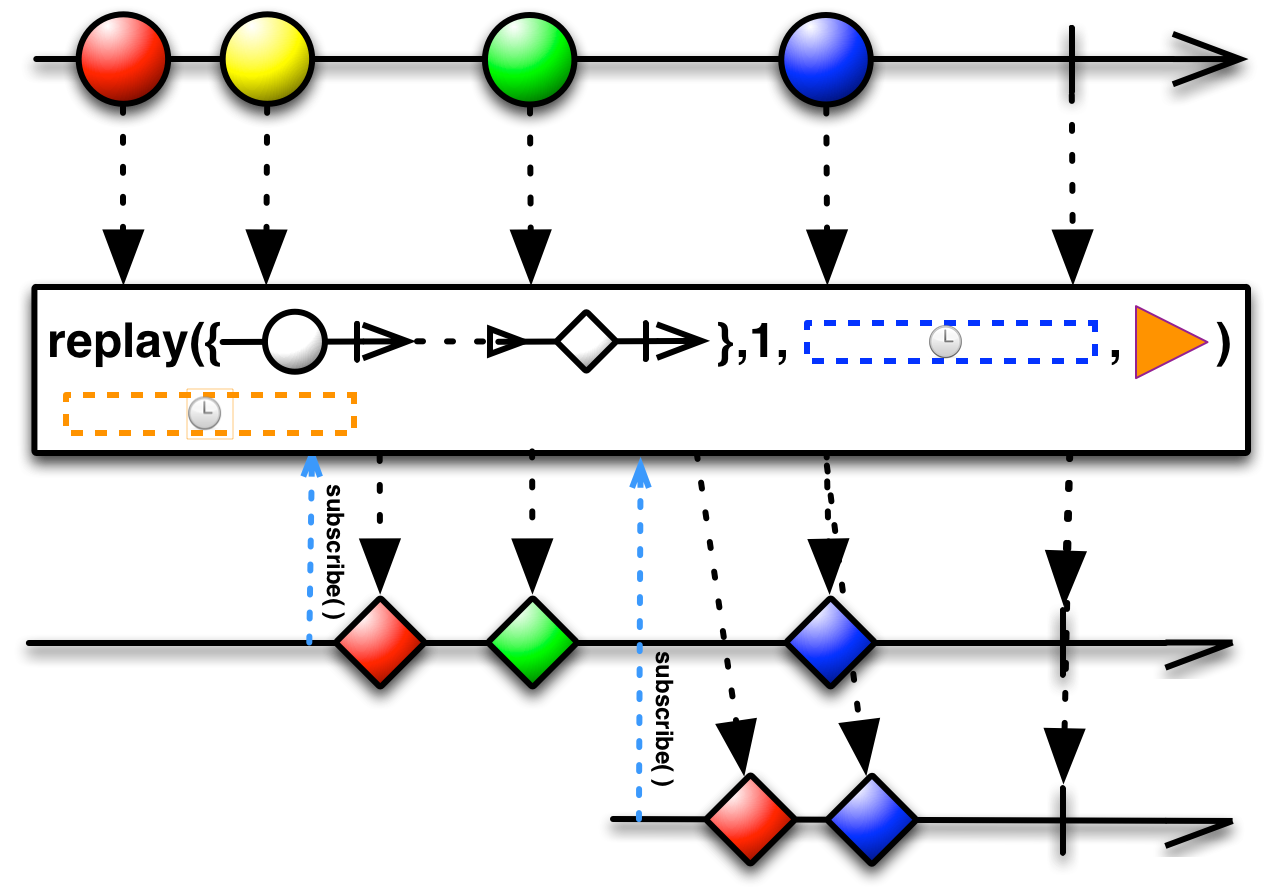
- Backpressure:
- This operator supports backpressure. Note that the upstream requests are determined by the child Subscriber which requests the largest amount: i.e., two child Subscribers with requests of 10 and 100 will request 100 elements from the underlying Publisher sequence.
- Scheduler:
- You specify which
Schedulerthis operator will use
Parameters
| selector | a selector function, which can use the multicasted sequence as many times as needed, without causing multiple subscriptions to the Publisher |
|---|---|
| bufferSize | the buffer size that limits the number of items the connectable Publisher can replay |
| time | the duration of the window in which the replayed items must have been emitted |
| unit | the time unit of time |
| scheduler | the Scheduler that is the time source for the window |
Returns
- a Flowable that emits items that are the results of invoking the selector on items emitted by
a
ConnectableFlowablethat shares a single subscription to the source Publisher, and replays no more thanbufferSizeitems that were emitted within the window defined bytime
Throws
| IllegalArgumentException | if bufferSize is less than zero |
|---|
public final Flowable<T> retry ()
Returns a Flowable that mirrors the source Publisher, resubscribing to it if it calls onError
(infinite retry count).
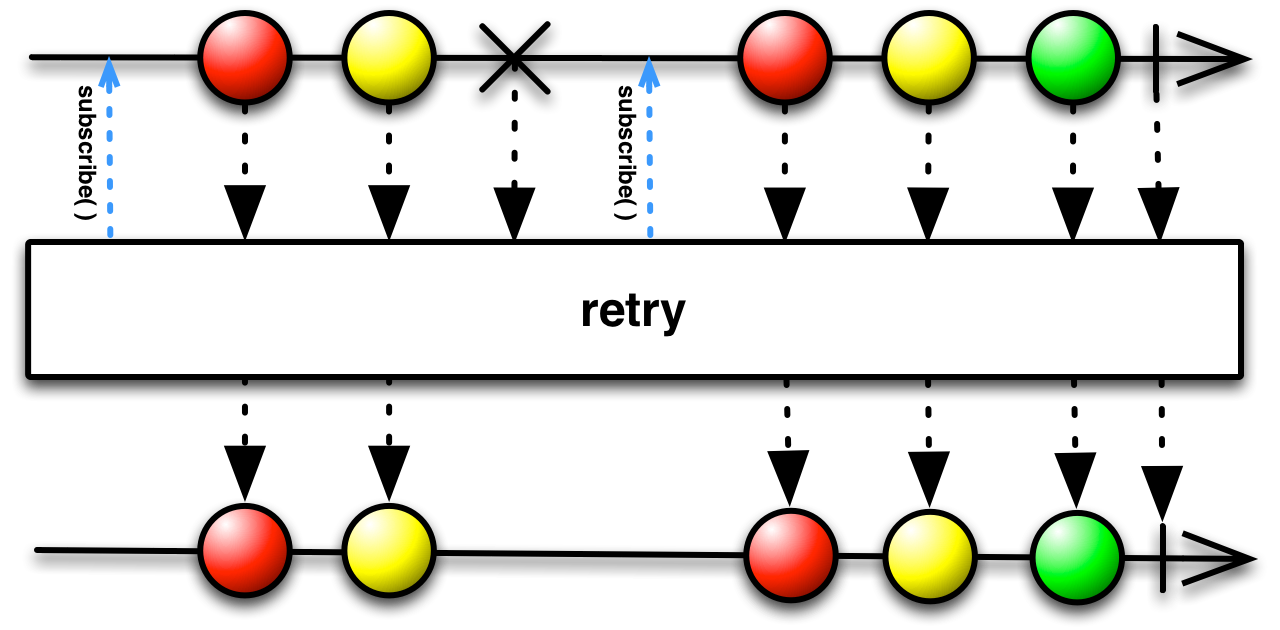
If the source Publisher calls onError(Throwable), this method will resubscribe to the source
Publisher rather than propagating the onError call.
Any and all items emitted by the source Publisher will be emitted by the resulting Publisher, even
those emitted during failed subscriptions. For example, if a Publisher fails at first but emits
[1, 2] then succeeds the second time and emits [1, 2, 3, 4, 5] then the complete sequence
of emissions and notifications would be [1, 2, 1, 2, 3, 4, 5, onComplete].
- Backpressure:
- The operator honors downstream backpressure and expects the source
Publisherto honor backpressure as well. If this expectation is violated, the operator may throw anIllegalStateException. - Scheduler:
retrydoes not operate by default on a particularScheduler.
Returns
- the source Publisher modified with retry logic
public final Flowable<T> retry (long count)
Returns a Flowable that mirrors the source Publisher, resubscribing to it if it calls onError
up to a specified number of retries.

If the source Publisher calls onError(Throwable), this method will resubscribe to the source
Publisher for a maximum of count resubscriptions rather than propagating the
onError call.
Any and all items emitted by the source Publisher will be emitted by the resulting Publisher, even
those emitted during failed subscriptions. For example, if a Publisher fails at first but emits
[1, 2] then succeeds the second time and emits [1, 2, 3, 4, 5] then the complete sequence
of emissions and notifications would be [1, 2, 1, 2, 3, 4, 5, onComplete].
- Backpressure:
- The operator honors downstream backpressure and expects the source
Publisherto honor backpressure as well. If this expectation is violated, the operator may throw anIllegalStateException. - Scheduler:
retrydoes not operate by default on a particularScheduler.
Parameters
| count | number of retry attempts before failing |
|---|
Returns
- the source Publisher modified with retry logic
public final Flowable<T> retry (long times, Predicate<? super Throwable> predicate)
Retries at most times or until the predicate returns false, whichever happens first.
- Backpressure:
- The operator honors downstream backpressure and expects the source
Publisherto honor backpressure as well. If this expectation is violated, the operator may throw anIllegalStateException. - Scheduler:
retrydoes not operate by default on a particularScheduler.
Parameters
| times | the number of times to repeat |
|---|---|
| predicate | the predicate called with the failure Throwable and should return true to trigger a retry. |
Returns
- the new Flowable instance
public final Flowable<T> retry (BiPredicate<? super Integer, ? super Throwable> predicate)
Returns a Flowable that mirrors the source Publisher, resubscribing to it if it calls onError
and the predicate returns true for that specific exception and retry count.

- Backpressure:
- The operator honors downstream backpressure and expects the source
Publisherto honor backpressure as well. If this expectation is violated, the operator may throw anIllegalStateException. - Scheduler:
retrydoes not operate by default on a particularScheduler.
Parameters
| predicate | the predicate that determines if a resubscription may happen in case of a specific exception and retry count |
|---|
Returns
- the source Publisher modified with retry logic
public final Flowable<T> retry (Predicate<? super Throwable> predicate)
Retries the current Flowable if the predicate returns true.
- Backpressure:
- The operator honors downstream backpressure and expects the source
Publisherto honor backpressure as well. If this expectation is violated, the operator may throw anIllegalStateException. - Scheduler:
retrydoes not operate by default on a particularScheduler.
Parameters
| predicate | the predicate that receives the failure Throwable and should return true to trigger a retry. |
|---|
Returns
- the new Flowable instance
public final Flowable<T> retryUntil (BooleanSupplier stop)
Retries until the given stop function returns true.
- Backpressure:
- The operator honors downstream backpressure and expects the source
Publisherto honor backpressure as well. If this expectation is violated, the operator may throw anIllegalStateException. - Scheduler:
retryUntildoes not operate by default on a particularScheduler.
Parameters
| stop | the function that should return true to stop retrying |
|---|
Returns
- the new Flowable instance
public final Flowable<T> retryWhen (Function<? super Flowable<Throwable>, ? extends Publisher<?>> handler)
Returns a Flowable that emits the same values as the source Publisher with the exception of an
onError. An onError notification from the source will result in the emission of a
Throwable item to the Publisher provided as an argument to the notificationHandler
function. If that Publisher calls onComplete or onError then retry will call
onComplete or onError on the child subscription. Otherwise, this Publisher will
resubscribe to the source Publisher.
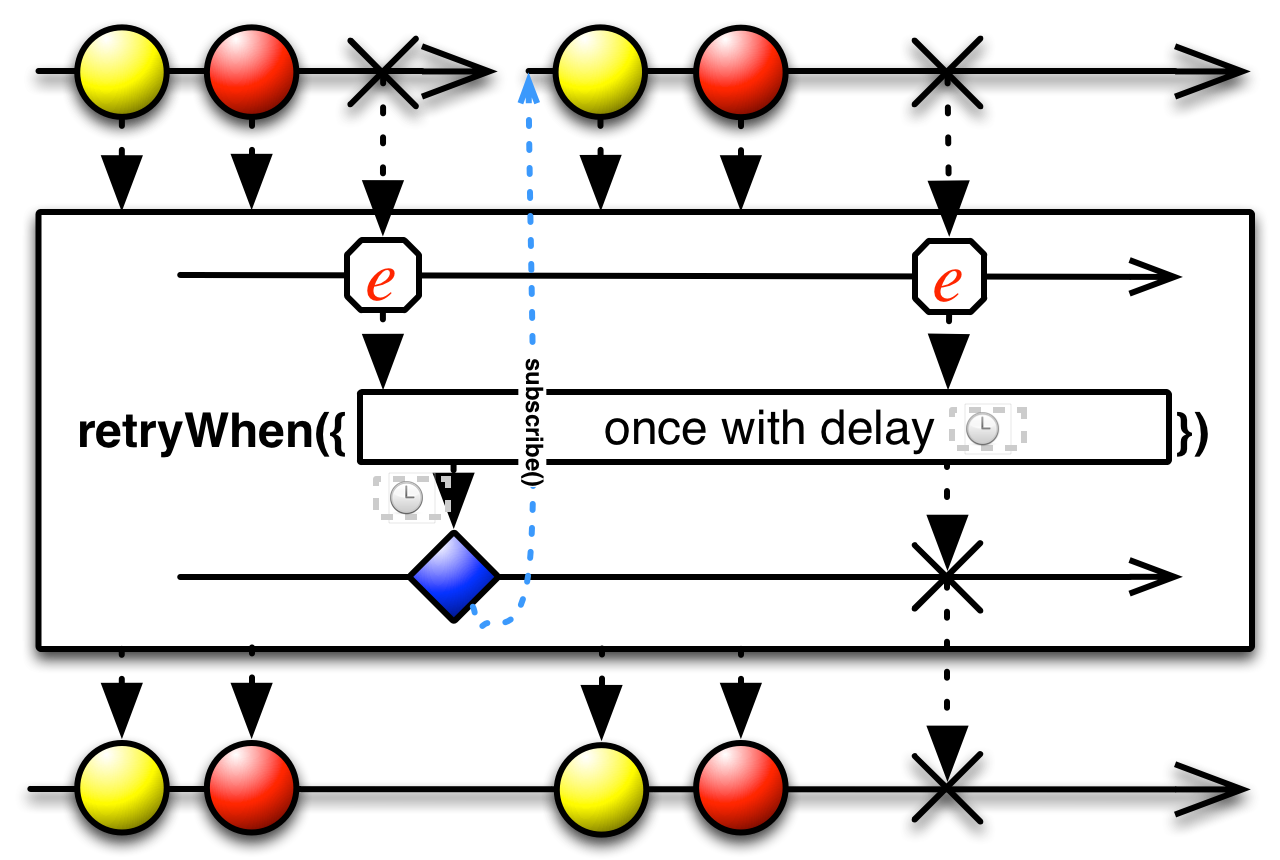 Example:
This retries 3 times, each time incrementing the number of seconds it waits.
Example:
This retries 3 times, each time incrementing the number of seconds it waits.
Publisher.create((Subscriber<? super String> s) -> {
System.out.println("subscribing");
s.onError(new RuntimeException("always fails"));
}).retryWhen(attempts -> {
return attempts.zipWith(Flowable.range(1, 3), (n, i) -> i).flatMap(i -> {
System.out.println("delay retry by " + i + " second(s)");
return Publisher.timer(i, TimeUnit.SECONDS);
});
}).blockingForEach(System.out::println);
subscribing
delay retry by 1 second(s)
subscribing
delay retry by 2 second(s)
subscribing
delay retry by 3 second(s)
subscribing
- Backpressure:
- The operator honors downstream backpressure and expects the source
Publisherto honor backpressure as well. If this expectation is violated, the operator may throw anIllegalStateException. - Scheduler:
retryWhendoes not operate by default on a particularScheduler.
Parameters
| handler | receives a Publisher of notifications with which a user can complete or error, aborting the retry |
|---|
Returns
- the source Publisher modified with retry logic
public final void safeSubscribe (Subscriber<? super T> s)
Subscribes to the current Flowable and wraps the given Subscriber into a SafeSubscriber (if not already a SafeSubscriber) that deals with exceptions thrown by a misbehaving Subscriber (that doesn't follow the Reactive-Streams specification).
- Backpressure:
- This operator leaves the reactive world and the backpressure behavior depends on the Subscriber's behavior.
- Scheduler:
safeSubscribedoes not operate by default on a particularScheduler.
Parameters
| s | the incoming Subscriber instance |
|---|
Throws
| NullPointerException | if s is null |
|---|
public final Flowable<T> sample (long period, TimeUnit unit, Scheduler scheduler)
Returns a Flowable that emits the most recently emitted item (if any) emitted by the source Publisher within periodic time intervals, where the intervals are defined on a particular Scheduler.
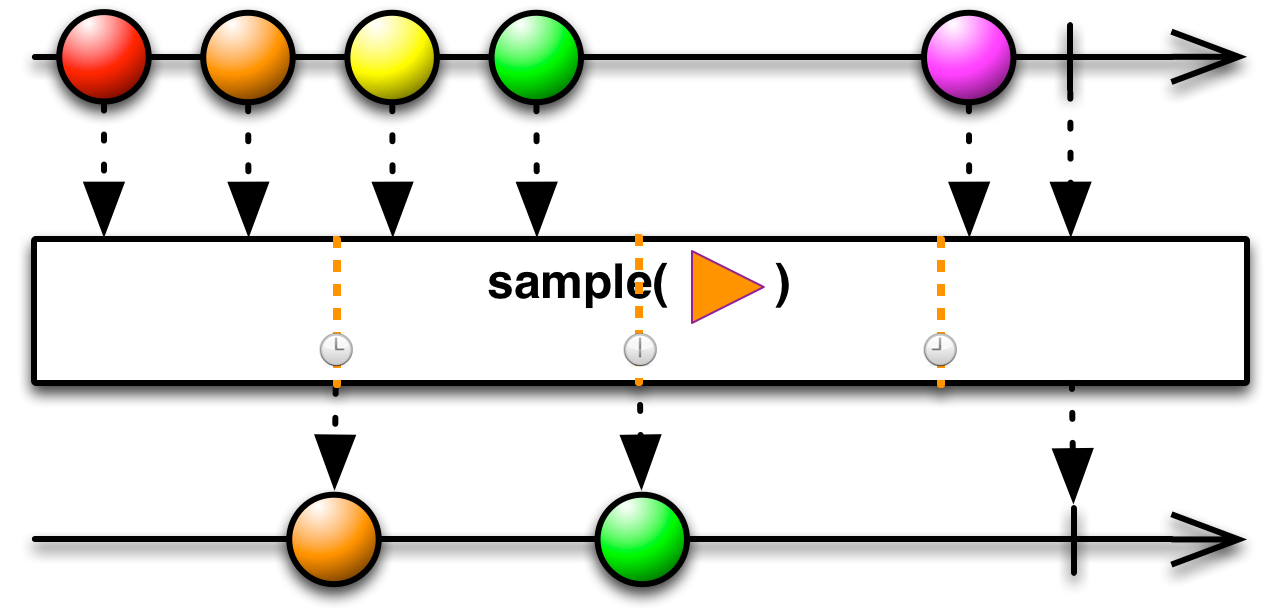
- Backpressure:
- This operator does not support backpressure as it uses time to control data flow.
- Scheduler:
- You specify which
Schedulerthis operator will use
Parameters
| period | the sampling rate |
|---|---|
| unit | the TimeUnit in which period is defined |
| scheduler | the Scheduler to use when sampling |
Returns
- a Flowable that emits the results of sampling the items emitted by the source Publisher at the specified time interval
public final Flowable<T> sample (long period, TimeUnit unit)
Returns a Flowable that emits the most recently emitted item (if any) emitted by the source Publisher within periodic time intervals.

- Backpressure:
- This operator does not support backpressure as it uses time to control data flow.
- Scheduler:
sampleoperates by default on thecomputationScheduler.
Parameters
| period | the sampling rate |
|---|---|
| unit | the TimeUnit in which period is defined |
Returns
- a Flowable that emits the results of sampling the items emitted by the source Publisher at the specified time interval
public final Flowable<T> sample (Publisher<U> sampler)
Returns a Flowable that, when the specified sampler Publisher emits an item or completes,
emits the most recently emitted item (if any) emitted by the source Publisher since the previous
emission from the sampler Publisher.
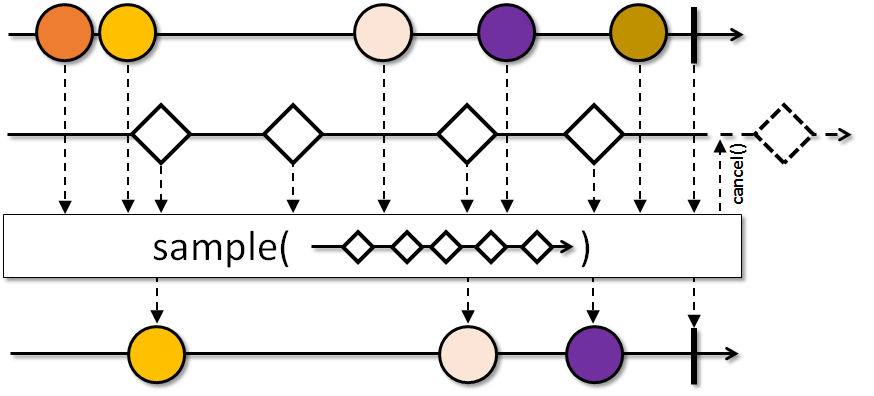
- Backpressure:
- This operator does not support backpressure as it uses the emissions of the
samplerPublisher to control data flow. - Scheduler:
- This version of
sampledoes not operate by default on a particularScheduler.
Parameters
| sampler | the Publisher to use for sampling the source Publisher |
|---|
Returns
- a Flowable that emits the results of sampling the items emitted by this Publisher whenever
the
samplerPublisher emits an item or completes
public final Flowable<T> sample (long period, TimeUnit unit, boolean emitLast)
Returns a Flowable that emits the most recently emitted item (if any) emitted by the source Publisher within periodic time intervals and optionally emit the very last upstream item when the upstream completes.
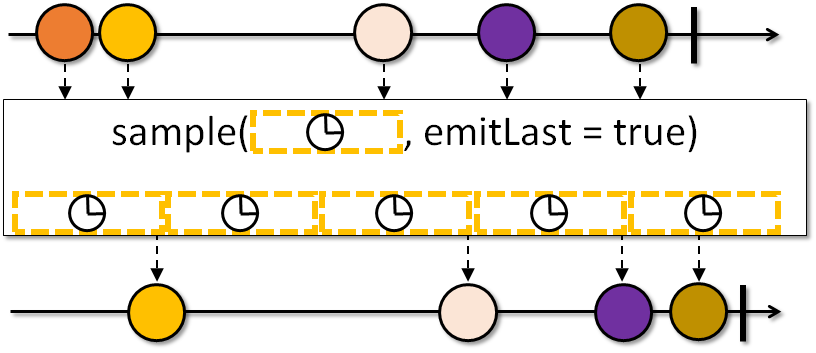
- Backpressure:
- This operator does not support backpressure as it uses time to control data flow.
- Scheduler:
sampleoperates by default on thecomputationScheduler.
History: 2.0.5 - experimental
Parameters
| period | the sampling rate |
|---|---|
| unit | the TimeUnit in which period is defined |
| emitLast | if true and the upstream completes while there is still an unsampled item available, that item is emitted to downstream before completion if false, an unsampled last item is ignored. |
Returns
- a Flowable that emits the results of sampling the items emitted by the source Publisher at the specified time interval
public final Flowable<T> sample (long period, TimeUnit unit, Scheduler scheduler, boolean emitLast)
Returns a Flowable that emits the most recently emitted item (if any) emitted by the source Publisher within periodic time intervals, where the intervals are defined on a particular Scheduler and optionally emit the very last upstream item when the upstream completes.
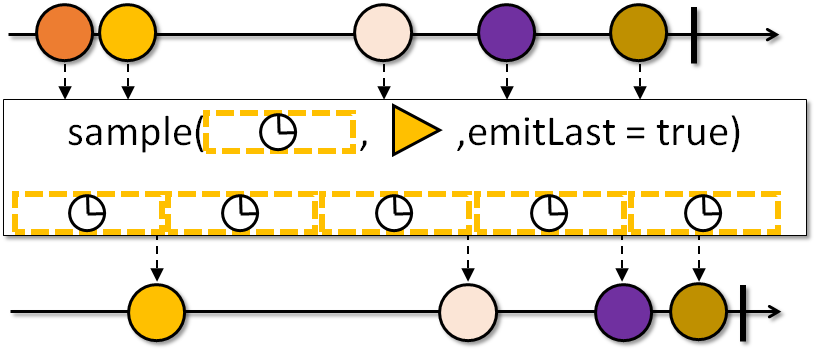
- Backpressure:
- This operator does not support backpressure as it uses time to control data flow.
- Scheduler:
- You specify which
Schedulerthis operator will use
History: 2.0.5 - experimental
Parameters
| period | the sampling rate |
|---|---|
| unit | the TimeUnit in which period is defined |
| scheduler | the Scheduler to use when sampling |
| emitLast | if true and the upstream completes while there is still an unsampled item available, that item is emitted to downstream before completion if false, an unsampled last item is ignored. |
Returns
- a Flowable that emits the results of sampling the items emitted by the source Publisher at the specified time interval
public final Flowable<T> sample (Publisher<U> sampler, boolean emitLast)
Returns a Flowable that, when the specified sampler Publisher emits an item or completes,
emits the most recently emitted item (if any) emitted by the source Publisher since the previous
emission from the sampler Publisher
and optionally emit the very last upstream item when the upstream or other Publisher complete.
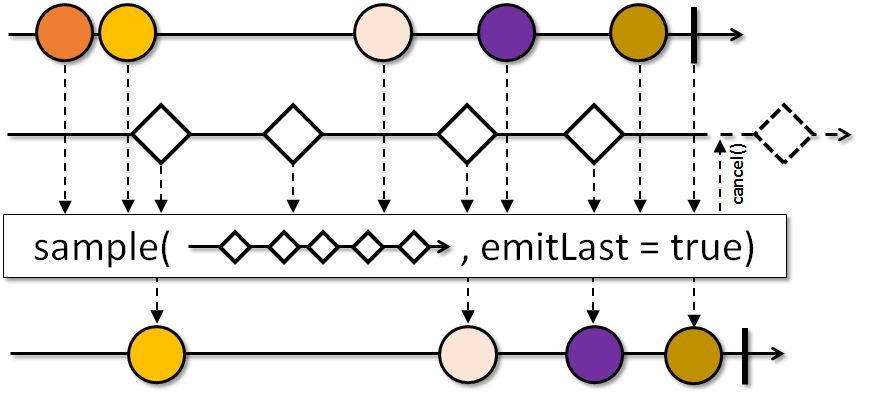
- Backpressure:
- This operator does not support backpressure as it uses the emissions of the
samplerPublisher to control data flow. - Scheduler:
- This version of
sampledoes not operate by default on a particularScheduler.
History: 2.0.5 - experimental
Parameters
| sampler | the Publisher to use for sampling the source Publisher |
|---|---|
| emitLast | if true and the upstream completes while there is still an unsampled item available, that item is emitted to downstream before completion if false, an unsampled last item is ignored. |
Returns
- a Flowable that emits the results of sampling the items emitted by this Publisher whenever
the
samplerPublisher emits an item or completes
public final Flowable<R> scan (R initialValue, BiFunction<R, ? super T, R> accumulator)
Returns a Flowable that applies a specified accumulator function to the first item emitted by a source Publisher and a seed value, then feeds the result of that function along with the second item emitted by the source Publisher into the same function, and so on until all items have been emitted by the source Publisher, emitting the result of each of these iterations.
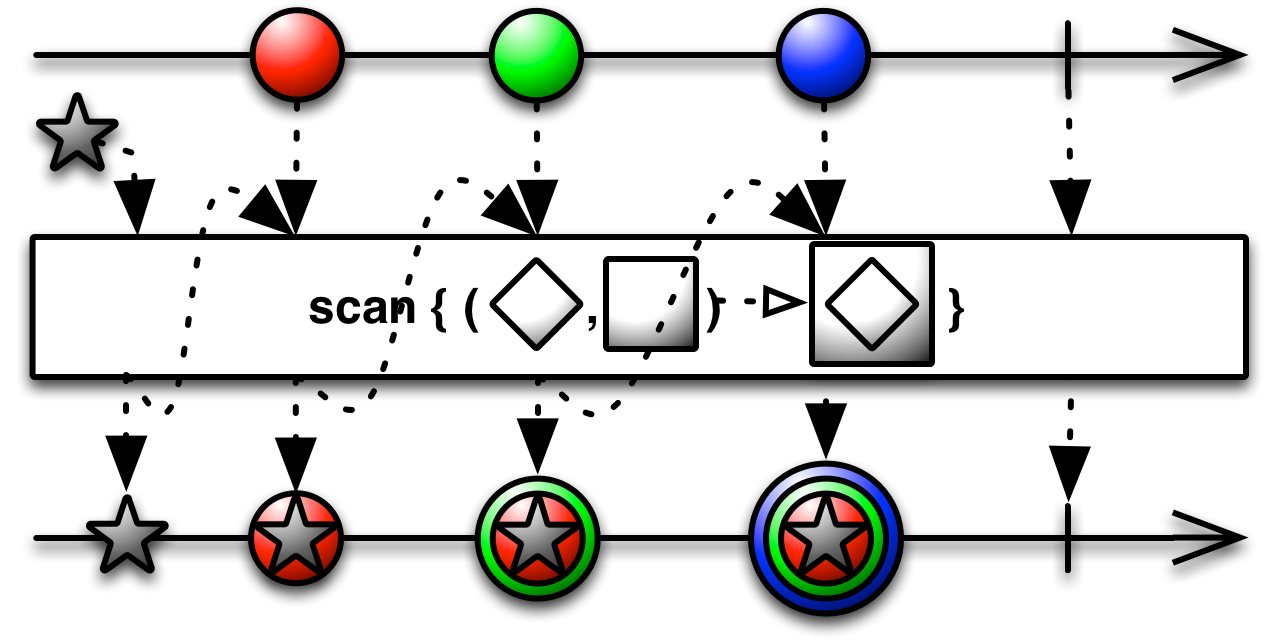
This sort of function is sometimes called an accumulator.
Note that the Publisher that results from this method will emit initialValue as its first
emitted item.
Note that the initialValue is shared among all subscribers to the resulting Publisher
and may cause problems if it is mutable. To make sure each subscriber gets its own value, defer
the application of this operator via defer(Callable):
Publisher<T> source = ...
Flowable.defer(() -> source.scan(new ArrayList<>(), (list, item) -> list.add(item)));
// alternatively, by using compose to stay fluent
source.compose(o ->
Flowable.defer(() -> o.scan(new ArrayList<>(), (list, item) -> list.add(item)))
);
- Backpressure:
- The operator honors downstream backpressure and expects the source
Publisherto honor backpressure as well. Violating this expectation, aMissingBackpressureExceptionmay get signalled somewhere downstream. - Scheduler:
scandoes not operate by default on a particularScheduler.
Parameters
| initialValue | the initial (seed) accumulator item |
|---|---|
| accumulator | an accumulator function to be invoked on each item emitted by the source Publisher, whose
result will be emitted to Subscribers via onNext and used in the
next accumulator call |
Returns
- a Flowable that emits
initialValuefollowed by the results of each call to the accumulator function
public final Flowable<T> scan (BiFunction<T, T, T> accumulator)
Returns a Flowable that applies a specified accumulator function to the first item emitted by a source Publisher, then feeds the result of that function along with the second item emitted by the source Publisher into the same function, and so on until all items have been emitted by the source Publisher, emitting the result of each of these iterations.

This sort of function is sometimes called an accumulator.
- Backpressure:
- The operator honors downstream backpressure and expects the source
Publisherto honor backpressure as well. Violating this expectation, aMissingBackpressureExceptionmay get signalled somewhere downstream. - Scheduler:
scandoes not operate by default on a particularScheduler.
Parameters
| accumulator | an accumulator function to be invoked on each item emitted by the source Publisher, whose
result will be emitted to Subscribers via onNext and used in the
next accumulator call |
|---|
Returns
- a Flowable that emits the results of each call to the accumulator function
public final Flowable<R> scanWith (Callable<R> seedSupplier, BiFunction<R, ? super T, R> accumulator)
Returns a Flowable that applies a specified accumulator function to the first item emitted by a source Publisher and a seed value, then feeds the result of that function along with the second item emitted by the source Publisher into the same function, and so on until all items have been emitted by the source Publisher, emitting the result of each of these iterations.

This sort of function is sometimes called an accumulator.
Note that the Publisher that results from this method will emit the value returned by
the seedSupplier as its first item.
- Backpressure:
- The operator honors downstream backpressure and expects the source
Publisherto honor backpressure as well. Violating this expectation, aMissingBackpressureExceptionmay get signalled somewhere downstream. - Scheduler:
scanWithdoes not operate by default on a particularScheduler.
Parameters
| seedSupplier | a Callable that returns the initial (seed) accumulator item for each individual Subscriber |
|---|---|
| accumulator | an accumulator function to be invoked on each item emitted by the source Publisher, whose
result will be emitted to Subscribers via onNext and used in the
next accumulator call |
Returns
- a Flowable that emits
initialValuefollowed by the results of each call to the accumulator function
public static Single<Boolean> sequenceEqual (Publisher<? extends T> source1, Publisher<? extends T> source2, BiPredicate<? super T, ? super T> isEqual, int bufferSize)
Returns a Single that emits a Boolean value that indicates whether two Publisher sequences are the same by comparing the items emitted by each Publisher pairwise based on the results of a specified equality function.
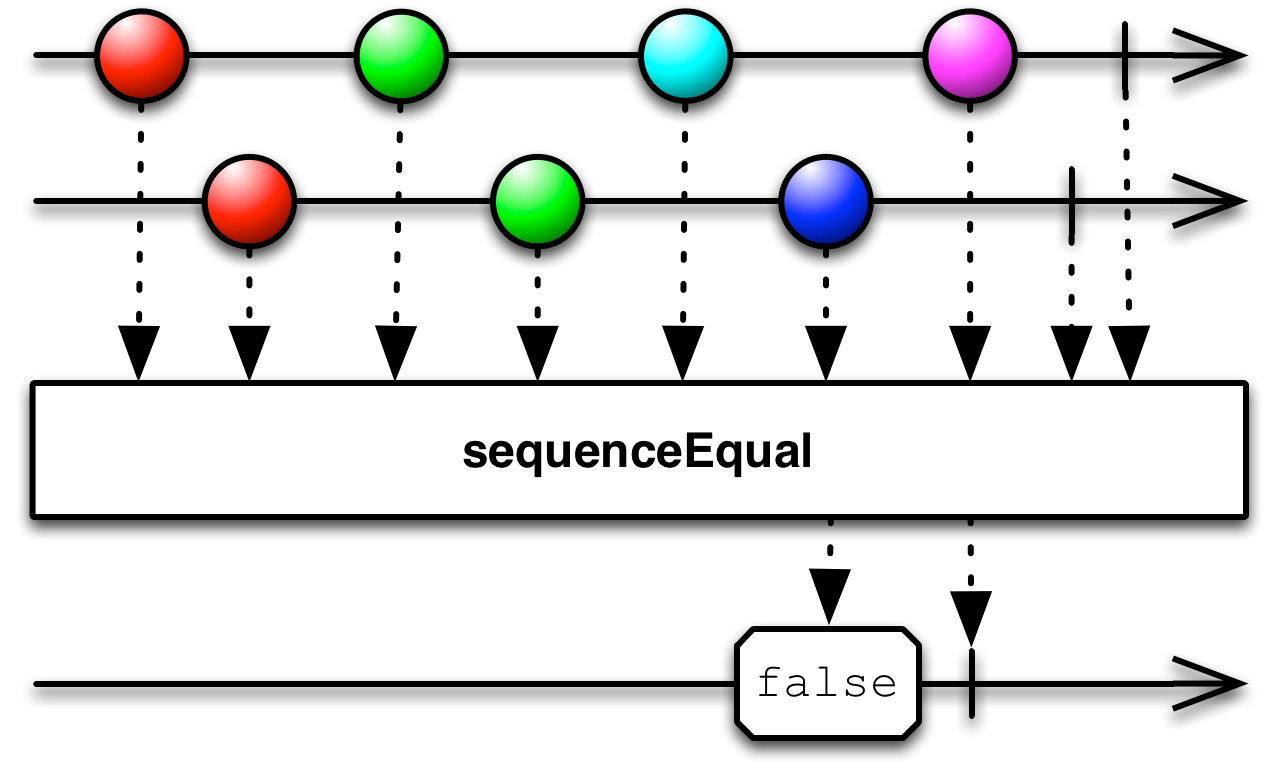
- Backpressure:
- The operator honors backpressure from downstream. The source
Publishers are expected to honor backpressure; if violated, the operator signals aMissingBackpressureException. - Scheduler:
sequenceEqualdoes not operate by default on a particularScheduler.
Parameters
| source1 | the first Publisher to compare |
|---|---|
| source2 | the second Publisher to compare |
| isEqual | a function used to compare items emitted by each Publisher |
| bufferSize | the number of items to prefetch from the first and second source Publisher |
Returns
- a Single that emits a Boolean value that indicates whether the two Publisher sequences are the same according to the specified function
public static Single<Boolean> sequenceEqual (Publisher<? extends T> source1, Publisher<? extends T> source2, int bufferSize)
Returns a Single that emits a Boolean value that indicates whether two Publisher sequences are the same by comparing the items emitted by each Publisher pairwise.

- Backpressure:
- This operator honors downstream backpressure and expects both of its sources to honor backpressure as well. If violated, the operator will emit a MissingBackpressureException.
- Scheduler:
sequenceEqualdoes not operate by default on a particularScheduler.
Parameters
| source1 | the first Publisher to compare |
|---|---|
| source2 | the second Publisher to compare |
| bufferSize | the number of items to prefetch from the first and second source Publisher |
Returns
- a Single that emits a Boolean value that indicates whether the two sequences are the same
public static Single<Boolean> sequenceEqual (Publisher<? extends T> source1, Publisher<? extends T> source2)
Returns a Single that emits a Boolean value that indicates whether two Publisher sequences are the same by comparing the items emitted by each Publisher pairwise.

- Backpressure:
- This operator honors downstream backpressure and expects both of its sources to honor backpressure as well. If violated, the operator will emit a MissingBackpressureException.
- Scheduler:
sequenceEqualdoes not operate by default on a particularScheduler.
Parameters
| source1 | the first Publisher to compare |
|---|---|
| source2 | the second Publisher to compare |
Returns
- a Flowable that emits a Boolean value that indicates whether the two sequences are the same
public static Single<Boolean> sequenceEqual (Publisher<? extends T> source1, Publisher<? extends T> source2, BiPredicate<? super T, ? super T> isEqual)
Returns a Single that emits a Boolean value that indicates whether two Publisher sequences are the same by comparing the items emitted by each Publisher pairwise based on the results of a specified equality function.

- Backpressure:
- The operator honors backpressure from downstream. The source
Publishers are expected to honor backpressure; if violated, the operator signals aMissingBackpressureException. - Scheduler:
sequenceEqualdoes not operate by default on a particularScheduler.
Parameters
| source1 | the first Publisher to compare |
|---|---|
| source2 | the second Publisher to compare |
| isEqual | a function used to compare items emitted by each Publisher |
Returns
- a Single that emits a Boolean value that indicates whether the two Publisher sequences are the same according to the specified function
public final Flowable<T> serialize ()
Forces a Publisher's emissions and notifications to be serialized and for it to obey the Publisher contract in other ways.
It is possible for a Publisher to invoke its Subscribers' methods asynchronously, perhaps from
different threads. This could make such a Publisher poorly-behaved, in that it might try to invoke
onComplete or onError before one of its onNext invocations, or it might call
onNext from two different threads concurrently. You can force such a Publisher to be
well-behaved and sequential by applying the serialize method to it.
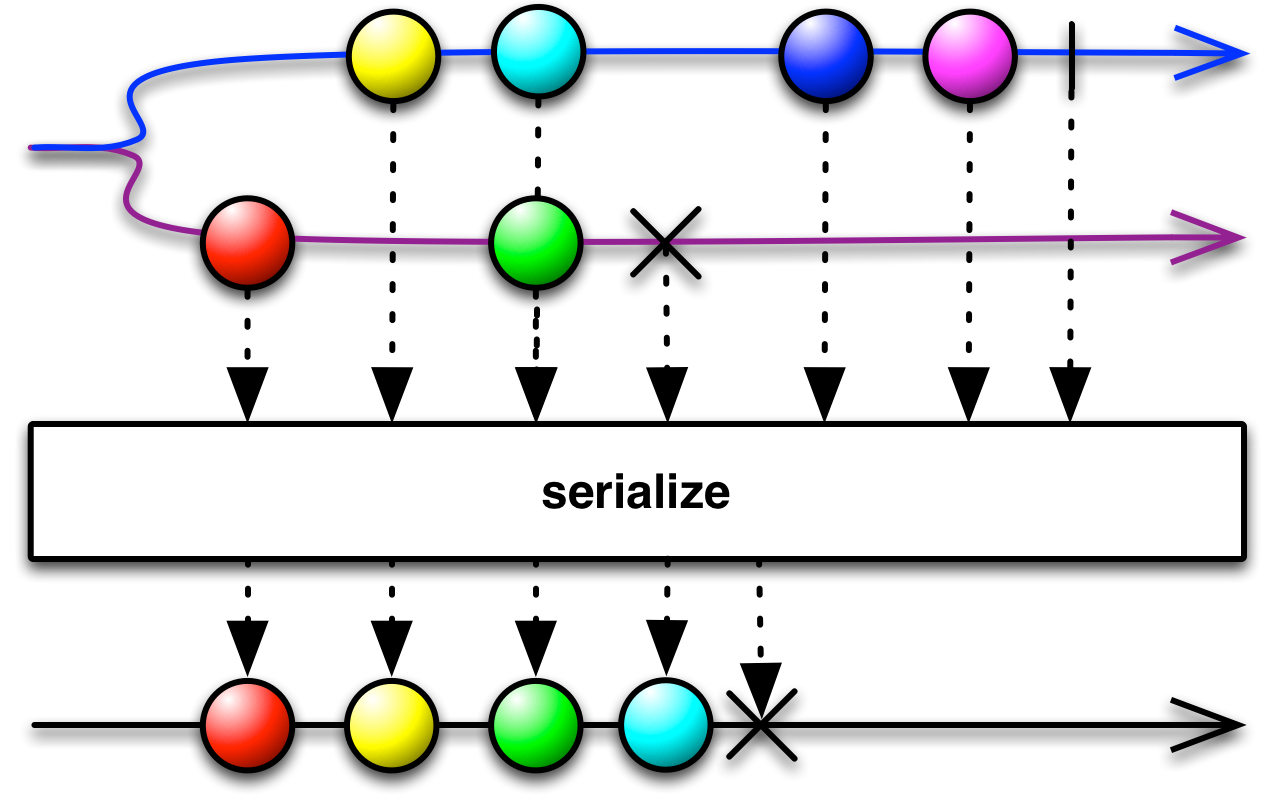
- Backpressure:
- The operator doesn't interfere with backpressure which is determined by the source
Publisher's backpressure behavior. - Scheduler:
serializedoes not operate by default on a particularScheduler.
Returns
- a Publisher that is guaranteed to be well-behaved and to make only serialized calls to its Subscribers
public final Flowable<T> share ()
Returns a new Publisher that multicasts (shares) the original Publisher. As long as there is at least one Subscriber this Publisher will be subscribed and emitting data. When all subscribers have cancelled it will cancel the source Publisher.
This is an alias for publish().refCount().
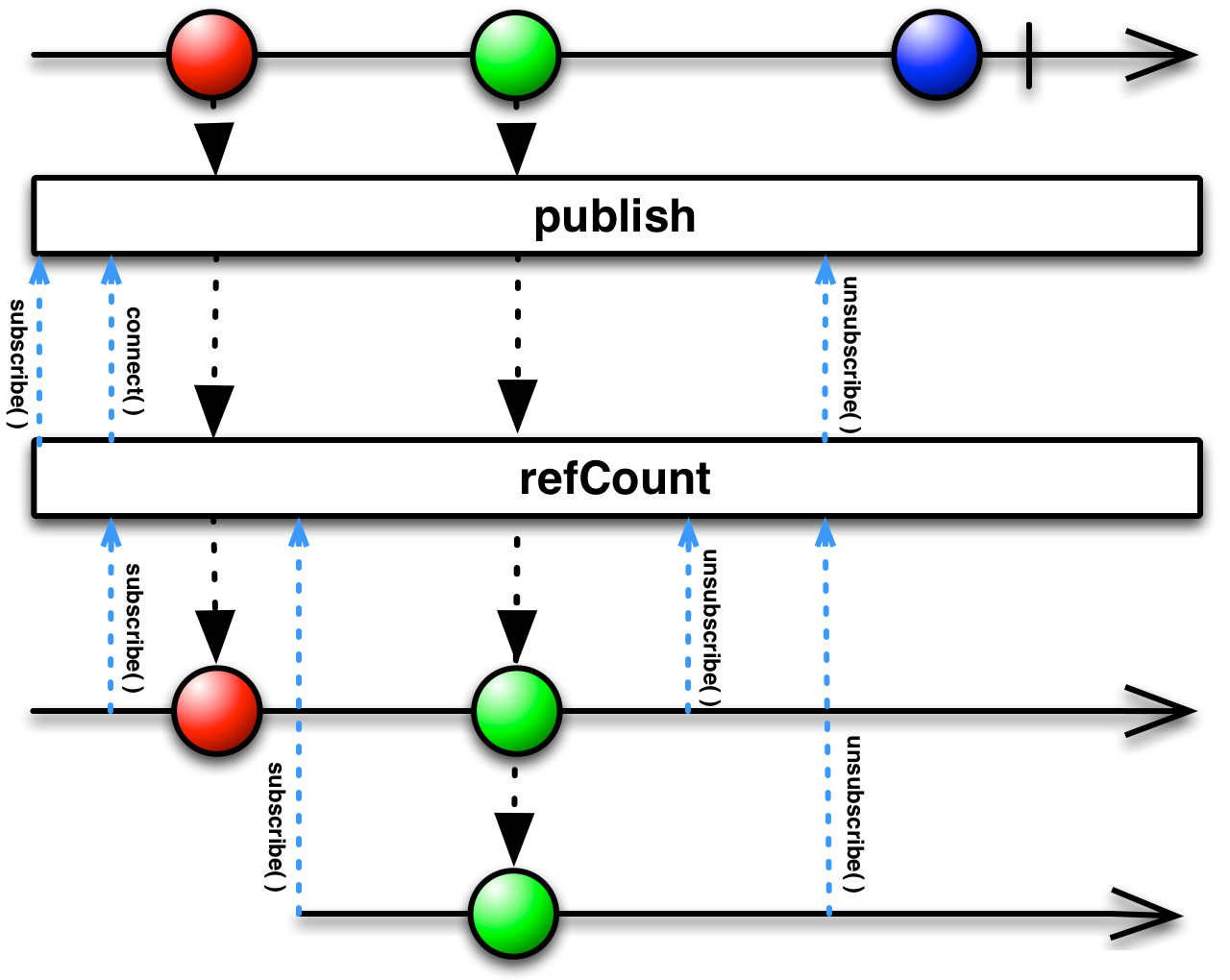
- Backpressure:
- The operator honors backpressure and and expects the source
Publisherto honor backpressure as well. If this expectation is violated, the operator will signal aMissingBackpressureExceptionto itsSubscribers. - Scheduler:
sharedoes not operate by default on a particularScheduler.
Returns
- a
Publisherthat upon connection causes the sourcePublisherto emit items to its Subscribers
public final Single<T> single (T defaultItem)
Returns a Single that emits the single item emitted by the source Publisher, if that Publisher
emits only a single item, or a default item if the source Publisher emits no items. If the source
Publisher emits more than one item, an IllegalArgumentException is signalled instead.
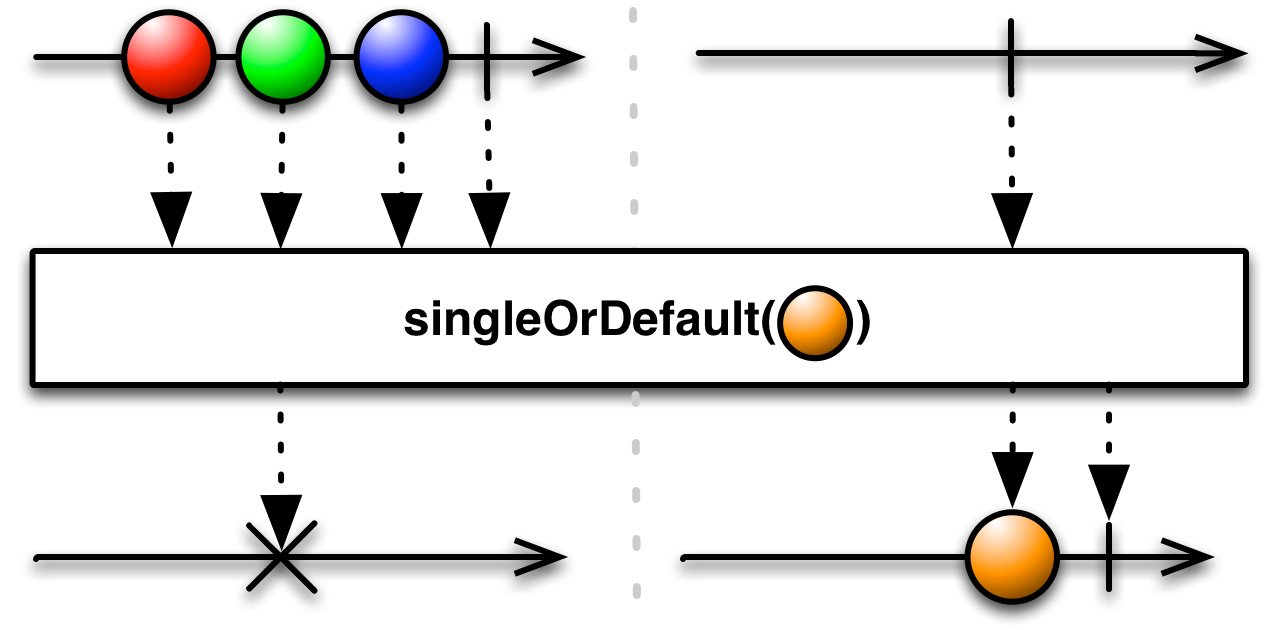
- Backpressure:
- The operator honors backpressure from downstream and consumes the source
Publisherin an unbounded manner (i.e., without applying backpressure). - Scheduler:
singledoes not operate by default on a particularScheduler.
Parameters
| defaultItem | a default value to emit if the source Publisher emits no item |
|---|
Returns
- a Single that emits the single item emitted by the source Publisher, or a default item if the source Publisher is empty
public final Maybe<T> singleElement ()
Returns a Maybe that completes if this Flowable is empty, signals one item if this Flowable
signals exactly one item or signals an IllegalArgumentException if this Flowable signals
more than one item.

- Backpressure:
- The operator honors backpressure from downstream and consumes the source
Publisherin an unbounded manner (i.e., without applying backpressure). - Scheduler:
singleElementdoes not operate by default on a particularScheduler.
Returns
- a Maybe that emits the single item emitted by the source Publisher
public final Single<T> singleOrError ()
Returns a Single that emits the single item emitted by this Flowable, if this Flowable
emits only a single item, otherwise
if this Flowable completes without emitting any items a NoSuchElementException will be signalled and
if this Flowable emits more than one item, an IllegalArgumentException will be signalled.

- Backpressure:
- The operator honors backpressure from downstream and consumes the source
Publisherin an unbounded manner (i.e., without applying backpressure). - Scheduler:
singleOrErrordoes not operate by default on a particularScheduler.
Returns
- the new Single instance
public final Flowable<T> skip (long count)
Returns a Flowable that skips the first count items emitted by the source Publisher and emits
the remainder.

- Backpressure:
- The operator doesn't interfere with backpressure which is determined by the source
Publisher's backpressure behavior. - Scheduler:
- This version of
skipdoes not operate by default on a particularScheduler.
Parameters
| count | the number of items to skip |
|---|
Returns
- a Flowable that is identical to the source Publisher except that it does not emit the first
countitems that the source Publisher emits
public final Flowable<T> skip (long time, TimeUnit unit, Scheduler scheduler)
Returns a Flowable that skips values emitted by the source Publisher before a specified time window
on a specified Scheduler elapses.
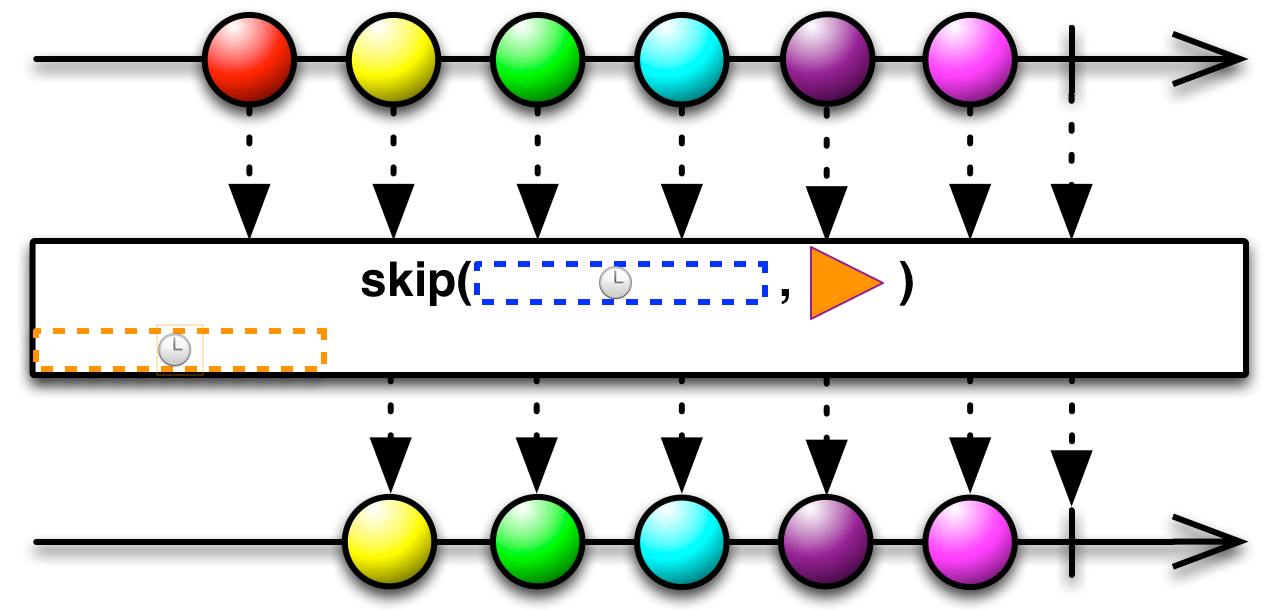
- Backpressure:
- The operator doesn't support backpressure as it uses time to skip arbitrary number of elements and
thus has to consume the source
Publisherin an unbounded manner (i.e., no backpressure applied to it). - Scheduler:
- You specify which
Schedulerthis operator will use for the timed skipping
Parameters
| time | the length of the time window to skip |
|---|---|
| unit | the time unit of time |
| scheduler | the Scheduler on which the timed wait happens |
Returns
- a Flowable that skips values emitted by the source Publisher before the time window defined
by
timeandschedulerelapses, and then emits the remainder
public final Flowable<T> skip (long time, TimeUnit unit)
Returns a Flowable that skips values emitted by the source Publisher before a specified time window elapses.
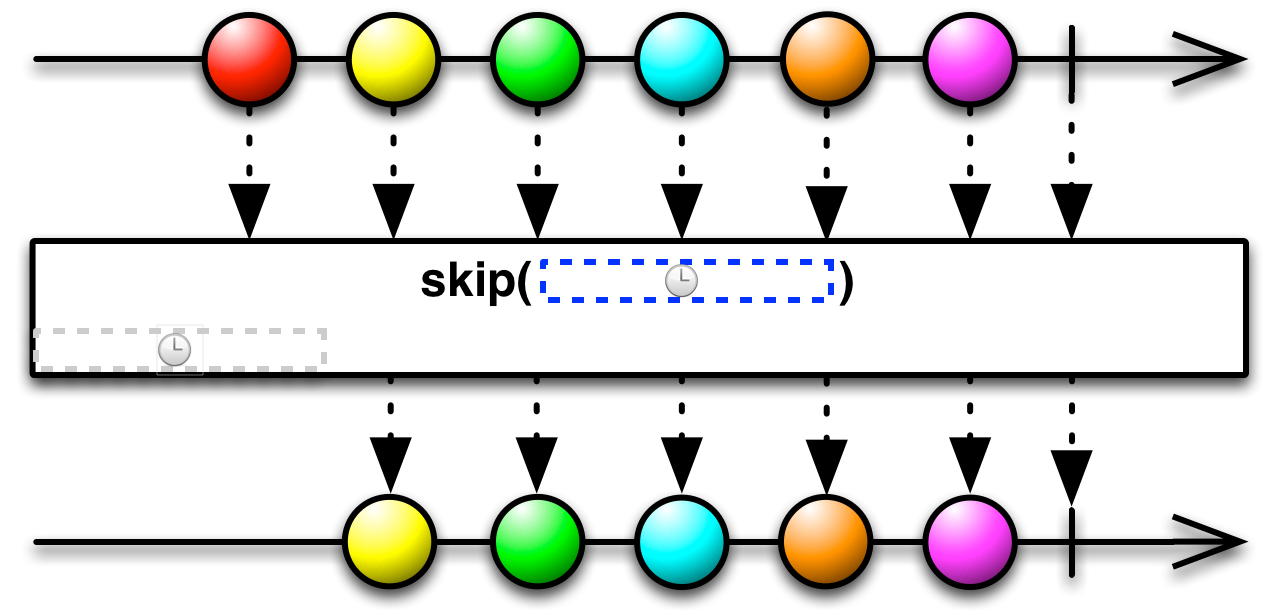
- Backpressure:
- The operator doesn't support backpressure as it uses time to skip arbitrary number of elements and
thus has to consume the source
Publisherin an unbounded manner (i.e., no backpressure applied to it). - Scheduler:
skipdoes not operate on any particular scheduler but uses the current time from thecomputationScheduler.
Parameters
| time | the length of the time window to skip |
|---|---|
| unit | the time unit of time |
Returns
- a Flowable that skips values emitted by the source Publisher before the time window defined
by
timeelapses and the emits the remainder
public final Flowable<T> skipLast (int count)
Returns a Flowable that drops a specified number of items from the end of the sequence emitted by the source Publisher.
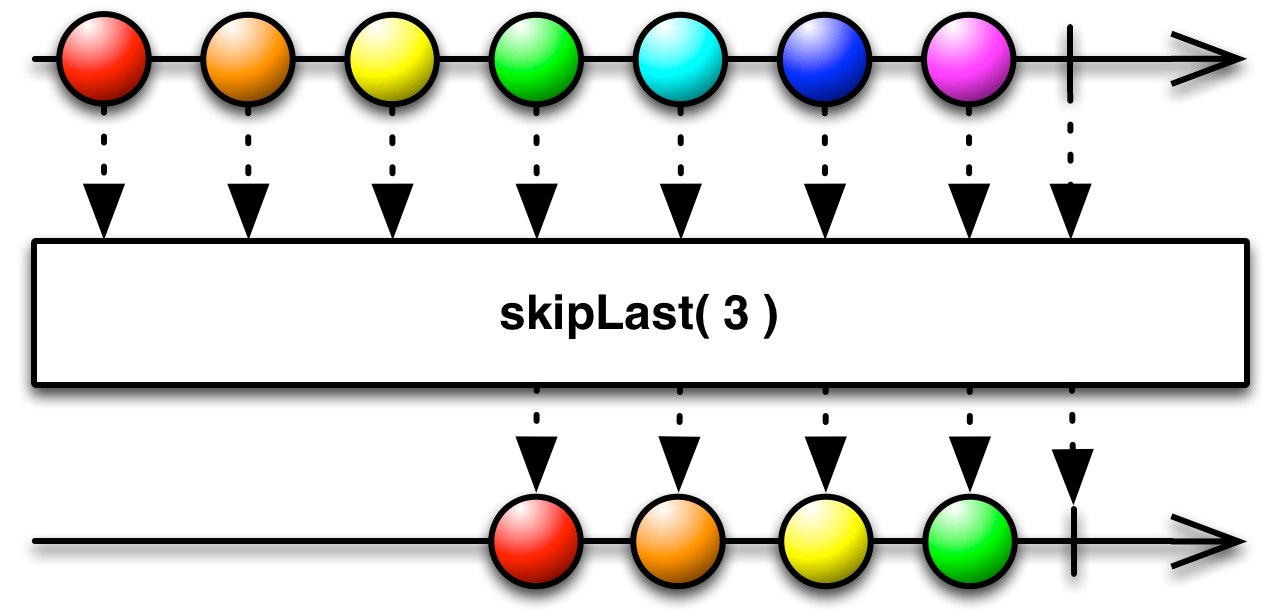
This Subscriber accumulates a queue long enough to store the first count items. As more items are
received, items are taken from the front of the queue and emitted by the returned Publisher. This causes
such items to be delayed.
- Backpressure:
- The operator doesn't interfere with backpressure which is determined by the source
Publisher's backpressure behavior. - Scheduler:
- This version of
skipLastdoes not operate by default on a particularScheduler.
Parameters
| count | number of items to drop from the end of the source sequence |
|---|
Returns
- a Flowable that emits the items emitted by the source Publisher except for the dropped ones at the end
Throws
| IndexOutOfBoundsException | if count is less than zero |
|---|
public final Flowable<T> skipLast (long time, TimeUnit unit)
Returns a Flowable that drops items emitted by the source Publisher during a specified time window before the source completes.
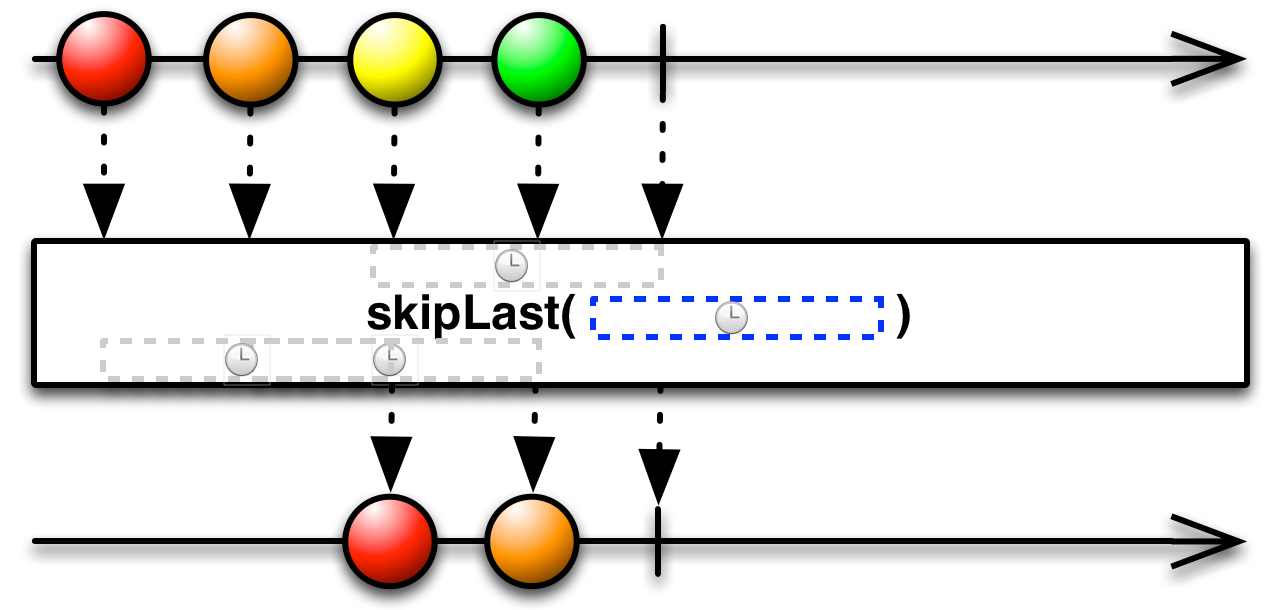
Note: this action will cache the latest items arriving in the specified time window.
- Backpressure:
- The operator doesn't support backpressure as it uses time to skip arbitrary number of elements and
thus has to consume the source
Publisherin an unbounded manner (i.e., no backpressure applied to it). - Scheduler:
skipLastdoes not operate on any particular scheduler but uses the current time from thecomputationScheduler.
Parameters
| time | the length of the time window |
|---|---|
| unit | the time unit of time |
Returns
- a Flowable that drops those items emitted by the source Publisher in a time window before the
source completes defined by
time
public final Flowable<T> skipLast (long time, TimeUnit unit, boolean delayError)
Returns a Flowable that drops items emitted by the source Publisher during a specified time window before the source completes.

Note: this action will cache the latest items arriving in the specified time window.
- Backpressure:
- The operator doesn't support backpressure as it uses time to skip arbitrary number of elements and
thus has to consume the source
Publisherin an unbounded manner (i.e., no backpressure applied to it). - Scheduler:
skipLastdoes not operate on any particular scheduler but uses the current time from thecomputationScheduler.
Parameters
| time | the length of the time window |
|---|---|
| unit | the time unit of time |
| delayError | if true, an exception signalled by the current Flowable is delayed until the regular elements are consumed by the downstream; if false, an exception is immediately signalled and all regular elements dropped |
Returns
- a Flowable that drops those items emitted by the source Publisher in a time window before the
source completes defined by
time
public final Flowable<T> skipLast (long time, TimeUnit unit, Scheduler scheduler)
Returns a Flowable that drops items emitted by the source Publisher during a specified time window (defined on a specified scheduler) before the source completes.
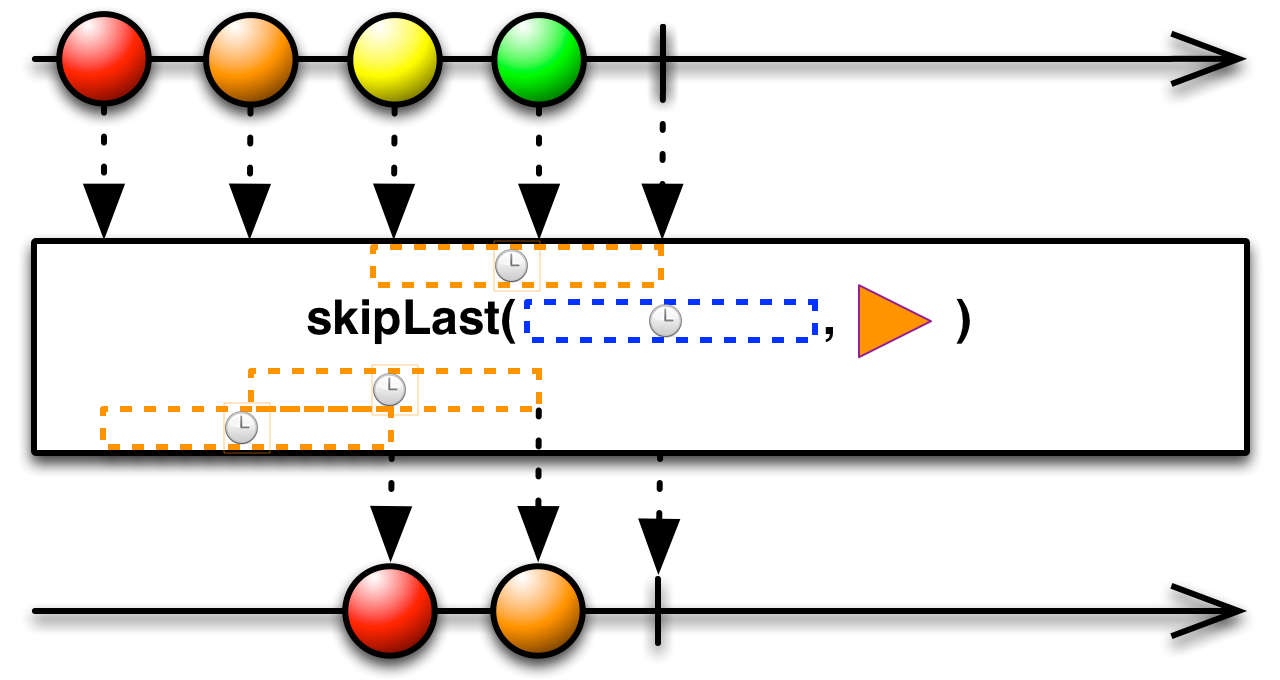
Note: this action will cache the latest items arriving in the specified time window.
- Backpressure:
- The operator doesn't support backpressure as it uses time to skip arbitrary number of elements and
thus has to consume the source
Publisherin an unbounded manner (i.e., no backpressure applied to it). - Scheduler:
- You specify which
Schedulerthis operator will use for tracking the current time
Parameters
| time | the length of the time window |
|---|---|
| unit | the time unit of time |
| scheduler | the scheduler used as the time source |
Returns
- a Flowable that drops those items emitted by the source Publisher in a time window before the
source completes defined by
timeandscheduler
public final Flowable<T> skipLast (long time, TimeUnit unit, Scheduler scheduler, boolean delayError, int bufferSize)
Returns a Flowable that drops items emitted by the source Publisher during a specified time window (defined on a specified scheduler) before the source completes.

Note: this action will cache the latest items arriving in the specified time window.
- Backpressure:
- The operator doesn't support backpressure as it uses time to skip arbitrary number of elements and
thus has to consume the source
Publisherin an unbounded manner (i.e., no backpressure applied to it). - Scheduler:
- You specify which
Schedulerthis operator will use
Parameters
| time | the length of the time window |
|---|---|
| unit | the time unit of time |
| scheduler | the scheduler used as the time source |
| delayError | if true, an exception signalled by the current Flowable is delayed until the regular elements are consumed by the downstream; if false, an exception is immediately signalled and all regular elements dropped |
| bufferSize | the hint about how many elements to expect to be skipped |
Returns
- a Flowable that drops those items emitted by the source Publisher in a time window before the
source completes defined by
timeandscheduler
public final Flowable<T> skipLast (long time, TimeUnit unit, Scheduler scheduler, boolean delayError)
Returns a Flowable that drops items emitted by the source Publisher during a specified time window (defined on a specified scheduler) before the source completes.

Note: this action will cache the latest items arriving in the specified time window.
- Backpressure:
- The operator doesn't support backpressure as it uses time to skip arbitrary number of elements and
thus has to consume the source
Publisherin an unbounded manner (i.e., no backpressure applied to it). - Scheduler:
- You specify which
Schedulerthis operator will use to track the current time
Parameters
| time | the length of the time window |
|---|---|
| unit | the time unit of time |
| scheduler | the scheduler used as the time source |
| delayError | if true, an exception signalled by the current Flowable is delayed until the regular elements are consumed by the downstream; if false, an exception is immediately signalled and all regular elements dropped |
Returns
- a Flowable that drops those items emitted by the source Publisher in a time window before the
source completes defined by
timeandscheduler
public final Flowable<T> skipUntil (Publisher<U> other)
Returns a Flowable that skips items emitted by the source Publisher until a second Publisher emits an item.
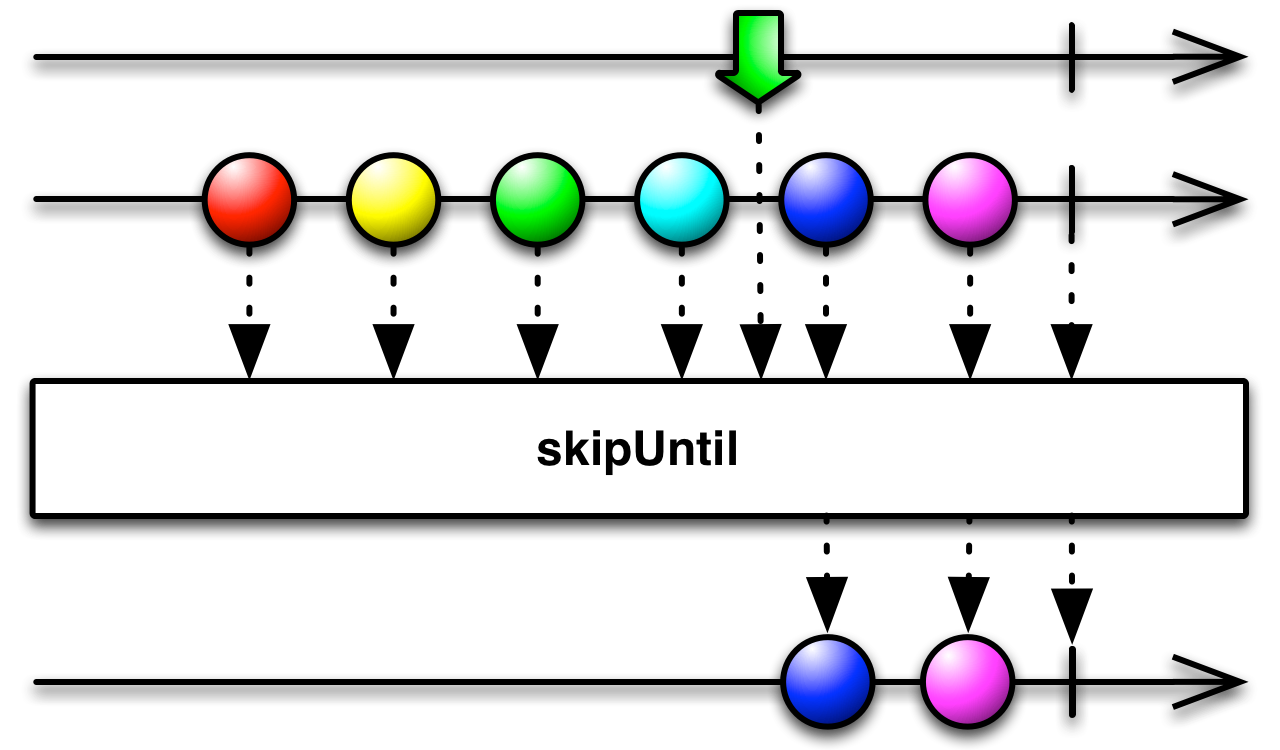
- Backpressure:
- The operator doesn't interfere with backpressure which is determined by the source
Publisher's backpressure behavior. - Scheduler:
skipUntildoes not operate by default on a particularScheduler.
Parameters
| other | the second Publisher that has to emit an item before the source Publisher's elements begin to be mirrored by the resulting Publisher |
|---|
Returns
- a Flowable that skips items from the source Publisher until the second Publisher emits an item, then emits the remaining items
public final Flowable<T> skipWhile (Predicate<? super T> predicate)
Returns a Flowable that skips all items emitted by the source Publisher as long as a specified condition holds true, but emits all further source items as soon as the condition becomes false.
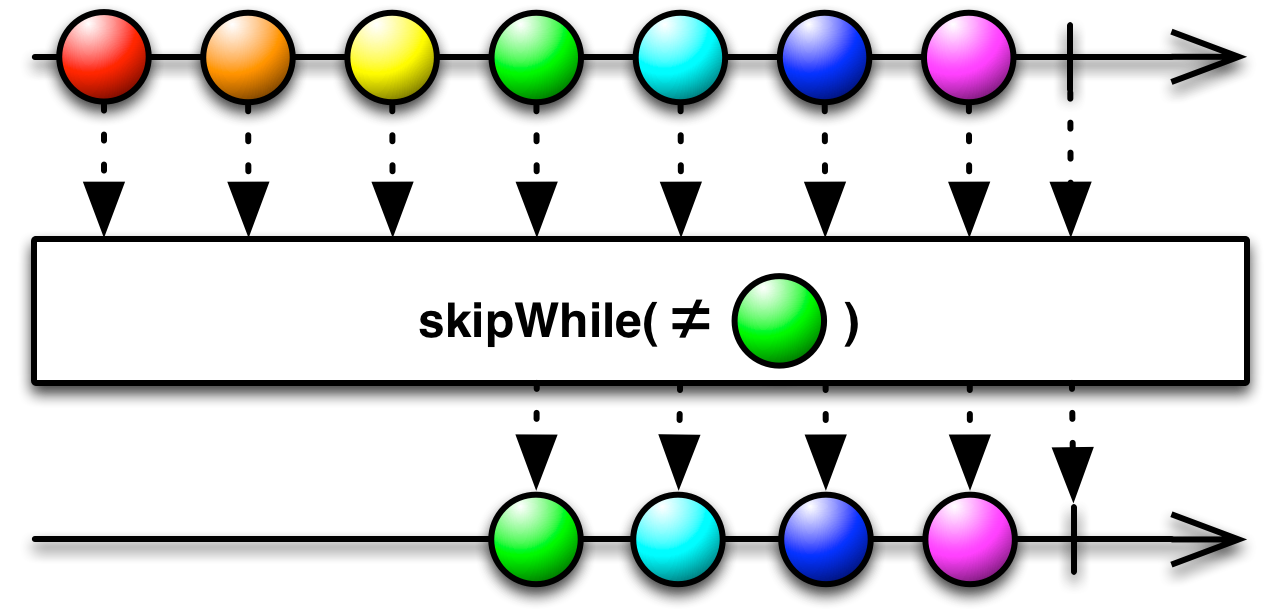
- Backpressure:
- The operator doesn't interfere with backpressure which is determined by the source
Publisher's backpressure behavior. - Scheduler:
skipWhiledoes not operate by default on a particularScheduler.
Parameters
| predicate | a function to test each item emitted from the source Publisher |
|---|
Returns
- a Flowable that begins emitting items emitted by the source Publisher when the specified predicate becomes false
public final Flowable<T> sorted ()
Returns a Flowable that emits the events emitted by source Publisher, in a
sorted order. Each item emitted by the Publisher must implement Comparable with respect to all
other items in the sequence.
If any item emitted by this Flowable does not implement Comparable with respect to
all other items emitted by this Flowable, no items will be emitted and the
sequence is terminated with a ClassCastException.
Note that calling sorted with long, non-terminating or infinite sources
might cause OutOfMemoryError
- Backpressure:
- The operator honors backpressure from downstream and consumes the source
Publisherin an unbounded manner (i.e., without applying backpressure to it). - Scheduler:
sorteddoes not operate by default on a particularScheduler.
Returns
- a Flowable that emits the items emitted by the source Publisher in sorted order
public final Flowable<T> sorted (Comparator<? super T> sortFunction)
Returns a Flowable that emits the events emitted by source Publisher, in a sorted order based on a specified comparison function.
Note that calling sorted with long, non-terminating or infinite sources
might cause OutOfMemoryError
- Backpressure:
- The operator honors backpressure from downstream and consumes the source
Publisherin an unbounded manner (i.e., without applying backpressure to it). - Scheduler:
sorteddoes not operate by default on a particularScheduler.
Parameters
| sortFunction | a function that compares two items emitted by the source Publisher and returns an Integer that indicates their sort order |
|---|
Returns
- a Flowable that emits the items emitted by the source Publisher in sorted order
public final Flowable<T> startWith (Publisher<? extends T> other)
Returns a Flowable that emits the items in a specified Publisher before it begins to emit items emitted by the source Publisher.
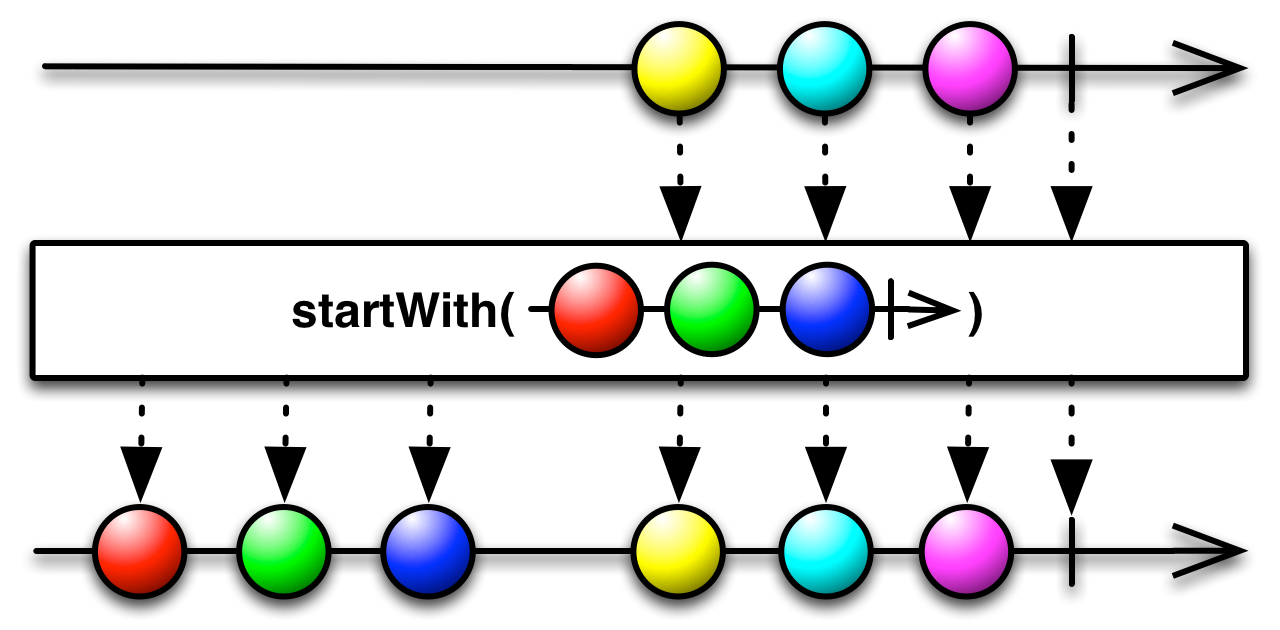
- Backpressure:
- The operator honors backpressure from downstream. Both this and the
otherPublishers are expected to honor backpressure as well. If any of then violates this rule, it may throw anIllegalStateExceptionwhen the sourcePublishercompletes. - Scheduler:
startWithdoes not operate by default on a particularScheduler.
Parameters
| other | a Publisher that contains the items you want the modified Publisher to emit first |
|---|
Returns
- a Flowable that emits the items in the specified Publisher and then emits the items emitted by the source Publisher
public final Flowable<T> startWith (Iterable<? extends T> items)
Returns a Flowable that emits the items in a specified Iterable before it begins to emit items
emitted by the source Publisher.
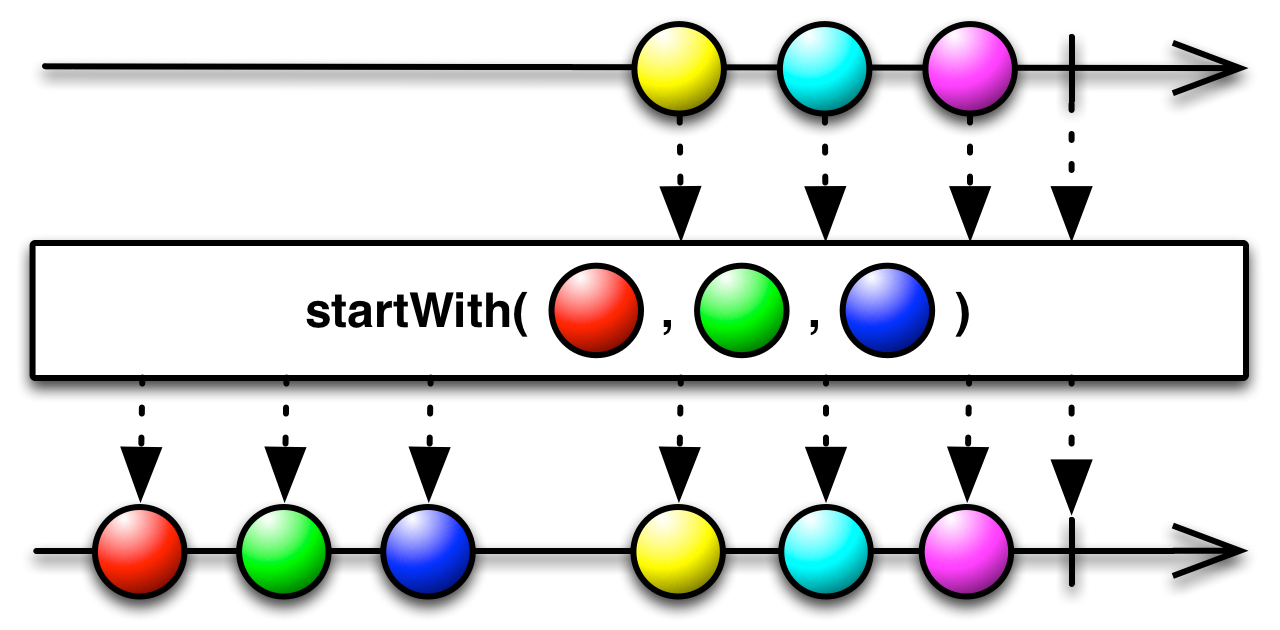
- Backpressure:
- The operator honors backpressure from downstream. The source
Publisheris expected to honor backpressure as well. If it violates this rule, it may throw anIllegalStateExceptionwhen the sourcePublishercompletes. - Scheduler:
startWithdoes not operate by default on a particularScheduler.
Parameters
| items | an Iterable that contains the items you want the modified Publisher to emit first |
|---|
Returns
- a Flowable that emits the items in the specified
Iterableand then emits the items emitted by the source Publisher
public final Flowable<T> startWith (T value)
Returns a Flowable that emits a specified item before it begins to emit items emitted by the source Publisher.

- Backpressure:
- The operator honors backpressure from downstream. The source
Publisheris expected to honor backpressure as well. If it violates this rule, it may throw anIllegalStateExceptionwhen the sourcePublishercompletes. - Scheduler:
startWithdoes not operate by default on a particularScheduler.
Parameters
| value | the item to emit first |
|---|
Returns
- a Flowable that emits the specified item before it begins to emit items emitted by the source Publisher
public final Flowable<T> startWithArray (T... items)
Returns a Flowable that emits the specified items before it begins to emit items emitted by the source Publisher.

- Backpressure:
- The operator honors backpressure from downstream. The source
Publisheris expected to honor backpressure as well. If it violates this rule, it may throw anIllegalStateExceptionwhen the sourcePublishercompletes. - Scheduler:
startWithArraydoes not operate by default on a particularScheduler.
Parameters
| items | the array of values to emit first |
|---|
Returns
- a Flowable that emits the specified items before it begins to emit items emitted by the source Publisher
public final void subscribe (FlowableSubscriber<? super T> s)
Establish a connection between this Flowable and the given FlowableSubscriber and start streaming events based on the demand of the FlowableSubscriber.
This is a "factory method" and can be called multiple times, each time starting a new Subscription.
Each Subscription will work for only a single FlowableSubscriber.
If the same FlowableSubscriber instance is subscribed to multiple Flowables and/or the
same Flowable multiple times, it must ensure the serialization over its onXXX
methods manually.
If the Flowable rejects the subscription attempt or otherwise fails it will signal
the error via onError(Throwable).
This subscribe method relaxes the following Reactive-Streams rules:
- §1.3: onNext should not be called concurrently until onSubscribe returns. FlowableSubscriber.onSubscribe should make sure a sync or async call triggered by request() is safe.
- §2.3: onError or onComplete must not call cancel. Calling request() or cancel() is NOP at this point.
- §2.12: onSubscribe must be called at most once on the same instance. FlowableSubscriber reuse is not checked and if happens, it is the responsibility of the FlowableSubscriber to ensure proper serialization of its onXXX methods.
- §3.9: negative requests should emit an onError(IllegalArgumentException). Non-positive requests signal via RxJavaPlugins.onError and the stream is not affected.
- Backpressure:
- The backpressure behavior/expectation is determined by the supplied
FlowableSubscriber. - Scheduler:
subscribedoes not operate by default on a particularScheduler.
History: 2.0.7 - experimental
Parameters
| s | the FlowableSubscriber that will consume signals from this Flowable |
|---|
public final void subscribe (Subscriber<? super T> s)
public final Disposable subscribe (Consumer<? super T> onNext, Consumer<? super Throwable> onError, Action onComplete)
Subscribes to a Publisher and provides callbacks to handle the items it emits and any error or completion notification it issues.
- Backpressure:
- The operator consumes the source
Publisherin an unbounded manner (i.e., no backpressure is applied to it). - Scheduler:
subscribedoes not operate by default on a particularScheduler.
Parameters
| onNext | the Consumer<T> you have designed to accept emissions from the Publisher |
|---|---|
| onError | the Consumer<Throwable> you have designed to accept any error notification from the
Publisher |
| onComplete | the Action you have designed to accept a completion notification from the
Publisher |
Returns
- a
Disposablereference with which the caller can stop receiving items before the Publisher has finished sending them
Throws
| NullPointerException | if onNext is null, or
if onError is null, or
if onComplete is null |
|---|
public final Disposable subscribe (Consumer<? super T> onNext, Consumer<? super Throwable> onError, Action onComplete, Consumer<? super Subscription> onSubscribe)
Subscribes to a Publisher and provides callbacks to handle the items it emits and any error or completion notification it issues.
- Backpressure:
- The operator consumes the source
Publisherin an unbounded manner (i.e., no backpressure is applied to it). - Scheduler:
subscribedoes not operate by default on a particularScheduler.
Parameters
| onNext | the Consumer<T> you have designed to accept emissions from the Publisher |
|---|---|
| onError | the Consumer<Throwable> you have designed to accept any error notification from the
Publisher |
| onComplete | the Action you have designed to accept a completion notification from the
Publisher |
| onSubscribe | the Consumer that receives the upstream's Subscription |
Returns
- a
Disposablereference with which the caller can stop receiving items before the Publisher has finished sending them
Throws
| NullPointerException | if onNext is null, or
if onError is null, or
if onComplete is null |
|---|
public final Disposable subscribe ()
Subscribes to a Publisher and ignores onNext and onComplete emissions.
If the Flowable emits an error, it is wrapped into an
OnErrorNotImplementedException
and routed to the RxJavaPlugins.onError handler.
- Backpressure:
- The operator consumes the source
Publisherin an unbounded manner (i.e., no backpressure is applied to it). - Scheduler:
subscribedoes not operate by default on a particularScheduler.
Returns
- a
Disposablereference with which the caller can stop receiving items before the Publisher has finished sending them
public final Disposable subscribe (Consumer<? super T> onNext)
Subscribes to a Publisher and provides a callback to handle the items it emits.
If the Flowable emits an error, it is wrapped into an
OnErrorNotImplementedException
and routed to the RxJavaPlugins.onError handler.
- Backpressure:
- The operator consumes the source
Publisherin an unbounded manner (i.e., no backpressure is applied to it). - Scheduler:
subscribedoes not operate by default on a particularScheduler.
Parameters
| onNext | the Consumer<T> you have designed to accept emissions from the Publisher |
|---|
Returns
- a
Disposablereference with which the caller can stop receiving items before the Publisher has finished sending them
Throws
| NullPointerException | if onNext is null |
|---|
public final Disposable subscribe (Consumer<? super T> onNext, Consumer<? super Throwable> onError)
Subscribes to a Publisher and provides callbacks to handle the items it emits and any error notification it issues.
- Backpressure:
- The operator consumes the source
Publisherin an unbounded manner (i.e., no backpressure is applied to it). - Scheduler:
subscribedoes not operate by default on a particularScheduler.
Parameters
| onNext | the Consumer<T> you have designed to accept emissions from the Publisher |
|---|---|
| onError | the Consumer<Throwable> you have designed to accept any error notification from the
Publisher |
Returns
- a
Disposablereference with which the caller can stop receiving items before the Publisher has finished sending them
Throws
| NullPointerException | if onNext is null, or
if onError is null
|
|---|
public final Flowable<T> subscribeOn (Scheduler scheduler)
Asynchronously subscribes Subscribers to this Publisher on the specified Scheduler.
If there is a create(FlowableOnSubscribe, BackpressureStrategy) type source up in the
chain, it is recommended to use subscribeOn(scheduler, false) instead
to avoid same-pool deadlock because requests may pile up behind an eager/blocking emitter.
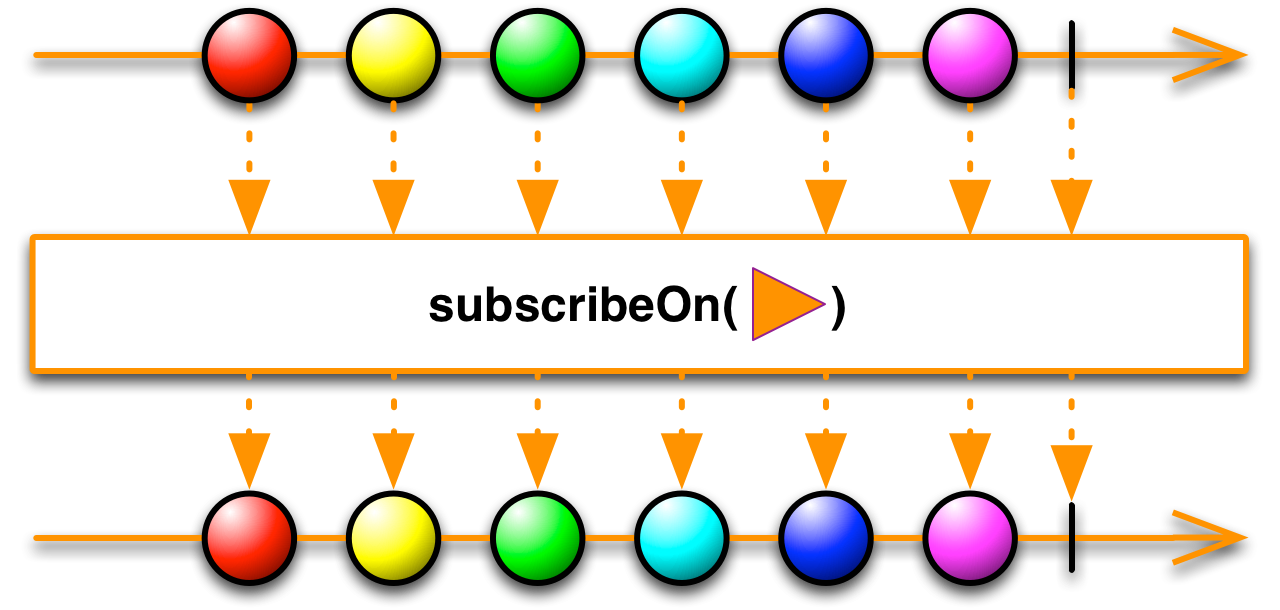
- Backpressure:
- The operator doesn't interfere with backpressure which is determined by the source
Publisher's backpressure behavior. - Scheduler:
- You specify which
Schedulerthis operator will use
Parameters
| scheduler | the Scheduler to perform subscription actions on |
|---|
Returns
- the source Publisher modified so that its subscriptions happen on the
specified
Scheduler
public final Flowable<T> subscribeOn (Scheduler scheduler, boolean requestOn)
Asynchronously subscribes Subscribers to this Publisher on the specified Scheduler
optionally reroutes requests from other threads to the same Scheduler thread.
If there is a create(FlowableOnSubscribe, BackpressureStrategy) type source up in the
chain, it is recommended to have requestOn false to avoid same-pool deadlock
because requests may pile up behind an eager/blocking emitter.

- Backpressure:
- The operator doesn't interfere with backpressure which is determined by the source
Publisher's backpressure behavior. - Scheduler:
- You specify which
Schedulerthis operator will use
Parameters
| scheduler | the Scheduler to perform subscription actions on |
|---|---|
| requestOn | if true, requests are rerouted to the given Scheduler as well (strong pipelining) if false, requests coming from any thread are simply forwarded to the upstream on the same thread (weak pipelining) |
Returns
- the source Publisher modified so that its subscriptions happen on the
specified
Scheduler
public final E subscribeWith (E subscriber)
Subscribes a given Subscriber (subclass) to this Flowable and returns the given Subscriber as is.
Usage example:
Flowable<Integer> source = Flowable.range(1, 10);
CompositeDisposable composite = new CompositeDisposable();
ResourceSubscriber<Integer> rs = new ResourceSubscriber<>() {
// ...
};
composite.add(source.subscribeWith(rs));
- Backpressure:
- The backpressure behavior/expectation is determined by the supplied
Subscriber. - Scheduler:
subscribeWithdoes not operate by default on a particularScheduler.
Parameters
| subscriber | the Subscriber (subclass) to use and return, not null |
|---|
Returns
- the input
subscriber
Throws
| NullPointerException | if subscriber is null |
|---|
public final Flowable<T> switchIfEmpty (Publisher<? extends T> other)
Returns a Flowable that emits the items emitted by the source Publisher or the items of an alternate
Publisher if the source Publisher is empty.
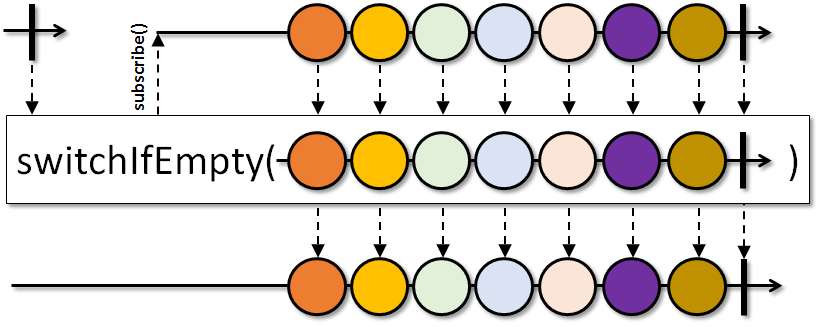
- Backpressure:
- If the source
Publisheris empty, the alternatePublisheris expected to honor backpressure. If the sourcePublisheris non-empty, it is expected to honor backpressure as instead. In either case, if violated, aMissingBackpressureExceptionmay get signalled somewhere downstream. - Scheduler:
switchIfEmptydoes not operate by default on a particularScheduler.
Parameters
| other | the alternate Publisher to subscribe to if the source does not emit any items |
|---|
Returns
- a Publisher that emits the items emitted by the source Publisher or the items of an alternate Publisher if the source Publisher is empty.
public final Flowable<R> switchMap (Function<? super T, ? extends Publisher<? extends R>> mapper, int bufferSize)
Returns a new Publisher by applying a function that you supply to each item emitted by the source Publisher that returns a Publisher, and then emitting the items emitted by the most recently emitted of these Publishers.
The resulting Publisher completes if both the upstream Publisher and the last inner Publisher, if any, complete. If the upstream Publisher signals an onError, the inner Publisher is cancelled and the error delivered in-sequence.
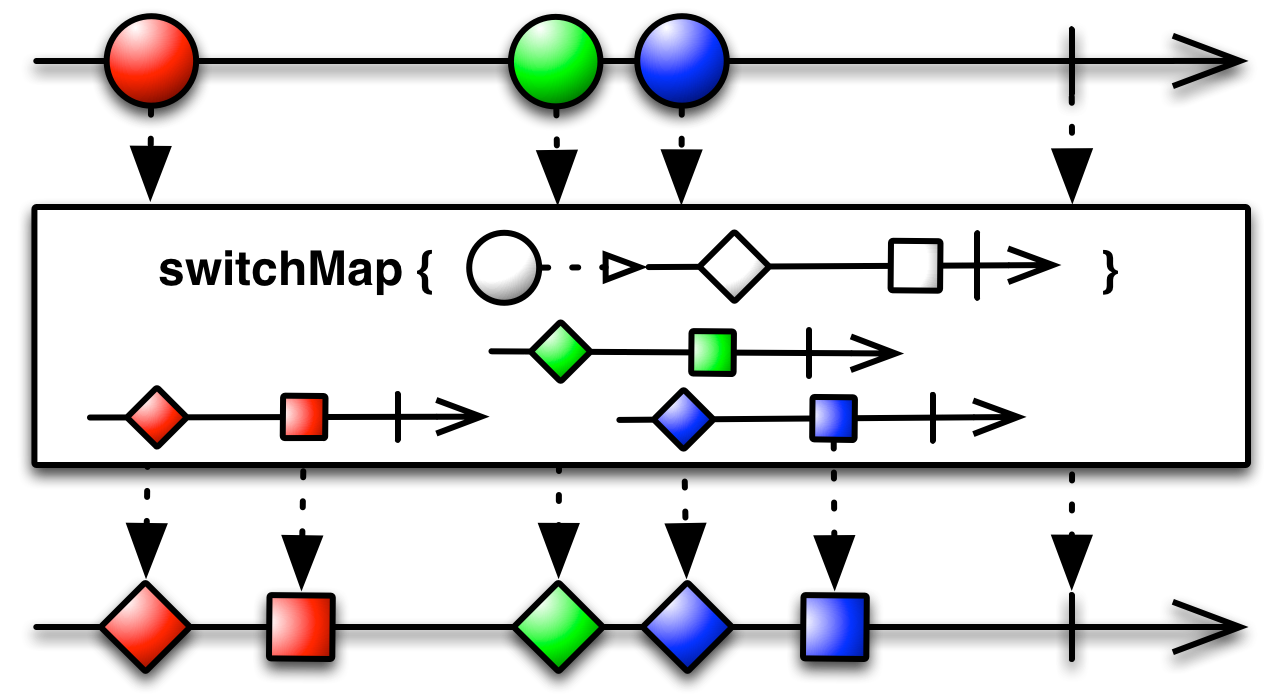
- Backpressure:
- The operator honors backpressure from downstream. The outer
Publisheris consumed in an unbounded manner (i.e., without backpressure) and the innerPublishers are expected to honor backpressure but it is not enforced; the operator won't signal aMissingBackpressureExceptionbut the violation may lead toOutOfMemoryErrordue to internal buffer bloat. - Scheduler:
switchMapdoes not operate by default on a particularScheduler.
Parameters
| mapper | a function that, when applied to an item emitted by the source Publisher, returns an Publisher |
|---|---|
| bufferSize | the number of elements to prefetch from the current active inner Publisher |
Returns
- a Flowable that emits the items emitted by the Publisher returned from applying
functo the most recently emitted item emitted by the source Publisher
public final Flowable<R> switchMap (Function<? super T, ? extends Publisher<? extends R>> mapper)
Returns a new Publisher by applying a function that you supply to each item emitted by the source Publisher that returns a Publisher, and then emitting the items emitted by the most recently emitted of these Publishers.
The resulting Publisher completes if both the upstream Publisher and the last inner Publisher, if any, complete. If the upstream Publisher signals an onError, the inner Publisher is cancelled and the error delivered in-sequence.

- Backpressure:
- The operator honors backpressure from downstream. The outer
Publisheris consumed in an unbounded manner (i.e., without backpressure) and the innerPublishers are expected to honor backpressure but it is not enforced; the operator won't signal aMissingBackpressureExceptionbut the violation may lead toOutOfMemoryErrordue to internal buffer bloat. - Scheduler:
switchMapdoes not operate by default on a particularScheduler.
Parameters
| mapper | a function that, when applied to an item emitted by the source Publisher, returns an Publisher |
|---|
Returns
- a Flowable that emits the items emitted by the Publisher returned from applying
functo the most recently emitted item emitted by the source Publisher
public final Flowable<R> switchMapDelayError (Function<? super T, ? extends Publisher<? extends R>> mapper)
Returns a new Publisher by applying a function that you supply to each item emitted by the source Publisher that returns a Publisher, and then emitting the items emitted by the most recently emitted of these Publishers and delays any error until all Publishers terminate.
The resulting Publisher completes if both the upstream Publisher and the last inner Publisher, if any, complete. If the upstream Publisher signals an onError, the termination of the last inner Publisher will emit that error as is or wrapped into a CompositeException along with the other possible errors the former inner Publishers signalled.

- Backpressure:
- The operator honors backpressure from downstream. The outer
Publisheris consumed in an unbounded manner (i.e., without backpressure) and the innerPublishers are expected to honor backpressure but it is not enforced; the operator won't signal aMissingBackpressureExceptionbut the violation may lead toOutOfMemoryErrordue to internal buffer bloat. - Scheduler:
switchMapDelayErrordoes not operate by default on a particularScheduler.
Parameters
| mapper | a function that, when applied to an item emitted by the source Publisher, returns an Publisher |
|---|
Returns
- a Flowable that emits the items emitted by the Publisher returned from applying
functo the most recently emitted item emitted by the source Publisher
public final Flowable<R> switchMapDelayError (Function<? super T, ? extends Publisher<? extends R>> mapper, int bufferSize)
Returns a new Publisher by applying a function that you supply to each item emitted by the source Publisher that returns a Publisher, and then emitting the items emitted by the most recently emitted of these Publishers and delays any error until all Publishers terminate.
The resulting Publisher completes if both the upstream Publisher and the last inner Publisher, if any, complete. If the upstream Publisher signals an onError, the termination of the last inner Publisher will emit that error as is or wrapped into a CompositeException along with the other possible errors the former inner Publishers signalled.

- Backpressure:
- The operator honors backpressure from downstream. The outer
Publisheris consumed in an unbounded manner (i.e., without backpressure) and the innerPublishers are expected to honor backpressure but it is not enforced; the operator won't signal aMissingBackpressureExceptionbut the violation may lead toOutOfMemoryErrordue to internal buffer bloat. - Scheduler:
switchMapDelayErrordoes not operate by default on a particularScheduler.
Parameters
| mapper | a function that, when applied to an item emitted by the source Publisher, returns an Publisher |
|---|---|
| bufferSize | the number of elements to prefetch from the current active inner Publisher |
Returns
- a Flowable that emits the items emitted by the Publisher returned from applying
functo the most recently emitted item emitted by the source Publisher
public static Flowable<T> switchOnNext (Publisher<? extends Publisher<? extends T>> sources, int bufferSize)
Converts a Publisher that emits Publishers into a Publisher that emits the items emitted by the most recently emitted of those Publishers.
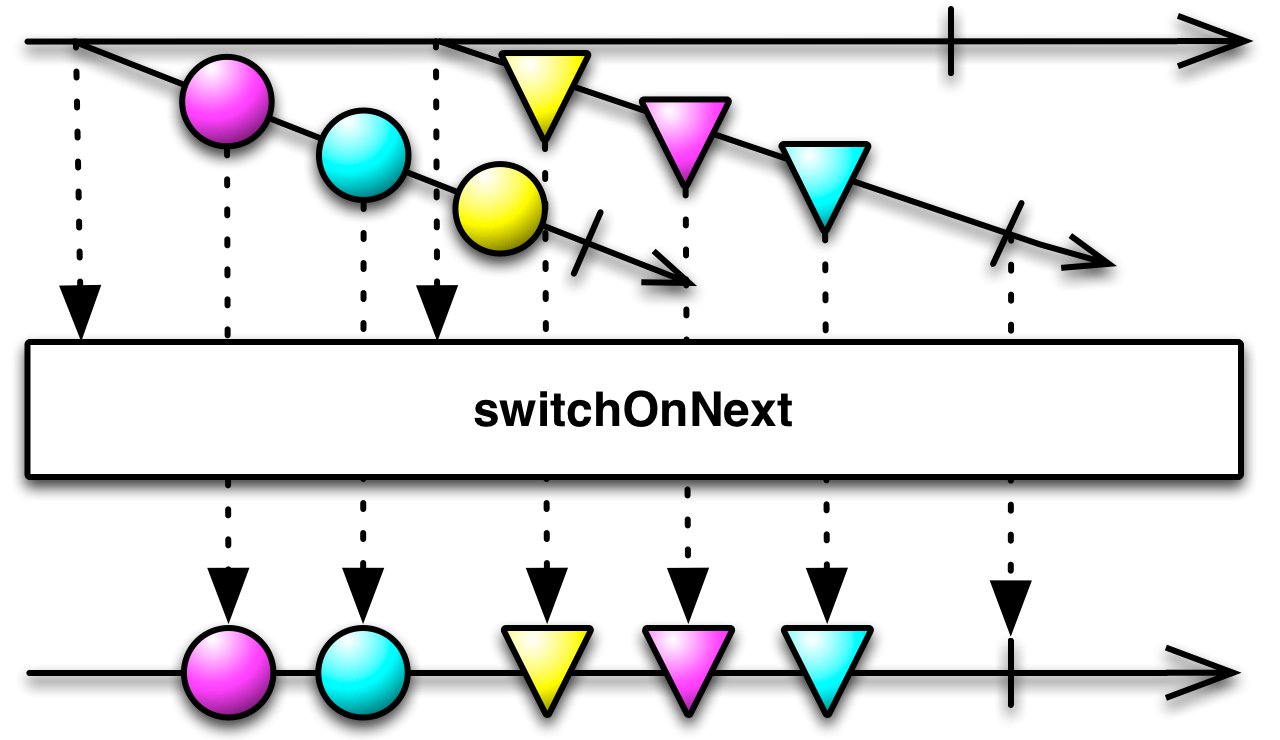
switchOnNext subscribes to a Publisher that emits Publishers. Each time it observes one of
these emitted Publishers, the Publisher returned by switchOnNext begins emitting the items
emitted by that Publisher. When a new Publisher is emitted, switchOnNext stops emitting items
from the earlier-emitted Publisher and begins emitting items from the new one.
The resulting Publisher completes if both the outer Publisher and the last inner Publisher, if any, complete. If the outer Publisher signals an onError, the inner Publisher is cancelled and the error delivered in-sequence.
- Backpressure:
- The operator honors backpressure from downstream. The outer
Publisheris consumed in an unbounded manner (i.e., without backpressure) and the innerPublishers are expected to honor backpressure but it is not enforced; the operator won't signal aMissingBackpressureExceptionbut the violation may lead toOutOfMemoryErrordue to internal buffer bloat. - Scheduler:
switchOnNextdoes not operate by default on a particularScheduler.
Parameters
| sources | the source Publisher that emits Publishers |
|---|---|
| bufferSize | the number of items to prefetch from the inner Publishers |
Returns
- a Flowable that emits the items emitted by the Publisher most recently emitted by the source Publisher
public static Flowable<T> switchOnNext (Publisher<? extends Publisher<? extends T>> sources)
Converts a Publisher that emits Publishers into a Publisher that emits the items emitted by the most recently emitted of those Publishers.

switchOnNext subscribes to a Publisher that emits Publishers. Each time it observes one of
these emitted Publishers, the Publisher returned by switchOnNext begins emitting the items
emitted by that Publisher. When a new Publisher is emitted, switchOnNext stops emitting items
from the earlier-emitted Publisher and begins emitting items from the new one.
The resulting Publisher completes if both the outer Publisher and the last inner Publisher, if any, complete. If the outer Publisher signals an onError, the inner Publisher is cancelled and the error delivered in-sequence.
- Backpressure:
- The operator honors backpressure from downstream. The outer
Publisheris consumed in an unbounded manner (i.e., without backpressure) and the innerPublishers are expected to honor backpressure but it is not enforced; the operator won't signal aMissingBackpressureExceptionbut the violation may lead toOutOfMemoryErrordue to internal buffer bloat. - Scheduler:
switchOnNextdoes not operate by default on a particularScheduler.
Parameters
| sources | the source Publisher that emits Publishers |
|---|
Returns
- a Flowable that emits the items emitted by the Publisher most recently emitted by the source Publisher
public static Flowable<T> switchOnNextDelayError (Publisher<? extends Publisher<? extends T>> sources, int prefetch)
Converts a Publisher that emits Publishers into a Publisher that emits the items emitted by the most recently emitted of those Publishers and delays any exception until all Publishers terminate.

switchOnNext subscribes to a Publisher that emits Publishers. Each time it observes one of
these emitted Publishers, the Publisher returned by switchOnNext begins emitting the items
emitted by that Publisher. When a new Publisher is emitted, switchOnNext stops emitting items
from the earlier-emitted Publisher and begins emitting items from the new one.
The resulting Publisher completes if both the main Publisher and the last inner Publisher, if any, complete. If the main Publisher signals an onError, the termination of the last inner Publisher will emit that error as is or wrapped into a CompositeException along with the other possible errors the former inner Publishers signalled.
- Backpressure:
- The operator honors backpressure from downstream. The outer
Publisheris consumed in an unbounded manner (i.e., without backpressure) and the innerPublishers are expected to honor backpressure but it is not enforced; the operator won't signal aMissingBackpressureExceptionbut the violation may lead toOutOfMemoryErrordue to internal buffer bloat. - Scheduler:
switchOnNextDelayErrordoes not operate by default on a particularScheduler.
Parameters
| sources | the source Publisher that emits Publishers |
|---|---|
| prefetch | the number of items to prefetch from the inner Publishers |
Returns
- a Flowable that emits the items emitted by the Publisher most recently emitted by the source Publisher
public static Flowable<T> switchOnNextDelayError (Publisher<? extends Publisher<? extends T>> sources)
Converts a Publisher that emits Publishers into a Publisher that emits the items emitted by the most recently emitted of those Publishers and delays any exception until all Publishers terminate.

switchOnNext subscribes to a Publisher that emits Publishers. Each time it observes one of
these emitted Publishers, the Publisher returned by switchOnNext begins emitting the items
emitted by that Publisher. When a new Publisher is emitted, switchOnNext stops emitting items
from the earlier-emitted Publisher and begins emitting items from the new one.
The resulting Publisher completes if both the main Publisher and the last inner Publisher, if any, complete. If the main Publisher signals an onError, the termination of the last inner Publisher will emit that error as is or wrapped into a CompositeException along with the other possible errors the former inner Publishers signalled.
- Backpressure:
- The operator honors backpressure from downstream. The outer
Publisheris consumed in an unbounded manner (i.e., without backpressure) and the innerPublishers are expected to honor backpressure but it is not enforced; the operator won't signal aMissingBackpressureExceptionbut the violation may lead toOutOfMemoryErrordue to internal buffer bloat. - Scheduler:
switchOnNextDelayErrordoes not operate by default on a particularScheduler.
Parameters
| sources | the source Publisher that emits Publishers |
|---|
Returns
- a Flowable that emits the items emitted by the Publisher most recently emitted by the source Publisher
public final Flowable<T> take (long time, TimeUnit unit)
Returns a Flowable that emits those items emitted by source Publisher before a specified time runs out.
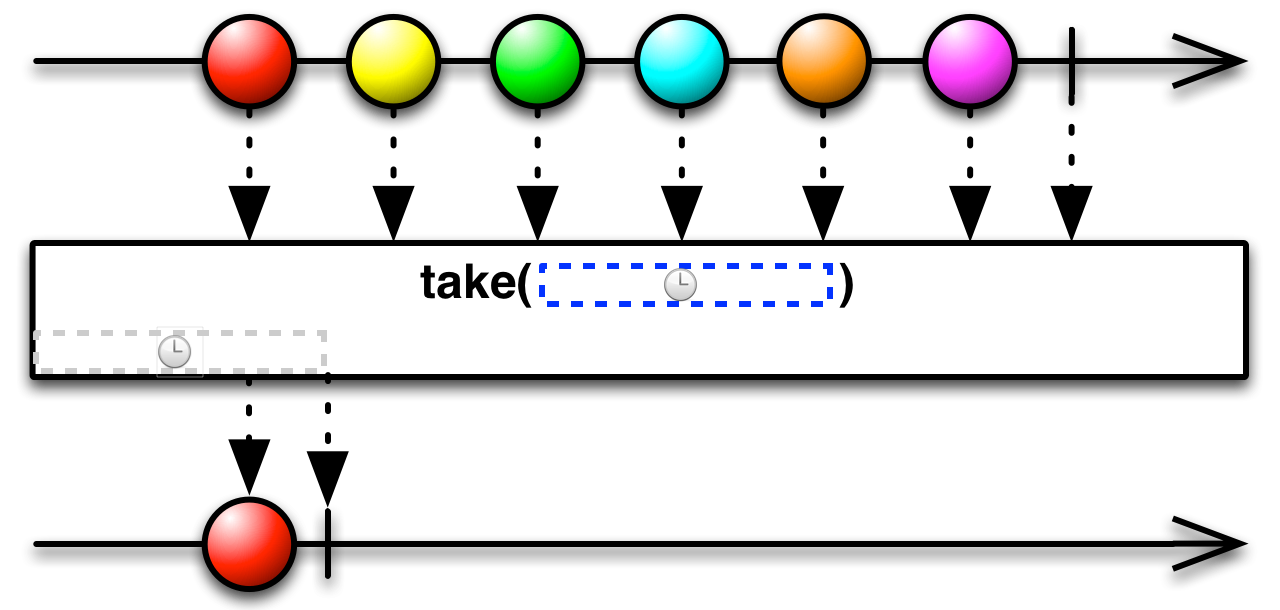
- Backpressure:
- The operator doesn't interfere with backpressure which is determined by the source
Publisher's backpressure behavior. - Scheduler:
- This version of
takeoperates by default on thecomputationScheduler.
Parameters
| time | the length of the time window |
|---|---|
| unit | the time unit of time |
Returns
- a Flowable that emits those items emitted by the source Publisher before the time runs out
public final Flowable<T> take (long time, TimeUnit unit, Scheduler scheduler)
Returns a Flowable that emits those items emitted by source Publisher before a specified time (on a specified Scheduler) runs out.
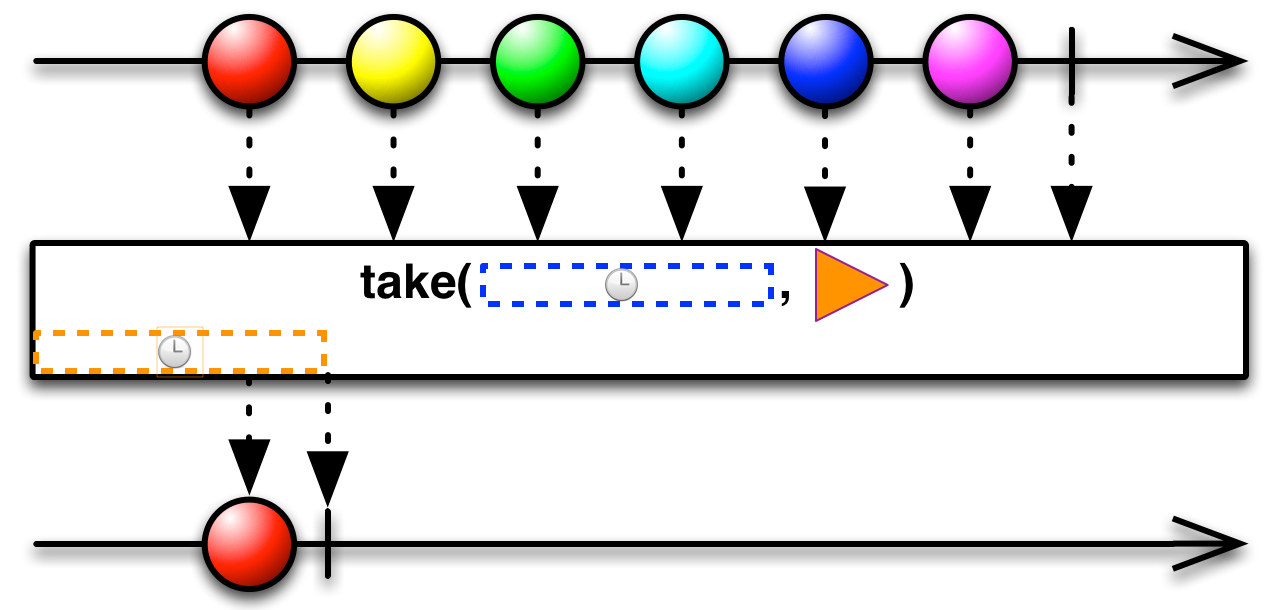
- Backpressure:
- The operator doesn't interfere with backpressure which is determined by the source
Publisher's backpressure behavior. - Scheduler:
- You specify which
Schedulerthis operator will use
Parameters
| time | the length of the time window |
|---|---|
| unit | the time unit of time |
| scheduler | the Scheduler used for time source |
Returns
- a Flowable that emits those items emitted by the source Publisher before the time runs out, according to the specified Scheduler
public final Flowable<T> take (long count)
Returns a Flowable that emits only the first count items emitted by the source Publisher. If the source emits fewer than
count items then all of its items are emitted.

This method returns a Publisher that will invoke a subscribing Subscriber's
onNext function a maximum of count times before invoking
onComplete.
- Backpressure:
- The operator doesn't interfere with backpressure which is determined by the source
Publisher's backpressure behavior in case the first request is smaller than thecount. Otherwise, the sourcePublisheris consumed in an unbounded manner (i.e., without applying backpressure to it). - Scheduler:
- This version of
takedoes not operate by default on a particularScheduler.
Parameters
| count | the maximum number of items to emit |
|---|
Returns
- a Flowable that emits only the first
countitems emitted by the source Publisher, or all of the items from the source Publisher if that Publisher emits fewer thancountitems
public final Flowable<T> takeLast (long time, TimeUnit unit, boolean delayError)
Returns a Flowable that emits the items from the source Publisher that were emitted in a specified window of time before the Publisher completed.
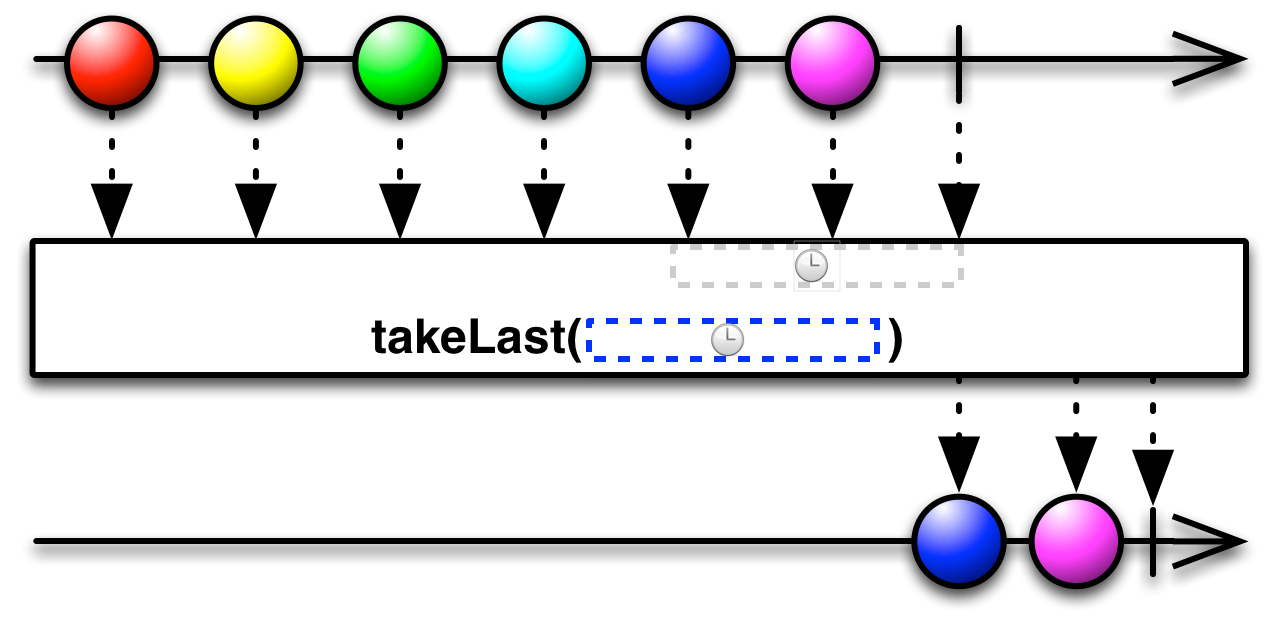
- Backpressure:
- The operator honors backpressure from downstream and consumes the source
Publisherin an unbounded manner (i.e., no backpressure is applied to it) but note that this may lead toOutOfMemoryErrordue to internal buffer bloat. Consider usingtakeLast(long, long, TimeUnit)in this case. - Scheduler:
- This version of
takeLastoperates by default on thecomputationScheduler.
Parameters
| time | the length of the time window |
|---|---|
| unit | the time unit of time |
| delayError | if true, an exception signalled by the current Flowable is delayed until the regular elements are consumed by the downstream; if false, an exception is immediately signalled and all regular elements dropped |
Returns
- a Flowable that emits the items from the source Publisher that were emitted in the window of
time before the Publisher completed specified by
time
public final Flowable<T> takeLast (long count, long time, TimeUnit unit, Scheduler scheduler, boolean delayError, int bufferSize)
Returns a Flowable that emits at most a specified number of items from the source Publisher that were emitted in a specified window of time before the Publisher completed, where the timing information is provided by a given Scheduler.
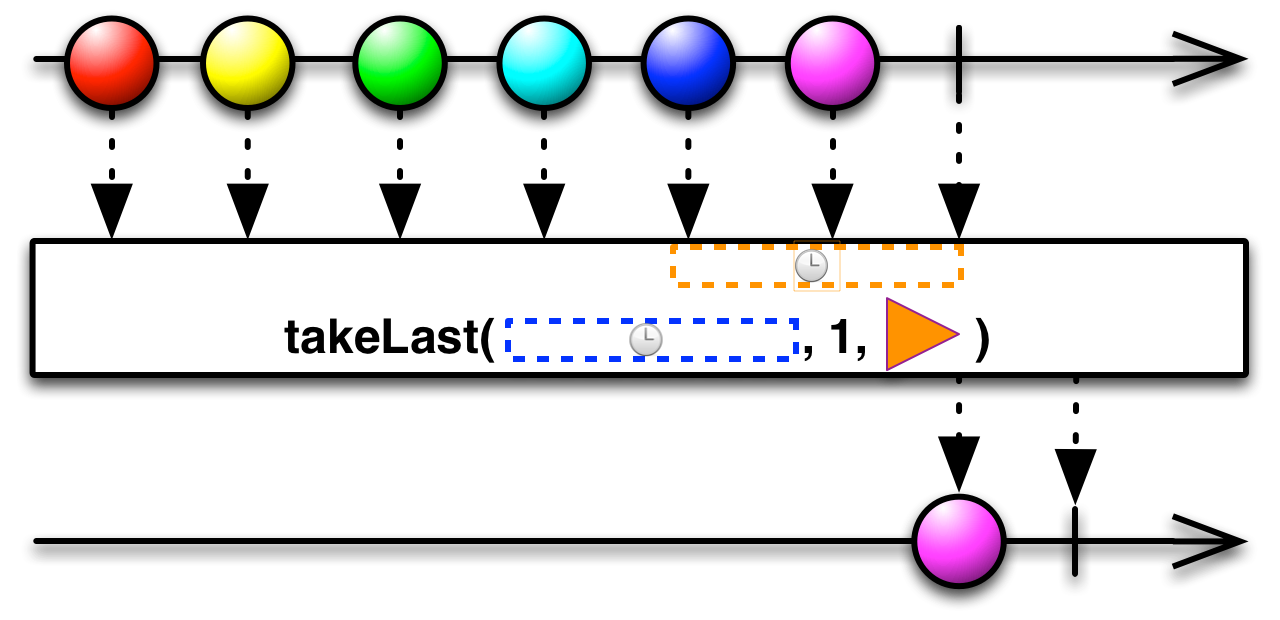
- Backpressure:
- The operator honors backpressure from downstream and consumes the source
Publisherin an unbounded manner (i.e., no backpressure is applied to it). - Scheduler:
- You specify which
Schedulerthis operator will use for tracking the current time
Parameters
| count | the maximum number of items to emit |
|---|---|
| time | the length of the time window |
| unit | the time unit of time |
| scheduler | the Scheduler that provides the timestamps for the observed items |
| delayError | if true, an exception signalled by the current Flowable is delayed until the regular elements are consumed by the downstream; if false, an exception is immediately signalled and all regular elements dropped |
| bufferSize | the hint about how many elements to expect to be last |
Returns
- a Flowable that emits at most
countitems from the source Publisher that were emitted in a specified window of time before the Publisher completed, where the timing information is provided by the givenscheduler
Throws
| IndexOutOfBoundsException | if count is less than zero |
|---|
public final Flowable<T> takeLast (long time, TimeUnit unit, Scheduler scheduler)
Returns a Flowable that emits the items from the source Publisher that were emitted in a specified window of time before the Publisher completed, where the timing information is provided by a specified Scheduler.
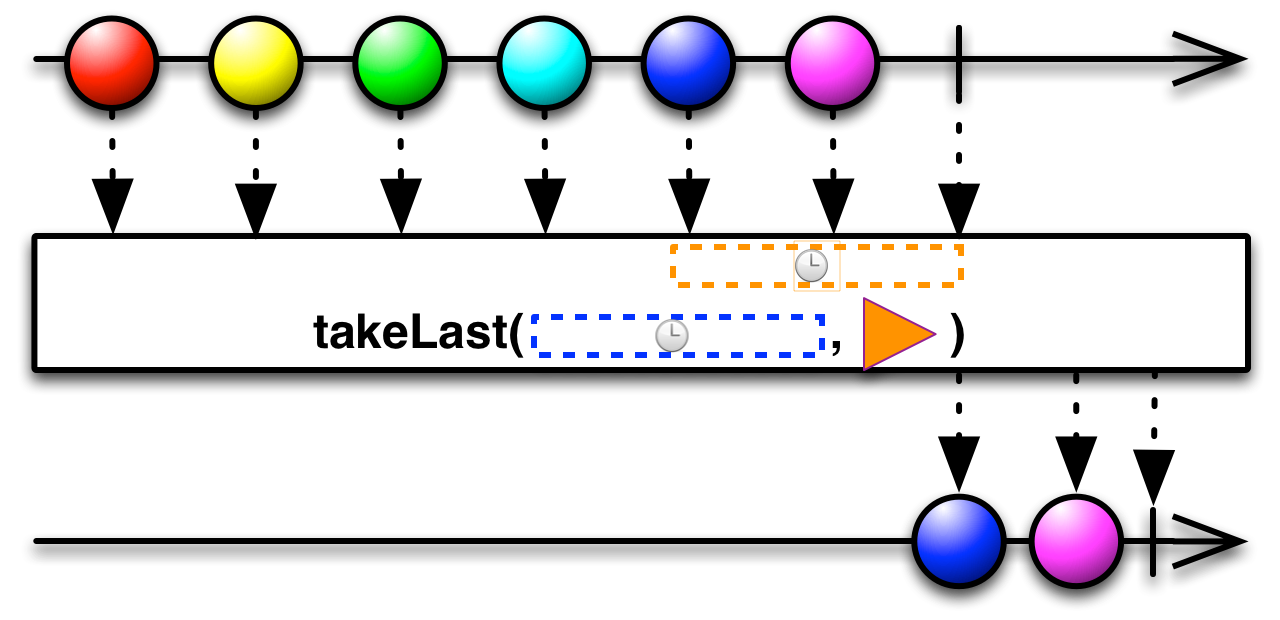
- Backpressure:
- The operator honors backpressure from downstream and consumes the source
Publisherin an unbounded manner (i.e., no backpressure is applied to it) but note that this may lead toOutOfMemoryErrordue to internal buffer bloat. Consider usingtakeLast(long, long, TimeUnit, Scheduler)in this case. - Scheduler:
- You specify which
Schedulerthis operator will use
Parameters
| time | the length of the time window |
|---|---|
| unit | the time unit of time |
| scheduler | the Scheduler that provides the timestamps for the Observed items |
Returns
- a Flowable that emits the items from the source Publisher that were emitted in the window of
time before the Publisher completed specified by
time, where the timing information is provided byscheduler
public final Flowable<T> takeLast (long time, TimeUnit unit, Scheduler scheduler, boolean delayError)
Returns a Flowable that emits the items from the source Publisher that were emitted in a specified window of time before the Publisher completed, where the timing information is provided by a specified Scheduler.

- Backpressure:
- The operator honors backpressure from downstream and consumes the source
Publisherin an unbounded manner (i.e., no backpressure is applied to it) but note that this may lead toOutOfMemoryErrordue to internal buffer bloat. Consider usingtakeLast(long, long, TimeUnit, Scheduler)in this case. - Scheduler:
- You specify which
Schedulerthis operator will use
Parameters
| time | the length of the time window |
|---|---|
| unit | the time unit of time |
| scheduler | the Scheduler that provides the timestamps for the Observed items |
| delayError | if true, an exception signalled by the current Flowable is delayed until the regular elements are consumed by the downstream; if false, an exception is immediately signalled and all regular elements dropped |
Returns
- a Flowable that emits the items from the source Publisher that were emitted in the window of
time before the Publisher completed specified by
time, where the timing information is provided byscheduler
public final Flowable<T> takeLast (int count)
Returns a Flowable that emits at most the last count items emitted by the source Publisher. If the source emits fewer than
count items then all of its items are emitted.
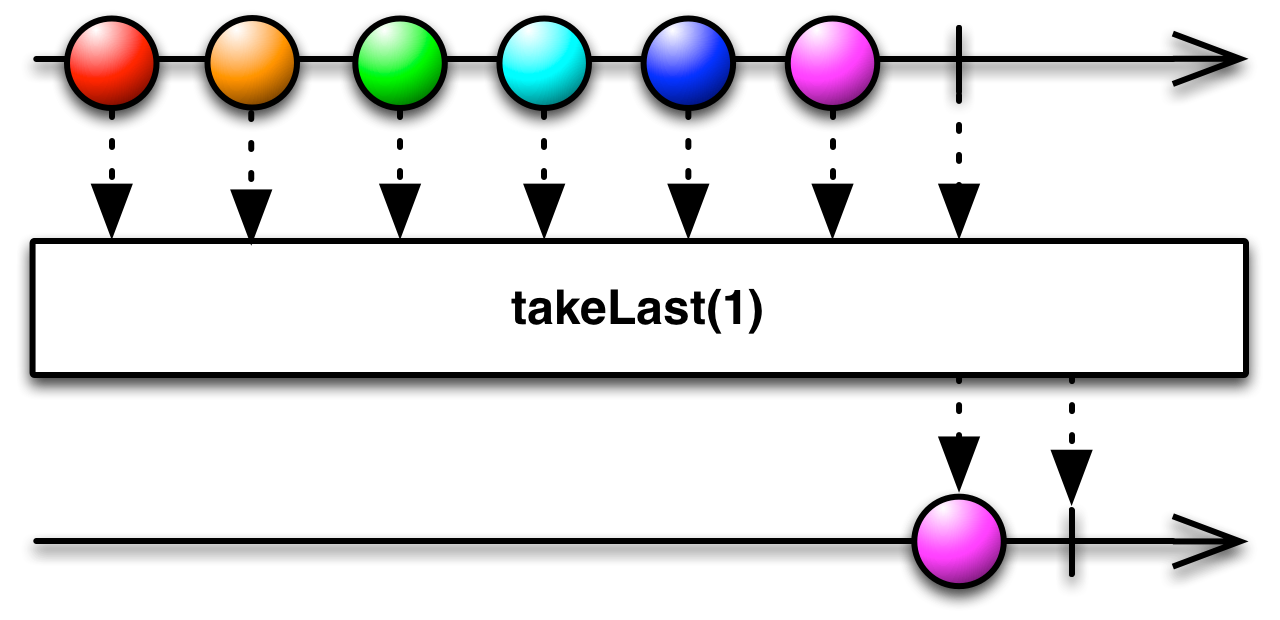
- Backpressure:
- The operator honors backpressure from downstream if the
countis non-zero; ignores backpressure if thecountis zero as it doesn't signal any values. - Scheduler:
- This version of
takeLastdoes not operate by default on a particularScheduler.
Parameters
| count | the maximum number of items to emit from the end of the sequence of items emitted by the source Publisher |
|---|
Returns
- a Flowable that emits at most the last
countitems emitted by the source Publisher
Throws
| IndexOutOfBoundsException | if count is less than zero |
|---|
public final Flowable<T> takeLast (long time, TimeUnit unit)
Returns a Flowable that emits the items from the source Publisher that were emitted in a specified window of time before the Publisher completed.

- Backpressure:
- The operator honors backpressure from downstream and consumes the source
Publisherin an unbounded manner (i.e., no backpressure is applied to it) but note that this may lead toOutOfMemoryErrordue to internal buffer bloat. Consider usingtakeLast(long, long, TimeUnit)in this case. - Scheduler:
- This version of
takeLastoperates by default on thecomputationScheduler.
Parameters
| time | the length of the time window |
|---|---|
| unit | the time unit of time |
Returns
- a Flowable that emits the items from the source Publisher that were emitted in the window of
time before the Publisher completed specified by
time
public final Flowable<T> takeLast (long count, long time, TimeUnit unit)
Returns a Flowable that emits at most a specified number of items from the source Publisher that were emitted in a specified window of time before the Publisher completed.
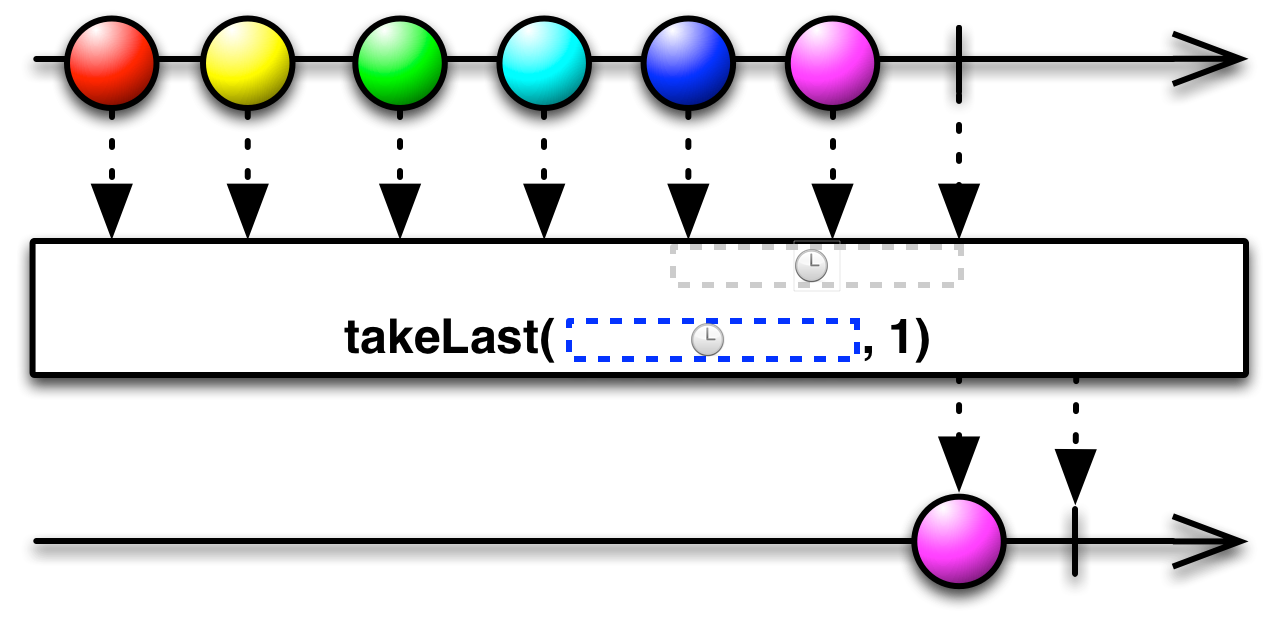
- Backpressure:
- The operator honors backpressure from downstream and consumes the source
Publisherin an unbounded manner (i.e., no backpressure is applied to it). - Scheduler:
takeLastdoes not operate on any particular scheduler but uses the current time from thecomputationScheduler.
Parameters
| count | the maximum number of items to emit |
|---|---|
| time | the length of the time window |
| unit | the time unit of time |
Returns
- a Flowable that emits at most
countitems from the source Publisher that were emitted in a specified window of time before the Publisher completed
public final Flowable<T> takeLast (long count, long time, TimeUnit unit, Scheduler scheduler)
Returns a Flowable that emits at most a specified number of items from the source Publisher that were emitted in a specified window of time before the Publisher completed, where the timing information is provided by a given Scheduler.

- Backpressure:
- The operator honors backpressure from downstream and consumes the source
Publisherin an unbounded manner (i.e., no backpressure is applied to it). - Scheduler:
- You specify which
Schedulerthis operator will use for tracking the current time
Parameters
| count | the maximum number of items to emit |
|---|---|
| time | the length of the time window |
| unit | the time unit of time |
| scheduler | the Scheduler that provides the timestamps for the observed items |
Returns
- a Flowable that emits at most
countitems from the source Publisher that were emitted in a specified window of time before the Publisher completed, where the timing information is provided by the givenscheduler
Throws
| IndexOutOfBoundsException | if count is less than zero |
|---|
public final Flowable<T> takeLast (long time, TimeUnit unit, Scheduler scheduler, boolean delayError, int bufferSize)
Returns a Flowable that emits the items from the source Publisher that were emitted in a specified window of time before the Publisher completed, where the timing information is provided by a specified Scheduler.

- Backpressure:
- The operator honors backpressure from downstream and consumes the source
Publisherin an unbounded manner (i.e., no backpressure is applied to it) but note that this may lead toOutOfMemoryErrordue to internal buffer bloat. Consider usingtakeLast(long, long, TimeUnit, Scheduler)in this case. - Scheduler:
- You specify which
Schedulerthis operator will use
Parameters
| time | the length of the time window |
|---|---|
| unit | the time unit of time |
| scheduler | the Scheduler that provides the timestamps for the Observed items |
| delayError | if true, an exception signalled by the current Flowable is delayed until the regular elements are consumed by the downstream; if false, an exception is immediately signalled and all regular elements dropped |
| bufferSize | the hint about how many elements to expect to be last |
Returns
- a Flowable that emits the items from the source Publisher that were emitted in the window of
time before the Publisher completed specified by
time, where the timing information is provided byscheduler
public final Flowable<T> takeUntil (Publisher<U> other)
Returns a Flowable that emits the items emitted by the source Publisher until a second Publisher emits an item.
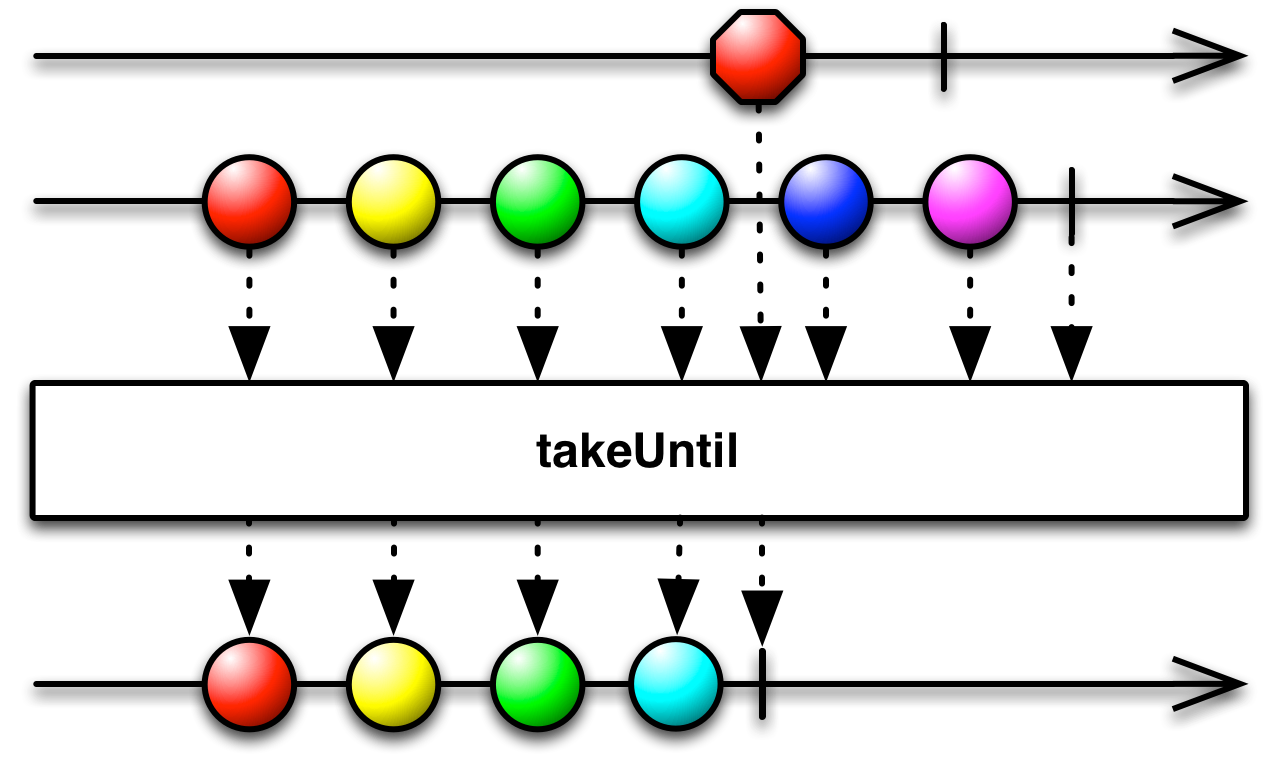
- Backpressure:
- The operator doesn't interfere with backpressure which is determined by the source
Publisher's backpressure behavior. - Scheduler:
takeUntildoes not operate by default on a particularScheduler.
Parameters
| other | the Publisher whose first emitted item will cause takeUntil to stop emitting items
from the source Publisher |
|---|
Returns
- a Flowable that emits the items emitted by the source Publisher until such time as
otheremits its first item
public final Flowable<T> takeUntil (Predicate<? super T> stopPredicate)
Returns a Flowable that emits items emitted by the source Publisher, checks the specified predicate for each item, and then completes when the condition is satisfied.
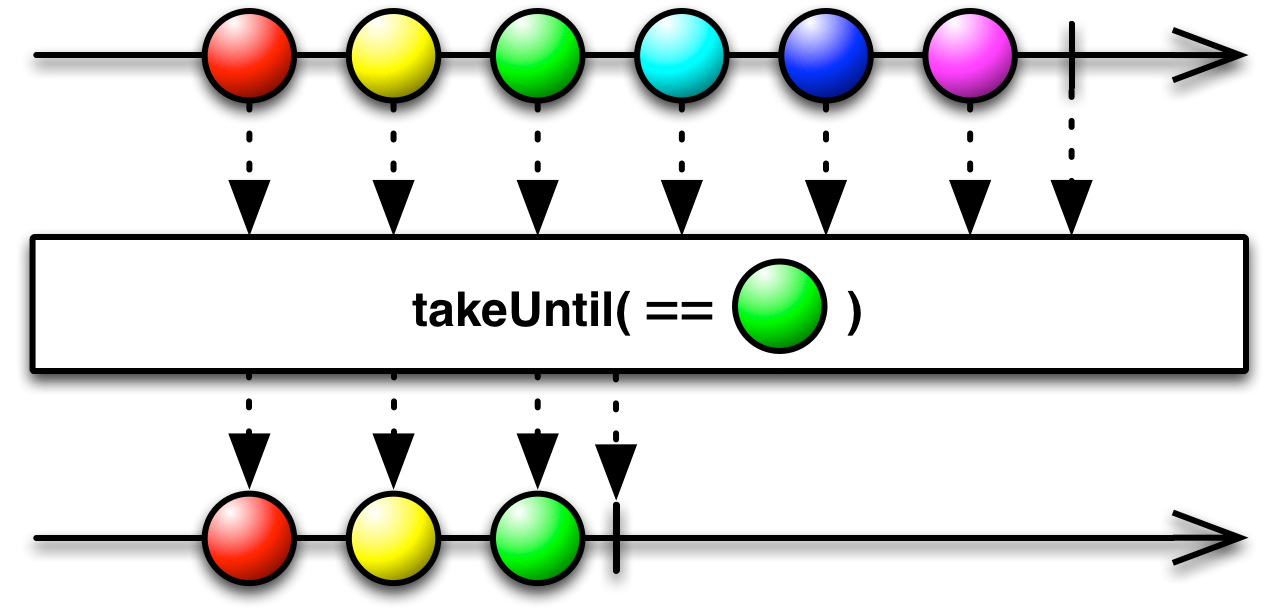
The difference between this operator and takeWhile(Predicate) is that here, the condition is
evaluated after the item is emitted.
- Backpressure:
- The operator is a pass-through for backpressure; the backpressure behavior is determined by the upstream source and the downstream consumer.
- Scheduler:
takeUntildoes not operate by default on a particularScheduler.
Parameters
| stopPredicate | a function that evaluates an item emitted by the source Publisher and returns a Boolean |
|---|
Returns
- a Flowable that first emits items emitted by the source Publisher, checks the specified condition after each item, and then completes when the condition is satisfied.
public final Flowable<T> takeWhile (Predicate<? super T> predicate)
Returns a Flowable that emits items emitted by the source Publisher so long as each item satisfied a specified condition, and then completes as soon as this condition is not satisfied.
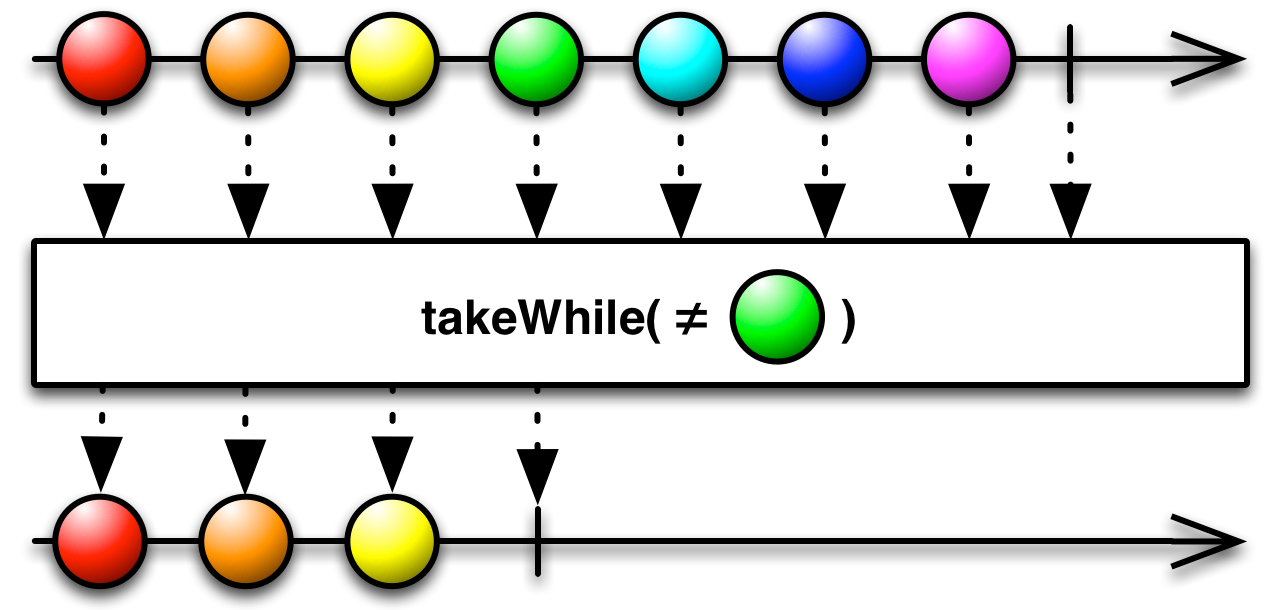
- Backpressure:
- The operator doesn't interfere with backpressure which is determined by the source
Publisher's backpressure behavior. - Scheduler:
takeWhiledoes not operate by default on a particularScheduler.
Parameters
| predicate | a function that evaluates an item emitted by the source Publisher and returns a Boolean |
|---|
Returns
- a Flowable that emits the items from the source Publisher so long as each item satisfies the
condition defined by
predicate, then completes
public final TestSubscriber<T> test (long initialRequest)
Creates a TestSubscriber with the given initial request amount and subscribes it to this Flowable.
- Backpressure:
- The returned TestSubscriber requests the given
initialRequestamount upfront. - Scheduler:
testdoes not operate by default on a particularScheduler.
Parameters
| initialRequest | the initial request amount, positive |
|---|
Returns
- the new TestSubscriber instance
public final TestSubscriber<T> test ()
Creates a TestSubscriber that requests Long.MAX_VALUE and subscribes it to this Flowable.
- Backpressure:
- The returned TestSubscriber consumes this Flowable in an unbounded fashion.
- Scheduler:
testdoes not operate by default on a particularScheduler.
Returns
- the new TestSubscriber instance
public final TestSubscriber<T> test (long initialRequest, boolean cancel)
Creates a TestSubscriber with the given initial request amount, optionally cancels it before the subscription and subscribes it to this Flowable.
- Backpressure:
- The returned TestSubscriber requests the given
initialRequestamount upfront. - Scheduler:
testdoes not operate by default on a particularScheduler.
Parameters
| initialRequest | the initial request amount, positive |
|---|---|
| cancel | should the TestSubscriber be cancelled before the subscription? |
Returns
- the new TestSubscriber instance
public final Flowable<T> throttleFirst (long windowDuration, TimeUnit unit)
Returns a Flowable that emits only the first item emitted by the source Publisher during sequential time windows of a specified duration.
This differs from throttleLast(long, TimeUnit) in that this only tracks passage of time whereas
throttleLast(long, TimeUnit) ticks at scheduled intervals.

- Backpressure:
- This operator does not support backpressure as it uses time to control data flow.
- Scheduler:
throttleFirstoperates by default on thecomputationScheduler.
Parameters
| windowDuration | time to wait before emitting another item after emitting the last item |
|---|---|
| unit | the unit of time of windowDuration |
Returns
- a Flowable that performs the throttle operation
public final Flowable<T> throttleFirst (long skipDuration, TimeUnit unit, Scheduler scheduler)
Returns a Flowable that emits only the first item emitted by the source Publisher during sequential time windows of a specified duration, where the windows are managed by a specified Scheduler.
This differs from throttleLast(long, TimeUnit) in that this only tracks passage of time whereas
throttleLast(long, TimeUnit) ticks at scheduled intervals.
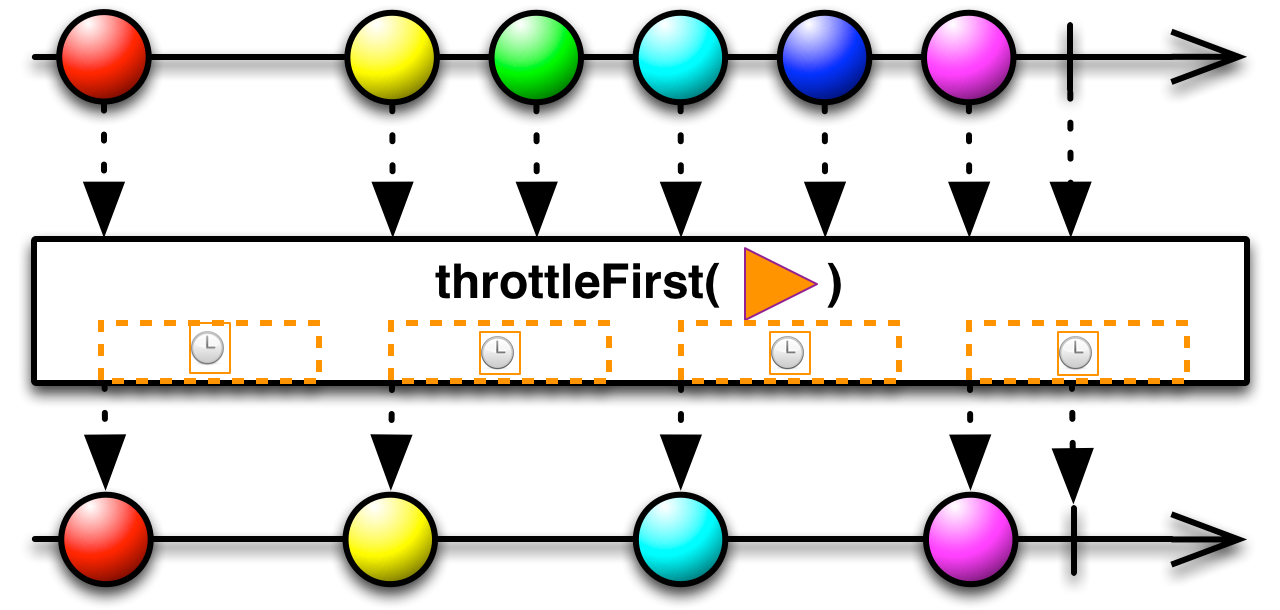
- Backpressure:
- This operator does not support backpressure as it uses time to control data flow.
- Scheduler:
- You specify which
Schedulerthis operator will use
Parameters
| skipDuration | time to wait before emitting another item after emitting the last item |
|---|---|
| unit | the unit of time of skipDuration |
| scheduler | the Scheduler to use internally to manage the timers that handle timeout for each
event |
Returns
- a Flowable that performs the throttle operation
public final Flowable<T> throttleLast (long intervalDuration, TimeUnit unit, Scheduler scheduler)
Returns a Flowable that emits only the last item emitted by the source Publisher during sequential time windows of a specified duration, where the duration is governed by a specified Scheduler.
This differs from throttleFirst(long, TimeUnit) in that this ticks along at a scheduled interval whereas
throttleFirst(long, TimeUnit) does not tick, it just tracks passage of time.
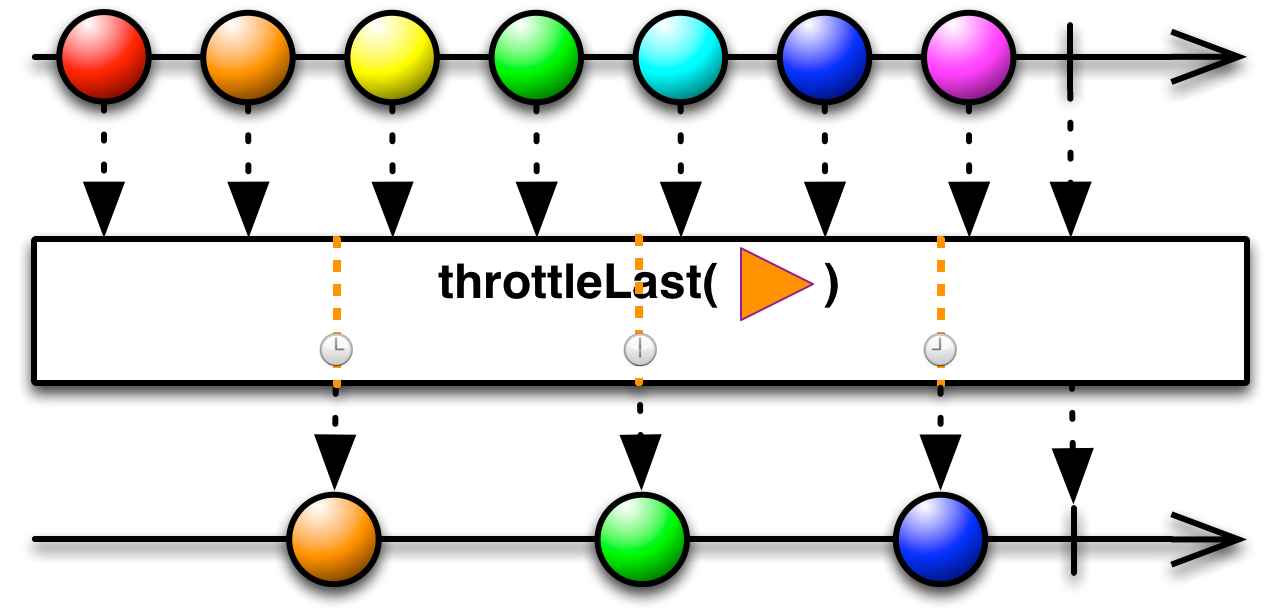
- Backpressure:
- This operator does not support backpressure as it uses time to control data flow.
- Scheduler:
- You specify which
Schedulerthis operator will use
Parameters
| intervalDuration | duration of windows within which the last item emitted by the source Publisher will be emitted |
|---|---|
| unit | the unit of time of intervalDuration |
| scheduler | the Scheduler to use internally to manage the timers that handle timeout for each
event |
Returns
- a Flowable that performs the throttle operation
public final Flowable<T> throttleLast (long intervalDuration, TimeUnit unit)
Returns a Flowable that emits only the last item emitted by the source Publisher during sequential time windows of a specified duration.
This differs from throttleFirst(long, TimeUnit) in that this ticks along at a scheduled interval whereas
throttleFirst(long, TimeUnit) does not tick, it just tracks passage of time.

- Backpressure:
- This operator does not support backpressure as it uses time to control data flow.
- Scheduler:
throttleLastoperates by default on thecomputationScheduler.
Parameters
| intervalDuration | duration of windows within which the last item emitted by the source Publisher will be emitted |
|---|---|
| unit | the unit of time of intervalDuration |
Returns
- a Flowable that performs the throttle operation
public final Flowable<T> throttleWithTimeout (long timeout, TimeUnit unit, Scheduler scheduler)
Returns a Flowable that only emits those items emitted by the source Publisher that are not followed by another emitted item within a specified time window, where the time window is governed by a specified Scheduler.
Note: If the source Publisher keeps emitting items more frequently than the length of the time window then no items will be emitted by the resulting Publisher.
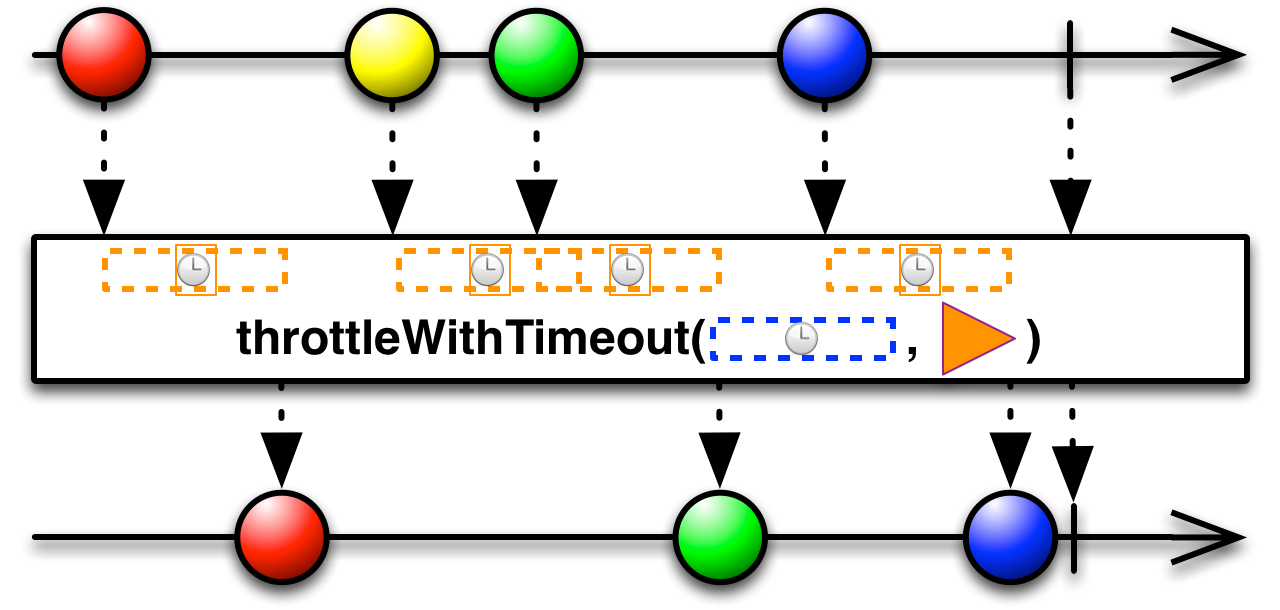
Information on debounce vs throttle:
- Debounce and Throttle: visual explanation
- Debouncing: javascript methods
- Javascript - don't spam your server: debounce and throttle
- Backpressure:
- This operator does not support backpressure as it uses time to control data flow.
- Scheduler:
- You specify which
Schedulerthis operator will use
Parameters
| timeout | the length of the window of time that must pass after the emission of an item from the source Publisher in which that Publisher emits no items in order for the item to be emitted by the resulting Publisher |
|---|---|
| unit | the TimeUnit of timeout |
| scheduler | the Scheduler to use internally to manage the timers that handle the timeout for each
item |
Returns
- a Flowable that filters out items that are too quickly followed by newer items
public final Flowable<T> throttleWithTimeout (long timeout, TimeUnit unit)
Returns a Flowable that only emits those items emitted by the source Publisher that are not followed by another emitted item within a specified time window.
Note: If the source Publisher keeps emitting items more frequently than the length of the time window then no items will be emitted by the resulting Publisher.
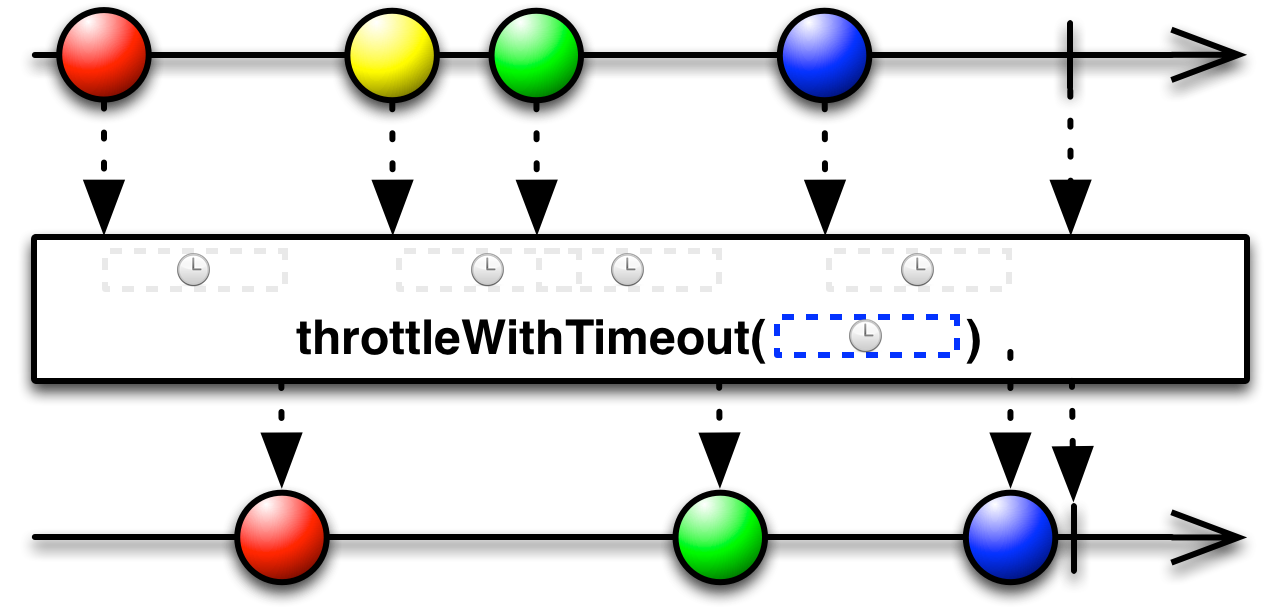
Information on debounce vs throttle:
- Debounce and Throttle: visual explanation
- Debouncing: javascript methods
- Javascript - don't spam your server: debounce and throttle
- Backpressure:
- This operator does not support backpressure as it uses time to control data flow.
- Scheduler:
throttleWithTimeoutoperates by default on thecomputationScheduler.
Parameters
| timeout | the length of the window of time that must pass after the emission of an item from the source Publisher in which that Publisher emits no items in order for the item to be emitted by the resulting Publisher |
|---|---|
| unit | the TimeUnit of timeout |
Returns
- a Flowable that filters out items that are too quickly followed by newer items
public final Flowable<Timed<T>> timeInterval (Scheduler scheduler)
Returns a Flowable that emits records of the time interval between consecutive items emitted by the source Publisher, where this interval is computed on a specified Scheduler.
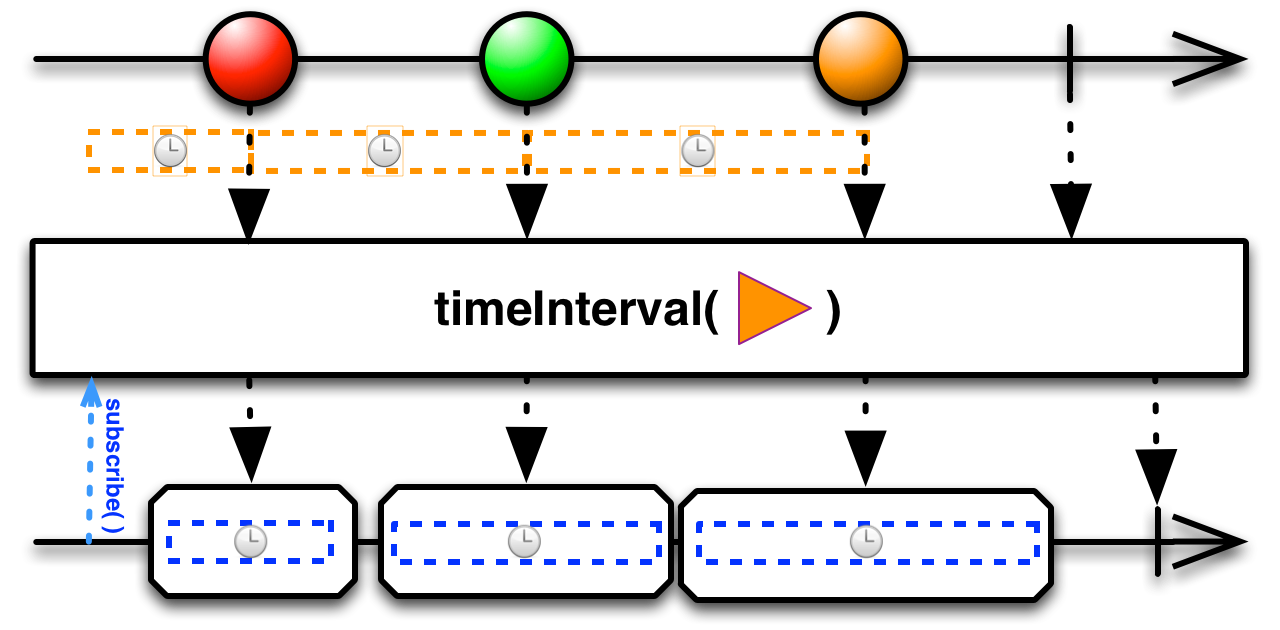
- Backpressure:
- The operator doesn't interfere with backpressure which is determined by the source
Publisher's backpressure behavior. - Scheduler:
- The operator does not operate on any particular scheduler but uses the current time
from the specified
Scheduler.
Parameters
| scheduler | the Scheduler used to compute time intervals |
|---|
Returns
- a Flowable that emits time interval information items
public final Flowable<Timed<T>> timeInterval (TimeUnit unit, Scheduler scheduler)
Returns a Flowable that emits records of the time interval between consecutive items emitted by the source Publisher, where this interval is computed on a specified Scheduler.

- Backpressure:
- The operator doesn't interfere with backpressure which is determined by the source
Publisher's backpressure behavior. - Scheduler:
- The operator does not operate on any particular scheduler but uses the current time
from the specified
Scheduler.
Parameters
| unit | the time unit for the current time |
|---|---|
| scheduler | the Scheduler used to compute time intervals |
Returns
- a Flowable that emits time interval information items
public final Flowable<Timed<T>> timeInterval ()
Returns a Flowable that emits records of the time interval between consecutive items emitted by the source Publisher.
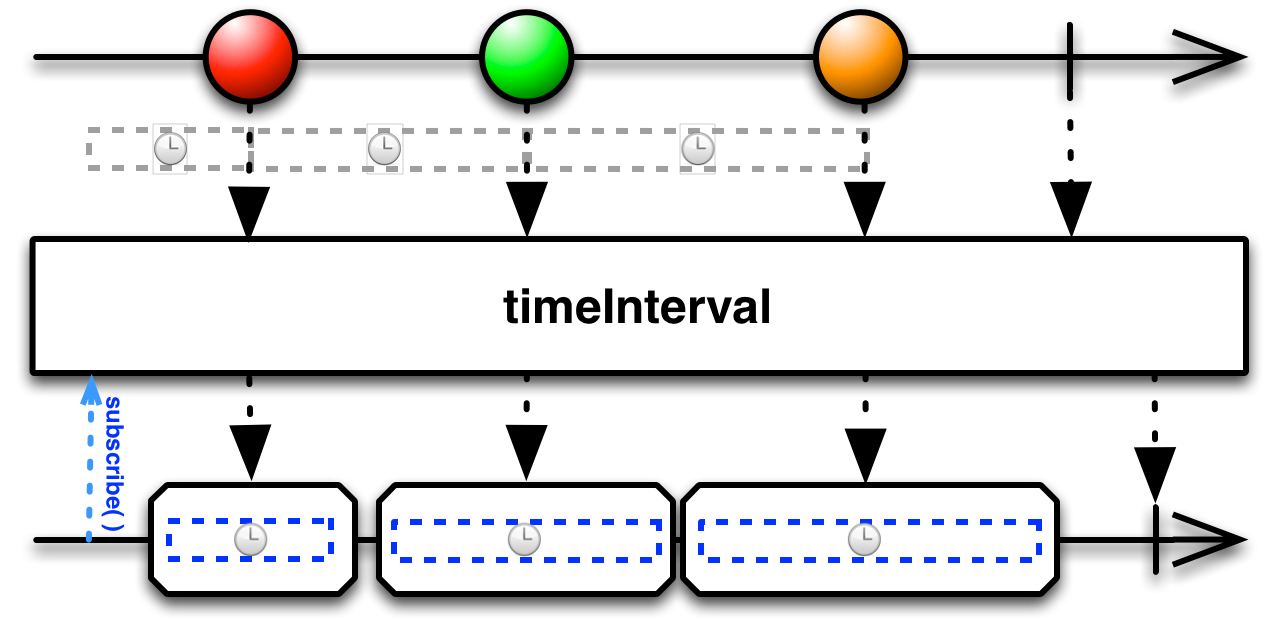
- Backpressure:
- The operator doesn't interfere with backpressure which is determined by the source
Publisher's backpressure behavior. - Scheduler:
timeIntervaldoes not operate on any particular scheduler but uses the current time from thecomputationScheduler.
Returns
- a Flowable that emits time interval information items
public final Flowable<Timed<T>> timeInterval (TimeUnit unit)
Returns a Flowable that emits records of the time interval between consecutive items emitted by the source Publisher.

- Backpressure:
- The operator doesn't interfere with backpressure which is determined by the source
Publisher's backpressure behavior. - Scheduler:
timeIntervaldoes not operate on any particular scheduler but uses the current time from thecomputationScheduler.
Parameters
| unit | the time unit for the current time |
|---|
Returns
- a Flowable that emits time interval information items
public final Flowable<T> timeout (Function<? super T, ? extends Publisher<V>> itemTimeoutIndicator)
Returns a Flowable that mirrors the source Publisher, but notifies Subscribers of a
TimeoutException if an item emitted by the source Publisher doesn't arrive within a window of
time after the emission of the previous item, where that period of time is measured by a Publisher that
is a function of the previous item.
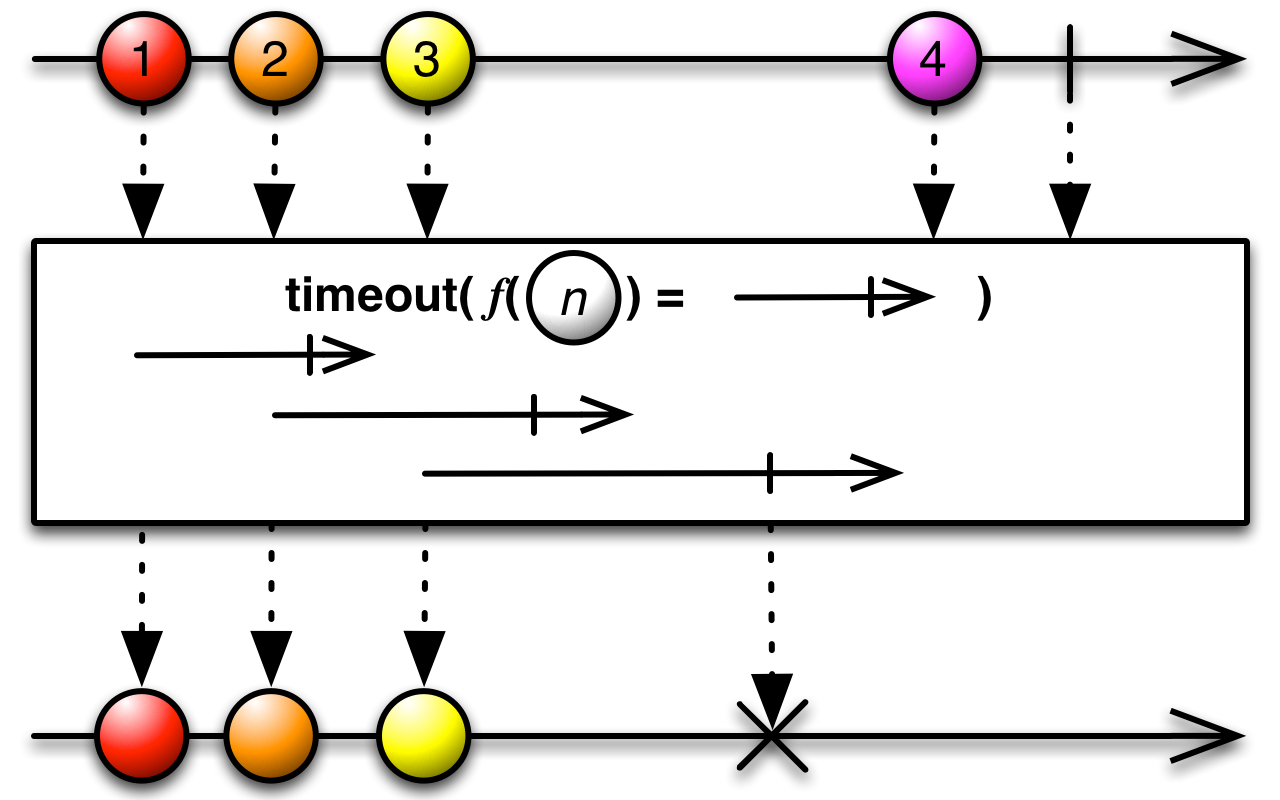
Note: The arrival of the first source item is never timed out.
- Backpressure:
- The operator honors backpressure from downstream. The
Publishersources are expected to honor backpressure as well. If any of the sourcePublishers violate this, it may throw anIllegalStateExceptionwhen the sourcePublishercompletes. - Scheduler:
- This version of
timeoutoperates by default on theimmediateScheduler.
Parameters
| itemTimeoutIndicator | a function that returns a Publisher for each item emitted by the source Publisher and that determines the timeout window for the subsequent item |
|---|
Returns
- a Flowable that mirrors the source Publisher, but notifies Subscribers of a
TimeoutExceptionif an item emitted by the source Publisher takes longer to arrive than the time window defined by the selector for the previously emitted item
public final Flowable<T> timeout (Publisher<U> firstTimeoutIndicator, Function<? super T, ? extends Publisher<V>> itemTimeoutIndicator)
Returns a Flowable that mirrors the source Publisher, but notifies Subscribers of a
TimeoutException if either the first item emitted by the source Publisher or any subsequent item
doesn't arrive within time windows defined by other Publishers.
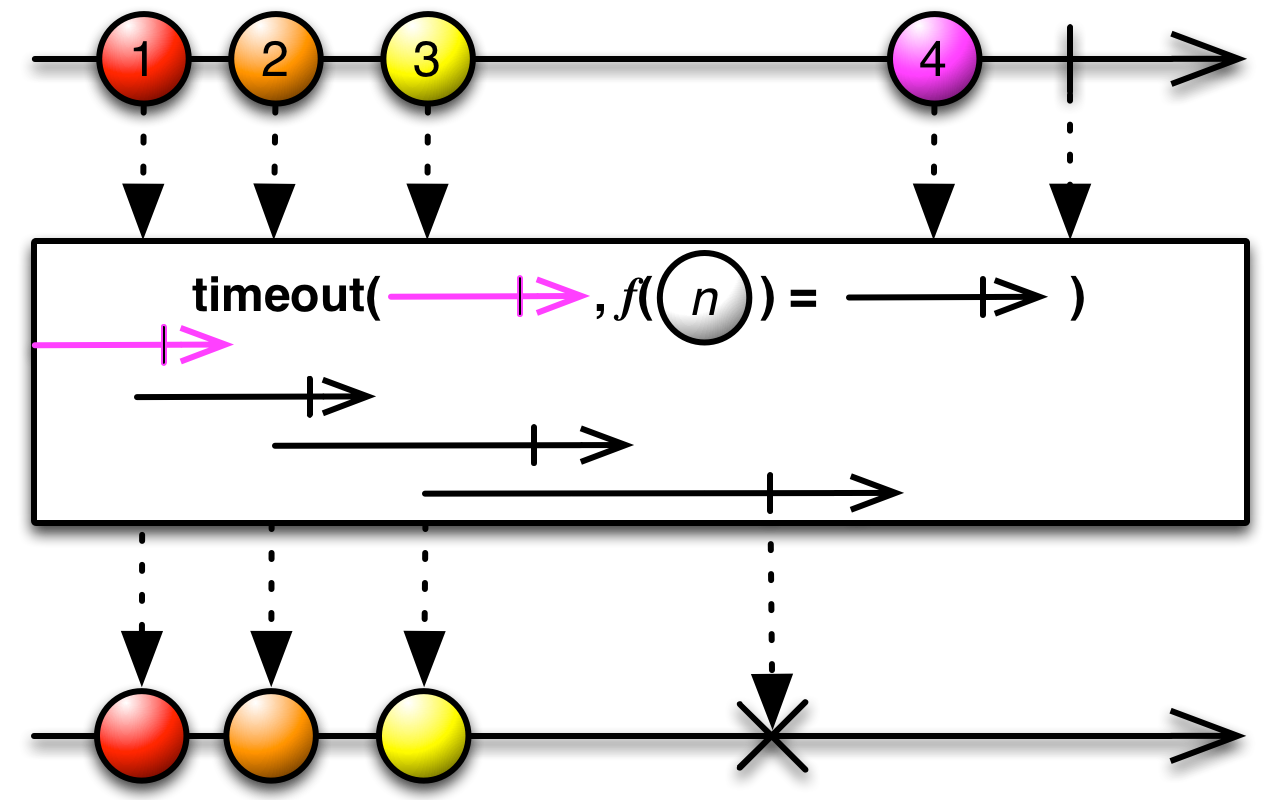
- Backpressure:
- The operator honors backpressure from downstream. Both this and the returned
Publishers are expected to honor backpressure as well. If any of then violates this rule, it may throw anIllegalStateExceptionwhen thePublishercompletes. - Scheduler:
timeoutdoes not operates by default on anyScheduler.
Parameters
| firstTimeoutIndicator | a function that returns a Publisher that determines the timeout window for the first source item |
|---|---|
| itemTimeoutIndicator | a function that returns a Publisher for each item emitted by the source Publisher and that determines the timeout window in which the subsequent source item must arrive in order to continue the sequence |
Returns
- a Flowable that mirrors the source Publisher, but notifies Subscribers of a
TimeoutExceptionif either the first item or any subsequent item doesn't arrive within the time windows specified by the timeout selectors
public final Flowable<T> timeout (long timeout, TimeUnit timeUnit)
Returns a Flowable that mirrors the source Publisher but applies a timeout policy for each emitted
item. If the next item isn't emitted within the specified timeout duration starting from its predecessor,
the resulting Publisher terminates and notifies Subscribers of a TimeoutException.
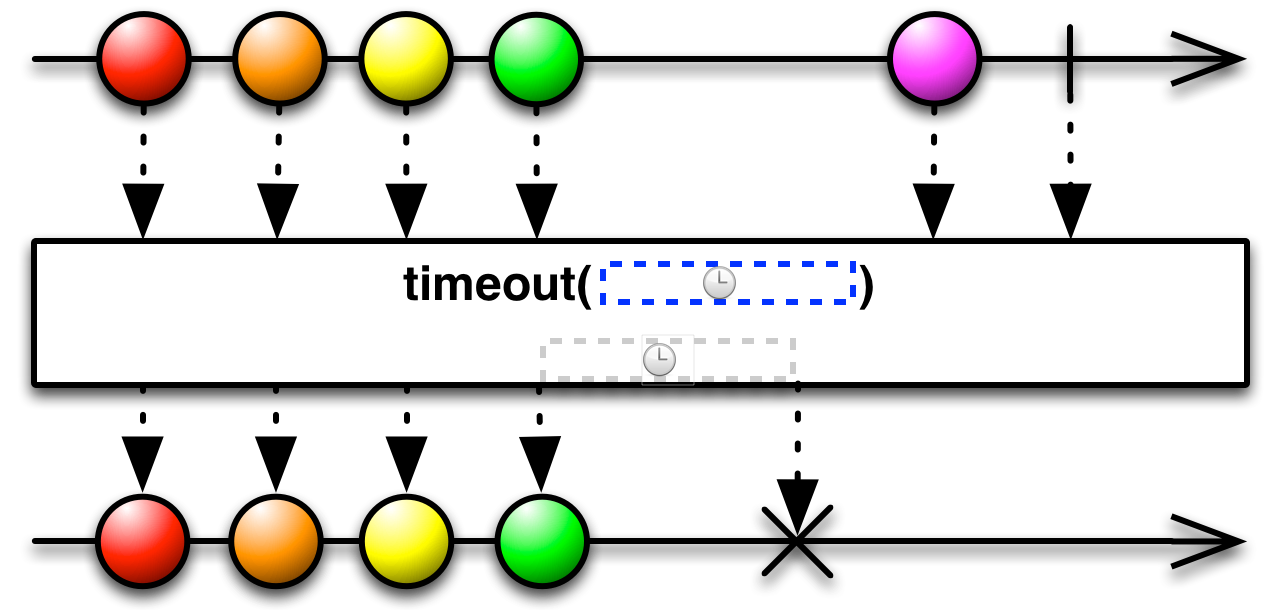
- Backpressure:
- The operator doesn't interfere with backpressure which is determined by the source
Publisher's backpressure behavior. - Scheduler:
- This version of
timeoutoperates by default on thecomputationScheduler.
Parameters
| timeout | maximum duration between emitted items before a timeout occurs |
|---|---|
| timeUnit | the unit of time that applies to the timeout argument. |
Returns
- the source Publisher modified to notify Subscribers of a
TimeoutExceptionin case of a timeout
public final Flowable<T> timeout (Publisher<U> firstTimeoutIndicator, Function<? super T, ? extends Publisher<V>> itemTimeoutIndicator, Publisher<? extends T> other)
Returns a Flowable that mirrors the source Publisher, but switches to a fallback Publisher if either the first item emitted by the source Publisher or any subsequent item doesn't arrive within time windows defined by other Publishers.
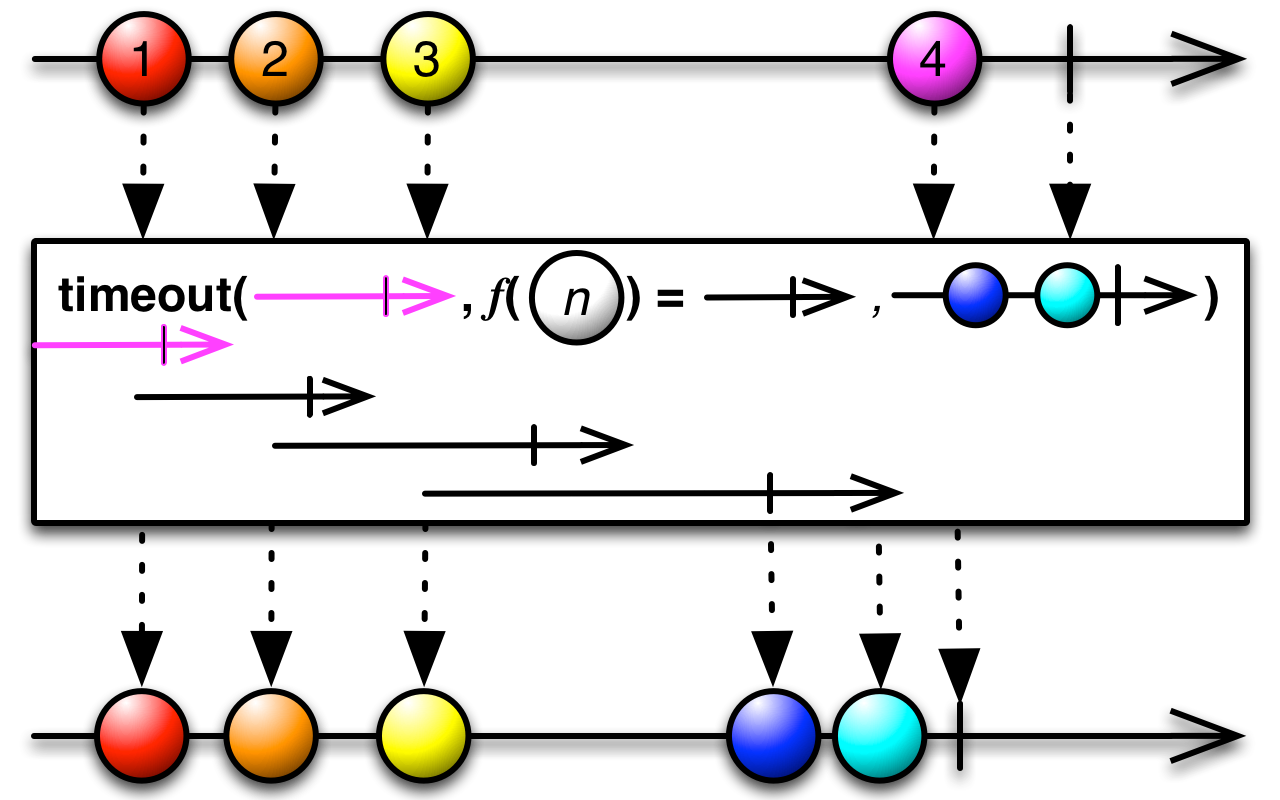
- Backpressure:
- The operator honors backpressure from downstream. The
Publishersources are expected to honor backpressure as well. If any of the sourcePublishers violate this, it may throw anIllegalStateExceptionwhen the sourcePublishercompletes. - Scheduler:
timeoutdoes not operates by default on anyScheduler.
Parameters
| firstTimeoutIndicator | a function that returns a Publisher which determines the timeout window for the first source item |
|---|---|
| itemTimeoutIndicator | a function that returns a Publisher for each item emitted by the source Publisher and that determines the timeout window in which the subsequent source item must arrive in order to continue the sequence |
| other | the fallback Publisher to switch to if the source Publisher times out |
Returns
- a Flowable that mirrors the source Publisher, but switches to the
otherPublisher if either the first item emitted by the source Publisher or any subsequent item doesn't arrive within time windows defined by the timeout selectors
Throws
| NullPointerException | if itemTimeoutIndicator is null |
|---|
public final Flowable<T> timeout (Function<? super T, ? extends Publisher<V>> itemTimeoutIndicator, Flowable<? extends T> other)
Returns a Flowable that mirrors the source Publisher, but that switches to a fallback Publisher if an item emitted by the source Publisher doesn't arrive within a window of time after the emission of the previous item, where that period of time is measured by a Publisher that is a function of the previous item.

Note: The arrival of the first source item is never timed out.
- Backpressure:
- The operator honors backpressure from downstream. The
Publishersources are expected to honor backpressure as well. If any of the sourcePublishers violate this, it may throw anIllegalStateExceptionwhen the sourcePublishercompletes. - Scheduler:
- This version of
timeoutoperates by default on theimmediateScheduler.
Parameters
| itemTimeoutIndicator | a function that returns a Publisher, for each item emitted by the source Publisher, that determines the timeout window for the subsequent item |
|---|---|
| other | the fallback Publisher to switch to if the source Publisher times out |
Returns
- a Flowable that mirrors the source Publisher, but switches to mirroring a fallback Publisher if an item emitted by the source Publisher takes longer to arrive than the time window defined by the selector for the previously emitted item
public final Flowable<T> timeout (long timeout, TimeUnit timeUnit, Publisher<? extends T> other)
Returns a Flowable that mirrors the source Publisher but applies a timeout policy for each emitted item. If the next item isn't emitted within the specified timeout duration starting from its predecessor, the resulting Publisher begins instead to mirror a fallback Publisher.
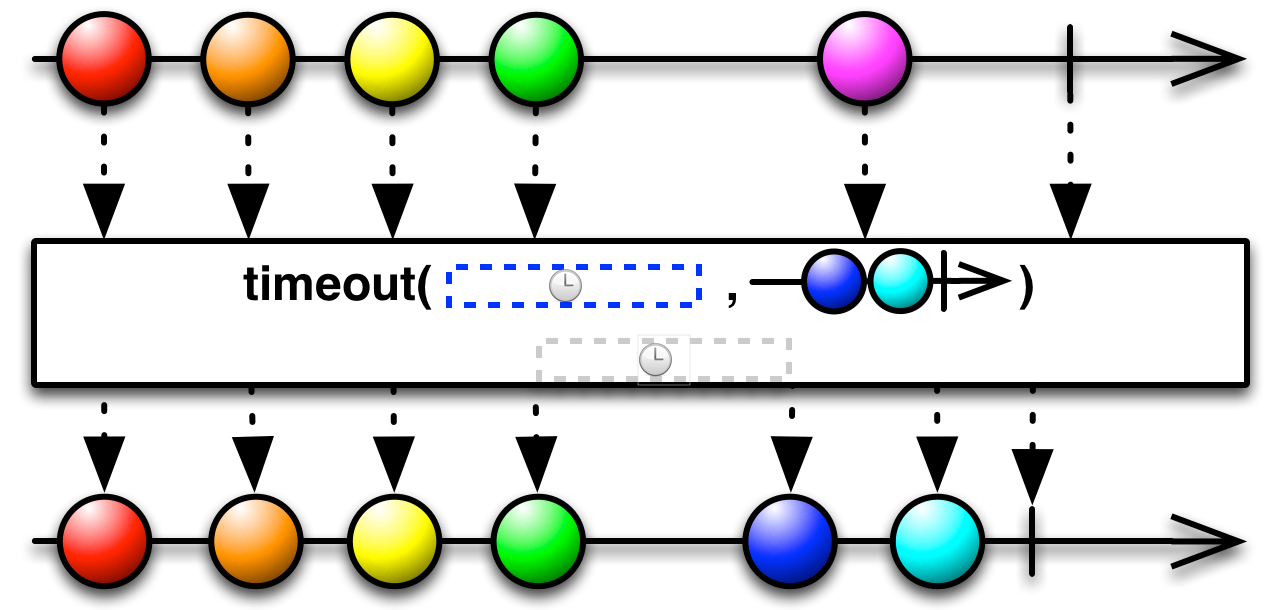
- Backpressure:
- The operator honors backpressure from downstream. The
Publishersources are expected to honor backpressure as well. If any of the sourcePublishers violate this, it may throw anIllegalStateExceptionwhen the sourcePublishercompletes. - Scheduler:
- This version of
timeoutoperates by default on thecomputationScheduler.
Parameters
| timeout | maximum duration between items before a timeout occurs |
|---|---|
| timeUnit | the unit of time that applies to the timeout argument |
| other | the fallback Publisher to use in case of a timeout |
Returns
- the source Publisher modified to switch to the fallback Publisher in case of a timeout
public final Flowable<T> timeout (long timeout, TimeUnit timeUnit, Scheduler scheduler, Publisher<? extends T> other)
Returns a Flowable that mirrors the source Publisher but applies a timeout policy for each emitted item using a specified Scheduler. If the next item isn't emitted within the specified timeout duration starting from its predecessor, the resulting Publisher begins instead to mirror a fallback Publisher.
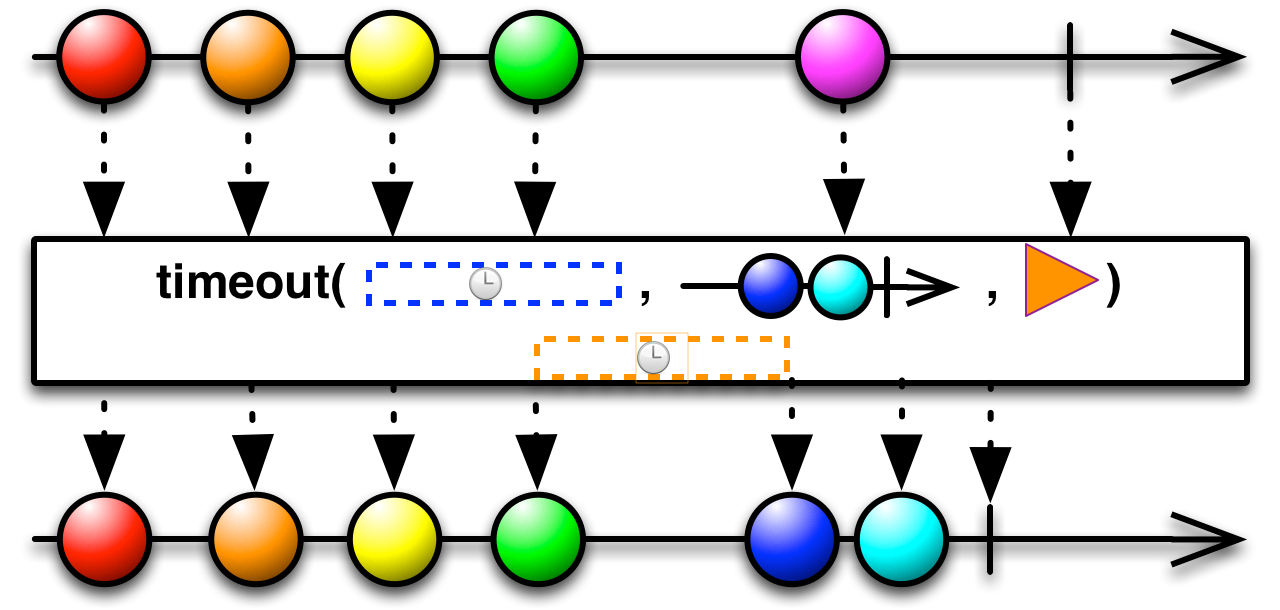
- Backpressure:
- The operator honors backpressure from downstream. The
Publishersources are expected to honor backpressure as well. If any of the sourcePublishers violate this, it may throw anIllegalStateExceptionwhen the sourcePublishercompletes. - Scheduler:
- You specify which
Schedulerthis operator will use
Parameters
| timeout | maximum duration between items before a timeout occurs |
|---|---|
| timeUnit | the unit of time that applies to the timeout argument |
| scheduler | the Scheduler to run the timeout timers on |
| other | the Publisher to use as the fallback in case of a timeout |
Returns
- the source Publisher modified so that it will switch to the fallback Publisher in case of a timeout
public final Flowable<T> timeout (long timeout, TimeUnit timeUnit, Scheduler scheduler)
Returns a Flowable that mirrors the source Publisher but applies a timeout policy for each emitted
item, where this policy is governed on a specified Scheduler. If the next item isn't emitted within the
specified timeout duration starting from its predecessor, the resulting Publisher terminates and
notifies Subscribers of a TimeoutException.
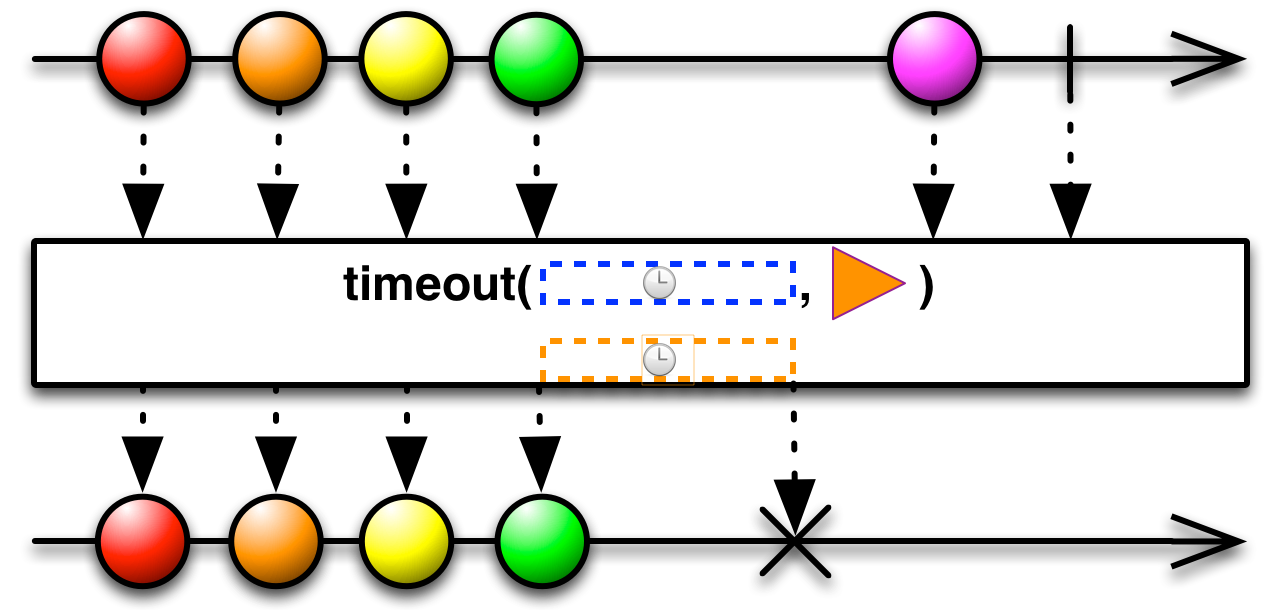
- Backpressure:
- The operator doesn't interfere with backpressure which is determined by the source
Publisher's backpressure behavior. - Scheduler:
- You specify which
Schedulerthis operator will use
Parameters
| timeout | maximum duration between items before a timeout occurs |
|---|---|
| timeUnit | the unit of time that applies to the timeout argument |
| scheduler | the Scheduler to run the timeout timers on |
Returns
- the source Publisher modified to notify Subscribers of a
TimeoutExceptionin case of a timeout
public static Flowable<Long> timer (long delay, TimeUnit unit)
Returns a Flowable that emits 0L after a specified delay, and then completes.

- Backpressure:
- This operator does not support backpressure as it uses time. If the downstream needs a slower rate
it should slow the timer or use something like
onBackpressureDrop(). - Scheduler:
timeroperates by default on thecomputationScheduler.
Parameters
| delay | the initial delay before emitting a single 0L |
|---|---|
| unit | time units to use for delay |
Returns
- a Flowable that emits
0Lafter a specified delay, and then completes
public static Flowable<Long> timer (long delay, TimeUnit unit, Scheduler scheduler)
Returns a Flowable that emits 0L after a specified delay, on a specified Scheduler, and then
completes.

- Backpressure:
- This operator does not support backpressure as it uses time. If the downstream needs a slower rate
it should slow the timer or use something like
onBackpressureDrop(). - Scheduler:
- You specify which
Schedulerthis operator will use
Parameters
| delay | the initial delay before emitting a single 0L |
|---|---|
| unit | time units to use for delay |
| scheduler | the Scheduler to use for scheduling the item |
Returns
- a Flowable that emits
0Lafter a specified delay, on a specified Scheduler, and then completes
public final Flowable<Timed<T>> timestamp (TimeUnit unit, Scheduler scheduler)
Returns a Flowable that emits each item emitted by the source Publisher, wrapped in a
Timed object whose timestamps are provided by a specified Scheduler.
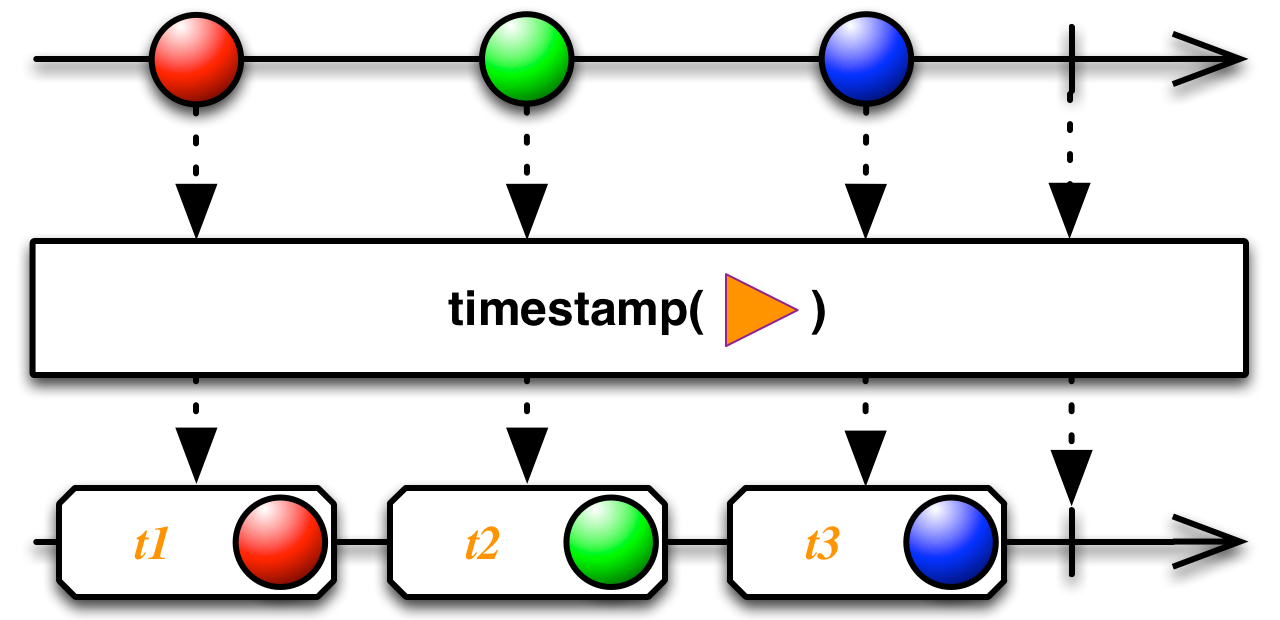
- Backpressure:
- The operator doesn't interfere with backpressure which is determined by the source
Publisher's backpressure behavior. - Scheduler:
- This operator does not operate on any particular scheduler but uses the current time
from the specified
Scheduler.
Parameters
| unit | the time unit for the current time |
|---|---|
| scheduler | the Scheduler to use as a time source |
Returns
- a Flowable that emits timestamped items from the source Publisher with timestamps provided by
the
scheduler
public final Flowable<Timed<T>> timestamp ()
Returns a Flowable that emits each item emitted by the source Publisher, wrapped in a
Timed object.
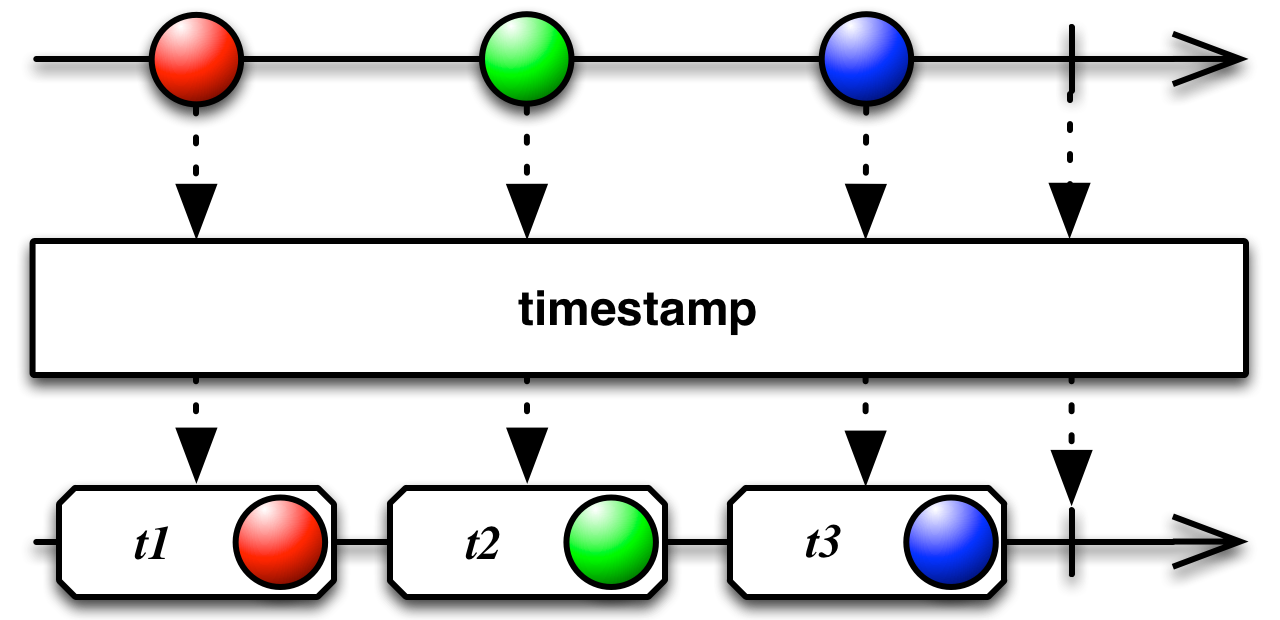
- Backpressure:
- The operator doesn't interfere with backpressure which is determined by the source
Publisher's backpressure behavior. - Scheduler:
timestampdoes not operate on any particular scheduler but uses the current time from thecomputationScheduler.
Returns
- a Flowable that emits timestamped items from the source Publisher
public final Flowable<Timed<T>> timestamp (Scheduler scheduler)
Returns a Flowable that emits each item emitted by the source Publisher, wrapped in a
Timed object whose timestamps are provided by a specified Scheduler.

- Backpressure:
- The operator doesn't interfere with backpressure which is determined by the source
Publisher's backpressure behavior. - Scheduler:
- This operator does not operate on any particular scheduler but uses the current time
from the specified
Scheduler.
Parameters
| scheduler | the Scheduler to use as a time source |
|---|
Returns
- a Flowable that emits timestamped items from the source Publisher with timestamps provided by
the
scheduler
public final Flowable<Timed<T>> timestamp (TimeUnit unit)
Returns a Flowable that emits each item emitted by the source Publisher, wrapped in a
Timed object.

- Backpressure:
- The operator doesn't interfere with backpressure which is determined by the source
Publisher's backpressure behavior. - Scheduler:
timestampdoes not operate on any particular scheduler but uses the current time from thecomputationScheduler.
Parameters
| unit | the time unit for the current time |
|---|
Returns
- a Flowable that emits timestamped items from the source Publisher
public final R to (Function<? super Flowable<T>, R> converter)
Calls the specified converter function during assembly time and returns its resulting value.
This allows fluent conversion to any other type.
- Backpressure:
- The backpressure behavior depends on what happens in the
converterfunction. - Scheduler:
todoes not operate by default on a particularScheduler.
Parameters
| converter | the function that receives the current Flowable instance and returns a value |
|---|
Returns
- the value returned by the function
public final Future<T> toFuture ()
Returns a Future representing the single value emitted by this Flowable.
If the Flowable emits more than one item, Future will receive an
IllegalArgumentException. If the Flowable is empty, Future
will receive an NoSuchElementException.
If the Flowable may emit more than one item, use Flowable.toList().toFuture().

- Backpressure:
- The operator consumes the source
Flowablein an unbounded manner (i.e., no backpressure applied to it). - Scheduler:
toFuturedoes not operate by default on a particularScheduler.
Returns
- a
Futurethat expects a single item to be emitted by thisFlowable
See Also
public final Single<U> toList (Callable<U> collectionSupplier)
Returns a Single that emits a single item, a list composed of all the items emitted by the finite source Publisher.
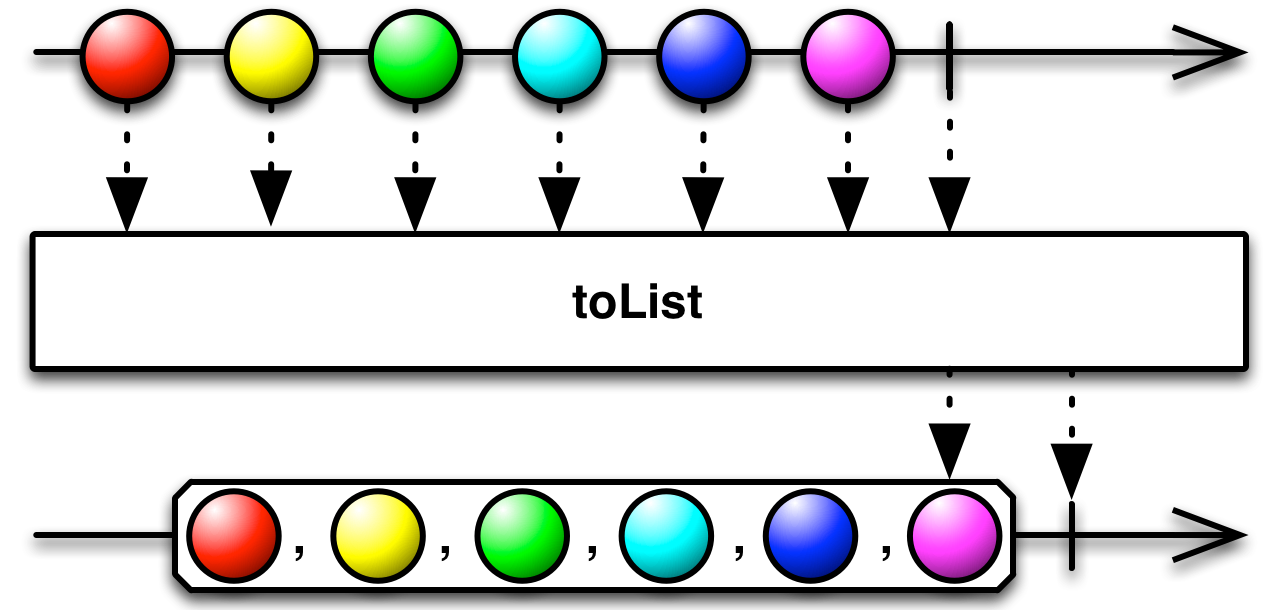
Normally, a Publisher that returns multiple items will do so by invoking its Subscriber's
onNext method for each such item. You can change this behavior, instructing the
Publisher to compose a list of all of these items and then to invoke the Subscriber's onNext
function once, passing it the entire list, by calling the Publisher's toList method prior to
calling its subscribe() method.
Note that this operator requires the upstream to signal onComplete for the accumulated collection to
be emitted. Sources that are infinite and never complete will never emit anything through this
operator and an infinite source may lead to a fatal OutOfMemoryError.
- Backpressure:
- The operator honors backpressure from downstream and consumes the source
Publisherin an unbounded manner (i.e., without applying backpressure to it). - Scheduler:
toListdoes not operate by default on a particularScheduler.
Parameters
| collectionSupplier | the Callable returning the collection (for each individual Subscriber) to be filled in |
|---|
Returns
- a Single that emits a single item: a List containing all of the items emitted by the source Publisher
public final Single<List<T>> toList ()
Returns a Single that emits a single item, a list composed of all the items emitted by the finite upstream source Publisher.

Normally, a Publisher that returns multiple items will do so by invoking its Subscriber's
onNext method for each such item. You can change this behavior, instructing the
Publisher to compose a list of all of these items and then to invoke the Subscriber's onNext
function once, passing it the entire list, by calling the Publisher's toList method prior to
calling its subscribe() method.
Note that this operator requires the upstream to signal onComplete for the accumulated list to
be emitted. Sources that are infinite and never complete will never emit anything through this
operator and an infinite source may lead to a fatal OutOfMemoryError.
- Backpressure:
- The operator honors backpressure from downstream and consumes the source
Publisherin an unbounded manner (i.e., without applying backpressure to it). - Scheduler:
toListdoes not operate by default on a particularScheduler.
Returns
- a Single that emits a single item: a List containing all of the items emitted by the source Publisher
public final Single<List<T>> toList (int capacityHint)
Returns a Single that emits a single item, a list composed of all the items emitted by the finite source Publisher.

Normally, a Publisher that returns multiple items will do so by invoking its Subscriber's
onNext method for each such item. You can change this behavior, instructing the
Publisher to compose a list of all of these items and then to invoke the Subscriber's onNext
function once, passing it the entire list, by calling the Publisher's toList method prior to
calling its subscribe() method.
Note that this operator requires the upstream to signal onComplete for the accumulated list to
be emitted. Sources that are infinite and never complete will never emit anything through this
operator and an infinite source may lead to a fatal OutOfMemoryError.
- Backpressure:
- The operator honors backpressure from downstream and consumes the source
Publisherin an unbounded manner (i.e., without applying backpressure to it). - Scheduler:
toListdoes not operate by default on a particularScheduler.
Parameters
| capacityHint | the number of elements expected from the current Flowable |
|---|
Returns
- a Flowable that emits a single item: a List containing all of the items emitted by the source Publisher
public final Single<Map<K, T>> toMap (Function<? super T, ? extends K> keySelector)
Returns a Single that emits a single HashMap containing all items emitted by the source Publisher,
mapped by the keys returned by a specified keySelector function.
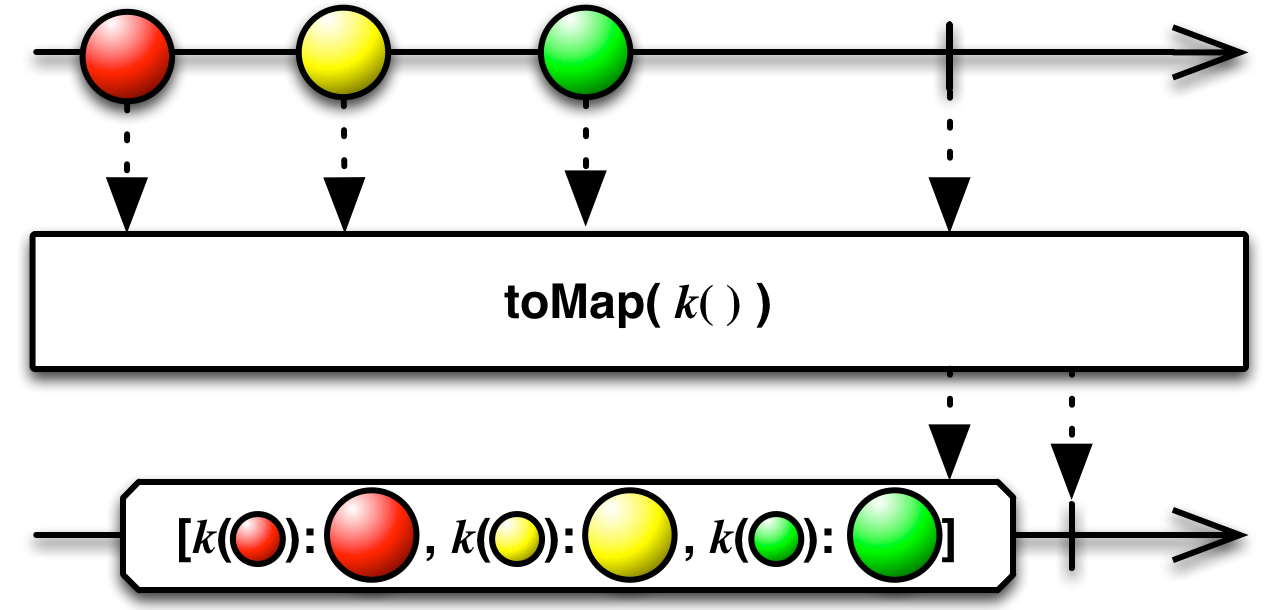
If more than one source item maps to the same key, the HashMap will contain the latest of those items.
- Backpressure:
- The operator honors backpressure from downstream and consumes the source
Publisherin an unbounded manner (i.e., without applying backpressure to it). - Scheduler:
toMapdoes not operate by default on a particularScheduler.
Parameters
| keySelector | the function that extracts the key from a source item to be used in the HashMap |
|---|
Returns
- a Single that emits a single item: a HashMap containing the mapped items from the source Publisher
public final Single<Map<K, V>> toMap (Function<? super T, ? extends K> keySelector, Function<? super T, ? extends V> valueSelector, Callable<? extends Map<K, V>> mapSupplier)
Returns a Single that emits a single Map, returned by a specified mapFactory function, that
contains keys and values extracted from the items emitted by the source Publisher.

- Backpressure:
- The operator honors backpressure from downstream and consumes the source
Publisherin an unbounded manner (i.e., without applying backpressure to it). - Scheduler:
toMapdoes not operate by default on a particularScheduler.
Parameters
| keySelector | the function that extracts the key from a source item to be used in the Map |
|---|---|
| valueSelector | the function that extracts the value from the source items to be used as value in the Map |
| mapSupplier | the function that returns a Map instance to be used |
Returns
- a Flowable that emits a single item: a Map that contains the mapped items emitted by the source Publisher
public final Single<Map<K, V>> toMap (Function<? super T, ? extends K> keySelector, Function<? super T, ? extends V> valueSelector)
Returns a Single that emits a single HashMap containing values corresponding to items emitted by the
source Publisher, mapped by the keys returned by a specified keySelector function.

If more than one source item maps to the same key, the HashMap will contain a single entry that corresponds to the latest of those items.
- Backpressure:
- The operator honors backpressure from downstream and consumes the source
Publisherin an unbounded manner (i.e., without applying backpressure to it). - Scheduler:
toMapdoes not operate by default on a particularScheduler.
Parameters
| keySelector | the function that extracts the key from a source item to be used in the HashMap |
|---|---|
| valueSelector | the function that extracts the value from a source item to be used in the HashMap |
Returns
- a Single that emits a single item: a HashMap containing the mapped items from the source Publisher
public final Single<Map<K, Collection<T>>> toMultimap (Function<? super T, ? extends K> keySelector)
Returns a Single that emits a single HashMap that contains an ArrayList of items emitted by the
source Publisher keyed by a specified keySelector function.
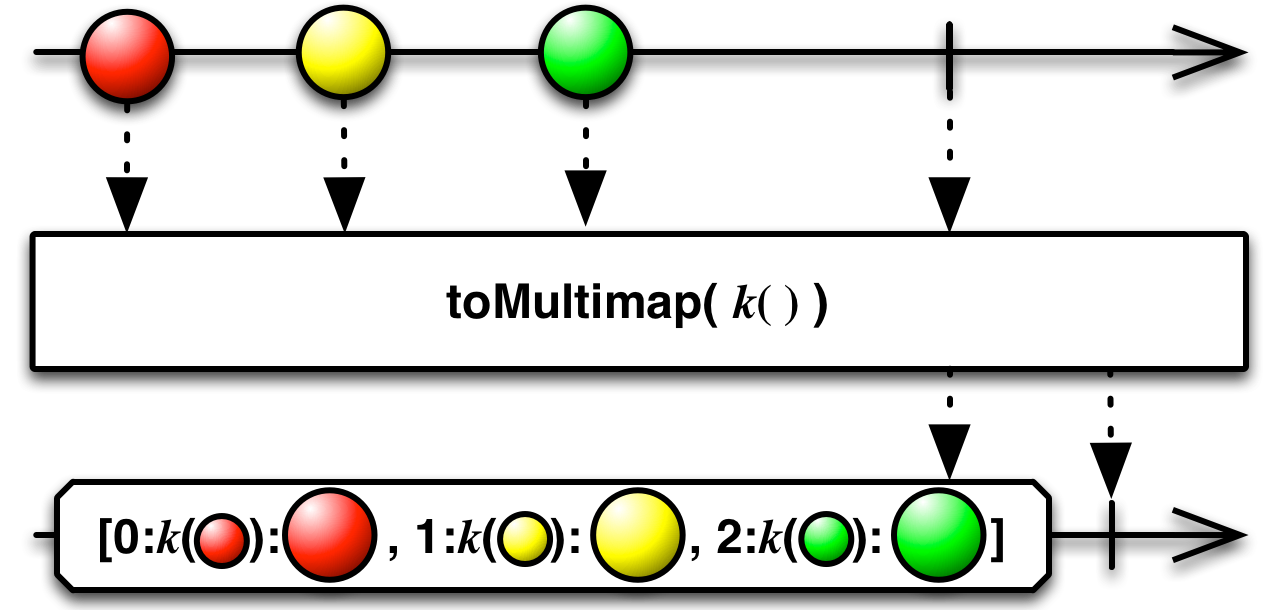
- Backpressure:
- This operator does not support backpressure as by intent it is requesting and buffering everything.
- Scheduler:
toMultimapdoes not operate by default on a particularScheduler.
Parameters
| keySelector | the function that extracts the key from the source items to be used as key in the HashMap |
|---|
Returns
- a Single that emits a single item: a HashMap that contains an ArrayList of items mapped from the source Publisher
public final Single<Map<K, Collection<V>>> toMultimap (Function<? super T, ? extends K> keySelector, Function<? super T, ? extends V> valueSelector, Callable<Map<K, Collection<V>>> mapSupplier)
Returns a Single that emits a single Map, returned by a specified mapFactory function, that
contains an ArrayList of values, extracted by a specified valueSelector function from items
emitted by the source Publisher and keyed by the keySelector function.

- Backpressure:
- The operator honors backpressure from downstream and consumes the source
Publisherin an unbounded manner (i.e., without applying backpressure to it). - Scheduler:
toMultimapdoes not operate by default on a particularScheduler.
Parameters
| keySelector | the function that extracts a key from the source items to be used as the key in the Map |
|---|---|
| valueSelector | the function that extracts a value from the source items to be used as the value in the Map |
| mapSupplier | the function that returns a Map instance to be used |
Returns
- a Single that emits a single item: a Map that contains a list items mapped from the source Publisher
public final Single<Map<K, Collection<V>>> toMultimap (Function<? super T, ? extends K> keySelector, Function<? super T, ? extends V> valueSelector)
Returns a Single that emits a single HashMap that contains an ArrayList of values extracted by a
specified valueSelector function from items emitted by the source Publisher, keyed by a
specified keySelector function.

- Backpressure:
- The operator honors backpressure from downstream and consumes the source
Publisherin an unbounded manner (i.e., without applying backpressure to it). - Scheduler:
toMultimapdoes not operate by default on a particularScheduler.
Parameters
| keySelector | the function that extracts a key from the source items to be used as key in the HashMap |
|---|---|
| valueSelector | the function that extracts a value from the source items to be used as value in the HashMap |
Returns
- a Single that emits a single item: a HashMap that contains an ArrayList of items mapped from the source Publisher
public final Single<Map<K, Collection<V>>> toMultimap (Function<? super T, ? extends K> keySelector, Function<? super T, ? extends V> valueSelector, Callable<? extends Map<K, Collection<V>>> mapSupplier, Function<? super K, ? extends Collection<? super V>> collectionFactory)
Returns a Single that emits a single Map, returned by a specified mapFactory function, that
contains a custom collection of values, extracted by a specified valueSelector function from
items emitted by the source Publisher, and keyed by the keySelector function.

- Backpressure:
- The operator honors backpressure from downstream and consumes the source
Publisherin an unbounded manner (i.e., without applying backpressure to it). - Scheduler:
toMultimapdoes not operate by default on a particularScheduler.
Parameters
| keySelector | the function that extracts a key from the source items to be used as the key in the Map |
|---|---|
| valueSelector | the function that extracts a value from the source items to be used as the value in the Map |
| mapSupplier | the function that returns a Map instance to be used |
| collectionFactory | the function that returns a Collection instance for a particular key to be used in the Map |
Returns
- a Single that emits a single item: a Map that contains the collection of mapped items from the source Publisher
public final Observable<T> toObservable ()
Converts the current Flowable into a non-backpressured Observable.
- Backpressure:
- Observables don't support backpressure thus the current Flowable is consumed in an unbounded manner (by requesting Long.MAX_VALUE).
- Scheduler:
toObservabledoes not operate by default on a particularScheduler.
Returns
- the new Observable instance
public final Single<List<T>> toSortedList (Comparator<? super T> comparator, int capacityHint)
Returns a Single that emits a list that contains the items emitted by the source Publisher, in a sorted order based on a specified comparison function.
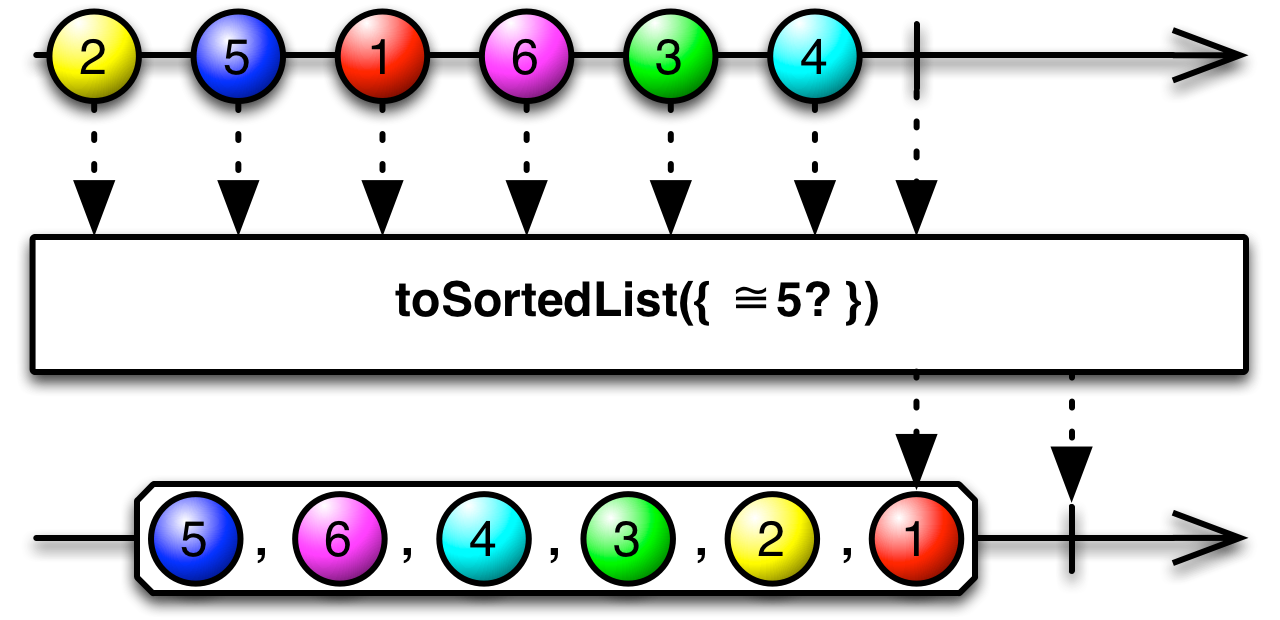
- Backpressure:
- The operator honors backpressure from downstream and consumes the source
Publisherin an unbounded manner (i.e., without applying backpressure to it). - Scheduler:
toSortedListdoes not operate by default on a particularScheduler.
Parameters
| comparator | a function that compares two items emitted by the source Publisher and returns an Integer that indicates their sort order |
|---|---|
| capacityHint | the initial capacity of the ArrayList used to accumulate items before sorting |
Returns
- a Single that emits a list that contains the items emitted by the source Publisher in sorted order
public final Single<List<T>> toSortedList (Comparator<? super T> comparator)
Returns a Single that emits a list that contains the items emitted by the source Publisher, in a sorted order based on a specified comparison function.

- Backpressure:
- The operator honors backpressure from downstream and consumes the source
Publisherin an unbounded manner (i.e., without applying backpressure to it). - Scheduler:
toSortedListdoes not operate by default on a particularScheduler.
Parameters
| comparator | a function that compares two items emitted by the source Publisher and returns an Integer that indicates their sort order |
|---|
Returns
- a Single that emits a list that contains the items emitted by the source Publisher in sorted order
public final Single<List<T>> toSortedList ()
Returns a Single that emits a list that contains the items emitted by the source Publisher, in a
sorted order. Each item emitted by the Publisher must implement Comparable with respect to all
other items in the sequence.
If any item emitted by this Flowable does not implement Comparable with respect to
all other items emitted by this Flowable, no items will be emitted and the
sequence is terminated with a ClassCastException.
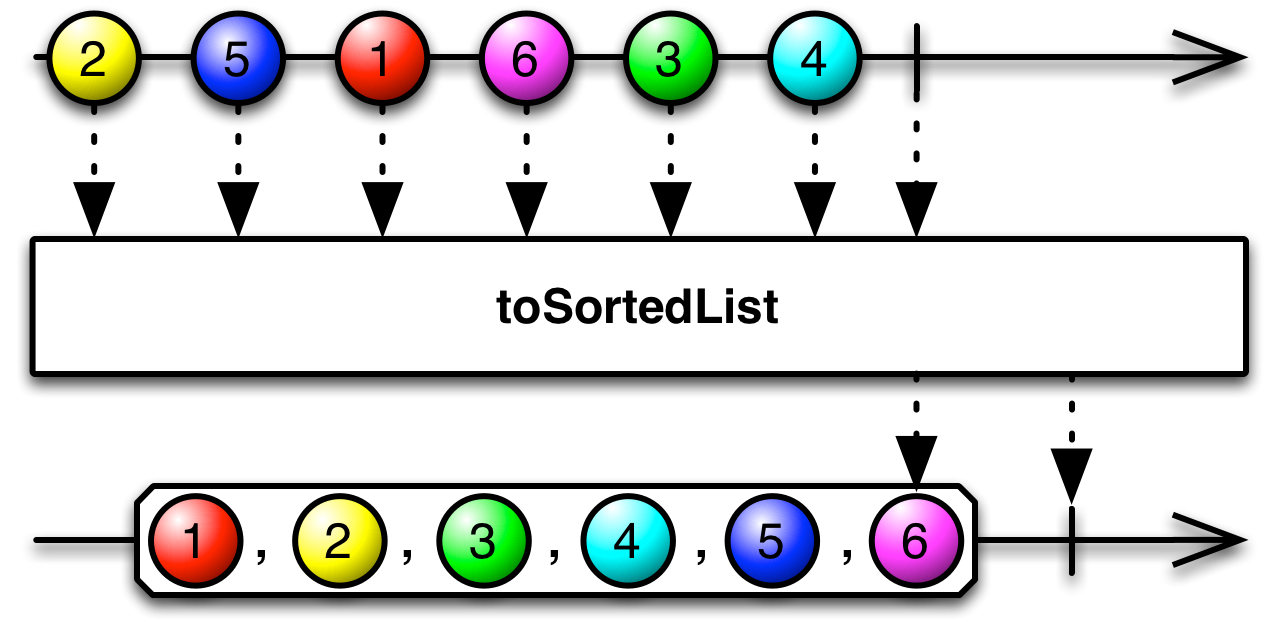
- Backpressure:
- The operator honors backpressure from downstream and consumes the source
Publisherin an unbounded manner (i.e., without applying backpressure to it). - Scheduler:
toSortedListdoes not operate by default on a particularScheduler.
Returns
- a Single that emits a list that contains the items emitted by the source Publisher in sorted order
public final Single<List<T>> toSortedList (int capacityHint)
Returns a Flowable that emits a list that contains the items emitted by the source Publisher, in a
sorted order. Each item emitted by the Publisher must implement Comparable with respect to all
other items in the sequence.
If any item emitted by this Flowable does not implement Comparable with respect to
all other items emitted by this Flowable, no items will be emitted and the
sequence is terminated with a ClassCastException.

- Backpressure:
- The operator honors backpressure from downstream and consumes the source
Publisherin an unbounded manner (i.e., without applying backpressure to it). - Scheduler:
toSortedListdoes not operate by default on a particularScheduler.
Parameters
| capacityHint | the initial capacity of the ArrayList used to accumulate items before sorting |
|---|
Returns
- a Flowable that emits a list that contains the items emitted by the source Publisher in sorted order
public static Flowable<T> unsafeCreate (Publisher<T> onSubscribe)
Create a Flowable by wrapping a Publisher which has to be implemented according to the Reactive-Streams specification by handling backpressure and cancellation correctly; no safeguards are provided by the Flowable itself.
- Backpressure:
- This operator is a pass-through for backpressure and the behavior is determined by the provided Publisher implementation.
- Scheduler:
unsafeCreateby default doesn't operate on any particularScheduler.
Parameters
| onSubscribe | the Publisher instance to wrap |
|---|
Returns
- the new Flowable instance
Throws
| IllegalArgumentException | if onSubscribe is a subclass of Flowable; such
instances don't need conversion and is possibly a port remnant from 1.x or one should use hide()
instead.
|
|---|
public final Flowable<T> unsubscribeOn (Scheduler scheduler)
Modifies the source Publisher so that subscribers will cancel it on a specified
Scheduler.
- Backpressure:
- The operator doesn't interfere with backpressure which is determined by the source
Publisher's backpressure behavior. - Scheduler:
- You specify which
Schedulerthis operator will use
Parameters
| scheduler | the Scheduler to perform cancellation actions on |
|---|
Returns
- the source Publisher modified so that its cancellations happen on the specified
Scheduler
public static Flowable<T> using (Callable<? extends D> resourceSupplier, Function<? super D, ? extends Publisher<? extends T>> sourceSupplier, Consumer<? super D> resourceDisposer)
Constructs a Publisher that creates a dependent resource object which is disposed of on cancellation.
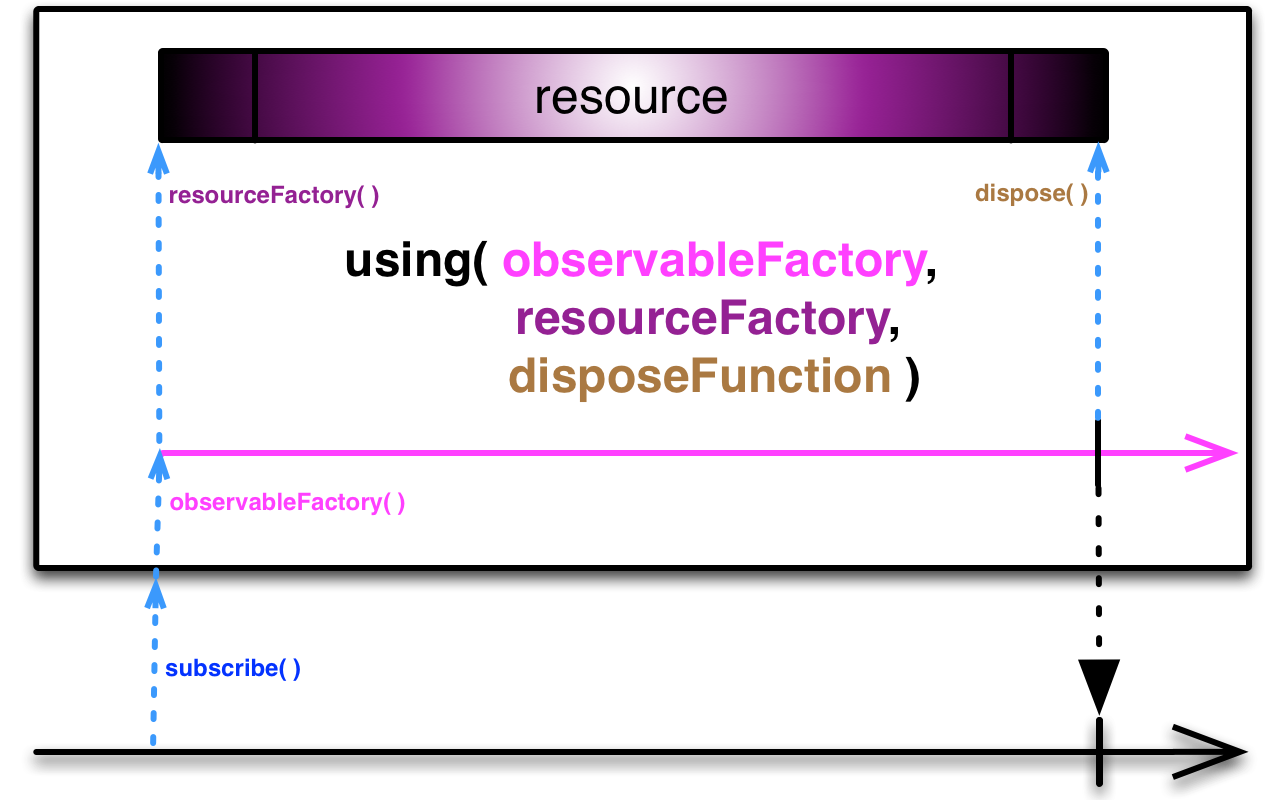
- Backpressure:
- The operator is a pass-through for backpressure and otherwise depends on the
backpressure support of the Publisher returned by the
resourceFactory. - Scheduler:
usingdoes not operate by default on a particularScheduler.
Parameters
| resourceSupplier | the factory function to create a resource object that depends on the Publisher |
|---|---|
| sourceSupplier | the factory function to create a Publisher |
| resourceDisposer | the function that will dispose of the resource |
Returns
- the Publisher whose lifetime controls the lifetime of the dependent resource object
public static Flowable<T> using (Callable<? extends D> resourceSupplier, Function<? super D, ? extends Publisher<? extends T>> sourceSupplier, Consumer<? super D> resourceDisposer, boolean eager)
Constructs a Publisher that creates a dependent resource object which is disposed of just before
termination if you have set disposeEagerly to true and cancellation does not occur
before termination. Otherwise resource disposal will occur on cancellation. Eager disposal is
particularly appropriate for a synchronous Publisher that reuses resources. disposeAction will
only be called once per subscription.

- Backpressure:
- The operator is a pass-through for backpressure and otherwise depends on the
backpressure support of the Publisher returned by the
resourceFactory. - Scheduler:
usingdoes not operate by default on a particularScheduler.
Parameters
| resourceSupplier | the factory function to create a resource object that depends on the Publisher |
|---|---|
| sourceSupplier | the factory function to create a Publisher |
| resourceDisposer | the function that will dispose of the resource |
| eager | if true then disposal will happen either on cancellation or just before emission of
a terminal event (onComplete or onError). |
Returns
- the Publisher whose lifetime controls the lifetime of the dependent resource object
public final Flowable<Flowable<T>> window (Publisher<U> openingIndicator, Function<? super U, ? extends Publisher<V>> closingIndicator)
Returns a Flowable that emits windows of items it collects from the source Publisher. The resulting
Publisher emits windows that contain those items emitted by the source Publisher between the time when
the windowOpenings Publisher emits an item and when the Publisher returned by
closingSelector emits an item.
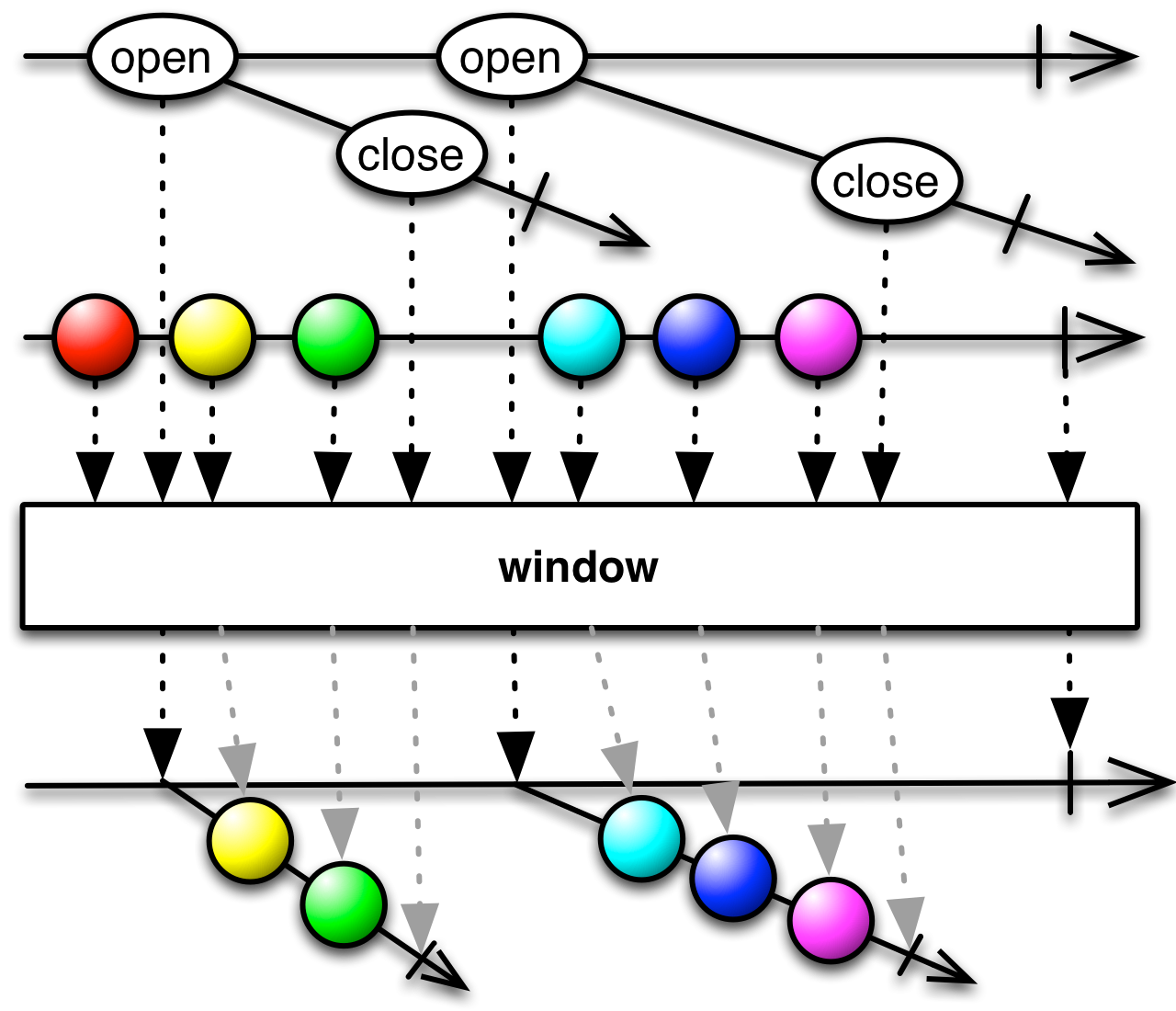
- Backpressure:
- The outer Publisher of this operator doesn't support backpressure because the emission of new
inner Publishers are controlled by the
windowOpeningsPublisher. The inner Publishers honor backpressure and buffer everything until the associated closing Publisher signals or completes. - Scheduler:
- This version of
windowdoes not operate by default on a particularScheduler.
Parameters
| openingIndicator | a Publisher that, when it emits an item, causes another window to be created |
|---|---|
| closingIndicator | a Function that produces a Publisher for every window created. When this Publisher
emits an item, the associated window is closed and emitted |
Returns
- a Flowable that emits windows of items emitted by the source Publisher that are governed by the specified window-governing Publishers
public final Flowable<Flowable<T>> window (long timespan, long timeskip, TimeUnit unit, Scheduler scheduler)
Returns a Flowable that emits windows of items it collects from the source Publisher. The resulting
Publisher starts a new window periodically, as determined by the timeskip argument. It emits
each window after a fixed timespan, specified by the timespan argument. When the source
Publisher completes or Publisher completes or encounters an error, the resulting Publisher emits the
current window and propagates the notification from the source Publisher.
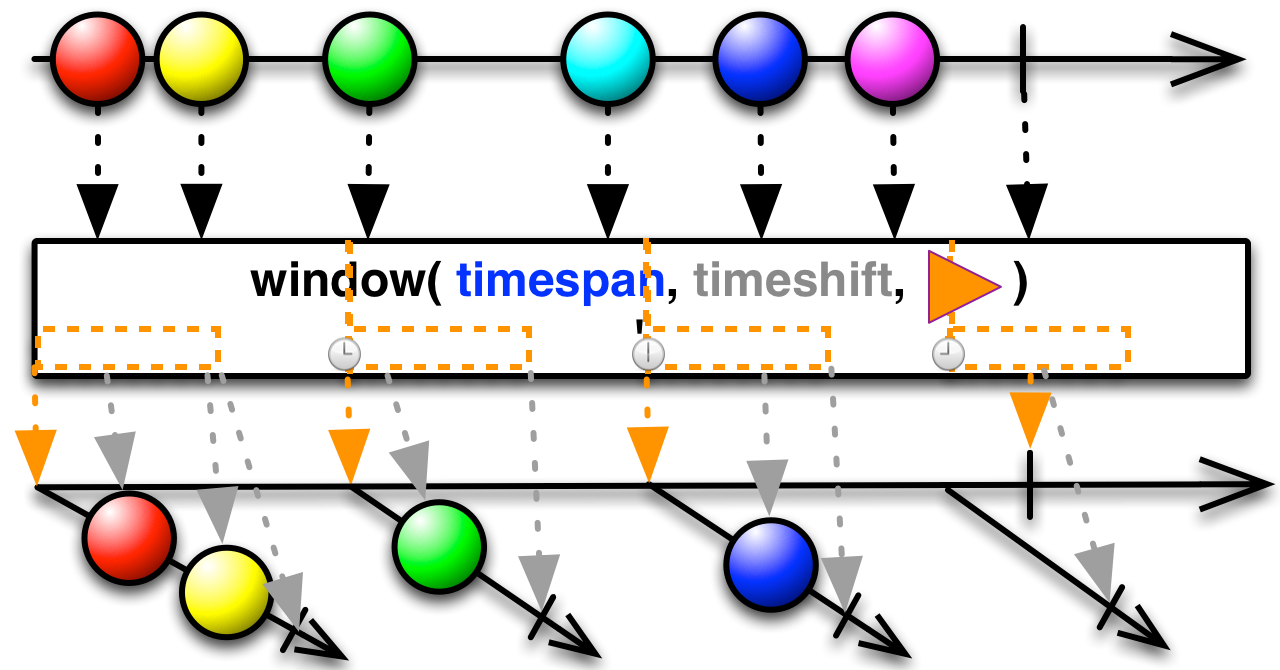
- Backpressure:
- The operator consumes the source
Publisherin an unbounded manner. The returnedPublisherdoesn't support backpressure as it uses time to control the creation of windows. The returned innerPublishers honor backpressure but have an unbounded inner buffer that may lead toOutOfMemoryErrorif left unconsumed. - Scheduler:
- You specify which
Schedulerthis operator will use
Parameters
| timespan | the period of time each window collects items before it should be emitted |
|---|---|
| timeskip | the period of time after which a new window will be created |
| unit | the unit of time that applies to the timespan and timeskip arguments |
| scheduler | the Scheduler to use when determining the end and start of a window |
Returns
- a Flowable that emits new windows periodically as a fixed timespan elapses
public final Flowable<Flowable<T>> window (long timespan, TimeUnit unit, Scheduler scheduler, long count, boolean restart)
Returns a Flowable that emits windows of items it collects from the source Publisher. The resulting
Publisher emits connected, non-overlapping windows, each of a fixed duration specified by the
timespan argument or a maximum size specified by the count argument (whichever is reached
first). When the source Publisher completes or encounters an error, the resulting Publisher emits the
current window and propagates the notification from the source Publisher.
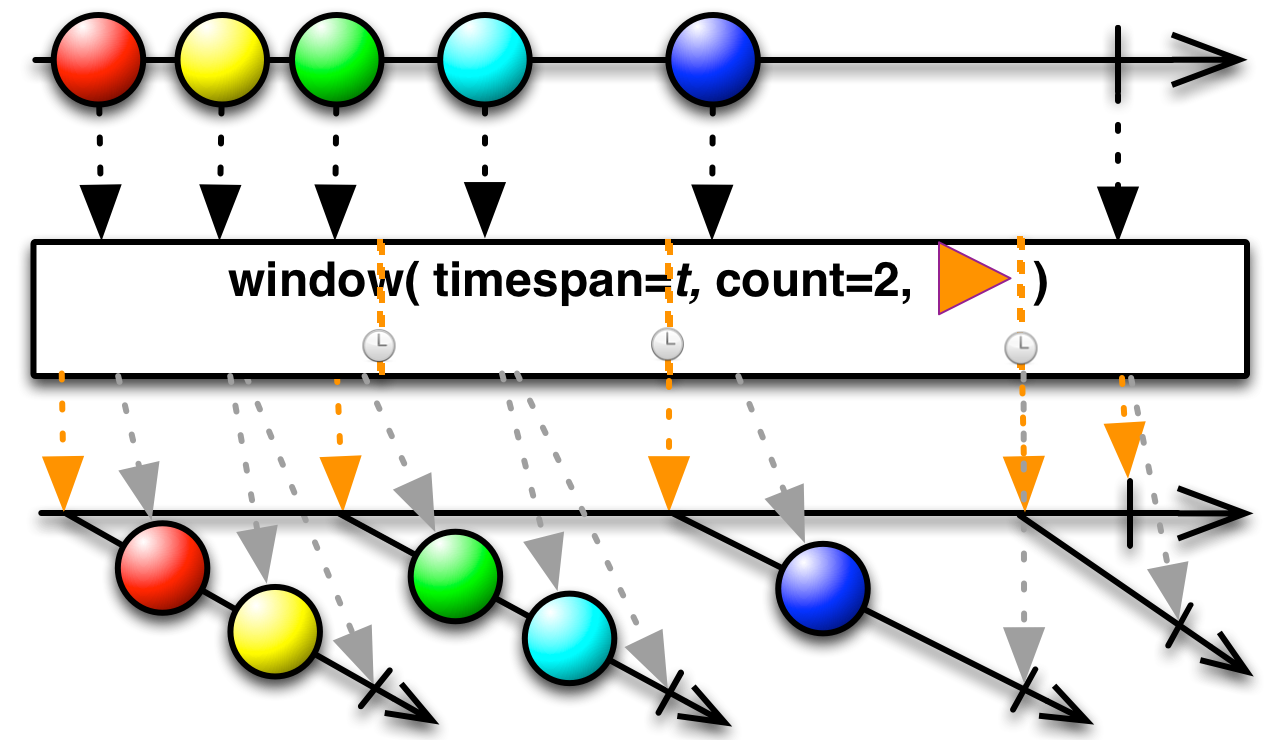
- Backpressure:
- The operator consumes the source
Publisherin an unbounded manner. The returnedPublisherdoesn't support backpressure as it uses time to control the creation of windows. The returned innerPublishers honor backpressure and may hold up tocountelements at most. - Scheduler:
- You specify which
Schedulerthis operator will use
Parameters
| timespan | the period of time each window collects items before it should be emitted and replaced with a new window |
|---|---|
| unit | the unit of time which applies to the timespan argument |
| scheduler | the Scheduler to use when determining the end and start of a window |
| count | the maximum size of each window before it should be emitted |
| restart | if true, when a window reaches the capacity limit, the timer is restarted as well |
Returns
- a Flowable that emits connected, non-overlapping windows of items from the source Publisher that were emitted during a fixed duration of time or when the window has reached maximum capacity (whichever occurs first)
public final Flowable<Flowable<T>> window (long timespan, TimeUnit unit, Scheduler scheduler, long count, boolean restart, int bufferSize)
Returns a Flowable that emits windows of items it collects from the source Publisher. The resulting
Publisher emits connected, non-overlapping windows, each of a fixed duration specified by the
timespan argument or a maximum size specified by the count argument (whichever is reached
first). When the source Publisher completes or encounters an error, the resulting Publisher emits the
current window and propagates the notification from the source Publisher.

- Backpressure:
- The operator consumes the source
Publisherin an unbounded manner. The returnedPublisherdoesn't support backpressure as it uses time to control the creation of windows. The returned innerPublishers honor backpressure and may hold up tocountelements at most. - Scheduler:
- You specify which
Schedulerthis operator will use
Parameters
| timespan | the period of time each window collects items before it should be emitted and replaced with a new window |
|---|---|
| unit | the unit of time which applies to the timespan argument |
| scheduler | the Scheduler to use when determining the end and start of a window |
| count | the maximum size of each window before it should be emitted |
| restart | if true, when a window reaches the capacity limit, the timer is restarted as well |
| bufferSize | the capacity hint for the buffer in the inner windows |
Returns
- a Flowable that emits connected, non-overlapping windows of items from the source Publisher that were emitted during a fixed duration of time or when the window has reached maximum capacity (whichever occurs first)
public final Flowable<Flowable<T>> window (Callable<? extends Publisher<B>> boundaryIndicatorSupplier, int bufferSize)
Returns a Flowable that emits windows of items it collects from the source Publisher. The resulting
Publisher emits connected, non-overlapping windows. It emits the current window and opens a new one
whenever the Publisher produced by the specified closingSelector emits an item.
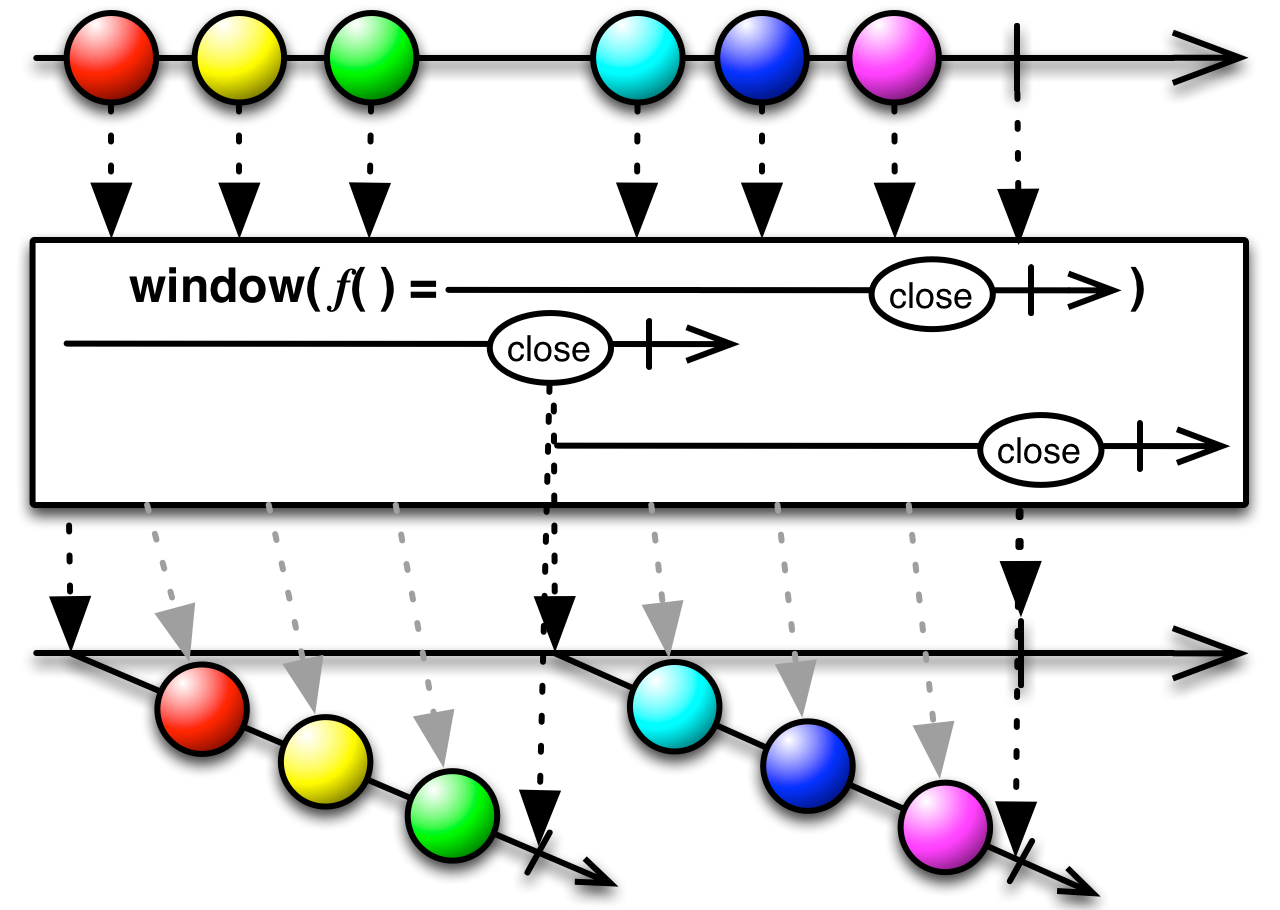
- Backpressure:
- The operator consumes the source
Publisherin an unbounded manner. The returnedPublisherdoesn't support backpressure as it uses theclosingSelectorto control the creation of windows. The returned innerPublishers honor backpressure but have an unbounded inner buffer that may lead toOutOfMemoryErrorif left unconsumed. - Scheduler:
- This version of
windowdoes not operate by default on a particularScheduler.
Parameters
| boundaryIndicatorSupplier | a Callable that returns a Publisher that governs the boundary between windows.
When the source Publisher emits an item, window emits the current window and begins
a new one. |
|---|---|
| bufferSize | the capacity hint for the buffer in the inner windows |
Returns
- a Flowable that emits connected, non-overlapping windows of items from the source Publisher
whenever
closingSelectoremits an item
public final Flowable<Flowable<T>> window (long timespan, TimeUnit unit, Scheduler scheduler)
Returns a Flowable that emits windows of items it collects from the source Publisher. The resulting
Publisher emits connected, non-overlapping windows, each of a fixed duration as specified by the
timespan argument. When the source Publisher completes or encounters an error, the resulting
Publisher emits the current window and propagates the notification from the source Publisher.
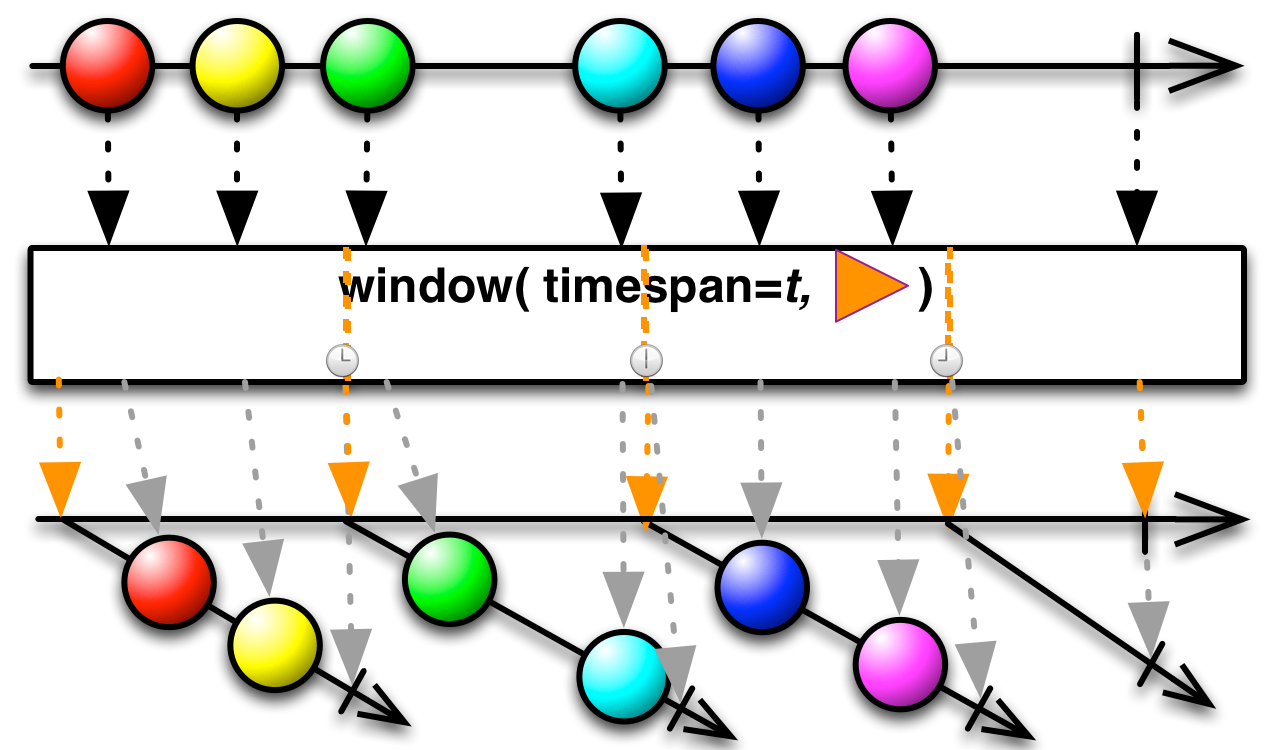
- Backpressure:
- The operator consumes the source
Publisherin an unbounded manner. The returnedPublisherdoesn't support backpressure as it uses time to control the creation of windows. The returned innerPublishers honor backpressure but have an unbounded inner buffer that may lead toOutOfMemoryErrorif left unconsumed. - Scheduler:
- You specify which
Schedulerthis operator will use
Parameters
| timespan | the period of time each window collects items before it should be emitted and replaced with a new window |
|---|---|
| unit | the unit of time which applies to the timespan argument |
| scheduler | the Scheduler to use when determining the end and start of a window |
Returns
- a Flowable that emits connected, non-overlapping windows containing items emitted by the source Publisher within a fixed duration
public final Flowable<Flowable<T>> window (long timespan, long timeskip, TimeUnit unit, Scheduler scheduler, int bufferSize)
Returns a Flowable that emits windows of items it collects from the source Publisher. The resulting
Publisher starts a new window periodically, as determined by the timeskip argument. It emits
each window after a fixed timespan, specified by the timespan argument. When the source
Publisher completes or Publisher completes or encounters an error, the resulting Publisher emits the
current window and propagates the notification from the source Publisher.

- Backpressure:
- The operator consumes the source
Publisherin an unbounded manner. The returnedPublisherdoesn't support backpressure as it uses time to control the creation of windows. The returned innerPublishers honor backpressure but have an unbounded inner buffer that may lead toOutOfMemoryErrorif left unconsumed. - Scheduler:
- You specify which
Schedulerthis operator will use
Parameters
| timespan | the period of time each window collects items before it should be emitted |
|---|---|
| timeskip | the period of time after which a new window will be created |
| unit | the unit of time that applies to the timespan and timeskip arguments |
| scheduler | the Scheduler to use when determining the end and start of a window |
| bufferSize | the capacity hint for the buffer in the inner windows |
Returns
- a Flowable that emits new windows periodically as a fixed timespan elapses
public final Flowable<Flowable<T>> window (Publisher<U> openingIndicator, Function<? super U, ? extends Publisher<V>> closingIndicator, int bufferSize)
Returns a Flowable that emits windows of items it collects from the source Publisher. The resulting
Publisher emits windows that contain those items emitted by the source Publisher between the time when
the windowOpenings Publisher emits an item and when the Publisher returned by
closingSelector emits an item.

- Backpressure:
- The outer Publisher of this operator doesn't support backpressure because the emission of new
inner Publishers are controlled by the
windowOpeningsPublisher. The inner Publishers honor backpressure and buffer everything until the associated closing Publisher signals or completes. - Scheduler:
- This version of
windowdoes not operate by default on a particularScheduler.
Parameters
| openingIndicator | a Publisher that, when it emits an item, causes another window to be created |
|---|---|
| closingIndicator | a Function that produces a Publisher for every window created. When this Publisher
emits an item, the associated window is closed and emitted |
| bufferSize | the capacity hint for the buffer in the inner windows |
Returns
- a Flowable that emits windows of items emitted by the source Publisher that are governed by the specified window-governing Publishers
public final Flowable<Flowable<T>> window (Publisher<B> boundaryIndicator, int bufferSize)
Returns a Flowable that emits non-overlapping windows of items it collects from the source Publisher where the boundary of each window is determined by the items emitted from a specified boundary-governing Publisher.
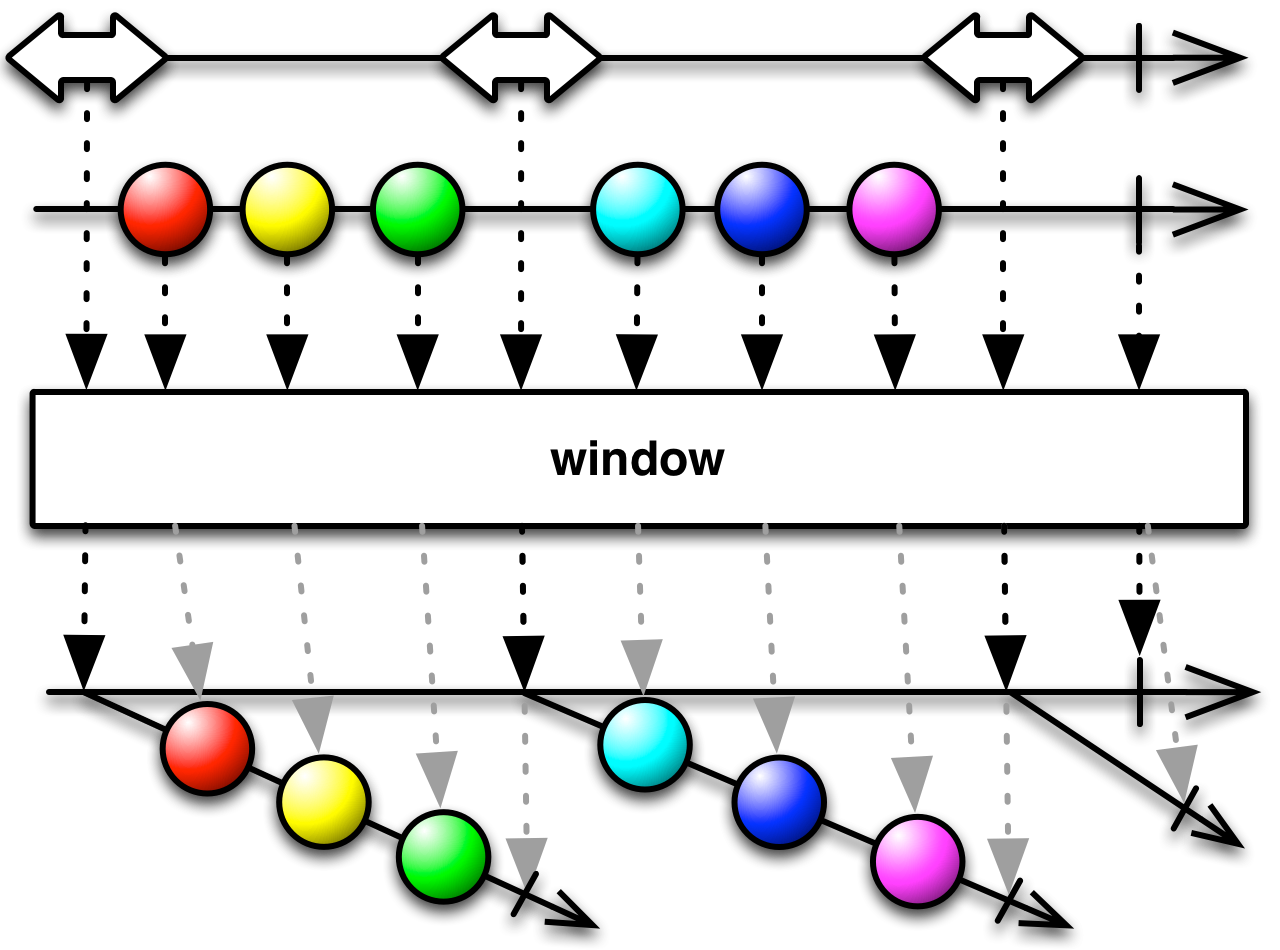
- Backpressure:
- The outer Publisher of this operator does not support backpressure as it uses a
boundaryPublisher to control data flow. The inner Publishers honor backpressure and buffer everything until the boundary signals the next element. - Scheduler:
- This version of
windowdoes not operate by default on a particularScheduler.
Parameters
| boundaryIndicator | a Publisher whose emitted items close and open windows |
|---|---|
| bufferSize | the capacity hint for the buffer in the inner windows |
Returns
- a Flowable that emits non-overlapping windows of items it collects from the source Publisher
where the boundary of each window is determined by the items emitted from the
boundaryPublisher
public final Flowable<Flowable<T>> window (long count)
Returns a Flowable that emits windows of items it collects from the source Publisher. The resulting
Publisher emits connected, non-overlapping windows, each containing count items. When the source
Publisher completes or encounters an error, the resulting Publisher emits the current window and
propagates the notification from the source Publisher.
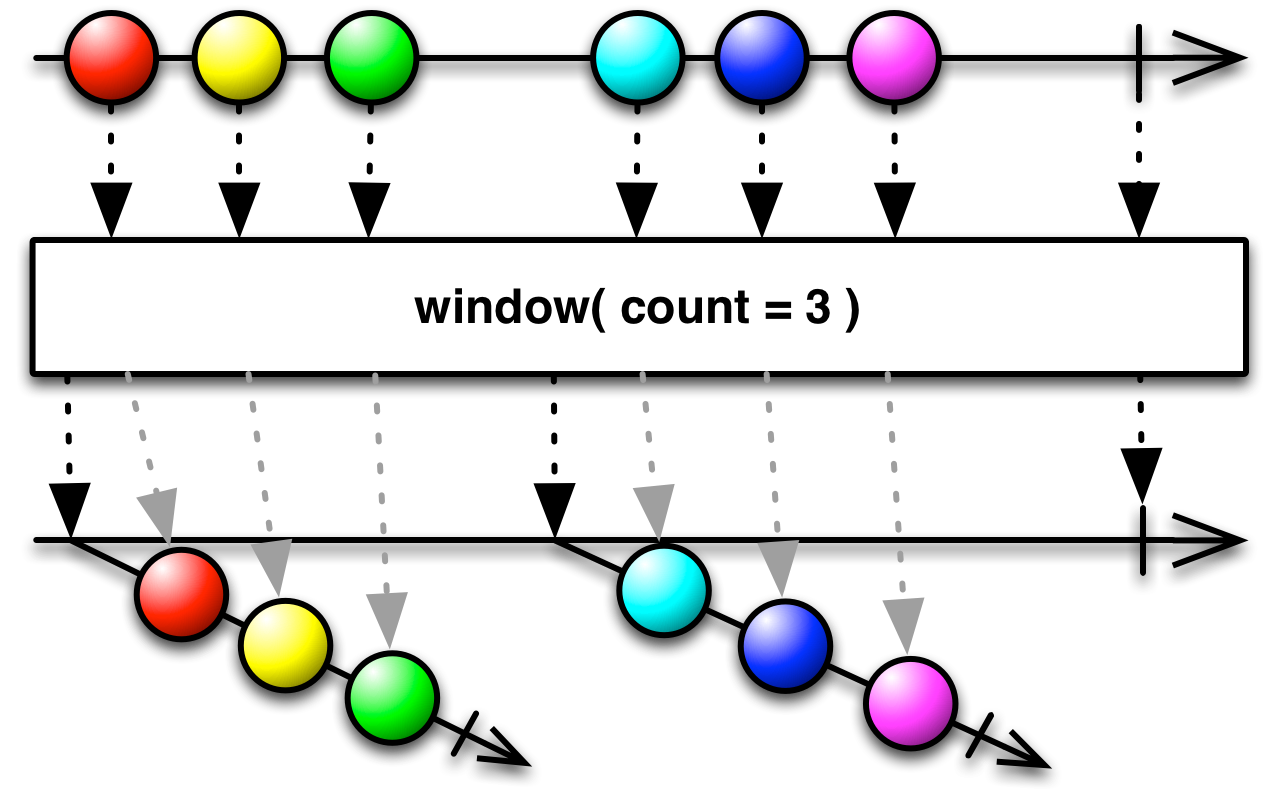
- Backpressure:
- The operator honors backpressure of its inner and outer subscribers, however, the inner Publisher uses an
unbounded buffer that may hold at most
countelements. - Scheduler:
- This version of
windowdoes not operate by default on a particularScheduler.
Parameters
| count | the maximum size of each window before it should be emitted |
|---|
Returns
- a Flowable that emits connected, non-overlapping windows, each containing at most
countitems from the source Publisher
Throws
| IllegalArgumentException | if either count is non-positive |
|---|
public final Flowable<Flowable<T>> window (long count, long skip)
Returns a Flowable that emits windows of items it collects from the source Publisher. The resulting
Publisher emits windows every skip items, each containing no more than count items. When
the source Publisher completes or encounters an error, the resulting Publisher emits the current window
and propagates the notification from the source Publisher.
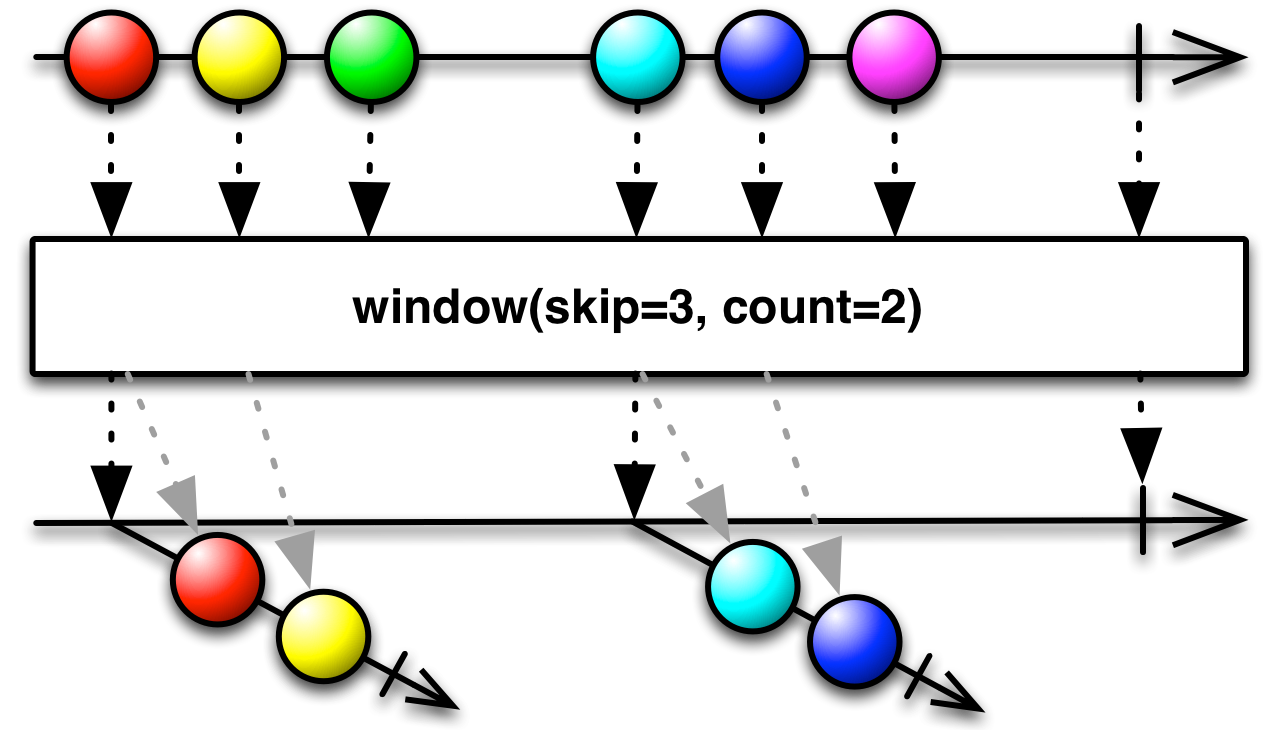
- Backpressure:
- The operator honors backpressure of its inner and outer subscribers, however, the inner Publisher uses an
unbounded buffer that may hold at most
countelements. - Scheduler:
- This version of
windowdoes not operate by default on a particularScheduler.
Parameters
| count | the maximum size of each window before it should be emitted |
|---|---|
| skip | how many items need to be skipped before starting a new window. Note that if skip and
count are equal this is the same operation as window(long). |
Returns
- a Flowable that emits windows every
skipitems containing at mostcountitems from the source Publisher
Throws
| IllegalArgumentException | if either count or skip is non-positive |
|---|
public final Flowable<Flowable<T>> window (long timespan, long timeskip, TimeUnit unit)
Returns a Flowable that emits windows of items it collects from the source Publisher. The resulting
Publisher starts a new window periodically, as determined by the timeskip argument. It emits
each window after a fixed timespan, specified by the timespan argument. When the source
Publisher completes or Publisher completes or encounters an error, the resulting Publisher emits the
current window and propagates the notification from the source Publisher.
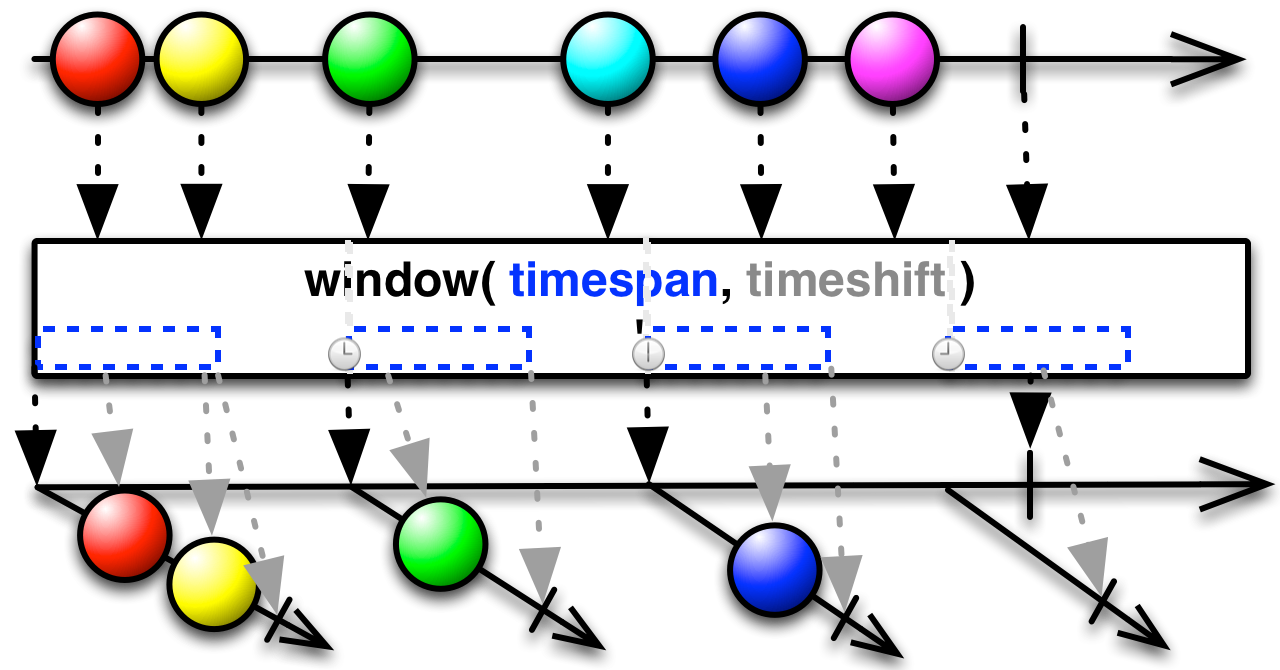
- Backpressure:
- The operator consumes the source
Publisherin an unbounded manner. The returnedPublisherdoesn't support backpressure as it uses time to control the creation of windows. The returned innerPublishers honor backpressure but have an unbounded inner buffer that may lead toOutOfMemoryErrorif left unconsumed. - Scheduler:
- This version of
windowoperates by default on thecomputationScheduler.
Parameters
| timespan | the period of time each window collects items before it should be emitted |
|---|---|
| timeskip | the period of time after which a new window will be created |
| unit | the unit of time that applies to the timespan and timeskip arguments |
Returns
- a Flowable that emits new windows periodically as a fixed timespan elapses
public final Flowable<Flowable<T>> window (Callable<? extends Publisher<B>> boundaryIndicatorSupplier)
Returns a Flowable that emits windows of items it collects from the source Publisher. The resulting
Publisher emits connected, non-overlapping windows. It emits the current window and opens a new one
whenever the Publisher produced by the specified closingSelector emits an item.

- Backpressure:
- The operator consumes the source
Publisherin an unbounded manner. The returnedPublisherdoesn't support backpressure as it uses theclosingSelectorto control the creation of windows. The returned innerPublishers honor backpressure but have an unbounded inner buffer that may lead toOutOfMemoryErrorif left unconsumed. - Scheduler:
- This version of
windowdoes not operate by default on a particularScheduler.
Parameters
| boundaryIndicatorSupplier | a Callable that returns a Publisher that governs the boundary between windows.
When the source Publisher emits an item, window emits the current window and begins
a new one. |
|---|
Returns
- a Flowable that emits connected, non-overlapping windows of items from the source Publisher
whenever
closingSelectoremits an item
public final Flowable<Flowable<T>> window (long timespan, TimeUnit unit, long count)
Returns a Flowable that emits windows of items it collects from the source Publisher. The resulting
Publisher emits connected, non-overlapping windows, each of a fixed duration as specified by the
timespan argument or a maximum size as specified by the count argument (whichever is
reached first). When the source Publisher completes or encounters an error, the resulting Publisher
emits the current window and propagates the notification from the source Publisher.
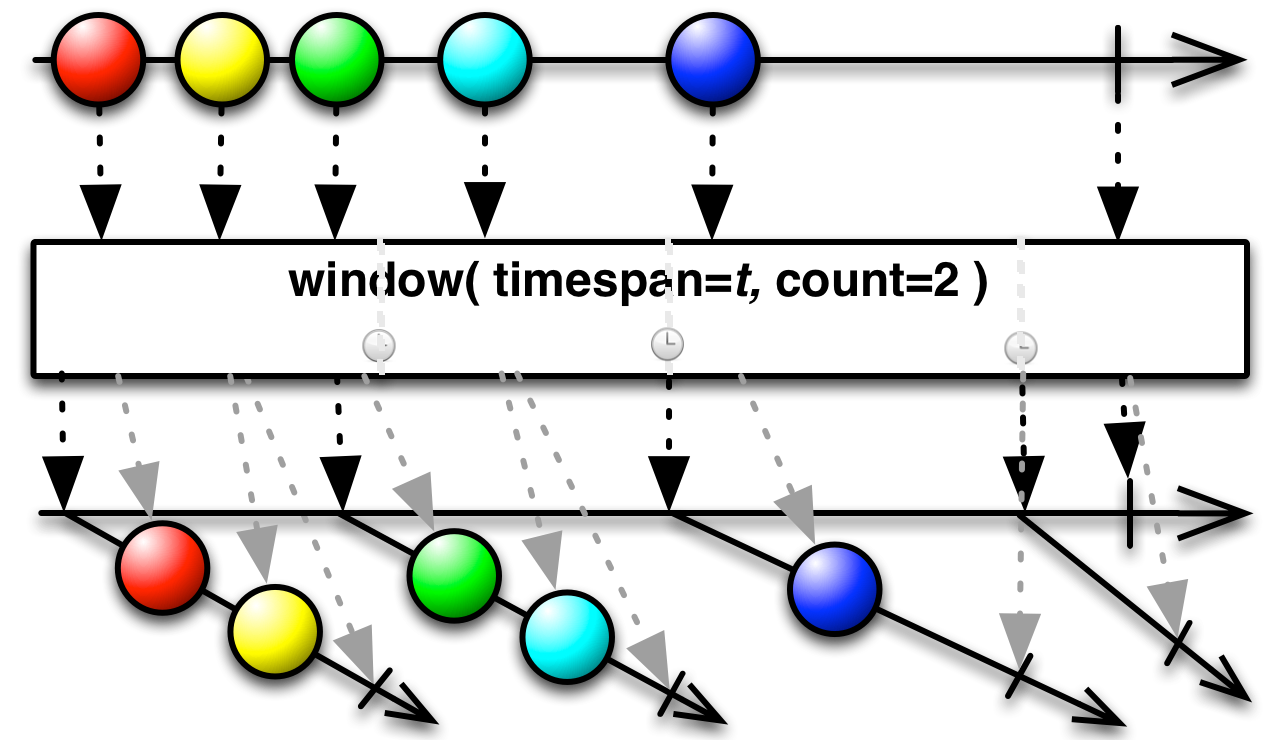
- Backpressure:
- The operator consumes the source
Publisherin an unbounded manner. The returnedPublisherdoesn't support backpressure as it uses time to control the creation of windows. The returned innerPublishers honor backpressure and may hold up tocountelements at most. - Scheduler:
- This version of
windowoperates by default on thecomputationScheduler.
Parameters
| timespan | the period of time each window collects items before it should be emitted and replaced with a new window |
|---|---|
| unit | the unit of time that applies to the timespan argument |
| count | the maximum size of each window before it should be emitted |
Returns
- a Flowable that emits connected, non-overlapping windows of items from the source Publisher that were emitted during a fixed duration of time or when the window has reached maximum capacity (whichever occurs first)
public final Flowable<Flowable<T>> window (long timespan, TimeUnit unit, long count, boolean restart)
Returns a Flowable that emits windows of items it collects from the source Publisher. The resulting
Publisher emits connected, non-overlapping windows, each of a fixed duration as specified by the
timespan argument or a maximum size as specified by the count argument (whichever is
reached first). When the source Publisher completes or encounters an error, the resulting Publisher
emits the current window and propagates the notification from the source Publisher.

- Backpressure:
- The operator consumes the source
Publisherin an unbounded manner. The returnedPublisherdoesn't support backpressure as it uses time to control the creation of windows. The returned innerPublishers honor backpressure and may hold up tocountelements at most. - Scheduler:
- This version of
windowoperates by default on thecomputationScheduler.
Parameters
| timespan | the period of time each window collects items before it should be emitted and replaced with a new window |
|---|---|
| unit | the unit of time that applies to the timespan argument |
| count | the maximum size of each window before it should be emitted |
| restart | if true, when a window reaches the capacity limit, the timer is restarted as well |
Returns
- a Flowable that emits connected, non-overlapping windows of items from the source Publisher that were emitted during a fixed duration of time or when the window has reached maximum capacity (whichever occurs first)
public final Flowable<Flowable<T>> window (Publisher<B> boundaryIndicator)
Returns a Flowable that emits non-overlapping windows of items it collects from the source Publisher where the boundary of each window is determined by the items emitted from a specified boundary-governing Publisher.

- Backpressure:
- The outer Publisher of this operator does not support backpressure as it uses a
boundaryPublisher to control data flow. The inner Publishers honor backpressure and buffer everything until the boundary signals the next element. - Scheduler:
- This version of
windowdoes not operate by default on a particularScheduler.
Parameters
| boundaryIndicator | a Publisher whose emitted items close and open windows |
|---|
Returns
- a Flowable that emits non-overlapping windows of items it collects from the source Publisher
where the boundary of each window is determined by the items emitted from the
boundaryPublisher
public final Flowable<Flowable<T>> window (long timespan, TimeUnit unit, Scheduler scheduler, long count)
Returns a Flowable that emits windows of items it collects from the source Publisher. The resulting
Publisher emits connected, non-overlapping windows, each of a fixed duration specified by the
timespan argument or a maximum size specified by the count argument (whichever is reached
first). When the source Publisher completes or encounters an error, the resulting Publisher emits the
current window and propagates the notification from the source Publisher.

- Backpressure:
- The operator consumes the source
Publisherin an unbounded manner. The returnedPublisherdoesn't support backpressure as it uses time to control the creation of windows. The returned innerPublishers honor backpressure and may hold up tocountelements at most. - Scheduler:
- You specify which
Schedulerthis operator will use
Parameters
| timespan | the period of time each window collects items before it should be emitted and replaced with a new window |
|---|---|
| unit | the unit of time which applies to the timespan argument |
| scheduler | the Scheduler to use when determining the end and start of a window |
| count | the maximum size of each window before it should be emitted |
Returns
- a Flowable that emits connected, non-overlapping windows of items from the source Publisher that were emitted during a fixed duration of time or when the window has reached maximum capacity (whichever occurs first)
public final Flowable<Flowable<T>> window (long timespan, TimeUnit unit)
Returns a Flowable that emits windows of items it collects from the source Publisher. The resulting
Publisher emits connected, non-overlapping windows, each of a fixed duration specified by the
timespan argument. When the source Publisher completes or encounters an error, the resulting
Publisher emits the current window and propagates the notification from the source Publisher.
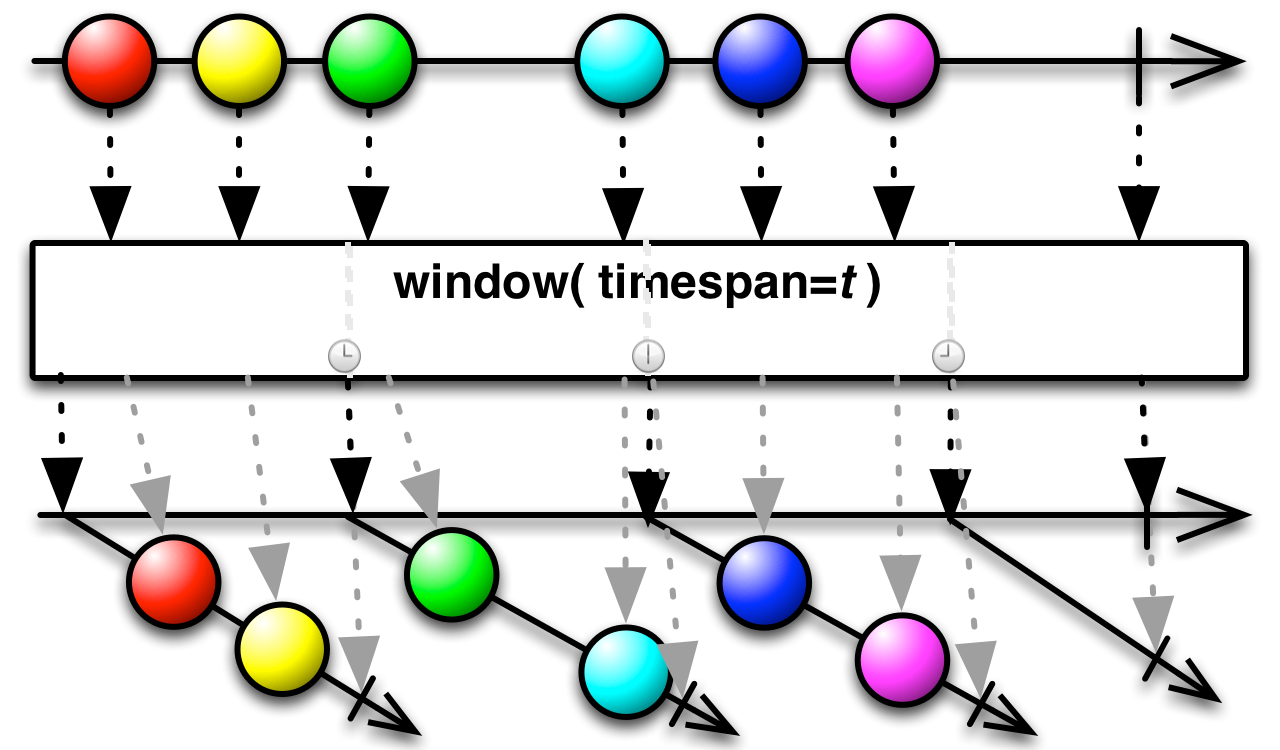
- Backpressure:
- The operator consumes the source
Publisherin an unbounded manner. The returnedPublisherdoesn't support backpressure as it uses time to control the creation of windows. The returned innerPublishers honor backpressure and may hold up tocountelements at most. - Scheduler:
- This version of
windowoperates by default on thecomputationScheduler.
Parameters
| timespan | the period of time each window collects items before it should be emitted and replaced with a new window |
|---|---|
| unit | the unit of time that applies to the timespan argument |
Returns
- a Flowable that emits connected, non-overlapping windows representing items emitted by the source Publisher during fixed, consecutive durations
public final Flowable<Flowable<T>> window (long count, long skip, int bufferSize)
Returns a Flowable that emits windows of items it collects from the source Publisher. The resulting
Publisher emits windows every skip items, each containing no more than count items. When
the source Publisher completes or encounters an error, the resulting Publisher emits the current window
and propagates the notification from the source Publisher.

- Backpressure:
- The operator honors backpressure of its inner and outer subscribers, however, the inner Publisher uses an
unbounded buffer that may hold at most
countelements. - Scheduler:
- This version of
windowdoes not operate by default on a particularScheduler.
Parameters
| count | the maximum size of each window before it should be emitted |
|---|---|
| skip | how many items need to be skipped before starting a new window. Note that if skip and
count are equal this is the same operation as window(long). |
| bufferSize | the capacity hint for the buffer in the inner windows |
Returns
- a Flowable that emits windows every
skipitems containing at mostcountitems from the source Publisher
Throws
| IllegalArgumentException | if either count or skip is non-positive |
|---|
public final Flowable<R> withLatestFrom (Publisher<? extends U> other, BiFunction<? super T, ? super U, ? extends R> combiner)
Merges the specified Publisher into this Publisher sequence by using the resultSelector
function only when the source Publisher (this instance) emits an item.
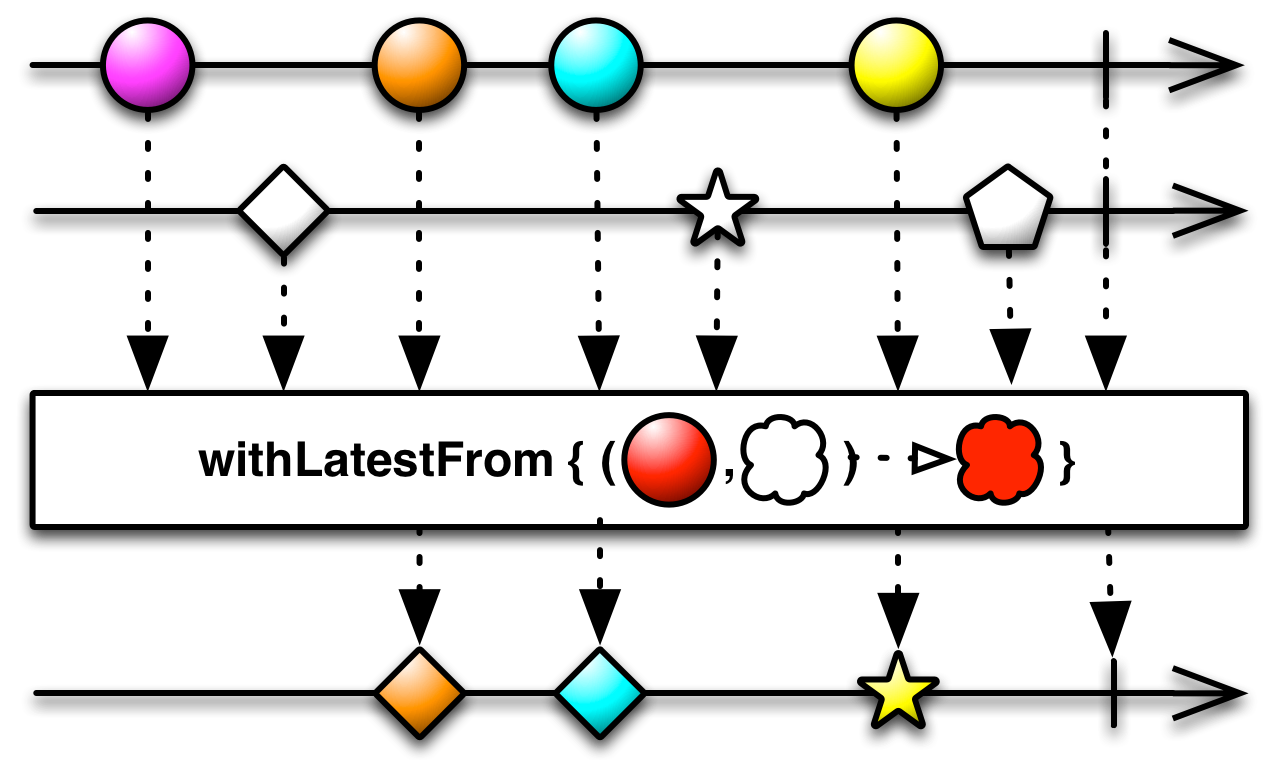
- Backpressure:
- The operator is a pass-through for backpressure: the backpressure support depends on the upstream and downstream's backpressure behavior. The other Publisher is consumed in an unbounded fashion.
- Scheduler:
- This operator, by default, doesn't run any particular
Scheduler.
Parameters
| other | the other Publisher |
|---|---|
| combiner | the function to call when this Publisher emits an item and the other Publisher has already emitted an item, to generate the item to be emitted by the resulting Publisher |
Returns
- a Flowable that merges the specified Publisher into this Publisher by using the
resultSelectorfunction only when the source Publisher sequence (this instance) emits an item
public final Flowable<R> withLatestFrom (Publisher<T1> source1, Publisher<T2> source2, Publisher<T3> source3, Function4<? super T, ? super T1, ? super T2, ? super T3, R> combiner)
Combines the value emission from this Publisher with the latest emissions from the other Publishers via a function to produce the output item.
Note that this operator doesn't emit anything until all other sources have produced at least one value. The resulting emission only happens when this Publisher emits (and not when any of the other sources emit, unlike combineLatest). If a source doesn't produce any value and just completes, the sequence is completed immediately.
- Backpressure:
- This operator is a pass-through for backpressure behavior between the source
Publisherand the downstream Subscriber. The otherPublishers are consumed in an unbounded manner. - Scheduler:
- This operator does not operate by default on a particular
Scheduler.
Parameters
| source1 | the first other Publisher |
|---|---|
| source2 | the second other Publisher |
| source3 | the third other Publisher |
| combiner | the function called with an array of values from each participating Publisher |
Returns
- the new Publisher instance
public final Flowable<R> withLatestFrom (Publisher[]<?> others, Function<? super Object[], R> combiner)
Combines the value emission from this Publisher with the latest emissions from the other Publishers via a function to produce the output item.
Note that this operator doesn't emit anything until all other sources have produced at least one value. The resulting emission only happens when this Publisher emits (and not when any of the other sources emit, unlike combineLatest). If a source doesn't produce any value and just completes, the sequence is completed immediately.
- Backpressure:
- This operator is a pass-through for backpressure behavior between the source
Publisherand the downstream Subscriber. The otherPublishers are consumed in an unbounded manner. - Scheduler:
- This operator does not operate by default on a particular
Scheduler.
Parameters
| others | the array of other sources |
|---|---|
| combiner | the function called with an array of values from each participating Publisher |
Returns
- the new Publisher instance
public final Flowable<R> withLatestFrom (Publisher<T1> source1, Publisher<T2> source2, Function3<? super T, ? super T1, ? super T2, R> combiner)
Combines the value emission from this Publisher with the latest emissions from the other Publishers via a function to produce the output item.
Note that this operator doesn't emit anything until all other sources have produced at least one value. The resulting emission only happens when this Publisher emits (and not when any of the other sources emit, unlike combineLatest). If a source doesn't produce any value and just completes, the sequence is completed immediately.
- Backpressure:
- This operator is a pass-through for backpressure behavior between the source
Publisherand the downstream Subscriber. The otherPublishers are consumed in an unbounded manner. - Scheduler:
- This operator does not operate by default on a particular
Scheduler.
Parameters
| source1 | the first other Publisher |
|---|---|
| source2 | the second other Publisher |
| combiner | the function called with an array of values from each participating Publisher |
Returns
- the new Publisher instance
public final Flowable<R> withLatestFrom (Publisher<T1> source1, Publisher<T2> source2, Publisher<T3> source3, Publisher<T4> source4, Function5<? super T, ? super T1, ? super T2, ? super T3, ? super T4, R> combiner)
Combines the value emission from this Publisher with the latest emissions from the other Publishers via a function to produce the output item.
Note that this operator doesn't emit anything until all other sources have produced at least one value. The resulting emission only happens when this Publisher emits (and not when any of the other sources emit, unlike combineLatest). If a source doesn't produce any value and just completes, the sequence is completed immediately.
- Backpressure:
- This operator is a pass-through for backpressure behavior between the source
Publisherand the downstream Subscriber. The otherPublishers are consumed in an unbounded manner. - Scheduler:
- This operator does not operate by default on a particular
Scheduler.
Parameters
| source1 | the first other Publisher |
|---|---|
| source2 | the second other Publisher |
| source3 | the third other Publisher |
| source4 | the fourth other Publisher |
| combiner | the function called with an array of values from each participating Publisher |
Returns
- the new Publisher instance
public final Flowable<R> withLatestFrom (Iterable<? extends Publisher<?>> others, Function<? super Object[], R> combiner)
Combines the value emission from this Publisher with the latest emissions from the other Publishers via a function to produce the output item.
Note that this operator doesn't emit anything until all other sources have produced at least one value. The resulting emission only happens when this Publisher emits (and not when any of the other sources emit, unlike combineLatest). If a source doesn't produce any value and just completes, the sequence is completed immediately.
- Backpressure:
- This operator is a pass-through for backpressure behavior between the source
Publisherand the downstream Subscriber. The otherPublishers are consumed in an unbounded manner. - Scheduler:
- This operator does not operate by default on a particular
Scheduler.
Parameters
| others | the iterable of other sources |
|---|---|
| combiner | the function called with an array of values from each participating Publisher |
Returns
- the new Publisher instance
public static Flowable<R> zip (Publisher<? extends T1> source1, Publisher<? extends T2> source2, Publisher<? extends T3> source3, Publisher<? extends T4> source4, Publisher<? extends T5> source5, Publisher<? extends T6> source6, Function6<? super T1, ? super T2, ? super T3, ? super T4, ? super T5, ? super T6, ? extends R> zipper)
Returns a Flowable that emits the results of a specified combiner function applied to combinations of six items emitted, in sequence, by six other Publishers.

zip applies this function in strict sequence, so the first item emitted by the new Publisher
will be the result of the function applied to the first item emitted by each source Publisher, the
second item emitted by the new Publisher will be the result of the function applied to the second item
emitted by each of those Publishers, and so forth.
The resulting Publisher<R> returned from zip will invoke onNext
as many times as the number of onNext invocations of the source Publisher that emits the fewest
items.
The operator subscribes to its sources in order they are specified and completes eagerly if
one of the sources is shorter than the rest while cancelling the other sources. Therefore, it
is possible those other sources will never be able to run to completion (and thus not calling
doOnComplete()). This can also happen if the sources are exactly the same length; if
source A completes and B has been consumed and is about to complete, the operator detects A won't
be sending further values and it will cancel B immediately. For example:
zip(range(1, 5).doOnComplete(action1), range(6, 5).doOnComplete(action2), ..., (a, b, c, d, e, f) -> a + b)action1 will be called but action2 won't.
To work around this termination property, use
doOnCancel(Action) as well or use using() to do cleanup in case of completion
or cancellation.
- Backpressure:
- The operator expects backpressure from the sources and honors backpressure from the downstream.
(I.e., zipping with
interval(long, TimeUnit)may result in MissingBackpressureException, use one of theonBackpressureXto handle similar, backpressure-ignoring sources. - Scheduler:
zipdoes not operate by default on a particularScheduler.
Parameters
| source1 | the first source Publisher |
|---|---|
| source2 | a second source Publisher |
| source3 | a third source Publisher |
| source4 | a fourth source Publisher |
| source5 | a fifth source Publisher |
| source6 | a sixth source Publisher |
| zipper | a function that, when applied to an item emitted by each of the source Publishers, results in an item that will be emitted by the resulting Publisher |
Returns
- a Flowable that emits the zipped results
public static Flowable<R> zip (Publisher<? extends T1> source1, Publisher<? extends T2> source2, Publisher<? extends T3> source3, Publisher<? extends T4> source4, Publisher<? extends T5> source5, Publisher<? extends T6> source6, Publisher<? extends T7> source7, Publisher<? extends T8> source8, Function8<? super T1, ? super T2, ? super T3, ? super T4, ? super T5, ? super T6, ? super T7, ? super T8, ? extends R> zipper)
Returns a Flowable that emits the results of a specified combiner function applied to combinations of eight items emitted, in sequence, by eight other Publishers.

zip applies this function in strict sequence, so the first item emitted by the new Publisher
will be the result of the function applied to the first item emitted by each source Publisher, the
second item emitted by the new Publisher will be the result of the function applied to the second item
emitted by each of those Publishers, and so forth.
The resulting Publisher<R> returned from zip will invoke onNext
as many times as the number of onNext invocations of the source Publisher that emits the fewest
items.
The operator subscribes to its sources in order they are specified and completes eagerly if
one of the sources is shorter than the rest while cancelling the other sources. Therefore, it
is possible those other sources will never be able to run to completion (and thus not calling
doOnComplete()). This can also happen if the sources are exactly the same length; if
source A completes and B has been consumed and is about to complete, the operator detects A won't
be sending further values and it will cancel B immediately. For example:
zip(range(1, 5).doOnComplete(action1), range(6, 5).doOnComplete(action2), ..., (a, b, c, d, e, f, g, h) -> a + b)action1 will be called but action2 won't.
To work around this termination property, use
doOnCancel(Action) as well or use using() to do cleanup in case of completion
or cancellation.
- Backpressure:
- The operator expects backpressure from the sources and honors backpressure from the downstream.
(I.e., zipping with
interval(long, TimeUnit)may result in MissingBackpressureException, use one of theonBackpressureXto handle similar, backpressure-ignoring sources. - Scheduler:
zipdoes not operate by default on a particularScheduler.
Parameters
| source1 | the first source Publisher |
|---|---|
| source2 | a second source Publisher |
| source3 | a third source Publisher |
| source4 | a fourth source Publisher |
| source5 | a fifth source Publisher |
| source6 | a sixth source Publisher |
| source7 | a seventh source Publisher |
| source8 | an eighth source Publisher |
| zipper | a function that, when applied to an item emitted by each of the source Publishers, results in an item that will be emitted by the resulting Publisher |
Returns
- a Flowable that emits the zipped results
public static Flowable<R> zip (Publisher<? extends T1> source1, Publisher<? extends T2> source2, Publisher<? extends T3> source3, Publisher<? extends T4> source4, Publisher<? extends T5> source5, Publisher<? extends T6> source6, Publisher<? extends T7> source7, Publisher<? extends T8> source8, Publisher<? extends T9> source9, Function9<? super T1, ? super T2, ? super T3, ? super T4, ? super T5, ? super T6, ? super T7, ? super T8, ? super T9, ? extends R> zipper)
Returns a Flowable that emits the results of a specified combiner function applied to combinations of nine items emitted, in sequence, by nine other Publishers.

zip applies this function in strict sequence, so the first item emitted by the new Publisher
will be the result of the function applied to the first item emitted by each source Publisher, the
second item emitted by the new Publisher will be the result of the function applied to the second item
emitted by each of those Publishers, and so forth.
The resulting Publisher<R> returned from zip will invoke onNext
as many times as the number of onNext invocations of the source Publisher that emits the fewest
items.
The operator subscribes to its sources in order they are specified and completes eagerly if
one of the sources is shorter than the rest while cancelling the other sources. Therefore, it
is possible those other sources will never be able to run to completion (and thus not calling
doOnComplete()). This can also happen if the sources are exactly the same length; if
source A completes and B has been consumed and is about to complete, the operator detects A won't
be sending further values and it will cancel B immediately. For example:
zip(range(1, 5).doOnComplete(action1), range(6, 5).doOnComplete(action2), ..., (a, b, c, d, e, f, g, h, i) -> a + b)action1 will be called but action2 won't.
To work around this termination property, use
doOnCancel(Action) as well or use using() to do cleanup in case of completion
or cancellation.
- Backpressure:
- The operator expects backpressure from the sources and honors backpressure from the downstream.
(I.e., zipping with
interval(long, TimeUnit)may result in MissingBackpressureException, use one of theonBackpressureXto handle similar, backpressure-ignoring sources. - Scheduler:
zipdoes not operate by default on a particularScheduler.
Parameters
| source1 | the first source Publisher |
|---|---|
| source2 | a second source Publisher |
| source3 | a third source Publisher |
| source4 | a fourth source Publisher |
| source5 | a fifth source Publisher |
| source6 | a sixth source Publisher |
| source7 | a seventh source Publisher |
| source8 | an eighth source Publisher |
| source9 | a ninth source Publisher |
| zipper | a function that, when applied to an item emitted by each of the source Publishers, results in an item that will be emitted by the resulting Publisher |
Returns
- a Flowable that emits the zipped results
public static Flowable<R> zip (Publisher<? extends Publisher<? extends T>> sources, Function<? super Object[], ? extends R> zipper)
Returns a Flowable that emits the results of a specified combiner function applied to combinations of n items emitted, in sequence, by the n Publishers emitted by a specified Publisher.
zip applies this function in strict sequence, so the first item emitted by the new Publisher
will be the result of the function applied to the first item emitted by each of the Publishers emitted
by the source Publisher; the second item emitted by the new Publisher will be the result of the
function applied to the second item emitted by each of those Publishers; and so forth.
The resulting Publisher<R> returned from zip will invoke onNext as many times as
the number of onNext invocations of the source Publisher that emits the fewest items.
The operator subscribes to its sources in order they are specified and completes eagerly if
one of the sources is shorter than the rest while cancel the other sources. Therefore, it
is possible those other sources will never be able to run to completion (and thus not calling
doOnComplete()). This can also happen if the sources are exactly the same length; if
source A completes and B has been consumed and is about to complete, the operator detects A won't
be sending further values and it will cancel B immediately. For example:
zip(just(range(1, 5).doOnComplete(action1), range(6, 5).doOnComplete(action2)), (a) -> a)action1 will be called but action2 won't.
To work around this termination property, use
doOnCancel(Action) as well or use using() to do cleanup in case of completion
or cancellation.
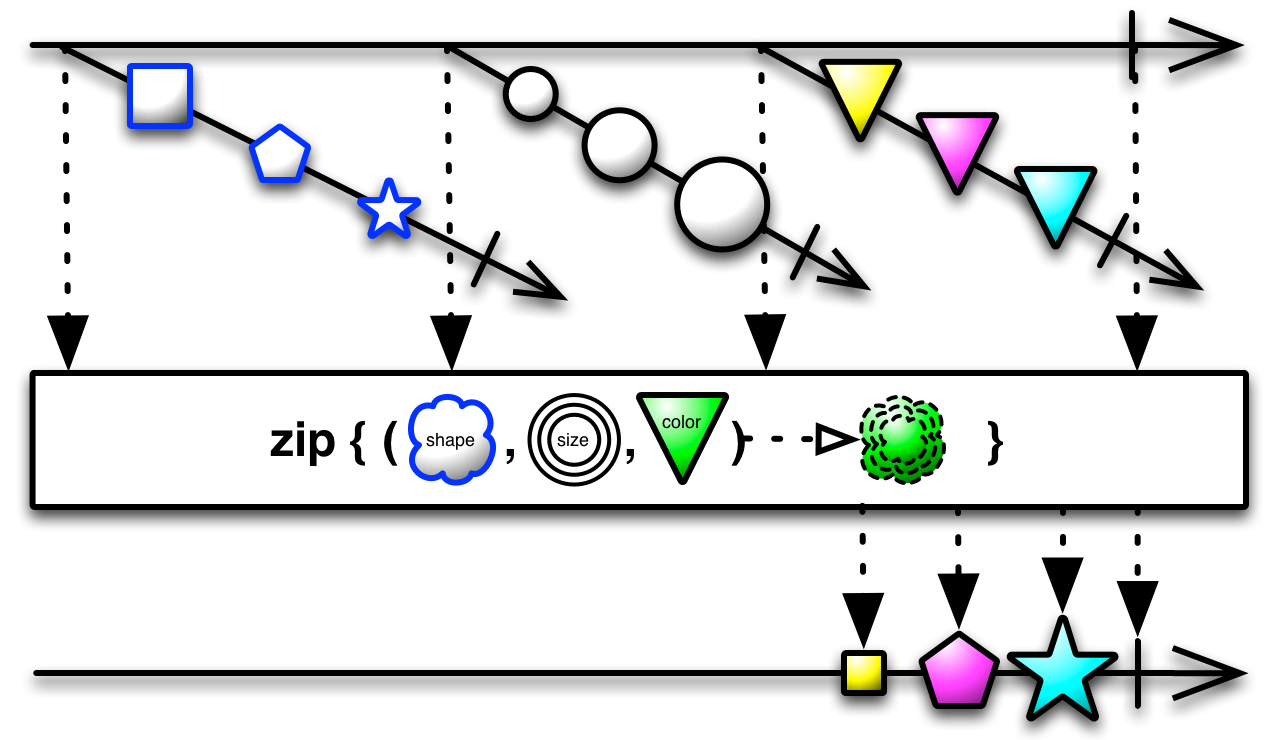
- Backpressure:
- The operator expects backpressure from the sources and honors backpressure from the downstream.
(I.e., zipping with
interval(long, TimeUnit)may result in MissingBackpressureException, use one of theonBackpressureXto handle similar, backpressure-ignoring sources. - Scheduler:
zipdoes not operate by default on a particularScheduler.
Parameters
| sources | a Publisher of source Publishers |
|---|---|
| zipper | a function that, when applied to an item emitted by each of the Publishers emitted by
ws, results in an item that will be emitted by the resulting Publisher |
Returns
- a Flowable that emits the zipped results
public static Flowable<R> zip (Publisher<? extends T1> source1, Publisher<? extends T2> source2, Publisher<? extends T3> source3, Publisher<? extends T4> source4, Publisher<? extends T5> source5, Function5<? super T1, ? super T2, ? super T3, ? super T4, ? super T5, ? extends R> zipper)
Returns a Flowable that emits the results of a specified combiner function applied to combinations of five items emitted, in sequence, by five other Publishers.

zip applies this function in strict sequence, so the first item emitted by the new Publisher
will be the result of the function applied to the first item emitted by o1, the first item
emitted by o2, the first item emitted by o3, the first item emitted by o4, and
the first item emitted by o5; the second item emitted by the new Publisher will be the result of
the function applied to the second item emitted by each of those Publishers; and so forth.
The resulting Publisher<R> returned from zip will invoke onNext
as many times as the number of onNext invocations of the source Publisher that emits the fewest
items.
The operator subscribes to its sources in order they are specified and completes eagerly if
one of the sources is shorter than the rest while cancelling the other sources. Therefore, it
is possible those other sources will never be able to run to completion (and thus not calling
doOnComplete()). This can also happen if the sources are exactly the same length; if
source A completes and B has been consumed and is about to complete, the operator detects A won't
be sending further values and it will cancel B immediately. For example:
zip(range(1, 5).doOnComplete(action1), range(6, 5).doOnComplete(action2), ..., (a, b, c, d, e) -> a + b)action1 will be called but action2 won't.
To work around this termination property, use
doOnCancel(Action) as well or use using() to do cleanup in case of completion
or cancellation.
- Backpressure:
- The operator expects backpressure from the sources and honors backpressure from the downstream.
(I.e., zipping with
interval(long, TimeUnit)may result in MissingBackpressureException, use one of theonBackpressureXto handle similar, backpressure-ignoring sources. - Scheduler:
zipdoes not operate by default on a particularScheduler.
Parameters
| source1 | the first source Publisher |
|---|---|
| source2 | a second source Publisher |
| source3 | a third source Publisher |
| source4 | a fourth source Publisher |
| source5 | a fifth source Publisher |
| zipper | a function that, when applied to an item emitted by each of the source Publishers, results in an item that will be emitted by the resulting Publisher |
Returns
- a Flowable that emits the zipped results
public static Flowable<R> zip (Publisher<? extends T1> source1, Publisher<? extends T2> source2, Publisher<? extends T3> source3, Publisher<? extends T4> source4, Publisher<? extends T5> source5, Publisher<? extends T6> source6, Publisher<? extends T7> source7, Function7<? super T1, ? super T2, ? super T3, ? super T4, ? super T5, ? super T6, ? super T7, ? extends R> zipper)
Returns a Flowable that emits the results of a specified combiner function applied to combinations of seven items emitted, in sequence, by seven other Publishers.

zip applies this function in strict sequence, so the first item emitted by the new Publisher
will be the result of the function applied to the first item emitted by each source Publisher, the
second item emitted by the new Publisher will be the result of the function applied to the second item
emitted by each of those Publishers, and so forth.
The resulting Publisher<R> returned from zip will invoke onNext
as many times as the number of onNext invocations of the source Publisher that emits the fewest
items.
The operator subscribes to its sources in order they are specified and completes eagerly if
one of the sources is shorter than the rest while cancelling the other sources. Therefore, it
is possible those other sources will never be able to run to completion (and thus not calling
doOnComplete()). This can also happen if the sources are exactly the same length; if
source A completes and B has been consumed and is about to complete, the operator detects A won't
be sending further values and it will cancel B immediately. For example:
zip(range(1, 5).doOnComplete(action1), range(6, 5).doOnComplete(action2), ..., (a, b, c, d, e, f, g) -> a + b)action1 will be called but action2 won't.
To work around this termination property, use
doOnCancel(Action) as well or use using() to do cleanup in case of completion
or cancellation.
- Backpressure:
- The operator expects backpressure from the sources and honors backpressure from the downstream.
(I.e., zipping with
interval(long, TimeUnit)may result in MissingBackpressureException, use one of theonBackpressureXto handle similar, backpressure-ignoring sources. - Scheduler:
zipdoes not operate by default on a particularScheduler.
Parameters
| source1 | the first source Publisher |
|---|---|
| source2 | a second source Publisher |
| source3 | a third source Publisher |
| source4 | a fourth source Publisher |
| source5 | a fifth source Publisher |
| source6 | a sixth source Publisher |
| source7 | a seventh source Publisher |
| zipper | a function that, when applied to an item emitted by each of the source Publishers, results in an item that will be emitted by the resulting Publisher |
Returns
- a Flowable that emits the zipped results
public static Flowable<R> zip (Publisher<? extends T1> source1, Publisher<? extends T2> source2, Publisher<? extends T3> source3, Function3<? super T1, ? super T2, ? super T3, ? extends R> zipper)
Returns a Flowable that emits the results of a specified combiner function applied to combinations of three items emitted, in sequence, by three other Publishers.

zip applies this function in strict sequence, so the first item emitted by the new Publisher
will be the result of the function applied to the first item emitted by o1, the first item
emitted by o2, and the first item emitted by o3; the second item emitted by the new
Publisher will be the result of the function applied to the second item emitted by o1, the
second item emitted by o2, and the second item emitted by o3; and so forth.
The resulting Publisher<R> returned from zip will invoke onNext
as many times as the number of onNext invocations of the source Publisher that emits the fewest
items.
The operator subscribes to its sources in order they are specified and completes eagerly if
one of the sources is shorter than the rest while cancelling the other sources. Therefore, it
is possible those other sources will never be able to run to completion (and thus not calling
doOnComplete()). This can also happen if the sources are exactly the same length; if
source A completes and B has been consumed and is about to complete, the operator detects A won't
be sending further values and it will cancel B immediately. For example:
zip(range(1, 5).doOnComplete(action1), range(6, 5).doOnComplete(action2), ..., (a, b, c) -> a + b)action1 will be called but action2 won't.
To work around this termination property, use
doOnCancel(Action) as well or use using() to do cleanup in case of completion
or cancellation.
- Backpressure:
- The operator expects backpressure from the sources and honors backpressure from the downstream.
(I.e., zipping with
interval(long, TimeUnit)may result in MissingBackpressureException, use one of theonBackpressureXto handle similar, backpressure-ignoring sources. - Scheduler:
zipdoes not operate by default on a particularScheduler.
Parameters
| source1 | the first source Publisher |
|---|---|
| source2 | a second source Publisher |
| source3 | a third source Publisher |
| zipper | a function that, when applied to an item emitted by each of the source Publishers, results in an item that will be emitted by the resulting Publisher |
Returns
- a Flowable that emits the zipped results
public static Flowable<R> zip (Publisher<? extends T1> source1, Publisher<? extends T2> source2, Publisher<? extends T3> source3, Publisher<? extends T4> source4, Function4<? super T1, ? super T2, ? super T3, ? super T4, ? extends R> zipper)
Returns a Flowable that emits the results of a specified combiner function applied to combinations of four items emitted, in sequence, by four other Publishers.

zip applies this function in strict sequence, so the first item emitted by the new Publisher
will be the result of the function applied to the first item emitted by o1, the first item
emitted by o2, the first item emitted by o3, and the first item emitted by 04;
the second item emitted by the new Publisher will be the result of the function applied to the second
item emitted by each of those Publishers; and so forth.
The resulting Publisher<R> returned from zip will invoke onNext
as many times as the number of onNext invocations of the source Publisher that emits the fewest
items.
The operator subscribes to its sources in order they are specified and completes eagerly if
one of the sources is shorter than the rest while cancelling the other sources. Therefore, it
is possible those other sources will never be able to run to completion (and thus not calling
doOnComplete()). This can also happen if the sources are exactly the same length; if
source A completes and B has been consumed and is about to complete, the operator detects A won't
be sending further values and it will cancel B immediately. For example:
zip(range(1, 5).doOnComplete(action1), range(6, 5).doOnComplete(action2), ..., (a, b, c, d) -> a + b)action1 will be called but action2 won't.
To work around this termination property, use
doOnCancel(Action) as well or use using() to do cleanup in case of completion
or cancellation.
- Backpressure:
- The operator expects backpressure from the sources and honors backpressure from the downstream.
(I.e., zipping with
interval(long, TimeUnit)may result in MissingBackpressureException, use one of theonBackpressureXto handle similar, backpressure-ignoring sources. - Scheduler:
zipdoes not operate by default on a particularScheduler.
Parameters
| source1 | the first source Publisher |
|---|---|
| source2 | a second source Publisher |
| source3 | a third source Publisher |
| source4 | a fourth source Publisher |
| zipper | a function that, when applied to an item emitted by each of the source Publishers, results in an item that will be emitted by the resulting Publisher |
Returns
- a Flowable that emits the zipped results
public static Flowable<R> zip (Publisher<? extends T1> source1, Publisher<? extends T2> source2, BiFunction<? super T1, ? super T2, ? extends R> zipper, boolean delayError, int bufferSize)
Returns a Flowable that emits the results of a specified combiner function applied to combinations of two items emitted, in sequence, by two other Publishers.

zip applies this function in strict sequence, so the first item emitted by the new Publisher
will be the result of the function applied to the first item emitted by o1 and the first item
emitted by o2; the second item emitted by the new Publisher will be the result of the function
applied to the second item emitted by o1 and the second item emitted by o2; and so forth.
The resulting Publisher<R> returned from zip will invoke onNext
as many times as the number of onNext invocations of the source Publisher that emits the fewest
items.
The operator subscribes to its sources in order they are specified and completes eagerly if
one of the sources is shorter than the rest while cancelling the other sources. Therefore, it
is possible those other sources will never be able to run to completion (and thus not calling
doOnComplete()). This can also happen if the sources are exactly the same length; if
source A completes and B has been consumed and is about to complete, the operator detects A won't
be sending further values and it will cancel B immediately. For example:
zip(range(1, 5).doOnComplete(action1), range(6, 5).doOnComplete(action2), (a, b) -> a + b)action1 will be called but action2 won't.
To work around this termination property, use
doOnCancel(Action) as well or use using() to do cleanup in case of completion
or cancellation.
- Backpressure:
- The operator expects backpressure from the sources and honors backpressure from the downstream.
(I.e., zipping with
interval(long, TimeUnit)may result in MissingBackpressureException, use one of theonBackpressureXto handle similar, backpressure-ignoring sources. - Scheduler:
zipdoes not operate by default on a particularScheduler.
Parameters
| source1 | the first source Publisher |
|---|---|
| source2 | a second source Publisher |
| zipper | a function that, when applied to an item emitted by each of the source Publishers, results in an item that will be emitted by the resulting Publisher |
| delayError | delay errors from any of the source Publishers till the other terminates |
| bufferSize | the number of elements to prefetch from each source Publisher |
Returns
- a Flowable that emits the zipped results
public static Flowable<R> zip (Publisher<? extends T1> source1, Publisher<? extends T2> source2, BiFunction<? super T1, ? super T2, ? extends R> zipper, boolean delayError)
Returns a Flowable that emits the results of a specified combiner function applied to combinations of two items emitted, in sequence, by two other Publishers.

zip applies this function in strict sequence, so the first item emitted by the new Publisher
will be the result of the function applied to the first item emitted by o1 and the first item
emitted by o2; the second item emitted by the new Publisher will be the result of the function
applied to the second item emitted by o1 and the second item emitted by o2; and so forth.
The resulting Publisher<R> returned from zip will invoke onNext
as many times as the number of onNext invocations of the source Publisher that emits the fewest
items.
The operator subscribes to its sources in order they are specified and completes eagerly if
one of the sources is shorter than the rest while cancelling the other sources. Therefore, it
is possible those other sources will never be able to run to completion (and thus not calling
doOnComplete()). This can also happen if the sources are exactly the same length; if
source A completes and B has been consumed and is about to complete, the operator detects A won't
be sending further values and it will cancel B immediately. For example:
zip(range(1, 5).doOnComplete(action1), range(6, 5).doOnComplete(action2), (a, b) -> a + b)action1 will be called but action2 won't.
To work around this termination property, use
doOnCancel(Action) as well or use using() to do cleanup in case of completion
or cancellation.
- Backpressure:
- The operator expects backpressure from the sources and honors backpressure from the downstream.
(I.e., zipping with
interval(long, TimeUnit)may result in MissingBackpressureException, use one of theonBackpressureXto handle similar, backpressure-ignoring sources. - Scheduler:
zipdoes not operate by default on a particularScheduler.
Parameters
| source1 | the first source Publisher |
|---|---|
| source2 | a second source Publisher |
| zipper | a function that, when applied to an item emitted by each of the source Publishers, results in an item that will be emitted by the resulting Publisher |
| delayError | delay errors from any of the source Publishers till the other terminates |
Returns
- a Flowable that emits the zipped results
public static Flowable<R> zip (Iterable<? extends Publisher<? extends T>> sources, Function<? super Object[], ? extends R> zipper)
Returns a Flowable that emits the results of a specified combiner function applied to combinations of items emitted, in sequence, by an Iterable of other Publishers.
zip applies this function in strict sequence, so the first item emitted by the new Publisher
will be the result of the function applied to the first item emitted by each of the source Publishers;
the second item emitted by the new Publisher will be the result of the function applied to the second
item emitted by each of those Publishers; and so forth.
The resulting Publisher<R> returned from zip will invoke onNext as many times as
the number of onNext invocations of the source Publisher that emits the fewest items.
The operator subscribes to its sources in order they are specified and completes eagerly if
one of the sources is shorter than the rest while cancelling the other sources. Therefore, it
is possible those other sources will never be able to run to completion (and thus not calling
doOnComplete()). This can also happen if the sources are exactly the same length; if
source A completes and B has been consumed and is about to complete, the operator detects A won't
be sending further values and it will cancel B immediately. For example:
zip(Arrays.asList(range(1, 5).doOnComplete(action1), range(6, 5).doOnComplete(action2)), (a) -> a)action1 will be called but action2 won't.
To work around this termination property, use
doOnCancel(Action) as well or use using() to do cleanup in case of completion
or cancellation.

- Backpressure:
- The operator expects backpressure from the sources and honors backpressure from the downstream.
(I.e., zipping with
interval(long, TimeUnit)may result in MissingBackpressureException, use one of theonBackpressureXto handle similar, backpressure-ignoring sources. - Scheduler:
zipdoes not operate by default on a particularScheduler.
Parameters
| sources | an Iterable of source Publishers |
|---|---|
| zipper | a function that, when applied to an item emitted by each of the source Publishers, results in an item that will be emitted by the resulting Publisher |
Returns
- a Flowable that emits the zipped results
public static Flowable<R> zip (Publisher<? extends T1> source1, Publisher<? extends T2> source2, BiFunction<? super T1, ? super T2, ? extends R> zipper)
Returns a Flowable that emits the results of a specified combiner function applied to combinations of two items emitted, in sequence, by two other Publishers.

zip applies this function in strict sequence, so the first item emitted by the new Publisher
will be the result of the function applied to the first item emitted by o1 and the first item
emitted by o2; the second item emitted by the new Publisher will be the result of the function
applied to the second item emitted by o1 and the second item emitted by o2; and so forth.
The resulting Publisher<R> returned from zip will invoke onNext
as many times as the number of onNext invocations of the source Publisher that emits the fewest
items.
The operator subscribes to its sources in order they are specified and completes eagerly if
one of the sources is shorter than the rest while cancelling the other sources. Therefore, it
is possible those other sources will never be able to run to completion (and thus not calling
doOnComplete()). This can also happen if the sources are exactly the same length; if
source A completes and B has been consumed and is about to complete, the operator detects A won't
be sending further values and it will cancel B immediately. For example:
zip(range(1, 5).doOnComplete(action1), range(6, 5).doOnComplete(action2), (a, b) -> a + b)action1 will be called but action2 won't.
To work around this termination property, use
doOnCancel(Action) as well or use using() to do cleanup in case of completion
or cancellation.
- Backpressure:
- The operator expects backpressure from the sources and honors backpressure from the downstream.
(I.e., zipping with
interval(long, TimeUnit)may result in MissingBackpressureException, use one of theonBackpressureXto handle similar, backpressure-ignoring sources. - Scheduler:
zipdoes not operate by default on a particularScheduler.
Parameters
| source1 | the first source Publisher |
|---|---|
| source2 | a second source Publisher |
| zipper | a function that, when applied to an item emitted by each of the source Publishers, results in an item that will be emitted by the resulting Publisher |
Returns
- a Flowable that emits the zipped results
public static Flowable<R> zipArray (Function<? super Object[], ? extends R> zipper, boolean delayError, int bufferSize, Publisher...<? extends T> sources)
Returns a Flowable that emits the results of a specified combiner function applied to combinations of items emitted, in sequence, by an array of other Publishers.
zip applies this function in strict sequence, so the first item emitted by the new Publisher
will be the result of the function applied to the first item emitted by each of the source Publishers;
the second item emitted by the new Publisher will be the result of the function applied to the second
item emitted by each of those Publishers; and so forth.
The resulting Publisher<R> returned from zip will invoke onNext as many times as
the number of onNext invocations of the source Publisher that emits the fewest items.
The operator subscribes to its sources in order they are specified and completes eagerly if
one of the sources is shorter than the rest while cancelling the other sources. Therefore, it
is possible those other sources will never be able to run to completion (and thus not calling
doOnComplete()). This can also happen if the sources are exactly the same length; if
source A completes and B has been consumed and is about to complete, the operator detects A won't
be sending further values and it will cancel B immediately. For example:
zip(new Publisher[]{range(1, 5).doOnComplete(action1), range(6, 5).doOnComplete(action2)}, (a) ->
a)action1 will be called but action2 won't.
To work around this termination property, use
doOnCancel(Action) as well or use using() to do cleanup in case of completion
or cancellation.

- Backpressure:
- The operator expects backpressure from the sources and honors backpressure from the downstream.
(I.e., zipping with
interval(long, TimeUnit)may result in MissingBackpressureException, use one of theonBackpressureXto handle similar, backpressure-ignoring sources. - Scheduler:
zipArraydoes not operate by default on a particularScheduler.
Parameters
| zipper | a function that, when applied to an item emitted by each of the source Publishers, results in an item that will be emitted by the resulting Publisher |
|---|---|
| delayError | delay errors signalled by any of the source Publisher until all Publishers terminate |
| bufferSize | the number of elements to prefetch from each source Publisher |
| sources | an array of source Publishers |
Returns
- a Flowable that emits the zipped results
public static Flowable<R> zipIterable (Iterable<? extends Publisher<? extends T>> sources, Function<? super Object[], ? extends R> zipper, boolean delayError, int bufferSize)
Returns a Flowable that emits the results of a specified combiner function applied to combinations of items emitted, in sequence, by an Iterable of other Publishers.
zip applies this function in strict sequence, so the first item emitted by the new Publisher
will be the result of the function applied to the first item emitted by each of the source Publishers;
the second item emitted by the new Publisher will be the result of the function applied to the second
item emitted by each of those Publishers; and so forth.
The resulting Publisher<R> returned from zip will invoke onNext as many times as
the number of onNext invocations of the source Publisher that emits the fewest items.
The operator subscribes to its sources in order they are specified and completes eagerly if
one of the sources is shorter than the rest while cancelling the other sources. Therefore, it
is possible those other sources will never be able to run to completion (and thus not calling
doOnComplete()). This can also happen if the sources are exactly the same length; if
source A completes and B has been consumed and is about to complete, the operator detects A won't
be sending further values and it will cancel B immediately. For example:
zip(Arrays.asList(range(1, 5).doOnComplete(action1), range(6, 5).doOnComplete(action2)), (a) -> a)action1 will be called but action2 won't.
To work around this termination property, use
doOnCancel(Action) as well or use using() to do cleanup in case of completion
or cancellation.

- Backpressure:
- The operator expects backpressure from the sources and honors backpressure from the downstream.
(I.e., zipping with
interval(long, TimeUnit)may result in MissingBackpressureException, use one of theonBackpressureXto handle similar, backpressure-ignoring sources. - Scheduler:
zipIterabledoes not operate by default on a particularScheduler.
Parameters
| sources | an Iterable of source Publishers |
|---|---|
| zipper | a function that, when applied to an item emitted by each of the source Publishers, results in an item that will be emitted by the resulting Publisher |
| delayError | delay errors signalled by any of the source Publisher until all Publishers terminate |
| bufferSize | the number of elements to prefetch from each source Publisher |
Returns
- a Flowable that emits the zipped results
public final Flowable<R> zipWith (Publisher<? extends U> other, BiFunction<? super T, ? super U, ? extends R> zipper, boolean delayError)
Returns a Flowable that emits items that are the result of applying a specified function to pairs of values, one each from the source Publisher and another specified Publisher.
The operator subscribes to its sources in order they are specified and completes eagerly if
one of the sources is shorter than the rest while cancelling the other sources. Therefore, it
is possible those other sources will never be able to run to completion (and thus not calling
doOnComplete()). This can also happen if the sources are exactly the same length; if
source A completes and B has been consumed and is about to complete, the operator detects A won't
be sending further values and it will cancel B immediately. For example:
range(1, 5).doOnComplete(action1).zipWith(range(6, 5).doOnComplete(action2), (a, b) -> a + b)action1 will be called but action2 won't.
To work around this termination property, use
doOnCancel(Action) as well or use using() to do cleanup in case of completion
or cancellation.

- Backpressure:
- The operator expects backpressure from the sources and honors backpressure from the downstream.
(I.e., zipping with
interval(long, TimeUnit)may result in MissingBackpressureException, use one of theonBackpressureXto handle similar, backpressure-ignoring sources. - Scheduler:
zipWithdoes not operate by default on a particularScheduler.
Parameters
| other | the other Publisher |
|---|---|
| zipper | a function that combines the pairs of items from the two Publishers to generate the items to be emitted by the resulting Publisher |
| delayError | if true, errors from the current Flowable or the other Publisher is delayed until both terminate |
Returns
- a Flowable that pairs up values from the source Publisher and the
otherPublisher and emits the results ofzipFunctionapplied to these pairs
public final Flowable<R> zipWith (Publisher<? extends U> other, BiFunction<? super T, ? super U, ? extends R> zipper)
Returns a Flowable that emits items that are the result of applying a specified function to pairs of values, one each from the source Publisher and another specified Publisher.
The operator subscribes to its sources in order they are specified and completes eagerly if
one of the sources is shorter than the rest while cancelling the other sources. Therefore, it
is possible those other sources will never be able to run to completion (and thus not calling
doOnComplete()). This can also happen if the sources are exactly the same length; if
source A completes and B has been consumed and is about to complete, the operator detects A won't
be sending further values and it will cancel B immediately. For example:
range(1, 5).doOnComplete(action1).zipWith(range(6, 5).doOnComplete(action2), (a, b) -> a + b)action1 will be called but action2 won't.
To work around this termination property, use
doOnCancel(Action) as well or use using() to do cleanup in case of completion
or cancellation.

- Backpressure:
- The operator expects backpressure from the sources and honors backpressure from the downstream.
(I.e., zipping with
interval(long, TimeUnit)may result in MissingBackpressureException, use one of theonBackpressureXto handle similar, backpressure-ignoring sources. - Scheduler:
zipWithdoes not operate by default on a particularScheduler.
Parameters
| other | the other Publisher |
|---|---|
| zipper | a function that combines the pairs of items from the two Publishers to generate the items to be emitted by the resulting Publisher |
Returns
- a Flowable that pairs up values from the source Publisher and the
otherPublisher and emits the results ofzipFunctionapplied to these pairs
public final Flowable<R> zipWith (Iterable<U> other, BiFunction<? super T, ? super U, ? extends R> zipper)
Returns a Flowable that emits items that are the result of applying a specified function to pairs of values, one each from the source Publisher and a specified Iterable sequence.
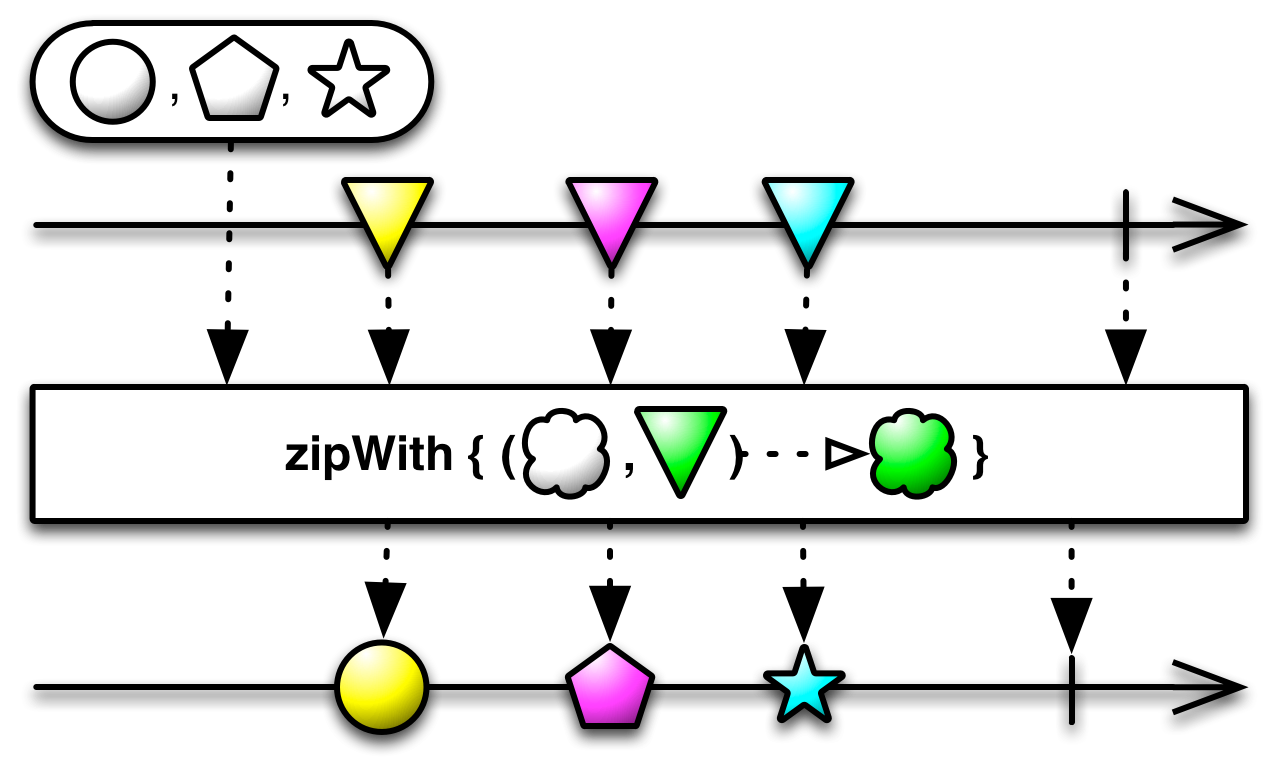
Note that the other Iterable is evaluated as items are observed from the source Publisher; it is
not pre-consumed. This allows you to zip infinite streams on either side.
- Backpressure:
- The operator expects backpressure from the sources and honors backpressure from the downstream.
(I.e., zipping with
interval(long, TimeUnit)may result in MissingBackpressureException, use one of theonBackpressureXto handle similar, backpressure-ignoring sources. - Scheduler:
zipWithdoes not operate by default on a particularScheduler.
Parameters
| other | the Iterable sequence |
|---|---|
| zipper | a function that combines the pairs of items from the Publisher and the Iterable to generate the items to be emitted by the resulting Publisher |
Returns
- a Flowable that pairs up values from the source Publisher and the
otherIterable sequence and emits the results ofzipFunctionapplied to these pairs
public final Flowable<R> zipWith (Publisher<? extends U> other, BiFunction<? super T, ? super U, ? extends R> zipper, boolean delayError, int bufferSize)
Returns a Flowable that emits items that are the result of applying a specified function to pairs of values, one each from the source Publisher and another specified Publisher.
The operator subscribes to its sources in order they are specified and completes eagerly if
one of the sources is shorter than the rest while cancelling the other sources. Therefore, it
is possible those other sources will never be able to run to completion (and thus not calling
doOnComplete()). This can also happen if the sources are exactly the same length; if
source A completes and B has been consumed and is about to complete, the operator detects A won't
be sending further values and it will cancel B immediately. For example:
range(1, 5).doOnComplete(action1).zipWith(range(6, 5).doOnComplete(action2), (a, b) -> a + b)action1 will be called but action2 won't.
To work around this termination property, use
doOnCancel(Action) as well or use using() to do cleanup in case of completion
or cancellation.

- Backpressure:
- The operator expects backpressure from the sources and honors backpressure from the downstream.
(I.e., zipping with
interval(long, TimeUnit)may result in MissingBackpressureException, use one of theonBackpressureXto handle similar, backpressure-ignoring sources. - Scheduler:
zipWithdoes not operate by default on a particularScheduler.
Parameters
| other | the other Publisher |
|---|---|
| zipper | a function that combines the pairs of items from the two Publishers to generate the items to be emitted by the resulting Publisher |
| delayError | if true, errors from the current Flowable or the other Publisher is delayed until both terminate |
| bufferSize | the capacity hint for the buffer in the inner windows |
Returns
- a Flowable that pairs up values from the source Publisher and the
otherPublisher and emits the results ofzipFunctionapplied to these pairs
Protected Methods
protected abstract void subscribeActual (Subscriber<? super T> s)
Operator implementations (both source and intermediate) should implement this method that performs the necessary business logic.
There is no need to call any of the plugin hooks on the current Flowable instance or the Subscriber.
Parameters
| s | the incoming Subscriber, never null |
|---|